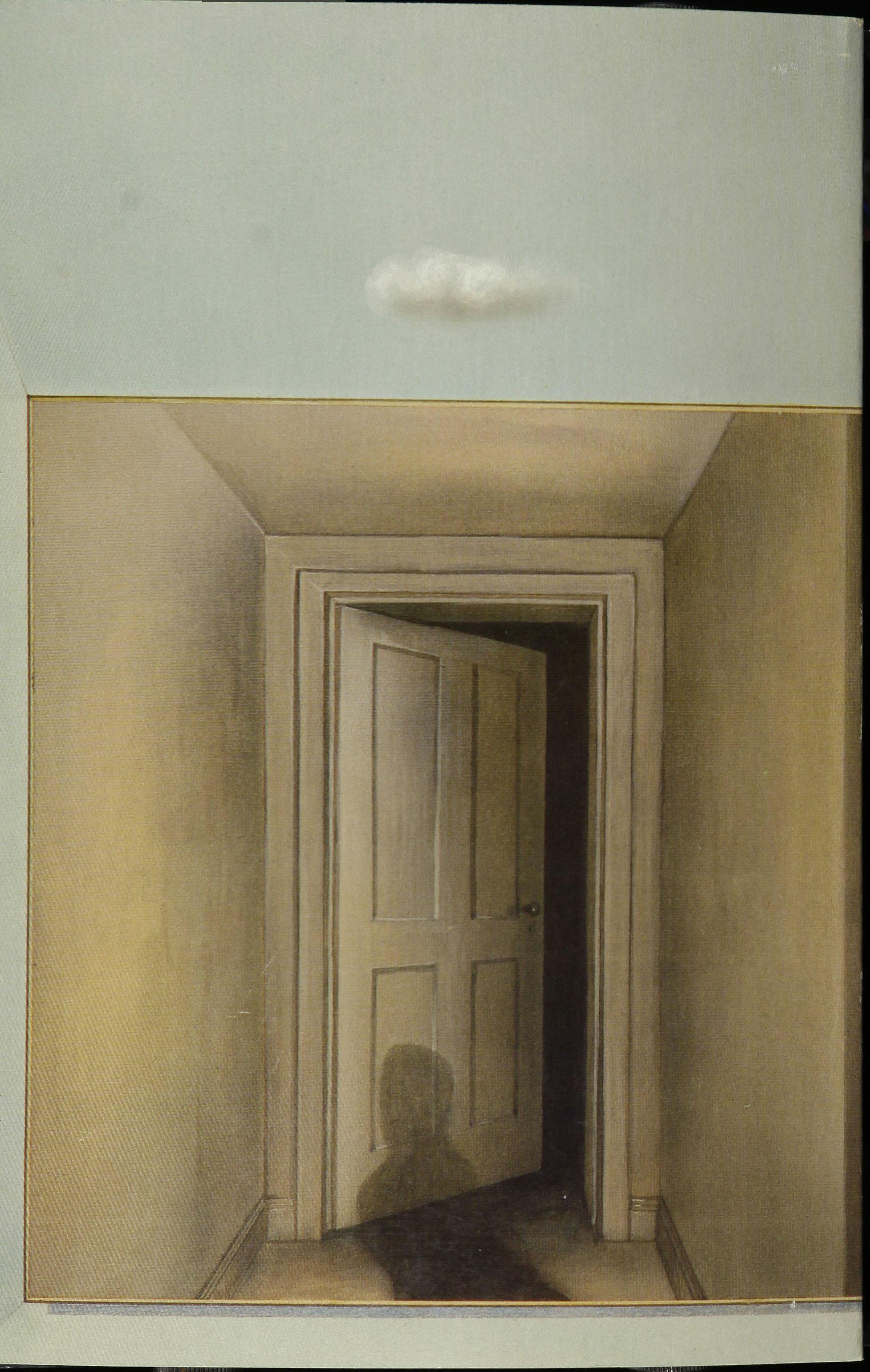






Editors:
Elliott Anderson, Robert Onopa
Executive Editor:
Jonathan Brent
Art Director: Cynthia Anderson
Managing Editor: Michael McDonnell
Associate Editor: Anne-Marie Zwierzyna
Assistant Editors:
Demetra Georgis, Kay Kersch Kirkpatrick, Mary Elinore Smith
Advisory Editors: Lawrence Levy, Charles Newman
Fulfillment:
Leigh Alexander, Judy Marrs
Contributing
Editors:
Robert Alter, Michael Anania, Gerald Graff, John Hawkes, David Hayman, Bill Henderson, Ian MacMillan, Joseph McElroy, Peter Michelson, Robert Ray, Tony Tanner, Nathaniel Tarn
TriQuarterly is an internationaljoumal ofart and writing published in the fall, winter, and spring at Northwestern University, Evanston, Illinois 60201.
Subscription rates: One year $12.00; two years $20.00; three years $30.00. Foreign subscriptions $1.00 per year additional. Single copies usually $5.95. Back issue prices on request. Contributions, correspondence, and subscriptions should be addressed to TriQuarteriy. 1735 Benson Avenue, Northwestern University, Evanston, Illinois 60201. The editors invite submissions, but queries are strongly suggested. No manuscripts will be returned unless accompanied by a stamped, self-addressed envelope. All manuscripts accepted for publication become the property of TriQuarterly, unless otherwise indicated. Copyright© 1979 byTriQuarterly. All rights reserved. The views expressed in this magazine are to be attributed to the writers, not the editors or sponsors. Printed in the United States of America. Claims for missing numbers will be honored only within the four-month period after month of issue.
NATIONAL DISTRIBUTOR TO RETAIL TRADE: B. DEBOER. 188 HIGH STREET, NUTLEY, NEW JERSEY071i0. DISTRIBUTOR FOR WEST COAST TRADE: BOOK PEOPLE, 2940 7TH STREET, BERKE· LEY, CALIFORNIA 94710. MIDWEST: BOOKSLINGER, P.O. BOX 16251,2163 FORD PKWY, ST. PAUL, MINNESOTA 55116.
REPRINTS OF BACK ISiUES OF TriQuarterly ARE NOW AVAILABLE IN FULL FORMAT FROM KRAUS REPRINT COMPANY, ROUTE 100, MILLWOOD, NEW YORK 10546, AND IN MICROFILM FROM UMI, A XEROX COMPANY, ANN ARBOR, MICHIGAN 48106.
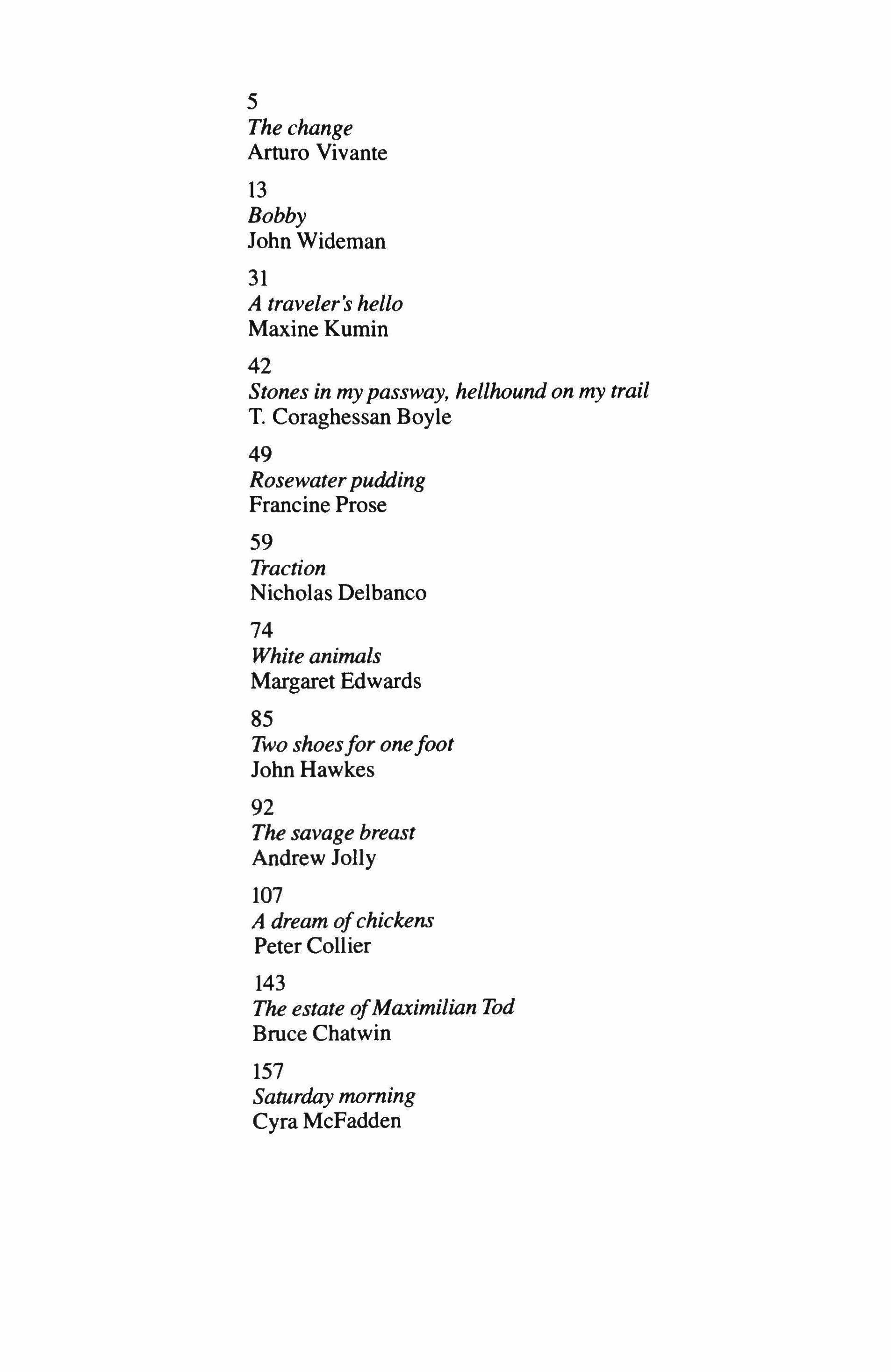
162
The amorist
Ted Solotaroff
173
We are not in this together
William Kittredge
198
The last Beat story
Eugene Wildman
209
What do I do now?
Nuala Pikowsky
221
Hanson on the bluffs
Kent Anderson
238
Zara Montgomery
Meredith Steinbach
275
The Turning Eilis Dillon

Cover and interior illustrations by Kinuko Craft.
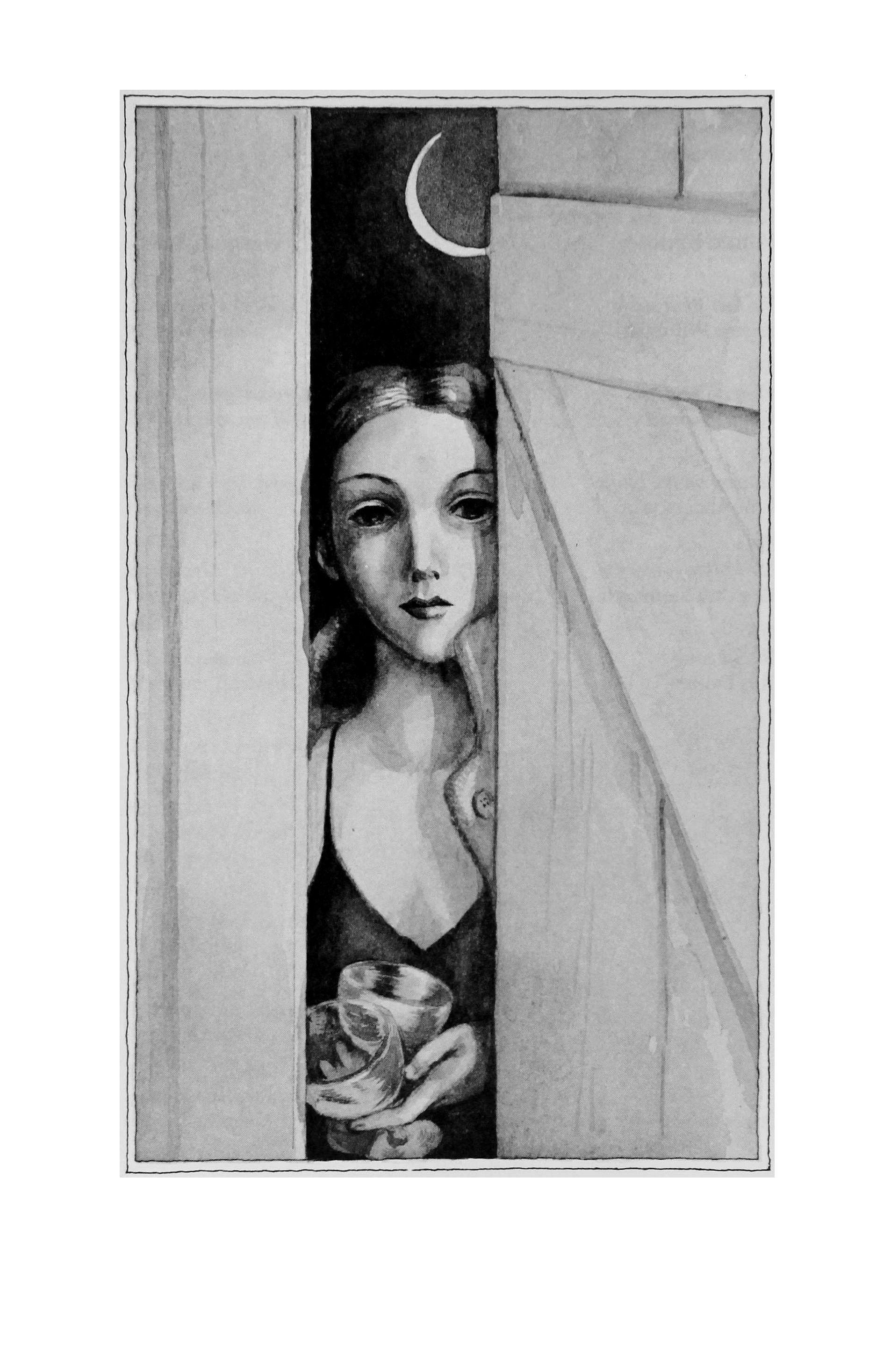
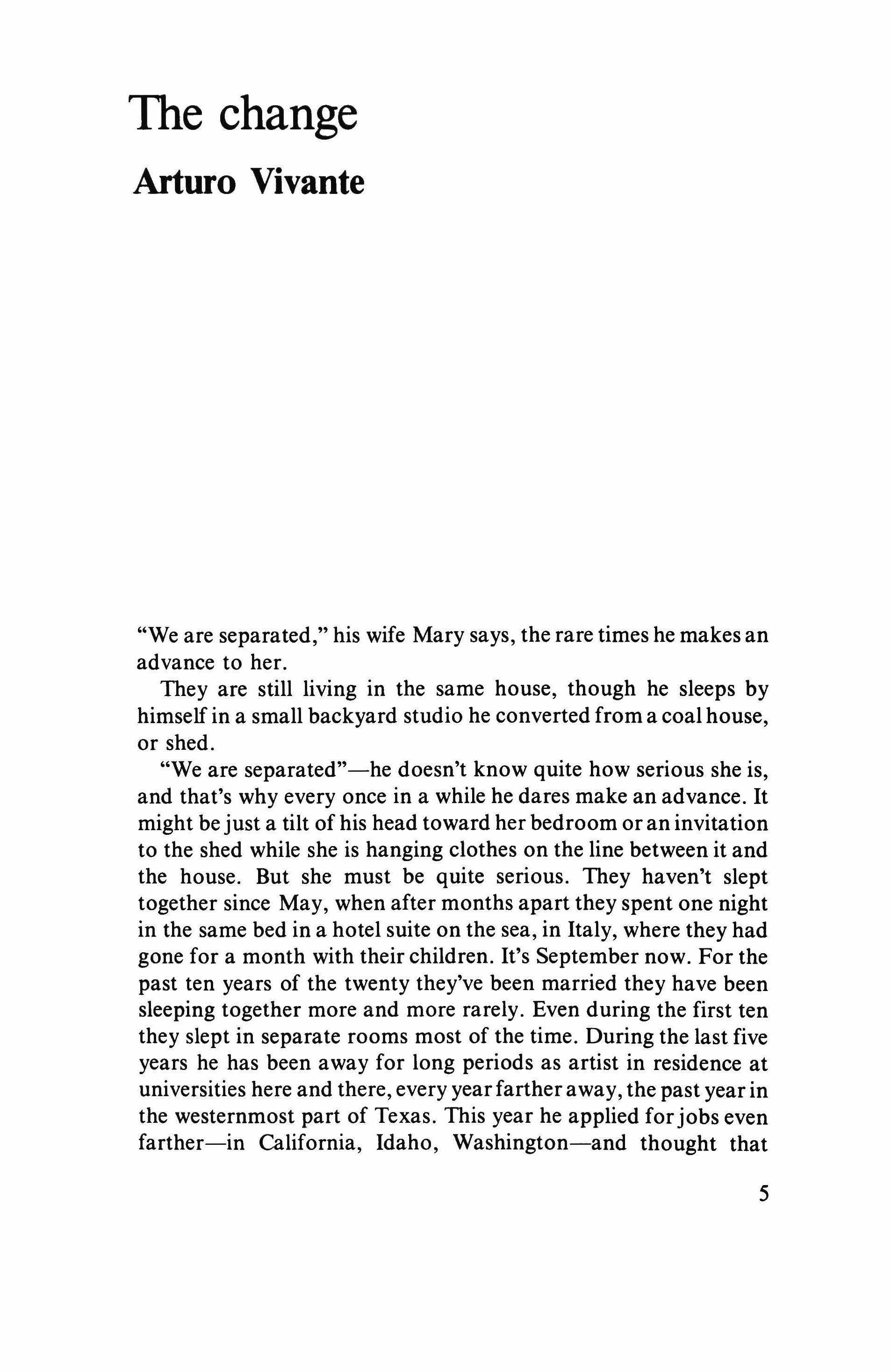
"We are separated," his wife Mary says, the rare times he makes an advance to her.
They are still living in the same house, though he sleeps by himself in a small backyard studio he converted from a coal house, or shed.
"We are separated"-he doesn't know quite how serious she is, and that's why every once in a while he dares make an advance. It might be just a tilt of his head toward her bedroom or an invitation to the shed while she is hanging clothes on the line between it and the house. But she must be quite serious. They haven't slept together since May, when after months apart they spent one night in the same bed in a hotel suite on the sea, in Italy, where they had gone for a month with their children. It's September now. For the past ten years of the twenty they've been married they have been sleeping together more and more rarely. Even during the first ten they slept in separate rooms most of the time. During the last five years he has been away for long periods as artist in residence at universities here and there, every year farther away, the past year in the westernmost part of Texas. This year he applied forjobs even farther-in California, Idaho, Washington-and thought that
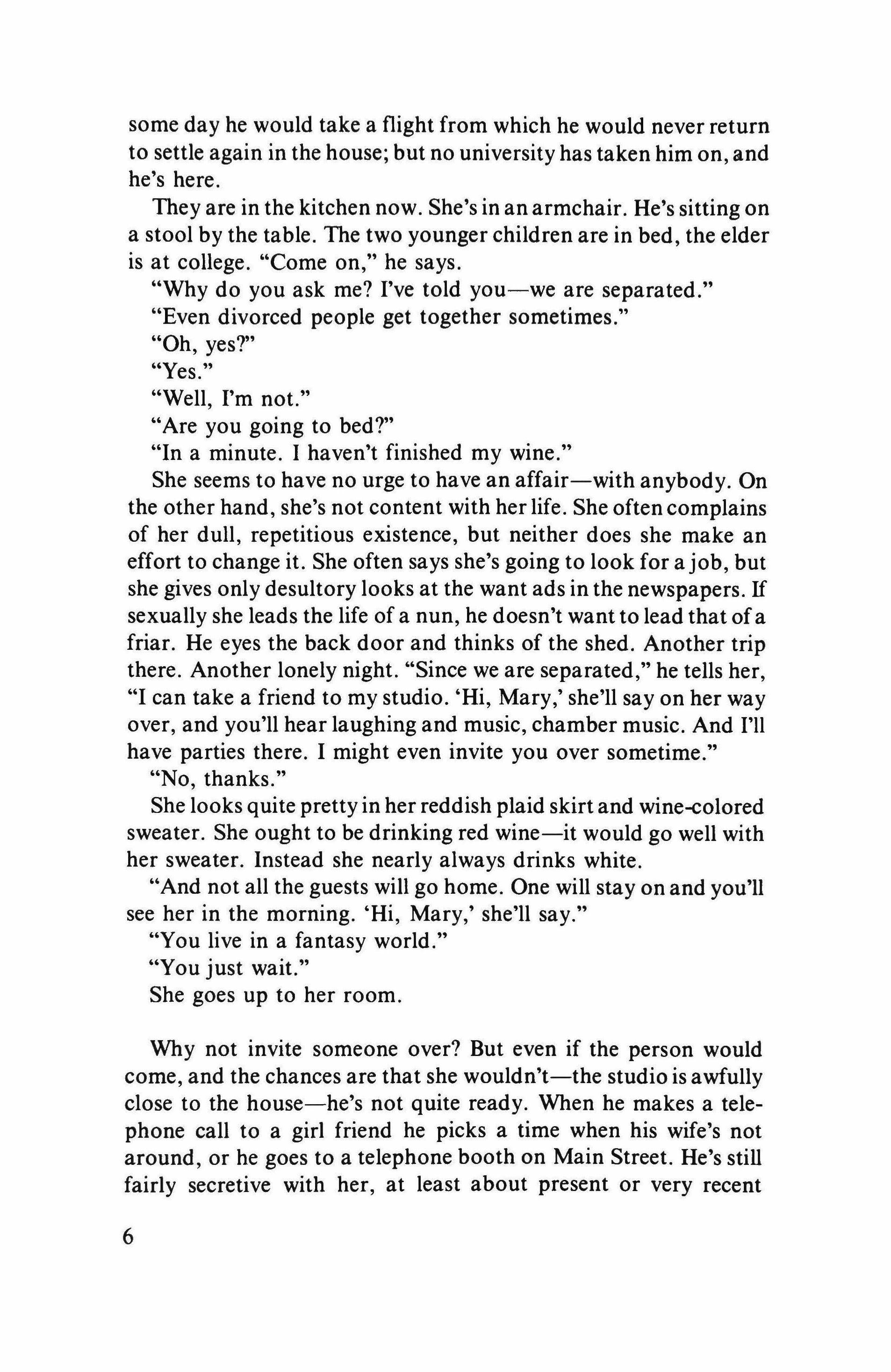
some day he would take a flight from which he would never return to settle again in the house; but no university has taken him on, and he's here.
They are in the kitchen now. She's in an armchair. He's sitting on a stool by the table. The two younger children are in bed, the elder is at college. "Come on," he says.
"Why do you ask me? I've told you-we are separated."
"Even divorced people get together sometimes."
"Oh, yes?"
"Yes."
"Well, I'm not."
"Are you going to bed?"
"In a minute. I haven't finished my wine."
She seems to have no urge to have an affair-with anybody. On the other hand, she's not content with her life. She often complains of her dull, repetitious existence, but neither does she make an effort to change it. She often says she's going to look for ajob, but she gives only desultory looks at the want ads in the newspapers. If sexually she leads the life of a nun, he doesn't want to lead that of a friar. He eyes the back door and thinks of the shed. Another trip there. Another lonely night. "Since we are separated," he tells her, "I can take a friend to my studio. 'Hi, Mary,' she'll say on her way over, and you'll hear laughing and music, chamber music. And I'll have parties there. I might even invite you over sometime."
"No, thanks."
She looks quite pretty in her reddish plaid skirt and wine-colored sweater. She ought to be drinking red wine-it would go well with her sweater. Instead she nearly always drinks white.
"And not all the guests will go home. One will stay on and you'll see her in the morning. 'Hi, Mary,' she'll say."
"You live in a fantasy world."
"You just wait."
She goes up to her room.
Why not invite someone over? But even if the person would come, and the chances are that she wouldn't-the studio is awfully close to the house-he's not quite ready. When he makes a telephone call to a girl friend he picks a time when his wife's not around, or he goes to a telephone booth on Main Street. He's still fairly secretive with her, at least about present or very recent
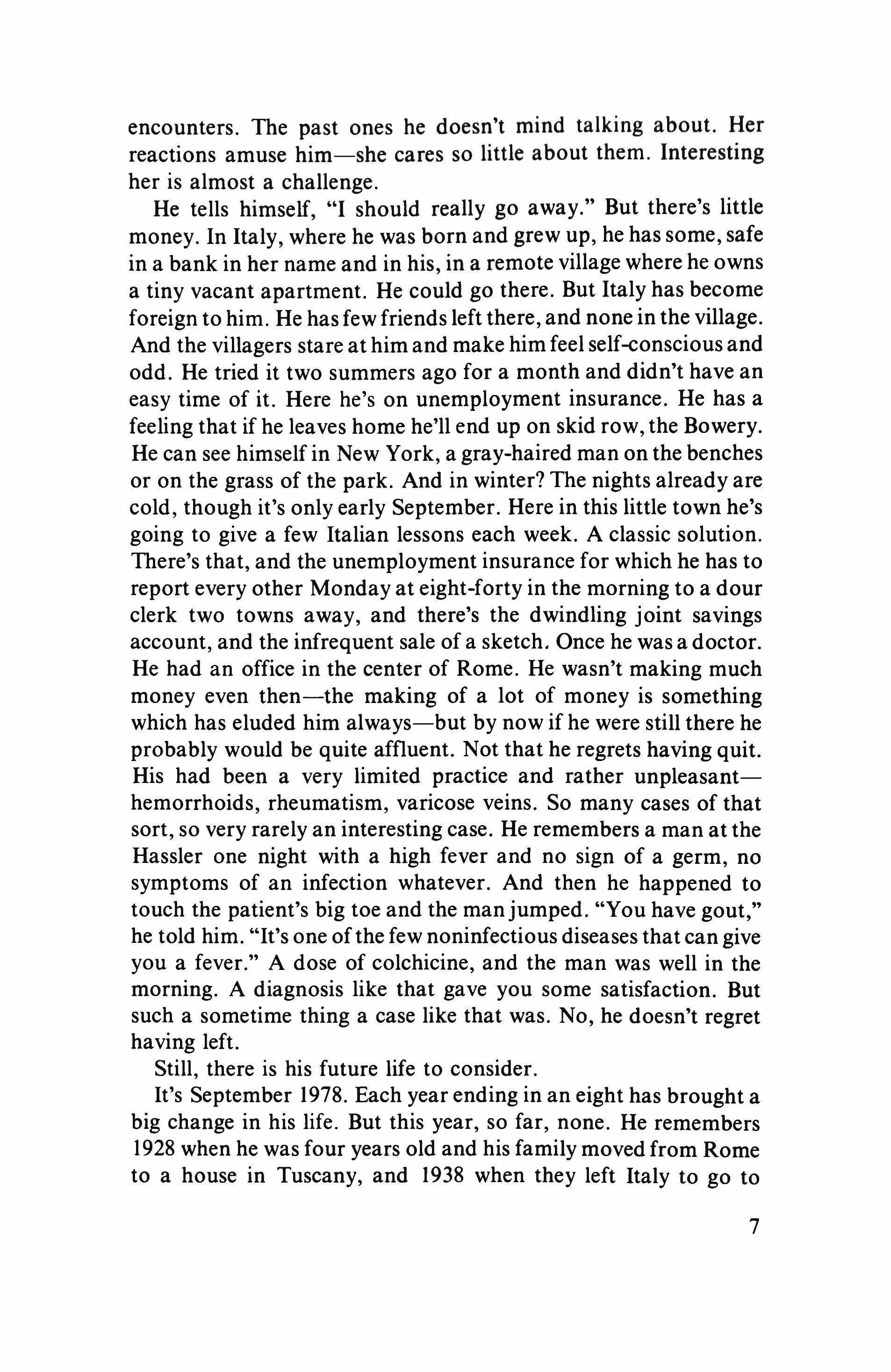
encounters. The past ones he doesn't mind talking about. Her reactions amuse him-she cares so little about them. Interesting her is almost a challenge.
He tells himself, "I should really go away." But there's little money. In Italy, where he was born and grew up, he has some, safe in a bank in her name and in his, in a remote village where he owns a tiny vacant apartment. He could go there. But Italy has become foreign to him. He has few friends left there, and none in the village. And the villagers stare at him and make him feel self-conscious and odd. He tried it two summers ago for a month and didn't have an easy time of it. Here he's on unemployment insurance. He has a feeling that if he leaves home he'll end up on skid row, the Bowery. He can see himself in New York, a gray-haired man on the benches or on the grass of the park. And in winter? The nights already are cold, though it's only early September. Here in this little town he's going to give a few Italian lessons each week. A classic solution. There's that, and the unemployment insurance for which he has to report every other Monday at eight-forty in the morning to a dour clerk two towns away, and there's the dwindling joint savings account, and the infrequent sale of a sketch. Once he was a doctor. He had an office in the center of Rome. He wasn't making much money even then-the making of a lot of money is something which has eluded him always-but by now if he were still there he probably would be quite affluent. Not that he regrets having quit. His had been a very limited practice and rather unpleasanthemorrhoids, rheumatism, varicose veins. So many cases of that sort, so very rarely an interesting case. He remembers a man at the Hassler one night with a high fever and no sign of a germ, no symptoms of an infection whatever. And then he happened to touch the patient's big toe and the man jumped. "You have gout," he told him. "It's one of the few noninfectious diseases that can give you a fever." A dose of colchicine, and the man was well in the morning. A diagnosis like that gave you some satisfaction. But such a sometime thing a case like that was. No, he doesn't regret having left.
Still, there is his future life to consider.
It's September 1978. Each year ending in an eight has brought a big change in his life. But this year, so far, none. He remembers 1928 when he was four years old and his family moved from Rome to a house in Tuscany, and 1938 when they left Italy to go to

England as refugees. In the year 1948 he became a doctor in Rome. In 1958 he got married, left medicine and Italy, and came to America to make his living as an artist. In 1968, with some misgivings, he began teaching. But in 1978 so far nothing very unusual has happened to him, unless it is that he hasn't been able to get a teaching job. But that doesn't seem a sufficiently big change: in 1975 he didn't teach either, though that time he had taken a year off of his own accord. Noris it much ofa change to hear his wife telling him that they are separated-they've been drifting apart for years. And so he waits, superstitious enough to believe that something rather strange will happen to him before the year is over. He is so convinced of this that whenever he goes out with a woman he likes he wonders if perhaps she isn't the one who will bring about the awaited change. In August, at an opening, he met a woman who said she specialized in changing people's lives.
"You are just what I need," he said, half in jest. She took him seriously. She was a management consultant, psychologist, and economist all in one. She phoned him. They met for a drink. The cafe was crowded, and a young man, edging his way past their table, knocked against her shoulder. From her chair she quickly slapped his behind, one sharp spank as if he were a child. Later, in her apartment, she more or less treated him in the same way, and he left disgruntled.
More recently-on Labor Day-he went to a late party in a summer restaurant given by the owners to mark the end of the season. He wasn't invited by them, but a woman friend who was, and whom he saw that afternoon, told him to go-that she was inviting him and that they would meet there. She lived in New York, was in fact leaving for New York the next day, and he wondered if he wouldn't be following her there. They talked, drank and danced, but all without fervor. No-he wouldn't be going to New York. Then another woman talked to him. He knew her a little and would have liked to have known her more than a little, but he had never been alone with her, something which certainly isn't conducive to knowledge. She was a handsome woman with long black hair and the poise of a dancer. She had come to the party with an elderly man with a white beard with whom she lived in a summer cottage they rented. Soon the man left. He watched her dancing with others. Then she came over to him and, hands outstretched, drew him off his chair. "Dance with me," she said. He

danced with her again and again, forgetting the other. What did it matter? The other, too, was dancing, with someone she seemed to like better than him. The music got madder and madder. They danced to one side of the room and, screened by a pillar, they kissed. Later he said something nice about the man she lived with. "It works," she said, "because weekends he lets me do what I like." Still later, she said, "Can you give me a ride home?"
"Sure," he said, and turning to the other, "I'll come for you after."
She shrugged. "Don't bother," she said, about to dance. They left. "I'd like to be with you forever," he said on the way to the car.
"I was thinking the same thing."
He wondered if-no, he was sure-she was going to effect the great change. In the car they were a long time getting started. Driving her to her home, she said, "Come and see me; I'll be here alone next week until Thursday." Did she think it was Sunday? It was Monday, and when he went to see her a week later she was gone, back to the old fellow in Boston.
At the post office a woman who had left her husband the year before said hello. She was quite striking, with masses of curly brown hair and strange, beautiful eyes, eyes that you felt had wept a great deal. He had been introduced to her at a dinner party when she was still married. With a drink in her hand she had come over to him and told him of a teachingexperience she had had in which she couldn't utter a word. Such sympathy and feeling of kinship and intense identification with her had come over him that he had the strongest urge to hug her right there in front of her husband and Mary. Now she told him she was gong to take a trip around the world. For a moment he saw himself leaving with her.
"Are you going alone?"
"Isn't that the only way to travel?"
"Yes," he conceded.
He took her to a coffee shop near his house. "I feel so free," she said, "like a balloon."
"Like a balloon. Then you are a true voyager. Do you know those verses of Baudelaire? 'But the real travelers are only those who leave for the sake of departing. / Lighthearted, like balloons, / Their fate they never avoid, / And, without knowing why, they are always saying, Let's go!'"
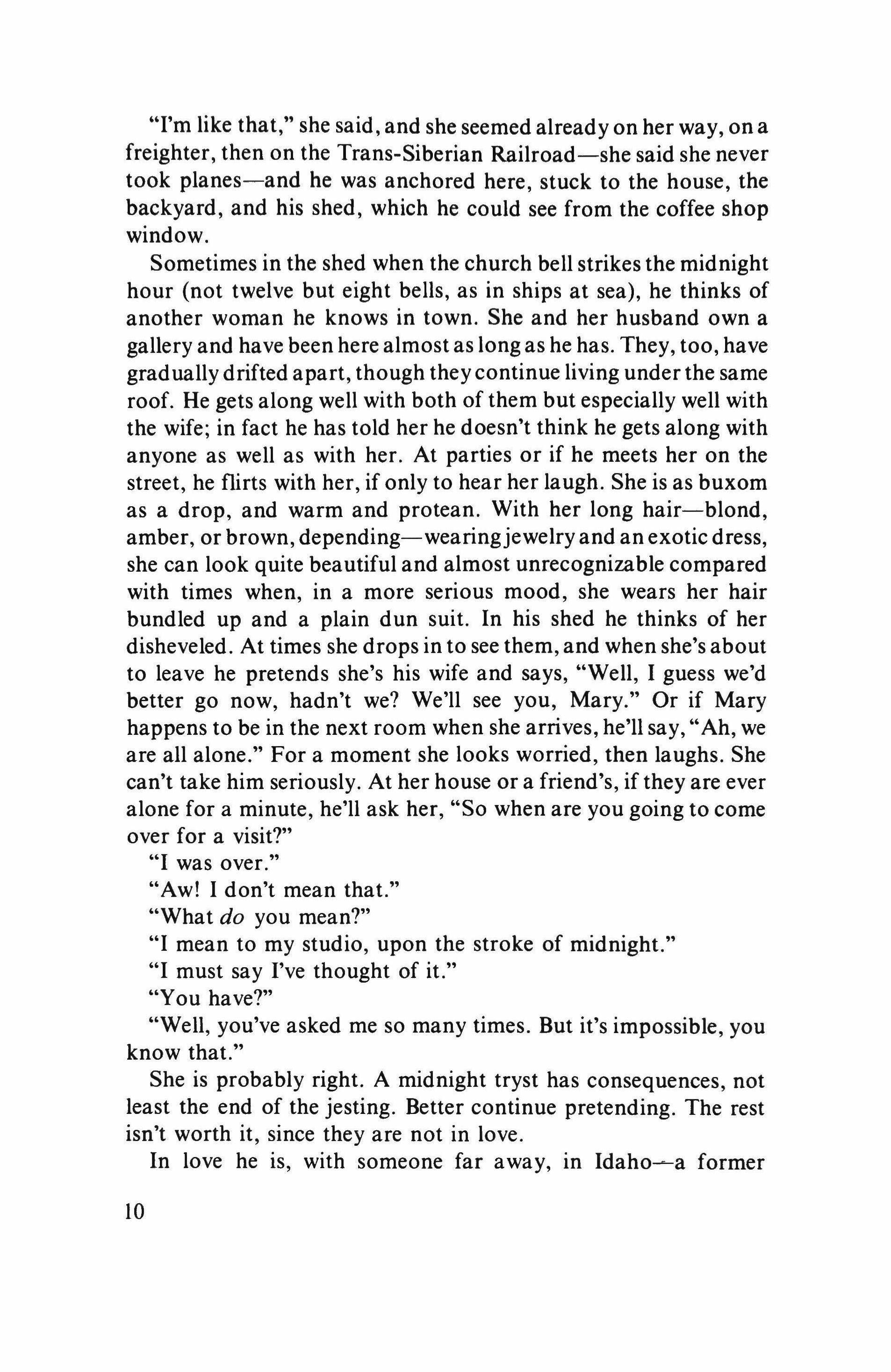
"I'm like that," she said, and she seemed already on her way, on a freighter, then on the Trans-Siberian Railroad-she said she never took planes-and he was anchored here, stuck to the house, the backyard, and his shed, which he could see from the coffee shop window.
Sometimes in the shed when the church bell strikes the midnight hour (not twelve but eight bells, as in ships at sea), he thinks of another woman he knows in town. She and her husband own a gallery and have been here almost as long as he has. They, too, have gradually drifted apart, though they continue living under the same roof. He gets along well with both of them but especially well with the wife; in fact he has told her he doesn't think he gets along with anyone as well as with her. At parties or if he meets her on the street, he flirts with her, if only to hear her laugh. She is as buxom as a drop, and warm and protean. With her long hair-blond, amber, or brown, depending-wearingjewelry and an exotic dress, she can look quite beautiful and almost unrecognizable compared with times when, in a more serious mood, she wears her hair bundled up and a plain dun suit. In his shed he thinks of her disheveled. At times she drops in to see them, and when she's about to leave he pretends she's his wife and says, "Well, I guess we'd better go now, hadn't we? We'll see you, Mary." Or if Mary happens to be in the next room when she arrives, he'll say, "Ah, we are all alone." For a moment she looks worried, then laughs. She can't take him seriously. At her house or a friend's, if they are ever alone for a minute, he'll ask her, "So when are you going to come over for a visit?"
"I was over."
"Awl I don't mean that."
"What do you mean?"
"I mean to my studio, upon the stroke of midnight."
"I must say I've thought of it."
"You have?"
"Well, you've asked me so many times. But it's impossible, you know that."
She is probably right. A midnight tryst has consequences, not least the end of the jesting. Better continue pretending. The rest isn't worth it, since they are not in love.
In love he is, with someone far away, in Idaho=-a former

student, twice divorced, whom he met at summer school last year. His wife knows about her.
"I ought to go to Idaho," he says.
"Why don't you?"
"She doesn't love me."
"Why not?"
"Too smart, too beautiful, too young."
Sometimes, rarely now-even that stage has nearly passed, they've done it too often-if she blames him for his poor investments or the sale of his family house in Italy, which he should never have agreed to, they fly into an argument and the word "divorce" comes up. If their elder daughter is at home and present, she takes her mother's side. "Why don't you leave him?" she says.
His younger daughter, a very pretty teenager, is far too involved with a herd of friends to pay them any attention; irritated, she quickly climbs up the stairs to her room, where there's an extension phone. This she and her friends keep busy half the day. Only the little boy, eleven, seems affected. The very word "divorce" brings him to tears. "You never hold hands," he says. "Why can't you be like Lelio and Hannah?" He is talking about his uncle and aunt who, whenever they come for a visit, seem very fond of one another.
His little boy-so wild, so naughty, so hard to take care of-puts him to shame. "He's got more sense than anybody," he says.
September passes, and October and November. Obviously nothing is going to happen to him. Life just drags on. No change this year of 1978, despite the eight. And now it is December.
"What do you want for Christmas?" Mary asks him.
"I don't want anything. Just be nice to me, and tell them to be nice," he says, looking at the children.
"We are nice, aren't we, children? It's you."
"Hm."
The presents come-and her brother from Boston with a large boxful on which they heavily depend.
After supper he always goes to his studio, where it is quiet. For he who has no peace within must have his peace without. He does his best work at night. In the silence of the night, when there is no wind and the traffic on the highway, a thousand or more feet
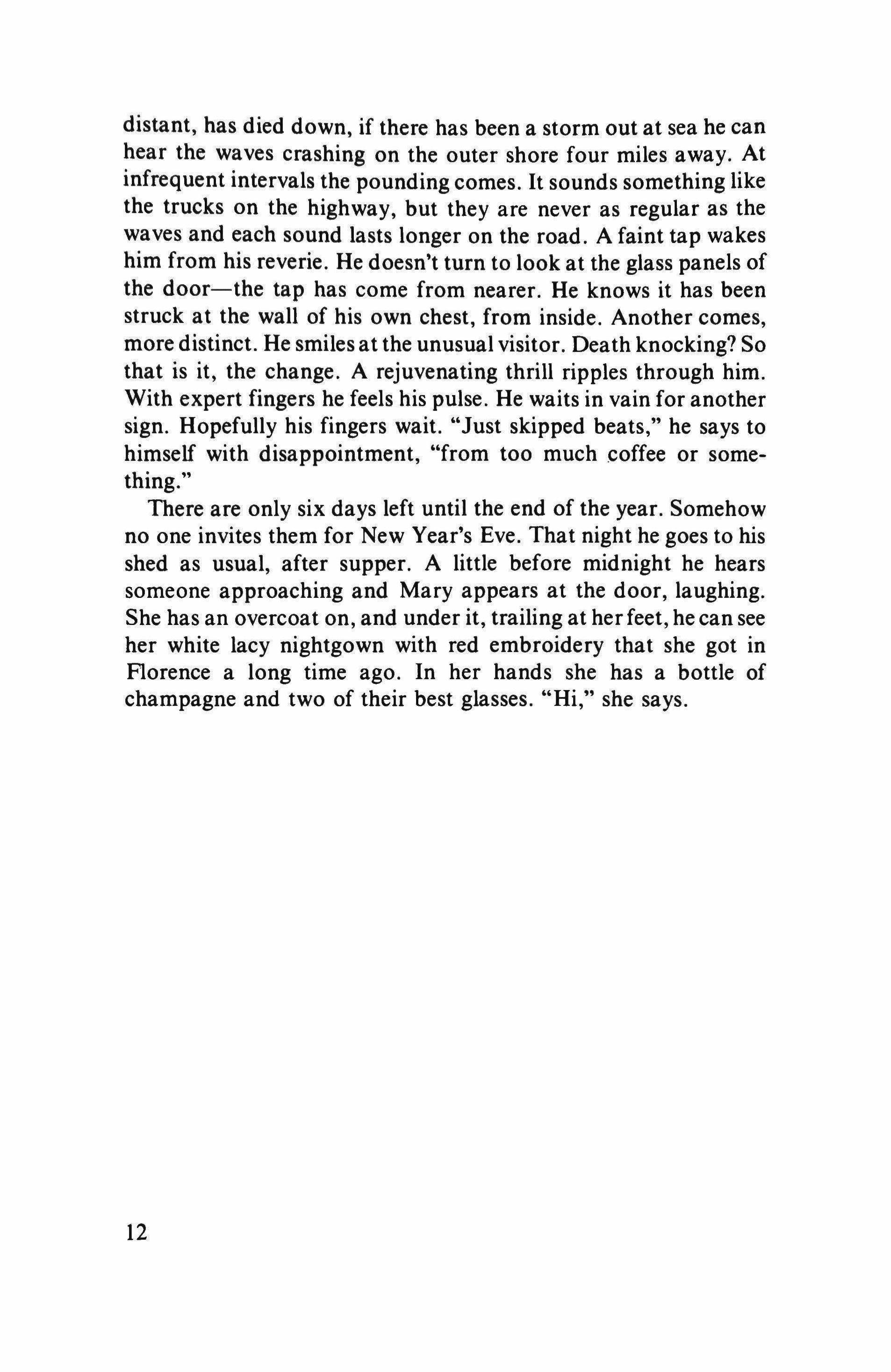
distant, has died down, if there has been a storm out at sea he can hear the waves crashing on the outer shore four miles away. At infrequent intervals the pounding comes. It sounds something like the trucks on the highway, but they are never as regular as the waves and each sound lasts longer on the road. A faint tap wakes him from his reverie. He doesn't turn to look at the glass panels of the door-the tap has come from nearer. He knows it has been struck at the wall of his own chest, from inside. Another comes, more distinct. He smiles at the unusual visitor. Death knocking? So that is it, the change. A rejuvenating thrill ripples through him. With expert fingers he feels his pulse. He waits in vain for another sign. Hopefully his fingers wait. "Just skipped beats," he says to himself with disappointment, "from too much coffee or something."
There are only six days left until the end of the year. Somehow no one invites them for New Year's Eve. That night he goes to his shed as usual, after supper. A little before midnight he hears someone approaching and Mary appears at the door, laughing. She has an overcoat on, and under it, trailing at her feet, he can see her white lacy nightgown with red embroidery that she got in florence a long time ago. In her hands she has a bottle of champagne and two of their best glasses. "Hi," she says.
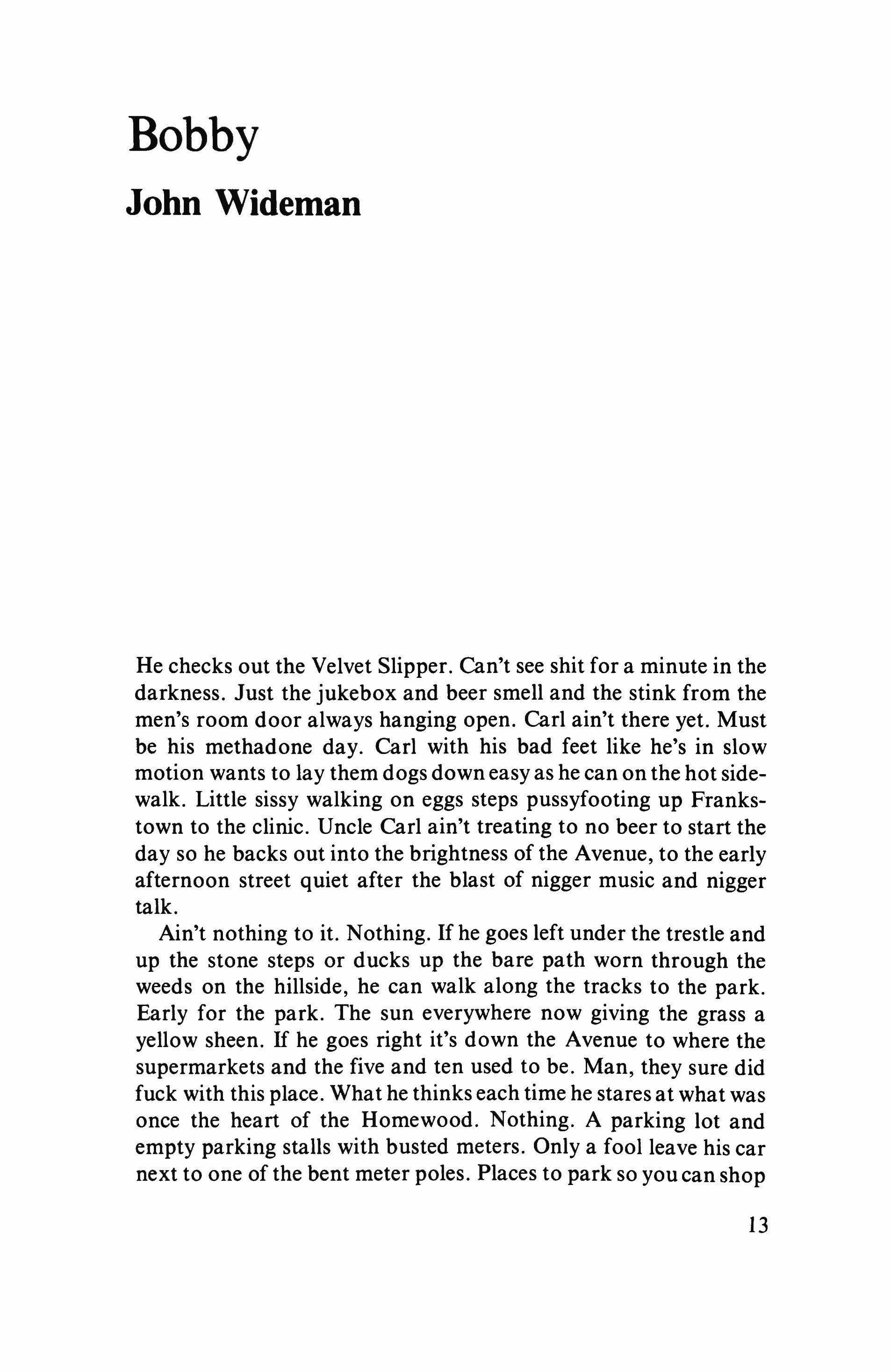
He checks out the Velvet Slipper. Can't see shit for a minute in the darkness. Just the jukebox and beer smell and the stink from the men's room door always hanging open. Carl ain't there yet. Must be his methadone day. Carl with his bad feet like he's in slow motion wants to lay them dogs down easy as he can on the hot sidewalk. Little sissy walking on eggs steps pussyfooting up Frankstown to the clinic. Uncle Carl ain't treating to no beer to start the day so he backs out into the brightness of the Avenue, to the early afternoon street quiet after the blast of nigger music and nigger talk.
Ain't nothing to it. Nothing. If he goes left under the trestle and up the stone steps or ducks up the bare path worn through the weeds on the hillside, he can walk along the tracks to the park. Early for the park. The sun everywhere now giving the grass a yellow sheen. If he goes right it's down the Avenue to where the supermarkets and the five and ten used to be. Man, they sure did fuck with this place. What he thinks each time he stares at what was once the heart of the Homewood. Nothing. A parking lot and empty parking stalls with busted meters. Only a fool leave his car next to one of the bent meter poles. Places to park so you can shop

in stores that ain't there no more. Remembers his little Saturday morning wagon hustle when him and all the other kids would lay outside the A&P to haul groceries. Still some white ladies in those days come down from Thomas Boulevard to shop and if you're lucky get one of them and tipped a quarter. Some of them fat black bitches he see in church every Sunday have you pulling ten tons of rice and beans all the way to West Hell and be smiling and yakking all the way and saying what a nice boy you are and l knowed your Mama when she was little and please sonny just set them inside on the table and still be smiling at you with some warm glass of water and a dime after you done hauled their shit halfway round the world.
Hot in the street but nobody didn't like you just coming in and sitting in their air conditioning unless you gonna buy a drink and set it in front of you. The poolroom hot. And too early to be messing with those fools on the corner. Always somebody trying to hustle. Man, when you gonna give me my money, man, [been waiting too long for my money, man, lemme hold this quarter till tonight, man. I'm getting over tonight, man. And the buses climbing the hill and turning the corner by the state store and fools parked in the middle of the street and niggers getting hot honking to get by and niggers paying them no mind like they got important business and just gonna sit there blocking traffic as long as they please and the buses growling and farting those fumes when they struggle around the corner.
Look to the right and to the left but ain't nothing to it, nothing saying move one way or the other. Homewood Avenue a darker gray stripe between the gray sidewalks. Tar patches in the asphalt. Looks like somebody's bad head with the ringworm. Along the curb ground glass sparkles below the broken neck of a Tokay bottle. Just the long neck and shoulders of the bottle intact and a piece of label hanging. Somebody should make a deep ditch out of Homewood Avenue and just go on and push the row houses and boarded storefronts into the hole. Bury it all, like in a movie he had seen a dam burst and the floodwaters ripping through the dry bed of a river till the roaring water overflowed the banks and swept away trees and houses, uprooting everything in its path like a cleansing wind.
He sees Homewood Avenue dipping and twisting at Hamilton. Where Homewood crests at Franktown the heat is a shimmering
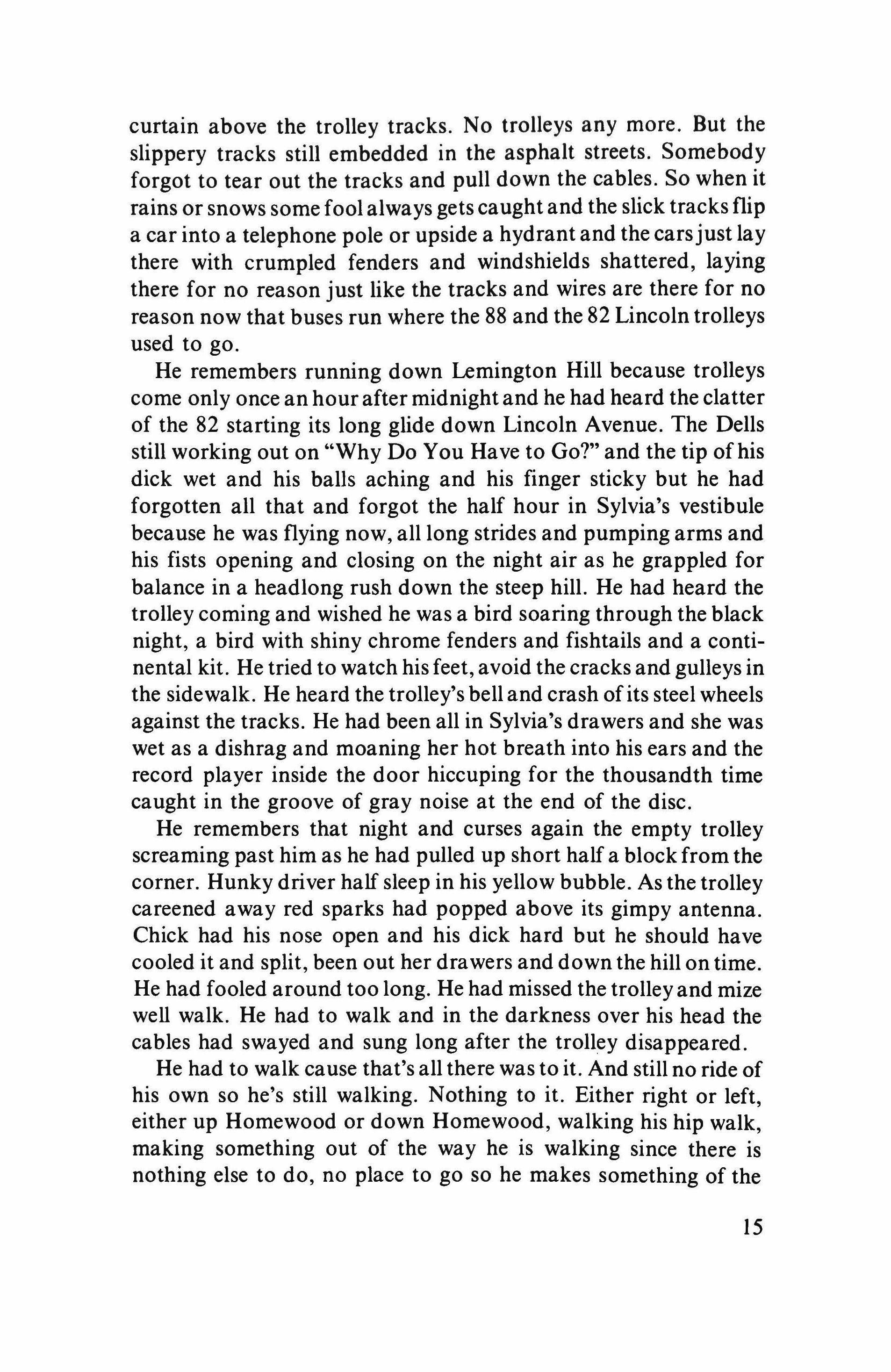
curtain above the trolley tracks. No trolleys any more. But the slippery tracks still embedded in the asphalt streets. Somebody forgot to tear out the tracks and pull down the cables. So when it rains or snows some fool always gets caught and the slick tracks flip a car into a telephone pole or upside a hydrant and the carsjust lay there with crumpled fenders and windshields shattered, laying there for no reason just like the tracks and wires are there for no reason now that buses run where the 88 and the 82 Lincoln trolleys used to go.
He remembers running down Lemington Hill because trolleys come only once an hour after midnight and he had heard the clatter of the 82 starting its long glide down Lincoln Avenue. The Dells still working out on "Why Do You Have to Go?" and the tip ofhis dick wet and his balls aching and his finger sticky but he had forgotten all that and forgot the half hour in Sylvia's vestibule because he was flying now, all long strides and pumping arms and his fists opening and closing on the night air as he grappled for balance in a headlong rush down the steep hill. He had heard the trolley coming and wished he was a bird soaring through the black night, a bird with shiny chrome fenders and fishtails and a continental kit. He tried to watch his feet, avoid the cracks and gulleys in the sidewalk. He heard the trolley's bell and crash ofits steel wheels against the tracks. He had been all in Sylvia's drawers and she was wet as a dishrag and moaning her hot breath into his ears and the record player inside the door hiccuping for the thousandth time caught in the groove of gray noise at the end of the disc.
He remembers that night and curses again the empty trolley screaming past him as he had pulled up short half a block from the corner. Hunky driver half sleep in his yellow bubble. As the trolley careened away red sparks had popped above its gimpy antenna. Chick had his nose open and his dick hard but he should have cooled it and split, been out her drawers and down the hill on time. He had fooled around too long. He had missed the trolley and mize well walk. He had to walk and in the darkness over his head the cables had swayed and sung long after the trolley disappeared.
He had to walk cause that's all there was to it. And still no ride of his own so he's still walking. Nothing to it. Either right or left, either up Homewood or down Homewood, walking his hip walk, making something out of the way he is walking since there is nothing else to do, no place to go so he makes something of the

going, lets them see him moving in his own down way, his stylized walk which nobody could walk better even if they had some place to go.
Thinking of a chump shot on the nine ball which he blew and cost him a quarter for the game and his last dollar on a side bet. Of pulling on his checkered bells that morning and the black tank top. How the creases were dead and cherry pop or something on the front and a million wrinkles behind the knees and where his thighs came together. Junky, wino-looking pants he would have rather died than wear just a few years ago before when he was one of the cleanest cats in Westinghouse High School. Sharp and leading the Commodores. Doo Wah Diddy, Wah Diddy bop. Thirty-fivedollar pants when half the cats in the House couldn't spend that much for a suit. It was a bitch in the world. Stone bitch. Feeling like Mister Tooth Decay crawling all sweaty out of the gray sheets. Mom could wash them every day, they still be gray. Like his underclothes. Like every motherfucking thing they had and would ever have. Do Wah Diddy. The rakejerked three or four times through his bush. Left there as decoration and weapon. You could fuck up a cat with those steel teeth. You could get the points sharp as needles. And draw it swift as Billy the Kid.
Thinking it be a bitch out here. Niggers write all over everything don't even know how to spell. Drawing power fists that look like a loaf of bread.
Thinking this whole avenue is like somebody's mouth they let some jive dentist fuck with. All these old houses nothing but rotten teeth and these raggedy pits is where some been dug out or knocked out and ain't nothing left but stumps and snaggleteethjust waiting to go. Thinking, that's right. That's just what it is. Why it stinks around here and why ain't nothing but filth and germs and rot. And what that make me. What it make all these niggers. Thinking yes, yes, that's all it is.
Mr. Strayhorn where he always is down from the corner of Hamilton and Homewood sitting on a folding chair beside his iceball cart. A sweating canvas draped over the front of the cart to keep off the sun. Somebody said the old man a hundred years old, somebody said he was a bad dude in his day. A gambler like his own Granddaddy John French had been. They say Strayhorn whipped three cats half to death try to cheat him in the alley behind Dumperline. Took a knife off one and whipped all three with his

bare hands. Just sits there all summer selling ice-balls. Old and can hardly see. But nobody don't bother him even though he got his pockets full of change every evening.
Shit. One of the young boys will off him one night. Those kids was stone crazy. Kill you for a dime and think nothing of it. Shit. Rep don't mean a thing. They come at you in packs, like wild dogs. Couldn't tell those young boys nothing. He thought he had come up mean. Thought his running buddies be some terrible dudes. Shit. These kids coming up been into more stuffbefore they twelve than most grown men do they whole lives.
Hard out here. He stares into the dead storefronts. Sometime they get in one of them. Take it over till they get run out or set it on fire or it get so filled with shit and niggerpiss don't nobody want to use it no more except for winos and junkies come in at night and could be sleeping on a bed of nails wouldn't make no nevermind to those cats. He peeks without stopping between the wooden slats where the glass used to be. Like he is reading the posters, like there might be something he needed to know on these rain-soaked, sunfaded pieces of cardboard talking about stuff that happened a long time ago.
Self-defense Demonstration Ahmed Jamal. Rummage Sale. Omega Boat Ride. The Dells. Madame Walker's Beauty Products.
A dead bird crushed dry and paper thin in the alley between Albion and Tioga. Like somebody had smeared it with tar and mashed it between the pages of a giant book. If you hadn't seep it in the first place, still plump and bird colored, you'd never recognize it now. Looked now like the lost sole of somebody's shoe. He had watched it happen. Four or five days was all it took. On the third day he thought a cat had dragged it off. But when he passed the corner next afternoon he found the dark shape in the grass at the edge of the cobblestones. The head was gone and the yellow smear of beak but he recognized the rest. By then already looking like the raggedy sole somebody had walked off their shoe.
He was afraid of anything dead. He could look at something dead but no way was he going to touch it. Didn't matter, big or small, he wasn't about to put his hands near nothing dead. His daddy had whipped him when his mother said he sassed her and wouldn't take the dead rat out of the trap. He could whip him again but no way he was gone touch that thing. The dudes come back from Nam talking about puddles of guts and scraping parts of
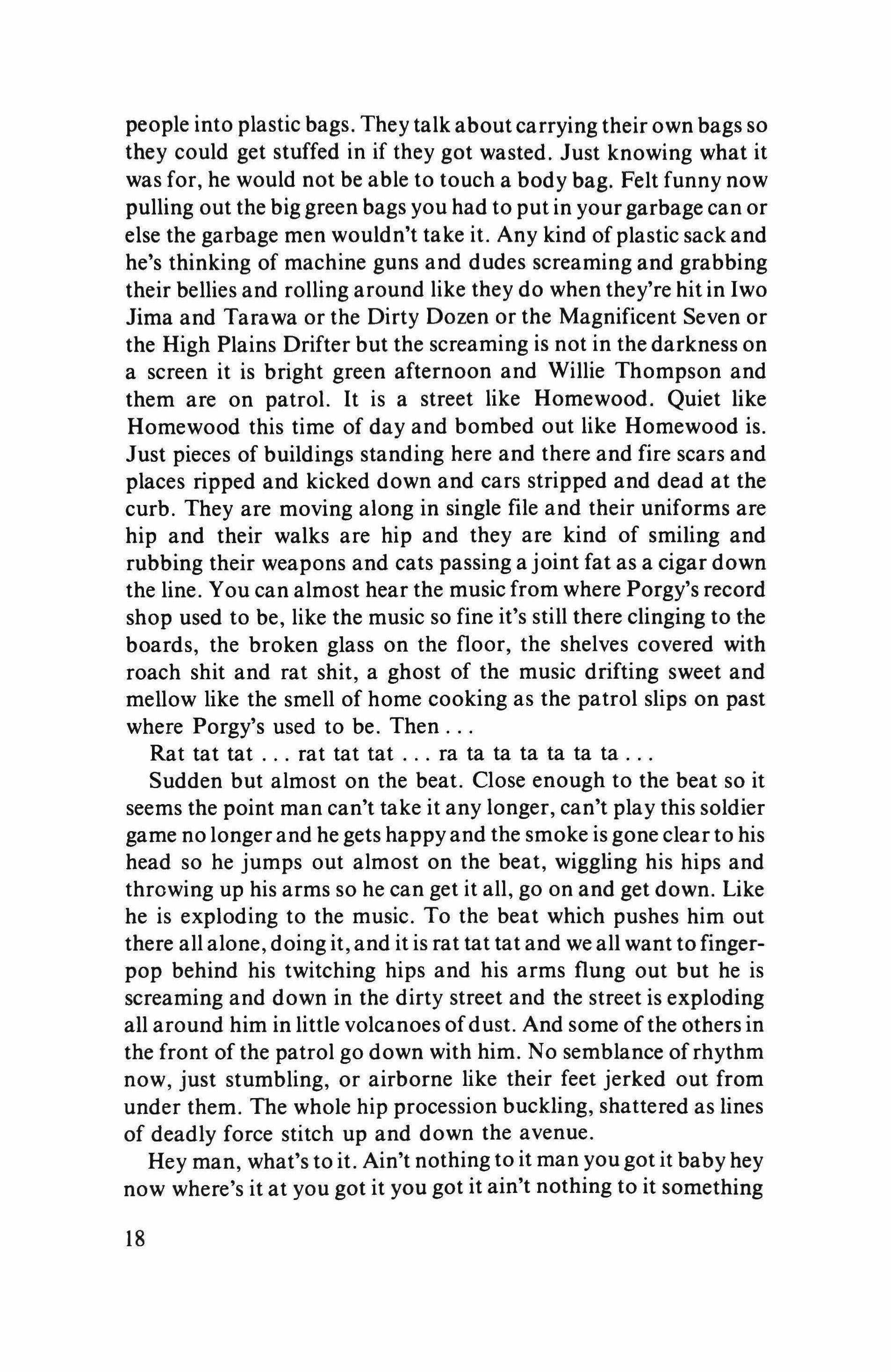
people into plastic bags. They talk about carrying their own bags so they could get stuffed in if they got wasted. Just knowing what it was for, he would not be able to touch a body bag. Felt funny now pulling out the big green bags you had to put in your garbage can or else the garbage men wouldn't take it. Any kind of plastic sack and he's thinking of machine guns and dudes screaming and grabbing their bellies and rolling around like they do when they're hit in Iwo Jima and Tarawa or the Dirty Dozen or the Magnificent Seven or the High Plains Drifter but the screaming is not in the darkness on a screen it is bright green afternoon and Willie Thompson and them are on patrol. It is a street like Homewood. Quiet like Homewood this time of day and bombed out like Homewood is. Just pieces of buildings standing here and there and fire scars and places ripped and kicked down and cars stripped and dead at the curb. They are moving along in single file and their uniforms are hip and their walks are hip and they are kind of smiling and rubbing their weapons and cats passing a joint fat as a cigar down the line. You can almost hear the music from where Porgy's record shop used to be, like the music so fine it's still there clinging to the boards, the broken glass on the floor, the shelves covered with roach shit and rat shit, a ghost of the music drifting sweet and mellow like the smell of home cooking as the patrol slips on past where Porgy's used to be. Then
Rat tat tat rat tat tat ra ta ta ta ta ta ta
Sudden but almost on the beat. Close enough to the beat so it seems the point man can't take it any longer, can't play this soldier game no longer and he gets happy and the smoke is gone clear to his head so he jumps out almost on the beat, wiggling his hips and throwing up his arms so he can get it all, go on and get down. Like he is exploding to the music. To the beat which pushes him out there all alone, doing it, and it is rat tat tat and we all want to fingerpop behind his twitching hips and his arms flung out but he is screaming and down in the dirty street and the street is exploding all around him in little volcanoes ofdust. And some of the others in the front of the patrol go down with him. No semblance ofrhythm now, just stumbling, or airborne like their feet jerked out from under them. The whole hip procession buckling, shattered as lines of deadly force stitch up and down the avenue.
Hey man, what's to it. Ain't nothing to it man you got it baby hey now where's it at you got it you got it ain't nothing to it something

to it I wouldn't be out here in all this sun you looking good you into something go on man you got it all you know you the Man hey now that was a stone fox you know what I'm talking about you don't be creeping past me yeah nice going you got it all save some for me Mister Clean you seen Ruchell and them yeah you know how that shit is the cat walked right on by like he ain't seen nobody but you know how he is get a little something don't know nobody shit like I tried to tell the cat get straight nigger be yourself before you be by yourself you got a hard head man hard as a stone but he ain't gone listen to me shit no can't nobody do nothing for the cat less he's ready to do for hisself Ruchell yeah man Ruchelland them come by here little while ago yeah baby you got it yeah lemme hold this little something I know you got it you the Man you got to have it lemme hold a little something till this evening I'll put you straight tonight man you know your man do you right I unnerstand yeah that's all that's to it nothing to it Imma see you straight man yeah you fall on by the crib yeah we be into something tonight you fall on by.
Back to the left now. Up Hamilton, past the old man who seems to sleep beside his cart until you get close and then his yellow eyes under the straw hat brim follow you. Cut through the alley past the old grade school. Halfway up the hill the game has already started. You have been hearing the basketball patted against the concrete, the hollow thump of the ball glancing off the metal backboards. The ball players half naked out there under that hot sun, working harder than niggers ever did picking cotton. They shine. Theyglide and leap and fly at each other like their dark bodies are at the ends of invisible strings. This time of day the court is hot as fire. Burn through your shoes. Maybe that's why the niggers play like they do, running and jumping so much because the ground's too hot to stand on. His brother used to play here all day. Up and down all day in the hot sun with the rest of the crazy ball players. Old dudes and young dudes and when people on the side waiting for winners they'd get to arguing and you could hear them bad-mouthing all the way up the hill and cross the tracks in the park. Wolfing like they ready to kill each other.
His oldest brother John came back here to play when he brought his family through in the summer. Here and Mellon and the courts beside the Projects in East Liberty. His brother one of the old dudes now. Still crazy about the game. He sees a dude lose his man and fire ajumperfrom the side. A double pump, a lean, and the ball
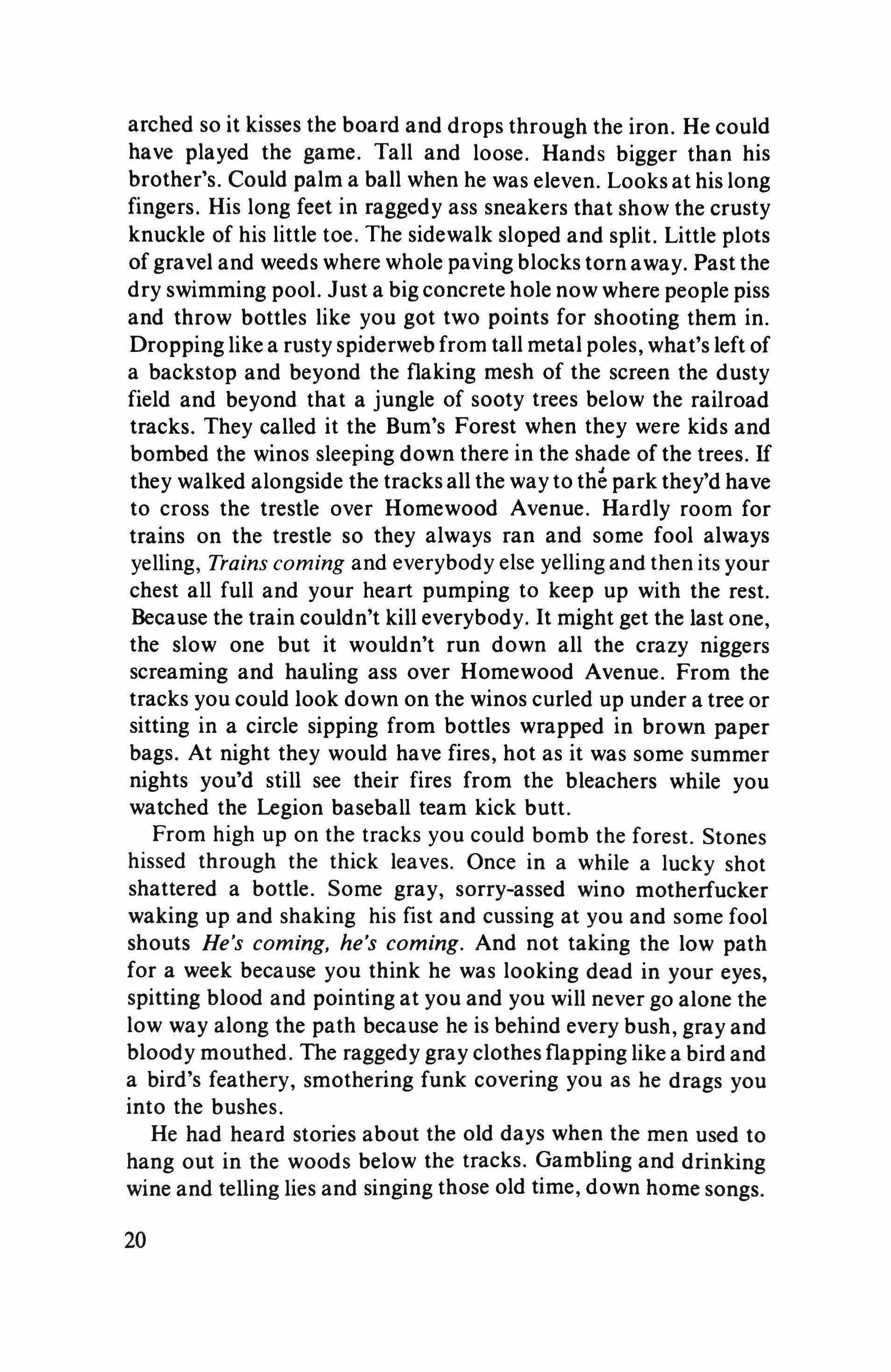
arched so it kisses the board and drops through the iron. He could have played the game. Tall and loose. Hands bigger than his brother's. Could palm a ball when he was eleven. Looks at his long fingers. His long feet in raggedy ass sneakers that show the crusty knuckle of his little toe. The sidewalk sloped and split. Little plots of gravel and weeds where whole paving blocks torn away. Past the dry swimming pool. Just a big concrete hole now where people piss and throw bottles like you got two points for shooting them in. Dropping like a rusty spiderweb from tall metal poles, what's left of a backstop and beyond the flaking mesh of the screen the dusty field and beyond that a jungle of sooty trees below the railroad tracks. They called it the Bum's Forest when they were kids and bombed the winos sleeping down there in the shade of the trees. If they walked alongside the tracks all the way to the park they'd have to cross the trestle over Homewood Avenue. Hardly room for trains on the trestle so they always ran and some fool always yelling, Trains coming and everybody else yelling and then its your chest all full and your heart pumping to keep up with the rest. Because the train couldn't kill everybody. It might get the last one, the slow one but it wouldn't run down all the crazy niggers screaming and hauling ass over Homewood Avenue. From the tracks you could look down on the winos curled up under a tree or sitting in a circle sipping from bottles wrapped in brown paper bags. At night they would have fires, hot as it was some summer nights you'd still see their fires from the bleachers while you watched the Legion baseball team kick butt.
From high up on the tracks you could bomb the forest. Stones hissed through the thick leaves. Once in a while a lucky shot shattered a bottle. Some gray, sorry-assed wino motherfucker waking up and shaking his fist and cussing at you and some fool shouts He's coming, he's coming. And not taking the low path for a week because you think he was looking dead in your eyes, spitting blood and pointing at you and you will never go alone the low way along the path because he is behind every bush, gray and bloody mouthed. The raggedy gray clothes flapping like a bird and a bird's feathery, smothering funk covering you as he drags you into the bushes.
He had heard stories about the old days when the men used to hang out in the woods below the tracks. Gambling and drinking wine and telling lies and singing those old time, down home songs.

Hang out there in the summer and when it got cold they'd loaf in the Bucket of Blood, on the corner of Frankstown and Tioga. His granddaddy was in the stories. Old John French one ofthe baddest dudes ever walked these Homewood streets. Old, big-hat John French. They said his granddaddy could sing and nowhisjitterbug father up in the choir of Homewood A.M.E. Zion next to Mrs. Washington who hits those high notes. He was his father's son, people said. Singing all the time and running the streets like his daddy did till his daddy got too old and got saved. Tenor lead of Commodores. Everybody saying the Commodores was the baddest group. If that cat hadn't fucked us over with the record we might have made the big time. Achmet backing us on the conga. Tito on bongos. Tear up the park. Stone tear it up. Little kids and old folks all gone home and ain't nobody in the park but who supposed to be and you got your old lady on the side listening or maybe you singing pretty to pull some new fly bitch catch your eye in the crowd. It all comes down, comes together mellow and fine sometimes. The drums, the smoke, the sun going down and you out there flying and the Commodores steady taking care of business behind your lead.
"You got to go to church. I'm not asking I'm telling. Now you get those shoes shined and I don't want to hear another word out of you, young man." She is ironing his Sunday shirt hot and stiff. She hums along with the gospel songs on the radio. "Don't make me send you to your father." Who is in the bathroom for the half hour he takes doing whatever to get hisself together. Makingeverybody else late. Singing in there while he shaves. You don't want to be the next one after him. "You got five minutes, boy. Five minutes and your teeth better be clean and your hands and face shining." Gagging in the funkybathroom, not wanting to take a breath. How you supposed to brush your teeth, the catjust shit in there. "You're going to church this week and every week. This is my time and don't you try and spoil it, boy. Don't you get no attitude and try to spoil church for me." He is in the park now, sweating in the heat, a man now, but he can hear his mother's voice plain as day, filling up all the empty space around him just as it did in the house on Finance Street. She'd talk them all to church every Sunday. Use her voice like a club to beat everybody out the house. His last time in church was a Thursday. They had the scaffolding
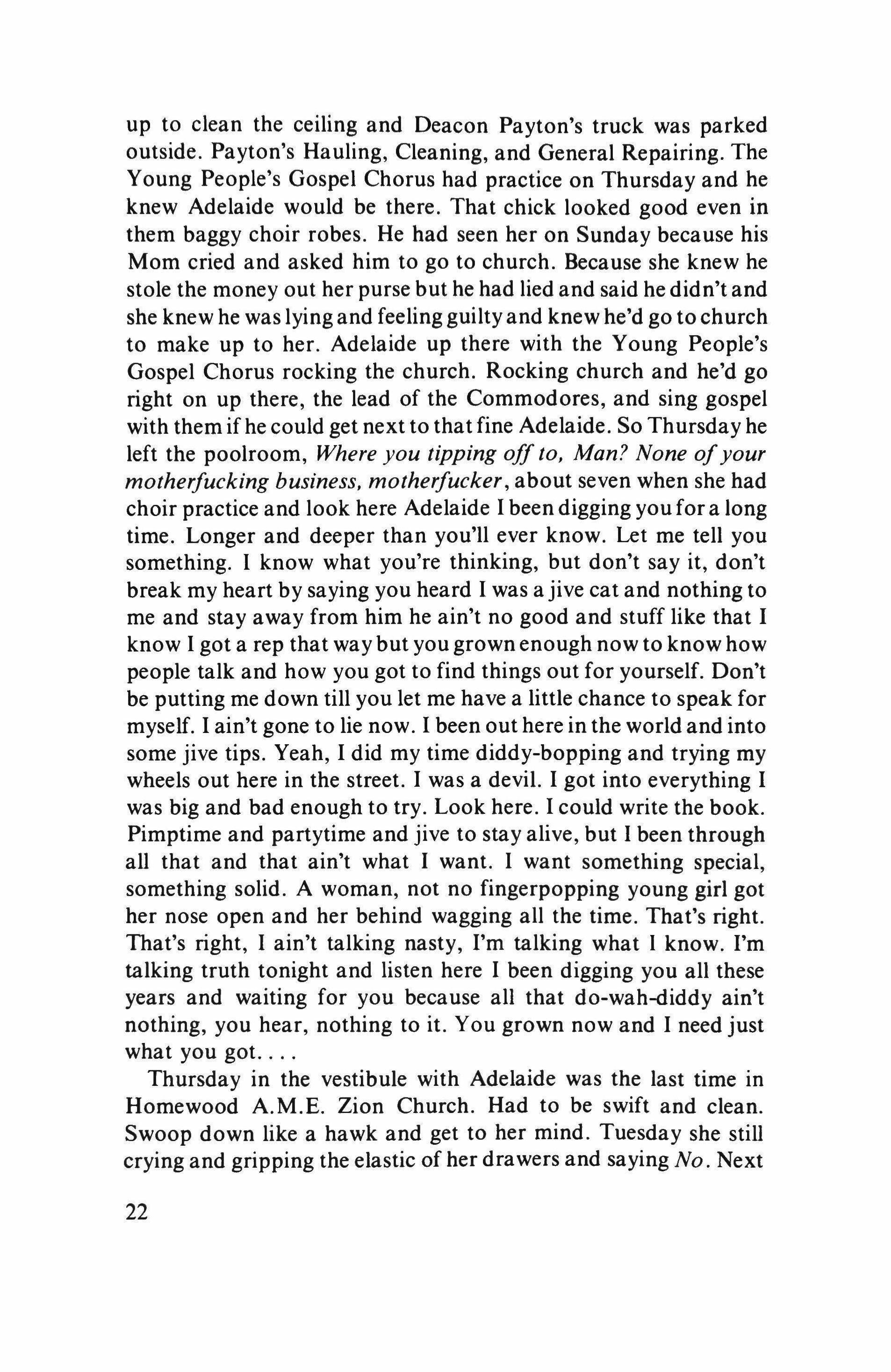
up to clean the ceiling and Deacon Payton's truck was parked outside. Payton's Hauling, Cleaning, and General Repairing. The Young People's Gospel Chorus had practice on Thursday and he knew Adelaide would be there. That chick looked good even in them baggy choir robes. He had seen her on Sunday because his Mom cried and asked him to go to church. Because she knew he stole the money out her purse but he had lied and said he didn't and she knew he was lying and feelingguilty and knew he'd go to church to make up to her. Adelaide up there with the Young People's Gospel Chorus rocking the church. Rocking church and he'd go right on up there, the lead of the Commodores, and sing gospel with them if he could get next to that fine Adelaide. So Thursday he left the poolroom, Where you tipping off to, Man? None ofyour motherfucking business, motherfucker, about seven when she had choir practice and look here Adelaide I been digging you for a long time. Longer and deeper than you'll ever know. Let me tell you something. I know what you're thinking, but don't say it, don't break my heart by saying you heard I was a jive cat and nothing to me and stay away from him he ain't no good and stuff like that I know I got a rep that way but you grown enough now to know how people talk and how you got to find things out for yourself. Don't be putting me down till you let me have a little chance to speak for myself. I ain't gone to lie now. I been out here in the world and into some jive tips. Yeah, I did my time diddy-bopping and trying my wheels out here in the street. I was a devil. I got into everything I was big and bad enough to try. Look here. I could write the book. Pimptime and partytime and jive to stay alive, but I been through all that and that ain't what I want. I want something special, something solid. A woman, not no fingerpopping young girl got her nose open and her behind wagging all the time. That's right. That's right, I ain't talking nasty, I'm talking what I know. I'm talking truth tonight and listen here I been digging you all these years and waiting for you because all that do-wah-diddy ain't nothing, you hear, nothing to it. You grown now and I need just what you got.
Thursday in the vestibule with Adelaide was the last time in Homewood A.M.E. Zion Church. Had to be swift and clean. Swoop down like a hawk and get to her mind. Tuesday she still crying and gripping the elastic of her drawers and saying No. Next
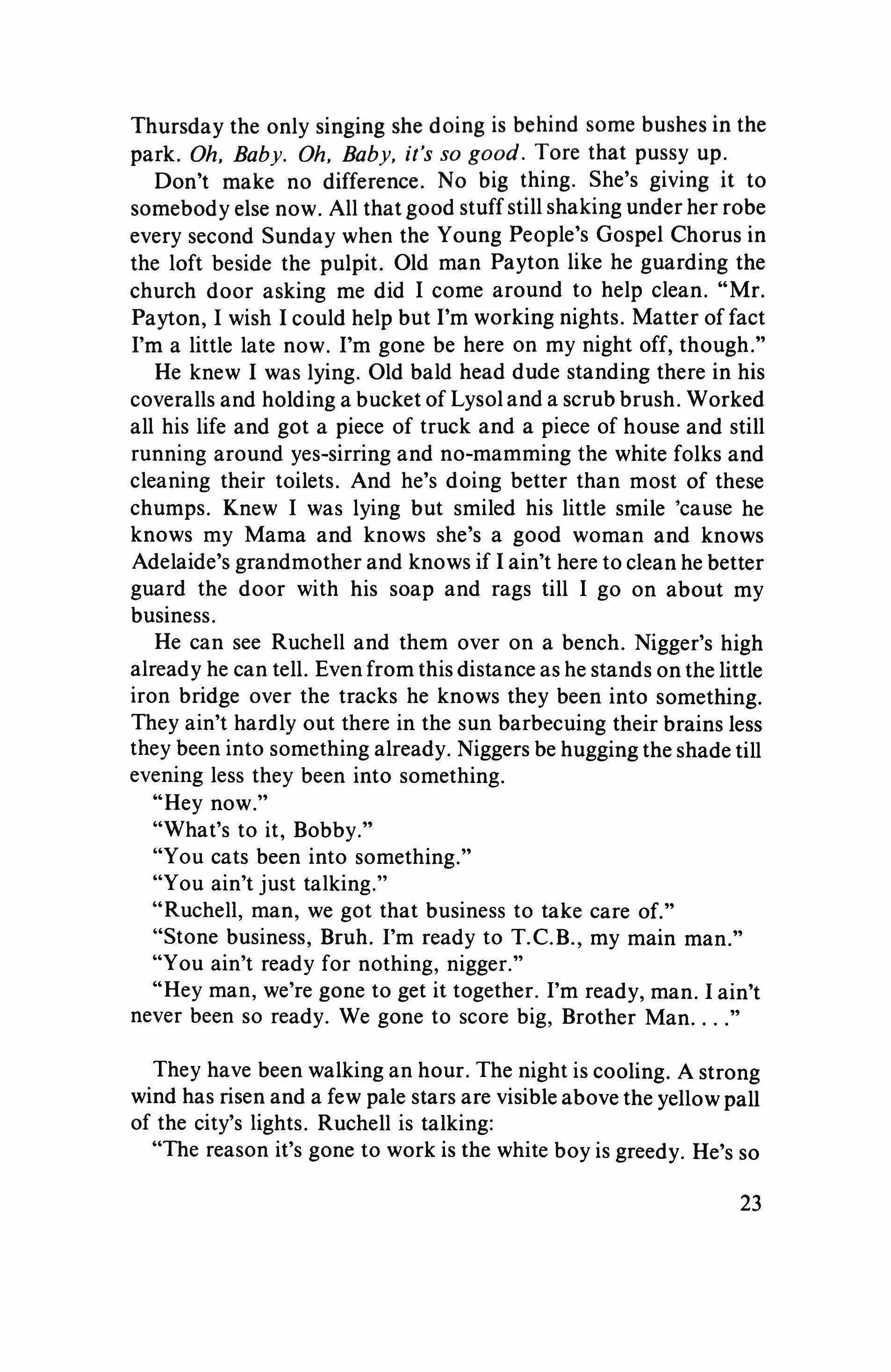
Thursday the only singing she doing is behind some bushes in the park. Oh, Baby. Oh, Baby, it's so good. Tore that pussy up. Don't make no difference. No big thing. She's giving it to somebody else now. All that good stuff still shaking under her robe every second Sunday when the Young People's Gospel Chorus in the loft beside the pulpit. Old man Payton like he guarding the church door asking me did I come around to help clean. "Mr. Payton, I wish I could help but I'm working nights. Matter of fact I'm a little late now. I'm gone be here on my night off, though."
He knew I was lying. Old bald head dude standing there in his coveralls and holding a bucket of Lysol and a scrub brush. Worked all his life and got a piece of truck and a piece of house and still running around yes-sirring and no-mamming the white folks and cleaning their toilets. And he's doing better than most of these chumps. Knew I was lying but smiled his little smile 'cause he knows my Mama and knows she's a good woman and knows Adelaide's grandmother and knows if I ain't here to clean he better guard the door with his soap and rags till I go on about my business.
He can see Ruchell and them over on a bench. Nigger's high already he can tell. Even from this distance as he stands on the little iron bridge over the tracks he knows they been into something. They ain't hardly out there in the sun barbecuing their brains less they been into something already. Niggers be hugging the shade till evening less they been into something.
"Hey now."
"What's to it, Bobby."
"You cats been into something."
"You ain't just talking."
"Ruchell, man, we got that business to take care of."
"Stone business, Bruh. I'm ready to T.e.B., my main man."
"You ain't ready for nothing, nigger."
"Hey man, we're gone to get it together. I'm ready, man. I ain't never been so ready. We gone to score big, Brother Man
They have been walking an hour. The night is cooling. A strong wind has risen and a few pale stars are visible above the yellowpall of the city's lights. Ruchell is talking:
"The reason it's gone to work is the white boy is greedy. He's so
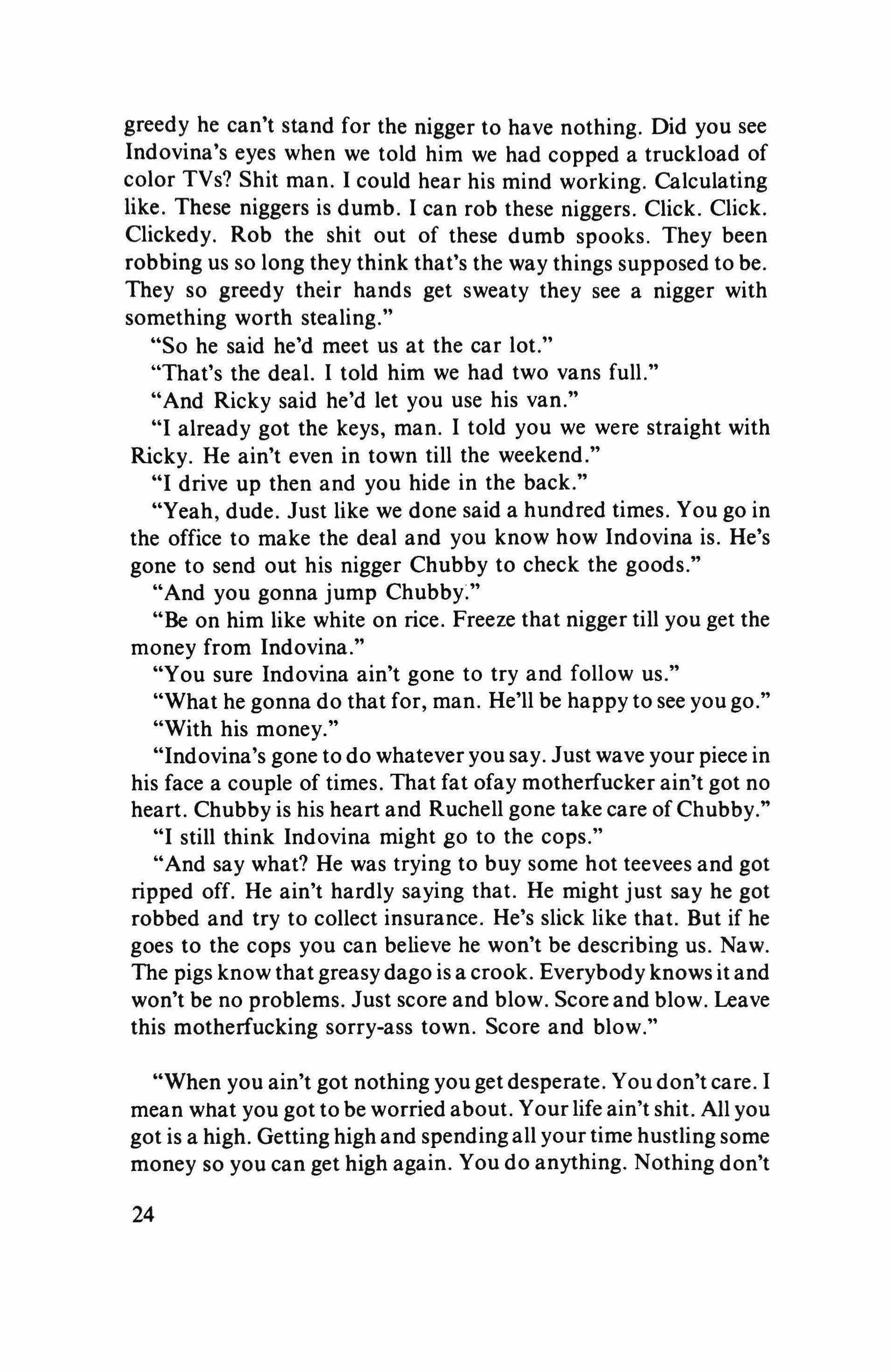
greedy he can't stand for the nigger to have nothing. Did you see Indovina's eyes when we told him we had copped a truckload of color TVs? Shit man. I could hear his mind working. Calculating like. These niggers is dumb. I can rob these niggers. Click. Click. Clickedy. Rob the shit out of these dumb spooks. They been robbing us so long they think that's the way things supposed to be. They so greedy their hands get sweaty they see a nigger with something worth stealing."
"So he said he'd meet us at the car lot."
"That's the deal. I told him we had two vans full."
"And Ricky said he'd let you use his van."
"I already got the keys, man. I told you we were straight with Ricky. He ain't even in town till the weekend."
"I drive up then and you hide in the back."
"Yeah, dude. Just like we done said a hundred times. You go in the office to make the deal and you know how Indovina is. He's gone to send out his nigger Chubby to check the goods."
"And you gonna jump Chubby."
"Be on him like white on rice. Freeze that nigger till you get the money from Indovina."
"You sure Indovina ain't gone to try and follow us."
"What he gonna do that for, man. He'll be happy to see you go."
"With his money."
"Indovina's gone to do whatever you say. Just wave your piece in his face a couple of times. That fat ofay motherfucker ain't got no heart. Chubby is his heart and Ruchell gone take care of Chubby."
"I still think Indovina might go to the cops."
"And say what? He was trying to buy some hot teevees and got ripped off. He ain't hardly saying that. He might just say he got robbed and try to collect insurance. He's slick like that. But if he goes to the cops you can believe he won't be describing us. Naw. The pigs know that greasy dago is a crook. Everybody knows it and won't be no problems. Just score and blow. Score and blow. Leave this motherfucking sorry-ass town. Score and blow."
"When you ain't got nothing you get desperate. You don't care. I mean what you got to be worried about. Your life ain't shit. All you got is a high. Getting high and spending all your time hustling some money so you can get high again. You do anything. Nothing don't

matter. You just take, take, take whatever you can get your hands on. Pretty soon nothing don't matter, John. Youjust got to get that high. And everybody around you the same way. Don't make no difference. You steal a little something. If you get away with it, you try it again. Then something bigger. You get holt to a piece. Other dudes carry a piece. Lots of dudes out there holding something. So you get it and start to carrying it. What's it matter. You ain't nowhere anywhere. Ain't got nothing. Nothing to look forward to but a high. A man needs something. A little money in his pocket. I mean you see people around you and on TV and shit. Man, they got everything. Cars and clothes. They can do something for a woman. They got something. And you look at yourself in the mirror you're going nowhere. Not a penny in your pocket. Your own people disgusted with you. Begging around your family like a little kid or something. Andjail and stealing money from your own mama. You get desperate. You do what you have to do."
The wind is up again that night. September third. At the stoplight Bobby stares at the big sign on the boulevard. A smiling duke emptying a glass of beer. The time and temperature flash beneath the nobleman's uniformed chest. Ricky had installed a tape deck into the dash. A tangle of wires drooped from its guts, but the sound was good. One speaker for the cab, the other for the partitioned-off rear where Ruchell was sitting on the rolls of uncut carpeting. Al Green singing Call Me. Ricky could do things. He made his own tapes; he was customizing the delivery van. Next summer Ricky was driving to California. Fixing up the van so he could live in it. The dude was good with his hands. He had been a mechanic in the war. Government paid him for the shattered knee. Ricky said, Got me a new knee now. Got a four wheeled knee that's gonna ride me away from all this mess. The disability money paid for the van and the customizing and the stereo tape deck. Ricky would always have that limp but the cat was getting hisself together.
Flags were strung across the entrance to the used car lot. The wind made them pop and dance. Rows and rows of cars looking clean and new under the lights. Bobby parked on the street, in the deep shadow at the far end of Indovina's glowing corner.
"Hey, Chubby."
"What's happening now." Chubby's shoulders wide as the door.

He was Indovina's nigger all the way. Had his head laid back so far on his neck it's like he's looking at you through his nose holes instead of his eyes.
"You got the merchandise." Indovina's fingers drum the desk.
"You got the money."
"Ain't your money yet. I thought you said two vans full."
"I can't drive but one at a time. My partner's at a phone booth right now. I got the number here. You show me the bread and he'll bring the rest."
"I want to see them all before I give you a penny."
"Look, Mr. Indovina. This ain't no bullshit tip. We got the stuff, alright. Good stuff like I said. Sony portables. All the same still in the boxes."
"Let's go look."
"I want to see some bread first."
"Give Chubby your key. Chubby, check it out. Count them. Make sure the cartons ain't broke open."
"I want to see some bread."
"Bread. Bread. My cousin DeLuca runs a bakery. I don't deal with bread. I got money. See. That's money in my hand. I got plenty money buy your television sets buy your vans buy you."
"Just trying to do square business, Mr. Indovina."
"Don't forget to check the cartons. Make sure they're sealed."
Somebody must be down. Ruchell or Chubbydown. Bobby had heard two shots. He sees himself in the plate glass window. In a fishbowl and patches of light gliding past. Except where the floodlights are trained, the darkness outside is impenetrable. He cannot see past his image in the glass, past the rushes of light slicing through his body.
"Turn out the goddamn light."
"You kill me you be sorry kill me you be real sorry if one of them dead out there it's just one nigger kill another nigger you kill me you be sorry you killing a white man
Bobby's knee skids on the desk and he slams the gun across the man's fat, sweating face with all the force of his lunge. He is scrambling over the desk, scattering paperandjunk, looking down on Indovina's white shirt, his hairy arms folded over his head. He is thinking of the shots. Thinking that everything is wrong. The shots,
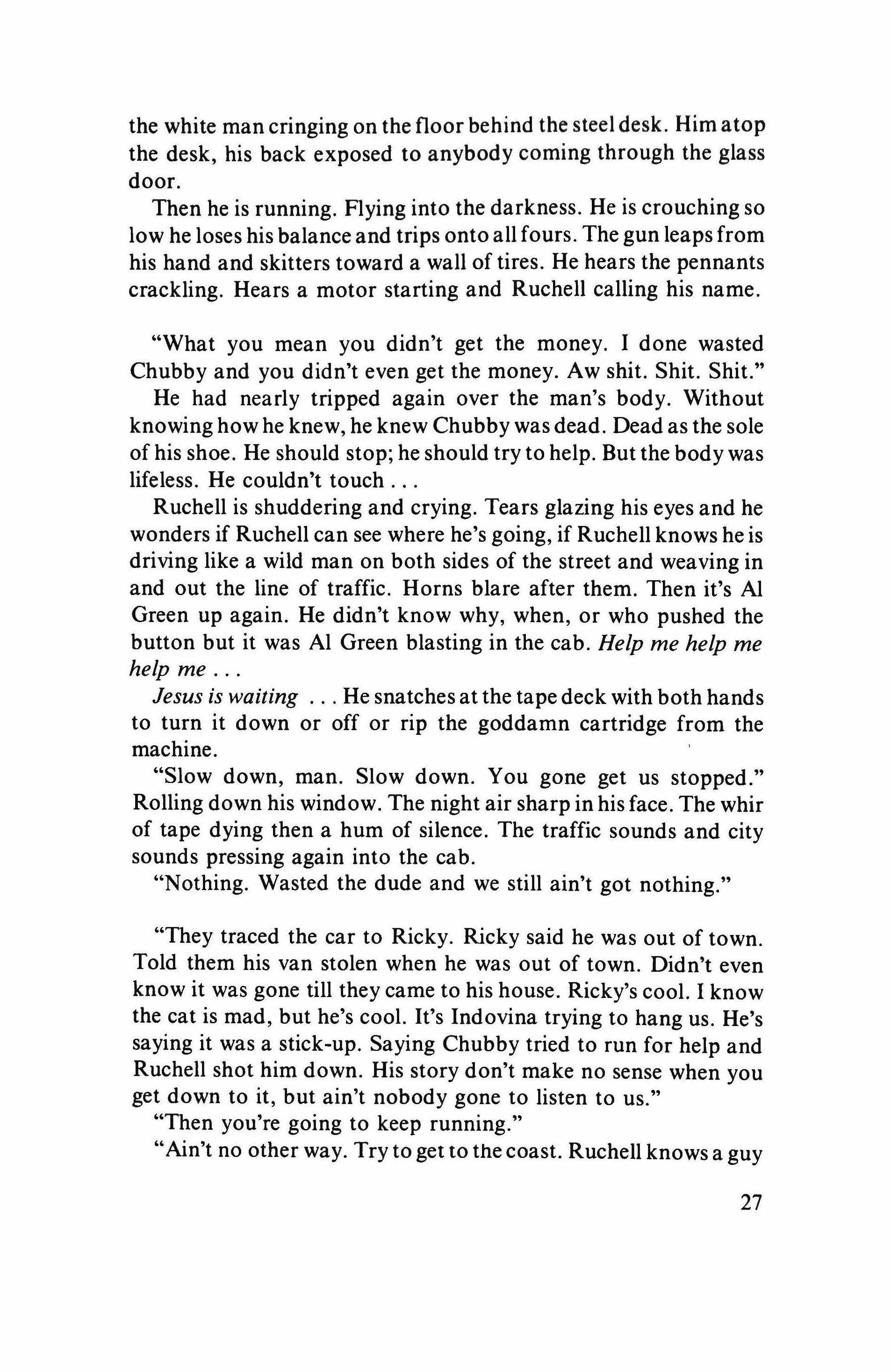
the white man cringing on the floor behind the steel desk. Him atop the desk, his back exposed to anybody coming through the glass door.
Then he is running. Flying into the darkness. He is crouching so low he loses his balance and trips onto all fours. The gun leaps from his hand and skitters toward a wall of tires. He hears the pennants crackling. Hears a motor starting and Ruchell calling his name.
"What you mean you didn't get the money. I done wasted Chubby and you didn't even get the money. Aw shit. Shit. Shit."
He had nearly tripped again over the man's body. Without knowing how he knew, he knew Chubby was dead. Dead as the sole of his shoe. He should stop; he should try to help. But the body was lifeless. He couldn't touch
Ruchell is shuddering and crying. Tears glazing his eyes and he wonders if Ruchell can see where he's going, if Ruchell knows he is driving like a wild man on both sides of the street and weaving in and out the line of traffic. Horns blare after them. Then it's Al Green up again. He didn't know why, when, or who pushed the button but it was Al Green blasting in the cab. Help me help me help me
Jesus is waiting He snatches at the tape deck with both hands to turn it down or off or rip the goddamn cartridge from the machine.
"Slow down, man. Slow down. You gone get us stopped." Rolling down his window. The night air sharp in his face. The whir of tape dying then a hum of silence. The traffic sounds and city sounds pressing again into the cab.
"Nothing. Wasted the dude and we still ain't got nothing."
"They traced the car to Ricky. Ricky said he was out of town. Told them his van stolen when he was out of town. Didn't even know it was gone till they came to his house. Ricky's cool. I know the cat is mad, but he's cool. It's Indovina trying to hang us. He's saying it was a stick-up. Saying Chubby tried to run for help and Ruchell shot him down. His story don't make no sense when you get down to it, but ain't nobody gone to listen to us."
"Then you're going to keep running."
"Ain't no other way. Try to get to the coast. Ruchell knows a guy
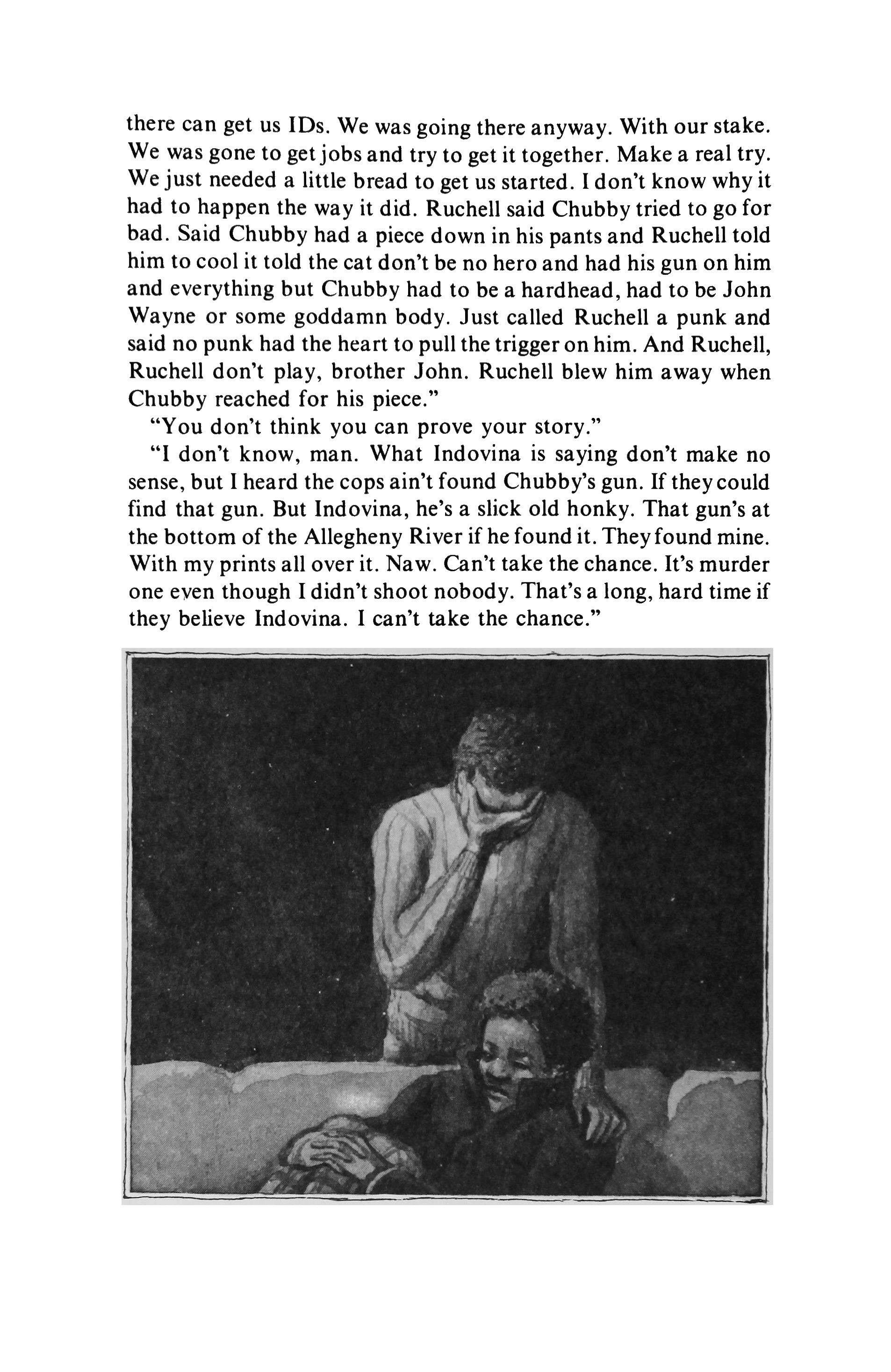
there can get us IDs. We was going there anyway. With our stake. We was gone to get jobs and try to get it together. Make a real try. We just needed a little bread to get us started. I don't know why it had to happen the way it did. Ruchell said Chubby tried to go for bad. Said Chubby had a piece down in his pants and Ruchell told him to cool it told the cat don't be no hero and had his gun on him and everything but Chubby had to be a hardhead, had to be John Wayne or some goddamn body. Just called Ruchell a punk and said no punk had the heart to pull the trigger on him. And Ruchell, Ruchell don't play, brother John. Ruchell blew him away when Chubby reached for his piece."
"You don't think you can prove your story."
"I don't know, man. What Indovina is saying don't make no sense, but I heard the cops ain't found Chubby's gun. If they could find that gun. But Indovina, he's a slick old honky. That gun's at the bottom of the Allegheny River if he found it. They found mine. With my prints all over it. Naw. Can't take the chance. It's murder one even though I didn't shoot nobody. That's a long, hard time if they believe Indovina. I can't take the chance."

"Be careful, Bobby. You're a fugitive. Cops out here think they're Wyatt Earp and Marshal Dillon. They shoot first and maybe ask questions later. They still play wild, wild west out here."
"I hear you. But I'd rather take my chances that way. Rather they carry me back in a box than go back to prison. It's hard out there, brother. Real hard. I'm happy you got out. One of us got out anyway."
"Think about it. Take your time. You can stay here as long as you need to. There's plenty of room."
"We gotta go. See Ruchell's cousin in Denver. Get us a little stake, then make our run."
"I'll give you what 1 can if that's what you have to do. But sleep on it. Let's talk again in the morning."
"It's good to see you, man. And the kids and your old lady. At least we had this one evening. Being on the run can drive you crazy."
"Everybody was happy to see you. I knew you'd come. You've been heavy on my mind since yesterday. I wrote a kind of letter to you then. I knew you'd come. But get some sleep now we'll talk in the morning."
"Listen, brother John. I'm sorry, man. I'm really sorry I had to come here like this. You sure your wife ain't mad."
"I'm telling you it's OK. She's as glad to see you as I am. And you can stay both of us want you to stay."
"Running can drive you crazy. From the time I wake in the morning till I go to bed at night, all I can think about is getting away. My head ain't been right since it happened."
"When's the last time you talked to anybody at home."
"It's been a couple weeks. They probably watching people back there. Might even be watching you. That's why I can't stay. Got to keep moving till we get to the coast. I'm sorry, man. I mean nobody was supposed to die. It was easy. We thought we had a perfect plan. Thieves robbing thieves. Just score and blow like Ruchell said. It was our chance and we had to take it. But nobody was supposed to get hurt. I'd be dead now if it was me Chubby pulled on. I couldn'a just looked in somebody's face and blown them away. But Ruchell don't play. And everybody at home I know how they must feel. It was all over TV and the papers. Had our names and where we lived and everything. Goddamn mug shots in the Post-Gazette. Looking like two gorillas. I know it's hurting people. In a way I
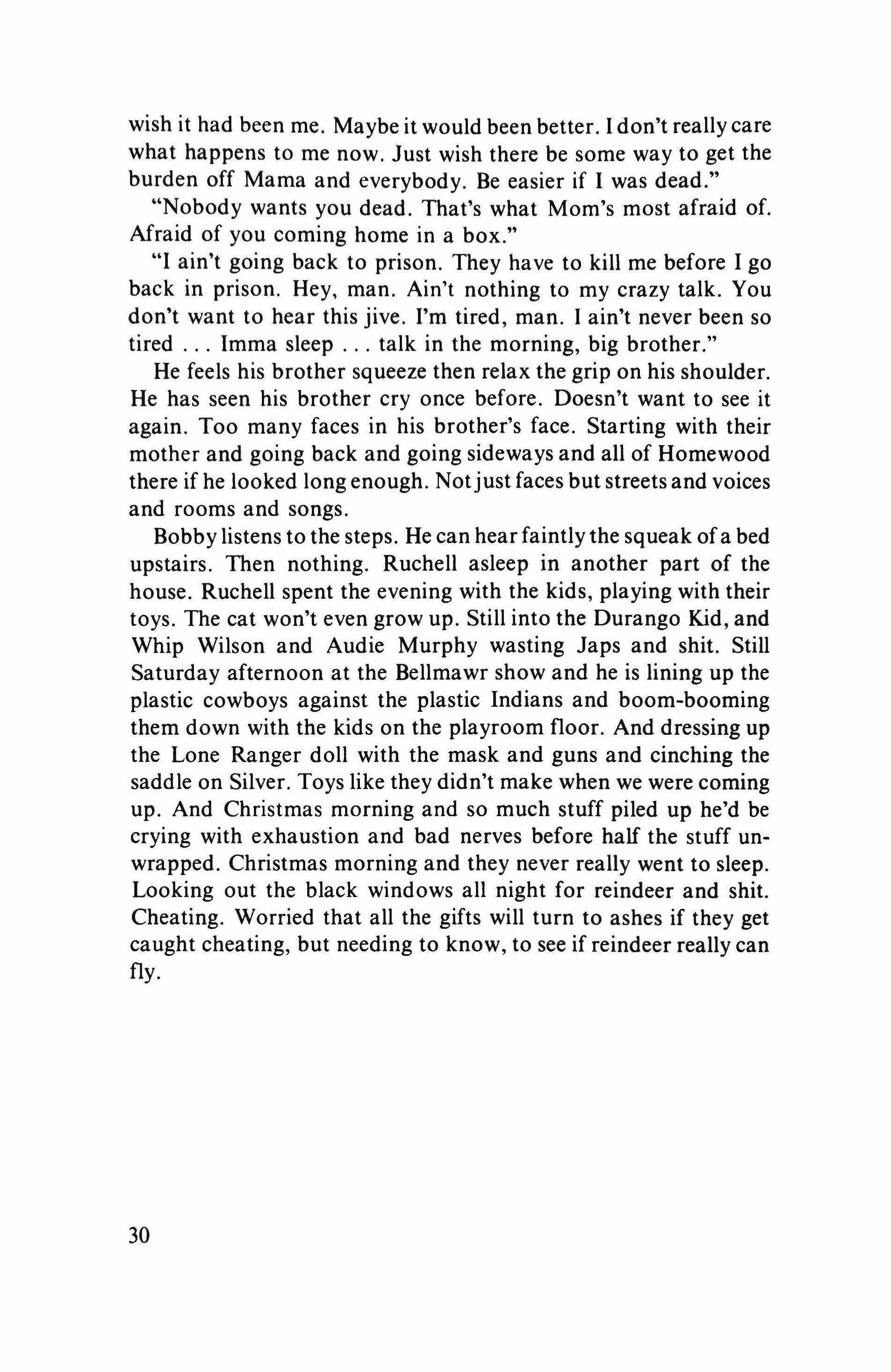
wish it had been me. Maybe it would been better. 1 don't really care what happens to me now. Just wish there be some way to get the burden off Mama and everybody. Be easier if I was dead."
"Nobody wants you dead. That's what Mom's most afraid of. Afraid of you coming home in a box."
"I ain't going back to prison. They have to kill me before I go back in prison. Hey, man. Ain't nothing to my crazy talk. You don't want to hear this jive. I'm tired, man. 1 ain't never been so tired Imma sleep talk in the morning, big brother."
He feels his brother squeeze then relax the grip on his shoulder. He has seen his brother cry once before. Doesn't want to see it again. Too many faces in his brother's face. Starting with their mother and going back and going sideways and all of Homewood there if he looked long enough. Notjust faces but streets and voices and rooms and songs.
Bobby listens to the steps. He can hear faintly the squeak of a bed upstairs. Then nothing. Ruchell asleep in another part of the house. Ruchell spent the evening with the kids, playing with their toys. The cat won't even grow up. Still into the Durango Kid, and Whip Wilson and Audie Murphy wasting Japs and shit. Still Saturday afternoon at the Bellmawr show and he is lining up the plastic cowboys against the plastic Indians and boom-booming them down with the kids on the playroom floor. And dressing up the Lone Ranger doll with the mask and guns and cinching the saddle on Silver. Toys like they didn't make when we were coming up. And Christmas morning and so much stuff piled up he'd be crying with exhaustion and bad nerves before half the stuff unwrapped. Christmas morning and they never really went to sleep. Looking out the black windows all night for reindeer and shit. Cheating. Worried that all the gifts will turn to ashes if they get caught cheating, but needing to know, to see if reindeer really can fly.

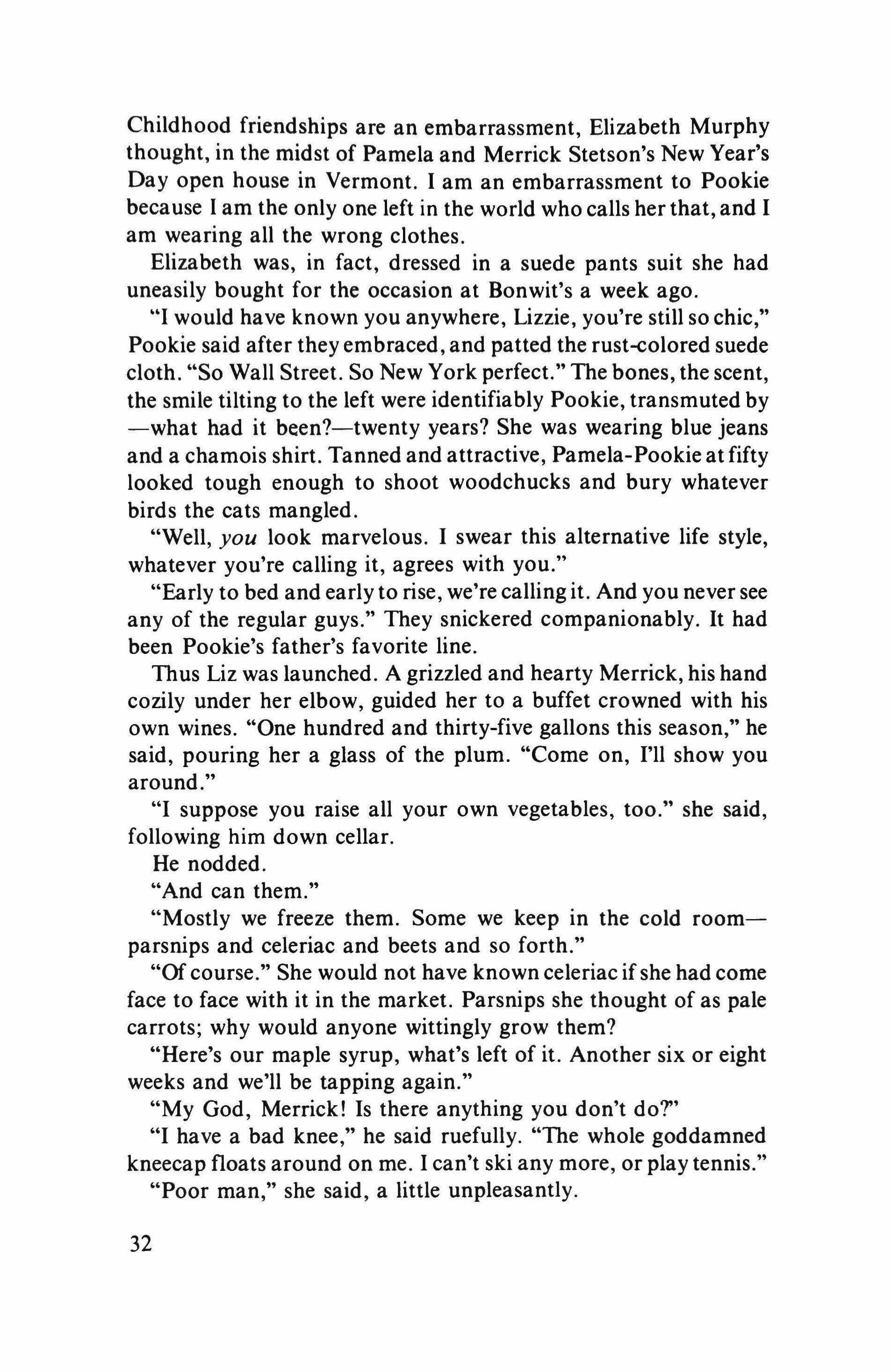
Childhood friendships are an embarrassment, Elizabeth Murphy thought, in the midst of Pamela and Merrick Stetson's New Year's Day open house in Vermont. I am an embarrassment to Pookie because I am the only one left in the world who calls her that, and I am wearing all the wrong clothes.
Elizabeth was, in fact, dressed in a suede pants suit she had uneasily bought for the occasion at Bonwit's a week ago.
"I would have known you anywhere, Lizzie, you're still so chic," Pookie said after they embraced, and patted the rust-colored suede cloth. "So Wall Street. So New York perfect." The bones, the scent, the smile tilting to the left were identifiably Pookie, transmuted by -what had it been?-twenty years? She was wearing blue jeans and a chamois shirt. Tanned and attractive, Pamela-Pookie at fifty looked tough enough to shoot woodchucks and bury whatever birds the cats mangled.
"Well, you look marvelous. I swear this alternative life style, whatever you're calling it, agrees with you."
"Early to bed and early to rise, we're calling it. And you never see any of the regular guys." They snickered companionably. It had been Pookie's father's favorite line.
Thus Liz was launched. A grizzled and hearty Merrick, his hand cozily under her elbow, guided her to a buffet crowned with his own wines. "One hundred and thirty-five gallons this season," he said, pouring her a glass of the plum. "Come on, I'll show you around."
"I suppose you raise all your own vegetables, too." she said, following him down cellar.
He nodded.
"And can them."
"Mostly we freeze them. Some we keep in the cold roomparsnips and celeriac and beets and so forth."
"Of course." She would not have known celeriac if she had come face to face with it in the market. Parsnips she thought of as pale carrots; why would anyone wittingly grow them?
"Here's our maple syrup, what's left of it. Another six or eight weeks and we'll be tapping again."
"My God, Merrick! Is there anything you don't do?"
"I have a bad knee," he said ruefully. "The whole goddamned kneecap floats around on me. I can't ski any more, or play tennis."
"Poor man," she said, a little unpleasantly.
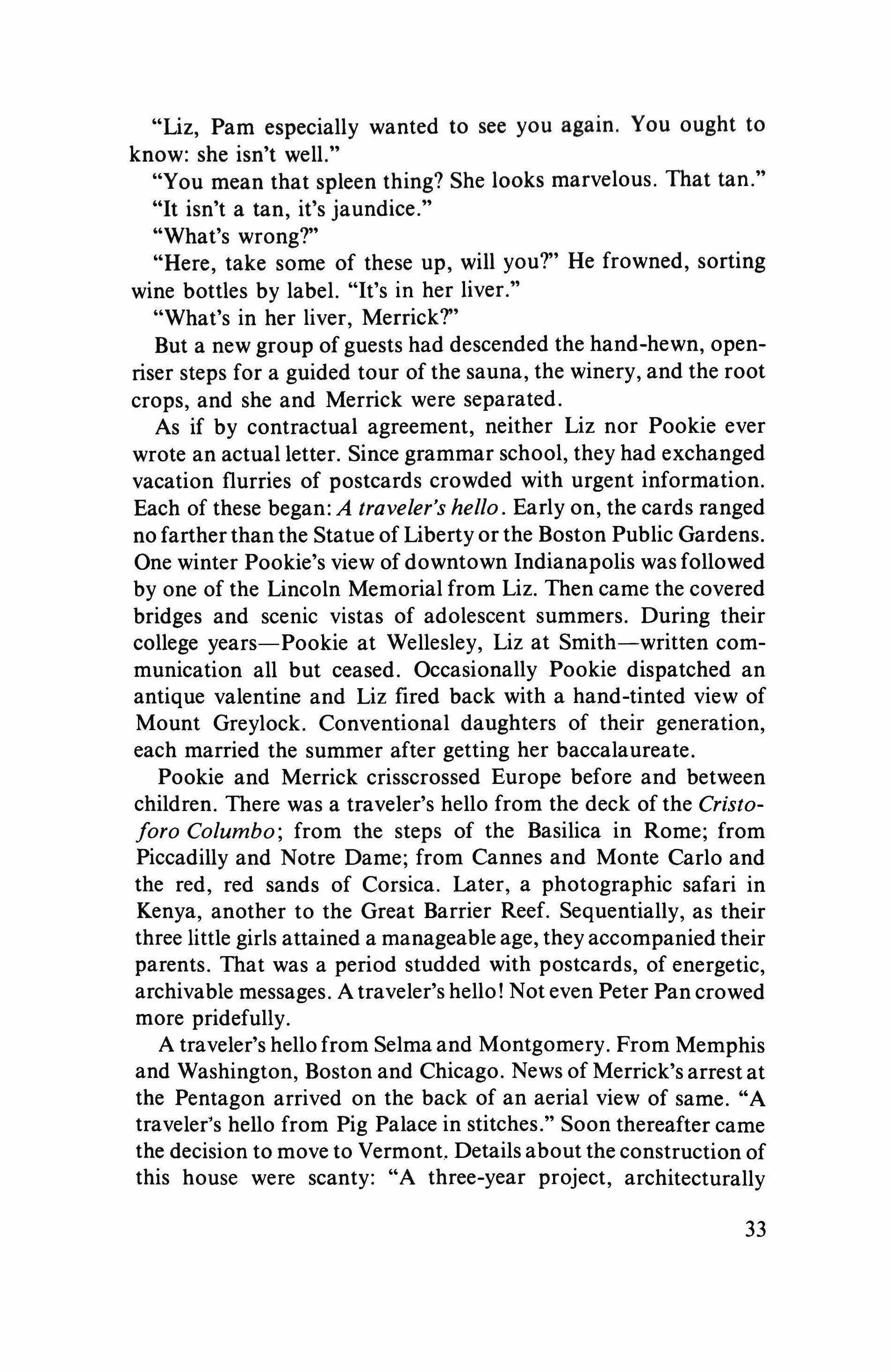
"Liz, Pam especially wanted to see you again. You ought to know: she isn't well."
"You mean that spleen thing? She looks marvelous. That tan."
"It isn't a tan, it's jaundice."
"What's wrong?"
"Here, take some of these up, will you?" He frowned, sorting wine bottles by label. "It's in her liver."
"What's in her liver, Merrick?"
But a new group of guests had descended the hand-hewn, openriser steps for a guided tour of the sauna, the winery, and the root crops, and she and Merrick were separated.
As if by contractual agreement, neither Liz nor Pookie ever wrote an actual letter. Since grammar school, they had exchanged vacation flurries of postcards crowded with urgent information. Each of these began: A traveler's hello. Early on, the cards ranged no farther than the Statue of Liberty or the Boston Public Gardens. One winter Pookie's view of downtown Indianapolis was followed by one of the Lincoln Memorial from Liz. Then came the covered bridges and scenic vistas of adolescent summers. During their college years-Pookie at Wellesley, Liz at Smith-written communication all but ceased. Occasionally Pookie dispatched an antique valentine and Liz fired back with a hand-tinted view of Mount Greylock. Conventional daughters of their generation, each married the summer after getting her baccalaureate.
Pookie and Merrick crisscrossed Europe before and between children. There was a traveler's hello from the deck of the Cristofaro Columbo; from the steps of the Basilica in Rome; from Piccadilly and Notre Dame; from Cannes and Monte Carlo and the red, red sands of Corsica. Later, a photographic safari in Kenya, another to the Great Barrier Reef. Sequentially, as their three little girls attained a manageable age, they accompanied their parents. That was a period studded with postcards, of energetic, archivable messages. A traveler's hello! Not even Peter Pan crowed more pridefully.
A traveler's hello from Selma and Montgomery. From Memphis and Washington, Boston and Chicago. News of Merrick's arrest at the Pentagon arrived on the back of an aerial view of same. "A traveler's hello from Pig Palace in stitches." Soon thereafter came the decision to move to Vermont. Details about the construction of this house were scanty: "A three-year project, architecturally

incorrect. Experts all say too many wings." With every card, a renewed invitation to Liz to pay a visit.
Liz countered with art reproductions from the Metropolitan gift shop, and views of Wall Street. She kept a dozen of these in her desk, for fast retorts. This year, she vowed, she would go to Vermont.
And then in November a postcard from Pookie from Hanover, a view of Dartmouth College. "A traveler's hello from the northern branch of the Ivy League. I'm here to have my spleen out. Nothing serious, but what will I vent with now?"
Pookie and Liz had been friends since first grade at the Parker School, in suburban Philadelphia. All through grammar school they had been fierce, unabashed best friends, resisting any separation. Pookie had a dollhouse, an exact replica ofthe house she lived in, with nine handsomely proportioned rooms and a portico of white pillars. Behind Pookie's house lay a rose garden of sorts and a lawn for croquet. Liz's house, three blocks away, leaned against a corner grocery and fronted on trolley tracks. The local fire station loomed behind. Pookie's sidewalk was best for roller skating, Liz's third-floor back porch for spying on the firemen through Pookie's father's binoculars.
The social differences, Liz had found herself thinking as she trudged up the serpentine walk to the huge cedar country house with wings-the social differences weren't even noticed until about sixth grade. "Don't envy me," Pookie had warned her once they were in high school, once it was a matter of cars and clothes and leisure-time activities. "I can't bear it if you envy me. None of it is my fault."
But how Pookie had envied the beer-and-pizza kitchen of Liz's brown house, the noisycomings and goings ofuncles no older than Liz's brothers. The all-time sad, singable lyrics on the Stromberg Carlson, causing the bedroom floor above to vibrate with the bass notes. How Pookie had admired the trolleys that squealed and shot blue sparks under the windows all nightlong, theirlighted interiors revealing the solitary, late traveler who excited her imagination. And how, on the frequent weekends she was allowed to stay over, Pookie had adored the shrieking of the fire alarm, the scramble of men and equipment, the terrifying siren that punctured all workaday sounds or, even better, shattered the diminished murmur of
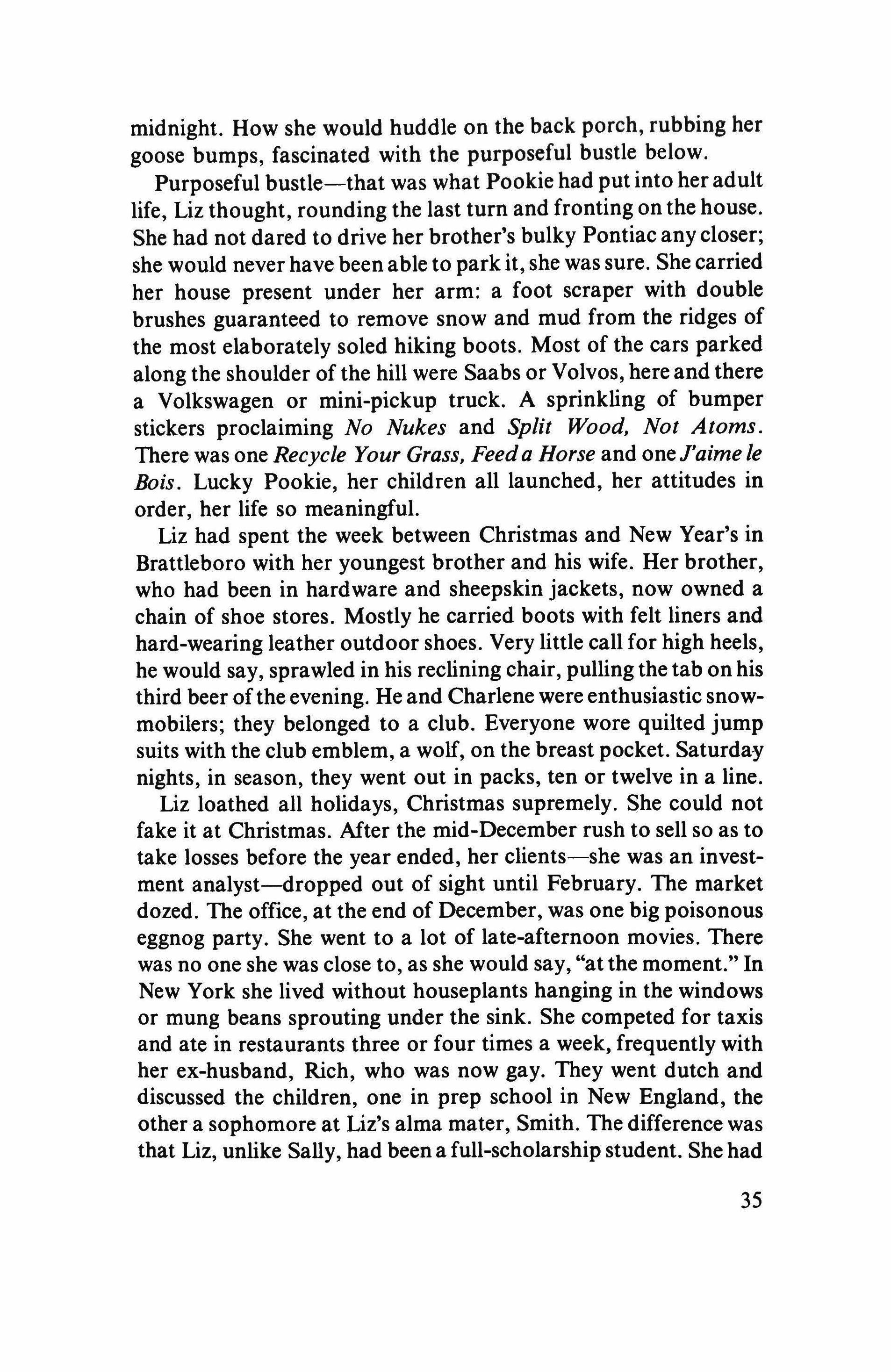
midnight. How she would huddle on the back porch, rubbing her goose bumps, fascinated with the purposeful bustle below.
Purposeful bustle-that was what Pookie had put into her adult life, Liz thought, rounding the last turn and fronting on the house. She had not dared to drive her brother's bulky Pontiac any closer; she would never have been able to park it, she was sure. She carried her house present under her arm: a foot scraper with double brushes guaranteed to remove snow and mud from the ridges of the most elaborately soled hiking boots. Most of the cars parked along the shoulder of the hill were Saabs or Volvos, here and there a Volkswagen or mini-pickup truck. A sprinkling of bumper stickers proclaiming No Nukes and Split Wood, Not Atoms. There was one Recycle Your Grass, Feed a Horse and oneJ'aime Ie Bois. Lucky Pookie, her children all launched, her attitudes in order, her life so meaningful.
Liz had spent the week between Christmas and New Year's in Brattleboro with her youngest brother and his wife. Her brother, who had been in hardware and sheepskin jackets, now owned a chain of shoe stores. Mostly he carried boots with felt liners and hard-wearing leather outdoor shoes. Very little call for high heels, he would say, sprawled in his reclining chair, pulling the tab on his third beer ofthe evening. He and Charlene were enthusiastic snowmobilers; they belonged to a club. Everyone wore quilted jump suits with the club emblem, a wolf, on the breast pocket. Saturday nights, in season, they went out in packs, ten or twelve in a line.
Liz loathed all holidays, Christmas supremely. She could not fake it at Christmas. After the mid-December rush to sell so as to take losses before the year ended, her clients-she was an investment analyst-dropped out of sight until February. The market dozed. The office, at the end of December, was one big poisonous eggnog party. She went to a lot of late-afternoon movies. There was no one she was close to, as she would say, "at the moment." In New York she lived without houseplants hanging in the windows or mung beans sprouting under the sink. She competed for taxis and ate in restaurants three or four times a week, frequently with her ex-husband, Rich, who was now gay. They went dutch and discussed the children, one in prep school in New England, the other a sophomore at Liz's alma mater, Smith. The difference was that Liz, unlike Sally, had been a full-scholarship student. She had
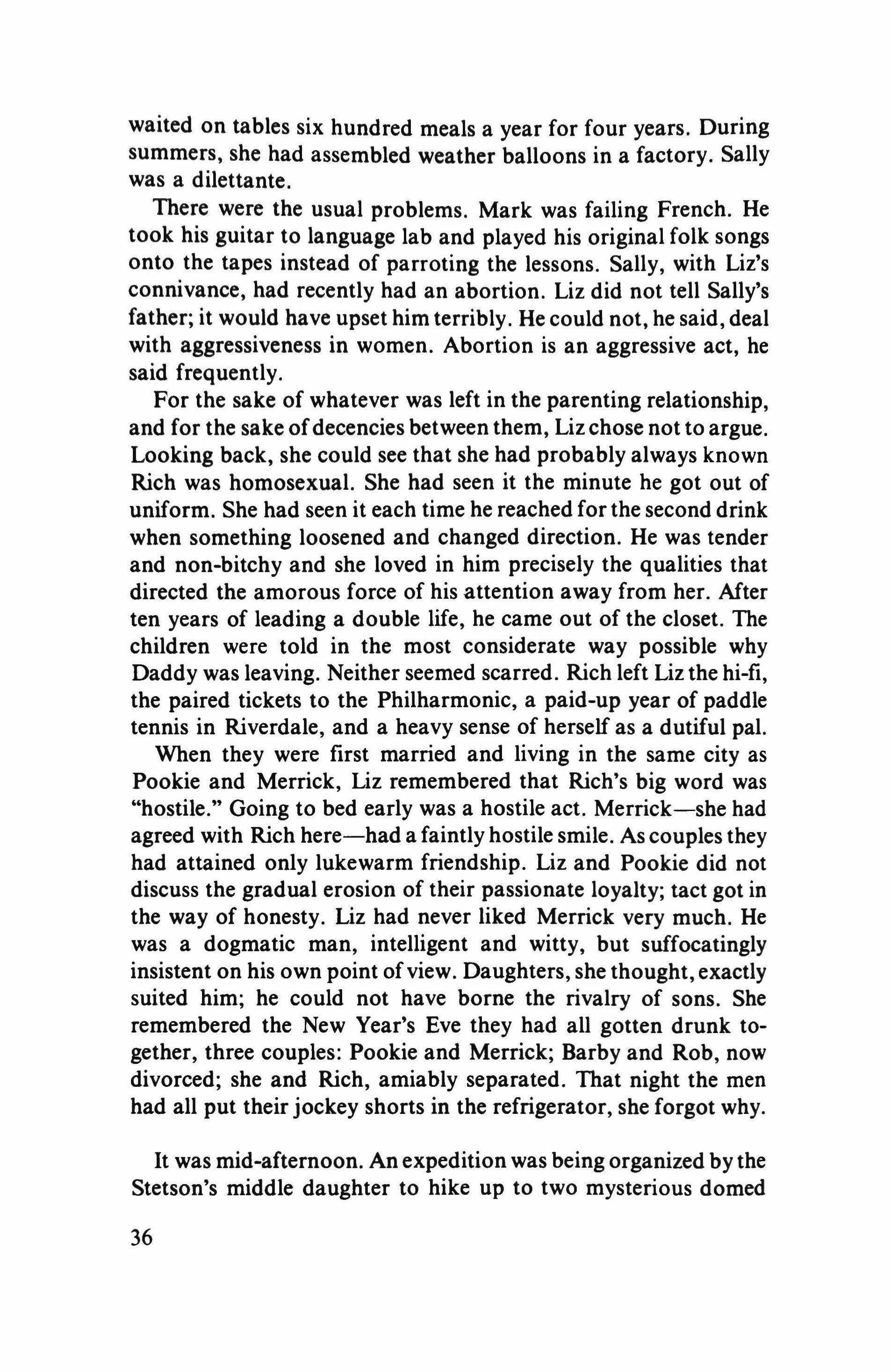
waited on tables six hundred meals a year for four years. During summers, she had assembled weather balloons in a factory. Sally was a dilettante.
There were the usual problems. Mark was failing French. He took his guitar to language lab and played his original folk songs onto the tapes instead of parroting the lessons. Sally, with Liz's connivance, had recently had an abortion. Liz did not tell Sally's father; it would have upset him terribly. He could not, he said, deal with aggressiveness in women. Abortion is an aggressive act, he said frequently.
For the sake of whatever was left in the parenting relationship, and for the sake ofdecencies between them, Liz chose not to argue. Looking back, she could see that she had probably always known Rich was homosexual. She had seen it the minute he got out of uniform. She had seen it each time he reached for the second drink when something loosened and changed direction. He was tender and non-bitchy and she loved in him precisely the qualities that directed the amorous force of his attention away from her. After ten years of leading a double life, he came out of the closet. The children were told in the most considerate way possible why Daddy was leaving. Neither seemed scarred. Rich left Liz the hi-fi, the paired tickets to the Philharmonic, a paid-up year of paddle tennis in Riverdale, and a heavy sense of herself as a dutiful pal.
When they were first married and living in the same city as Pookie and Merrick, Liz remembered that Rich's big word was "hostile." Going to bed early was a hostile act. Merrick-she had agreed with Rich here-had a faintly hostile smile. As couples they had attained only lukewarm friendship. Liz and Pookie did not discuss the gradual erosion of their passionate loyalty; tact got in the way of honesty. Liz had never liked Merrick very much. He was a dogmatic man, intelligent and witty, but suffocatingly insistent on his own point ofview. Daughters, she thought,exactly suited him; he could not have borne the rivalry of sons. She remembered the New Year's Eve they had all gotten drunk together, three couples: Pookie and Merrick; Barby and Rob, now divorced; she and Rich, amiably separated. That night the men had all put their jockey shorts in the refrigerator, she forgot why.
It was mid-afternoon. An expedition was being organizedby the Stetson's middle daughter to hike up to two mysterious domed
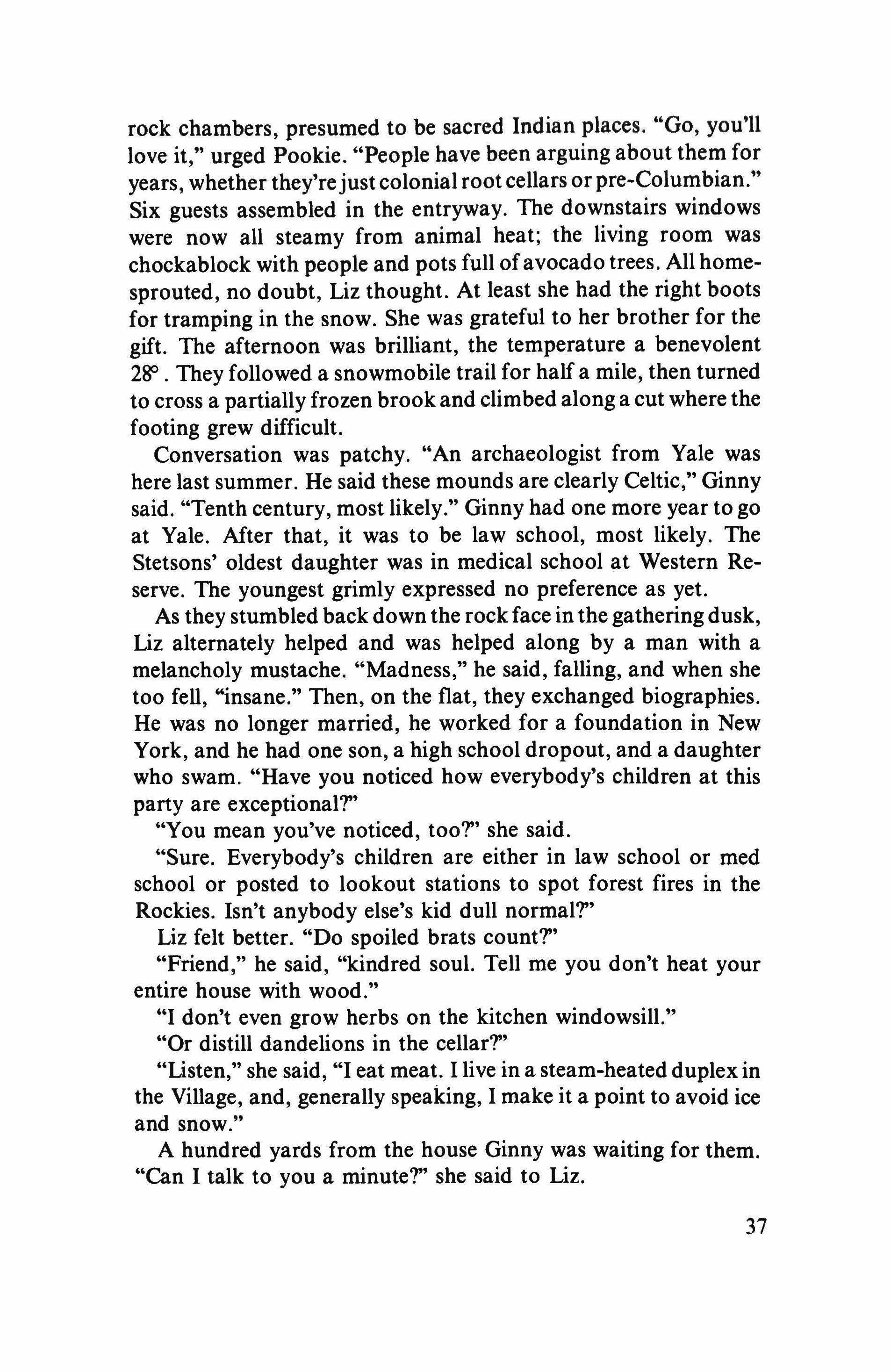
rock chambers, presumed to be sacred Indian places. "Go, you'll love it," urged Pookie. "People have been arguing about them for years, whether they'rejust colonial root cellars or pre-Columbian."
Six guests assembled in the entryway. The downstairs windows were now all steamy from animal heat; the living room was chockablock with people and pots full ofavocado trees. All homesprouted, no doubt, Liz thought. At least she had the right boots for tramping in the snow. She was grateful to her brother for the gift. The afternoon was brilliant, the temperature a benevolent 2SO They followed a snowmobile trail for half a mile, then turned to cross a partially frozen brook and climbed along a cut where the footing grew difficult.
Conversation was patchy. "An archaeologist from Yale was here last summer. He said these mounds are clearly Celtic," Ginny said. "Tenth century, most likely." Ginny had one more year to go at Yale. After that, it was to be law school, most likely. The Stetsons' oldest daughter was in medical school at Western Reserve. The youngest grimly expressed no preference as yet.
As they stumbled back down the rock face in the gathering dusk, Liz alternately helped and was helped along by a man with a melancholy mustache. "Madness," he said, falling, and when she too fell, "insane." Then, on the flat, they exchanged biographies. He was no longer married, he worked for a foundation in New York, and he had one son, a high school dropout, and a daughter who swam. "Have you noticed how everybody's children at this party are exceptional?"
"You mean you've noticed, too?" she said.
"Sure. Everybody's children are either in law school or med school or posted to lookout stations to spot forest fires in the Rockies. Isn't anybody else's kid dull normal?"
Liz felt better. "Do spoiled brats count?"
"Friend," he said, "kindred soul. Tell me you don't heat your entire house with wood."
"I don't even grow herbs on the kitchen windowsill."
"Or distill dandelions in the cellar?"
"Listen," she said, "I eat meat. 1 live in a steam-heated duplex in the Village, and, generally speaking, 1 make it a point to avoid ice and snow."
A hundred yards from the house Ginny was waiting for them. "Can I talk to you a minute?" she said to Liz.
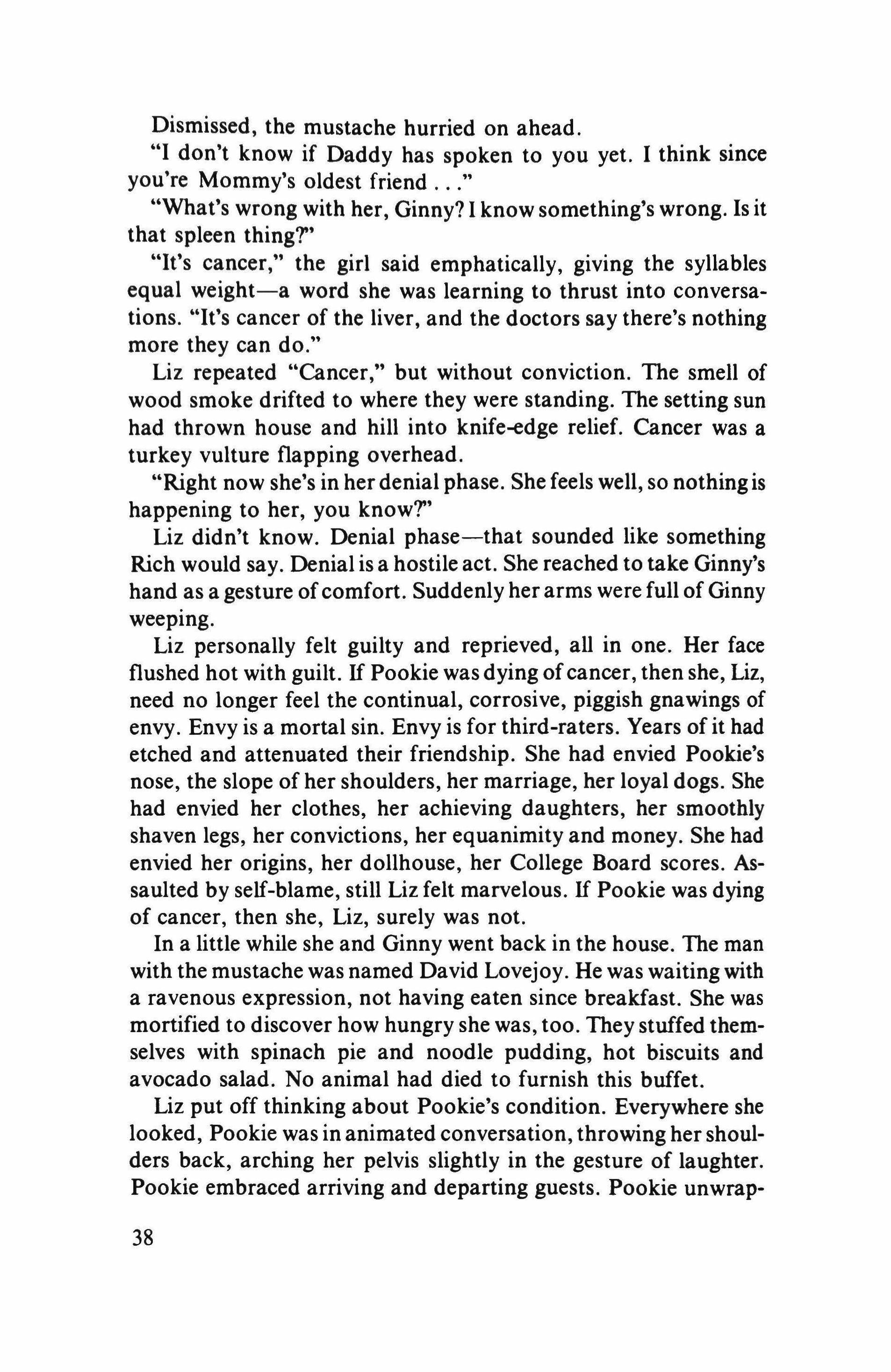
Dismissed, the mustache hurried on ahead.
"I don't know if Daddy has spoken to you yet. I think since you're Mommy's oldest friend "
"What's wrong with her, Ginny? I know something's wrong. Is it that spleen thing?"
"It's cancer," the girl said emphatically, giving the syllables equal weight-a word she was learning to thrust into conversations. "It's cancer of the liver, and the doctors say there's nothing more they can do."
Liz repeated "Cancer," but without conviction. The smell of wood smoke drifted to where they were standing. The setting sun had thrown house and hill into knife-edge relief. Cancer was a turkey vulture flapping overhead.
"Right now she's in her denial phase. She feels well, so nothingis happening to her, you know'!'
Liz didn't know. Denial phase-that sounded like something Rich would say. Denial is a hostile act. She reached to take Ginny's hand as a gesture ofcomfort. Suddenly her arms were full of Ginny weeping.
Liz personally felt guilty and reprieved, all in one. Her face flushed hot with guilt. If Pookie was dying ofcancer, then she, Liz, need no longer feel the continual, corrosive, piggish gnawings of envy. Envy is a mortal sin. Envy is for third-raters. Years of it had etched and attenuated their friendship. She had envied Pookie's nose, the slope of her shoulders, her marriage, her loyal dogs. She had envied her clothes, her achieving daughters, her smoothly shaven legs, her convictions, her equanimity and money. She had envied her origins, her dollhouse, her College Board scores. Assaulted by self-blame, still Liz felt marvelous. If Pookie was dying of cancer, then she, Liz, surely was not.
In a little while she and Ginny went back in the house. The man with the mustache was named David Lovejoy. He was waiting with a ravenous expression, not having eaten since breakfast. She was mortified to discover how hungry she was, too. They stuffed themselves with spinach pie and noodle pudding, hot biscuits and avocado salad. No animal had died to furnish this buffet.
Liz put off thinking about Pookie's condition. Everywhere she looked, Pookie was in animated conversation, throwing her shoulders back, arching her pelvis slightly in the gesture of laughter. Pookie embraced arriving and departing guests. Pookie unwrap-

ped a pair of oven mitts, a basket for French bread, the Hammacher Schlemmer boot scraper. Pookie was pouring wine, patting the three dogs, all of them black German shepherds. Pookie with Merrick's arm around her, cozy and doomed.
At the end of the party, Liz and Lovejoy exchanged addresses, telephone numbers. Vague promises were made, the kind she desperately wanted to believe in. For years and years she had been falling through space with an untested parachute. She neither crashed nor pulled the cord.
"Don't come back unless you feel up to it," Merrick said, walking down with her to the hulking Pontiac. He stood there, making small, aimless circles in the dark with his electric torch. As if the decision were his. She and Pookie had had a life before he was even thought of. She made no protest.
Eighteen months after this New Year's Day, Pamela Pookie Stetson lives, first having given up her uterus, then a portion ofher large intestine. She remains cheerful and active after the surgeries, walking with the dogs, vigorously weeding the garden, but she progresses out of denial and into acceptance.
Pookie accepts death the way she had accepted civil disobedience. Then she had learned how to sit hunched over, protecting her kidneys; she had learned how to go limp when arrested, while being carried out of federal buildings and hoisted into paddy wagons. She is doing what she has to do the same way she formed a human chain with other mothers on the cobblestones in front of the Navy buses. Only this time she must do it alone. Even with the whole world waving, she has to set out on her own.
Liz goes weekly to see her, flying up to Burlington, where one or another of the daughters meets her plane. She and Pookie have taken up where they left off, twenty-odd years ago, as if in midsentence. When Pookie is resting, Liz entertains Ginny and the others with details out of their mother's childhood. She describes all the unexceptional entertainments oftheir era, and then remembers the two ten-year-olds spying on the firemen in the adjacent dormitory through Pookie's father's expensive bird-watching binoculars. Grown men, scratching their genitals, blowing their noses, buttoning, unbuttoning. Two little girls, too wicked to be caught.
In Merrick's study, a lovely haphazard welter of books and periodicals, Liz is magnetized by one wall of framed photographs.
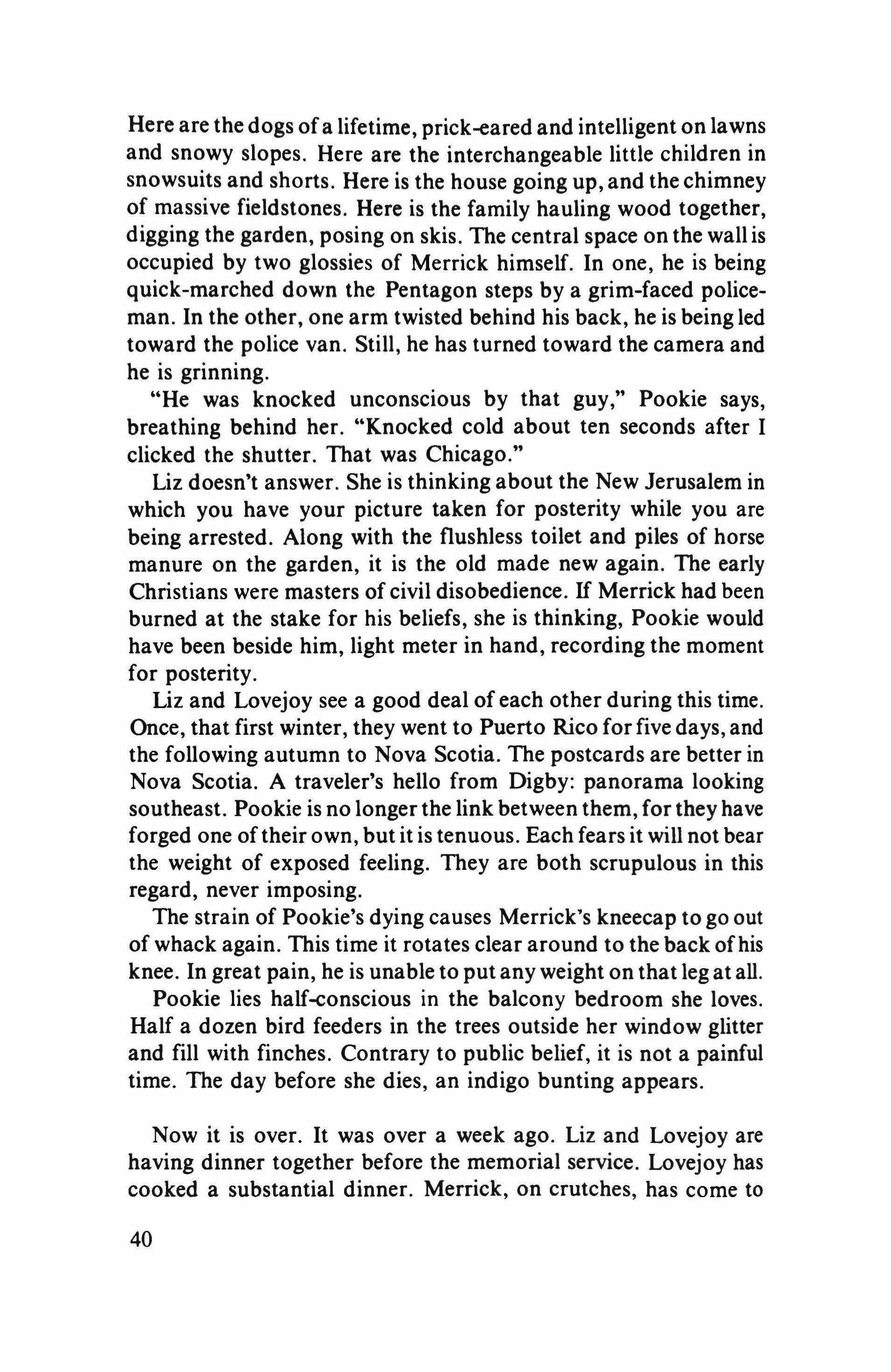
Here are the dogs of a lifetime, prick-eared and intelligent on lawns and snowy slopes. Here are the interchangeable little children in snowsuits and shorts. Here is the house going up, and the chimney of massive fieldstones. Here is the family hauling wood together, digging the garden, posing on skis. The central space on the wall is occupied by two glossies of Merrick himself. In one, he is being quick-marched down the Pentagon steps by a grim-faced policeman. In the other, one arm twisted behind his back, he is being led toward the police van. Still, he has turned toward the camera and he is grinning.
"He was knocked unconscious by that guy," Pookie says, breathing behind her. "Knocked cold about ten seconds after I clicked the shutter. That was Chicago."
Liz doesn't answer. She is thinking about the New Jerusalem in which you have your picture taken for posterity while you are being arrested. Along with the flushless toilet and piles of horse manure on the garden, it is the old made new again. The early Christians were masters of civil disobedience. If Merrick had been burned at the stake for his beliefs, she is thinking, Pookie would have been beside him, light meter in hand, recording the moment for posterity.
Liz and Lovejoy see a good deal of each other during this time. Once, that first winter, they went to Puerto Rico for five days, and the following autumn to Nova Scotia. The postcards are better in Nova Scotia. A traveler's hello from Digby: panorama looking southeast. Pookie is no longer the link between them, for they have forged one oftheir own, but it is tenuous. Each fears it will not bear the weight of exposed feeling. They are both scrupulous in this regard, never imposing.
The strain of Pookie's dying causes Merrick's kneecap to go out of whack again. This time it rotates clear around to the back ofhis knee. In great pain, he is unable to put any weight on that leg at all. Pookie lies half-conscious in the balcony bedroom she loves. Half a dozen bird feeders in the trees outside her window glitter and fill with finches. Contrary to public belief, it is not a painful time. The day before she dies, an indigo bunting appears.
Now it is over. It was over a week ago. Liz and Lovejoy are having dinner together before the memorial service. Lovejoy has cooked a substantial dinner. Merrick, on crutches, has come to

New York. He is to meet them at the Ethical Culture building, where he and Pookie were married.
Liz slashes viciously at the slice of roast beef on her plate. She is still hungry for meat after so much time in a vegetarian household waiting for death. Grief and blood go together, she thinks, but cannot lift the fork to her mouth.
Propped against the salt cellar is a postcard she received yesterday. On the front, a reproduction of a fire engine pumper, circa 1880, from the Smithsonian. The brass fittings, some with elaborate curlicues, have been lovingly shined. New black rubber hoses, undoubtedly custom made, are coiled across the back. "Very dear Liz," Pookie has printed, "I saved this for you years ago, but Ginny promises to mail it afterwards. A traveler's hello from our nation's capital! Love always, Your Pookie."

I got stones in my passway and my road seems black as night. I have pains in my heart. they have taken my appetite.
-Robert Johnson (/914?-1938)
Saturday night. He's playing the House Party Club in Dallas, singing his blues, picking notes with a penknife. His voice rides up to a reedy falsetto that gets the men hooting and then down to the cavernous growl that chills the women, the hard chords driving behind it, his left foot beating like a hammer. The club's patronsfield hands and laborers-pound over the floorboards like the start of the derby, stamping along with him. Skirts fly, straw hats slump over eyebrows, drinks spill, ironed hair goes wiry. Overhead two dim yellow bulbs sway on their cords, the light suffused with cigarette smoke, dingy and brown. The floor is wet with spittle and tobacco juice. From the back room, a smell of eggs frying. And beans.
Huddie Doss, the proprietor, has set up a bar in the corner: two barrels of roofing nails and a pine plank. The plank supports a cluster of gallonjugs, a bottle of Mexican rum, a pewterjigger, and three lemons. Robert sits on a stool at the far end of the room, boxed in by men in kerchiefs, women in calico. The men watch his fingers, the women look into his eyes.

It is 1938, dust bowl, New Deal. FDR is on the radio, and somebody in Robinsonville is naming a baby after Jesse Owens. Once, on the road to Natchez, Robert saw a Pierce Arrow and talked about it for a week. Another time he spent six weeks in Chicago and didn't know the World's Fair was going on. Now he plays his guitar up and down the Mississippi, and in Louisiana, Texas, and Arkansas. He's never heard of Hitler and he hasn't eaten in two days.
When he was fifteen he watched a poisoned dog tear out its own entrails. It was like this:
They were out in the fields when a voice shouted, "Loup's gone mad!" and then he was running with the rest of them, down the slope and across the red dust road, past the shanties and into the gully where they dumped their trash, the dog crying high over the sun and then baying deep as craters in the moon. It was a coonhound, tawny, big boned, the color of a lion. Robert pushed through the gathering crowd and stood watching as the animal dragged its hindquarters along the ground like a birthing bitch, the ropy testicles strung out behind. It was mewling now, the highpitched cries sawing away at each breath, and then it was baying again, howling death until the day was filled with it, their ears and the pits of their stomachs soured with it. One of the men spoke in a terse, angry voice, "Go get Turkey Nason to come on down here with his gun," and a boy detached himself from the crowd and darted up the rise.
It was then that the dog fell heavily to its side, ribs heaving, and began to dig at its stomach with long racing thrusts ofthe rear legs. There was yellow foam on the black muzzle, blood bright in the nostrils. The dog screamed and dug, dug until the flesh was raw and its teeth could puncture the cavity to get at the gray intestine, tugging first at a bulb of it and then fastening on a lank strand like dirty wash. There was no sign of the gun. The woman beside Robert began to cry, a sound like crumpling paper. Then one of the men stepped in with a shovel in his hand. He hit the dog once across the eyes and the animal lunged for him. The shovel fell twice more and the dog stiffened, its yellow eyes gazing round the circle of men, the litter of bottles and cans and rusted machinery, its head lolling on the lean muscular neck, poised for one terrible moment, and then it was over. Afterward Robert came close: to look at the frozen teeth, the thin rigid limbs, the green flies on the pink organs.
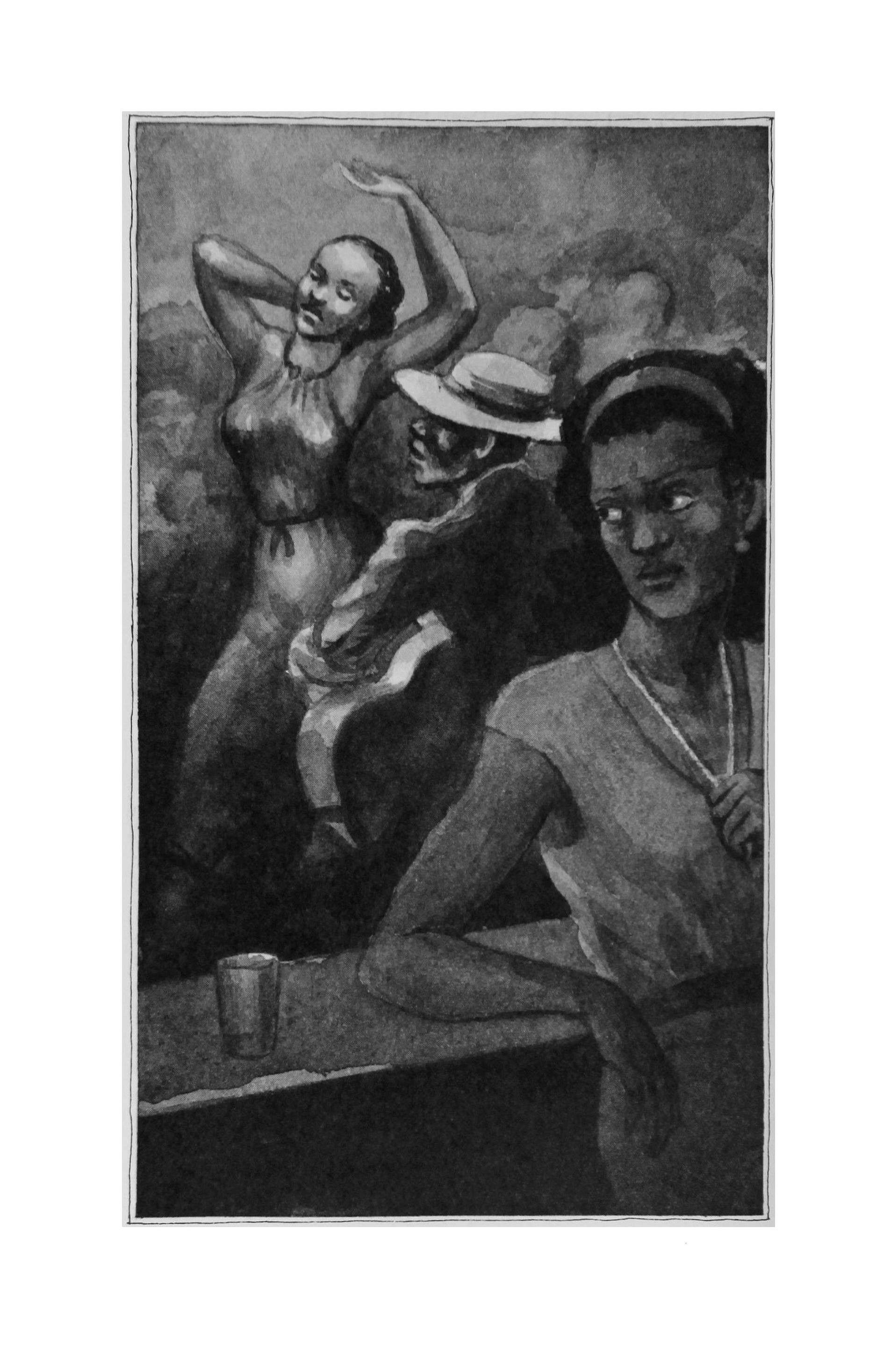
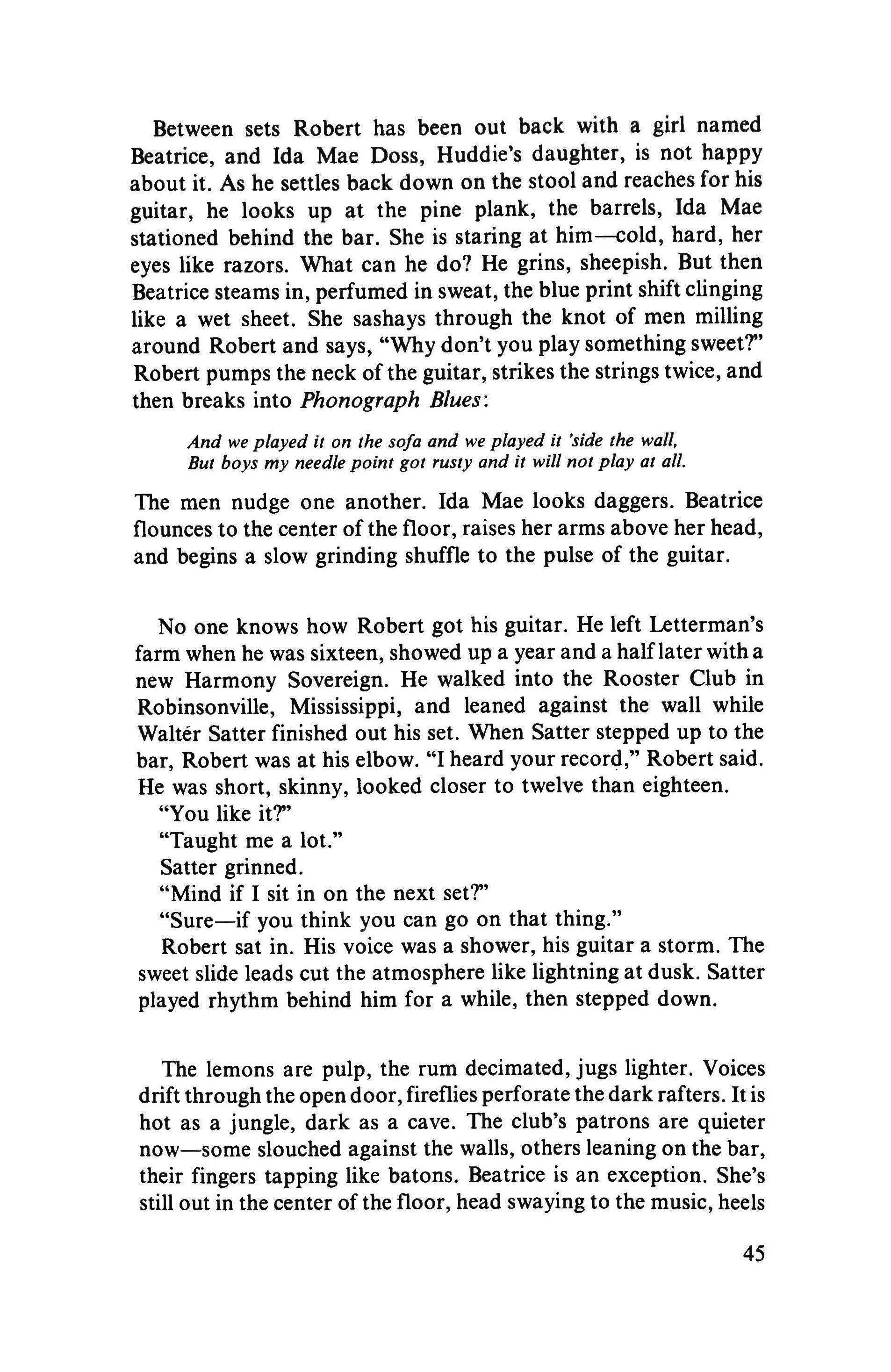
Between sets Robert has been out back with a girl named Beatrice, and Ida Mae Doss, Huddie's daughter, is not happy about it. As he settles back down on the stool and reaches for his guitar, he looks up at the pine plank, the barrels, Ida Mae stationed behind the bar. She is staring at him-cold, hard, her eyes like razors. What can he do? He grins, sheepish. But then Beatrice steams in, perfumed in sweat, the blue print shift clinging like a wet sheet. She sashays through the knot of men milling around Robert and says, "Why don't you play something sweet?" Robert pumps the neck of the guitar, strikes the strings twice, and then breaks into Phonograph Blues:
And we played it on the sofa and we played it 'side the wall, But boys my needle point got rusty and it will not play at 01/.
The men nudge one another. Ida Mae looks daggers. Beatrice flounces to the center of the floor, raises her arms above her head, and begins a slow grinding shuffle to the pulse of the guitar.
No one knows how Robert got his guitar. He left Letterman's farm when he was sixteen, showed up a year and a halflater with a new Harmony Sovereign. He walked into the Rooster Club in Robinsonville, Mississippi, and leaned against the wall while Walter Satter finished out his set. When Satter stepped up to the bar, Robert was at his elbow. "I heard your record," Robert said. He was short, skinny, looked closer to twelve than eighteen.
"You like it?"
"Taught me a lot."
Satter grinned.
"Mind if I sit in on the next set?"
"Sure-if you think you can go on that thing."
Robert sat in. His voice was a shower, his guitar a storm. The sweet slide leads cut the atmosphere like lightning at dusk. Satter played rhythm behind him for a while, then stepped down.
The lemons are pulp, the rum decimated, jugs lighter. Voices drift through the open door, fireflies perforate the dark rafters. It is hot as a jungle, dark as a cave. The club's patrons are quieter now-some slouched against the walls, others leaning on the bar, their fingers tapping like batons. Beatrice is an exception. She's still out in the center of the floor, head swaying to the music, heels
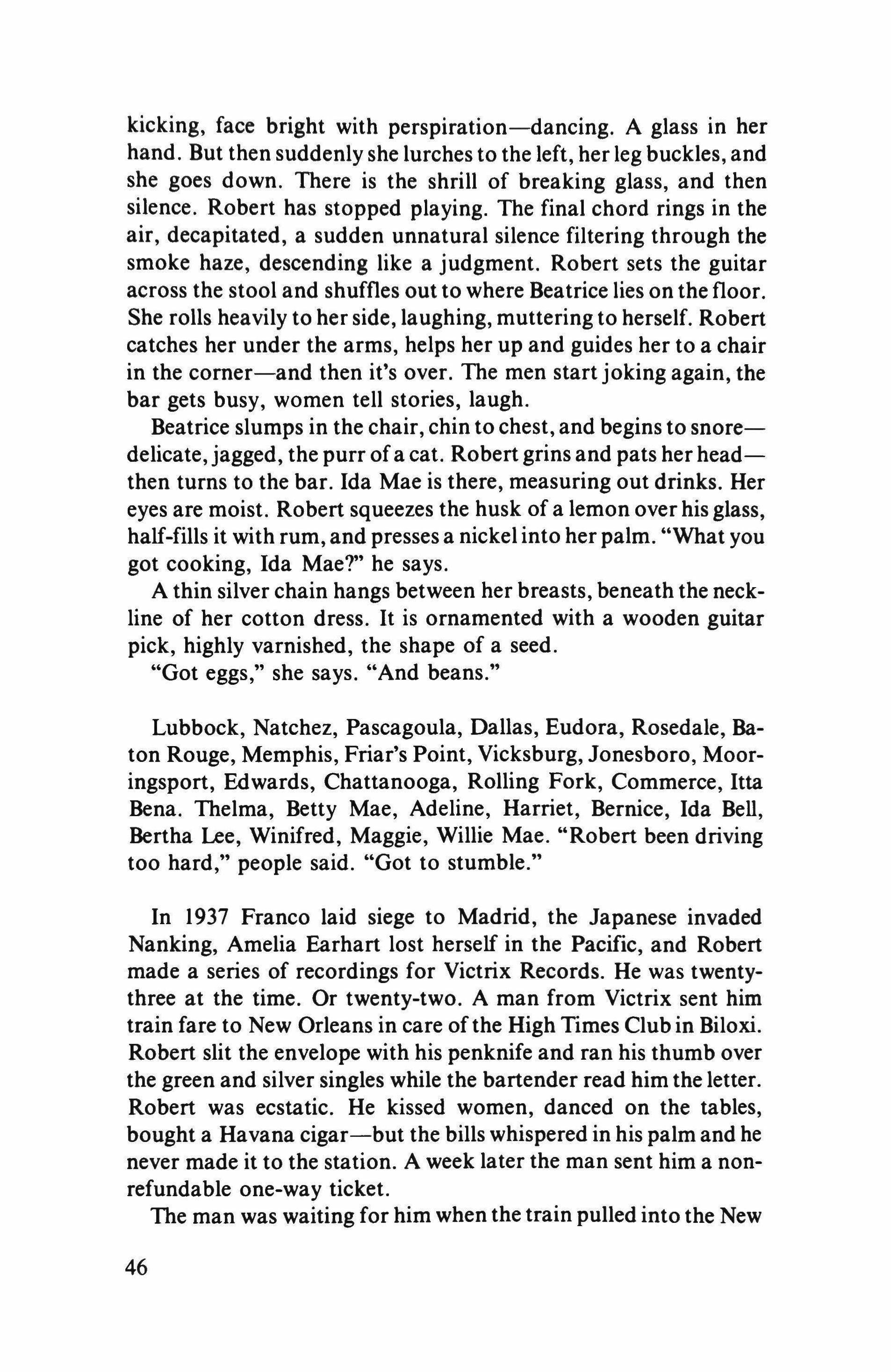
kicking, face bright with perspiration-dancing. A glass in her hand. But then suddenly she lurches to the left, her leg buckles, and she goes down. There is the shrill of breaking glass, and then silence. Robert has stopped playing. The final chord rings in the air, decapitated, a sudden unnatural silence filtering through the smoke haze, descending like a judgment. Robert sets the guitar across the stool and shuffles out to where Beatrice lies on the floor. She rolls heavily to her side, laughing, muttering to herself. Robert catches her under the arms, helps her up and guides her to a chair in the comer-and then it's over. The men start joking again, the bar gets busy, women tell stories, laugh.
Beatrice slumps in the chair, chin to chest, and begins to snoredelicate,jagged, the purr of a cat. Robert grins and pats her headthen turns to the bar. Ida Mae is there, measuring out drinks. Her eyes are moist. Robert squeezes the husk of a lemon over his glass, half-fills it with rum, and presses a nickel into her palm. "What you got cooking, Ida Mae?" he says.
A thin silver chain hangs between her breasts, beneath the neckline of her cotton dress. It is ornamented with a wooden guitar pick, highly varnished, the shape of a seed.
"Got eggs," she says. "And beans."
Lubbock, Natchez, Pascagoula, Dallas, Eudora, Rosedale, Baton Rouge, Memphis, Friar's Point, Vicksburg, Jonesboro, Mooringsport, Edwards, Chattanooga, Rolling Fork, Commerce, Itta Bena. Thelma, Betty Mae, Adeline, Harriet, Bernice, Ida Bell, Bertha Lee, Winifred, Maggie, Willie Mae. "Robert been driving too hard," people said. "Got to stumble."
In 1937 Franco laid siege to Madrid, the Japanese invaded Nanking, Amelia Earhart lost herself in the Pacific, and Robert made a series of recordings for Victrix Records. He was twentythree at the time. Or twenty-two. A man from Victrix sent him train fare to New Orleans in care of the High Times Club in Biloxi. Robert slit the envelope with his penknife and ran his thumb over the green and silver singles while the bartender read him the letter. Robert was ecstatic. He kissed women, danced on the tables, bought a Havana cigar-but the bills whispered in his palm and he never made it to the station. A week later the man sent him a nonrefundable one-way ticket.
The man was waiting for him when the train pulled into the New
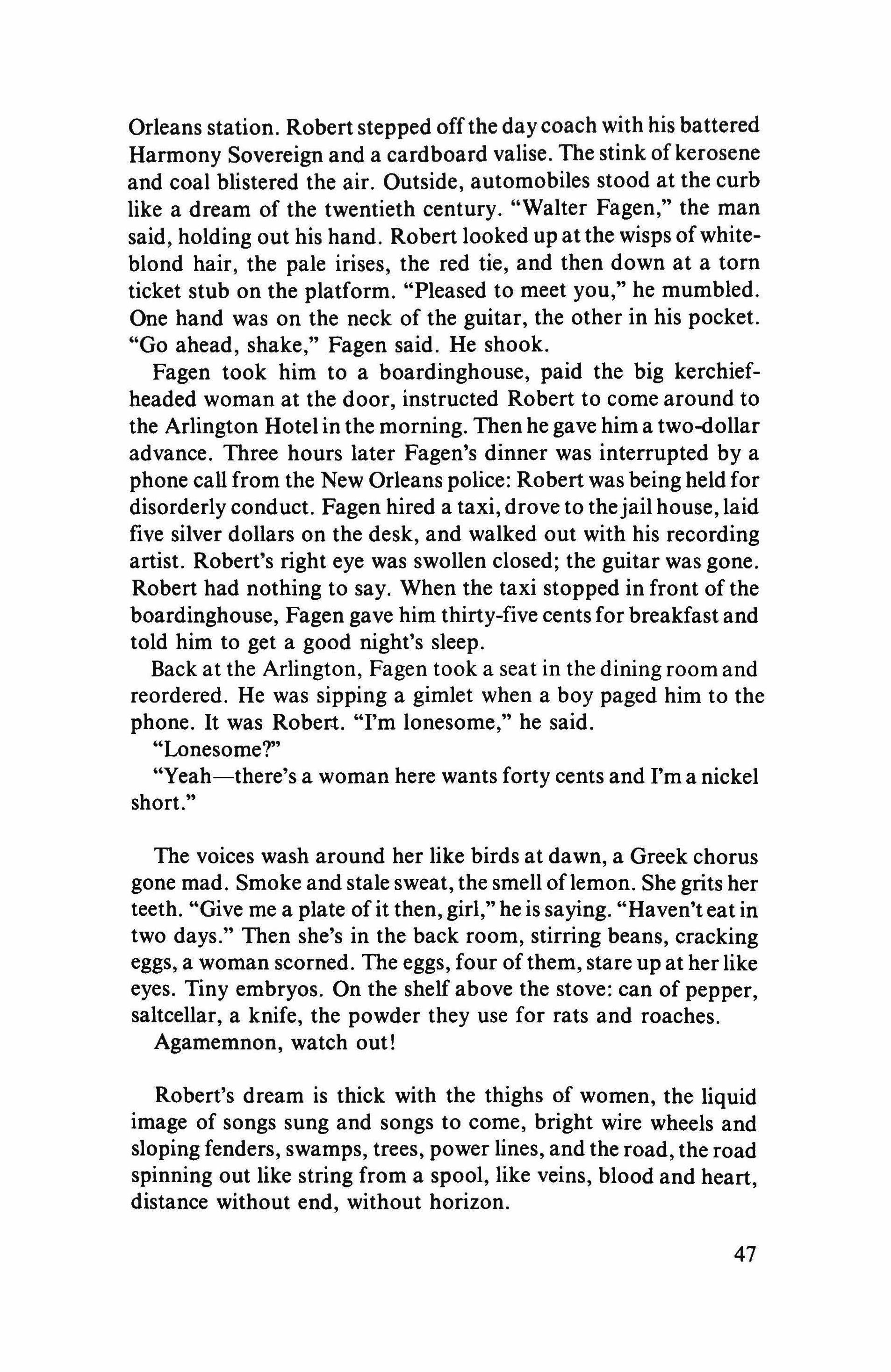
Orleans station. Robert stepped offthe day coach with his battered Harmony Sovereign and a cardboard valise. The stink of kerosene and coal blistered the air. Outside, automobiles stood at the curb like a dream of the twentieth century. "Walter Fagen," the man said, holding out his hand. Robert looked up at the wisps ofwhiteblond hair, the pale irises, the red tie, and then down at a torn ticket stub on the platform. "Pleased to meet you," he mumbled. One hand was on the neck of the guitar, the other in his pocket. "Go ahead, shake," Fagen said. He shook.
Fagen took him to a boardinghouse, paid the big kerchiefheaded woman at the door, instructed Robert to come around to the Arlington Hotel in the morning. Then he gave him a two-dollar advance. Three hours later Fagen's dinner was interrupted by a phone call from the New Orleans police: Robert was being held for disorderly conduct. Fagen hired a taxi, drove to thejail house, laid five silver dollars on the desk, and walked out with his recording artist. Robert's right eye was swollen closed; the guitar was gone. Robert had nothing to say. When the taxi stopped in front of the boardinghouse, Fagen gave him thirty-five cents for breakfast and told him to get a good night's sleep.
Back at the Arlington, Fagen took a seat in the dining room and reordered. He was sipping a gimlet when a boy paged him to the phone. It was Robert. "I'm lonesome," he said.
"Lonesome?"
"Yeah-there's a woman here wants forty cents and I'm a nickel short."
The voices wash around her like birds at dawn, a Greek chorus gone mad. Smoke and stale sweat, the smell oflemon. She grits her teeth. "Give me a plate of it then, girl," he is saying. "Haven't eat in two days." Then she's in the back room, stirring beans, cracking eggs, a woman scorned. The eggs, four of them, stare up at her like eyes. Tiny embryos. On the shelf above the stove: can of pepper, saltcellar, a knife, the powder they use for rats and roaches.
Agamemnon, watch out!
Robert's dream is thick with the thighs of women, the liquid image of songs sung and songs to come, bright wire wheels and sloping fenders, swamps, trees, power lines, and the road, the road spinning out like string from a spool, like veins, blood and heart, distance without end, without horizon.

It is the last set. Things are winding down. Beatrice sags in the chair, skirt pulled up over her knees, her chest rising and falling with the soft rhythm of sleep. Beside her, a man in red suspenders presses a woman against the wall. Robert watches the woman's hands like dark animals on the man's hips. Earlier, a picker had been stabbed in the neck after a dispute over dice or women or liquor, and an old woman had fallen, drunk, and cut her head on the edge of a bench. But now things are winding down. Voices are hushed, cigarettes burn unattended, moonlight limns the windows.
Robert rests the guitar on his knee and does a song about a train station, a suitcase, and the eyes of a woman. His voice is mournful, sad as a steady rain, the guitar whining above it like a cry in the distance. "Yes!" they call out. "Robert!" Somebody whistles. Then they applaud, waves on the rocks, smoke rising as if from a rent in the earth. In response, the guitar reaches low for the opening bars of Robert's signature tune, his finale, but there is something wrong-the chords staggering like a seizure, stumbling, finally breaking off cold.
Cramps. A spasm so violent itjerks his fingers from the strings. He begins again, his voice quavering, shivered: "Got to keep moving, got to keep moving, / Hellhound on my trail." And then suddenly the voice chokes off, gags, the guitar slips to the floor with a percussive shock. His bowels are on fire. He stands, clutches his abdomen, drops to hands and knees. "Boy's had too much of that Mexican," someone says. He looks up, a sword run through him, panting, the shock waves pounding through his frame, looks up at the pine plank, the barrels, the cold hard features of the girl with the silver necklace in her hand. Looks up, and snarls.
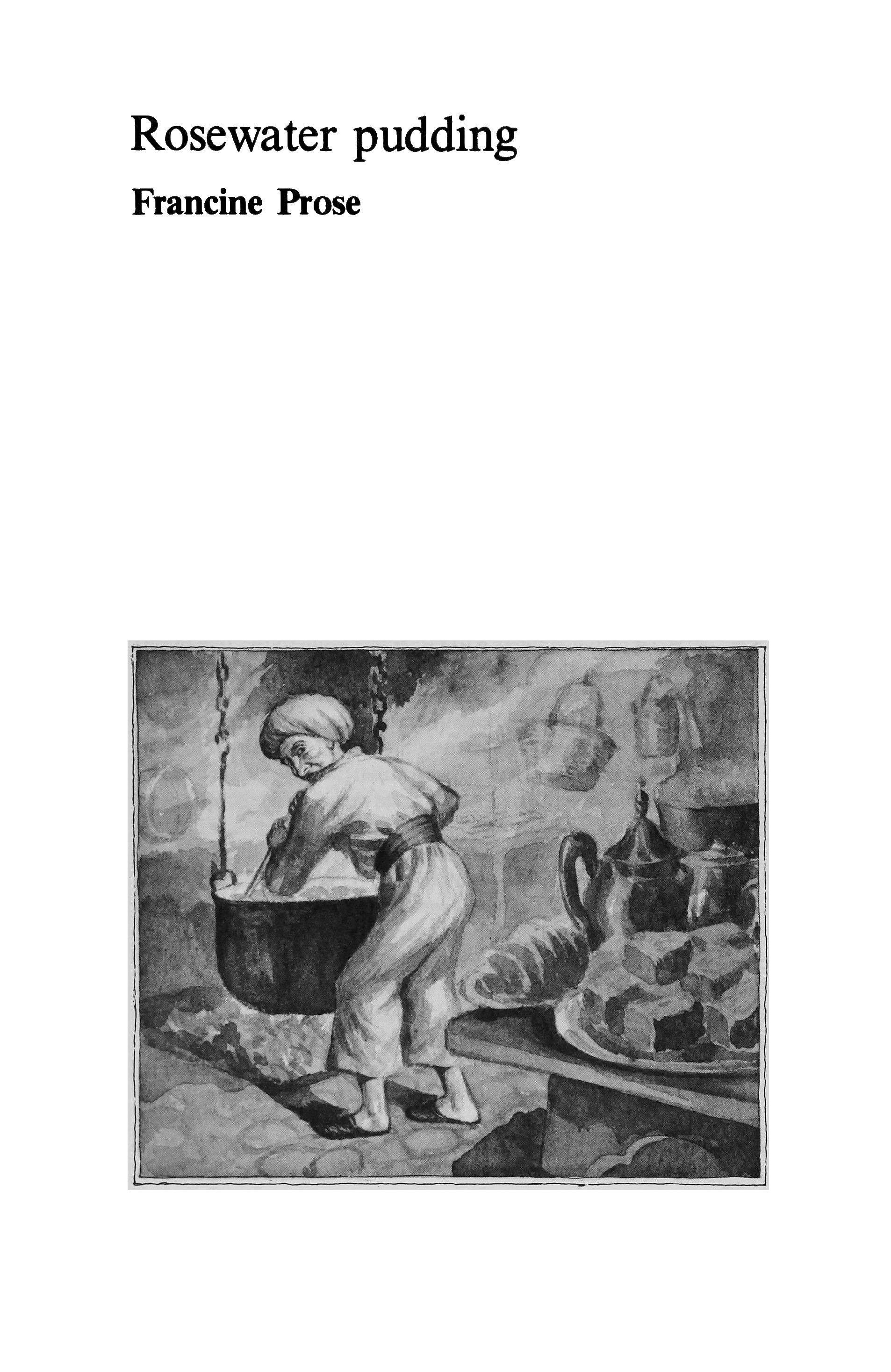
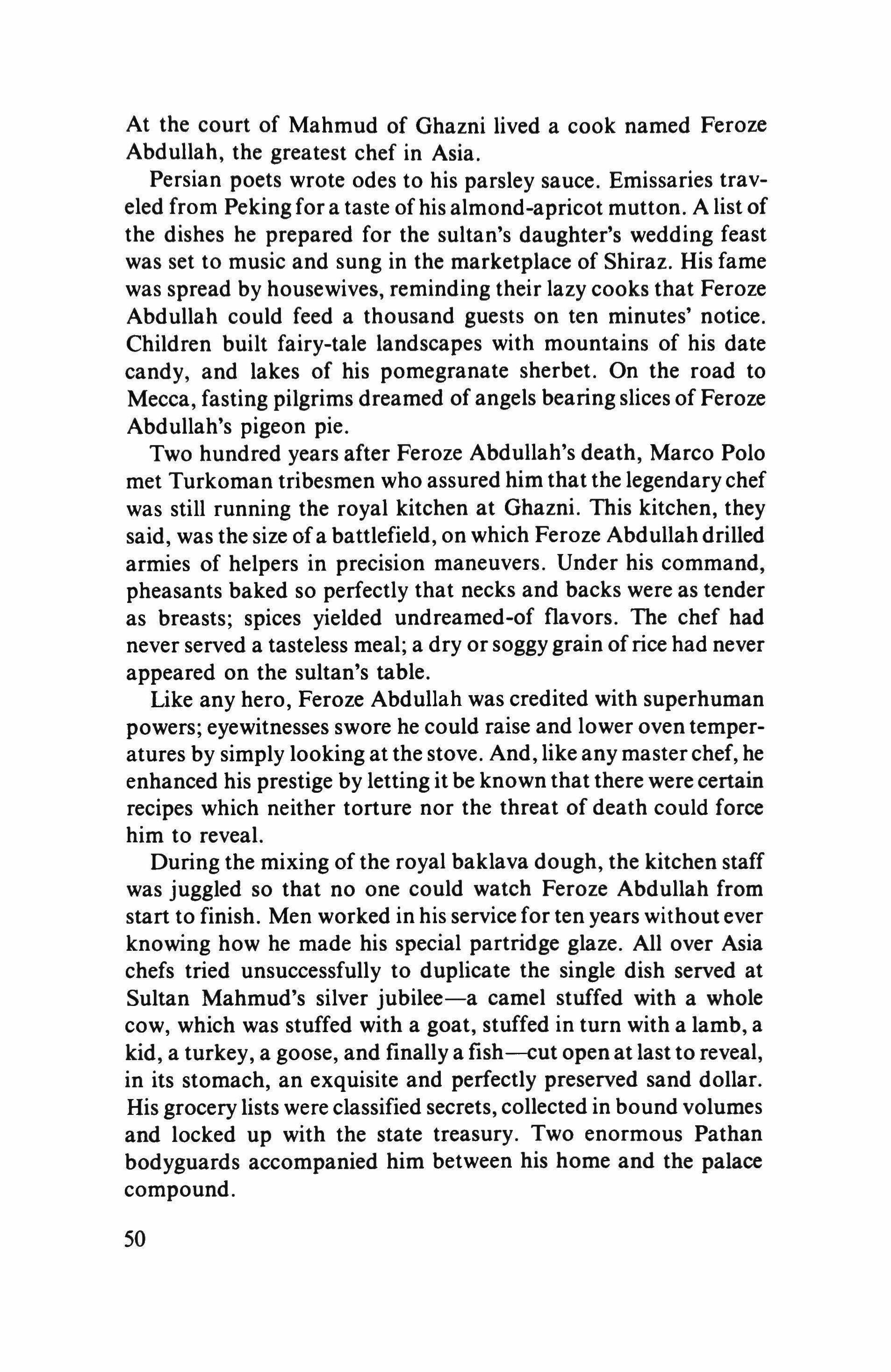
At the court of Mahmud of Ghazni lived a cook named Feroze Abdullah, the greatest chef in Asia.
Persian poets wrote odes to his parsley sauce. Emissaries traveled from Peking for a taste ofhis almond-apricot mutton. A list of the dishes he prepared for the sultan's daughter's wedding feast was set to music and sung in the marketplace of Shiraz. His fame was spread by housewives, reminding their lazy cooks that Feroze Abdullah could feed a thousand guests on ten minutes' notice. Children built fairy-tale landscapes with mountains of his date candy, and lakes of his pomegranate sherbet. On the road to Mecca, fasting pilgrims dreamed of angels bearing slices of Feroze Abdullah's pigeon pie.
Two hundred years after Peroze Abdullah's death, Marco Polo met Turkoman tribesmen who assured him that the legendary chef was still running the royal kitchen at Ghazni. This kitchen, they said, was the size of a battlefield, on which Feroze Abdullah drilled armies of helpers in precision maneuvers. Under his command, pheasants baked so perfectly that necks and backs were as tender as breasts; spices yielded undreamed-of flavors. The chef had never served a tasteless meal; a dry or soggy grain ofrice had never appeared on the sultan's table.
Like any hero, Feroze Abdullah was credited with superhuman powers; eyewitnesses swore he could raise and lower oven temperatures by simply looking at the stove. And, like any master chef, he enhanced his prestige by letting it be known that there were certain recipes which neither torture nor the threat of death could force him to reveal.
During the mixing of the royal baklava dough, the kitchen staff was juggled so that no one could watch Feroze Abdullah from start to finish. Men worked in his service for ten years without ever knowing how he made his special partridge glaze. Allover Asia chefs tried unsuccessfully to duplicate the single dish served at Sultan Mahmud's silver jubilee-a camel stuffed with a whole cow, which was stuffed with a goat, stuffed in turn with a lamb, a kid, a turkey, a goose, and finally a fish-cut open at last to reveal, in its stomach, an exquisite and perfectly preserved sand dollar. His grocery lists were classified secrets, collected in bound volumes and locked up with the state treasury. Two enormous Pathan bodyguards accompanied him between his home and the palace compound.
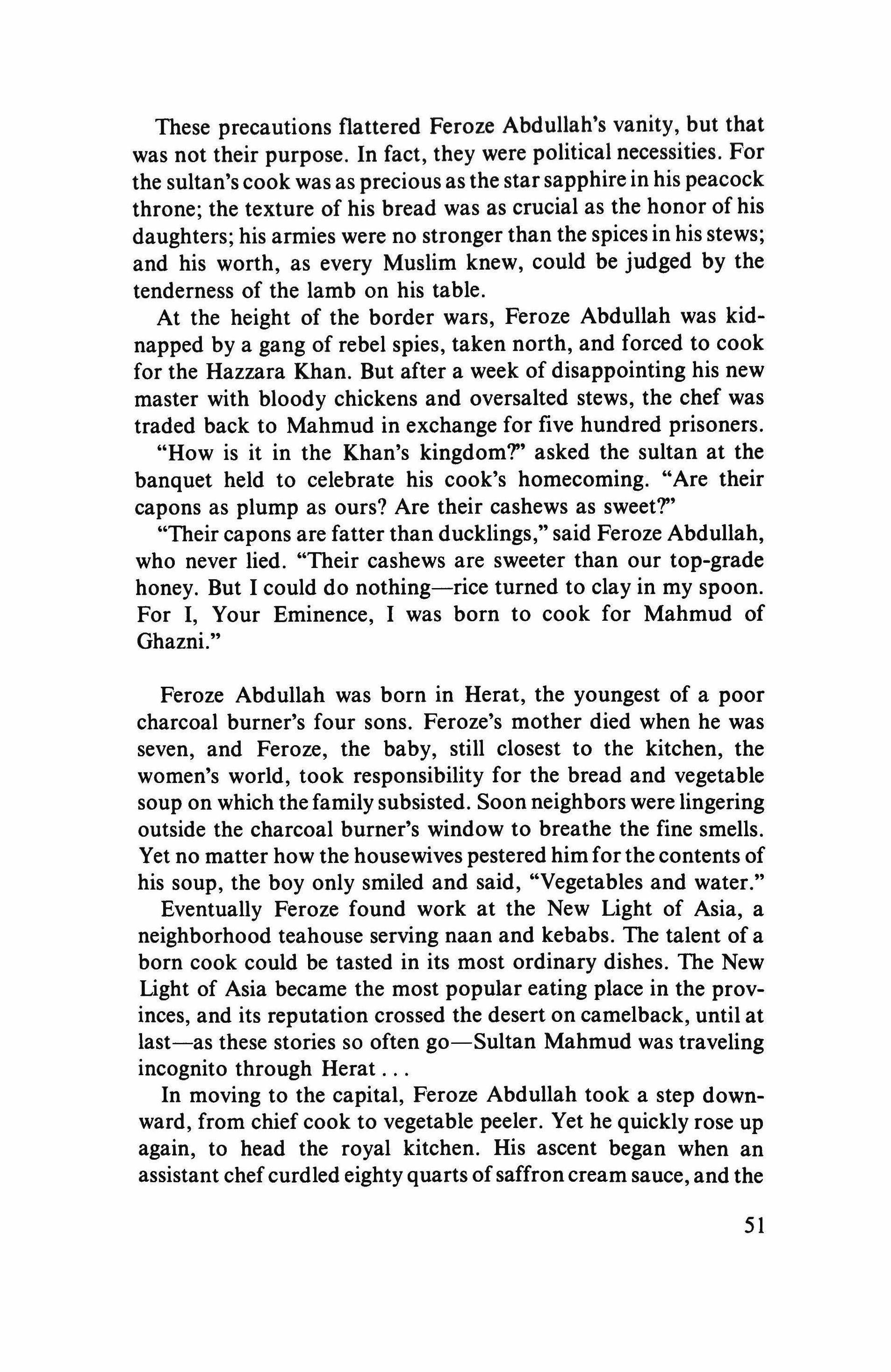
These precautions flattered Feroze Abdullah's vanity, but that was not their purpose. In fact, they were political necessities. For the sultan's cook was as precious as the star sapphire in his peacock throne; the texture of his bread was as crucial as the honor of his daughters; his armies were no stronger than the spices in his stews; and his worth, as every Muslim knew, could be judged by the tenderness of the lamb on his table.
At the height of the border wars, Feroze Abdullah was kidnapped by a gang of rebel spies, taken north, and forced to cook for the Hazzara Khan. But after a week of disappointing his new master with bloody chickens and oversalted stews, the chef was traded back to Mahmud in exchange for five hundred prisoners.
"How is it in the Khan's kingdom?" asked the sultan at the banquet held to celebrate his cook's homecoming. "Are their capons as plump as ours? Are their cashews as sweet?"
"Their capons are fatter than ducklings," said Feroze Abdullah, who never lied. "Their cashews are sweeter than our top-grade honey. But I could do nothing-rice turned to clay in my spoon. For I, Your Eminence, I was born to cook for Mahmud of Ghazni."
Feroze Abdullah was born in Herat, the youngest of a poor charcoal burner's four sons. Feroze's mother died when he was seven, and Feroze, the baby, still closest to the kitchen, the women's world, took responsibility for the bread and vegetable soup on which the family subsisted. Soon neighbors were lingering outside the charcoal burner's window to breathe the fine smells. Yet no matter how the housewives pestered him for the contents of his soup, the boy only smiled and said, "Vegetables and water."
Eventually Feroze found work at the New Light of Asia, a neighborhood teahouse serving naan and kebabs. The talent of a born cook could be tasted in its most ordinary dishes. The New Light of Asia became the most popular eating place in the provinces, and its reputation crossed the desert on camelback, until at last-as these stories so often go-Sultan Mahmud was traveling incognito through Herat
In moving to the capital, Feroze Abdullah took a step downward, from chief cook to vegetable peeler. Yet he quickly rose up again, to head the royal kitchen. His ascent began when an assistant chef curdled eighty quarts of saffron cream sauce, and the

lowly vegetable boy smoothed this costly mistake with a dash of some magic liquid. Next came the hundred pounds of scorched broccoli which Feroze, a second assistant by now, doctored to eliminate the burned flavor. And finally there was the night of the two desserts, when the head cook's chocolate pastry went untasted by the court, while Feroze Abdullah's rosewater pudding moved the Mullah of Isfahan to compare it to the sweetness of Allah.
Feroze thrived on his new surroundings and his generous salary. He bought a modest palace, then installed his father and brothers in mansions of their own. He married the royal wine steward's fifteen-year-old daughter, Fatima Leila, who bore him six sons in rapid succession.
Unfortunately, Feroze Wad no time for family life, for he insisted on personally supervising the sultan's every snack. Fatima Leila and the children were asleep when he left to begin the royal breakfast and when he returned from brewing the after-dinner coffee. Since he was never home for meals, he urged his wife to hire a cook, an old and rather ordinary woman from the bazaar. Often, late at night, Feroze Abdullah sat in his darkened kitchen eating a solitary supper of cold, bland mutton and leftover bread, which he enjoyed no more or less than all the sultan's delicacies.
For the truth was that Feroze Abdullah was not particularly fond of food, nor did he favor his own cooking. A thin man, he was satisfied by the sips and tastes he sampled at work, and marveled at the quantities consumed by the sultan and his entourage. Feroze had always had the desire to please people, and a kind ofsixth sense for pickingvegetables, mixingspices, and handlinggrains. This, he assumed, was the basis of his talent, and he sought no explanation for his good luck beyond kismet, destiny, and, of course, Allah's will.
He had, however, one passion which haunted him like a drummer's need to drum, like a murderer's lust to kill. This secret desire-more his own than his name, which he shared with countless other Muslims-set him apart from other men and moved him to commit inadmissible acts.
At some point during the preparation of every meal, Feroze Abdullah felt, and succumbed to, the temptation to spit into the food.
The urge first came upon him as a boy. Acting on an uncontrollable impulse, he hawked up a wad of phlegm, rolled it around

his mouth, spat it between his teeth, then watched it disappear in the swirling vegetable soup. At dinner, he was somewhat uneasy until it became clear that his father and brothers were enjoying their food more than ever.
The next night and the next were just the same.
At the New Light of Asia, Feroze's whim was trickier to indulge, for his stove faced directly on the teahouse. Constantly surrounded by a knot of impatient waiters, he learned to spit discreetly, undetected-good practice for the royal kitchen with its army of assistants. Throughout his career at court, not one meal reached the sultan's table without the mark of this singular compulsion.
Occasionally he wondered ifother cooks faced the same temptation. If they did, he decided, it was their business. All he knew was that he would continue to succumb to it. For this eccentricitylay at the bottom of his soul, more precious and essential than the secret of his stuffed camel. No one knew, or even suspected. While spitting into the food Feroze Abdullah felt, as at no other time, that he was giving something of his spirit.
Every year on the festival of Bakri-Id, Sultan Mahmud held a magnificent banquet to which he invited the poor people of Ghazni and all the wandering mullahs, mystics, and holy men in Islam. These guests were invariably ragged and smelly. (After their visit, the royal vermin killers were called in to fumigate.) Nevertheless, the palace staff was instructed to proceed as if these beggars were ambassadors from Allah.
Feroze Abdullah needed no extra instruction. Knowing how the Koran enjoined the faithful to charity, he outdid himselffor BakriId, creating meals so lavish and unique that nobles disguised themselves as ragpickers in order to attend.
In the twenty-first year of Mahmud's reign, Feroze Abdullah spent three weeks preparing for this feast. He boned a thousand baby quail, then mounded and decorated them in a perfect replica of Mount Tabor. He rolled out forty miles ofhundred-layerpastry and decimated the royalgardens to perfume his rosewater pudding.
When at last the meal was served, Feroze sat outside the dining hall and waited to be called. It was customary, after every great banquet, for the sultan to summon his cook to acknowledge the praise and congratulations of his guests. On one such occasion the Persian poet composed his ode to Feroze Abdullah's parsley
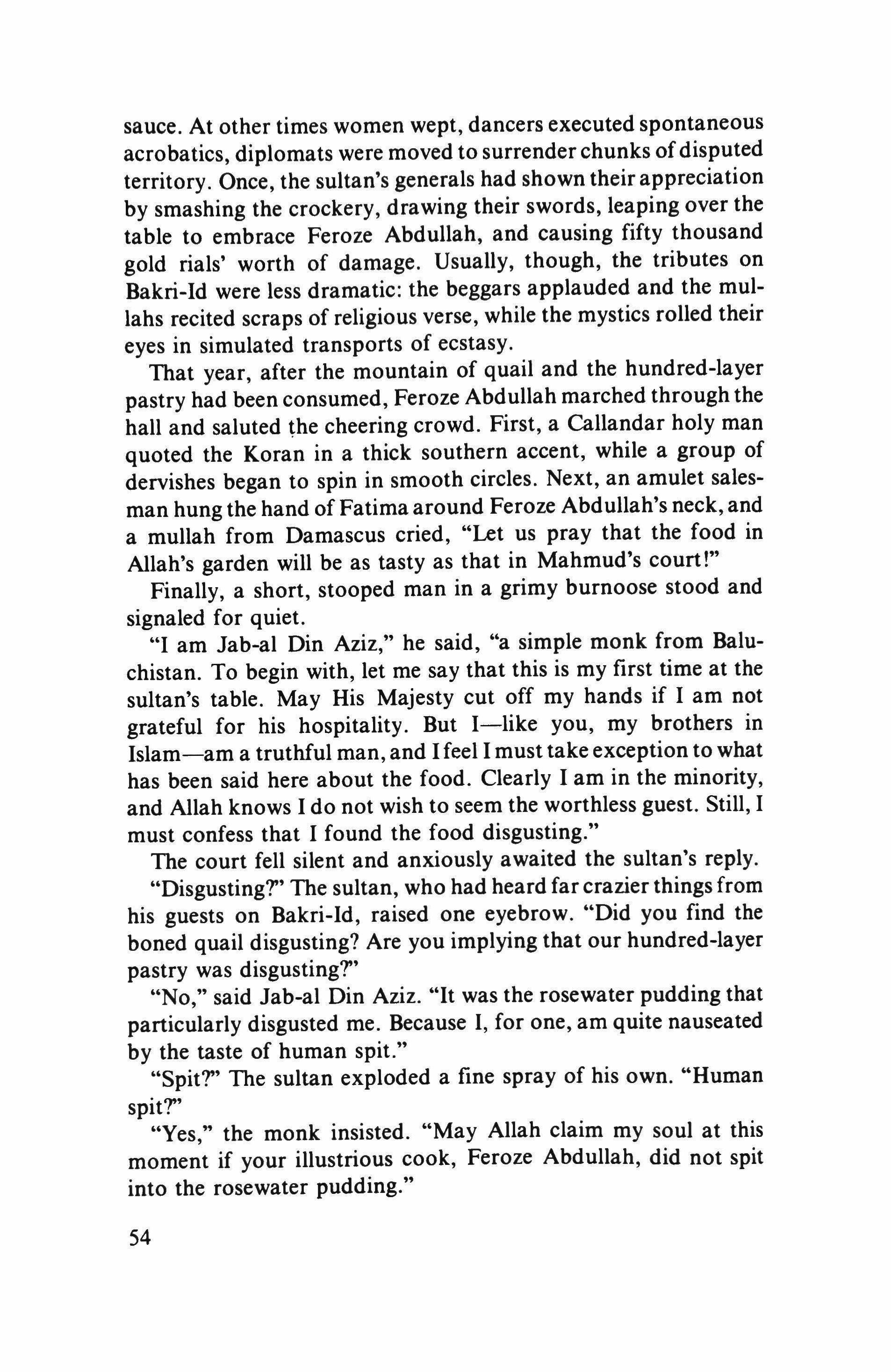
sauce. At other times women wept, dancers executed spontaneous acrobatics, diplomats were moved to surrender chunks ofdisputed territory. Once, the sultan's generals had shown their appreciation by smashing the crockery, drawing their swords, leaping over the table to embrace Feroze Abdullah, and causing fifty thousand gold rials' worth of damage. Usually, though, the tributes on Bakri-Id were less dramatic: the beggars applauded and the mullahs recited scraps of religious verse, while the mystics rolled their eyes in simulated transports of ecstasy.
That year, after the mountain of quail and the hundred-layer pastry had been consumed, Feroze Abdullah marched through the hall and saluted the cheering crowd. First, a Callandar holy man quoted the Koran in a thick southern accent, while a group of dervishes began to spin in smooth circles. Next, an amulet salesman hung the hand of Fatima around Feroze Abdullah's neck, and a mullah from Damascus cried, "Let us pray that the food in Allah's garden will be as tasty as that in Mahmud's court!"
Finally, a short, stooped man in a grimy burnoose stood and signaled for quiet.
"I am Jab-al Din Aziz," he said, "a simple monk from Baluchistan. To begin with, let me say that this is my first time at the sultan's table. May His Majesty cut off my hands if I am not grateful for his hospitality. But I-like you, my brothers in Islam-am a truthful man, and I feel I must take exception to what has been said here about the food. Clearly I am in the minority, and Allah knows I do not wish to seem the worthless guest. Still, I must confess that I found the food disgusting."
The court fell silent and anxiously awaited the sultan's reply.
"Disgusting?" The sultan, who had heard far crazier things from his guests on Bakri-Id, raised one eyebrow. "Did you find the boned quail disgusting? Are you implying that our hundred-layer pastry was disgusting?"
"No," said Jab-al Din Aziz. "It was the rosewater pudding that particularly disgusted me. Because I, for one, am quite nauseated by the taste of human spit."
"Spit?" The sultan exploded a fine spray of his own. "Human spit?"
"Yes," the monk insisted. "May Allah claim my soul at this moment if your illustrious cook, Feroze Abdullah, did not spit into the rosewater pudding." S4
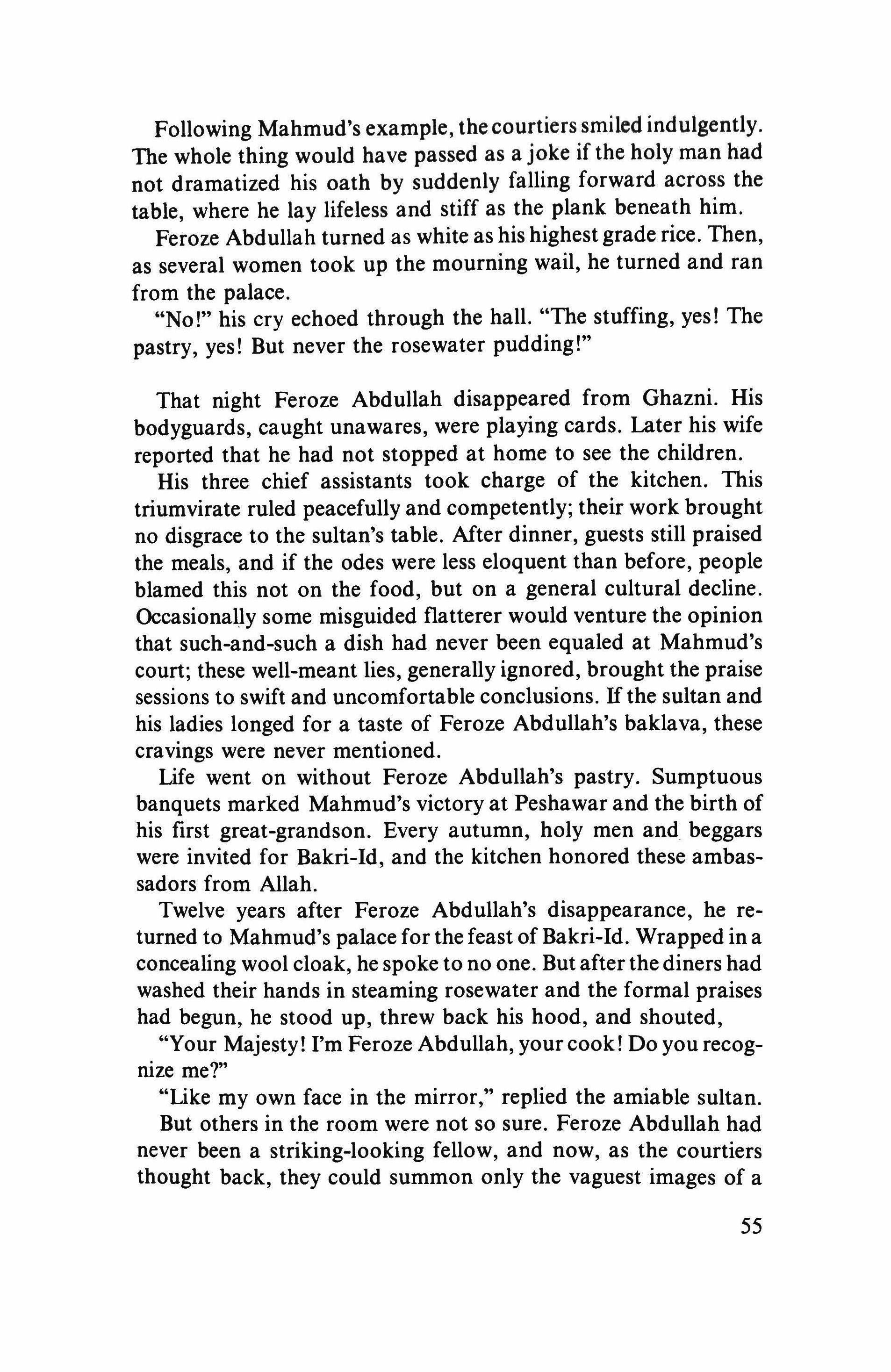
Following Mahmud's example, the courtiers smiled indulgently. The whole thing would have passed as a joke if the holy man had not dramatized his oath by suddenly falling forward across the table, where he lay lifeless and stiff as the plank beneath him.
Feroze Abdullah turned as white as his highestgrade rice. Then, as several women took up the mourning wail, he turned and ran from the palace.
"No!" his cry echoed through the hall. "The stuffing, yes! The pastry, yes! But never the rosewater pudding!"
That night Feroze Abdullah disappeared from Ghazni. His bodyguards, caught unawares, were playing cards. Later his wife reported that he had not stopped at home to see the children.
His three chief assistants took charge of the kitchen. This triumvirate ruled peacefully and competently; their work brought no disgrace to the sultan's table. After dinner, guests still praised the meals, and if the odes were less eloquent than before, people blamed this not on the food, but on a general cultural decline. Occasionally some misguided flatterer would venture the opinion that such-and-such a dish had never been equaled at Mahmud's court; these well-meant lies, generally ignored, brought the praise sessions to swift and uncomfortable conclusions. If the sultan and his ladies longed for a taste of Feroze Abdullah's baklava, these cravings were never mentioned.
Life went on without Feroze Abdullah's pastry. Sumptuous banquets marked Mahmud's victory at Peshawar and the birth of his first great-grandson. Every autumn, holy men and beggars were invited for Bakri-Id, and the kitchen honored these ambassadors from Allah.
Twelve years after Feroze Abdullah's disappearance, he returned to Mahmud's palace for the feast of Bakri-Id. Wrapped in a concealing wool cloak, he spoke to no one. But after the diners had washed their hands in steaming rosewater and the formal praises had begun, he stood up, threw back his hood, and shouted, "Your Majesty! I'm Feroze Abdullah, your cook! Do you recognize me?"
"Like my own face in the mirror," replied the amiable sultan. But others in the room were not so sure. Feroze Abdullah had never been a striking-looking fellow, and now, as the courtiers thought back, they could summon only the vaguest images of a

sinewy man in a gravy-stained waistcoat. For the life oftheir souls, they could not have said if this crusty old monk had once been the greatest chef in Asia.
"A dozen years ago," he began, "I saw the light of Allah in this very hall. Most of you know the story, but I am sure you have never seen it from my point of view. Even now, you do not realize that I was the only one who understood: Jab-al Din Aziz was right. I did spit in the food. Likewise I was the only one who foresaw that his oath was false. There was no spit in the rosewater pudding, and Allah claimed his soul."
A murmur went through the crowd. Several mystics whispered, "It is Feroze Abdullah." The beggars said no, the cook had been a quiet type, while this holy man was rambling on
"In the' instant before Jab-al-Din Aziz was stricken," Feroze Abdullah cut them short, "I saw a brilliant light illuminate this hall like fat exploding in an oven. And suddenly I tasted such a sweetness on my tongue that I-a man content with greasy stew and cold bread-I knew I would gladly die for another taste.
"I was a good Muslim, you recall, but no fanatic. Yet instantly I knew: I must leave Ghazni, go off into the woods, and put on a holy man's homespun patchwork.
"I fasted, whipped myself, prayed and prayed. Eight times I journeyed to Mecca, sleepingby the roadside all the way. I visited a fakir who had lived inside a burning furnace for twenty years, an old man in Jeddah who had taught his mynah bird to imitate a muezzin calling the faithful to prayer. I sat at the feet of a two-yearold boy who knew the whole Koran by heart, and studied with the Essrun Master, who had dictated a twelve-volume treatise on ecstasy in one trance.
"I gained powers, learned tricks. I can tell when a visitor is approaching from three hundred miles away. I know the names of men I have never met. I can make a heap ofdust appear in my hand and materialize a poppy grown only in the meadows of Tabriz. I even attracted a few disciples of my own Feroze Abdullah stared down at the rose petals floating in his finger bowl.
"But, Your Excellence," he said softly, "I never again saw the light which shone at that feast of Bakri-Id. And I never tasted the sweetness I tasted that night in this hall."
Moved by the sadness in his voice, the sultan said, "And we have never tasted the likes of your baklava."
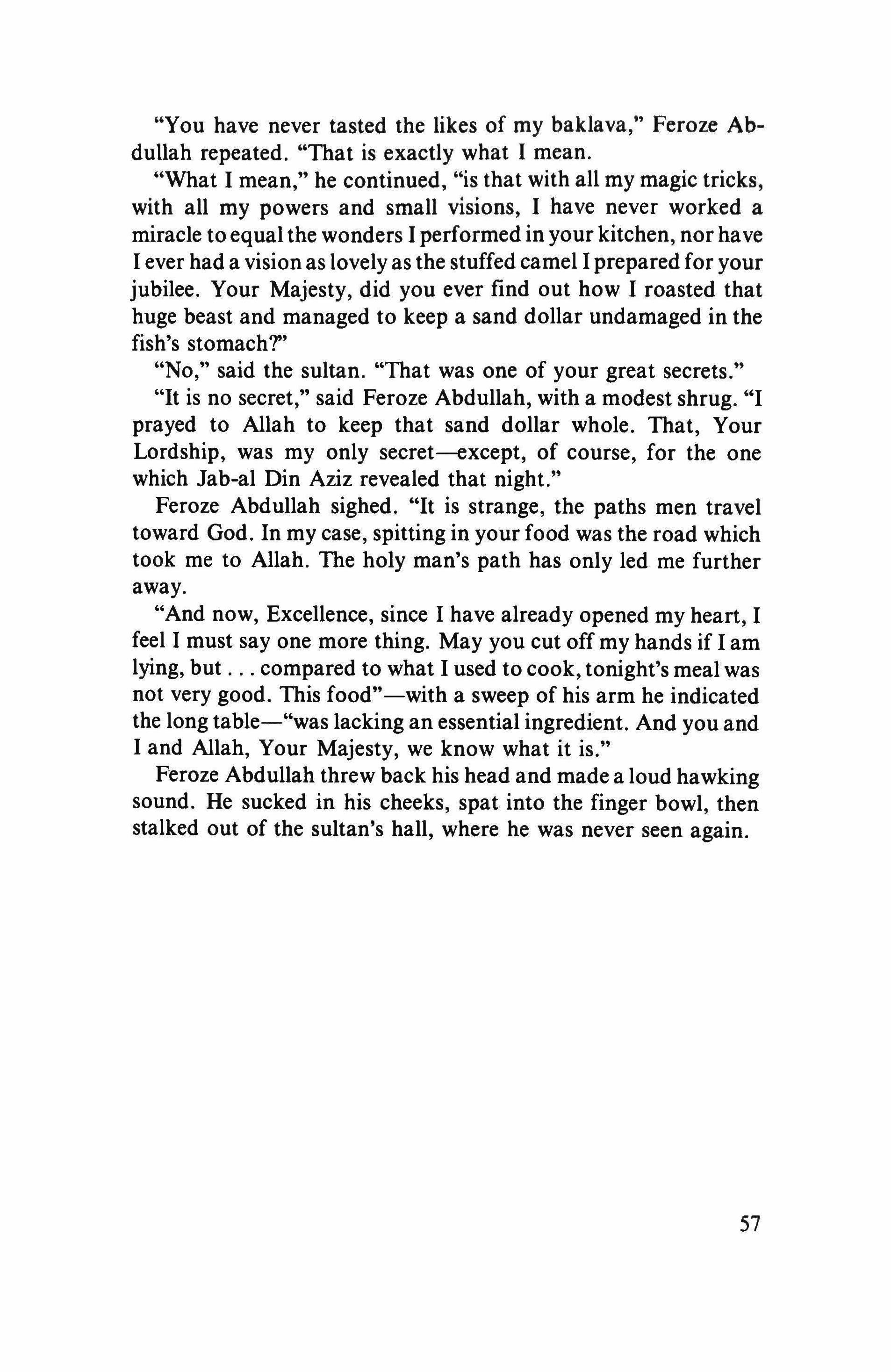
"You have never tasted the likes of my baklava," Feroze Abdullah repeated. "That is exactly what I mean.
"What I mean," he continued, "is that with all my magic tricks, with all my powers and small visions, I have never worked a miracle to equal the wonders I performed in your kitchen, nor have I ever had a vision as lovely as the stuffed camel I prepared for your jubilee, Your Majesty, did you ever find out how I roasted that huge beast and managed to keep a sand dollar undamaged in the fish's stomach?"
"No," said the sultan. "That was one of your great secrets."
"It is no secret," said Feroze Abdullah, with a modest shrug. "I prayed to Allah to keep that sand dollar whole. That, Your Lordship, was my only secret-except, of course, for the one which Jab-al Din Aziz revealed that night."
Feroze Abdullah sighed. "It is strange, the paths men travel toward God. In my case, spitting in your food was the road which took me to Allah. The holy man's path has only led me further away.
"And now, Excellence, since I have already opened my heart, I feel I must say one more thing. May you cut off my hands if I am lying, but compared to what I used to cook, tonight's meal was not very good. This food"-with a sweep of his arm he indicated the long table-"was lacking an essential ingredient. And you and I and Allah, Your Majesty, we know what it is."
Feroze Abdullah threw back his head and made a loud hawking sound. He sucked in his cheeks, spat into the finger bowl, then stalked out of the sultan's hall, where he was never seen again.

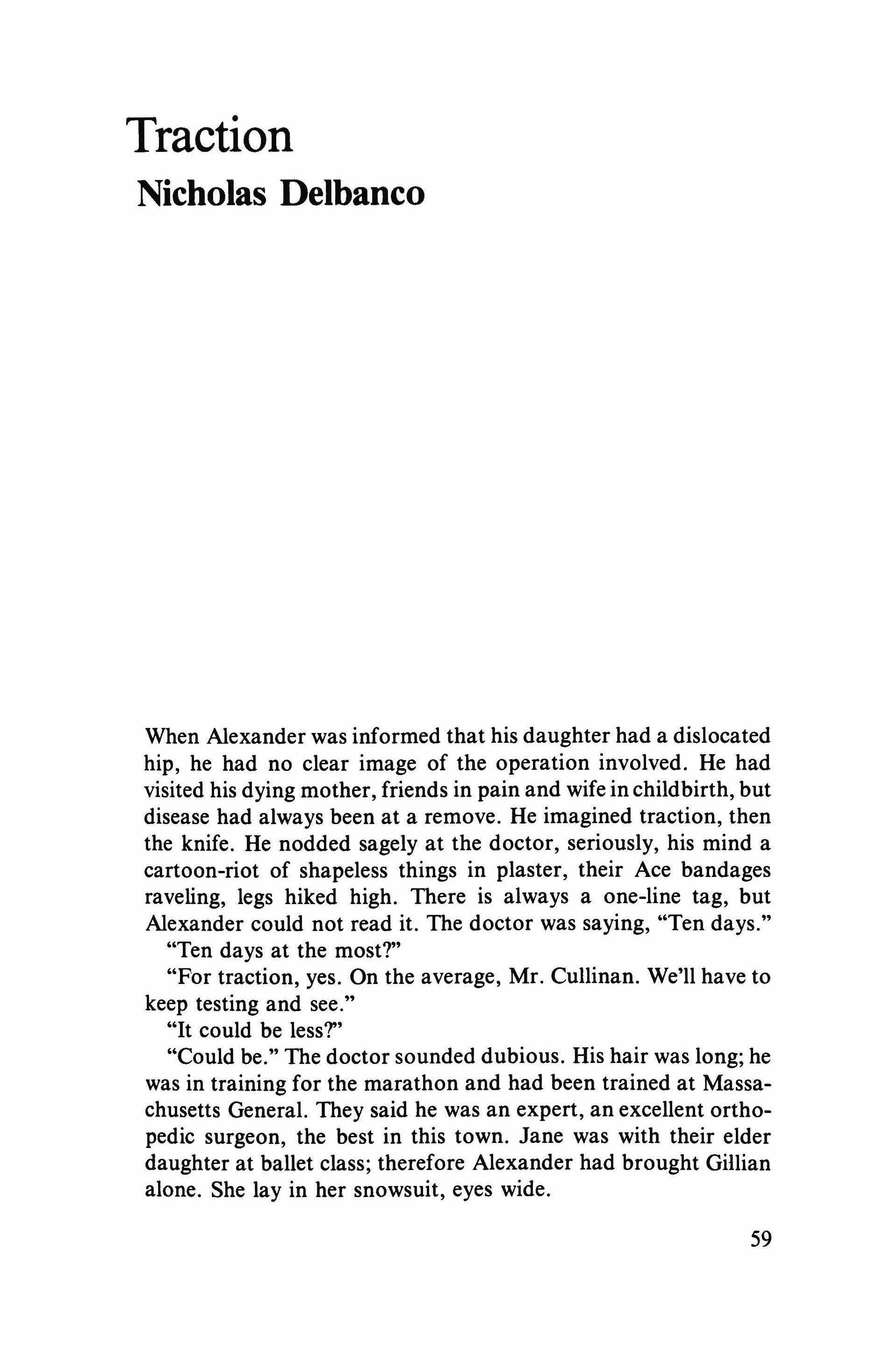
When Alexander was informed that his daughter had a dislocated hip, he had no clear image of the operation involved. He had visited his dying mother, friends in pain and wife in childbirth, but disease had always been at a remove. He imagined traction, then the knife. He nodded sagely at the doctor, seriously, his mind a cartoon-riot of shapeless things in plaster, their Ace bandages raveling, legs hiked high. There is always a one-line tag, but Alexander could not read it. The doctor was saying, "Ten days."
"Ten days at the most?"
"For traction, yes. On the average, Mr. Cullinan. We'll have to keep testing and see."
"It could be less?"
"Could be." The doctor sounded dubious. His hair was long; he was in training for the marathon and had been trained at Massachusetts General. They said he was an expert, an excellent orthopedic surgeon, the best in this town. Jane was with their elder daughter at ballet class; therefore Alexander had brought Gillian alone. She lay in her snowsuit, eyes wide.

"How do you test for it?"
"By X ray. Ten days is a ball-parkfigure. We'd hoped the Pavlik harness would have done the trick."
"We'd hoped so too," said Alexander. When their baby had been fitted for the harness, six months before and six months old, they'd thought it cruel confinement; now it seemed like freedom by comparison with what would come. Freedom's a comparative, he thought; the sling was of an airy lightness and had not hampered her. She had been learning to crawl.
"You understand," the doctor said. "It's not so early any more. It's frankly dislocated now. We can't afford to wait."
"I understand that. But a second opinion
"Of course. You should take her to Boston."
"Yes."
"Take the X rays with you and let's hope they disagree." The doctor smiled, not meaning it. "I'll set up the admission here for Tuesday."
"Is there any chance the traction will be adequate? I mean, just traction? That you won't have to operate?"
Her X rays filled the envelope. They were encased in cardboard but felt leaden nonetheless. "No. I'm afraid not. None."
"Thank you, Doctor."
"You're welcome."
"I'm sorry to have taken so much time."
"That's what we're here for."
"It does surprise me," Alexander said again. "We had such faith in the harness."
They stood. They were of the same age and height. Gillian opened her arms, and he hoisted her up from the table. His authority, however, had been relinquished in the waiting room. The doctor took some seeming-relish in bringing the lawyer to book. "We've got to make the best of it," he said. "It won't bother the child if it doesn't bother the parents. You'll be surprised at how adaptable they are. She doesn't know what walking's like, remember; she won't miss it. And in any case we've got no choice-we've waited as long as we can."
He drove to Boston the next day, with his three women on the back bench of the Jeep. His wife was drinking heavily. She had periodic bouts with what she called her first lover, Jack Daniels,
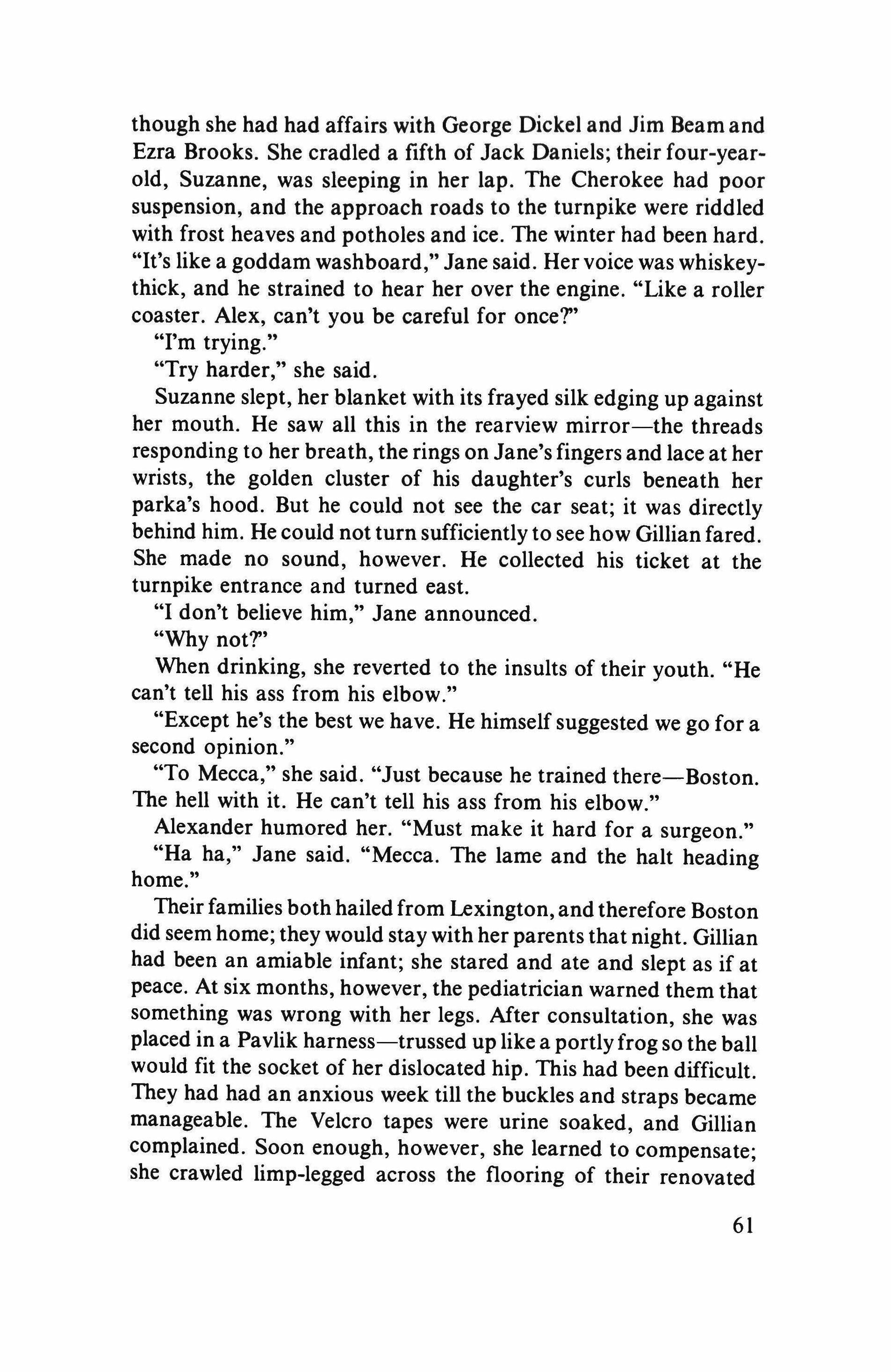
though she had had affairs with George Dickel and Jim Beam and Ezra Brooks. She cradled a fifth of Jack Daniels; their four-yearold, Suzanne, was sleeping in her lap. The Cherokee had poor suspension, and the approach roads to the turnpike were riddled with frost heaves and potholes and ice. The winter had been hard. "It's like a goddam washboard," Jane said. Her voice was whiskeythick, and he strained to hear her over the engine. "Like a roller coaster. Alex, can't you be careful for once'!'
"I'm trying."
"Try harder," she said.
Suzanne slept, her blanket with its frayed silk edging up against her mouth. He sawall this in the rearview mirror-the threads responding to her breath, the rings on Jane's fingers and lace at her wrists, the golden cluster of his daughter's curls beneath her parka's hood. But he could not see the car seat; it was directly behind him. He could not turn sufficiently to see how Gillian fared. She made no sound, however. He collected his ticket at the turnpike entrance and turned east.
"I don't believe him," Jane announced.
"Why not?"
When drinking, she reverted to the insults of their youth. "He can't tell his ass from his elbow."
"Except he's the best we have. He himself suggested we go for a second opinion."
"To Mecca," she said. "Just because he trained there-Boston. The hell with it. He can't tell his ass from his elbow."
Alexander humored her. "Must make it hard for a surgeon."
"Ha ha," Jane said. "Mecca. The lame and the halt heading home."
Their families both hailed from Lexington, and therefore Boston did seem home; they would stay with her parents that night. Gillian had been an amiable infant; she stared and ate and slept as if at peace. At six months, however, the pediatrician warned them that something was wrong with her legs. After consultation, she was placed in a Pavlik harness-trussed up like a portlyfrog so the ball would fit the socket of her dislocated hip. This had been difficult. They had had an anxious week till the buckles and straps became manageable. The Velcro tapes were urine soaked, and Gillian complained. Soon enough, however, she learned to compensate; she crawled limp-legged across the flooring of their renovated

barn. "Man is born, he suffers and he dies," said Alexander, quoting precepts that he did not deeply feel. "There's worse to come as long as you can say that life's not over yet."
"That's chitchat," Jane said. "Just elegant chitchat. As long as they tell us our baby's all right She tilted the bottle toward him and left the phrase unfinished. Suzanne stirred in her sleep.
In Children's Hospital, however, the diagnosis was confirmed. Gillian would require an operation, and the sooner the better; she would wear a Spica cast for six months at least. This doctor was a woman-black-haired, thick-legged, wearing glasses. Her waiting room was full, and she had small interest in, or patience with, the Cullinans. "It's congenital," she said, "in 90 percent of the cases. And 90 percent of those affected are female. Did you"-she turned to Jane-"or did your mother have a dislocated hip?"
"Not that I know of," said Jane. "No one in our family."
"Well, there we have it. The recessive gene." She took the X rays once again and slapped them on a lighted screen. "We could admit her here," she said. "Or you could do it in Vermont. Go to the sixth floor and look at the ward. There's a baby there who's just been operated on, and the nurse will show you what it looks like. Good luck."
Dismissed, they rose. The baby on the sixth floor was stretched on a steel frame. She was encased in plaster from the armpits to the toes; the nurse said the problem was keeping the cast clean. Jane sat; she put her head down. "I'm dizzy," she said. "I think 1 may faint." There were rocking chairs and mobiles and stuffed animals on the ward; there were cuckoo clocks with sprung works on the walls. The child on the bed was logy from the anesthetic, said the nurse. She repeated the word "logy" as if, once alert, the child would have no cast. A plastic bagprotruded, and there was a basin underneath the frame. "For her evacuations," the nurse said. She touched Alexander's arm, proprietary. "When she voids."
"We have to go now," Jane said.
Alexander held Gillian. She clutched her blanket, flush-faced, with the line of bone beneath her eyebrows pink from recent crying. "I have to have air," Jane said. "Thanks for the demonstration. We have to leave."
It was rush hour, and their retreat to Lexington was slow. In the car Jane keened. She rocked in her seat, saying "Baby, my baby," and "Why did this happen to us'!'
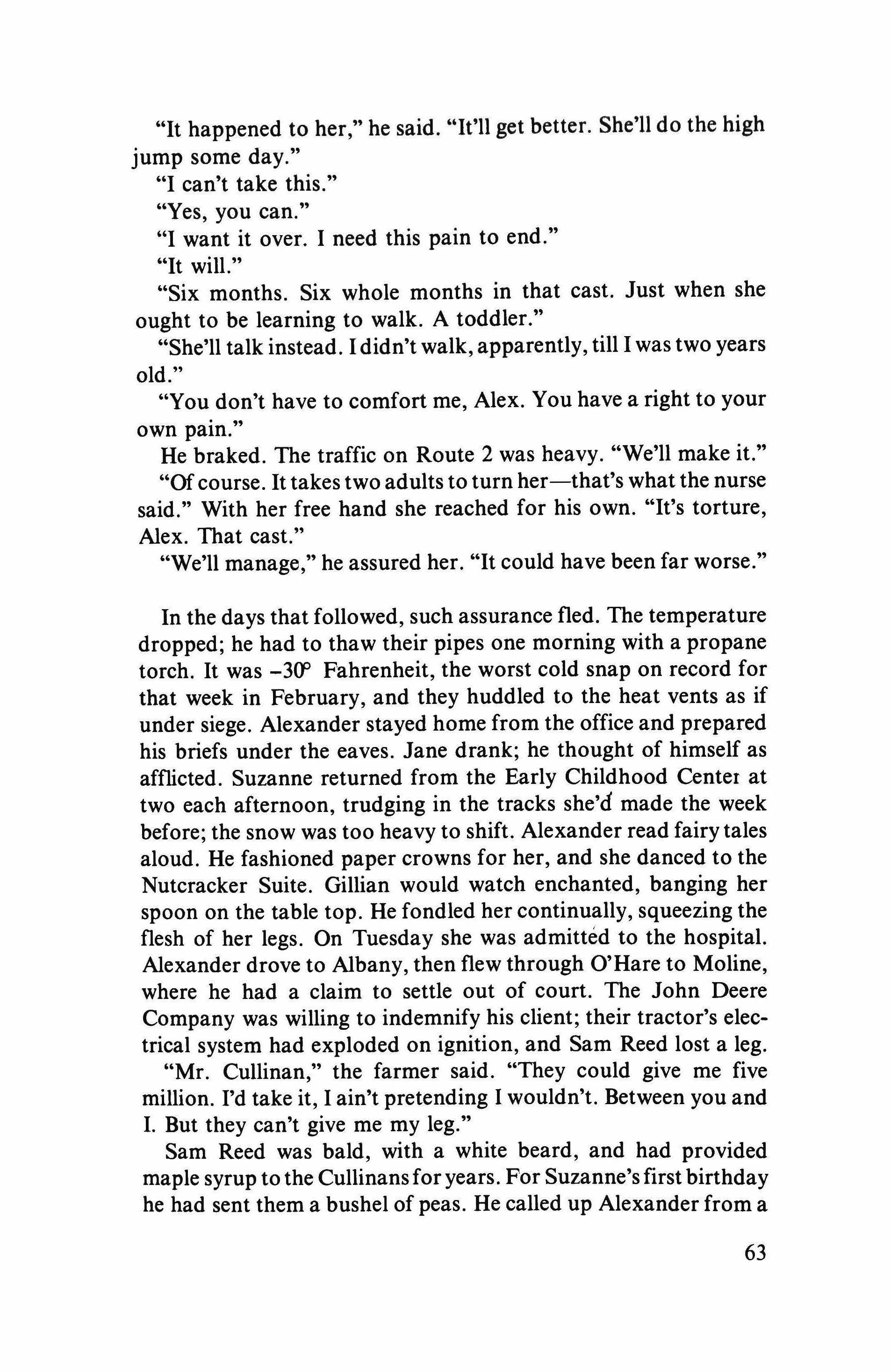
"It happened to her," he said. "It'll get better. She'll do the high jump some day."
"I can't take this."
"Yes, you can."
"I want it over. I need this pain to end."
"It will."
"Six months. Six whole months in that cast. Just when she ought to be learning to walk. A toddler."
"She'll talk instead. I didn't walk, apparently, till I was two years old."
"You don't have to comfort me, Alex. You have a right to your own pain."
He braked. The traffic on Route 2 was heavy. "We'll make it."
"Of course. It takes two adults to turn her-that's what the nurse said." With her free hand she reached for his own. "It's torture, Alex. That cast."
"We'll manage," he assured her. "It could have been far worse."
In the days that followed, such assurance fled. The temperature dropped; he had to thaw their pipes one morning with a propane torch. It was -3(1' Fahrenheit, the worst cold snap on record for that week in February, and they huddled to the heat vents as if under siege. Alexander stayed home from the office and prepared his briefs under the eaves. Jane drank; he thought of himself as afflicted. Suzanne returned from the Early Childhood Center at two each afternoon, trudging in the tracks she'd made the week before; the snow was too heavy to shift. Alexander read fairy tales aloud. He fashioned paper crowns for her, and she danced to the Nutcracker Suite. Gillian would watch enchanted, banging her spoon on the table top. He fondled her continually, squeezing the flesh of her legs. On Tuesday she was admitted to the hospital. Alexander drove to Albany, then flew through O'Hare to Moline, where he had a claim to settle out of court. The John Deere Company was willing to indemnify his client; their tractor's electrical system had exploded on ignition, and Sam Reed lost a leg.
"Mr. Cullinan," the farmer said. "They could give me five million. I'd take it, I ain't pretending I wouldn't. Between you and I. But they can't give me my leg."
Sam Reed was bald, with a white beard, and had provided maple syrup to the Cullinansfor years. For Suzanne's first birthday he had sent them a bushel of peas. He called up Alexander from a
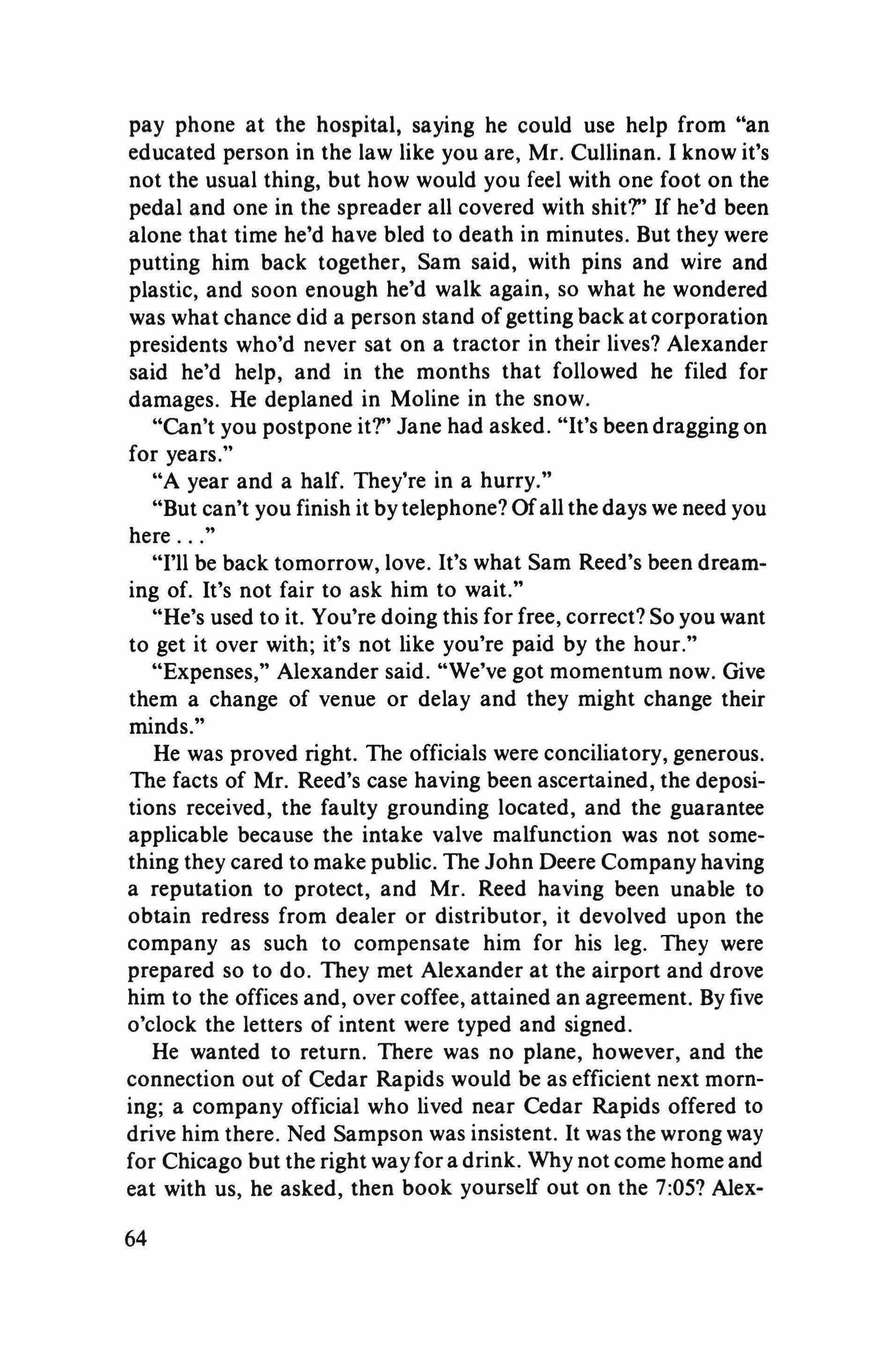
pay phone at the hospital, saying he could use help from "an educated person in the law like you are, Mr. Cullinan. I know it's not the usual thing, but how would you feel with one foot on the pedal and one in the spreader all covered with shit?" If he'd been alone that time he'd have bled to death in minutes. But they were putting him back together, Sam said, with pins and wire and plastic, and soon enough he'd walk again, so what he wondered was what chance did a person stand of getting back at corporation presidents who'd never sat on a tractor in their lives? Alexander said he'd help, and in the months that followed he filed for damages. He deplaned in Moline in the snow.
"Can't you postpone it?" Jane had asked. "It's been dragging on for years."
"A year and a half. They're in a hurry."
"But can't you finish it bytelephone? Ofall the days we need you here
"I'll be back tomorrow, love. It's what Sam Reed's been dreaming of. It's not fair to ask him to wait."
"He's used to it. You're doing this for free, correct? So you want to get it over with; it's not like you're paid by the hour."
"Expenses," Alexander said. "We've got momentum now. Give them a change of venue or delay and they might change their minds."
He was proved right. The officials were conciliatory, generous. The facts of Mr. Reed's case having been ascertained, the depositions received, the faulty grounding located, and the guarantee applicable because the intake valve malfunction was not something they cared to make public. The John Deere Company having a reputation to protect, and Mr. Reed having been unable to obtain redress from dealer or distributor, it devolved upon the company as such to compensate him for his leg. They were prepared so to do. They met Alexander at the airport and drove him to the offices and, over coffee, attained an agreement. By five o'clock the letters of intent were typed and signed.
He wanted to return. There was no plane, however, and the connection out of Cedar Rapids would be as efficient next morning; a company official who lived near Cedar Rapids offered to drive him there. Ned Sampson was insistent. It was the wrong way for Chicago but the right way for a drink. Why not come home and eat with us, he asked, then book yourself out on the 7:05? Alex-
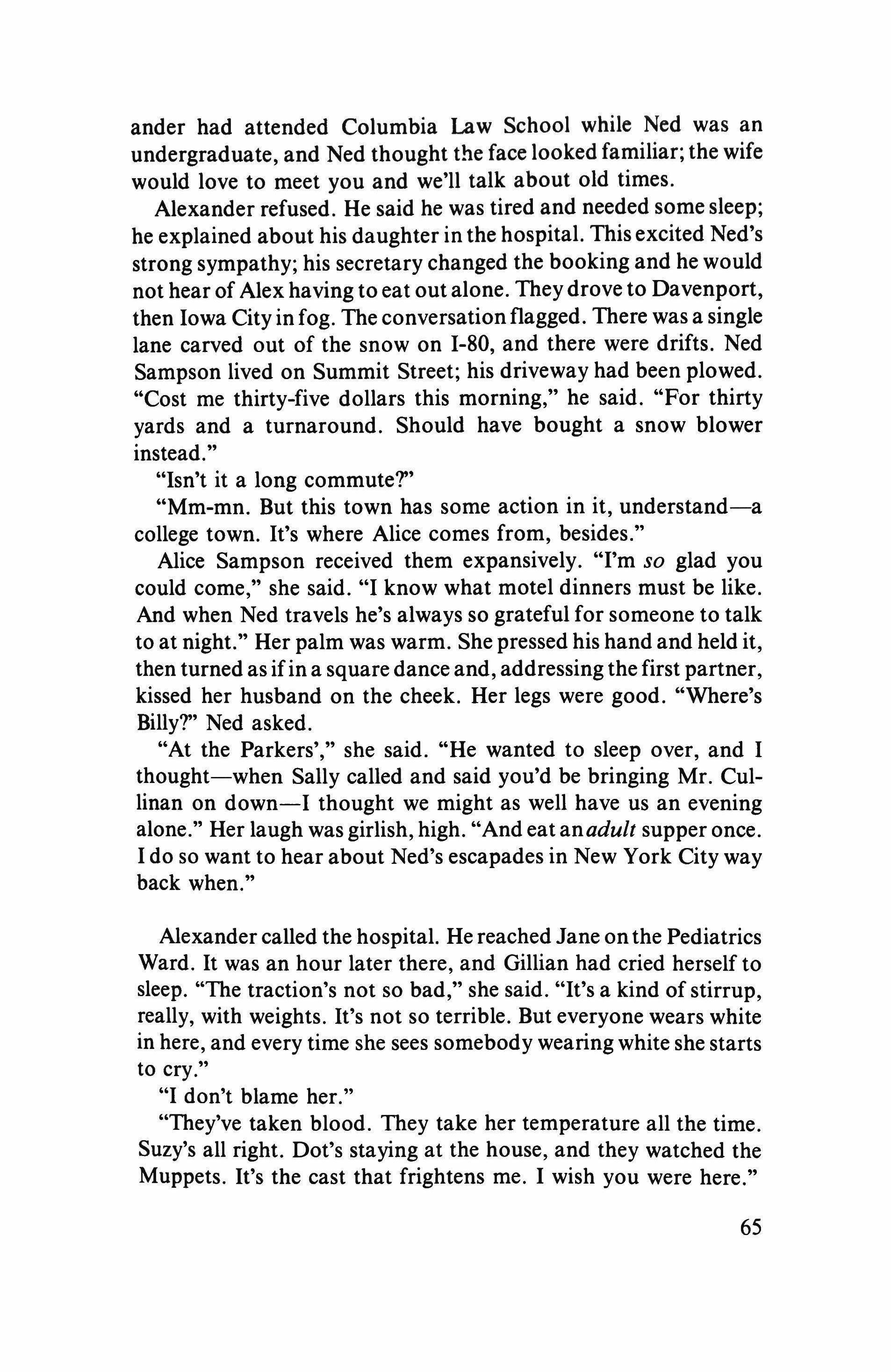
ander had attended Columbia Law School while Ned was an undergraduate, and Ned thought the face looked familiar; the wife would love to meet you and we'll talk about old times.
Alexander refused. He said he was tired and needed some sleep; he explained about his daughter in the hospital. This excited Ned's strong sympathy; his secretary changed the booking and he would not hear of Alex having to eat out alone. They drove to Davenport, then Iowa City in fog. The conversationflagged. There was a single lane carved out of the snow on I-80, and there were drifts. Ned Sampson lived on Summit Street; his driveway had been plowed. "Cost me thirty-five dollars this morning," he said. "For thirty yards and a turnaround. Should have bought a snow blower instead."
"Isn't it a long commute?"
"Mm-mn. But this town has some action in it, understand-a college town. It's where Alice comes from, besides."
Alice Sampson received them expansively. "I'm so glad you could come," she said. "I know what motel dinners must be like. And when Ned travels he's always so grateful for someone to talk to at night." Her palm was warm. She pressed his hand and held it, then turned as ifin a square dance and, addressing the first partner, kissed her husband on the cheek. Her legs were good. "Where's Billy?" Ned asked.
"At the Parkers'," she said. "He wanted to sleep over, and I thought-when Sally called and said you'd be bringing Mr. Cullinan on down-I thought we might as well have us an evening alone." Her laugh was girlish, high. "And eat an adult supper once. I do so want to hear about Ned's escapades in New York City way back when."
Alexander called the hospital. He reached Jane on the Pediatrics Ward. It was an hour later there, and Gillian had cried herself to sleep. "The traction's not so bad," she said. "It's a kind of stirrup, really, with weights. It's not so terrible. But everyone wears white in here, and every time she sees somebody wearing white she starts to cry."
"I don't blame her."
"They've taken blood. They take her temperature all the time. Suzy's all right. Dot's staying at the house, and they watched the Muppets. It's the cast that frightens me. I wish you were here."
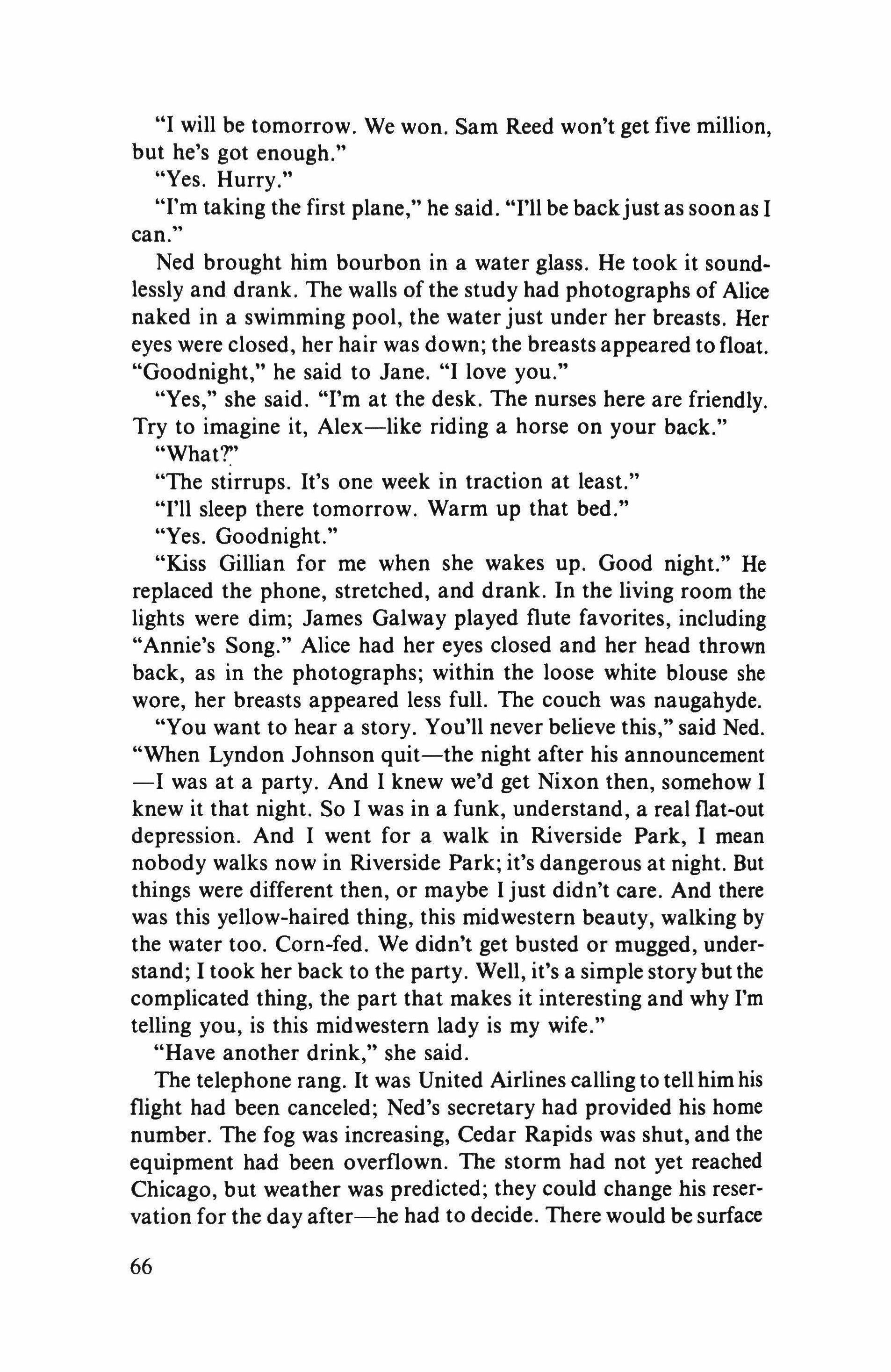
"I will be tomorrow. We won. Sam Reed won't get five million, but he's got enough."
"Yes. Hurry."
"I'm taking the first plane," he said. "I'll be backjust as soon as I can."
Ned brought him bourbon in a water glass. He took it soundlessly and drank. The walls of the study had photographs of Alice naked in a swimming pool, the water just under her breasts. Her eyes were closed, her hair was down; the breasts appeared to float. "Goodnight," he said to Jane. "I love you."
"Yes," she said. "I'm at the desk. The nurses here are friendly. Try to imagine it, Alex-like riding a horse on your back."
"What?'.'
"The stirrups. It's one week in traction at least."
"I'll sleep there tomorrow. Warm up that bed."
"Yes. Goodnight."
"Kiss Gillian for me when she wakes up. Good night." He replaced the phone, stretched, and drank. In the living room the lights were dim; James Galway played flute favorites, including "Annie's Song." Alice had her eyes closed and her head thrown back, as in the photographs; within the loose white blouse she wore, her breasts appeared less full. The couch was naugahyde.
"You want to hear a story. You'll never believe this," said Ned. "When Lyndon Johnson quit-the night after his announcement -I was at a party. And I knew we'd get Nixon then, somehow I knew it that night. So I was in a funk, understand, a real flat-out depression. And I went for a walk in Riverside Park, I mean nobody walks now in Riverside Park; it's dangerous at night. But things were different then, or maybe I just didn't care. And there was this yellow-haired thing, this midwestern beauty, walking by the water too. Corn-fed. We didn't get busted or mugged, understand; I took her back to the party. Well, it's a simple story but the complicated thing, the part that makes it interesting and why I'm telling you, is this midwestern lady is my wife."
"Have another drink," she said.
The telephone rang. It was United Airlines calling to tell him his flight had been canceled; Ned's secretary had provided his home number. The fog was increasing, Cedar Rapids was shut, and the equipment had been overflown. The storm had not yet reached Chicago, but weather was predicted; they could change his reservation for the day after-he had to decide. There would be surface
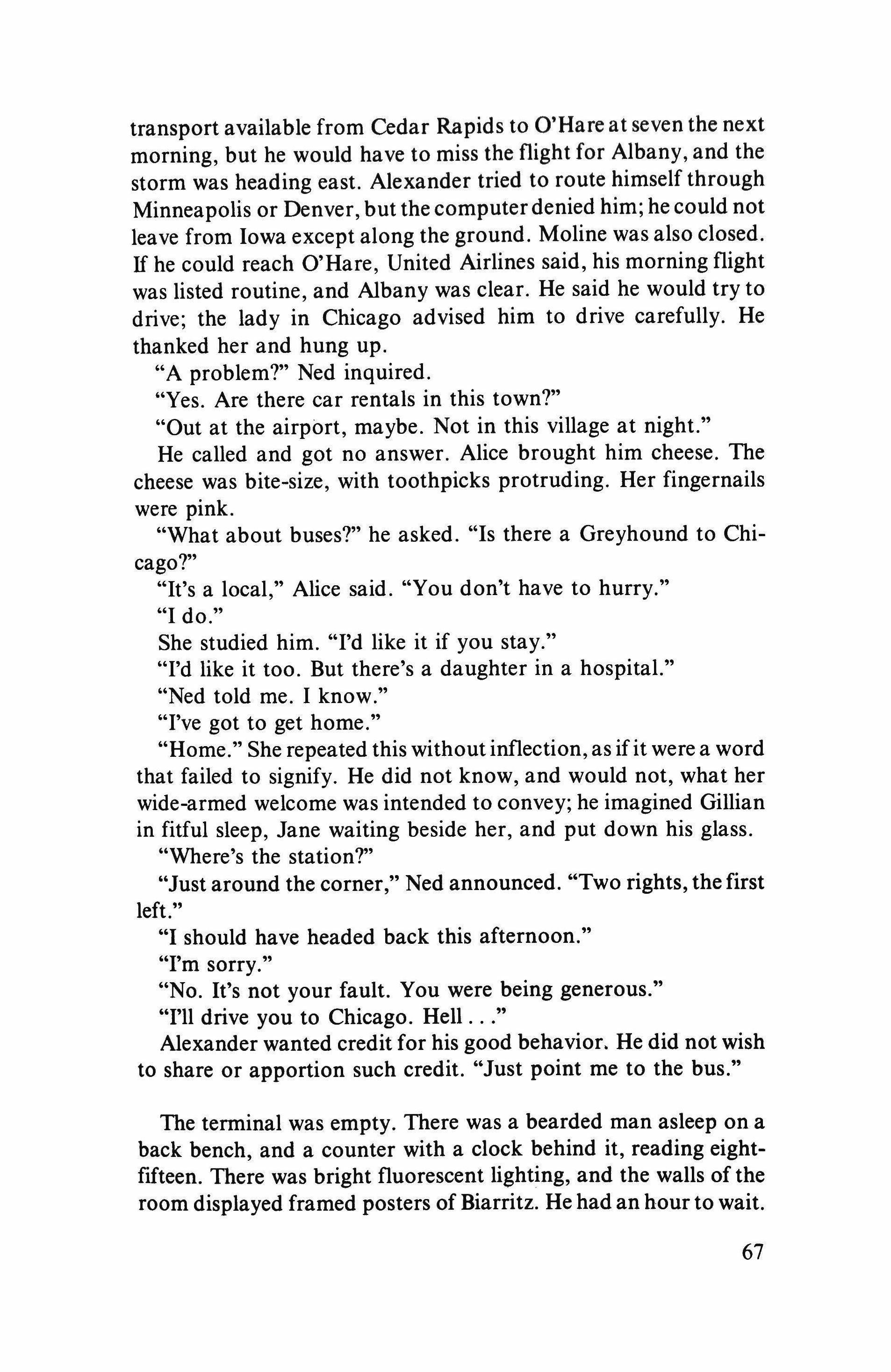
transport available from Cedar Rapids to O'Hare at seven the next morning, but he would have to miss the flight for Albany, and the storm was heading east. Alexander tried to route himself through Minneapolis or Denver, but the computer denied him; he could not leave from Iowa except along the ground. Moline was also closed. If he could reach O'Hare, United Airlines said, his morning flight was listed routine, and Albany was clear. He said he would try to drive; the lady in Chicago advised him to drive carefully. He thanked her and hung up.
"A problem?" Ned inquired.
"Yes. Are there car rentals in this town?"
"Out at the airport, maybe. Not in this village at night."
He called and got no answer. Alice brought him cheese. The cheese was bite-size, with toothpicks protruding. Her fingernails were pink.
"What about buses?" he asked. "Is there a Greyhound to Chicago?"
"It's a local," Alice said. "You don't have to hurry."
"I do."
She studied him. "I'd like it if you stay."
"I'd like it too. But there's a daughter in a hospital."
"Ned told me. I know."
"I've got to get home."
"Home." She repeated this without inflection, as ifit were a word that failed to signify. He did not know, and would not, what her wide-armed welcome was intended to convey; he imagined Gillian in fitful sleep, Jane waiting beside her, and put down his glass.
"Where's the station?"
"Just around the corner," Ned announced. "Two rights, the first left."
"I should have headed back this afternoon."
"I'm sorry."
"No. It's not your fault. You were being generous."
"I'll drive you to Chicago. Hell Alexander wanted credit for his good behavior. He did not wish to share or apportion such credit. "Just point me to the bus."
The terminal was empty. There was a bearded man asleep on a back bench, and a counter with a clock behind it, reading eightfifteen. There was bright fluorescent lighting, and the walls of the room displayed framed posters of Biarritz. He had an hour to wait.

He settled down, consigned to that limbo where the traveler goes nameless and unrecognized, where no one who knew him knew where they might find him. The paving was slick. He had nearly fallen in the terminal's front lot.
When the bus finally arrived, it was eleven o'clock. The driver took his money, said "Them roads are like a skating rink," and told him to go get a seat. There were none, it appeared. Then a black man on the aisle stirred in his sleep from the sprawl that had taken up two places, and Alexander sat down. He realized he had never ridden a long-distance bus in America; he had done so with some frequency in Italy and Switzerland and France. The dark shapes all around him seemed inured to such slow passage; they were asleep, or talking softly, or staring out windows at Iowa City in fog. Smoking was forbidden; he would have welcomed a smoke. The bus, with its windows sealed shut, felt overheated; he transferred his briefcase and satchel to the rack. Standing, he took offhis overcoat also. The bags were from a matched set Jane had given him on his thirty-fifth birthday, with his initials underneath the MC from Mark Cross. He felt embarrassed by such luxury and grateful for the dark. The black man beside him shifted again, his head shaved, skull like a mask. The eyebrows had a ridge of bone, and Alexander spent some minutes trying to identify the face; his father had instructed him in the distinguishing marks of masks. The phrase "Yoruba, lbo, Dan" became the litany of remembrance, and he decided that his neighbor derived from Ibo stock.
His father had had a collection of masks, and Alexander used to brandish shields and spears and daggers in the living room. His favorite mask was Ekoi, trimmed with human skin. "It's possible," his father said, "the skin here could be antelope. But that's thicker, usually, and not so mottled. These teeth are monkey teeth."
They stopped at a motel in order to change drivers, then stopped at Davenport. He closed his eyes but could not sleep, saw Gillian encased in plaster, Sam Reed blown apart. The fog was thick; the turnpike lights seemed beaten gold, and he heard the trucks they passed before he saw them looming. The driver wiped his windshield often, drying crescents on the glass, but it did not snow.
Alexander read signs pointing to Wisconsin and to Indiana; they reached the outskirts of Chicago before dawn. Then the traffic increased. At six o'clock the sky had not cleared, and he began to worry that O'Hare would also close. Arrived at the Greyhound
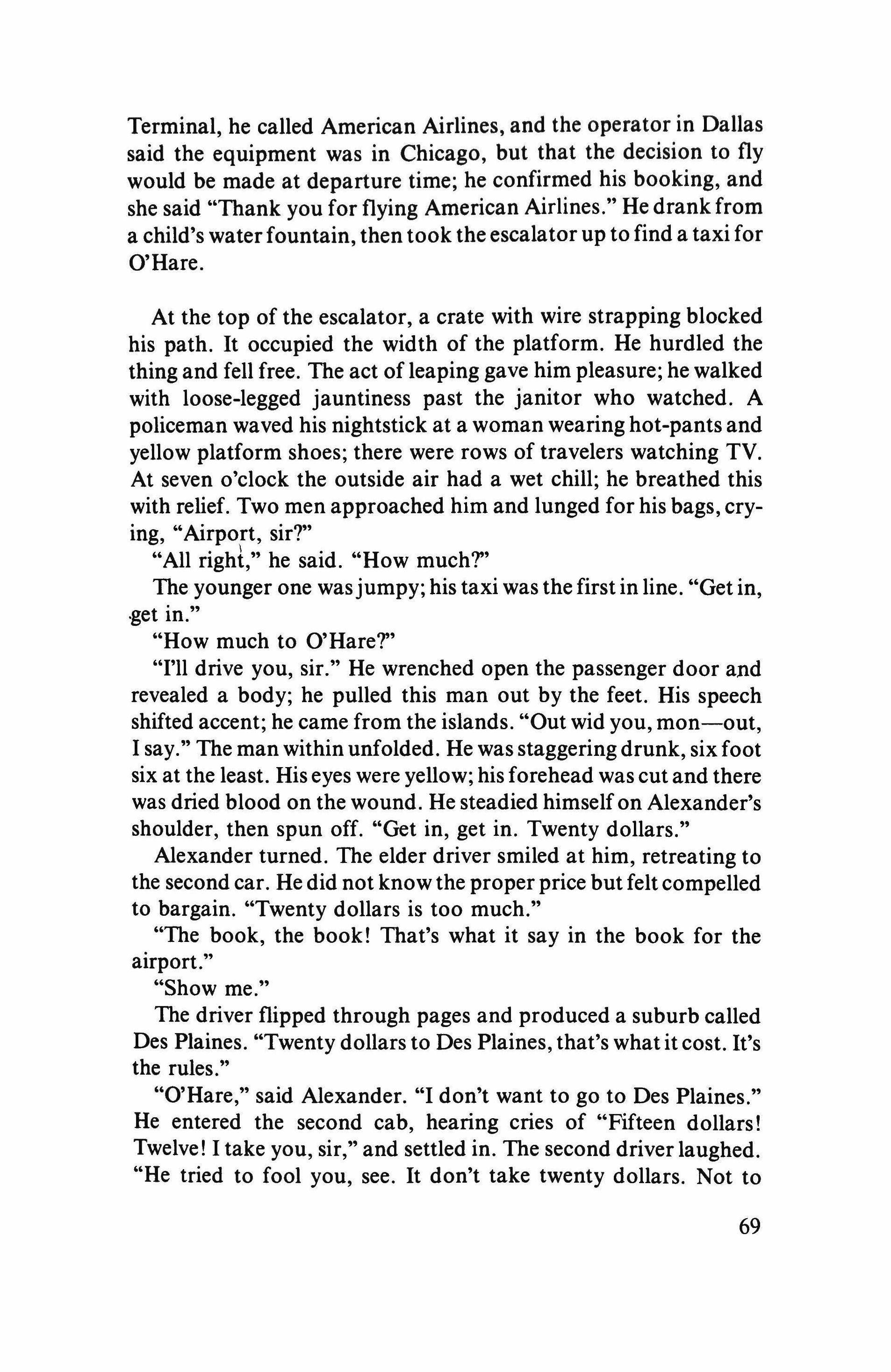
Terminal, he called American Airlines, and the operator in Dallas said the equipment was in Chicago, but that the decision to fly would be made at departure time; he confirmed his booking, and she said "Thank you for flying American Airlines." He drank from a child's water fountain, then took the escalator up to find a taxi for O'Hare.
At the top of the escalator, a crate with wire strapping blocked his path. It occupied the width of the platform. He hurdled the thing and fell free. The act of leaping gave him pleasure; he walked with loose-legged jauntiness past the janitor who watched. A policeman waved his nightstick at a woman wearing hot-pants and yellow platform shoes; there were rows of travelers watching TV. At seven o'clock the outside air had a wet chill; he breathed this with relief. Two men approached him and lunged for his bags, crying, "Airport, sir?"
"All right," he said. "How much?"
The younger one was jumpy; his taxi was the first in line. "Get in, .get in."
"How much to O'Hare?"
"I'll drive you, sir." He wrenched open the passenger door and revealed a body; he pulled this man out by the feet. His speech shifted accent; he came from the islands. "Out wid you, mon-out, I say." The man within unfolded. He was staggering drunk, six foot six at the least. His eyes were yellow; his forehead was cut and there was dried blood on the wound. He steadied himself on Alexander's shoulder, then spun off. "Get in, get in. Twenty dollars."
Alexander turned. The elder driver smiled at him, retreating to the second car. He did not know the proper price but felt compelled to bargain. "Twenty dollars is too much."
"The book, the book! That's what it say in the book for the airport."
"Show me."
The driver flipped through pages and produced a suburb called Des Plaines. "Twenty dollars to Des Plaines, that's what it cost. It's the rules."
"O'Hare," said Alexander. "I don't want to go to Des Plaines." He entered the second cab, hearing cries of "Fifteen dollars! Twelve! I take you, sir," and settled in. The second driver laughed. "He tried to fool you, see. It don't take twenty dollars. Not to

O'Hare. Fifteen's more like it, sir. He look in the book and you look in the book, and there's no airport where he looking. You a person who travels. correct?"
"Correct. "
"That boy he don't know nothing. He thought he could fool you. Des Plaines I"
The fog was palpable. Alexander closed his eyes. The driver was solicitous; he lectured Alexander on the need to get some rest. He himself came from Natchez but worked in Chicago and had his children and grandchildren in Chicago also; that was what was keeping him here when he could go home. He had a pension from the railroad and he drove this taxi for diversion and because the times were tight-just to keep busy, understand, keeping out ofhis wife's hair. He asked where Alexander was going, and when Alexander said Albany, he asked if Alexander lived near the Rockefeller ranch. They discussed the death of Nelson Rockefeller, and the driver speculated on the role of Nelson's wife and brothers, how much money they would get and what he himself would have done with the money. He reminded Alexander that Joe Kennedy left more behind than Rockefeller, four hundred million to sixtysix, about, and he wondered whether maybe someone could be holding something back. He wasn't a fisherman himself, but he could smell something fishy like that a mile off and driving a cab. He asked what was Alexander doing in this town, and whether he had family, and when he learned the reason for the trip he said "God bless your daughter," and "Don't worry, she'll be fine." They drove in silence then. The airport was crowded; he had forty minutes to spare before his scheduled flight. When Alexander proffered a five-dollar tip, the cabby repeated "God bless you. I'll pray for your daughter. Good luck."
He called his home. Suzanne answered. "Who is it?"
"Hi, darling."
"Hi, daddy."
"How are your'
"Fine." She said this with an intonation she reserved for phones -languorous and sweetly thoughtful. "I miss you."
"I miss you."
"When will you be coming back?"
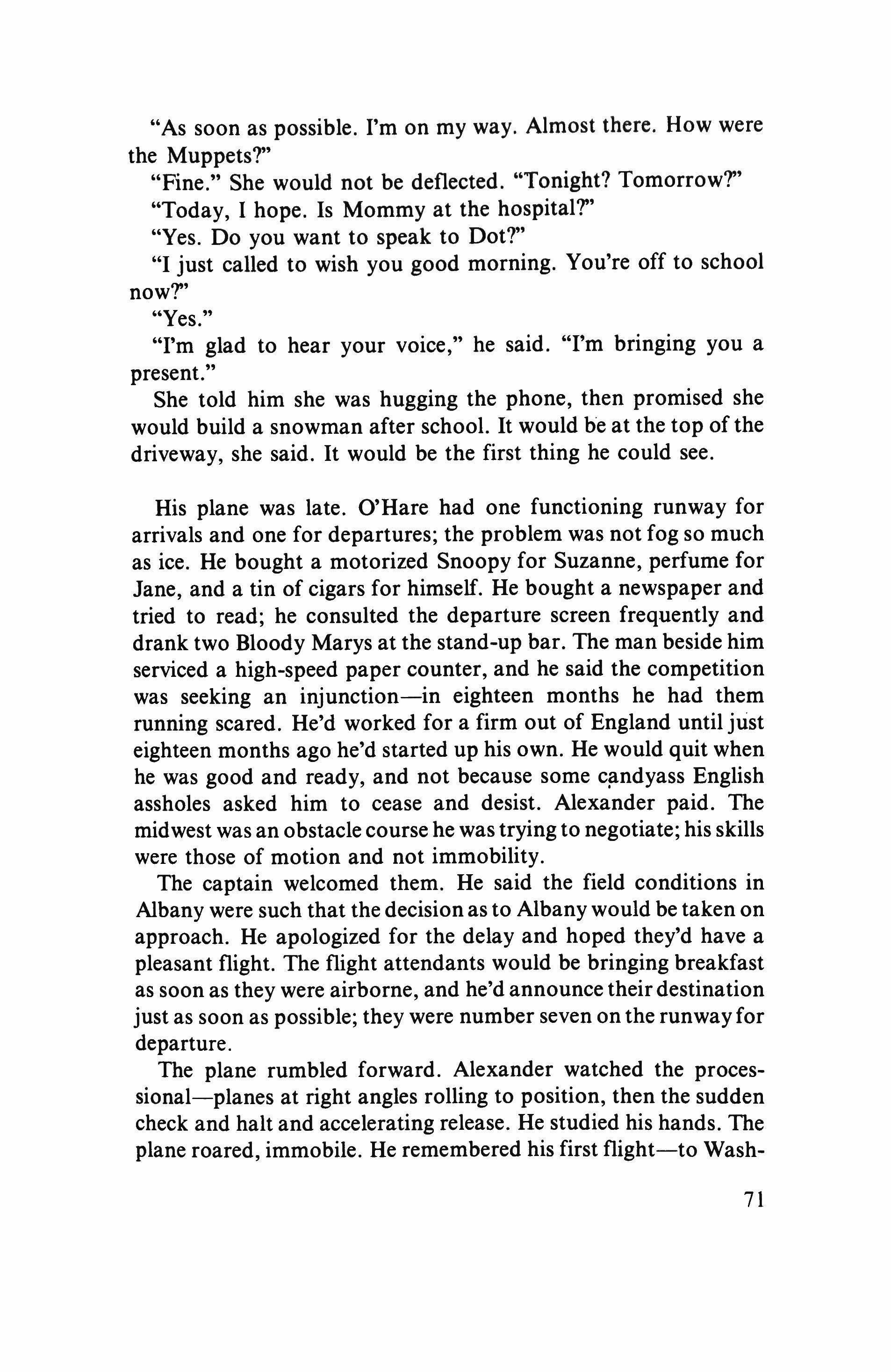
"As soon as possible. I'm on my way. Almost there. How were the Muppets?"
"Fine." She would not be deflected. "Tonight? Tomorrow?"
"Today, I hope. Is Mommy at the hospital?"
"Yes. Do you want to speak to Dot?"
"I just called to wish you good morning. You're off to school now?"
"Yes."
"I'm glad to hear your voice," he said. "I'm bringing you a present."
She told him she was hugging the phone, then promised she would build a snowman after school. It would be at the top of the driveway, she said. It would be the first thing he could see.
His plane was late. O'Hare had one functioning runway for arrivals and one for departures; the problem was not fog so much as ice. He bought a motorized Snoopy for Suzanne, perfume for Jane, and a tin of cigars for himself. He bought a newspaper and tried to read; he consulted the departure screen frequently and drank two Bloody Marys at the stand-up bar. The man beside him serviced a high-speed paper counter, and he said the competition was seeking an injunction-in eighteen months he had them running scared. He'd worked for a firm out of England until just eighteen months ago he'd started up his own. He would quit when he was good and ready, and not because some candyass English assholes asked him to cease and desist. Alexander paid. The midwest was an obstacle course he was trying to negotiate; his skills were those of motion and not immobility.
The captain welcomed them. He said the field conditions in Albany were such that the decision as to Albany would be taken on approach. He apologized for the delay and hoped they'd have a pleasant flight. The flight attendants would be bringing breakfast as soon as they were airborne, and he'd announce their destination just as soon as possible; they were number seven on the runway for departure.
The plane rumbled forward. Alexander watched the processional-planes at right angles rolling to position, then the sudden check and halt and accelerating release. He studied his hands. The plane roared, immobile. He remembered his first flight-to Wash-
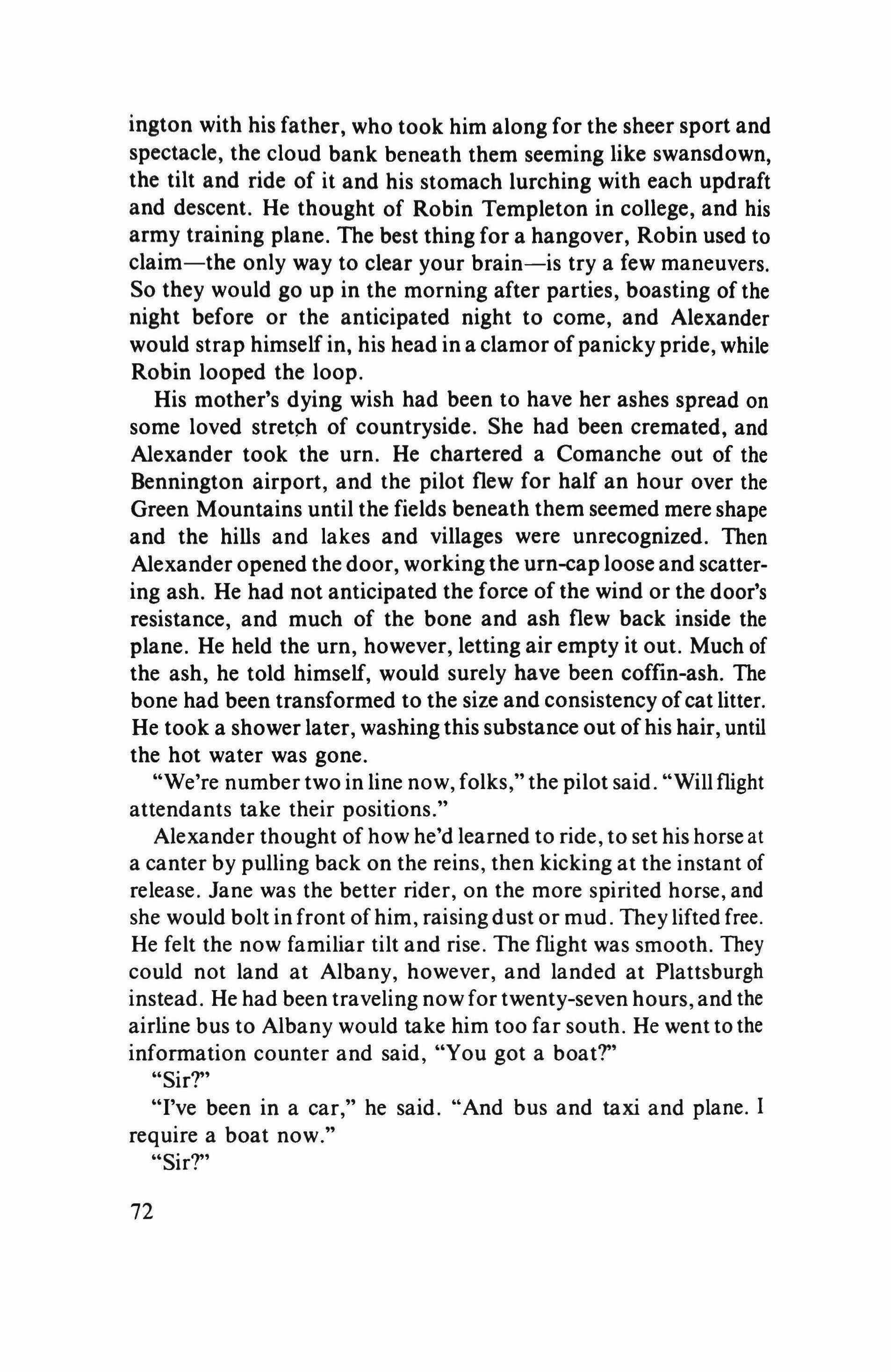
ington with his father, who took him along for the sheer sport and spectacle, the cloud bank beneath them seeming like swansdown, the tilt and ride of it and his stomach lurching with each updraft and descent. He thought of Robin Templeton in college, and his army training plane. The best thing for a hangover, Robin used to claim-the only way to clear your brain-is try a few maneuvers. So they would go up in the morning after parties, boasting of the night before or the anticipated night to come, and Alexander would strap himself in, his head in a clamor of panickypride, while Robin looped the loop.
His mother's dying wish had been to have her ashes spread on some loved stretch of countryside. She had been cremated, and Alexander took the urn. He chartered a Comanche out of the Bennington airport, and the pilot flew for half an hour over the Green Mountains until the fields beneath them seemed mere shape and the hills and lakes and villages were unrecognized. Then Alexander opened the door, working the urn-cap loose and scattering ash. He had not anticipated the force of the wind or the door's resistance, and much of the bone and ash flew back inside the plane. He held the urn, however, letting air empty it out. Much of the ash, he told himself, would surely have been coffin-ash. The bone had been transformed to the size and consistency of cat litter. He took a shower later, washing this substance out ofhis hair, until the hot water was gone.
"We're number two in line now, folks," the pilot said. "Will flight attendants take their positions."
Alexander thought of how he'd learned to ride, to set his horse at a canter by pulling back on the reins, then kicking at the instant of release. Jane was the better rider, on the more spirited horse, and she would bolt in front of him, raising dust or mud. They lifted free. He felt the now familiar tilt and rise. The flight was smooth. They could not land at Albany, however, and landed at Plattsburgh instead. He had been traveling now for twenty-seven hours, and the airline bus to Albany would take him too far south. He went to the information counter and said, "You got a boat?"
"Sir?"
"I've been in a car," he said. "And bus and taxi and plane. I require a boat now."
"Sir?"
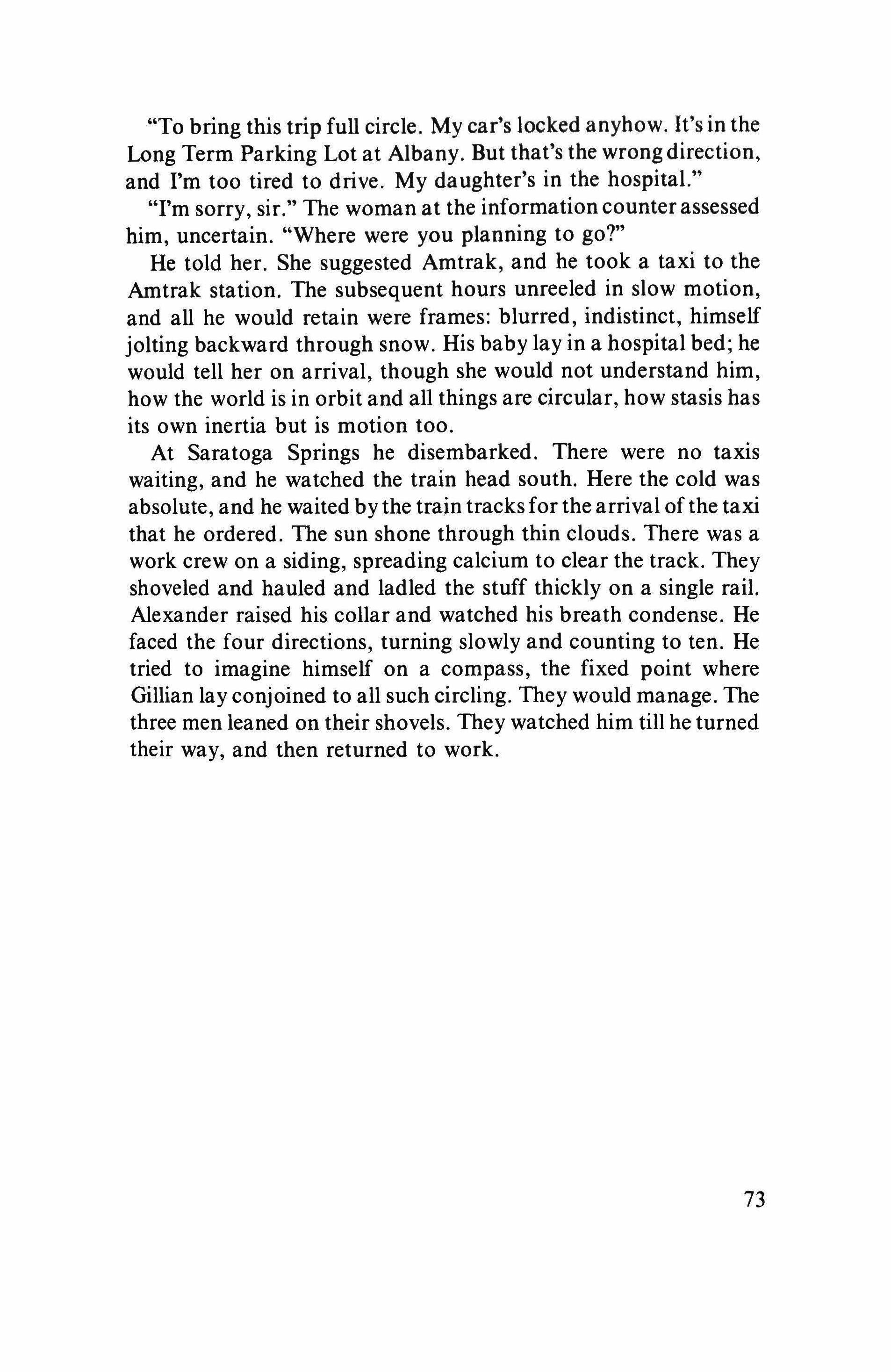
"To bring this trip full circle. My car's locked anyhow. It's in the Long Term Parking Lot at Albany. But that's the wrong direction, and I'm too tired to drive. My daughter's in the hospital."
"I'm sorry, sir." The woman at the information counter assessed him, uncertain. "Where were you planning to go?"
He told her. She suggested Amtrak, and he took a taxi to the Amtrak station. The subsequent hours unreeled in slow motion, and all he would retain were frames: blurred, indistinct, himself jolting backward through snow. His baby lay in a hospital bed; he would tell her on arrival, though she would not understand him, how the world is in orbit and all things are circular, how stasis has its own inertia but is motion too.
At Saratoga Springs he disembarked. There were no taxis waiting, and he watched the train head south. Here the cold was absolute, and he waited by the train tracks for the arrival of the taxi that he ordered. The sun shone through thin clouds. There was a work crew on a siding, spreading calcium to clear the track. They shoveled and hauled and ladled the stuff thickly on a single rail. Alexander raised his collar and watched his breath condense. He faced the four directions, turning slowly and counting to ten. He tried to imagine himself on a compass, the fixed point where Gillian lay conjoined to all such circling. They would manage. The three men leaned on their shovels. They watched him till he turned their way, and then returned to work.

I'm her grown daughter. But at that time, as her child, I stood behind my mother as she combed her hair at the mirror. She was seated on the low stool, brushing with one hand, folding and patting curls with the other. Everything about her movements was practiced and certain. I thought of her womanliness as one thinks of a distant country: somewhere to travel, a destination demanding effort and will. I could see my own reflection beside hers, and it was true: I could never be exactly like her, for, as everyone said, I was my father's daughter. I had his high, pale forehead and his round eyes. There was my face, soft and dismally clear. Her face was interesting; it had begun to crease. Her cheekbones were high, her lashes and brows were dark, her eyes themselves changed from jewel-green to gray with what she wore. Her nose and jaw and chin were definite. "Good bones, a good husband," she said. It was a recipe for aging well.
On her dresser were arranged the silver-backed brushes, the silver hand mirror, the silver-handled comb with two teeth missing
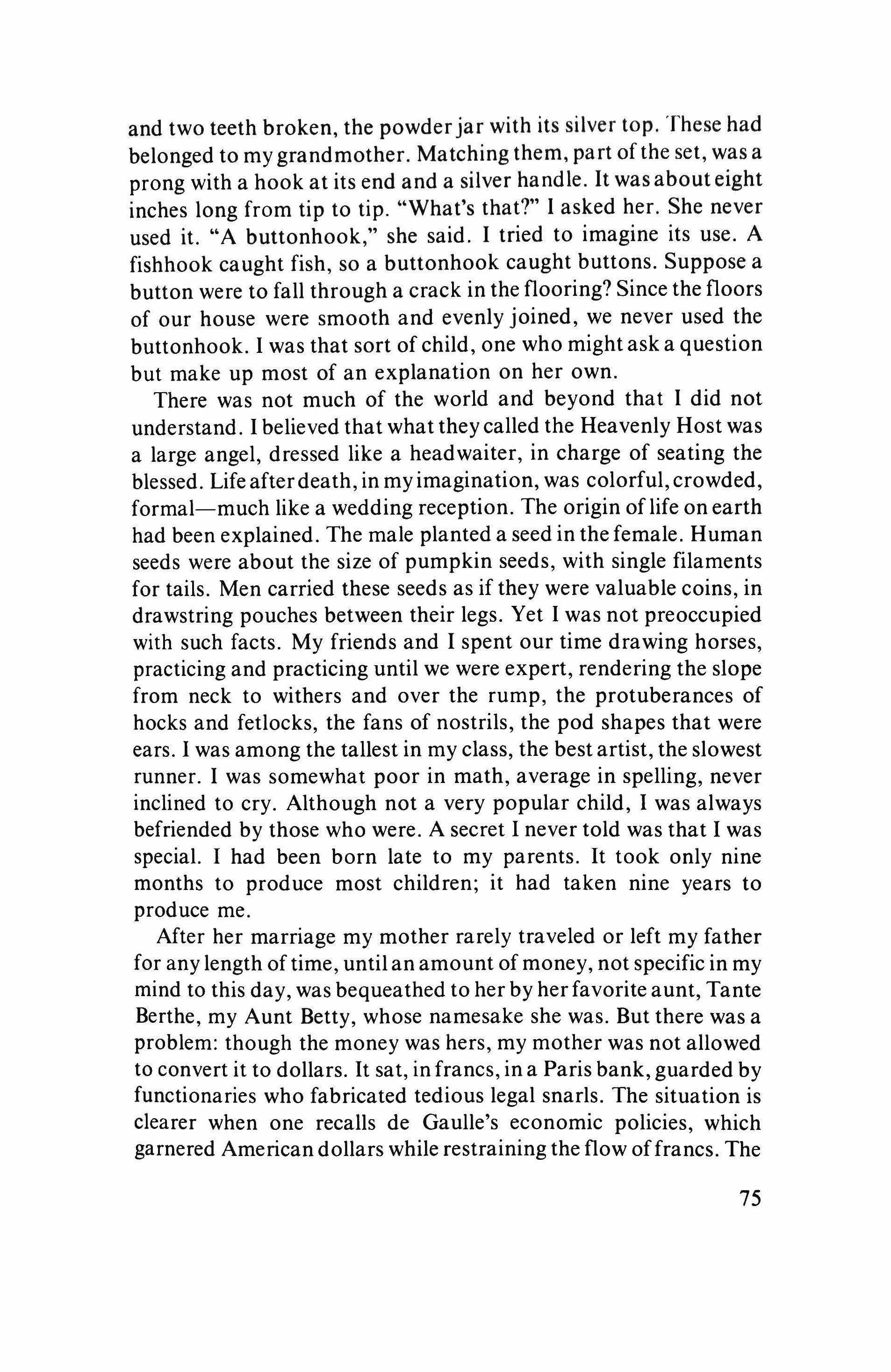
and two teeth broken, the powderjar with its silver top. These had belonged to my grandmother. Matching them, part of the set, was a prong with a hook at its end and a silver handle. It was about eight inches long from tip to tip. "What's that?" I asked her. She never used it. "A buttonhook," she said. I tried to imagine its use. A fishhook caught fish, so a buttonhook caught buttons. Suppose a button were to fall through a crack in the flooring? Since the floors of our house were smooth and evenly joined, we never used the buttonhook. I was that sort of child, one who might ask a question but make up most of an explanation on her own.
There was not much of the world and beyond that I did not understand. I believed that what they called the Heavenly Host was a large angel, dressed like a headwaiter, in charge of seating the blessed. Life afterdeath, in my imagination, was colorful, crowded, formal-much like a wedding reception. The origin oflife on earth had been explained. The male planted a seed in the female. Human seeds were about the size of pumpkin seeds, with single filaments for tails. Men carried these seeds as if they were valuable coins, in drawstring pouches between their legs. Yet I was not preoccupied with such facts. My friends and I spent our time drawing horses, practicing and practicing until we were expert, rendering the slope from neck to withers and over the rump, the protuberances of hocks and fetlocks, the fans of nostrils, the pod shapes that were ears. I was among the tallest in my class, the best artist, the slowest runner. I was somewhat poor in math, average in spelling, never inclined to cry. Although not a very popular child, I was always befriended by those who were. A secret I never told was that I was special. I had been born late to my parents. It took only nine months to produce most children; it had taken nine years to produce me.
After her marriage my mother rarely traveled or left my father for any length of time, until an amount of money, not specific in my mind to this day, was bequeathed to her by her favorite aunt, Tante Berthe, my Aunt Betty, whose namesake she was. But there was a problem: though the money was hers, my mother was not allowed to convert it to dollars. It sat, in francs, in a Paris bank, guarded by functionaries who fabricated tedious legal snarls. The situation is clearer when one recalls de Gaulle's economic policies, which garnered American dollars while restraining the flow offrancs. The
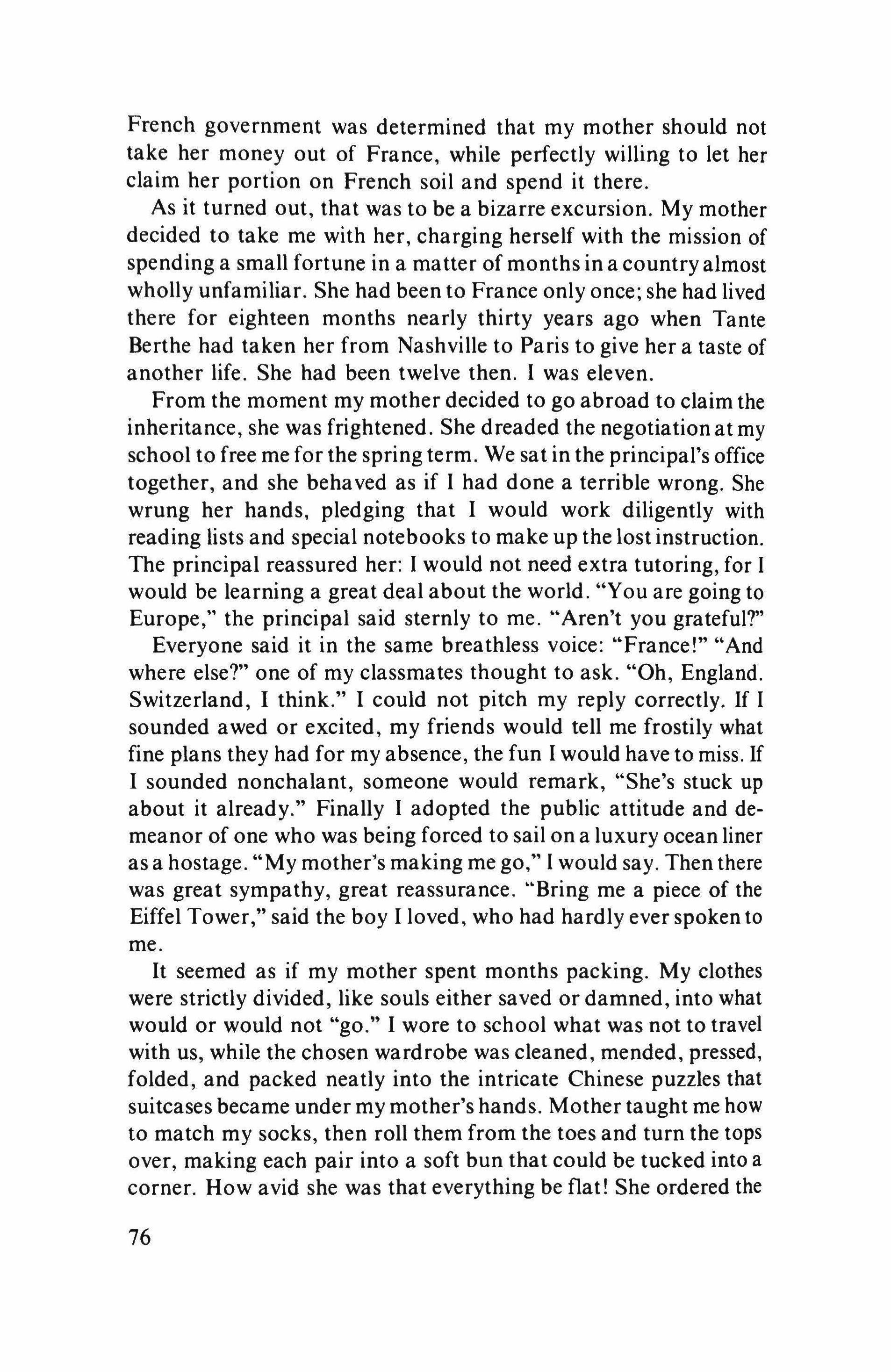
French government was determined that my mother should not take her money out of France, while perfectly willing to let her claim her portion on French soil and spend it there.
As it turned out, that was to be a bizarre excursion. My mother decided to take me with her, charging herself with the mission of spending a small fortune in a matter of months in a country almost wholly unfamiliar. She had been to France only once; she had lived there for eighteen months nearly thirty years ago when Tante Berthe had taken her from Nashville to Paris to give her a taste of another life. She had been twelve then. I was eleven.
From the moment my mother decided to go abroad to claim the inheritance, she was frightened. She dreaded the negotiation at my school to free me for the spring term. We sat in the principal's office together, and she behaved as if I had done a terrible wrong. She wrung her hands, pledging that I would work diligently with reading lists and special notebooks to make up the lost instruction. The principal reassured her: I would not need extra tutoring, for I would be learning a great deal about the world. "You are going to Europe," the principal said sternly to me. "Aren't you grateful?"
Everyone said it in the same breathless voice: "France!" "And where else?" one of my classmates thought to ask. "Oh, England. Switzerland, I think." I could not pitch my reply correctly. If I sounded awed or excited, my friends would tell me frostily what fine plans they had for my absence, the fun I would have to miss. If I sounded nonchalant, someone would remark, "She's stuck up about it already." Finally I adopted the public attitude and demeanor of one who was being forced to sail on a luxury ocean liner as a hostage. "My mother's making me go," I would say. Then there was great sympathy, great reassurance. "Bring me a piece of the Eiffel Tower," said the boy I loved, who had hardly ever spoken to me.
lt seemed as if my mother spent months packing. My clothes were strictly divided, like souls either saved or damned, into what would or would not "go." I wore to school what was not to travel with us, while the chosen wardrobe was cleaned, mended, pressed, folded, and packed neatly into the intricate Chinese puzzles that suitcases became under my mother's hands. Mother taught me how to match my socks, then roll them from the toes and turn the tops over, making each pair into a soft bun that could be tucked into a corner. How avid she was that everything be flat! She ordered the
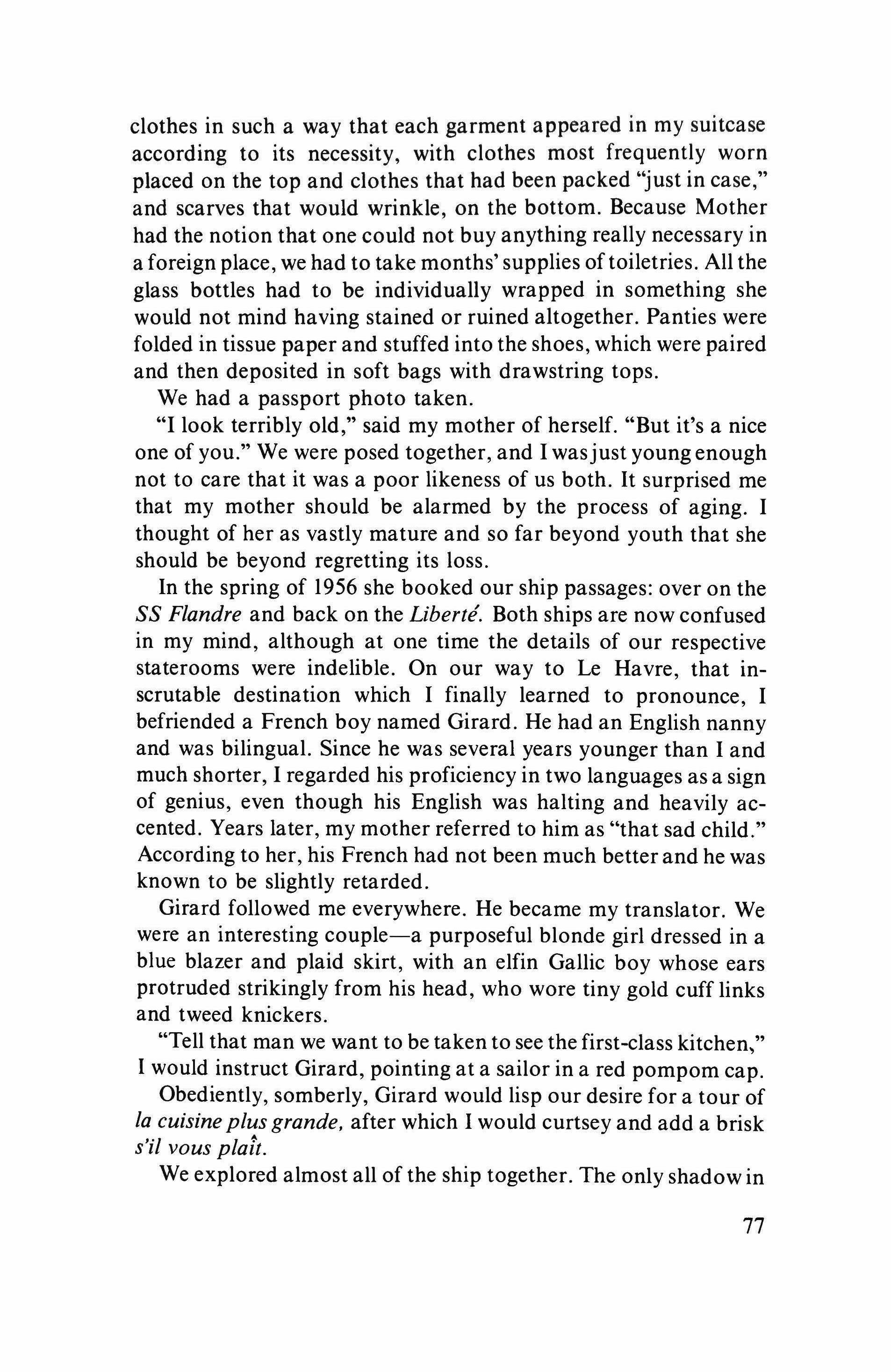
clothes in such a way that each garment appeared in my suitcase according to its necessity, with clothes most frequently worn placed on the top and clothes that had been packed "just in case," and scarves that would wrinkle, on the bottom. Because Mother had the notion that one could not buy anything really necessary in a foreign place, we had to take months' supplies of toiletries. All the glass bottles had to be individually wrapped in something she would not mind having stained or ruined altogether. Panties were folded in tissue paper and stuffed into the shoes, which were paired and then deposited in soft bags with drawstring tops.
We had a passport photo taken.
"I look terribly old," said my mother of herself. "But it's a nice one of you." We were posed together, and I wasjust young enough not to care that it was a poor likeness of us both. It surprised me that my mother should be alarmed by the process of aging. I thought of her as vastly mature and so far beyond youth that she should be beyond regretting its loss.
In the spring of 1956 she booked our ship passages: over on the SS Flandre and back on the Liberte. Both ships are now confused in my mind, although at one time the details of our respective staterooms were indelible. On our way to Le Havre, that inscrutable destination which I finally learned to pronounce, I befriended a French boy named Girard. He had an English nanny and was bilingual. Since he was several years younger than I and much shorter, I regarded his proficiency in two languages as a sign of genius, even though his English was halting and heavily accented. Years later, my mother referred to him as "that sad child." According to her, his French had not been much better and he was known to be slightly retarded.
Girard followed me everywhere. He became my translator. We were an interesting couple-a purposeful blonde girl dressed in a blue blazer and plaid skirt, with an elfin Gallic boy whose ears protruded strikingly from his head, who wore tiny gold cuff links and tweed knickers.
"Tell that man we want to be taken to see the first-class kitchen," I would instruct Girard, pointing at a sailor in a red pompom cap.
Obediently, somberly, Girard would lisp our desire for a tour of la cuisine plusgrande, after which I would curtsey and add a brisk s'il vous plait.
We explored almost all of the ship together. The only shadow in
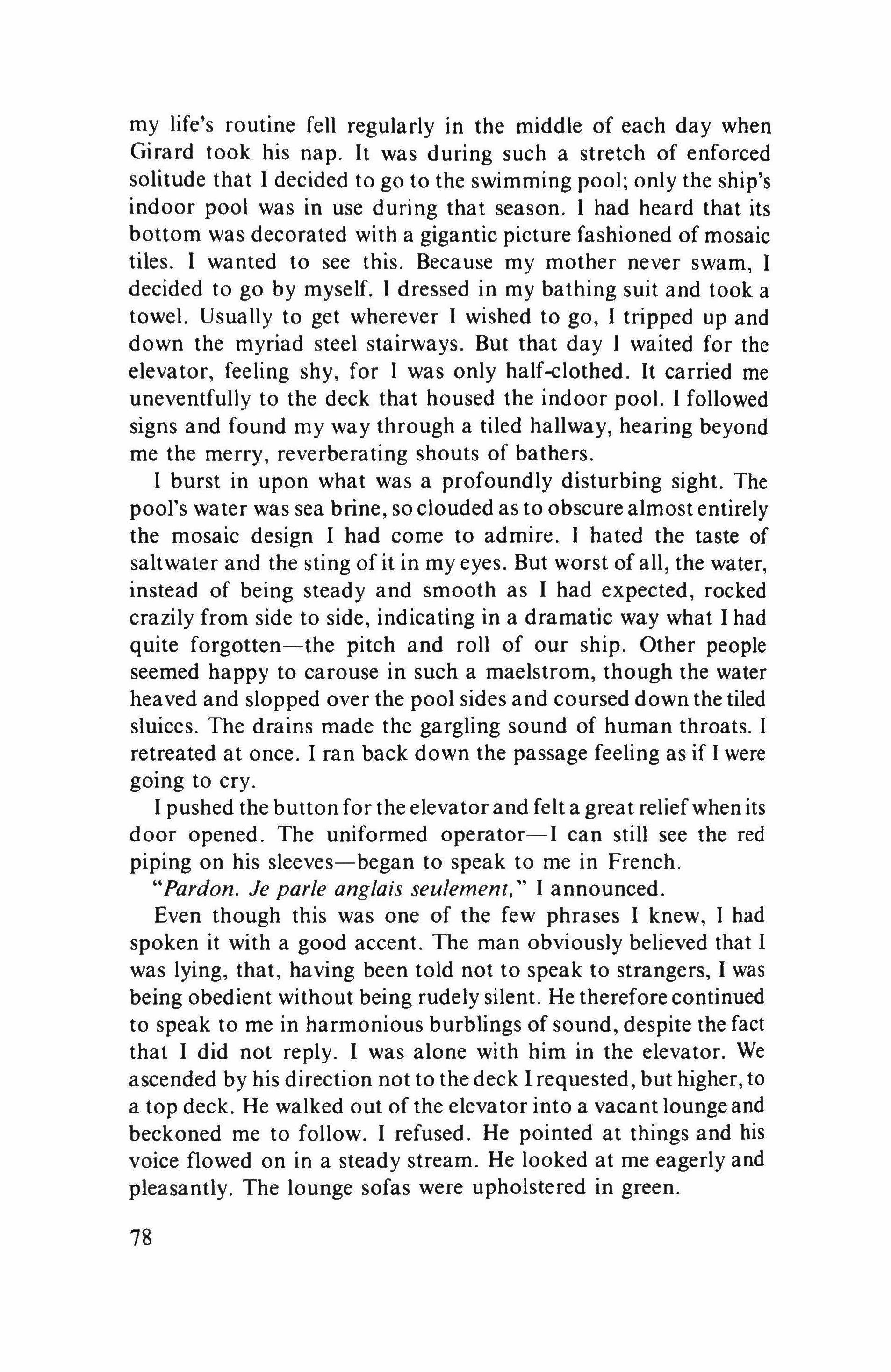
my life's routine fell regularly in the middle of each day when Girard took his nap. It was during such a stretch of enforced solitude that I decided to go to the swimming pool; only the ship's indoor pool was in use during that season. I had heard that its bottom was decorated with a gigantic picture fashioned of mosaic tiles. I wanted to see this. Because my mother never swam, I decided to go by myself. I dressed in my bathing suit and took a towel. Usually to get wherever I wished to go, I tripped up and down the myriad steel stairways. But that day I waited for the elevator, feeling shy, for I was only half-clothed. It carried me uneventfully to the deck that housed the indoor pool. I followed signs and found my way through a tiled hallway, hearing beyond me the merry, reverberating shouts of bathers.
I burst in upon what was a profoundly disturbing sight. The pool's water was sea brine, so clouded as to obscure almost entirely the mosaic design I had come to admire. I hated the taste of saltwater and the sting of it in my eyes. But worst of all, the water, instead of being steady and smooth as I had expected, rocked crazily from side to side, indicating in a dramatic way what I had quite forgotten-the pitch and roll of our ship. Other people seemed happy to carouse in such a maelstrom, though the water heaved and slopped over the pool sides and coursed down the tiled sluices. The drains made the gargling sound of human throats. I retreated at once. I ran back down the passage feeling as if I were going to cry.
I pushed the button for the elevator and felt a great relief when its door opened. The uniformed operator-I can still see the red piping on his sleeves-began to speak to me in French.
"Pardon. Je parle anglais seulement," I announced.
Even though this was one of the few phrases I knew, I had spoken it with a good accent. The man obviously believed that I was lying, that, having been told not to speak to strangers, I was being obedient without being rudely silent. He therefore continued to speak to me in harmonious burblings of sound, despite the fact that I did not reply. I was alone with him in the elevator. We ascended by his direction not to the deck I requested, but higher, to a top deck. He walked out of the elevator into a vacant lounge and beckoned me to follow. I refused. He pointed at things and his voice flowed on in a steady stream. He looked at me eagerly and pleasantly. The lounge sofas were upholstered in green.

Finally he resumed his post in the elevator and we began to descend. He stopped the cage midway between floors. Then he turned to me.
"A kiss, Mademoiselle." He pronounced it "keese." He held out his arms.
Because I feared seeming unappreciative or boorish to a foreigner-it had been impressed upon me that I was my country's little ambassador-l complied. That was the first time in my life I felt a man's tongue in my mouth. So startling was the sensationslimy and vibrant, as if the food on a spoon had become a live frog-that I flung myself backward. I pitied the man at once. I was convinced that he was so old he had lost all of his teeth. It was an embarrassing moment. I picked up my towel, smiled shyly, and said, "Merci beaucoup," The man said something very heartfelt but totally unintelligible, and mercifully deposited me on the deck where I belonged. I did not relate this experience to my mother, though as a rule I imparted to her whatever unusual information I came across during the day. I brushed my teeth with lots of toothpaste, rinsed my mouth several times, and never said a word.
Paris was two things to me: postcards (I had a voluminous collection) and parquetry floors. I adored parquet. My wish was to fit my feet into the intricate wooden crosshatches and make my way across whole rooms without stepping on a crack. My feet were already too wide for such an ambition to be practical, but I knew the verse "Step on a crack / Break your mother's back." I spent hours teetering and balancing, inventing a grotesque and awkward stride. I can still recall the pattern of the highly polished gold and sable-colored complexities which were the floors in the hallway of the lawyer's office.
As I said, my mother had charged herself with the task of spending a large sum of money on portable goods. The places where such money was spent were boring to a child. I was not allowed to stroke the battalion of coats at the furrier's. I had to sit quietly at the tailor's. I spun around and around on high stools at the jeweler's, while my mother was escorted to a room with a desk and armchairs. At an apartment in the Ritz, on a blue satin sofa, I sat drinking sirop grenadine. It was a brilliant red and very sweet, served in a tall glass of ice. Occasionally, I would be asked to sniff tiny vials of perfume. Which did I prefer? This or this? Or this? Mother lifted her brows, sniffing. She stayed there for hours, 79

speaking with a woman who had long, painted fingernails. This woman owned an extraordinary ebony and enamel figurine of a slave boy. It stood beside her fireplace mantel and was taller than Girard. I was told that it was an antique. The boy's eyeballs and teeth were of a white stone, carved separately and set into the black face. He was barefoot. He wore a gilt turban, and his ornate shirt was gathered at his waist with an amber-studded belt. He was bound by gold chains to a ceramic column. Lifelike, bizarre, and very uncomfortable, he seemed about to swoon. I dabbed perfume along my arms, little dots of the different delicious smells. Then I mimicked the statue, arranging myself on the sofa in the same contortion.
Juan-les-Pins was our rest from our labors. My mother remarked again and again, not very originally, that the waters of the Mediterranean were an extraordinary shade of blue. "Cote d'Azur" became one of my favorite phrases. I had mastered the French "r" and was proud of myself. We stayed in a hotel called the Alba. It had a walled courtyard and was no more than three stories high. A rhomboid of the amazing blue was visible from our window. I ordered my chaco/at chaud and mother's cafeevery morning. The apricot jam for our croissants was thick with large bits of fruit. My mother had begun to relax. She must have been satisfied with her accomplishments. She had done what she had come to do: she had secured the money and invested it in what I would remember as extravagant Christmas presents for years to come. She had regained command of her French-repossessed is perhaps a better word. The language had been for her a long-abandoned house badly in need of care, with perilous, rotten floors;finally, she had made it clean and sturdy and was able to walk through its length and breadth. Traces of Nashville had vanished and her true speech came effortlessly, consonant with what had always been a French face.
She bought some French paperbacks. At night she sat in bed with her light on and cut the pages with a fruit knife. She read with her chin resting in the palm of her hand, her little finger stroking her lips. She wore her eyeglasses and frowned-an intense but not angry frown. Sometimes she laughed.
"What's funny, Mother?"
"Are you still awake? Should I turn off the light?"
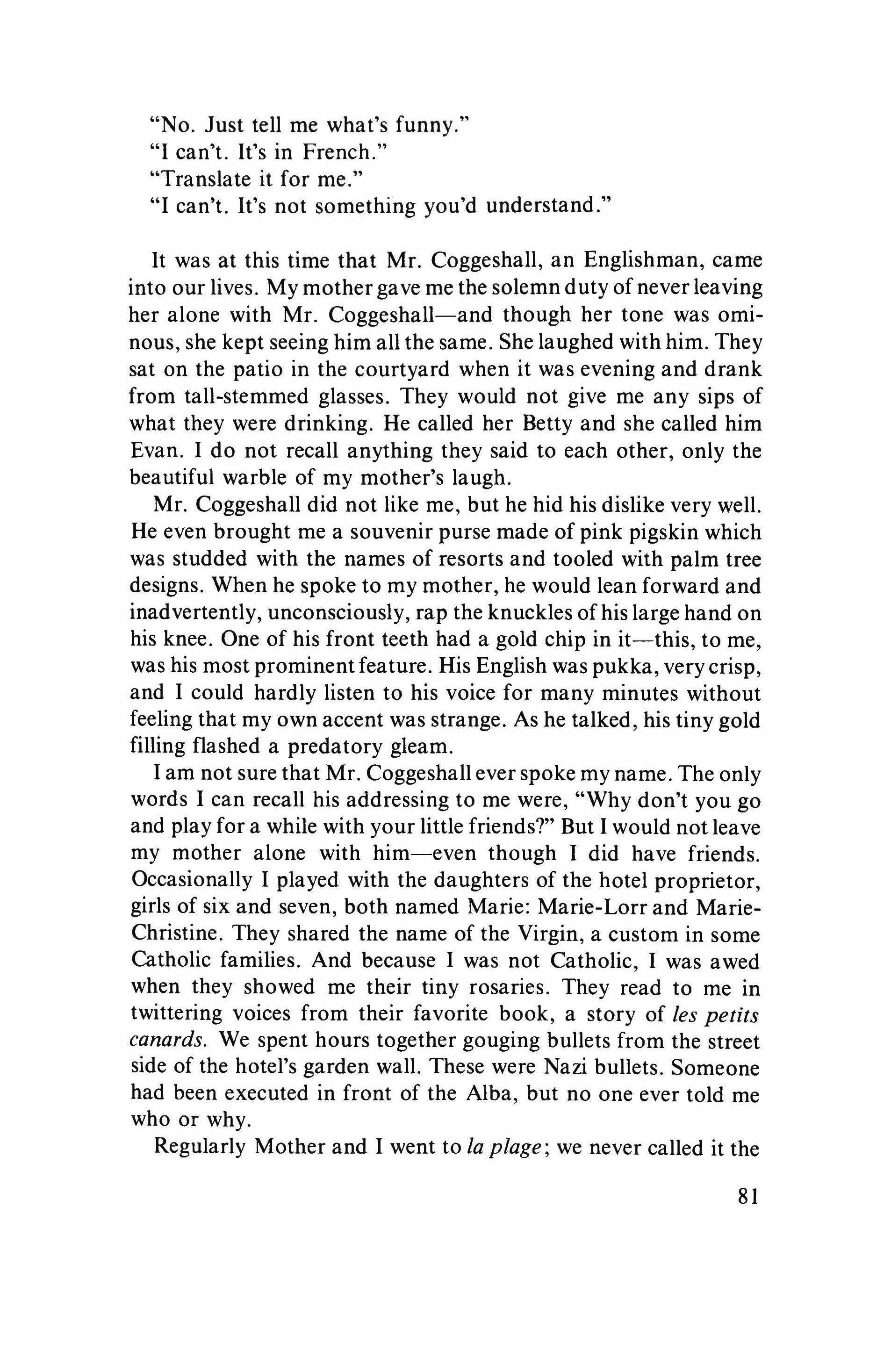
"No. Just tell me what's funny."
"I can't. It's in French."
"Translate it for me."
"I can't. It's not something you'd understand."
It was at this time that Mr. Coggeshall, an Englishman, came into our lives. My mother gave me the solemn duty of never leaving her alone with Mr. Coggeshall-and though her tone was ominous, she kept seeing him all the same. She laughed with him. They sat on the patio in the courtyard when it was evening and drank from tall-stemmed glasses. They would not give me any sips of what they were drinking. He called her Betty and she called him Evan. 1 do not recall anything they said to each other, only the beautiful warble of my mother's laugh.
Mr. Coggeshall did not like me, but he hid his dislike very well. He even brought me a souvenir purse made of pink pigskin which was studded with the names of resorts and tooled with palm tree designs. When he spoke to my mother, he would lean forward and inadvertently, unconsciously, rap the knuckles of his large hand on his knee. One of his front teeth had a gold chip in it-this, to me, was his most prominent feature. His English was pukka, very crisp, and 1 could hardly listen to his voice for many minutes without feeling that my own accent was strange. As he talked, his tiny gold filling flashed a predatory gleam.
1 am not sure that Mr. Coggeshall ever spoke my name. The only words I can recall his addressing to me were, "Why don't you go and play for a while with your little friends?" But 1 would not leave my mother alone with him-even though I did have friends. Occasionally 1 played with the daughters of the hotel proprietor, girls of six and seven, both named Marie: Marie-Lorr and MarieChristine. They shared the name of the Virgin, a custom in some Catholic families. And because 1 was not Catholic, 1 was awed when they showed me their tiny rosaries. They read to me in twittering voices from their favorite book, a story of les petits canards. We spent hours together gouging bullets from the street side of the hotel's garden wall. These were Nazi bullets. Someone had been executed in front of the Alba, but no one ever told me who or why.
Regularly Mother and I went to fa plage; we never called it the

beach. She sat on a borrowed blanket and read her books, the pages flipping in the breeze, losing her place. It was a vacant expanse of white and blue-no one else there, just the two of us. But this may be a trick of memory. There wasa pierto which white paddle boats were tethered. I wandered into the water waist deep, and stood looking for long periods of time at the two white fish, my own feet. The water was as clear as drinking water. I could see grains of sand when the surface was still.
One afternoon as I returned from my timid swim, I caught sight of Mr. Coggeshall approaching my mother. He was dressed in a fine tailored suit, sweating a lot, and finding it difficult to walk in his hard shoes over the sand. Definitely he had not expected to come to the beach that day. He looked annoyed. He dumped the sand out of his trouser cuffs as he stood over her. His tone of voice was bitter.
Several days later, he took us both out to dinner. My mother wore her hair down. In the candlelight of the elegant restaurant she looked like someone I had never seen before. Again, I have no memory of what they were saying. I ate a great deal. I was allowed to drink undiluted wine. Afterward the waiter brought an assortment of cheeses, and I decided to sample each type. It is probable that my mother and Mr. Coggeshall were unaware of what I was doing. Six small wedges of six different cheeses were placed on the plate in front of me. As I reached for more bread, I became alarmed at what I was sure was a terrible faux pas: the unmistakable stench of a dog's turd. As unobtrusively as I could, I bent under the table, parting the folds of the tablecloth, so that I could inspect the bottoms of my shoes. My secret investigation relieved my fears. At least it was not on my shoes. I was astonished, as I once more settled in my place at the table, to discover that the odor emanated from one of the wedges of cheese.
Mr. Coggeshall arranged a rendezvous for the next afternoon. Minutes past the appointed hour, my mother sent me downstairs to see if he had arrived; it was not usual for him to be late. He was not there. Almost an hour passed, and I watched my mother struggle with feelings she would not confide to me. She walked about our room, looking at herself in the mirror whenever she passed it. Finally she said she thought we should take a walk. The tone of her voice lent her suggestion the weight of a momentous decision. We sent down to the kitchen for a picnic, which arrived in a splendid
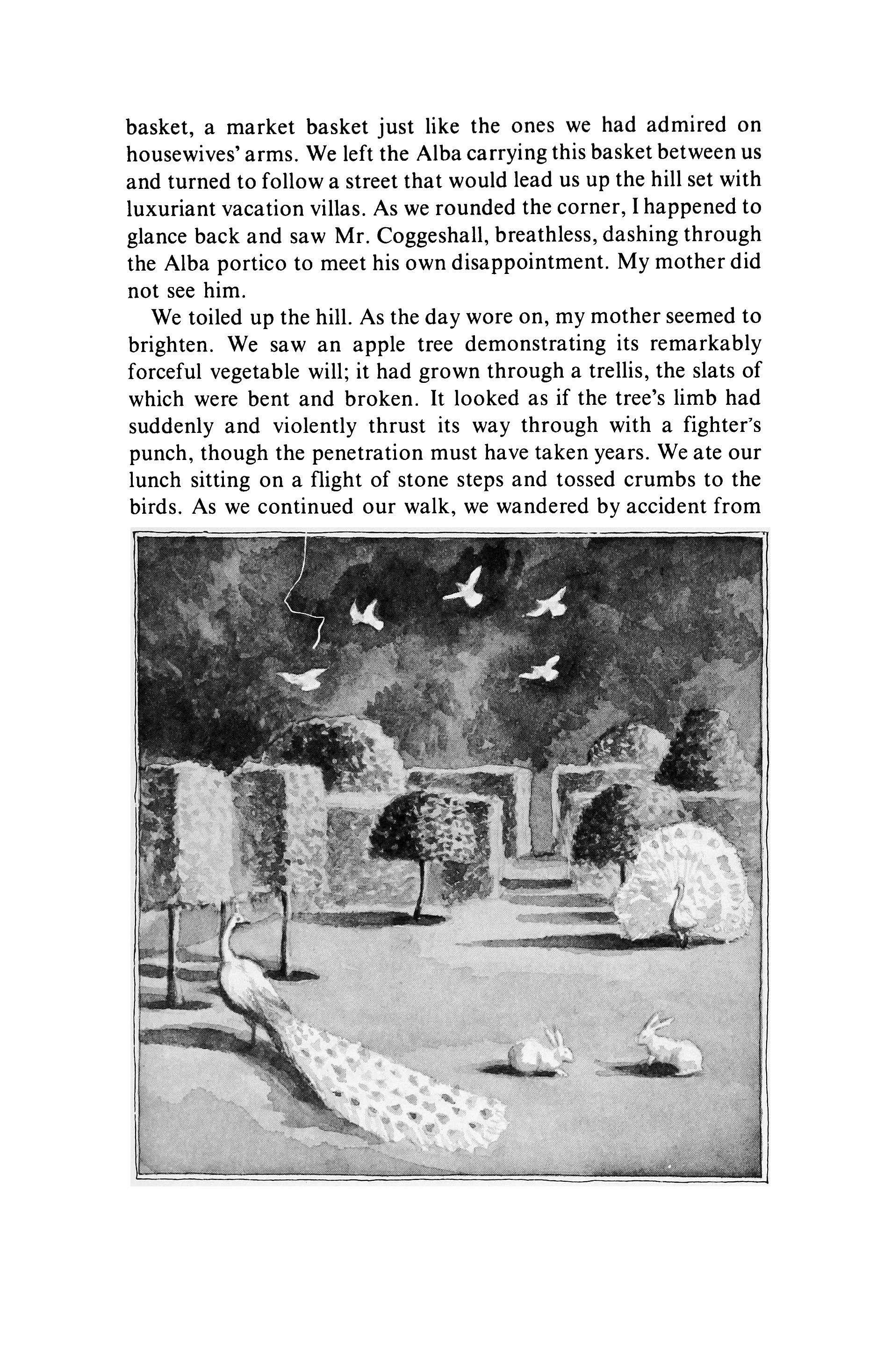
basket, a market basket just like the ones we had admired on housewives' arms. We left the Alba carrying this basket between us and turned to follow a street that would lead us up the hill set with luxuriant vacation villas. As we rounded the corner, I happened to glance back and saw Mr. Coggeshall, breathless, dashing through the Alba portico to meet his own disappointment. My mother did not see him.
We toiled up the hill. As the day wore on, my mother seemed to brighten. We saw an apple tree demonstrating its remarkably forceful vegetable will; it had grown through a trellis, the slats of which were bent and broken. It looked as if the tree's limb had suddenly and violently thrust its way through with a fighter's punch, though the penetration must have taken years. We ate our lunch sitting on a flight of stone steps and tossed crumbs to the birds. As we continued our walk, we wandered by accident from

the main road and meandered along what we discovered was the driveway ofa large estate. We surprised a gardener, who warmed at once to my mother's French apology. He took us on a brief excursion through the formal gardens, since Ieproprietaire was not at home. In one garden was a dovecote full of white doves. There were hutches full of white rabbits. And strolling about like a bride, though it was the male of the species, was a white peacock. The gardener told my mother-who turned at once and explained it to me-that the owner rode only white horses, kept white hounds, and had white Persian cats and cockatoos in his house. My mother was so delighted with this eccentricity that she clapped her hands and laughed. "We'll never forget this, will we?" she said. And I knew she was happier with me than she would have been had she been sitting on the patio with Mr. Coggeshall. Back at the Alba, he had not left a note for her. He never returned.
There is a photograph taken of my mother and me on shipboard as we sailed home. We are standing on a top deck in the brilliant sunshine, both of us squinting. She, smiling, has one hand braced on the railing and one hand lifted to shield her eyes or to save her hair from the wind. I am close beside her, clasping our deck-chair lap robes. It must be a trick of the light, but she seems the child of the two of us, the tentative one. I face the camera squarely, protective and bold.

In a small mill city in Bavaria there lived some children who were afraid of a one-legged man called the Kommandant. He lived within walking distance of the shops and houses, so near that with the help of his crutch he often swung in the direction of their cobbled streets and little blackened windows and smoking chimneys. The Kommandant frightened the boys, of course, because he had only one leg; yet it was just for this, for their dreams of fleeing the single foot, that they talked of surprising him with their bravery and cleverness and skill. But they had no Teutonic helmets, no wooden swords; to the boys it would be nothing less than an exchange of heart for heart.
One evening while it was still light and before the frost became hard, they approached the Kommandant, stared at the straight trouser leg and at the folded trouser leg, and made him an offer. He heard them silently, then followed them, and they were careful not to walk too quickly. They took him by back streets and through an unproductive orchard to the house of the oldest boy, Heinrich; they led him directly inside where he stood wearing his Korn-

mandant's cap and leaning on his crutch. He looked closely at what the boys were offering for sale, at what they dared offer no one but himself. The smallest of the boys darted forward suddenly and pulled the coverlet from the bed. The Kommandant stepped near the bed which filled nearly the whole of the room. Through the narrow single window the sunset was cold and red, a brutal light on the still figure now stretched before them.
"He is ours," whispered Heinrich, and the boys' eyes were the eyes one sees at dusk under the roots of a tree, five pairs or more, in winter, staring up to the surface of the earth with that animal curiosity which shines from the pitiless lair. In this room only the bed, the Kommandant, the boys: and the boys stood there like brothers, each as familiar as Heinrich himself with the chipped walls, the hole in the floor, the place where he hung his jacket and put his shoes; all of them ragged and expectant in the intimacy of boys together.
"Come look, mein Herr," Heinrich whispered and his companions also pressed closer. They tried not to touch the Kommandant's crutch. The boys waited for the bargain to be sealed as if they felt that no one else would come here or become aware in any way, ever, of what was happening in Heinrich's room while the sun set.
Upon the bed lay a man, heavy and fully dressed in a shirt and black suit of a good cut but tight across the chest, a man who appeared to be neither asleep nor dead though the cloth and the hair were wet with the rains so frequent in this country.
"He is complete. He is not damaged, not at all damaged, Herr Kommandant," whispered Heinrich, and the eyes of his companions were the eyes of moles. "He is all here," Heinrich told him again in his soft, decisive voice.
"But look," said the Kommandant. "Look at his feet, boys. Where are the shoes?"
Heinrich smiled and went to the wooden rack where he kept his own worn pairs of boots. "On the rack, mein Herr. They were soiled, you can see for yourself; they were covered with blood. So I removed them. But they belong with him and they shall go with him." Without hesitating he returned to the bed and placed the great swollen shoes on the coverlet next to the feet, exactly as if he had tipped the scales from a crafty, childish generosity.
"Good," said the Kommandant.
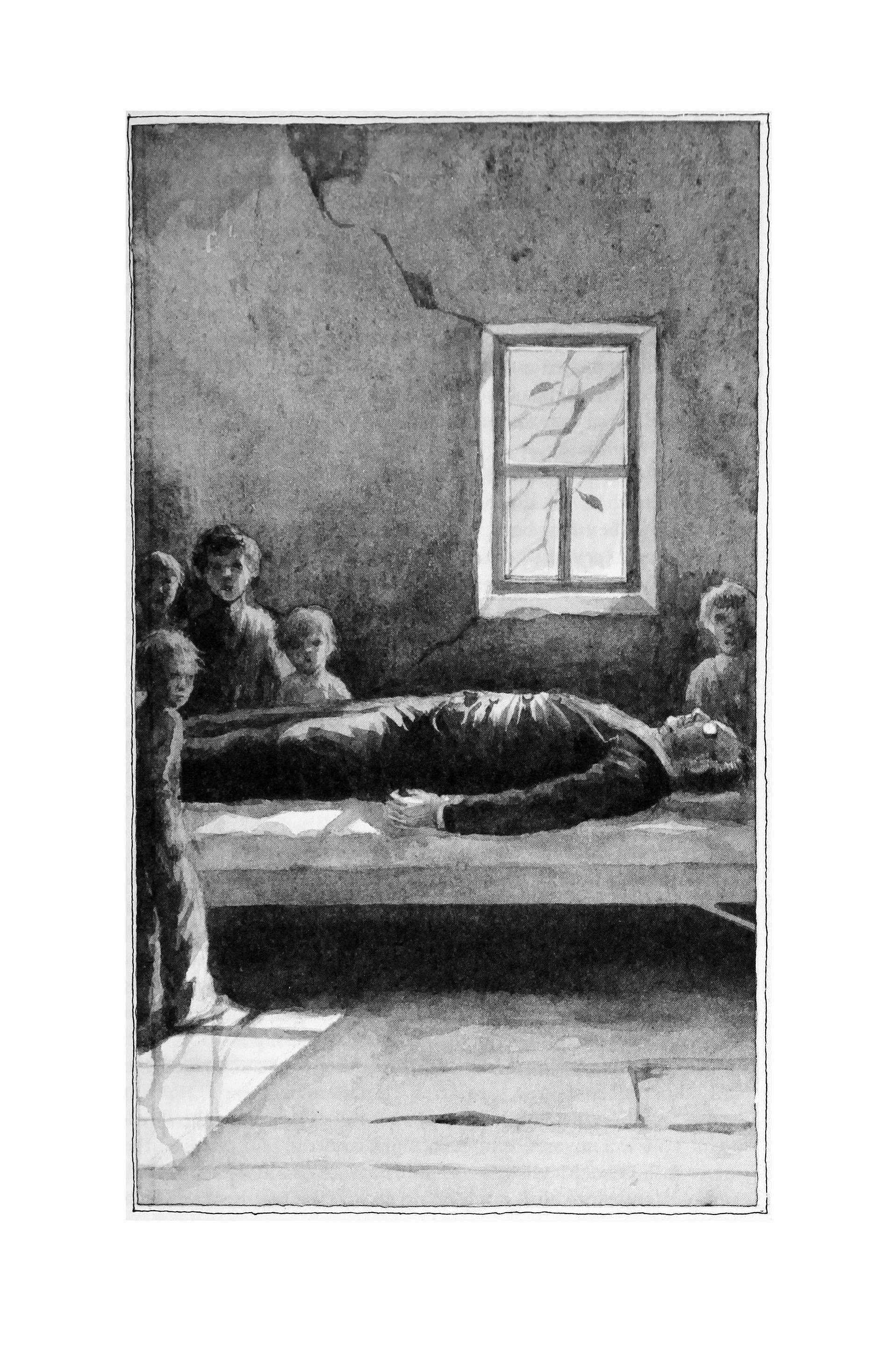

The sun fell sharply through the window and lit the buttons on the dead man's coat. The eyeglasses began to shine, but for a moment only. Following some curious law of growth, some urge dictated by its sap and fibers, the lowest branch of one of the few trees in the orchard, a tree planted too near the house, had reached to the window and pressed its crowded shape to the panes. Now, like an arm twisted in some invisible grip, it moved as much as it could and scratched painfully on the glass. The sun came into the room through the window and between the gray twigs of the branch that struggled and obscured the view. Beyond a few dead leaves and the dusty glass could be seen a layer of smoke from the mills, and farther yet, under the red streaks of the sun, the gathering of the night itself.
"Good," murmured the Kommandant again and frowned, considering the man on the bed. The eyeglasses were cracked and twisted, but they had been readjusted on the bridge of the nose. Though not expertly, the hair had been brushed into place.
"And, Herr Kommandant," said the oldest boy, "he has papers also." Heinrich unfastened the top button, drew away the coat, and pointed. The papers protruded thick and white from the inside pocket until quickly Heinrich hid them away again and smoothed the lapel.
"He is cold," Heinrich said, peering up, smiling, indicating the heavy breast of the man. He continued to watch the Kommandant for some change in his face.
"Herr Herzenbrecher!" the smallest boy shouted. "He is Herr Herzenbrecher!"
The sun passed away, the orchard became dark; the boys shifted, and one of them held the smallest idly by his hand. They could hear the sounds of all the things that woke Heinrich in the night. Now the buttons no longer flashed on the coat, the lifelike expression was shadowed on the dead man's face, his black waistcoat was tight and fastened awry over the belly still filled with air. Dusk in this city, despite the wireless and industry, was the time when the inhabitants feared to see the dead taking to the open roofs.
"But your bed? You bring him to your own bed?" asked the Kommandant.
"Oh," said Heinrich quickly, "it's all right. I slept on the floor. But of course I covered him each night with the blanket until the sun rose." Then by a slight gesture, a movement of his finger, calling attention to the watch chain and to the belt buckle which

must have been loosened after the last meal, all the while staring at the Kommandant, Heinrich pursed his lips and asked, "Well? What do you think of him?"
A shrill whistle, like the furious sound that regulates life in prisons, came from far off in the direction of the mills, and the iron machines began scraping in that distant end of the city. Heinrich waited. Suddenly the smallest boy snatched up the bloodied shoes and ran with them into the orchard. "Look," he cried, "I have stolen his shoes! Look here, I have stolen Herr Herzenbrecher's shoes!" He ran under the trees, to and fro, laughing, fat, and his childish and impetuous and uneven flat steps came boldly back from the earth out there. He wet his stockings in the leaves. He hugged the shoes. "Two shoes for one foot!" he shouted under the withered apple tree. "Two shoes for one foot!" He was wrapped in the mist and bare armed, hurrying between the hanging trees, squatting and hiding himself at every twisted trunk. "Two shoes he tried to shout again, but the boys caught him and stopped his shrill humor with their white hands. He began to sniffle as they 'led him inside the house.
"If you are not good," said Heinrich, "he will blow his breath on you. Now mein Herr," he said, forgetting to smile, forgetting to change the sternness in his voice, "what of our business?"
The Kommandant nodded and leaned closer, as if to sit on the edge of the bed. It was so dark now that the boys' heads were little skulls in the shadows, featureless except for the large dark charcoal smears of eyes and mouths. The body was larger in the darkness.
"We have washed him. Have we not done well, mein Herr?"
The Kommandant could hear the beating of the children's hearts. He tried to see what he could of the room; he smelled the coverlet and the leaves and the wet paper wadded under the coat. "Yes," he answered at last.
The smallest boy began to cry and struggled to run, knocking against his comrades, weeping and laughing at the same time. "Herr Herzenbrecher is bad, Heinrich. He is going to blow his breath on Heinrich."
"Hush," said Heinrich. "But would you care to look in his pockets, Herr Kommandant? Perhaps if you glance in one pocket anyway
It started to rain. The rain filled the orchard with droplets that did not stream slantwise down the window but clouded it, dulling it with the harmless but telltale puffing of a dead storm-the kind of
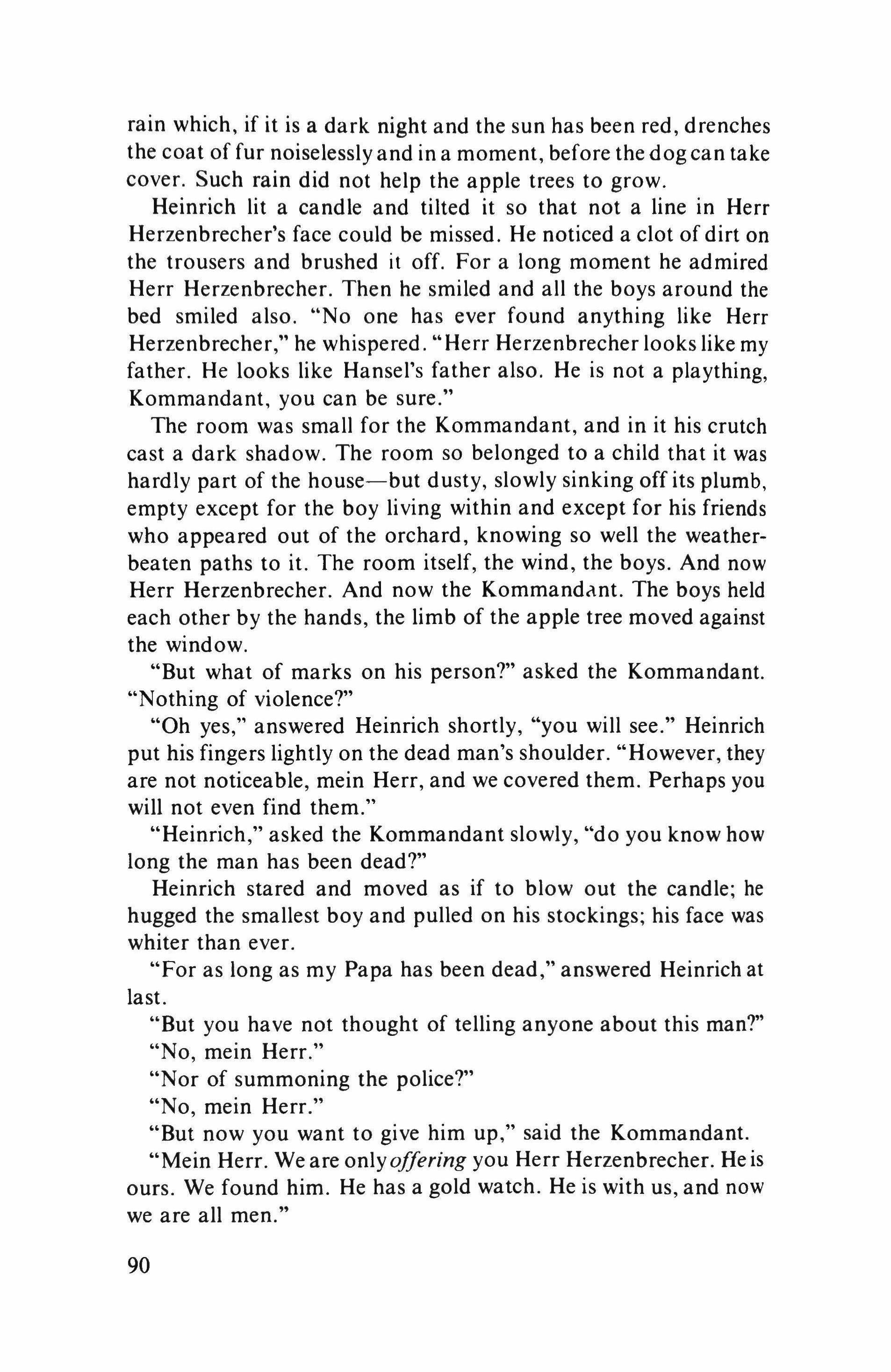
rain which, if it is a dark night and the sun has been red, drenches the coat of fur noiselessly and in a moment, before the dog can take cover. Such rain did not help the apple trees to grow.
Heinrich lit a candle and tilted it so that not a line in Herr Herzenbrecher's face could be missed. He noticed a clot of dirt on the trousers and brushed it off. For a long moment he admired Herr Herzenbrecher. Then he smiled and all the boys around the bed smiled also. "No one has ever found anything like Herr Herzenbrecher," he whispered. "Herr Herzenbrecher looks like my father. He looks like Hansel's father also. He is not a plaything, Kommandant, you can be sure."
The room was small for the Kommandant, and in it his crutch cast a dark shadow. The room so belonged to a child that it was hardly part of the house-but dusty, slowly sinking off its plumb, empty except for the boy living within and except for his friends who appeared out of the orchard, knowing so well the weatherbeaten paths to it. The room itself, the wind, the boys. And now Herr Herzenbrecher. And now the Kornmandant. The boys held each other by the hands, the limb of the apple tree moved against the window.
"But what of marks on his person?" asked the Kommandant. "Nothing of violence?"
"Oh yes," answered Heinrich shortly, "you will see." Heinrich put his fingers lightly on the dead man's shoulder. "However, they are not noticeable, mein Herr, and we covered them. Perhaps you will not even find them."
"Heinrich," asked the Kommandant slowly, "do you know how long the man has been dead?"
Heinrich stared and moved as if to blowout the candle; he hugged the smallest boy and pulled on his stockings; his face was whiter than ever.
"For as long as my Papa has been dead," answered Heinrich at last.
"But you have not thought of telling anyone about this man?"
"No, mein Herr."
"Nor of summoning the police?"
"No, mein Herr."
"But now you want to give him up," said the Kommandant. "Mein Herr. We are onlyoffering you Herr Herzenbrecher. He is ours. We found him. He has a gold watch. He is with us, and now we are all men."

"But this man is dead!"
"Comrades," whispered Heinrich, "assure the Kommandant that we know that Herr Herzenbrecher is dead."
"Mamma, Mamma, Mamma," cried the smallest boy until Heinrich picked him up and still holding him, and perspiring, spoke again to the one-legged man: "Are you thinking of his murderer, mein Herr?"
At that moment the window smashed and the branch, at last finding entrance through the broken glass, intruded, nodding and twisting as if it had finally penetrated a wall of stone.
"Tell me," said the Kommandant, speaking as plainly and softly as he could, "do you know how Herr Herzenbrecher died?"
Heinrich's face shone like gold and became thin and bright with pleasure. But he remained silent.
"Well, do you know?" repeated the Kommandant.
"Yes. Of course. Mein Herr," Heinrich whispered then, staring at the window, "he died fighting, throwing himself upon a great animal armed with scales. Bravely."
The Kommandant frowned and leaned on his crutch. He stopped himself from speaking.
The mill whistle blew again beyond the orchard, beyond the electric cables tapping in the mist. There came a slight odor of apples through the rain. In the forward part of the house a bell tinkled sharply. Immediately Heinrich stepped away from the corpse, laughed awkwardly, and bowed before the officer.
"Pardon, mein Herr Kommandant. My grandmother is calling me to our supper. I must be with her. We eat together. But will you take him, Your Honor?"
The Kommandant waited and then nodded and then from his heavy leather purse he gave each boy a few marks and a few pfennigs.
Then Heinrich signaled. They scurried about and produced a long umbrella, a bundle containing a flattened hat and handwoven shawl, and a piece of cord with which they securely tied the shoes. All this they thrust upon the Kommmandant.
The smallest boy pulled Heinrich to the door and shouted after the Kommandant, who was laboriously pushing his wooden cart into the darkness and rain: "Live well, Herr Herzenbrecher, live well!"
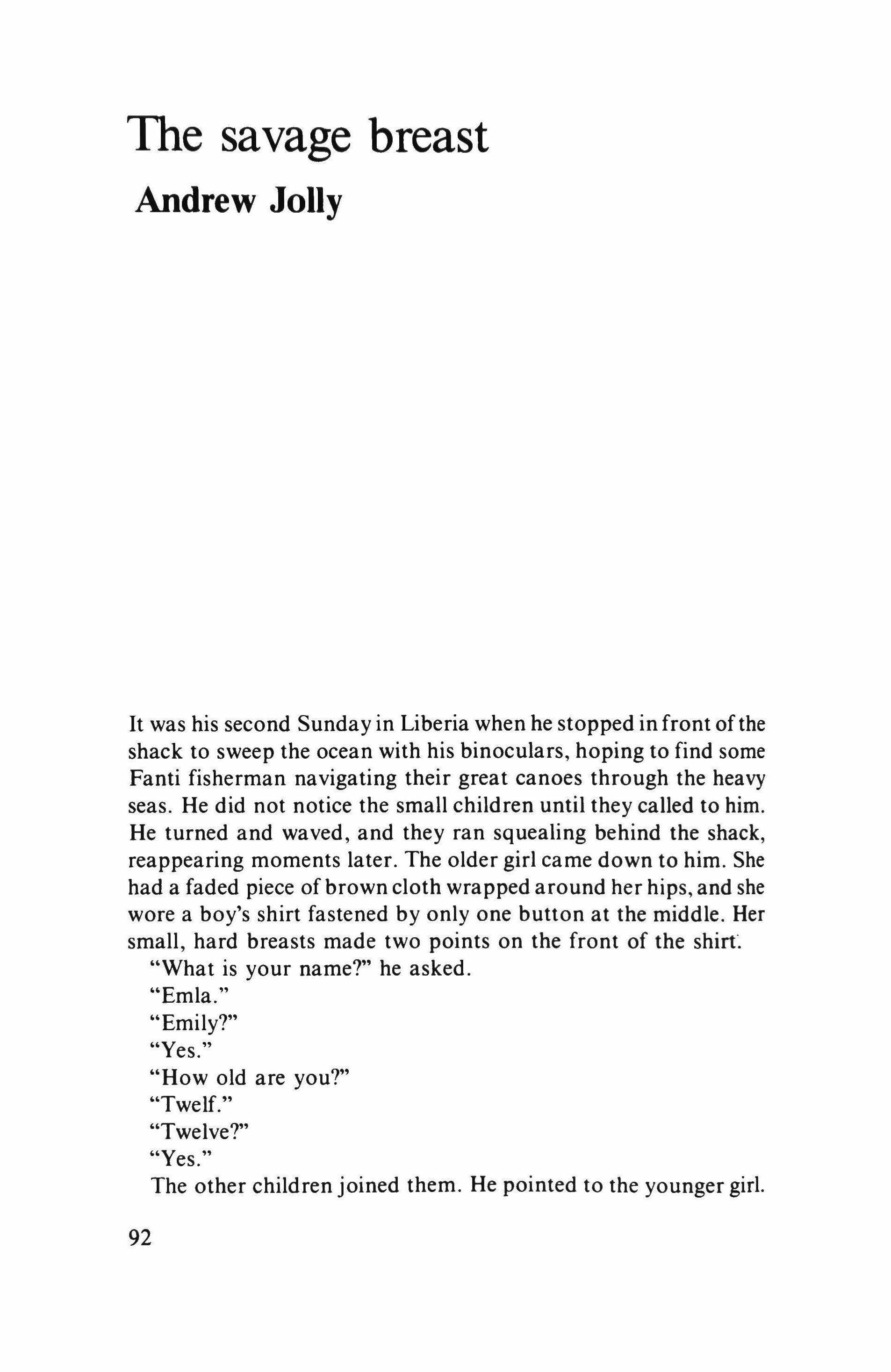
It was his second Sunday in Liberia when he stopped in front ofthe shack to sweep the ocean with his binoculars, hoping to find some Fanti fisherman navigating their great canoes through the heavy seas. He did not notice the small children until they called to him. He turned and waved, and they ran squealing behind the shack, reappearing moments later. The older girl came down to him. She had a faded piece of brown cloth wrapped around her hips, and she wore a boy's shirt fastened by only one button at the middle. Her small, hard breasts made two points on the front of the shirt.
"What is your name?" he asked.
"Emla."
"Emily?" "Yes."
"How old are you?"
"Twelf."
"Twelve?" "Yes."
The other children joined them. He pointed to the younger girl.

"What is her name?"
"Stella."
"How old is she?"
"Ten."
"And what is his name?"
"He Joe. He seben year old."
"Do all of you go to school?"
"Yeah. Go to school."
"Where is your school?"
"School down dere." She pointed toward the city of Monrovia.
The children asked him to take their picture. He explained that the binoculars were not a camera but glasses that let one see things far away. Emily wanted to try them. She pointed the binoculars in various directions and uttered soft cries of wonder at the nearness of things. The other children took their turns. As he was showing the boy how to use the glasses, he heard a call from the shack and saw a young woman walking slowly toward them.
"She our sister," said Emily.
"What is her name?"
"Her name Musu."
"That's not my real name," the girl explained after she had joined them and he had called her that. "My real name is Magdalene. My mother named me that. She was a Lebanese Catholic. I'm Catholic, too."
"Mind if 1 call you Musu?"
"I suppose you like it because it sounds exotic."
"That could be."
"Something you would think of as African because you are an American."
"I see what you mean."
"The truth is, my mother died when 1 was a baby, and my father-he's a Gola; that's his tribe, the Gola-anyway, he began calling me Musu because that means 'woman' in Gola, and 1 was his only woman then. Later he married a Gola woman, and he had these children, and they call me Musu because Magdalene is hard for them to pronounce. Have you noticed how bad their English is?"
"You speak very well."
"I know. I'm a senior in high school. I go to the College of West Africa. It's not really a college, just a high school. I'm concen-
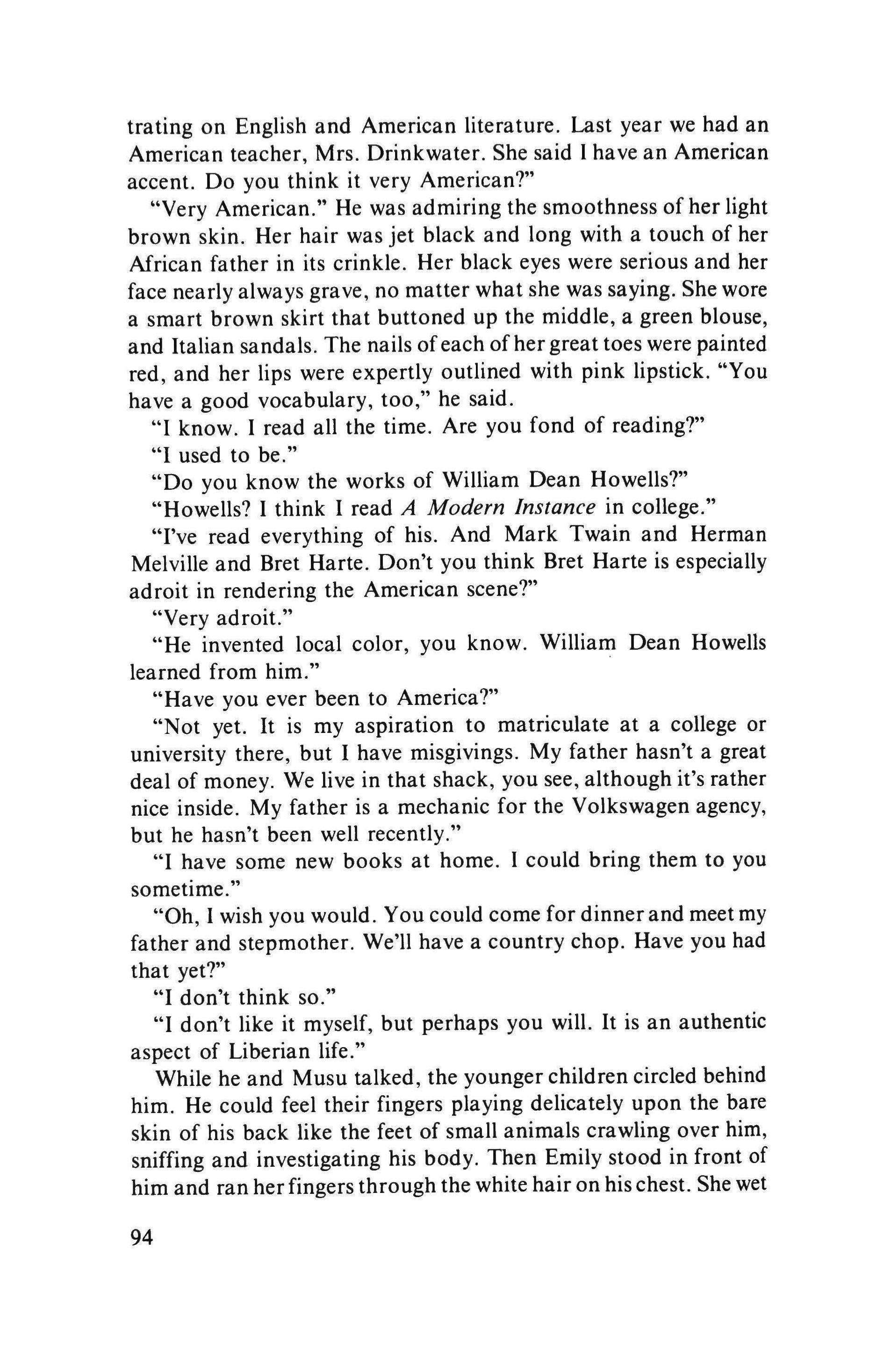
trating on English and American literature. Last year we had an American teacher, Mrs. Drinkwater. She said I have an American accent. Do you think it very American?"
"Very American." He was admiring the smoothness of her light brown skin. Her hair was jet black and long with a touch of her African father in its crinkle. Her black eyes were serious and her face nearly always grave, no matter what she was saying. She wore a smart brown skirt that buttoned up the middle, a green blouse, and Italian sandals. The nails of each of her great toes were painted red, and her lips were expertly outlined with pink lipstick. "You have a good vocabulary, too," he said.
"I know. 1 read all the time. Are you fond of reading?"
"I used to be."
"Do you know the works of William Dean Howells?"
"Howells? 1 think 1 read A Modern Instance in college."
"I've read everything of his. And Mark Twain and Herman Melville and Bret Harte. Don't you think Bret Harte is especially adroit in rendering the American scene?"
"Very adroit."
"He invented local color, you know. William Dean Howells learned from him."
"Have you ever been to America?"
"Not yet. It is my aspiration to matriculate at a college or university there, but 1 have misgivings. My father hasn't a great deal of money. We live in that shack, you see, although it's rather nice inside. My father is a mechanic for the Volkswagen agency, but he hasn't been well recently."
"I have some new books at home. I could bring them to you sometime."
"Oh, I wish you would. You could come for dinner and meet my father and stepmother. We'll have a country chop. Have you had that yet?"
"I don't think so."
"I don't like it myself, but perhaps you will. It is an authentic aspect of Liberian life."
While he and Musu talked, the younger children circled behind him. He could feel their fingers playing delicately upon the bare skin of his back like the feet of small animals crawling over him, sniffing and investigating his body. Then Emily stood in front of him and ran her fingers through the white hair on his chest. She wet
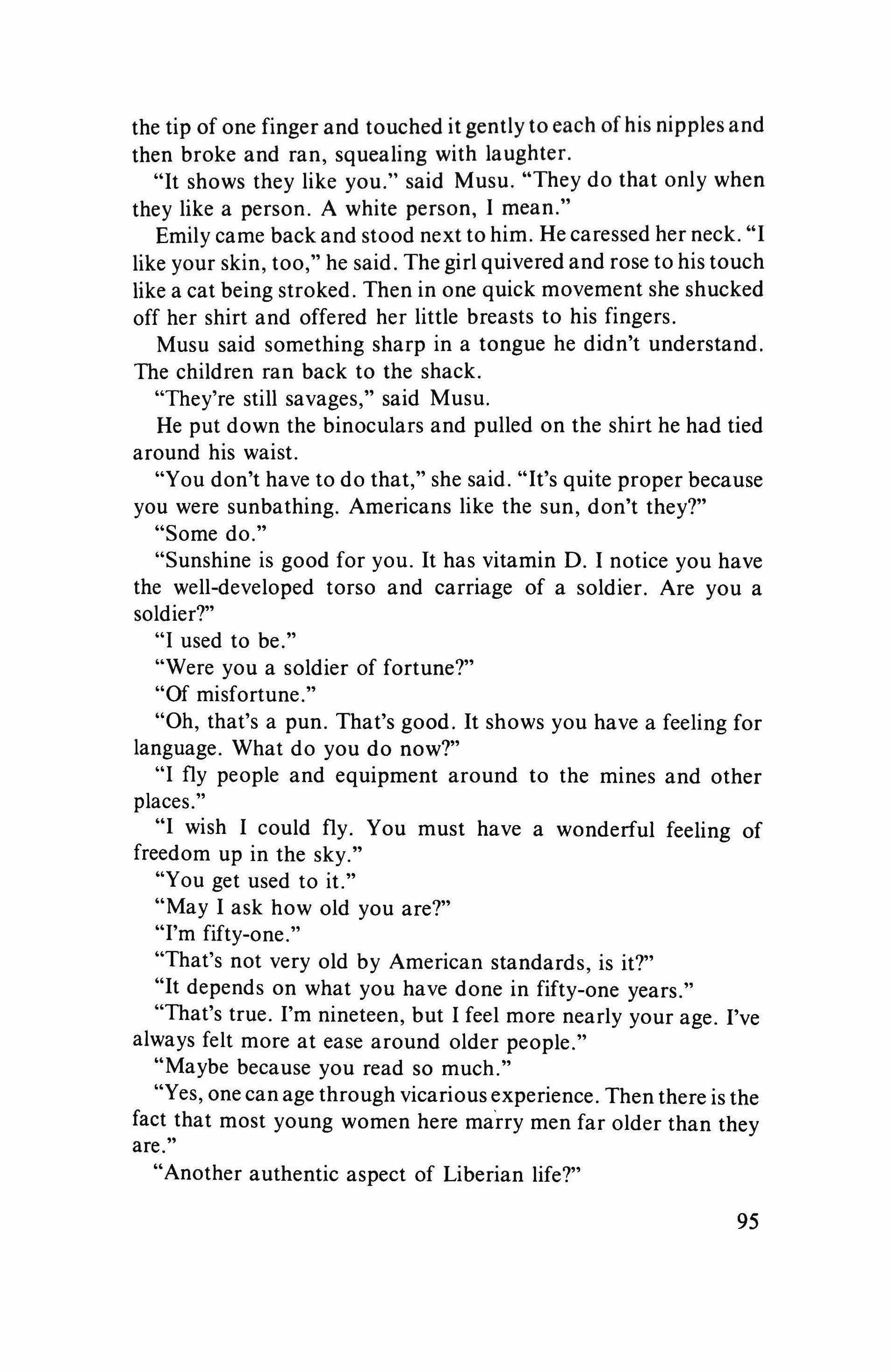
the tip of one finger and touched it gently to each of his nipples and then broke and ran, squealing with laughter.
"It shows they like you." said Musu. "They do that only when they like a person. A white person, I mean."
Emily came back and stood next to him. He caressed her neck. "I like your skin, too," he said. The girl quivered and rose to his touch like a cat being stroked. Then in one quick movement she shucked off her shirt and offered her little breasts to his fingers.
Musu said something sharp in a tongue he didn't understand. The children ran back to the shack.
"They're still savages," said Musu.
He put down the binoculars and pulled on the shirt he had tied around his waist.
"You don't have to do that," she said. "It's quite proper because you were sunbathing. Americans like the sun, don't they?"
"Some do."
"Sunshine is good for you. It has vitamin D. 1 notice you have the well-developed torso and carriage of a soldier. Are you a soldier?"
"I used to be."
"Were you a soldier of fortune?"
"Of misfortune."
"Oh, that's a pun. That's good. It shows you have a feeling for language. What do you do now?"
"I fly people and equipment around to the mines and other places."
"I wish I could fly. You must have a wonderful feeling of freedom up in the sky."
"You get used to it."
"May 1 ask how old you are?"
"I'm fifty-one."
"That's not very old by American standards, is it?"
"It depends on what you have done in fifty-one years."
"That's true. I'm nineteen, but I feel more nearly your age. I've always felt more at ease around older people."
"Maybe because you read so much."
"Yes, one can age through vicarious experience. Then there is the fact that most young women here marry men far older than they are."
"Another authentic aspect of Liberian life?"

"Yes, it is."
He picked up the binoculars and slung them over his shoulder. "I'll come around again," he said.
"Will you come for dinner?"
"When?"
"Are you disengaged Friday evening?" "I'm disengaged."
She walked with him a bit down the beach. He was a ware of her grace and beauty beside him, but he felt no different than when he had walked with other beautiful girls on beaches in other lands.
She stopped to go back. "I don't know your name."
"Ben Lear."
She extended her hand. He started to give her the Liberian handshake, but she did not respond, and so they shook in Western fashion.
He brought a bottle of French wine, a Macon, to dinner that Friday evening. It was the sort of old-fashioned gesture he knew would agree with Musu's notion of the civilization he was supposed to represent. He also brought a box of Italian chocolates for the children and a stack of recent American paperback novels for Musu.
The dinner was lively. Musu presided as though she were a young French matron conducting her own salon. When she introduced him to her parents as Captain Lear, he frowned at her but let the title pass and shook her father's trembling hand. Her father looked old and sick. His face was frozen by some sort of paralysis into a comical expression. One eye drooped in a leering wink, and his mouth was turned up at the right corner in a parody of a smile. At table, he dropped food from his loaded fork. Musu quietly gathered the fragments and restored them to his plate. She whispered to Ben, "I told you he isn't well."
But the old man's condition did not dampen the gaiety. The country chop was excellent. The white wine went well with the crayfish, shrimp, mussels, and bits of white fish mixed with rice. The children ate large quantities. Their mother-a large, bosomy woman magnificent in blue lappa and matching head tie-left the table often to bring in a fresh bowl of chop, cucumbers in sour cream, sliced avocado, and plates of mixed fruit. The children chattered among themselves and with their mother, who smiled and laughed a good deal. Musu, erect and beautiful in a green dress
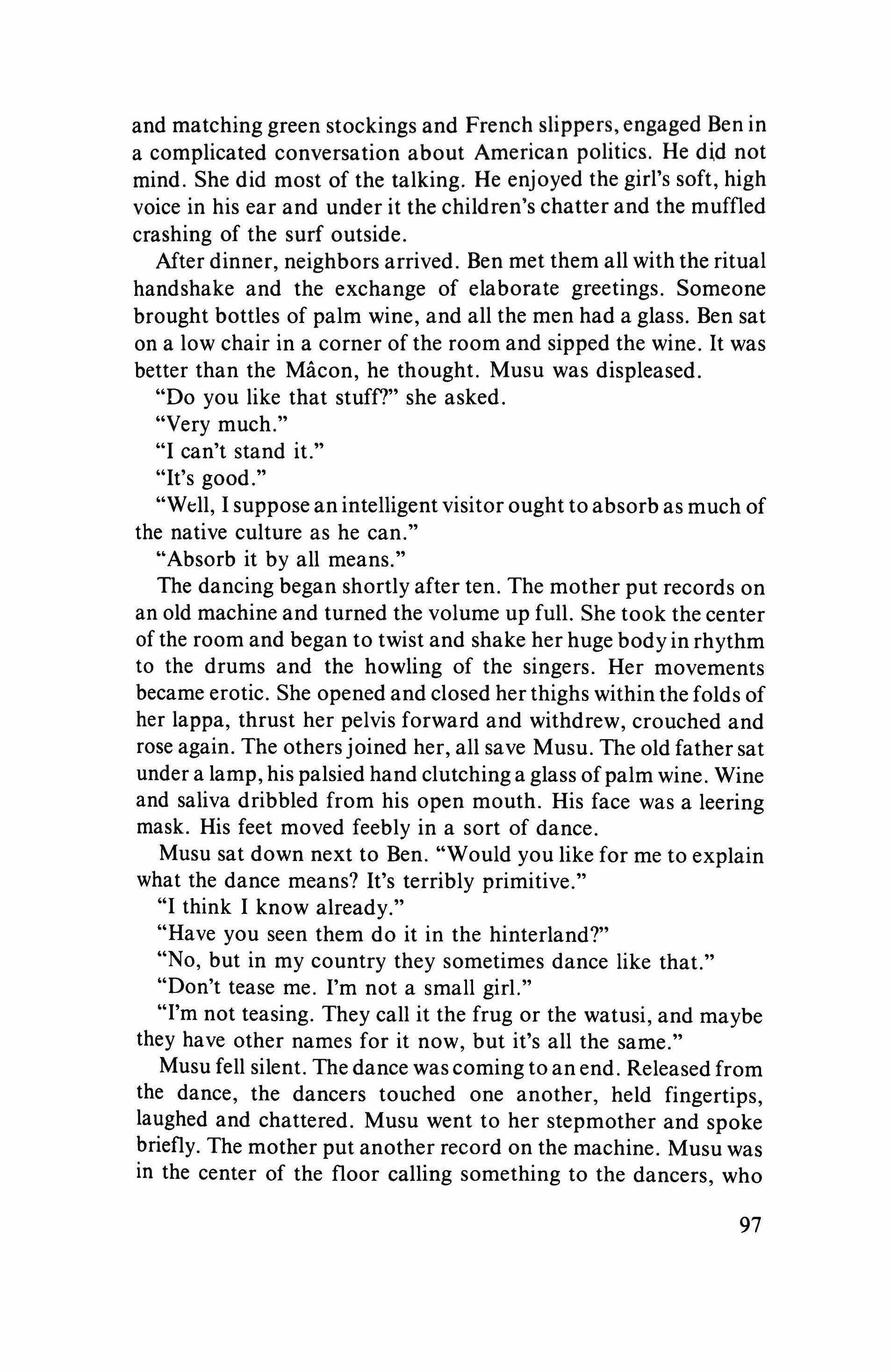
and matching green stockings and French slippers, engaged Ben in a complicated conversation about American politics. He did not mind. She did most of the talking. He enjoyed the girl's soft, high voice in his ear and under it the children's chatter and the muffled crashing of the surf outside.
After dinner, neighbors arrived. Ben met them all with the ritual handshake and the exchange of elaborate greetings. Someone brought bottles of palm wine, and all the men had a glass. Ben sat on a low chair in a corner of the room and sipped the wine. It was better than the Macon, he thought. Musu was displeased.
"Do you like that stuff?" she asked.
"Very much."
"I can't stand it."
"It's good."
"Well, I suppose an intelligent visitor ought to absorb as much of the native culture as he can."
"Absorb it by all means."
The dancing began shortly after ten. The mother put records on an old machine and turned the volume up full. She took the center of the room and began to twist and shake her huge body in rhythm to the drums and the howling of the singers. Her movements became erotic. She opened and closed her thighs within the folds of her lappa, thrust her pelvis forward and withdrew, crouched and rose again. The others joined her, all save Musu. The old father sat under a lamp, his palsied hand clutching a glass of palm wine. Wine and saliva dribbled from his open mouth. His face was a leering mask. His feet moved feebly in a sort of dance.
Musu sat down next to Ben. "Would you like for me to explain what the dance means? It's terribly primitive."
"I think I know already."
"Have you seen them do it in the hinterland?"
"No, but in my country they sometimes dance like that."
"Don't tease me. I'm not a small girl."
"I'm not teasing. They call it the frug or the watusi, and maybe they have other names for it now, but it's all the same."
Musu fell silent. The dance was coming to an end. Released from the dance, the dancers touched one another, held fingertips, laughed and chattered. Musu went to her stepmother and spoke briefly. The mother put another record on the machine. Musu was in the center of the floor calling something to the dancers, who

formed two lines, men and boys in one line opposite women and girls in the other. The music played, and the dancers moved toward one another, grasped hands delicately, held them high, turned, and wheeled. It was a quadrille. Musu called the changes in French. Ben looked on. A quadrille in Africa.
Musu beckoned to him. He held her slim brown hand and turned her slowly. The music was like a formal garden through which they walked in stately movements.
"Do you like this dance better?" she asked. "It's my favorite."
"I'm not much for dances."
"You dance well."
"I have a graceful partner."
She smiled at him. "Vous etes tres galant."
"Non. Je suis seulement honnete. C'est mon seul vice."
"I'm glad you speak French,"she said. "It is the language of all that is fine and civilized."
The party ended at midnight. The guests left after prolonged farewells and many handshakes. The mother put the children to bed, and the father weakly clasped Ben's hand and shuffled painfully to his bedroom. Ben prepared to leave.
"Would you like another glass of palm wine before you go?" asked Musu.
"If I can have it on the beach."
"Of course. I'll tell my father I shall sit with you a while."
She brought the wine, and they sat with their backs against a small dune, the bottle between them. There was no moon, and the overcast shut out the starlight, but they could see the white caps of the breakers a few hundred feet away. Ben sipped the wine and smoked a small cigar.
"Is your wife in America?" she asked.
"I have no wife."
"You've never been married."
"Once. Years ago."
"Did you have children?"
"A son."
"How old is he?"
"Twenty-eight."
"A grown man."
"A grown cripple."
"I'm so sorry. What happened to him?"
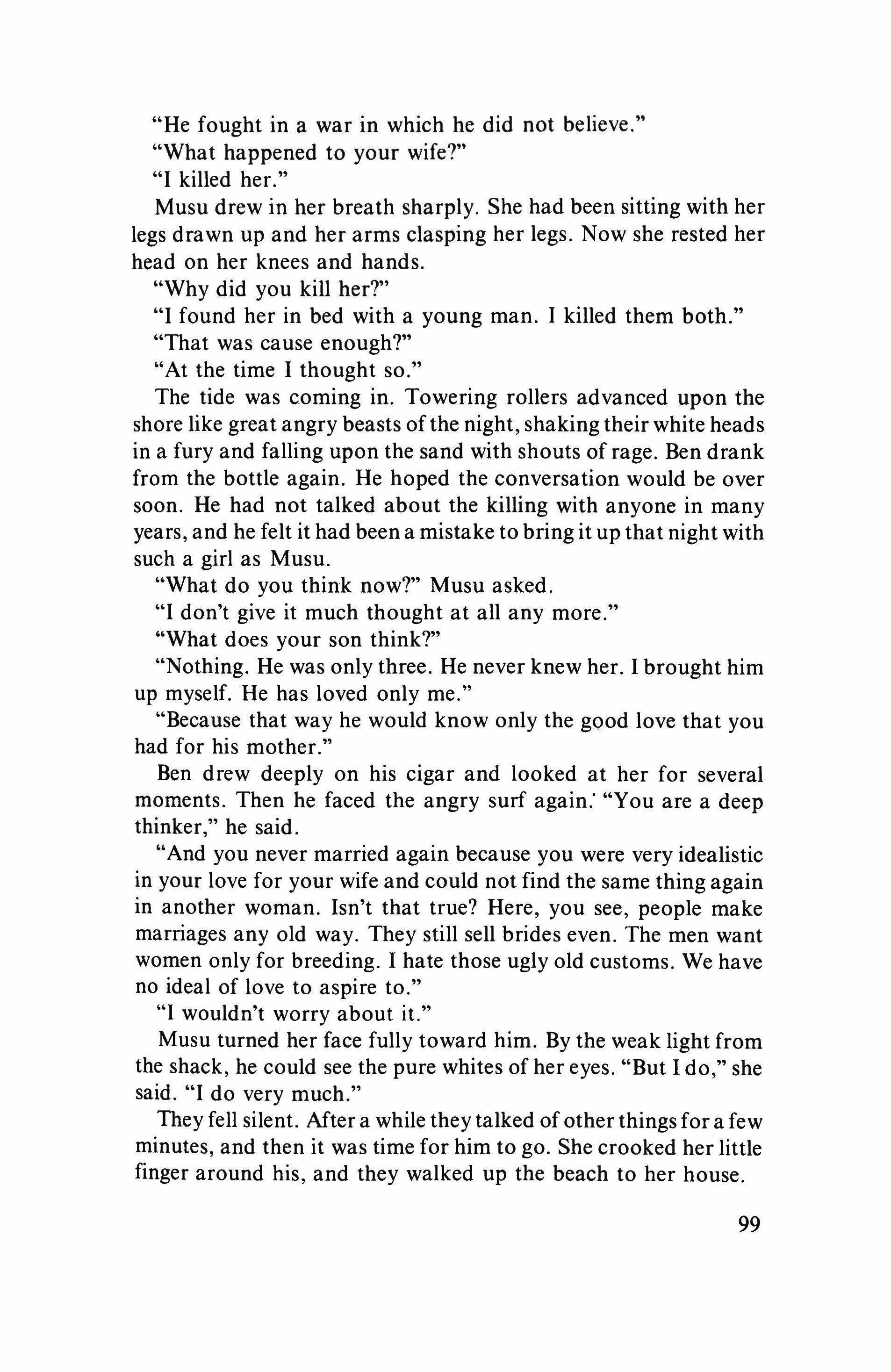
"He fought in a war in which he did not believe."
"What happened to your wife?"
"I killed her."
Musu drew in her breath sharply. She had been sitting with her legs drawn up and her arms clasping her legs. Now she rested her head on her knees and hands.
"Why did you kill her?"
"I found her in bed with a young man. I killed them both."
"That was cause enough?"
"At the time I thought so."
The tide was coming in. Towering rollers advanced upon the shore like great angry beasts of the night, shaking their white heads in a fury and falling upon the sand with shouts of rage. Ben drank from the bottle again. He hoped the conversation would be over soon. He had not talked about the killing with anyone in many years, and he felt it had been a mistake to bring it up that night with such a girl as Musu.
"What do you think now?" Musu asked.
"I don't give it much thought at all any more."
"What does your son think?"
"Nothing. He was only three. He never knew her. I brought him up myself. He has loved only me."
"Because that way he would know only the good love that you had for his mother."
Ben drew deeply on his cigar and looked at her for several moments. Then he faced the angry surf again: "You are a deep thinker," he said.
"And you never married again because you were very idealistic in your love for your wife and could not find the same thing again in another woman. Isn't that true? Here, you see, people make marriages any old way. They still sell brides even. The men want women only for breeding. I hate those ugly old customs. We have no ideal of love to aspire to."
"I wouldn't worry about it."
Musu turned her face fully toward him. By the weak light from the shack, he could see the pure whites of her eyes. "But I do," she said. "I do very much."
They fell silent. After a while they talked of other things for a few minutes, and then it was time for him to go. She crooked her little finger around his, and they walked up the beach to her house.

"I wonder why 1 am not afraid of you," she said.
"Why should you be?"
"Because of what you did to your wife."
"I killed many people as a soldier."
"That's different."
"No. Only a change of cause."
He did not see her again for two weeks. He went to Spain and flew back an airplane his company had bought, an old Cessna which had seen long service flying tourists around the Mediterranean. On the Tuesday following his return to Monrovia, he walked up the beach to Musu's shack. No one was about. He left a note saying he would take her to dinner Friday evening. When he called for her, she was alone.
"My father had another stroke," she said. "His wife and the children are with him at the hospital."
"I didn't know. We'll make it another evening."
"No, it's all right. He said I should go with you. He likes you. He says you are a true man."
They had dinner on the terrace at Oscar's Chalet overlooking the Atlantic Ocean. In spite of her father's illness, Musu was in good spirits. She ordered chicken cooked in wine and daintily cut and ate it.
"I've been thinking about why you did that-committed thatwhy you did what you did to your wife."
"I killed her."
"Yes."
"Are you afraid of that word?"
"Yes."
"Why?"
"I don't like to put it and you together."
"The literary works you admire-Hamlet. Oedipus Rex. and so on-they are all based on killing."
"It is just that you are the first Western gentleman I have ever met socially, and I don't want to think of you as having done that deed, though I assure you I fully understand why you did it."
"Do you?"
"The Bible says, 'And if thy right eye offend thee, pluck it out and cast it from thee: for it is profitable for thee that one of thy members should perish, and not the whole body should be cast into hell.'"
100
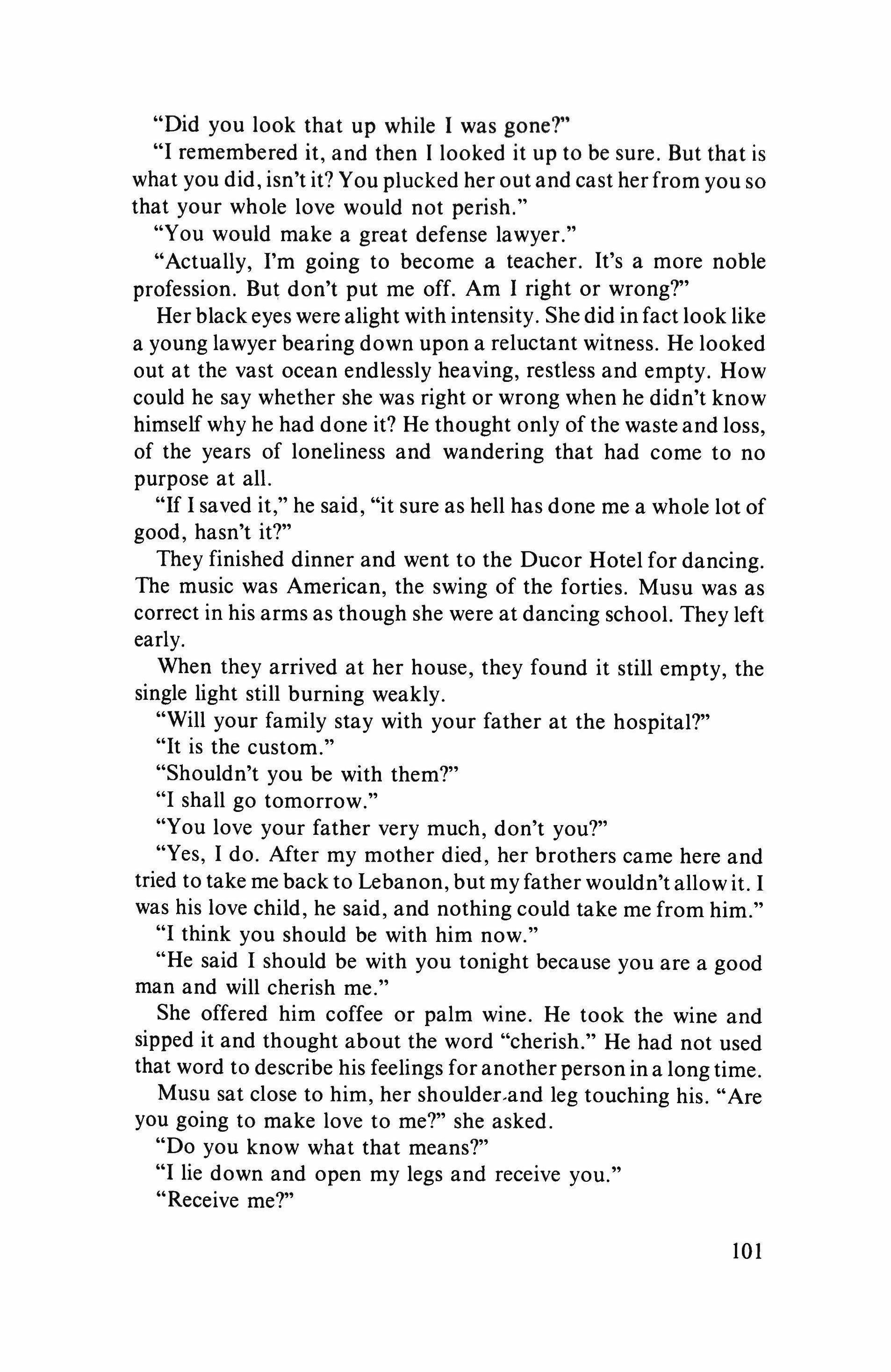
"Did you look that up while I was gone?"
"I remembered it, and then I looked it up to be sure. But that is what you did, isn't it? You plucked her out and cast her from you so that your whole love would not perish."
"You would make a great defense lawyer."
"Actually, I'm going to become a teacher. It's a more noble profession. But don't put me off. Am I right or wrong?"
Her black eyes were alight with intensity. She did in fact look like a young lawyer bearing down upon a reluctant witness. He looked out at the vast ocean endlessly heaving, restless and empty. How could he say whether she was right or wrong when he didn't know himself why he had done it? He thought only of the waste and loss, of the years of loneliness and wandering that had come to no purpose at all.
"If I saved it," he said, "it sure as hell has done me a whole lot of good, hasn't it?"
They finished dinner and went to the Ducor Hotel for dancing. The music was American, the swing of the forties. Musu was as correct in his arms as though she were at dancing school. They left early.
When they arrived at her house, they found it still empty, the single light still burning weakly.
"Will your family stay with your father at the hospital?"
"It is the custom."
"Shouldn't you be with them?"
"I shall go tomorrow."
"You love your father very much, don't you?"
"Yes, I do. After my mother died, her brothers came here and tried to take me back to Lebanon, but my father wouldn't allow it. I was his love child, he said, and nothing could take me from him."
"I think you should be with him now."
"He said I should be with you tonight because you are a good man and will cherish me."
She offered him coffee or palm wine. He took the wine and sipped it and thought about the word "cherish." He had not used that word to describe his feelings for another person in a long time.
Musu sat close to him, her shoulder.and leg touching his. "Are you going to make love to me?" she asked.
"Do you know what that means?"
"I lie down and open my legs and receive you."
"Receive me?"
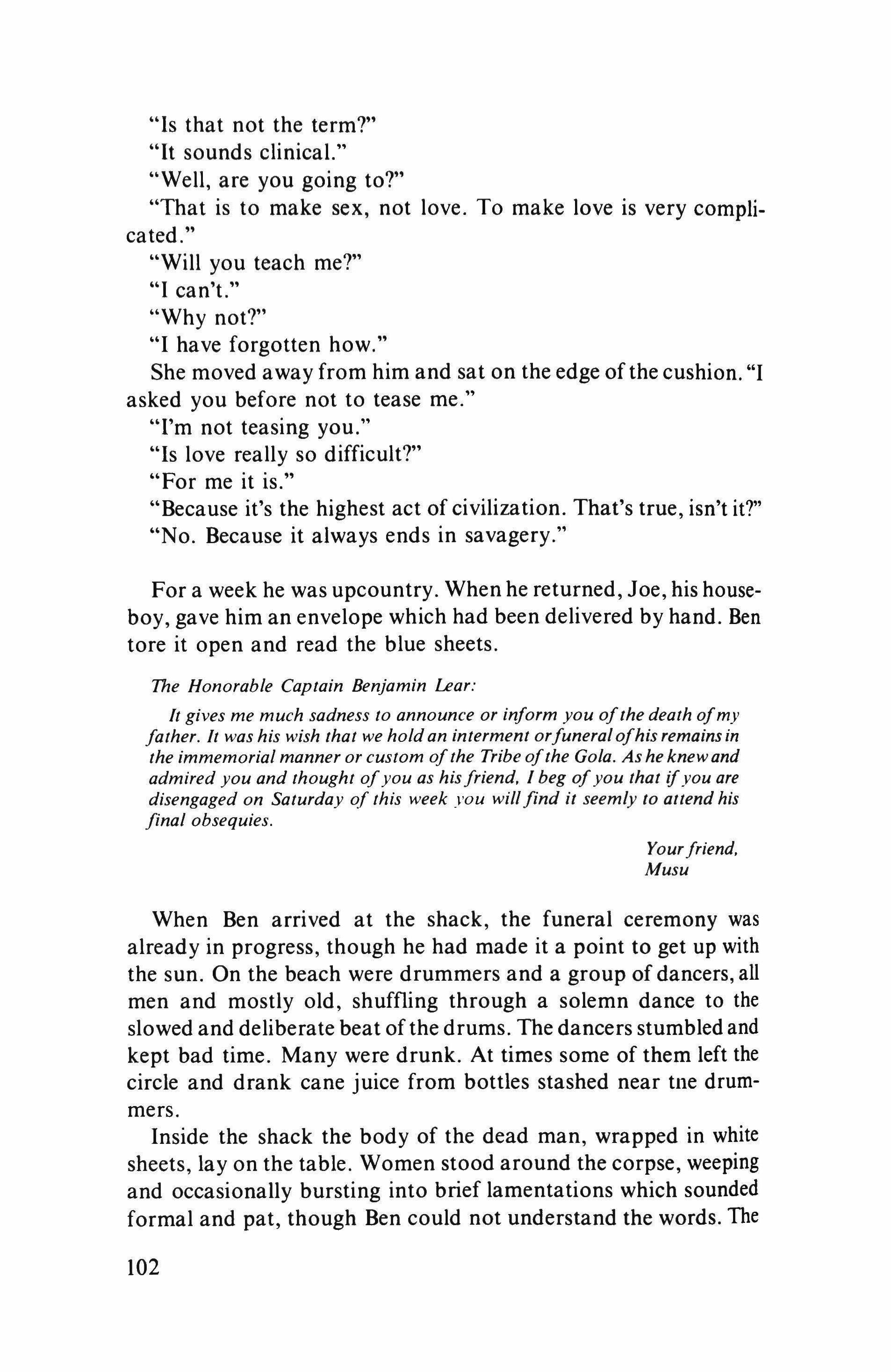
"Is that not the term?"
"It sounds clinical."
"Well, are you going to?"
"That is to make sex, not love. To make love is very complicated."
"Will you teach me?"
"I can't."
"Why not?"
"I have forgotten how."
She moved away from him and sat on the edge of the cushion. "I asked you before not to tease me."
"I'm not teasing you."
"Is love really so difficult?"
"For me it is."
"Because it's the highest act of civilization. That's true, isn't it?"
"No. Because it always ends in savagery."
For a week he was upcountry. When he returned, Joe, his houseboy, gave him an envelope which had been delivered by hand. Ben tore it open and read the blue sheets.
The Honorable Captain Benjamin Lear:
It gives me much sadness to announce or inform you ofthe death ofmy father. It was his wish that we hold an interment orfuneralofhis remains in the immemorial manner or custom ofthe Tribe ofthe Gola. As he knewand admired you and thought ofyou as hisfriend. I beg ofyou that ifyou are disengaged on Saturday of this week you willfind it seemly to attend his final obsequies.
Yourfriend. Musu
When Ben arrived at the shack, the funeral ceremony was already in progress, though he had made it a point to get up with the sun. On the beach were drummers and a group of dancers, all men and mostly old, shuffling through a solemn dance to the slowed and deliberate beat of the drums. The dancers stumbled and kept bad time. Many were drunk. At times some of them left the circle and drank cane juice from bottles stashed near tne drummers.
Inside the shack the body of the dead man, wrapped in white sheets, lay on the table. Women stood around the corpse, weeping and occasionally bursting into brief lamentations which sounded formal and pat, though Ben could not understand the words. The

dead man's family were gathered in a corner, sitting on floor mats, heads bowed, weeping. Musu sat on a mat by herself. She wore a dark blue lappa, and her feet were bare. She rocked back and forth from her hips, her head touching her knees, straightening, and touching again. Ben knelt down beside her and looked into her face, wet with tears. She gave no sign that she recognized him. He touched her bare arm lightly. She did not respond. He went outside and sat near the drummers and drank from a bottle of cane juice. After a while Musu came running from the shack. She ran into the circle of dancers, and her slim naked feet, moving rapidly over the dirty sands, forced the drums into a wild beat. She was naked from the waist up. Her breasts, as firm as new apples, strained toward the sun as she arched her body in an ecstasy of grief. The drums were with her now, wild and savage, and the male dancers circling the girl were transfigured by her passion into a single gesture of unspeakable lamentation. For an instant Ben caught Musu's glance and held it. Her body was a spasm of uncivil passion, but her eyes were steady and clear, and they said to him, "I have to do this, don't you see? 1 have to do it."
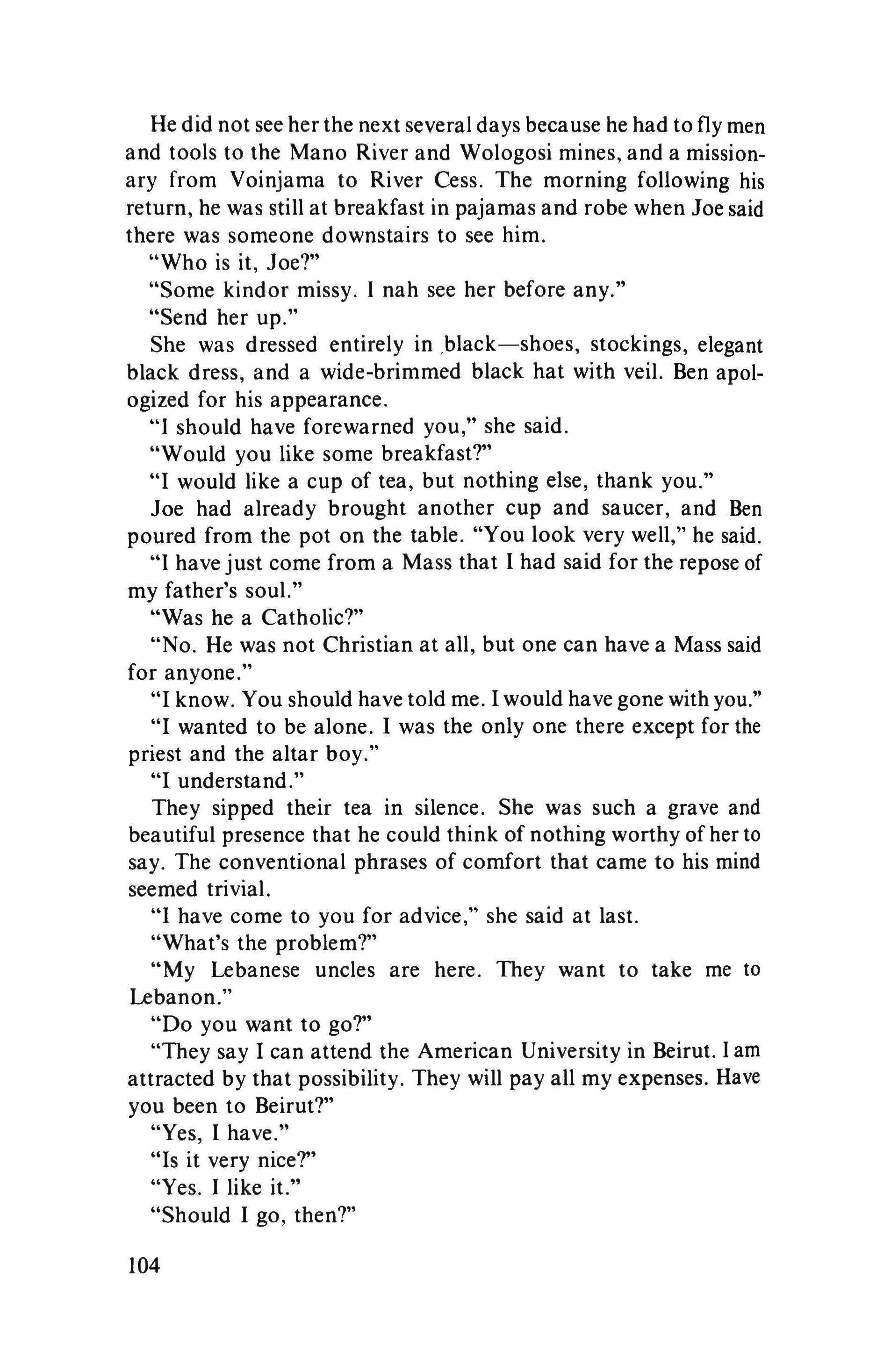
He did not see her the next several days because he had to fly men and tools to the Mano River and Wologosi mines, and a missionary from Voinjama to River Cess. The morning following his return, he was still at breakfast in pajamas and robe when Joe said there was someone downstairs to see him.
"Who is it, Joe?"
"Some kindor missy. 1 nah see her before any."
"Send her up."
She was dressed entirely in ,black-shoes, stockings, elegant black dress, and a wide-brimmed black hat with veil. Ben apologized for his appearance.
"I should have forewarned you," she said.
"Would you like some breakfast?"
"I would like a cup of tea, but nothing else, thank you."
Joe had already brought another cup and saucer, and Ben poured from the pot on the table. "You look very well," he said.
"I have just come from a Mass that I had said for the repose of my father's soul."
"Was he a Catholic?"
"No. He was not Christian at all, but one can have a Mass said for anyone."
"I know. You should have told me. I would have gone with you."
"I wanted to be alone. I was the only one there except for the priest and the altar boy."
"I understand."
They sipped their tea in silence. She was such a grave and beautiful presence that he could think of nothing worthy of her to say. The conventional phrases of comfort that came to his mind seemed trivial.
"I have come to you for advice," she said at last.
"What's the problem?"
"My Lebanese uncles are here. They want to take me to Lebanon."
"Do you want to go?"
"They say I can attend the American University in Beirut. I am attracted by that possibility. They will pay all my expenses. Have you been to Beirut?"
"Yes, I have."
"Is it very nice?"
"Yes. I like it."
"Should I go, then?"
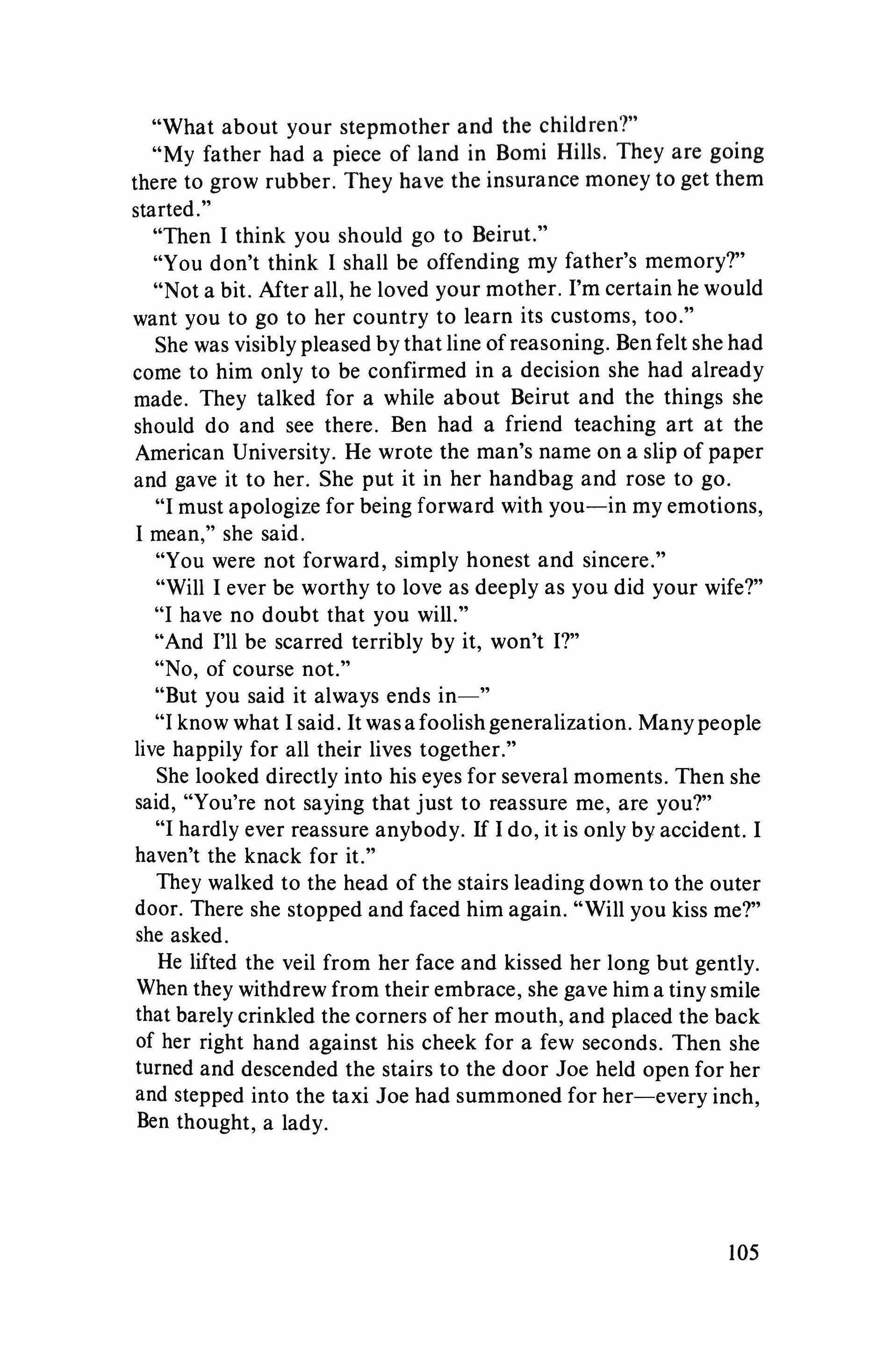
"What about your stepmother and the children?"
"My father had a piece of land in Bomi Hills. They are going there to grow rubber. They have the insurance money to get them started."
"Then 1 think you should go to Beirut."
"You don't think 1 shall be offending my father's memory?"
"Not a bit. After all, he loved your mother. I'm certain he would want you to go to her country to learn its customs, too."
She was visiblypleased by that line of reasoning. Ben felt she had come to him only to be confirmed in a decision she had already made. They talked for a while about Beirut and the things she should do and see there. Ben had a friend teaching art at the American University. He wrote the man's name on a slip of paper and gave it to her. She put it in her handbag and rose to go.
"I must apologize for being forward with you-in my emotions, 1 mean," she said.
"You were not forward, simply honest and sincere."
"Will 1 ever be worthy to love as deeply as you did your wife?"
"I have no doubt that you will."
"And I'll be scarred terribly by it, won't I?"
"No, of course not."
"But you said it always ends in-"
"I know what 1 said. It wasa foolish generalization. Manypeople live happily for all their lives together."
She looked directly into his eyes for several moments. Then she said, "You're not saying that just to reassure me, are you?"
"I hardly ever reassure anybody. If 1 do, it is only by accident. 1 haven't the knack for it."
They walked to the head of the stairs leading down to the outer door. There she stopped and faced him again. "Will you kiss me?" she asked.
He lifted the veil from her face and kissed her long but gently. When they withdrew from their embrace, she gave him a tiny smile that barely crinkled the corners of her mouth, and placed the back of her right hand against his cheek for a few seconds. Then she turned and descended the stairs to the door Joe held open for her and stepped into the taxi Joe had summoned for her-every inch, Ben thought, a lady.

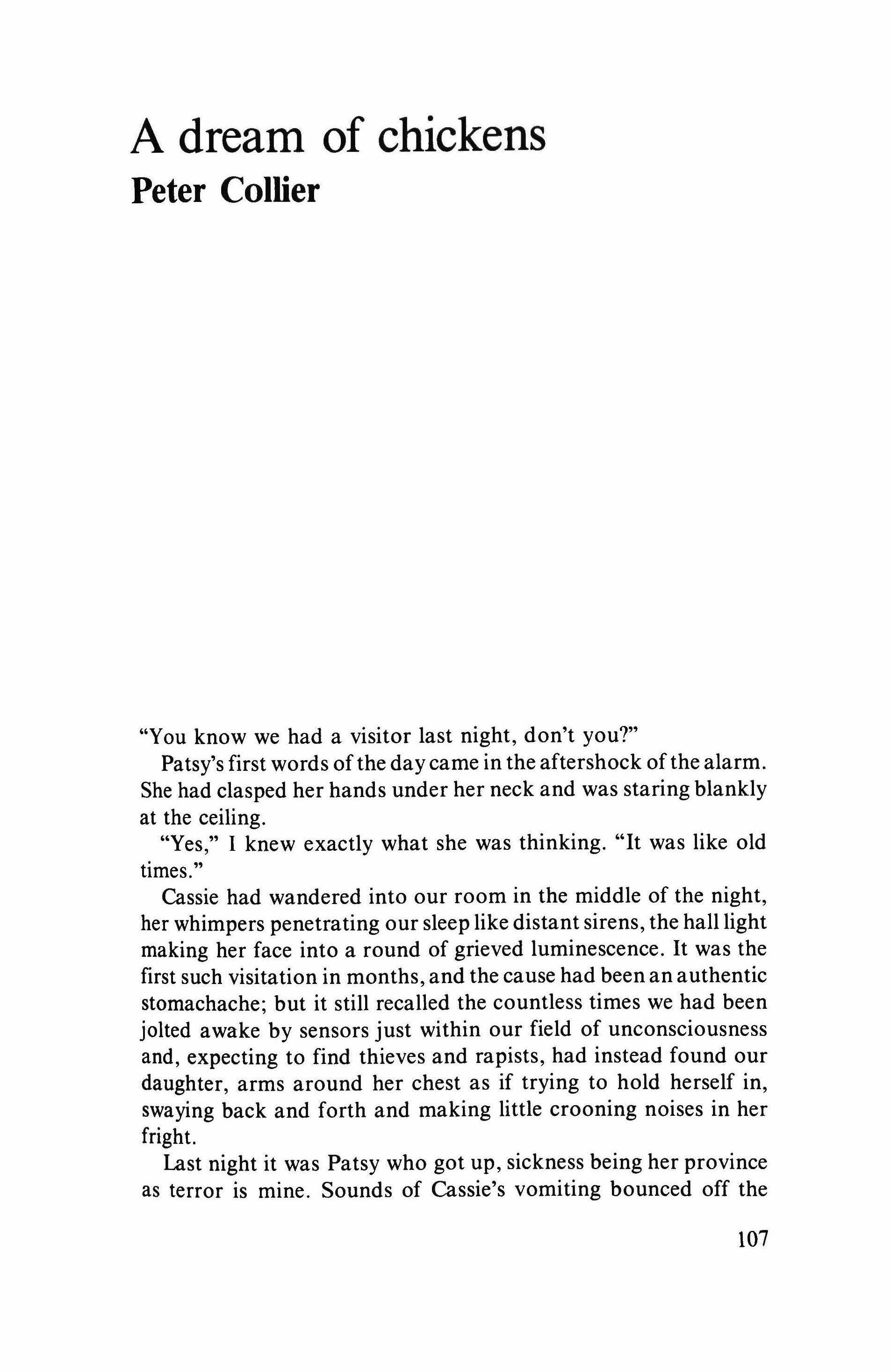
"You know we had a visitor last night, don't you?"
Patsy's first words ofthe day came in the aftershock of the alarm. She had clasped her hands under her neck and was staring blankly at the ceiling.
"Yes," I knew exactly what she was thinking. "It was like old times."
Cassie had wandered into our room in the middle of the night, her whimpers penetrating our sleep like distant sirens, the hall light making her face into a round of grieved luminescence. It was the first such visitation in months, and the cause had been an authentic stomachache; but it still recalled the countless times we had been jolted awake by sensors just within our field of unconsciousness and, expecting to find thieves and rapists, had instead found our daughter, arms around her chest as if trying to hold herself in, swaying back and forth and making little crooning noises in her fright.
Last night it was Patsy who got up, sickness being her province as terror is mine. Sounds of Cassie's vomiting bounced off the
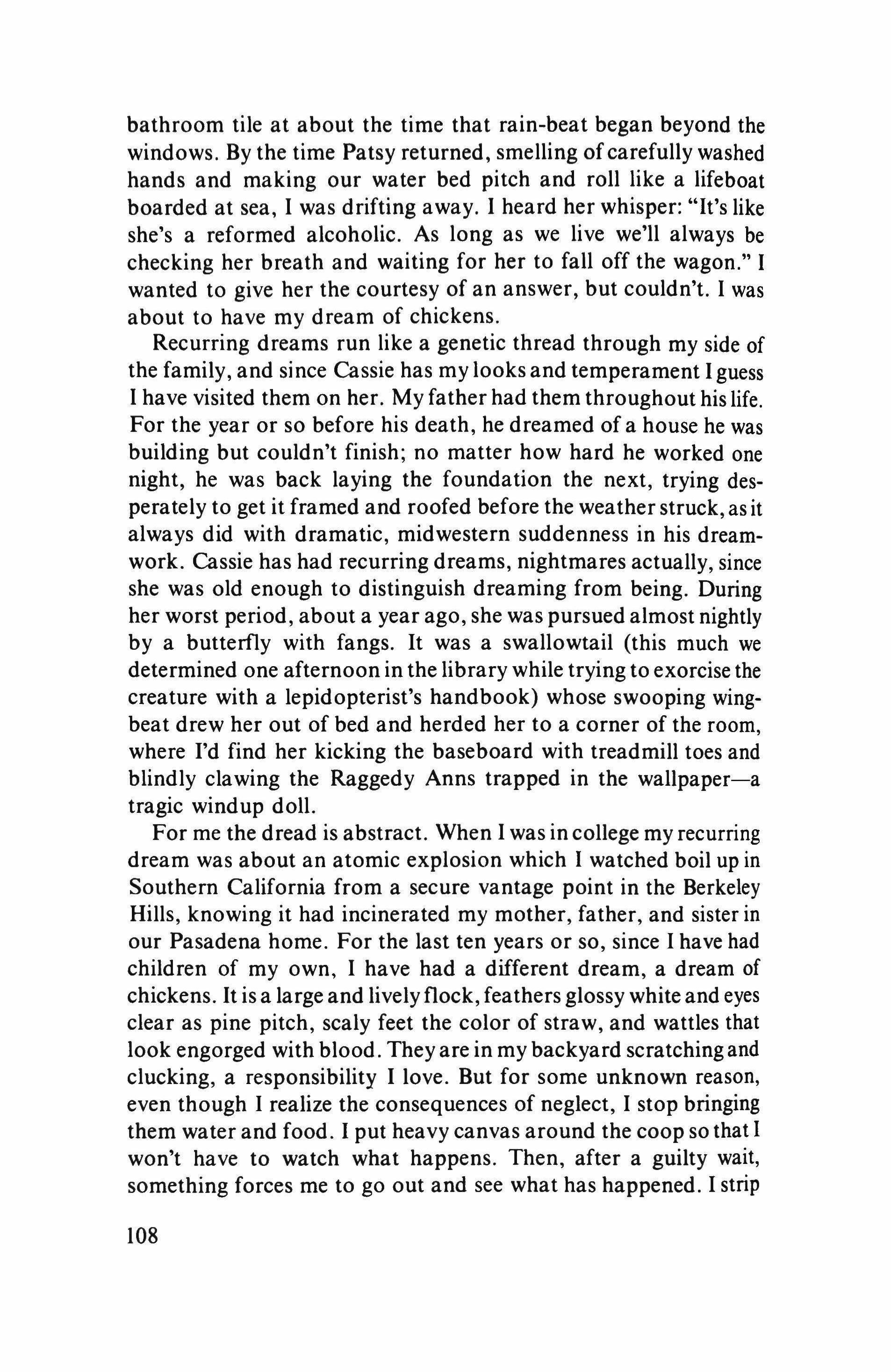
bathroom tile at about the time that rain-beat began beyond the windows. By the time Patsy returned, smelling ofcarefully washed hands and making our water bed pitch and roll like a lifeboat boarded at sea, I was drifting away. I heard her whisper: "It's like she's a reformed alcoholic. As long as we live we'll always be checking her breath and waiting for her to fall off the wagon." I wanted to give her the courtesy of an answer, but couldn't. I was about to have my dream of chickens.
Recurring dreams run like a genetic thread through my side of the family, and since Cassie has my looks and temperament I guess I have visited them on her. My father had them throughout his life. For the year or so before his death, he dreamed of a house he was building but couldn't finish; no matter how hard he worked one night, he was back laying the foundation the next, trying desperately to get it framed and roofed before the weather struck, as it always did with dramatic, midwestern suddenness in his dreamwork. Cassie has had recurring dreams, nightmares actually, since she was old enough to distinguish dreaming from being. During her worst period, about a year ago, she was pursued almost nightly by a butterfly with fangs. It was a swallowtail (this much we determined one afternoon in the library while trying to exorcise the creature with a lepidopterist's handbook) whose swooping wingbeat drew her out of bed and herded her to a corner of the room, where I'd find her kicking the baseboard with treadmill toes and blindly clawing the Raggedy Anns trapped in the wallpaper-a tragic windup doll.
For me the dread is abstract. When I was in college my recurring dream was about an atomic explosion which I watched boil up in Southern California from a secure vantage point in the Berkeley Hills, knowing it had incinerated my mother, father, and sister in our Pasadena home. For the last ten years or so, since I have had children of my own, I have had a different dream, a dream of chickens. It is a large and livelyflock, feathers glossy white and eyes clear as pine pitch, scaly feet the color of straw, and wattles that look engorged with blood. They are in my backyard scratching and clucking, a responsibility I love. But for some unknown reason, even though I realize the consequences of neglect, I stop bringing them water and food. I put heavy canvas around the coop so that I won't have to watch what happens. Then, after a guilty wait, something forces me to go out and see what has happened. I strip
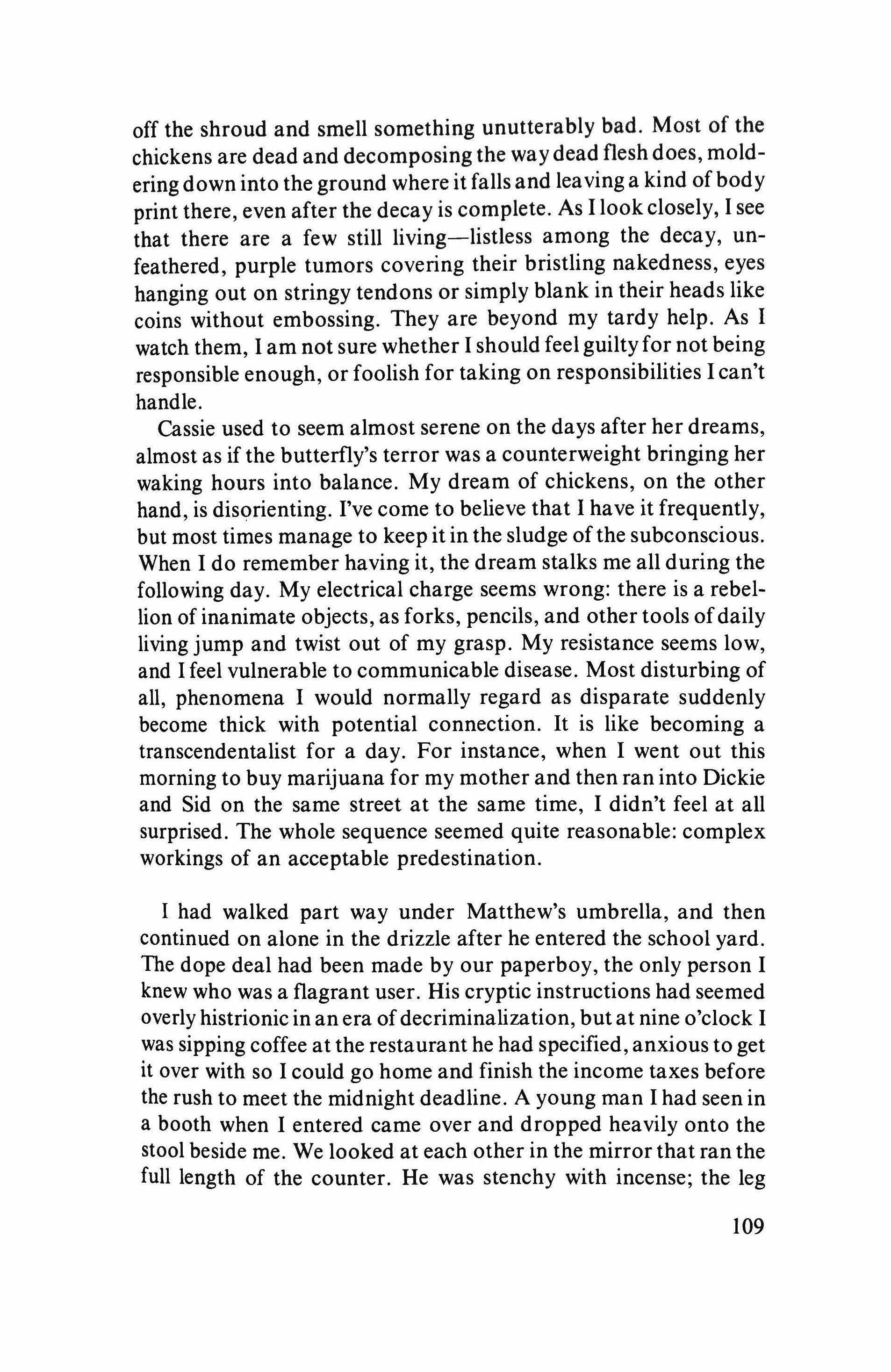
off the shroud and smell something unutterably bad. Most of the chickens are dead and decomposing the way dead flesh does, moldering down into the ground where it falls and leaving a kind of body print there, even after the decay is complete. As I look closely, I see that there are a few still living-listless among the decay, unfeathered, purple tumors covering their bristling nakedness, eyes hanging out on stringy tendons or simply blank in their heads like coins without embossing. They are beyond my tardy help. As I watch them, I am not sure whether I should feel guilty for not being responsible enough, or foolish for taking on responsibilities I can't handle.
Cassie used to seem almost serene on the days after her dreams, almost as if the butterfly's terror was a counterweight bringing her waking hours into balance. My dream of chickens, on the other hand, is disorienting. I've come to believe that I have it frequently, but most times manage to keep it in the sludge of the subconscious. When I do remember having it, the dream stalks me all during the following day. My electrical charge seems wrong: there is a rebellion of inanimate objects, as forks, pencils, and other tools ofdaily living jump and twist out of my grasp. My resistance seems low, and I feel vulnerable to communicable disease. Most disturbing of all, phenomena I would normally regard as disparate suddenly become thick with potential connection. It is like becoming a transcendentalist for a day. For instance, when I went out this morning to buy marijuana for my mother and then ran into Dickie and Sid on the same street at the same time, I didn't feel at all surprised. The whole sequence seemed quite reasonable: complex workings of an acceptable predestination.
I had walked part way under Matthew's umbrella, and then continued on alone in the drizzle after he entered the school yard. The dope deal had been made by our paperboy, the only person I knew who was a flagrant user. His cryptic instructions had seemed overly histrionic in an era ofdecriminalization, but at nine o'clock I was sipping coffee at the restaurant he had specified, anxious to get it over with so I could go home and finish the income taxes before the rush to meet the midnight deadline. A young man I had seen in a booth when I entered came over and dropped heavily onto the stool beside me. We looked at each other in the mirror that ran the full length of the counter. He was stenchy with incense; the leg
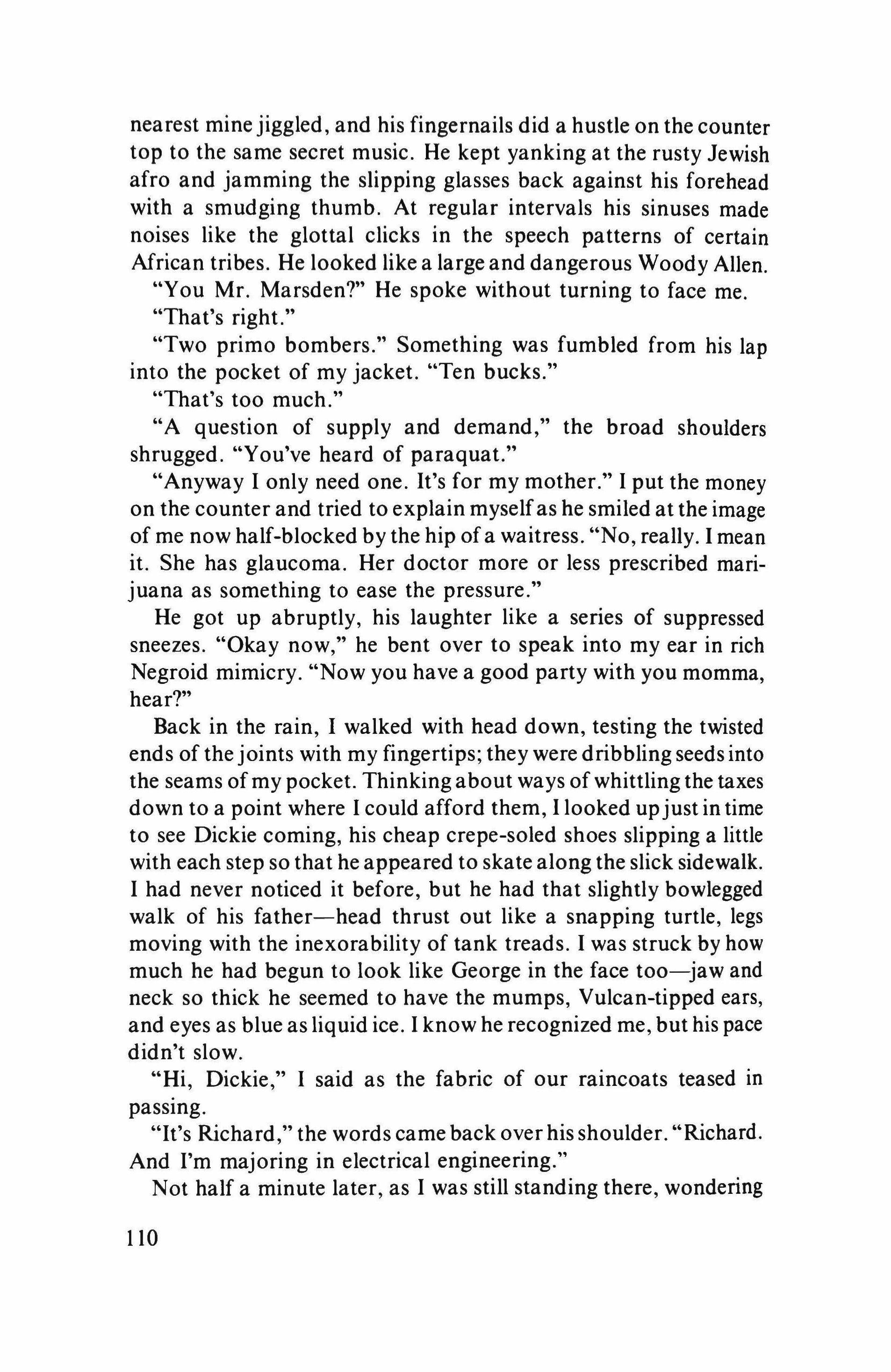
nearest mine jiggled, and his fingernails did a hustle on the counter top to the same secret music. He kept yanking at the rusty Jewish afro and jamming the slipping glasses back against his forehead with a smudging thumb. At regular intervals his sinuses made noises like the glottal clicks in the speech patterns of certain African tribes. He looked like a large and dangerous Woody Allen. "You Mr. Marsden?" He spoke without turning to face me.
"That's right."
"Two primo bombers." Something was fumbled from his lap into the pocket of my jacket. "Ten bucks."
"That's too much."
"A question of supply and demand," the broad shoulders shrugged. "You've heard of paraquat."
"Anyway I only need one. It's for my mother." I put the money on the counter and tried to explain myself as he smiled at the image of me now half-blocked by the hip of a waitress. "No, really. I mean it. She has glaucoma. Her doctor more or less prescribed marijuana as something to ease the pressure."
He got up abruptly, his laughter like a series of suppressed sneezes. "Okay now," he bent over to speak into my ear in rich Negroid mimicry. "Now you have a good party with you momma, hear?"
Back in the rain, I walked with head down, testing the twisted ends of the joints with my fingertips; they were dribbling seeds into the seams of my pocket. Thinking about ways of whittling the taxes down to a point where I could afford them, I looked upjust in time to see Dickie coming, his cheap crepe-soled shoes slipping a little with each step so that he appeared to skate along the slick sidewalk. I had never noticed it before, but he had that slightly bowlegged walk of his father-head thrust out like a snapping turtle, legs moving with the inexorability of tank treads. I was struck by how much he had begun to look like George in the face too-jaw and neck so thick he seemed to have the mumps, Vulcan-tipped ears, and eyes as blue as liquid ice. I know he recognized me, but his pace didn't slow.
"Hi, Dickie," I said as the fabric of our raincoats teased in passing.
"It's Richard," the words came back over his shoulder. "Richard. And I'm majoring in electrical engineering."
Not half a minute later, as I was still standing there, wondering
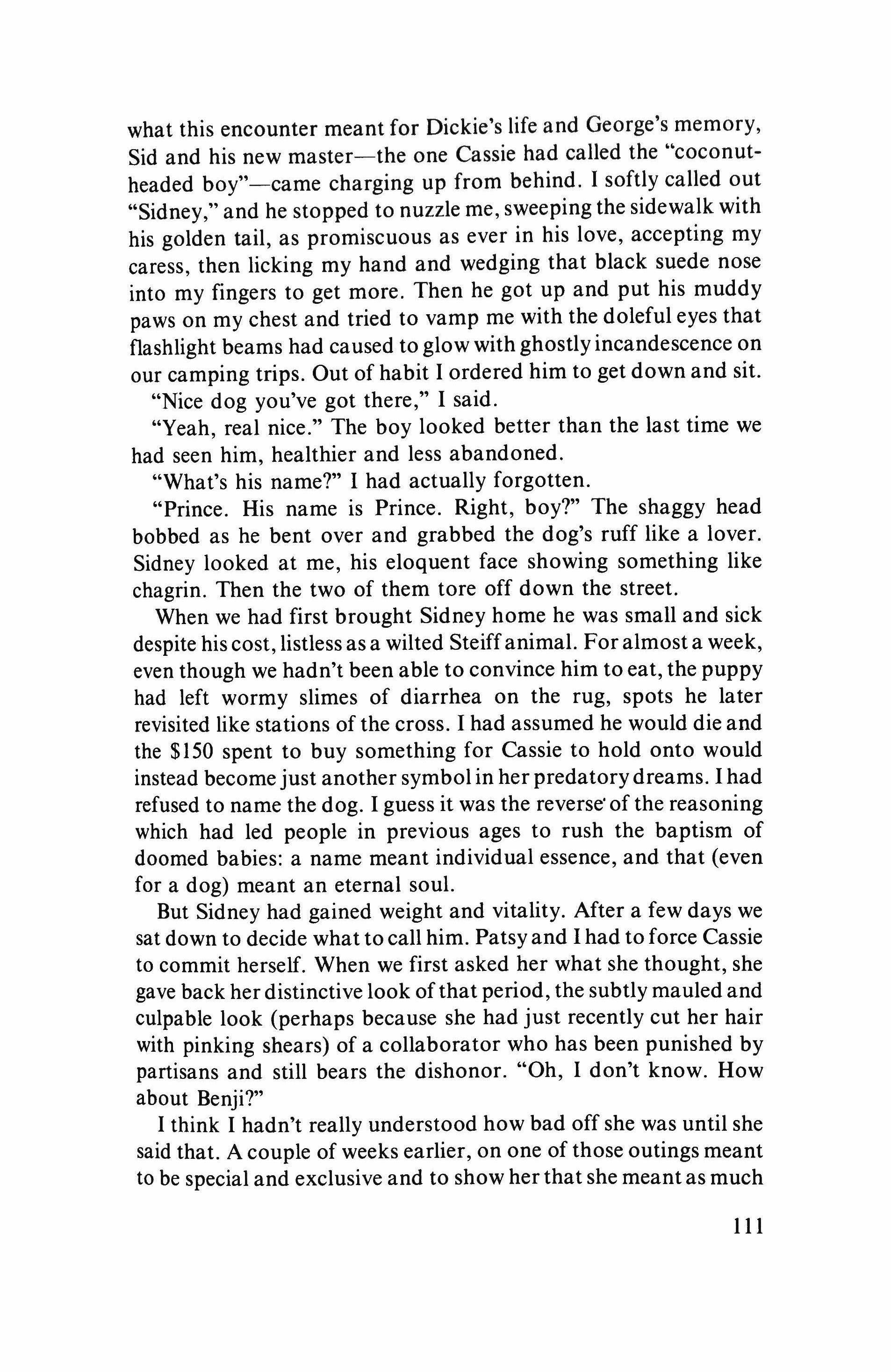
what this encounter meant for Dickie's life and George's memory, Sid and his new master-the one Cassie had called the "coconutheaded boy"-came charging up from behind. I softly called out "Sidney," and he stopped to nuzzle me, sweeping the sidewalk with his golden tail, as promiscuous as ever in his love, accepting my caress, then licking my hand and wedging that black suede nose into my fingers to get more. Then he got up and put his muddy paws on my chest and tried to vamp me with the doleful eyes that flashlight beams had caused to glow with ghostly incandescence on our camping trips. Out of habit I ordered him to get down and sit.
"Nice dog you've got there," I said.
"Yeah, real nice." The boy looked better than the last time we had seen him, healthier and less abandoned.
"What's his name?" I had actually forgotten.
"Prince. His name is Prince. Right, boy?" The shaggy head bobbed as he bent over and grabbed the dog's ruff like a lover. Sidney looked at me, his eloquent face showing something like chagrin. Then the two of them tore off down the street.
When we had first brought Sidney home he was small and sick despite his cost, listless as a wilted Steiff animal. For almost a week, even though we hadn't been able to convince him to eat, the puppy had left wormy slimes of diarrhea on the rug, spots he later revisited like stations of the cross. I had assumed he would die and the $150 spent to buy something for Cassie to hold onto would instead become just another symbol in her predatory dreams. I had refused to name the dog. I guess it was the reverse' of the reasoning which had led people in previous ages to rush the baptism of doomed babies: a name meant individual essence, and that (even for a dog) meant an eternal soul.
But Sidney had gained weight and vitality. After a few days we sat down to decide what to call him. Patsy and I had to force Cassie to commit herself. When we first asked her what she thought, she gave back her distinctive look of that period, the subtly mauled and culpable look (perhaps because she had just recently cut her hair with pinking shears) of a collaborator who has been punished by partisans and still bears the dishonor. "Oh, I don't know. How about Benji?"
I think I hadn't really understood how bad off she was until she said that. A couple of weeks earlier, on one of those outings meant to be special and exclusive and to show her that she meant as much

to me as her brother, she and I had lunched at McDonald's and then gone to see Benji The theater had been packed with kids, but as luck would have it we found ourselves seated directly in front of a crazy woman. She begn to sob loudly the first time the little dog got into trouble. She talked to herself throughout the film, describing the action like a sports announcer doing a bravura playby-play. Once she had screamed out in warning: "No, Benji! No, don't go in there! Watch out! Run for it, Benji!" Everyone else had tittered and then ignored her, but Cassie turned to look and couldn't break her gaze. I saw the woman through her eyes: large yellow teeth, catfishy hairs on the upper lip, saliva at high tide in the corners of her mouth, eyes wickedly lit by the reflection from the screen. I picked Cassie up and carried her out of the theater, realizing that she was seeing in a flash of precognition her own possible future as solitary mad adult. On the way home she cowered near me in the front seat ofthe car and I held her skull with my fingertips.
So when she had perfunctorily offered this name for the puppy, I knew she had sunk to a point where she hardly cared. "This isn't some goddamned mongrel from the pound," I had to force good humor. "This is a purebred golden retriever. You've got to give him a name with class, something for him to live up to. His father's name was Golden Boy of Nottingham. So how about it?"
She had just looked down numbly at the floor where the puppy was chewing her shoelace. "Okay, then," I said. "We'll register him as Sir Philip Sidney of Berkeley and call him Philip. That's dignified." Eventually Cassie made the dog hers by calling him Sidney and then Sid.
When I got home, Patsy was shampooing in the kitchen, the water coiling her hair like black spaghetti on the dishes at the bottom of the sink. I patted her arm and yelled: "It's me. I saw Dickie and Sid." She tried to read my lips with her head upside down under the faucet. "I'm going to work on the taxes." On the way out I stopped to check on Cassie. She was still asleep, her cheeks rouged from the fever, her blonde bangs darkened from pimples of sweat at the hairline. She was breathing deeply, and one tooth lay on the full lower lip like a pearl. For years she had slept with tensed neck and facial muscles, as if undergoing shock therapy. Only recently had she relaxed and traveled backward to
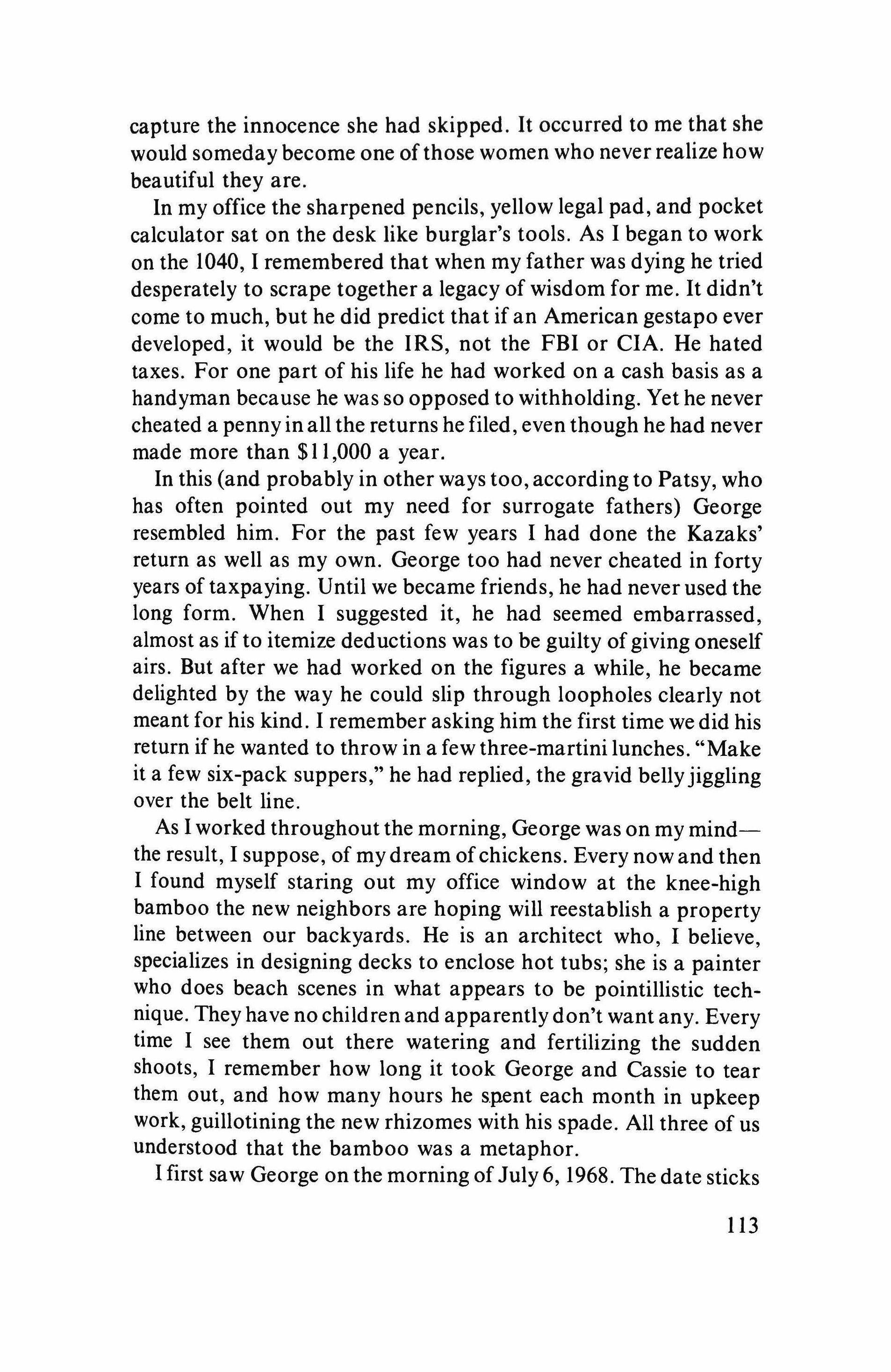
capture the innocence she had skipped. It occurred to me that she would someday become one of those women who never realize how beautiful they are.
In my office the sharpened pencils, yellow legal pad, and pocket calculator sat on the desk like burglar's tools. As I began to work on the 1040, I remembered that when my father was dying he tried desperately to scrape together a legacy of wisdom for me. It didn't come to much, but he did predict that if an American gestapo ever developed, it would be the IRS, not the FBI or CIA. He hated taxes. For one part of his life he had worked on a cash basis as a handyman because he was so opposed to withholding. Yet he never cheated a penny in all the returns he filed, even though he had never made more than $11,000 a year.
In this (and probably in other ways too, according to Patsy, who has often pointed out my need for surrogate fathers) George resembled him. For the past few years I had done the Kazaks' return as well as my own. George too had never cheated in forty years of taxpaying. Until we became friends, he had never used the long form. When I suggested it, he had seemed embarrassed, almost as if to itemize deductions was to be guilty of giving oneself airs. But after we had worked on the figures a while, he became delighted by the way he could slip through loopholes clearly not meant for his kind. I remember asking him the first time we did his return if he wanted to throw in a few three-martini lunches. "Make it a few six-pack suppers," he had replied, the gravid bellyjiggling over the belt line.
As I worked throughout the morning, George was on my mindthe result, I suppose, of my dream of chickens. Every now and then I found myself staring out my office window at the knee-high bamboo the new neighbors are hoping will reestablish a property line between our backyards. He is an architect who, I believe, specializes in designing decks to enclose hot tubs; she is a painter who does beach scenes in what appears to be pointillistic technique. They have no children and apparently don't want any. Every time I see them out there watering and fertilizing the sudden shoots, I remember how long it took George and Cassie to tear them out, and how many hours he spent each month in upkeep work, guillotining the new rhizomes with his spade. All three of us understood that the bamboo was a metaphor.
I first saw George on the morning of July 6, 1968. The date sticks

because we had moved in on July 4, and two days later, early on Sunday morning, the Kazaks showed up. I was working with a sanding machine on the downstairs hardwood floors, hoping to get at least one coat of Varathane applied by nightfall. Patsy had been sitting midway up the staircase nursing Matthew and shelling peas in a yoga of peacefulness. I remember pausing every now and then to look at her, naked from the waist up, lazy and complete in the sunlight slanting through a clerestory window. I heard the knockat the door and tried to ignore it, figuring that whoever it was would hear the sander and think that it had drowned out all other sounds. But then the pounding began again, so loud that it rattled the doorjamb.
"I think it's the Big Bad Wolf and if you don't get it he'll blow the house down," Patsy had called. 1 turned off the machine and walked through the room in a whiteface of sawdust. As 1 opened the door, George and Martine loomed up in front of me like statues, with a large boy standing behind them. It was hot and Martine was already sweating in the tweed coat she would wear all the time 1 knew her, rain or shine, winter or summer, having the large woman's delusion that tenting her figure will make it less conspicuous. 1 remember trying politely to avert my eyes from her bulk but, in looking down, being struck by the way her calves grew thickly into ankles which led to deck shoes that must have been a man's size ten.
George stood impassively beside her, waiting as if he had been summoned, his dress windbreaker zipped halfway up his tie. His character was in the face as hers was in the body. His nose was lumpy and seamed, like a composition of scrap pie dough. Those bleached blue eyes that Dickie inherited looked out from beneath brows where scar tissue swelled like wads of gum. He had just shaved and his skin was taut and shiny from astringent except for the spots of keratosis the razor had nicked and caused to bleed.
"We're the Kazaks. We live next door." He held out a fist whose last two fingers were semi-clawed, the result (I later learned) of an industrial accident for which he had a 10 percent disability. "Kazak," Dickie added from behind, "is the same spelled backward and forward." George glanced up the stairs, saw Patsy's naked breasts, then reddened and looked at his wife as ifto assure her that there had been no prurience. He let my hand go.
"We thought you might like to come to church with us this
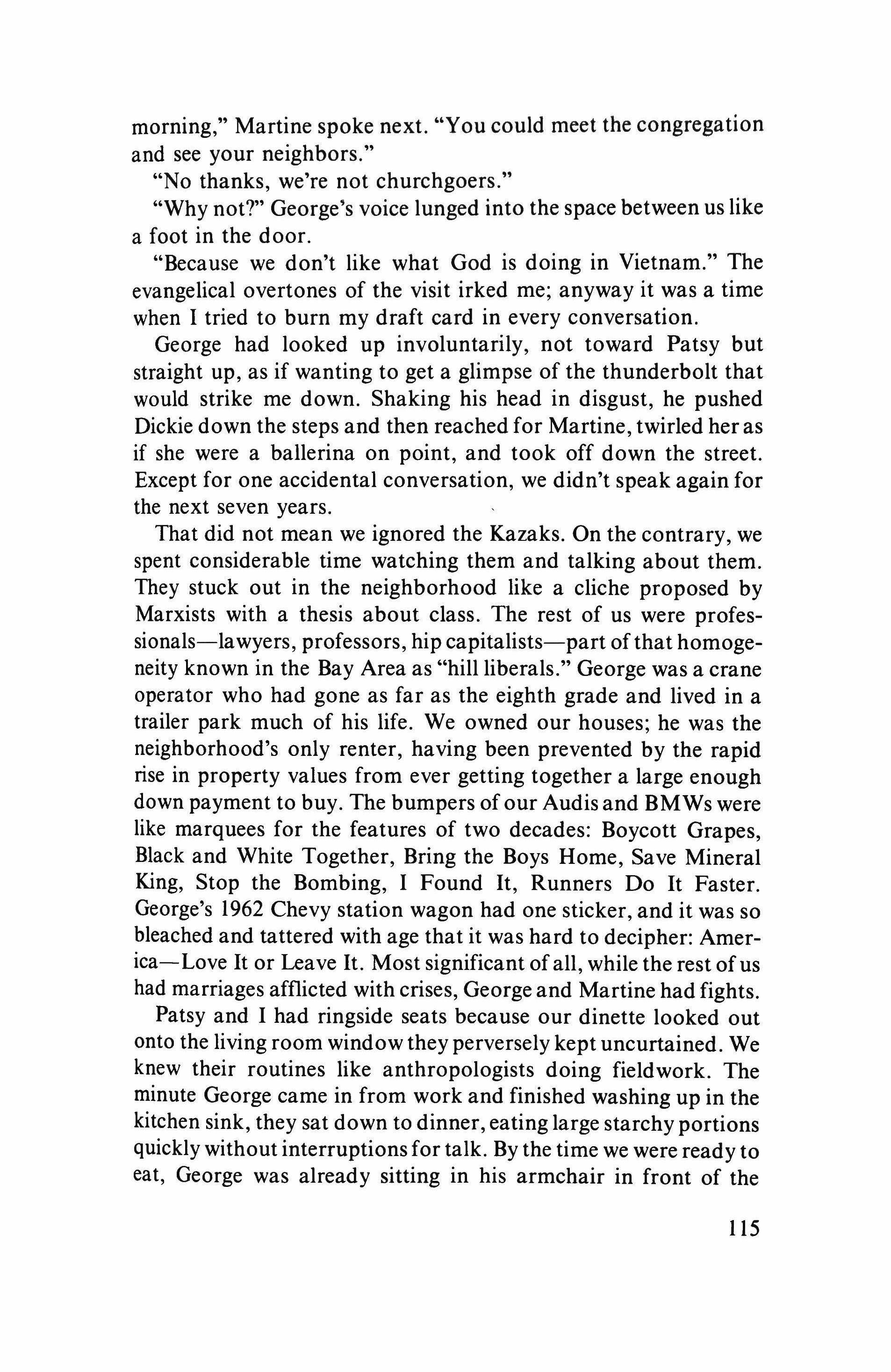
morning," Martine spoke next. "You could meet the congregation and see your neighbors."
"No thanks, we're not churchgoers."
"Why not?" George's voice lunged into the space between us like a foot in the door.
"Because we don't like what God is doing in Vietnam." The evangelical overtones of the visit irked me; anyway it was a time when I tried to burn my draft card in every conversation. George had looked up involuntarily, not toward Patsy but straight up, as if wanting to get a glimpse of the thunderbolt that would strike me down. Shaking his head in disgust, he pushed Dickie down the steps and then reached for Martine, twirled her as if she were a ballerina on point, and took off down the street. Except for one accidental conversation, we didn't speak again for the next seven years.
That did not mean we ignored the Kazaks. On the contrary, we spent considerable time watching them and talking about them. They stuck out in the neighborhood like a cliche proposed by Marxists with a thesis about class. The rest of us were professionals-lawyers, professors, hip capitalists-part of that homogeneity known in the Bay Area as "hill liberals." George was a crane operator who had gone as far as the eighth grade and lived in a trailer park much of his life. We owned our houses; he was the neighborhood's only renter, having been prevented by the rapid rise in property values from ever getting together a large enough down payment to buy. The bumpers of our Audis and BMWs were like marquees for the features of two decades: Boycott Grapes, Black and White Together, Bring the Boys Home, Save Mineral King, Stop the Bombing, I Found It, Runners Do It Faster. George's 1962 Chevy station wagon had one sticker, and it was so bleached and tattered with age that it was hard to decipher: America-Love It or Leave It. Most significant of all, while the rest of us had marriages afflicted with crises, George and Martine had fights.
Patsy and I had ringside seats because our dinette looked out onto the living room window they perversely kept uncurtained. We knew their routines like anthropologists doing fieldwork. The minute George came in from work and finished washing up in the kitchen sink, they sat down to dinner, eating large starchyportions quickly without interruptions for talk. By the time we were ready to eat, George was already sitting in his armchair in front of the
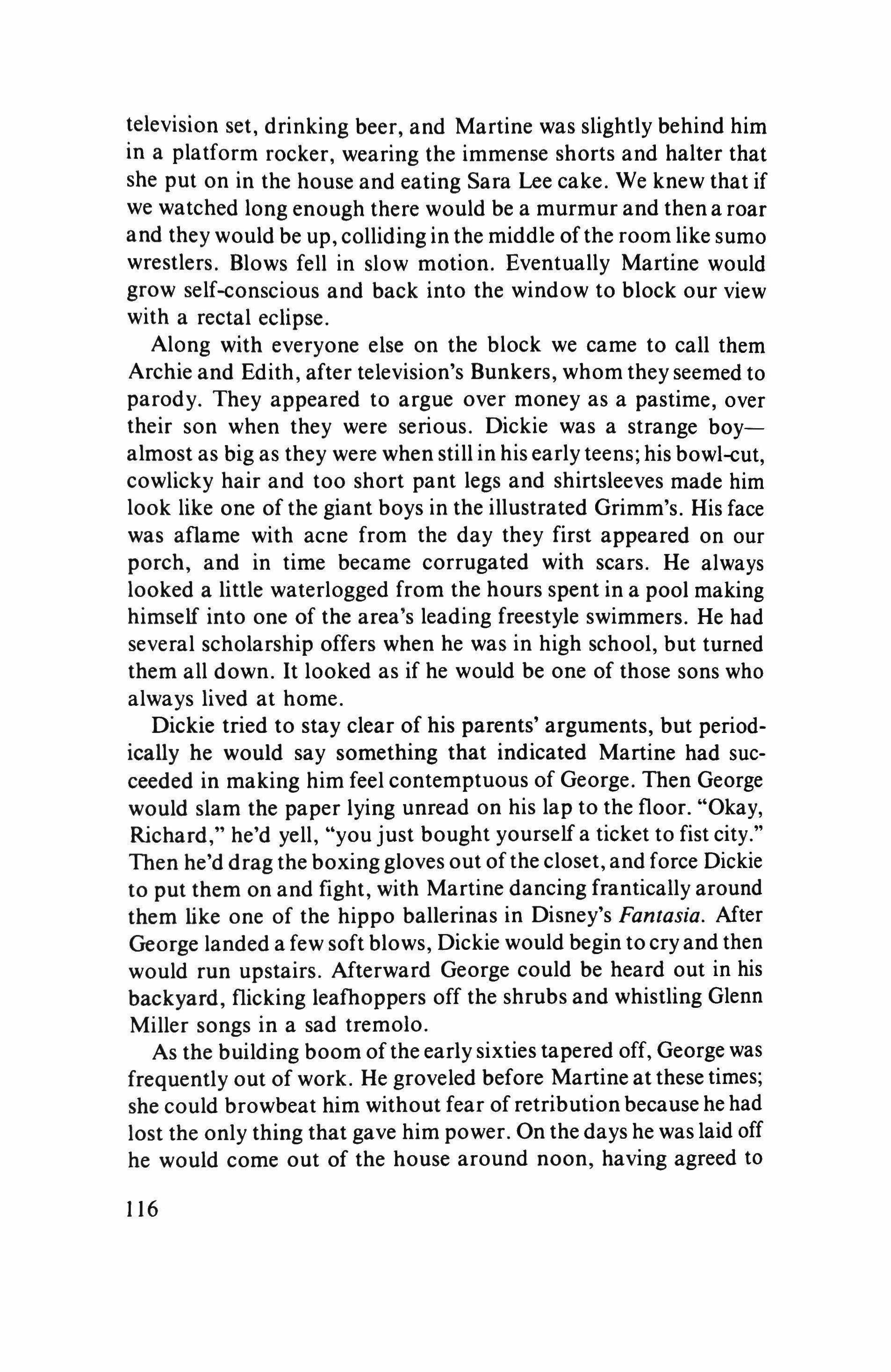
television set, drinking beer, and Martine was slightly behind him in a platform rocker, wearing the immense shorts and halter that she put on in the house and eating Sara Lee cake. We knew that if we watched long enough there would be a murmur and then a roar and they would be up, colliding in the middle ofthe room like sumo wrestlers. Blows fell in slow motion. Eventually Martine would grow self-conscious and back into the window to block our view with a rectal eclipse.
Along with everyone else on the block we came to call them Archie and Edith, after television's Bunkers, whom they seemed to parody. They appeared to argue over money as a pastime, over their son when they were serious. Dickie was a strange boyalmost as big as they were when still in his early teens; his bowl-cut, cowlicky hair and too short pant legs and shirtsleeves made him look like one of the giant boys in the illustrated Grimm's. His face was aflame with acne from the day they first appeared on our porch, and in time became corrugated with scars. He always looked a little waterlogged from the hours spent in a pool making himself into one of the area's leading freestyle swimmers. He had several scholarship offers when he was in high school, but turned them all down. It looked as if he would be one of those sons who always lived at home.
Dickie tried to stay clear of his parents' arguments, but periodically he would say something that indicated Martine had succeeded in making him feel contemptuous of George. Then George would slam the paper lying unread on his lap to the floor. "Okay, Richard," he'd yell, "you just bought yourself a ticket to fist city." Then he'd drag the boxinggloves out of the closet, and force Dickie to put them on and fight, with Martine dancing frantically around them like one of the hippo ballerinas in Disney's Fantasia. After George landed a few soft blows, Dickie would begin to cry and then would run upstairs. Afterward George could be heard out in his backyard, flicking leafhoppers off the shrubs and whistling Glenn Miller songs in a sad tremolo.
As the building boom of the early sixties tapered off, George was frequently out of work. He groveled before Martine at these times; she could browbeat him without fear of retribution because he had lost the only thing that gave him power. On the days he was laid off he would come out of the house around noon, having agreed to
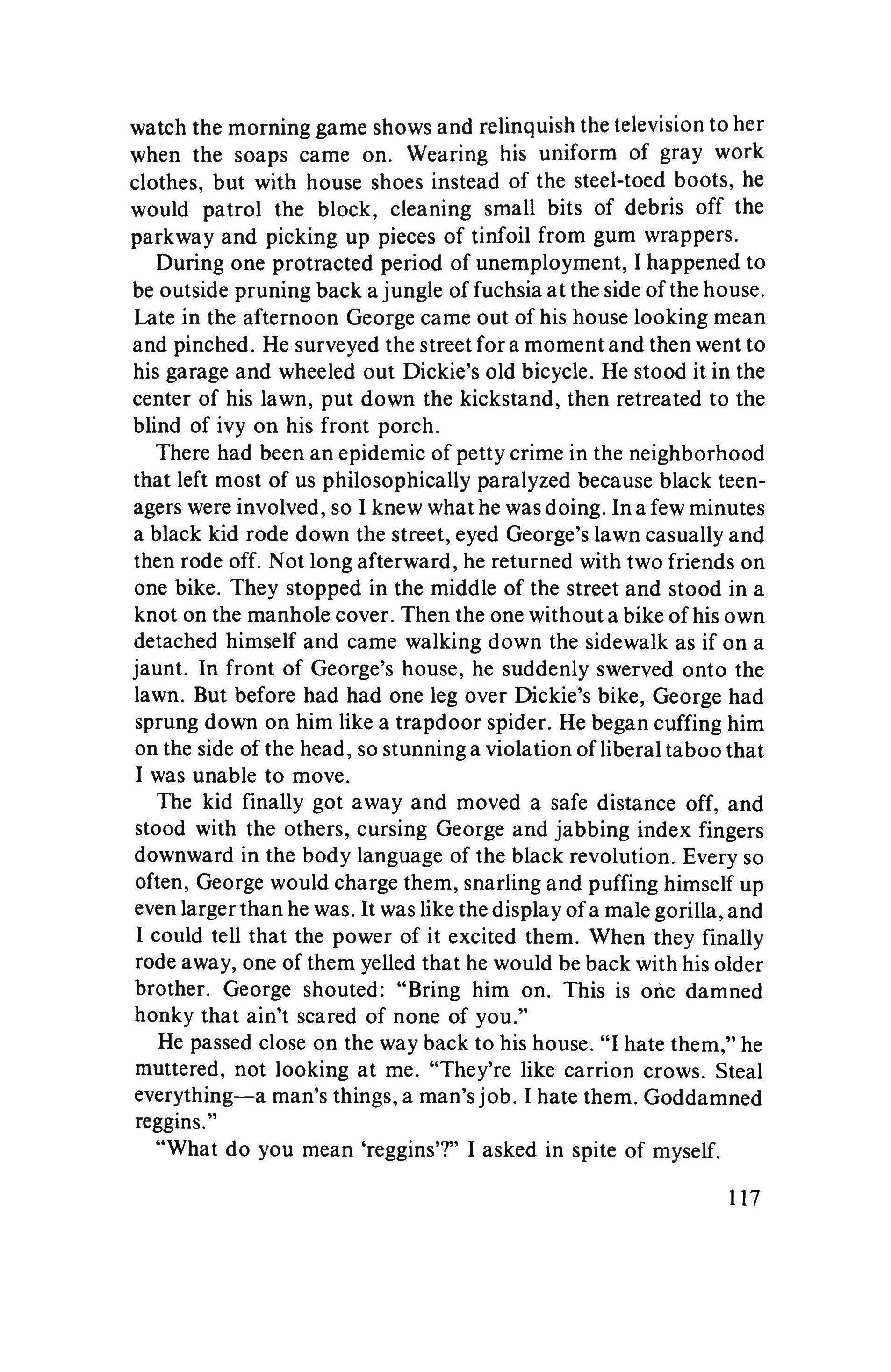
watch the morning game shows and relinquish the television to her when the soaps came on. Wearing his uniform of gray work clothes, but with house shoes instead of the steel-toed boots, he would patrol the block, cleaning small bits of debris off the parkway and picking up pieces of tinfoil from gum wrappers.
During one protracted period of unemployment, I happened to be outside pruning back a jungle of fuchsia at the side ofthe house. Late in the afternoon George came out of his house looking mean and pinched. He surveyed the street for a moment and then went to his garage and wheeled out Dickie's old bicycle. He stood it in the center of his lawn, put down the kickstand, then retreated to the blind of ivy on his front porch.
There had been an epidemic of petty crime in the neighborhood that left most of us philosophically paralyzed because black teenagers were involved, so I knew what he was doing. In a few minutes a black kid rode down the street, eyed George's lawn casually and then rode off. Not long afterward, he returned with two friends on one bike. They stopped in the middle of the street and stood in a knot on the manhole cover. Then the one without a bike ofhis own detached himself and came walking down the sidewalk as if on a jaunt. In front of George's house, he suddenly swerved onto the lawn. But before had had one leg over Dickie's bike, George had sprung down on him like a trapdoor spider. He began cuffing him on the side of the head, so stunning a violation ofliberal taboo that I was unable to move.
The kid finally got away and moved a safe distance off, and stood with the others, cursing George and jabbing index fingers downward in the body language of the black revolution. Every so often, George would charge them, snarling and puffing himself up even larger than he was. It was like the display of a male gorilla, and I could tell that the power of it excited them. When they finally rode away, one of them yelled that he would be back with his older brother. George shouted: "Bring him on. This is one damned honky that ain't scared of none of you."
He passed close on the way back to his house. "I hate them," he muttered, not looking at me. "They're like carrion crows. Steal everything-a man's things, a man's job. I hate them. Goddamned reggins."
"What do you mean 'reggins'?" I asked in spite of myself.

"Nigger spelled backward," George answered as he went up the steps of his porch. "We live in a time when you don't dare call a spade a spade."
A little after noon, when I had gotten through the medical expenses, Cassie came out beneath an immense umbrella to rap on my window. I made a face at her and she answered by putting index fingers just under her eyes and inserting thumbs at the corners of her mouth, then pinching the skin together. We both knew that there was a disingenuousness in this, the gesture not coming spontaneously from two real people, Adam and Cassie, but from our respective ideas of a father and daughter and the way they should relate. We have always had problems figuring out how fathers and daughters were supposed to act around each other.
"Mom wants to know do you want to eat?" she came into my room and stood beside me, the pigment of her eyes ripened by fever.
"No, not now. Doing taxes makes me sick to my stomach." 1 pounded the 1040 as if it were a bug.
"I was sick at my stomach last night."
"I know. Do you still have a temperature?"
"Mom says it's gone now." While she spoke, her eyes were on the memorabilia strewn over the mantle of my rolltop; 1 could tell the sensations were being stored in ventricles of memory which might open forty or fifty years from now on a rainy day such as this.
"Think you'll be able to go to school tomorrow?"
"Maybe. I threw up, you know. I had little pieces of it like cottage cheese in my nose when 1 woke up this morning." She put down the baseball signed by Bob Feller and picked up the crystal ball wherein the RCA terrier had sat for more than forty years. She shook it and watched the snow fall on the cocked head.
"You like my dog?" I rubbed her back.
"Yeah. Gramma give him to you?"
"Right, when 1 was about your age. I've had him all this time."
"Oh." She watched the last snowflakes swirl down through the viscosity to the dog's feet.
"I saw Sidney today."
"Where?" Her body tensed, and I was sorry 1 had let the information slip.
"Walking down the street."
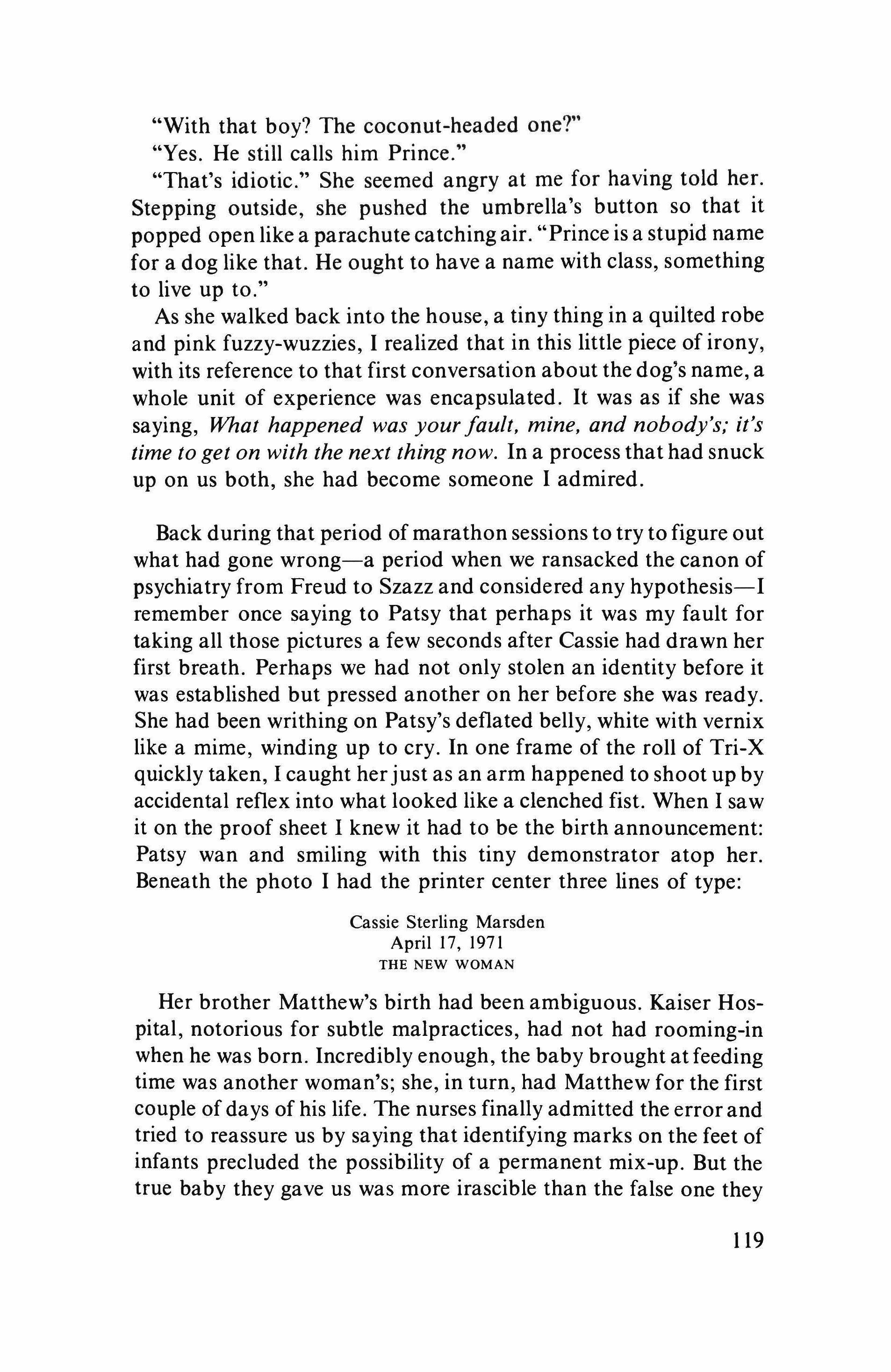
"With that boy? The coconut-headed one?"
"Yes. He still calls him Prince."
"That's idiotic." She seemed angry at me for having told her. Stepping outside, she pushed the umbrella's button so that it popped open like a parachutecatching air. "Prince is a stupid name for a dog like that. He ought to have a name with class, something to live up to."
As she walked back into the house, a tiny thing in a quilted robe and pink fuzzy-wuzzies, I realized that in this little piece of irony, with its reference to that first conversation about the dog's name, a whole unit of experience was encapsulated. It was as if she was saying, What happened was your fault, mine, and nobody's; it's time to get on with the next thing now. In a process that had snuck up on us both, she had become someone I admired.
Back during that period of marathon sessions to try to figure out what had gone wrong-a period when we ransacked the canon of psychiatry from Freud to Szazz and considered any hypothesis-I remember once saying to Patsy that perhaps it was my fault for taking all those pictures a few seconds after Cassie had drawn her first breath. Perhaps we had not only stolen an identity before it was established but pressed another on her before she was ready. She had been writhing on Patsy's deflated belly, white with vernix like a mime, winding up to cry. In one frame of the roll of Tri-X quickly taken, I caught herjust as an arm happened to shoot up by accidental reflex into what looked like a clenched fist. When I saw it on the proof sheet I knew it had to be the birth announcement: Patsy wan and smiling with this tiny demonstrator atop her. Beneath the photo I had the printer center three lines of type:
Cassie Sterling Marsden April 17, 1971
THE NEW WOMAN
Her brother Matthew's birth had been ambiguous. Kaiser Hospital, notorious for subtle malpractices, had not had rooming-in when he was born. Incredibly enough, the baby brought at feeding time was another woman's; she, in turn, had Matthew for the first couple of days of his life. The nurses finally admitted the error and tried to reassure us by saying that identifying marks on the feet of infants precluded the possibility of a permanent mix-up. But the true baby they gave us was more irascible than the false one they
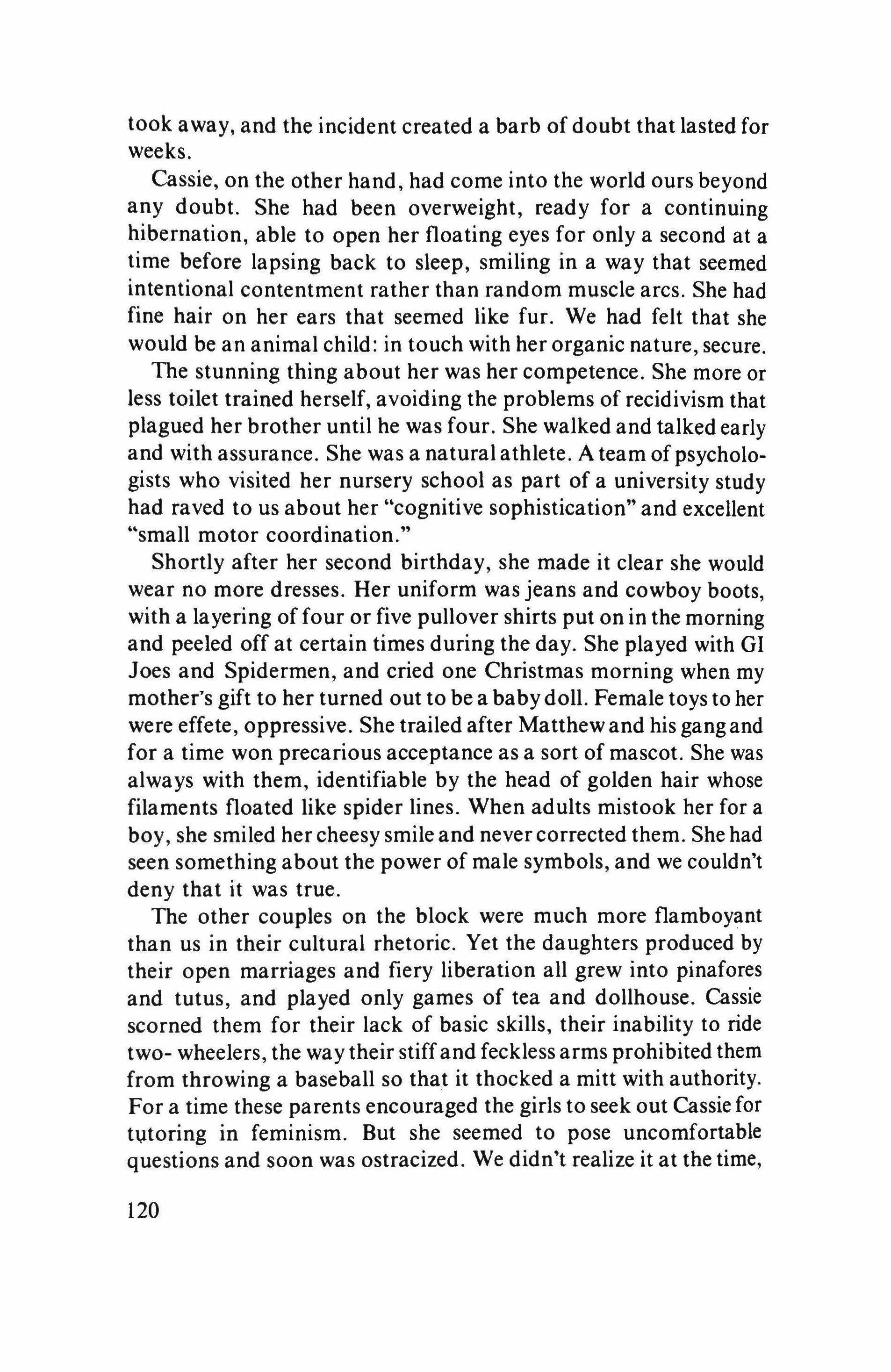
took away, and the incident created a barb of doubt that lasted for weeks.
Cassie, on the other hand, had come into the world ours beyond any doubt. She had been overweight, ready for a continuing hibernation, able to open her floating eyes for only a second at a time before lapsing back to sleep, smiling in a way that seemed intentional contentment rather than random muscle arcs. She had fine hair on her ears that seemed like fur. We had felt that she would be an animal child: in touch with her organic nature, secure.
The stunning thing about her was her competence. She more or less toilet trained herself, avoiding the problems of recidivism that plagued her brother until he was four. She walked and talked early and with assurance. She was a natural athlete. A team of psychologists who visited her nursery school as part of a university study had raved to us about her "cognitive sophistication" and excellent "small motor coordination."
Shortly after her second birthday, she made it clear she would wear no more dresses. Her uniform was jeans and cowboy boots, with a layering of four or five pullover shirts put on in the morning and peeled off at certain times during the day. She played with GI Joes and Spidermen, and cried one Christmas morning when my mother's gift to her turned out to be a baby doll. Female toys to her were effete, oppressive. She trailed after Matthew and his gang and for a time won precarious acceptance as a sort of mascot. She was always with them, identifiable by the head of golden hair whose filaments floated like spider lines. When adults mistook her for a boy, she smiled her cheesy smile and never corrected them. She had seen something about the power of male symbols, and we couldn't deny that it was true.
The other couples on the block were much more flamboyant than us in their cultural rhetoric. Yet the daughters produced by their open marriages and fiery liberation all grew into pinafores and tutus, and played only games of tea and dollhouse. Cassie scorned them for their lack of basic skills, their inability to ride two- wheelers, the way their stiffand feckless arms prohibited them from throwing a baseball so that it thocked a mitt with authority. For a time these parents encouraged the girls to seek out Cassie for tutoring in feminism. But she seemed to pose uncomfortable questions and soon was ostracized. We didn't realize it at the time,
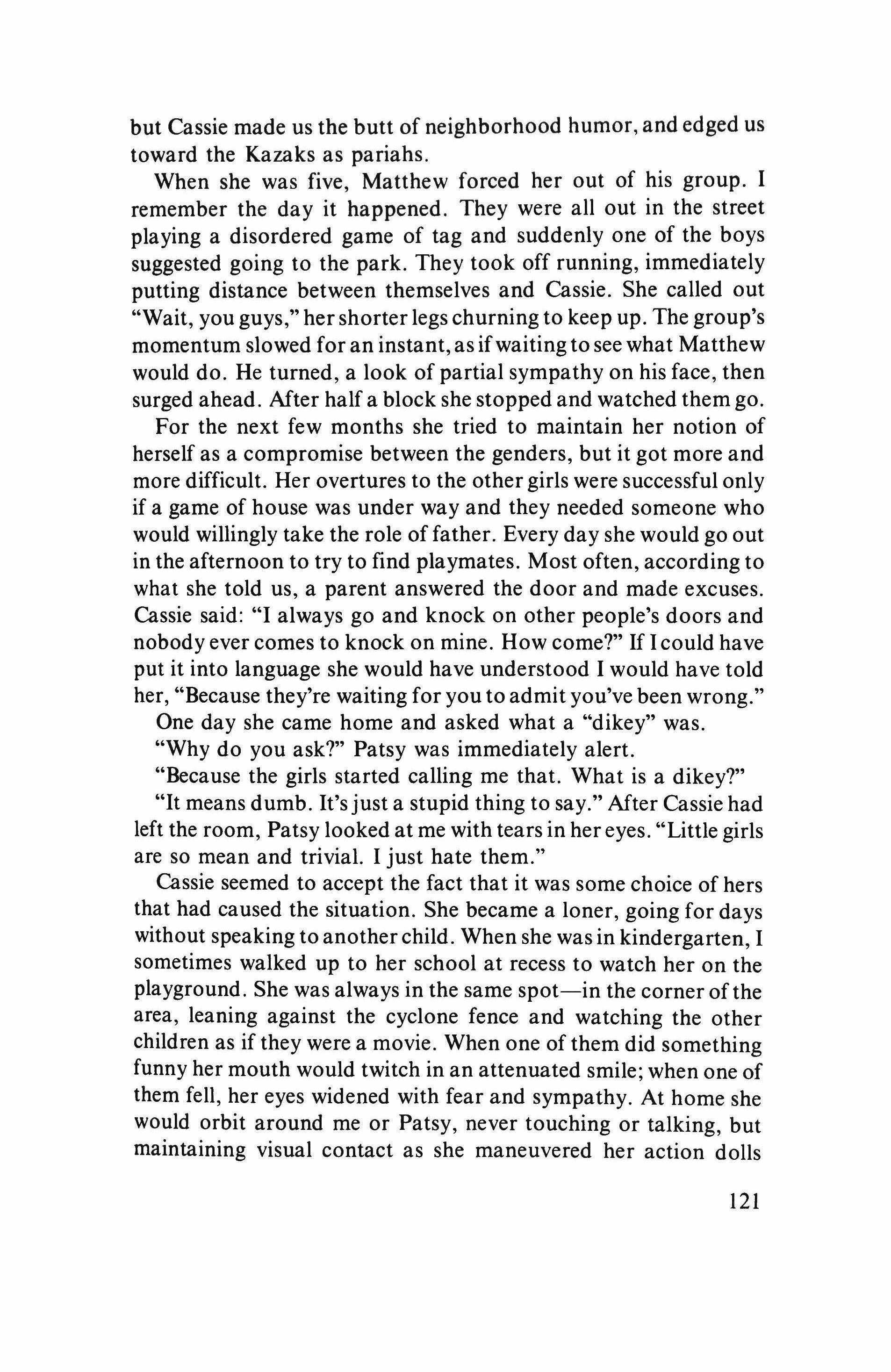
but Cassie made us the butt of neighborhood humor, and edged us toward the Kazaks as pariahs.
When she was five, Matthew forced her out of his group. 1 remember the day it happened. They were all out in the street playing a disordered game of tag and suddenly one of the boys suggested going to the park. They took off running, immediately putting distance between themselves and Cassie. She called out "Wait, you guys," her shorter legs churning to keep up. The group's momentum slowed for an instant, as ifwaiting to see what Matthew would do. He turned, a look of partial sympathy on his face, then surged ahead. After half a block she stopped and watched them go.
For the next few months she tried to maintain her notion of herself as a compromise between the genders, but it got more and more difficult. Her overtures to the other girls were successful only if a game of house was under way and they needed someone who would willingly take the role of father. Every day she would go out in the afternoon to try to find playmates. Most often, according to what she told us, a parent answered the door and made excuses. Cassie said: "I always go and knock on other people's doors and nobody ever comes to knock on mine. How come?" If I could have put it into language she would have understood I would have told her, "Because they're waiting for you to admit you've been wrong."
One day she came home and asked what a "dikey" was.
"Why do you ask?" Patsy was immediately alert.
"Because the girls started calling me that. What is a dikey?"
"It means dumb. It's just a stupid thing to say." After Cassie had left the room, Patsy looked at me with tears in her eyes. "Little girls are so mean and trivial. I just hate them."
Cassie seemed to accept the fact that it was some choice of hers that had caused the situation. She became a loner, going for days without speaking to another child. When she was in kindergarten, I sometimes walked up to her school at recess to watch her on the playground. She was always in the same spot-in the corner of the area, leaning against the cyclone fence and watching the other children as if they were a movie. When one of them did something funny her mouth would twitch in an attenuated smile; when one of them fell, her eyes widened with fear and sympathy. At home she would orbit around me or Patsy, never touching or talking, but maintaining visual contact as she maneuvered her action dolls

amidst whispered dialogue or occasionally crayoned on butcher paper. In her pictures of the family, Patsy and I were tall with prominent secondary sex characteristics; Matthew was beautifully symmetrical; she drew herself as a puddle of small lines.
When one of the girls in the neighborhood was picked up and molested by a man in a car, Patsy took Cassie aside to tell her not to accept favors from strangers. We expected that it would be traumatic, a fall from the innocent belief that all people were good.
"Why shouldn't IT' she had asked.
"Because there are people who are sick and like to hurtchildren."
"You mean they like to hurt girls." She always saw through neutered language.
"That's right," Patsy admitted, "girls especially."
Cassie got a bitter smile on her face and said, "Serves them right."
Her sleep became disorganized. She suddenly refused to ride her bike or skate or do the other things that had distinguished her. It was as if she saw these competencies as having led her astray, made her hope for the impossible, put her into an imaginary category, a niche she now couldn't escape. She made herself klutzy, and became illogically fearful of acts of God. When we drove across the Bay Bridge she held onto the armrest with whitened knuckles and closed her eyes because she had heard that when an earthquake struck it would crumple the girders and plummet cars down to the water below. When we fantasized about going to Hawaii, she said she would stay home with my mother because of pictures she had seen in the National Geographic showing rivers of red lava spit out by Mauna Kea.
On the first day of the first grade she cried all the way to school. When I asked her what was wrong, she said, "What if the teacher only speaks Chinese? How will she understand me?" She contracted a sudden dyslexia and began scrambling words and writing numbers backward. The school psychologist assured us that this was not unusual in children her age, but we knew it was willful and saw the subliminal yearning in it: to look in the mirror of herself and see a reversed image. The only book she would let us read during this time was Alice in Wonderland-an encyclopedia of scrambled images, distorted perspectives, confusions of identity.
My mother wanted to try her own folk therapy. In her middle sixties, she was a woman who had been attractive all her life. She
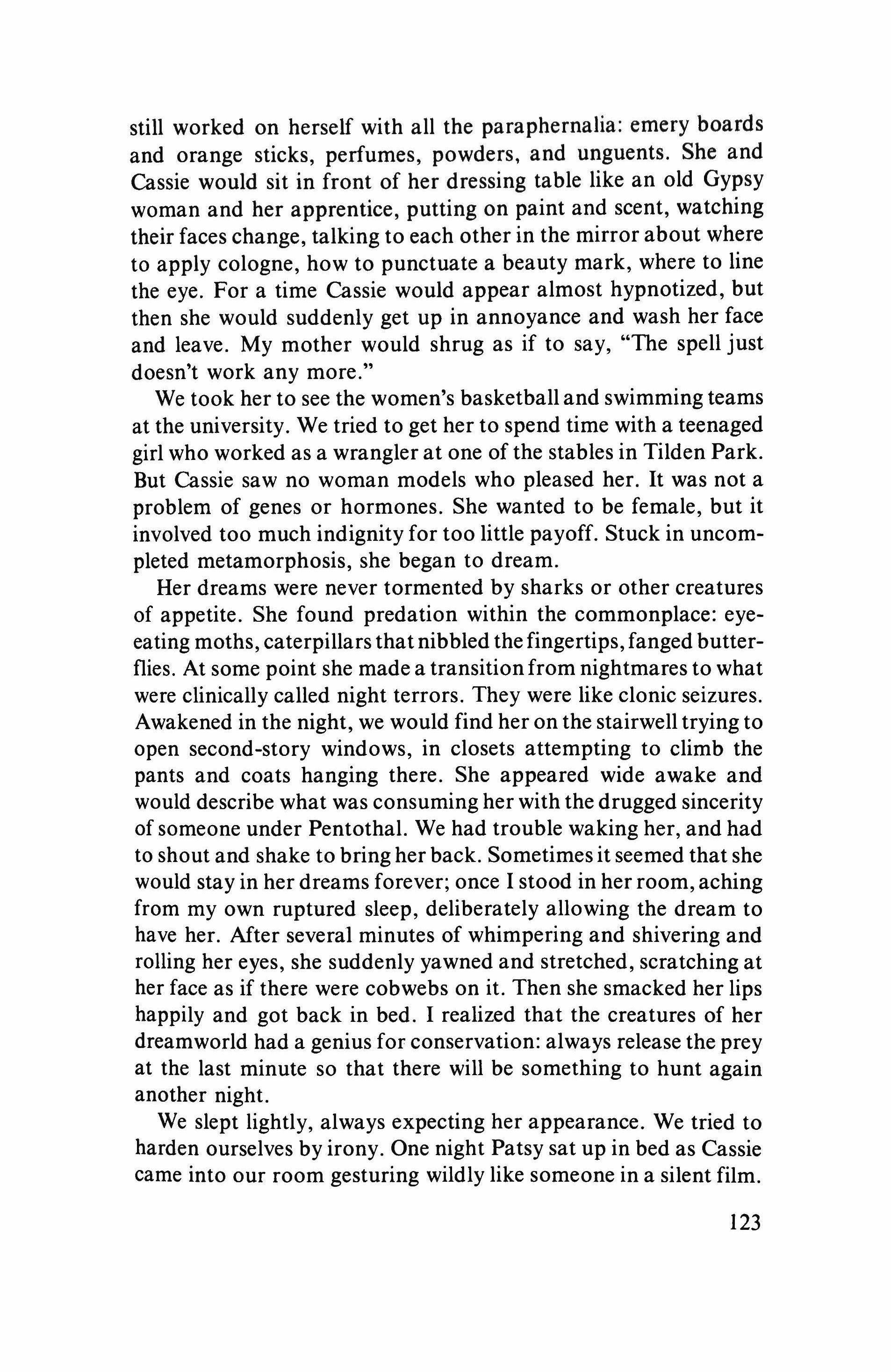
still worked on herself with all the paraphernalia: emery boards and orange sticks, perfumes, powders, and unguents. She and Cassie would sit in front of her dressing table like an old Gypsy woman and her apprentice, putting on paint and scent, watching their faces change, talking to each other in the mirror about where to apply cologne, how to punctuate a beauty mark, where to line the eye. For a time Cassie would appear almost hypnotized, but then she would suddenly get up in annoyance and wash her face and leave. My mother would shrug as if to say, "The spell just doesn't work any more."
We took her to see the women's basketball and swimming teams at the university. We tried to get her to spend time with a teenaged girl who worked as a wrangler at one of the stables in Tilden Park. But Cassie saw no woman models who pleased her. It was not a problem of genes or hormones. She wanted to be female, but it involved too much indignity for too little payoff. Stuck in uncompleted metamorphosis, she began to dream.
Her dreams were never tormented by sharks or other creatures of appetite. She found predation within the commonplace: eyeeating moths, caterpillars that nibbled the fingertips, fanged butterflies. At some point she made a transition from nightmares to what were clinically called night terrors. They were like clonic seizures. Awakened in the night, we would find her on the stairwell trying to open second-story windows, in closets attempting to climb the pants and coats hanging there. She appeared wide awake and would describe what was consuming her with the drugged sincerity of someone under Pentothal. We had trouble waking her, and had to shout and shake to bring her back. Sometimes it seemed that she would stay in her dreams forever; once I stood in her room, aching from my own ruptured sleep, deliberately allowing the dream to have her. After several minutes of whimpering and shivering and rolling her eyes, she suddenly yawned and stretched, scratching at her face as if there were cobwebs on it. Then she smacked her lips happily and got back in bed. I realized that the creatures of her dreamworld had a genius for conservation: always release the prey at the last minute so that there will be something to hunt again another night.
We slept lightly, always expecting her appearance. We tried to harden ourselves by irony. One night Patsy sat up in bed as Cassie came into our room gesturing wildly like someone in a silent film.

"I think our daughter's crazy," she broke out laughing. "We could have her lobotomized when she has her tonsils out, then grow her bangs long to cover the scar." Then she began to cry. "Jesus, Adam, I find myself wishing every day she could have some kind of transplant or sex clarification, something that would allow her to appear in a velvet jumper and black Mary Janes. Can you believe it? I'm willing to sell her out here and now. I'm willing for her to become as dippy as all the rest of them."
On some mornings she would come in and ask us if she had dreamed. When we told her she hadn't she would break out smiling. At times she had that peculiar valor seen in the retarded and in some people anxious to bear up well during terminal illness.
We took her to see a neurologist, praying that her ailment was physical, something that could be clinically diagnosed, seen on graph paper, treated with drugs, even behaviorally modifiedanything that would take the onus off us for having said and done too much or too little. But after exhaustive tests, the doctor had shrugged. "I can't see anything physiological. I think perhaps she feels she is dead or dying during these dreams, and you might try getting her to drink water so that she'd have to swallow and get it down her throat. Maybe this would remind her that she's still got a body. Otherwise, 1 can only suggest something that doesn't sound very high-powered. She appears very lonely. How about getting her a pet to keep her company?"
So we pumped her full of water every night, making her swallow and gag and then give an angry cry like a baby drawing breath through damp lungs. And we got the purebred golden retriever, Philip Sidney.
I was optimistic about training the dog, and felt in an odd way that he offered an opportunity for me to vindicate the parental abilities Cassie had called into question. He had a good character, and was gentle and loving like most of his breed. But beneath that desperation to please, there was a real stubbornness that infuriated me. I had trouble house-breaking him. He obsessively fetched old dishrags, stuffed toys, and dirty clothes, which he would hand to perfect strangers as if it was game for the table. He always sought the middle of human transactions-licking, jumping, and making a fool of himself by his consuming desire to be liked. Most seriously, after he was a few months old, he began running away and not returning until his semen was purged or he was ravenous

from hunger, a process that sometimes took a couple of days. Fearing that he would be hit by a car, I plugged holes, elevated fences, and chinked crawl spaces. He still managed to get away. I spent nights in the car like a cop on stakeout, waiting for him to come into the streetlight on his way from one lawn to the next. When I caught him he cringed as if to acknowledge guilt. It was his own admission of sinfulness that made me abandon Skinner for Calvin. I beat the dog, telling myself I was saving his life.
When he was home, however, Sidney was a perfect companion for Cassie. A sort of canine gigolo, he helped express some of her female instincts. The two of them would lie together side by side on the rug for long periods of time, Sidney with his paw on her shoulder, Cassie clasping the mane around his neck and speaking to what he represented in low coital whispers. Sometimes he would mount her and pump furiously, or walk up and thrust his nose into her crotch to get attention. When he cleaned his genitals with a lascivious ribbon of tongue, Cassie's gaze was so transfixed that Patsy once predicted in gallows humor that even if she managed to 'work out her problems, she would always have an impossible yearning for a man with a penis like a tube of lipstick sheathed in golden fur. When Cassie started out of bed at night, Sidney was always right beside her, subtly directing her steps away from obstacles like a seeing-eye dog, growling softly at the predatory insects that caused her pain.
Late in the fall of her disastrous first-grade year, I was outside working to square this little office out of a back corner of the garage, primarily because I wanted someplace to go where I didn't have to face her during the long solitary afternoons. It had been a struggle to get the studs plumbed correctly; it was almost impossible for me to maneuver the sheets of Drywall into place. I knew I was making a hash of it when Cassie came over from where she was playing, holding Sidney by the collar. She was hopping solemnly from one foot to another as she had when she was younger and constantly fighting her bladder because of the indignity of having to go into the house and urinate sitting down.
"Dad, you ought to come quick."
"Come where?"
"Over here." She pointed toward the bamboo. "I think Archie is dead."
"Archie?" It hadn't registered for a moment.
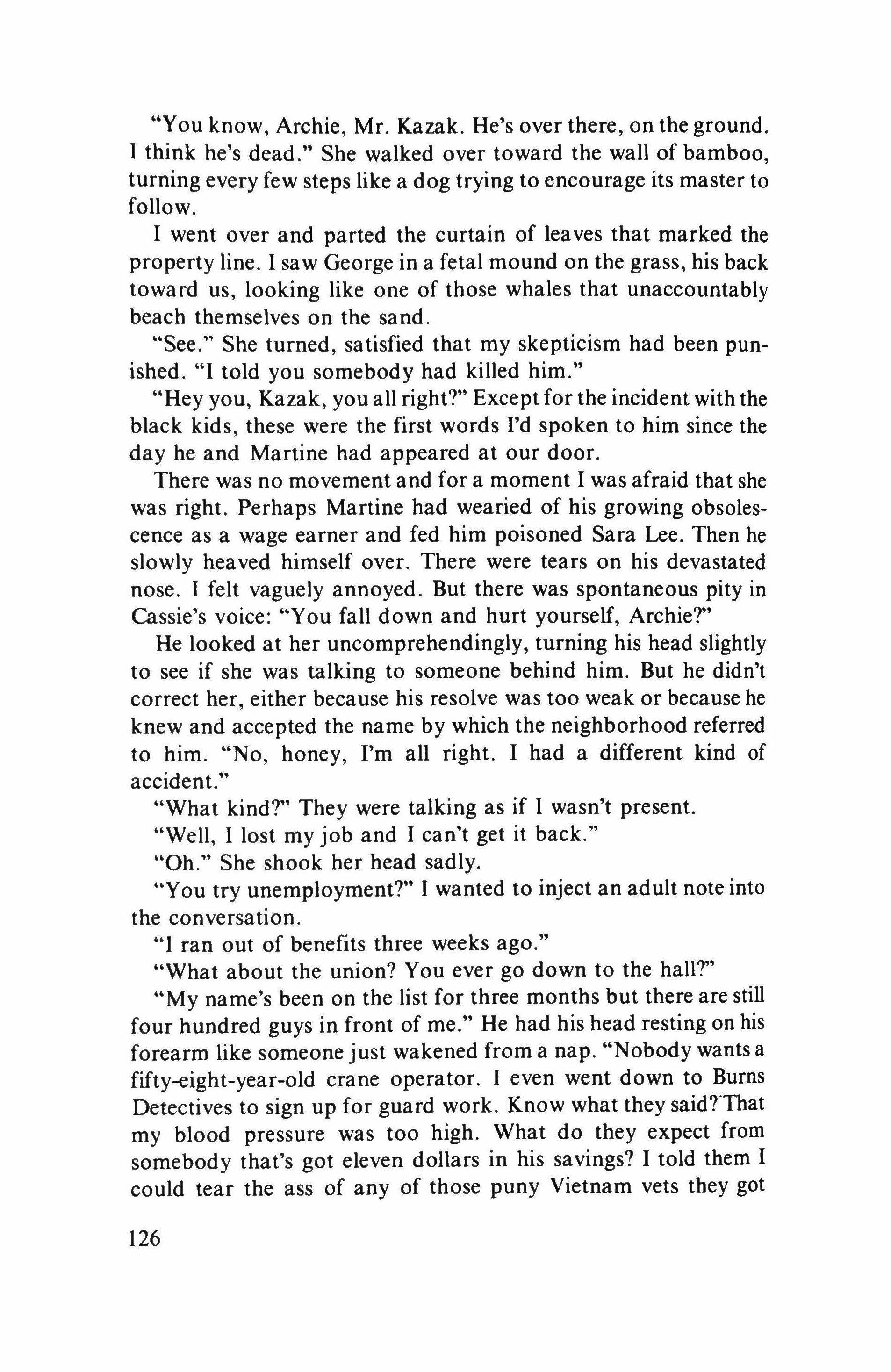
"You know, Archie, Mr. Kazak. He's over there, on the ground. I think he's dead." She walked over toward the wall of bamboo, turning every few steps like a dog trying to encourage its master to follow.
I went over and parted the curtain of leaves that marked the property line. I saw George in a fetal mound on the grass, his back toward us, looking like one of those whales that unaccountably beach themselves on the sand.
"See." She turned, satisfied that my skepticism had been punished. "I told you somebody had killed him."
"Hey you, Kazak, you all right?" Except for the incident with the black kids, these were the first words I'd spoken to him since the day he and Martine had appeared at our door.
There was no movement and for a moment I was afraid that she was right. Perhaps Martine had wearied of his growing obsolescence as a wage earner and fed him poisoned Sara Lee. Then he slowly heaved himself over. There were tears on his devastated nose. I felt vaguely annoyed. But there was spontaneous pity in Cassie's voice: "You fall down and hurt yourself, Archie?"
He looked at her uncomprehendingly, turning his head slightly to see if she was talking to someone behind him. But he didn't correct her, either because his resolve was too weak or because he knew and accepted the name by which the neighborhood referred to him. "No, honey, I'm all right. I had a different kind of accident."
"What kind?" They were talking as if I wasn't present.
"Well, I lost my job and I can't get it back."
"Oh." She shook her head sadly.
"You try unemployment?" I wanted to inject an adult note into the conversation.
"I ran out of benefits three weeks ago."
"What about the union? You ever go down to the hall?"
"My name's been on the list for three months but there are still four hundred guys in front of me." He had his head resting on his forearm like someone just wakened from a nap. "Nobody wants a fifty-eight-year-old crane operator. I even went down to Burns Detectives to sign up for guard work. Know what they saidjThat my blood pressure was too high. What do they expect from somebody that's got eleven dollars in his savings? I told them I could tear the ass of any of those puny Vietnam vets they got
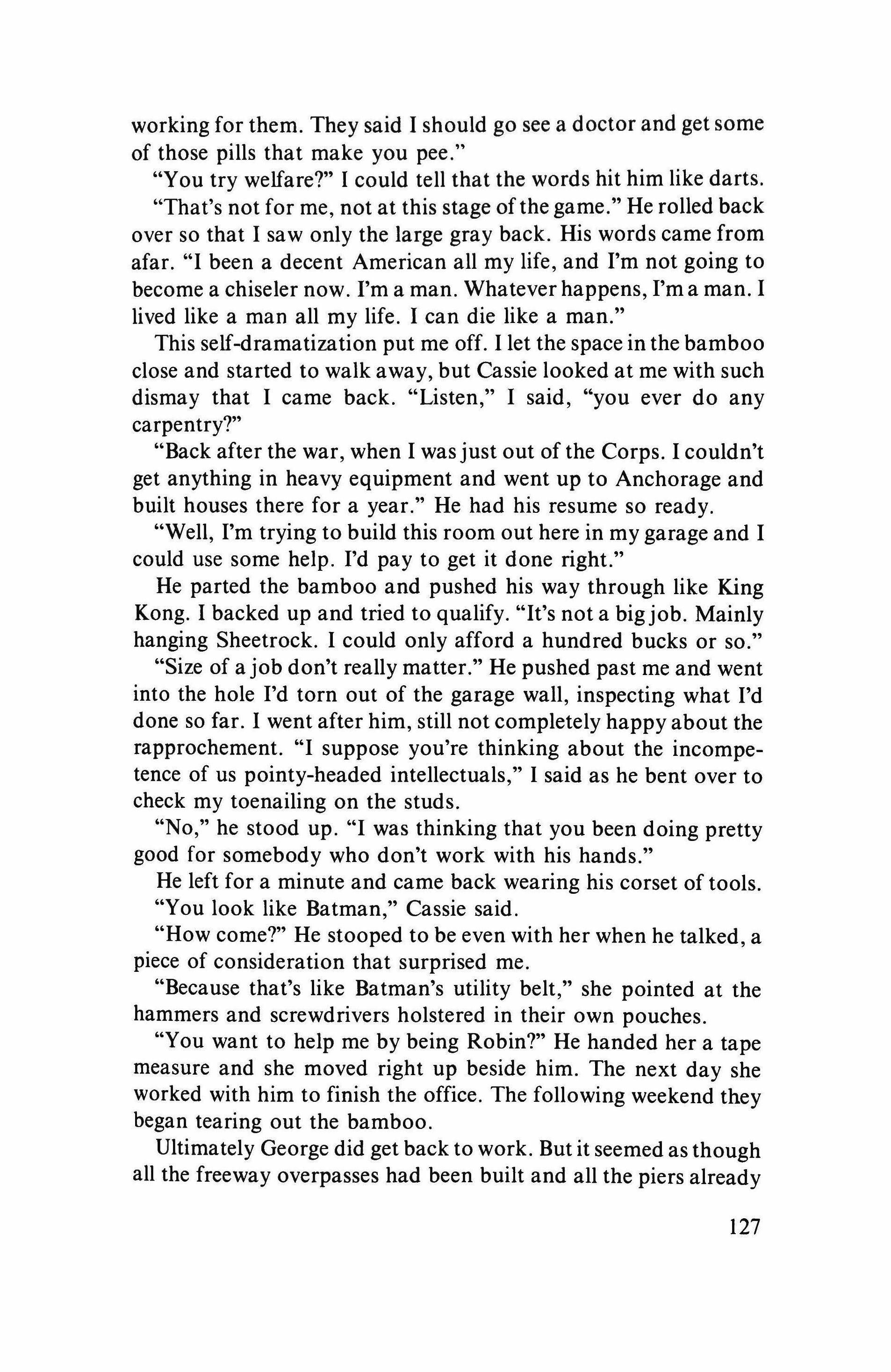
working for them. They said 1 should go see a doctor and get some of those pills that make you pee."
"You try welfare?" I could tell that the words hit him like darts.
"That's not for me, not at this stage ofthe game." He rolled back over so that 1 saw only the large gray back. His words came from afar. "I been a decent American all my life, and I'm not going to become a chiseler now. I'm a man. Whatever happens, I'm a man. 1 lived like a man all my life. 1 can die like a man."
This self-dramatization put me off. 1 let the space in the bamboo close and started to walk away, but Cassie looked at me with such dismay that 1 came back. "Listen," 1 said, "you ever do any carpentry?"
"Back after the war, when 1 was just out of the Corps. 1 couldn't get anything in heavy equipment and went up to Anchorage and built houses there for a year." He had his resume so ready.
"Well, I'm trying to build this room out here in my garage and 1 could use some help. I'd pay to get it done right."
He parted the bamboo and pushed his way through like King Kong. 1 backed up and tried to qualify. "It's not a bigjob. Mainly hanging Sheetrock. 1 could only afford a hundred bucks or so."
"Size of a job don't really matter." He pushed past me and went into the hole I'd torn out of the garage wall, inspecting what I'd done so far. I went after him, still not completely happy about the rapprochement. "I suppose you're thinking about the incompetence of us pointy-headed intellectuals," I said as he bent over to check my toenailing on the studs.
"No," he stood up. "I was thinking that you been doing pretty good for somebody who don't work with his hands."
He left for a minute and came back wearing his corset of tools.
"You look like Batman," Cassie said.
"How come?" He stooped to be even with her when he talked, a piece of consideration that surprised me.
"Because that's like Batman's utility belt," she pointed at the hammers and screwdrivers holstered in their own pouches.
"You want to help me by being Robin?" He handed her a tape measure and she moved right up beside him. The next day she worked with him to finish the office. The following weekend they began tearing out the bamboo.
Ultimately George did get back to work. But it seemed as though all the freeway overpasses had been built and all the piers already
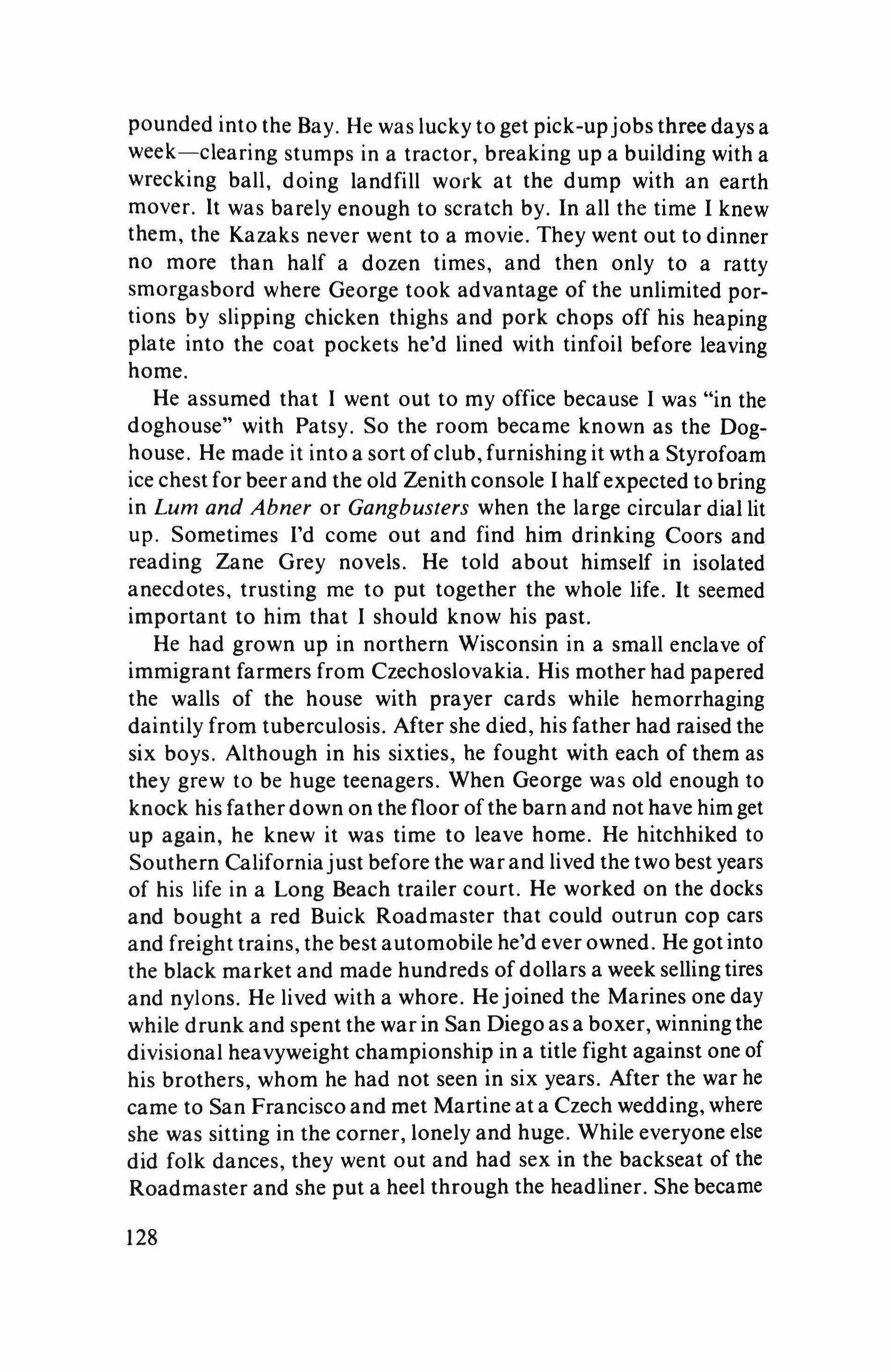
pounded into the Bay. He was lucky to get pick-upjobs three days a week-clearing stumps in a tractor, breaking up a building with a wrecking ball, doing landfill work at the dump with an earth mover. It was barely enough to scratch by. In all the time I knew them, the Kazaks never went to a movie. They went out to dinner no more than half a dozen times, and then only to a ratty smorgasbord where George took advantage of the unlimited portions by slipping chicken thighs and pork chops off his heaping plate into the coat pockets he'd lined with tinfoil before leaving home.
He assumed that I went out to my office because I was "in the doghouse" with Patsy. So the room became known as the Doghouse. He made it into a sort ofclub, furnishing it wth a Styrofoam ice chest for beer and the old Zenith console I halfexpected to bring in Lum and Abner or Gangbusters when the large circular dial lit up. Sometimes I'd come out and find him drinking Coors and reading Zane Grey novels. He told about himself in isolated anecdotes, trusting me to put together the whole life. It seemed important to him that I should know his past.
He had grown up in northern Wisconsin in a small enclave of immigrant farmers from Czechoslovakia. His mother had papered the walls of the house with prayer cards while hemorrhaging daintily from tuberculosis. After she died, his father had raised the six boys. Although in his sixties, he fought with each of them as they grew to be huge teenagers. When George was old enough to knock his father down on the floor of the barn and not have him get up again, he knew it was time to leave home. He hitchhiked to Southern Californiajust before the war and lived the two best years of his life in a Long Beach trailer court. He worked on the docks and bought a red Buick Roadmaster that could outrun cop cars and freight trains, the best automobile he'd ever owned. He got into the black market and made hundreds of dollars a week selling tires and nylons. He lived with a whore. He joined the Marines one day while drunk and spent the war in San Diego as a boxer, winning the divisional heavyweight championship in a title fight against one of his brothers, whom he had not seen in six years. After the war he came to San Francisco and met Martine at a Czech wedding, where she was sitting in the corner, lonely and huge. While everyone else did folk dances, they went out and had sex in the backseat of the Roadmaster and she put a heel through the headliner. She became

pregnant with Dickie and George married her. "I didn't want to go through life single," he always said. "A person is not really grown up until he's a family man."
He claimed to have a good sexual relationship with Martine. "Best piece of ass I ever had," he would toast her invisible presence with a Coors as we sat talking. Yet he complained about her constantly. She was a slovenly housekeeper and a poor cook. She dithered her days away, dragging from one room of the house to another, the radio talk shows her onlycompanion. George couldn't understand what was wrong and urged her to get out and find a job-not for the money but for her well-being. He worried about her phlebitis and drove all the way to Sacramento to buy elastic stockings supposedly superior to any others made.
I was surprised to find that it was George who wanted Dickie to go to college and Martine who wanted him to become a physical therapist. She feared college because of influences there that alienated children from their parents. So Dickie was two years out of high school and still living at home. He worked a few hours a week as a box boy at Safeway, but otherwise was in a state of suspension, oddly like Cassie in that regard-doing nothing, unable to break the stiffconstraints of his chrysalis. Sometimes late at night I'd see him up in his room, naked except for red bikinijockey shorts, trying to put a sensual look on his scarred face as he danced alone to the sound track of Saturday Night Fever.
I sensed that George wanted to help him but didn't know how to go about it. Sometimes the two of them would stand out in the front yard, not speaking, their hands jammed down in their pockets as if out offear that they might do somethingembarrassing if not contained. George once said to me, after quicklyconsuming a six-pack of half-quarts: "If that Richard's mother doesn't ruin him totally, he's going to make a hell of a man. He is strong as an ox, and you know that kid can read like a madman. You ought to see some of the books he reads. Words in them you wouldn't believe. One of these days I'll figure out a way to get him going."
In the meantime he took Cassie on as his project. She would stand out on the clodded ground where the bamboo had been and yell for him. He would come out of the house stuffing his shirt into his pants and answer uxoriously, "Yes dear?" She became his companion in the lengthening periods of time he was out of work. He would sometimes pick her up at school and they would take off,

as he put it, "to get a little meat on the table." They went fishing on the Richmond pier and brought home halibut which in her hands looked big as a throw rug. After she had been photographed with the fish, George went in and cooked it, bragging later on that they'd gotten four meals from it. He also took her duck hunting at the sloughs on the Sacramento delta. Sidney went with them because George felt his "soft mouth" should be put to use and thought I would ruin him by cramping his retrieving nature. They saw no ducks, but shot fourteen mud hens. Sidney methodicallydestroyed one of them in the back of the station wagon, and from the remaining thirteen George made a stew he said his father had taught him to cook.
During one of our conversations I tried to explain to George about Cassie's "problem." But he wasn't interested in what he called "the psychologizing." When he heard one of the girls on the block call her a "dikey," he went directly to the girl's father and threatened to punch him out if she ever used the word again. Once he and Cassie were playing basketball at a park. An older boy at the other end of the court made a snide comment about her, and George bet him a dollar she could make more free throws than he could. The boy won, and then George took out a dollar bill, lit it with his zippo, and left it burning on the court while he and Cassie walked to the car.
She reciprocated his loyalty. Once the three of us went to see the Warriors and Lakers play. After drinking several large cups of beer, George began to get loud. First he started riding some of the Laker players. A few people in our section laughed, which encouraged him to yell louder. He vectored in on Rick Barry, who was then the Warriors' only white player and a favorite with the fans because he was such a great shooter and so flamboyant in disputing alleged black dominance of the game. At one point that night, there was a play under the basket in which Barry collided with two black bodies and came away grimacing and massaging the heel of his hand. "Don't worry, Rick," George shouted in a moment of calm. "You're okay. It won't come off on you."
He turned to receive the other fans' laughter, but there was only silence. I found myself hunching over and studying the court carefully to emphasize the separation between us. I heard Cassie say, "What won't come off? What are you talking about, Archie?"
George's whisper carried four seats in all directions: "The black

on their skin. For a minute he looked like he was afraid it would rub off on him."
Cassie looked at him for a minute, and then laughed like crazy.
One afternoon not long after Christmas Sidney got out the back gate. Patsy and I slept lightly for several nights, expecting him to wake us, as he often did, by barking under the window. Cassie got up every morning for nearly two weeks and rushed to the front door, flinging it open in hopes that he would print her chest with muddy paws. But he never showed up. I spent some time looking but was so angry at him that I soon gave up. Cassie turned to George. Every day when he got home from work she would be waiting. I would watch him get out of his car, a gnarled, almost sixty-year-old seamed with dirt and bone-achy with exhaustion. I knew he had been thinking of the quart of beer in the refrigerator ever since getting off. Then he would see her, shrug, hand her into the front seat, and get back in himself. They would go offand spend two hours posting reward notices, visiting the pound, quizzing people on the block-to-block search they coordinated on a street map of Berkeley. When George finally told her that it was useless to keep on looking, she accepted his statement. They both talked darkly about "dognappers" for several months.
Her dreaming intensified at this time. One night she had made it down the stairs and was fighting with the lock on the front door by the time I reached her. She stood there, spitting on the wainscoting, babbling to herself. Carrying her to the bathroom and forcing her to drink water, I asked her where she thought she was.
"At the pound," she was always truculent when partially retrieved. "Where the hell is Archie?"
"I don't know, at home asleep, I guess. All normal people sleep at this time of night."
"Don't you see that machine over there?" She was still spitting. "What machine?"
"There," she pointed at the dirty clothes basket. "Machine for what?"
"That's where they made Sidney into hamburger." She stamped her feet on the tile. "They're trying to make me eat him." Then her eyes sharpened and she looked around, a look of profound annoyance crossing her face. She shot me a withering look and walked into her bedroom. "Oh, goddamn you!"

"Why do you say that?" I followed her.
"Because I was dreaming. Why didn't you tell me?" She got in bed and turned toward the wall, drawing the covers up over her face. It was the first time she had managed to disentangle herself from a dream without help.
In the spring the school sent home a notice announcing the Dads and Daughters Night dance. The previous year Cassie had come home in great excitement and spent days planning and talking about it. But then when the day came, she had disappeared into her room and didn't come out. Around dinnertime I went up to get her. She was standing in the middle of the room wearing an old party dress one of our friends who didn't know her very well had tried to hand down. She was looking in the mirror and crying. I could see why: she looked like a female impersonator. When I told her we didn't have to go she looked at me to make sure my feelings weren't hurt, then changed back into her usual clothes and came downstairs chattering happily.
This time I felt pleased when a slight itch and tingling began in my throat a couple of days before the event was scheduled. By the morning of the dance I had managed to show a fever and confirm a minor case of strep. I spent the afternoon in bed, sleeping fitfully. Around dinnertime I came downstairs. There was a girl in the living room in a green dress. Not until she turned to me did I realize it was Cassie. I must have looked too stunned, for after a moment she began to glower at me. Patsy swept through to break my stare.
"Cassie asked George to sub for you tonight and he said he would." Her voice had the special trill that meant cool it. "Isn't that nice of him? They're going out to dinner first."
Soon he was at the door, shining like a suitor in his dress windbreaker. He took Cassie by the hand and gave her a corsage of camellias snipped from his front yard. "And now," he made his arm into a formal ring for her to put a hand through, "to Colonel Sanders and then to the dance."
I tried to give him money, but he looked insulted. "Don't expect Artie Shaw," I hollered as they left. "Be prepared for the hokey pokey and the bunny hop."
Although they were out of range, Patsy whispered: "Getting dressed up was her idea. When George told her he'd take her, she came home in a state. I kept pumping her to find out what was

wrong, and then she finally said that she didn't have anything to wear. We went out to Macy's this afternoon while you were in bed."
"You don't think we have to worry, do you?" I watched George hand her into the station wagon.
"Worry?" Patsy tried to disperse my meaning in a flurry of picking up.
"You know, pedophilia, Humbert Humbert, and all that."
"God, your father was right," she stood up after bending to get a magazine. "Sometimes you are like a hyena: eat all you can and piss on the rest."
While she bustled angrily upstairs, I watched television through a feverish haze. We passed the evening in separate rooms. Then I heard George's car doors slam and Cassie came through the door. I asked her if she had had a good time. She laughed and nodded her head, then got me to stand up.
"Here," she put me into waltz position. "This is how I danced with Archie." She placed one of my hands on her shoulder and clasped the other outstretched, then put her feet on top of mine. "Now move." I danced a few steps, barely able to pick my feet up because of her weight. "That's how we did it." She giggled and then composed her features. As she went up to her room she called back, "Don't think I'm going to start wearing dresses now, because I'm not."
"It's disgusting," Patsy was still mad on her last trip through the downstairs before getting in bed. "This male trait of worrying that somebody might do it a little better than you do is hateful."
Later on, after Johnny Carson, I went up to Cassie's room and saw her lying there, one hand out of the side of the bed feeling down for Sidney's phantom. It occurred to me that parenthood was like the Jamaican game of limbo: we keep putting the stick lowerjust to see our children scrape under it on their backs.
Late that spring, Cassie found a friend-a black girl named Elberta whose family had moved in a few doors up from us. She was unable to make contact with the other girls on the block and for a couple of weeks played alone on her front porch. Then one afternoon she knocked on our door. Patsy talked to her for a minute and then came into the living room sucking in her cheeks to keep from hexing the situation with a smile. "Cassie," she said,
133
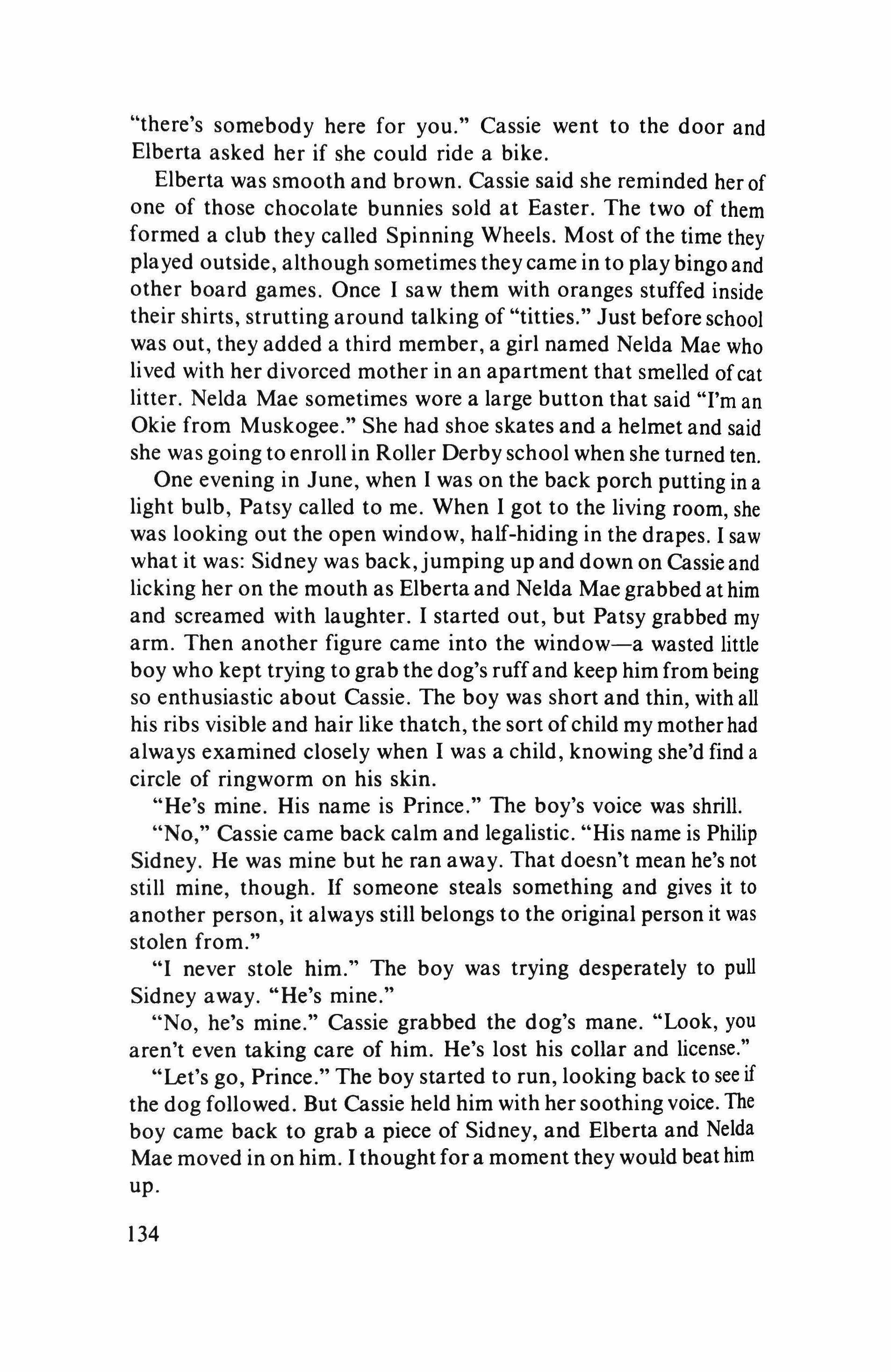
"there's somebody here for you." Cassie went to the door and Elberta asked her if she could ride a bike.
Elberta was smooth and brown. Cassie said she reminded her of one of those chocolate bunnies sold at Easter. The two of them formed a club they called Spinning Wheels. Most of the time they played outside, although sometimes they came in to play bingo and other board games. Once I saw them with oranges stuffed inside their shirts, strutting around talking of "titties." Just before school was out, they added a third member, a girl named Nelda Mae who lived with her divorced mother in an apartment that smelled of cat litter. Nelda Mae sometimes wore a large button that said "I'm an Okie from Muskogee." She had shoe skates and a helmet and said she was going to enroll in Roller Derby school when she turned ten.
One evening in June, when I was on the back porch putting in a light bulb, Patsy called to me. When I got to the living room, she was looking out the open window, half-hiding in the drapes. 1 saw what it was: Sidney was back,jumping up and down on Cassie and licking her on the mouth as Elberta and Nelda Mae grabbed at him and screamed with laughter. 1 started out, but Patsy grabbed my arm. Then another figure came into the window-a wasted little boy who kept trying to grab the dog's ruffand keep him from being so enthusiastic about Cassie. The boy was short and thin, with all his ribs visible and hair like thatch, the sort ofchild my mother had always examined closely when 1 was a child, knowing she'd find a circle of ringworm on his skin.
"He's mine. His name is Prince." The boy's voice was shrill.
"No," Cassie came back calm and legalistic. "His name is Philip Sidney. He was mine but he ran away. That doesn't mean he's not still mine, though. If someone steals something and gives it to another person, it always still belongs to the original person it was stolen from."
"I never stole him." The boy was trying desperately to pull Sidney away. "He's mine."
"No, he's mine." Cassie grabbed the dog's mane. "Look, you aren't even taking care of him. He's lost his collar and license."
"Let's go, Prince." The boy started to run, looking back to see if the dog followed. But Cassie held him with her soothing voice. The boy came back to grab a piece of Sidney, and Elberta and Nelda Mae moved in on him. I thought for a moment they would beat him up.

"Let's have a test," Cassie surprised me with her confidence. "You stand over there and I'll back up. We'll both be the same distance away. Then we'll each call him and whoever he comes to wins. That means he has chosen who he belongs to."
The boy moved back, the same distance from the dog as Cassie. He looked as if he feared he would be swindled. "I'll be the starter." Elberta had moved to Sidney's side. "When I drop my hand you both start calling." She flagged her arm as if starting a race. The little boy began calling desperately, as if he were losingground in a tug of war. Cassie looked at Sidney and called him in a faintly bored tone. He came to her immediately. She smiled in triumph but then froze as she saw the boy. His face had turned white and he had fallen to the ground sobbing. It was clear to her before it was to us: the dog was his lifeline.
Then she did something that took my breath away. Biting at her lower lip and petting Sidney rapidly, as if in advance for all the years she wouldn't have him, she looked at Elberta and Nelda Mae and then down at the dog. She hit him on the rump, a blow that shocked him and kicked up dust. He moved away from her. She shouted at the boy: "Okay, then, take him. You can have him. Get off my property and take this stupid dog with you."
Sidney looked bewildered and then followed the boy, who had taken off running. His bare feet slapped on the sidewalk; it was a sound I felt in my arches. Cassie was crying. Supported by the two other girls, she came toward the house. Patsy and I tried to look busy and interrupted as she burst in. She looked toward us and yelled through mucus. "I just saw Sidney. He belongs to a boy with a head like a coconut, a stupid little coconut-headed boy." Then the three of them went up to her room.
Two days later, as if the events were related in some larger pattern, George came out of the house and walked toward the car, looking slouched and gimpy. Things seemed to be conspiring against him. He was a little annoyed with Cassie for "taking up with the colored." He had been having more and more difficulty finding work and was behind on his rent and charge accounts. I had been giving him a hundred dollars a month and had been thinking about taking out a loan for him so he could start a business as a gardener. I went out to talk to him and saw that his face was red and puffy. There was a half-inch slit in his lower lip and his septum had the look of a cake that had beenjarred into collapsing. He tried
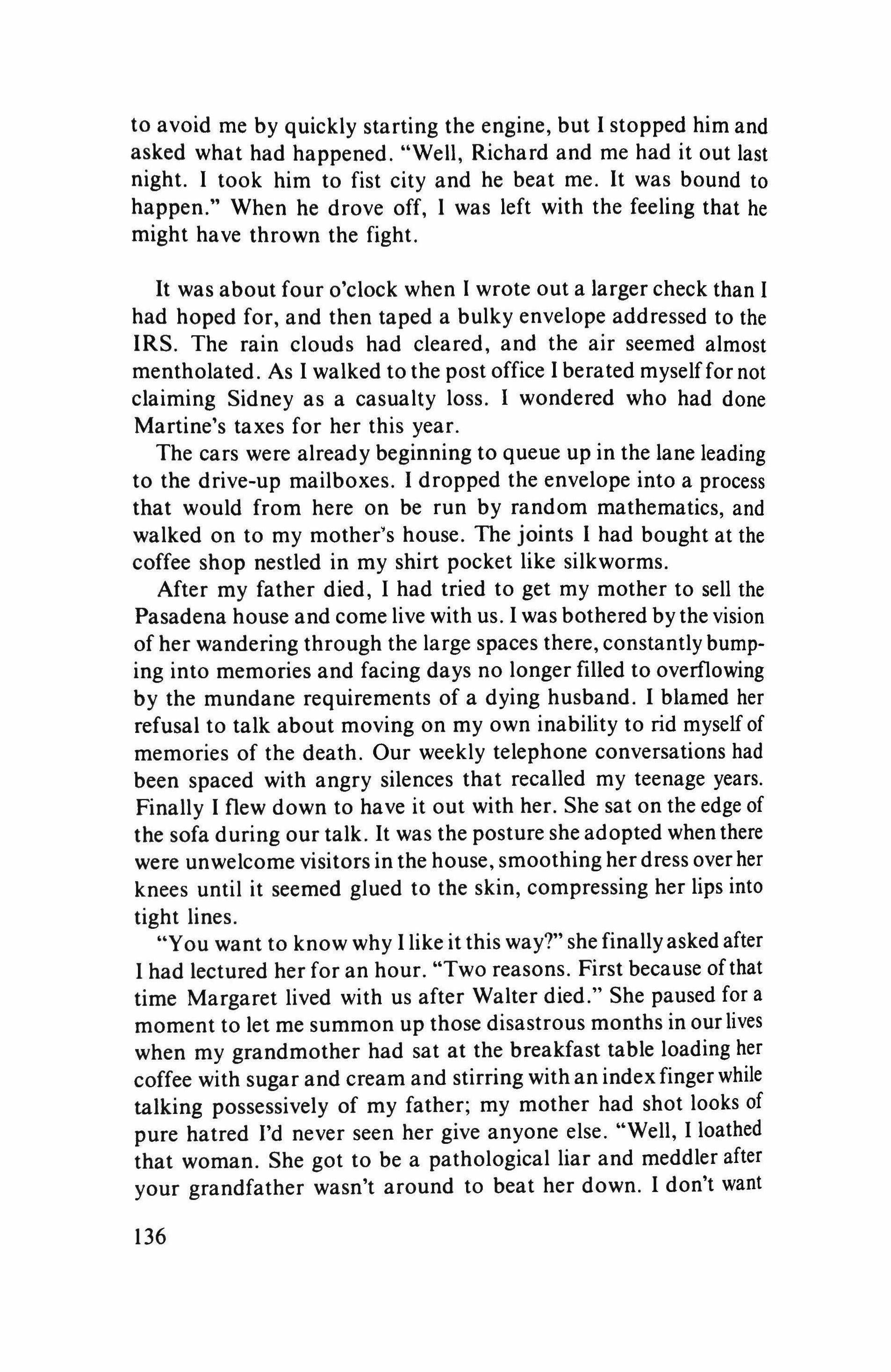
to avoid me by quickly starting the engine, but I stopped him and asked what had happened. "Well, Richard and me had it out last night. I took him to fist city and he beat me. It was bound to happen." When he drove off, I was left with the feeling that he might have thrown the fight.
It was about four o'clock when I wrote out a larger check than I had hoped for, and then taped a bulky envelope addressed to the IRS. The rain clouds had cleared, and the air seemed almost mentholated. As I walked to the post office I berated myselffor not claiming Sidney as a casualty loss. I wondered who had done Martine's taxes for her this year.
The cars were already beginning to queue up in the lane leading to the drive-up mailboxes. I dropped the envelope into a process that would from here on be run by random mathematics, and walked on to my mother's house. The joints I had bought at the coffee shop nestled in my shirt pocket like silkworms.
After my father died, I had tried to get my mother to sell the Pasadena house and come live with us. I was bothered by the vision of her wandering through the large spaces there, constantly bumping into memories and facing days no longer filled to overflowing by the mundane requirements of a dying husband. I blamed her refusal to talk about moving on my own inability to rid myself of memories of the death. Our weekly telephone conversations had been spaced with angry silences that recalled my teenage years. Finally I flew down to have it out with her. She sat on the edge of the sofa during our talk. It was the posture she adopted when there were unwelcome visitors in the house, smoothing her dress over her knees until it seemed glued to the skin, compressing her lips into tight lines.
"You want to know why I like it this way?" she finally asked after I had lectured her for an hour. "Two reasons. First because ofthat time Margaret lived with us after Walter died." She paused for a moment to let me summon up those disastrous months in our lives when my grandmother had sat at the breakfast table loading her coffee with sugar and cream and stirring with an index finger while talking possessively of my father; my mother had shot looks of pure hatred I'd never seen her give anyone else. "Well, I loathed that woman. She got to be a pathological liar and meddler after your grandfather wasn't around to beat her down. I don't want

Patsy to have to deal with some mean-minded old blabbermouth. The second reason"-she held up a palm like a traffic cop to stop my protest-"the second reason is that I like living alone. I like having my own checkbook. I like sleeping alone, eating frozen food, and not talking. I like knowing what lowe people. Do you realize that your father never let me see the bills, let alone pay them? I know that this won't sort out very well with your sentimental notions of mourning, but part of me feels like a freed slave."
When her eyes got so bad that she felt the pain and fuzziness might affect her mind, she relented to the extent of buying a house about a mile away from us. But the day she moved in she stipulated that she didn't want to be invited to dinner all the time, or used as an automatic baby-sitter, or have her daily activities monitored. I had trouble getting along with her and let Patsy handle our relationship.
I knocked and heard her coming from far back in the house. She opened the door, shading the pained eyes that almost looked inflated from internal pressure. She stared at me for several seconds, trying to achieve focus, her fingers running up and down the pleats of her dress like the tines of a rake. As I was about to identify myself, she looked both ways in a mime of conspiracy and spoke in a raspy whisper. "All right, Mugsy, you got da stuff?"
Inside there was music on. She bought records haphazardly and stacked them on the changer ten at a time, dusting and cleaning windows to medleys leading from Albinoni to Milhaud and then back to Haydn.
She showed me a chair, but I took the floor. She was smoking one of her Marlboros and French-inhaling as she had when I was a child. A piano piece I didn't recognize was on and we rattled away with it, not admitting what was going to happen. We have a tendency to talk in a way that I associate with the English-closing the grammatical structures through which feelings might otherwise seep.
"So what was your day like?" She squinted at me as if I was a great distance away.
"Death and taxes."
"Pardon?"
"It's April 15," I said, "the day tax returns are due. How're your eyes?"
"Not so hot. I'm knocking around the house a lot these days. I've
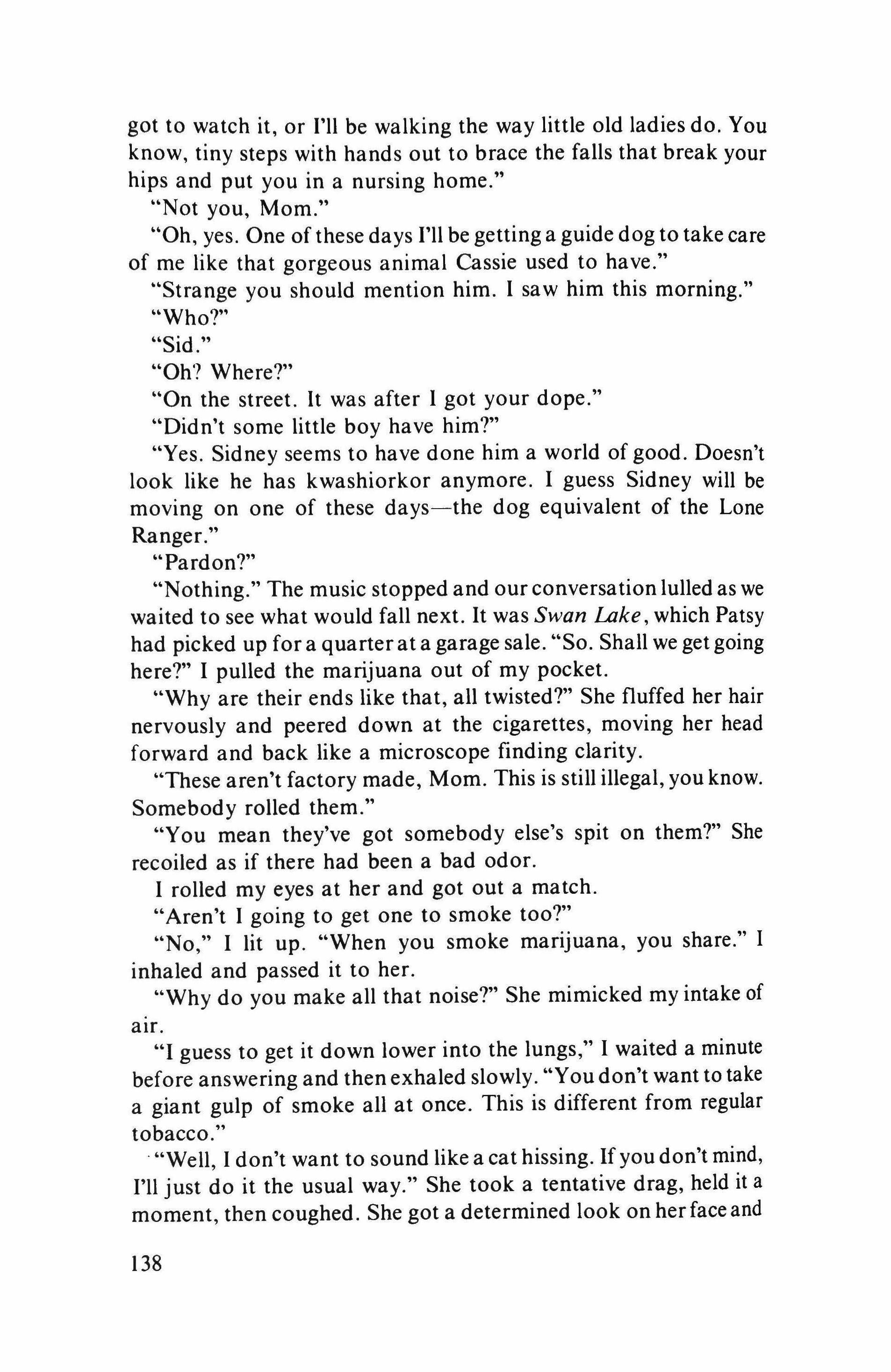
got to watch it, or I'll be walking the way little old ladies do. You know, tiny steps with hands out to brace the falls that break your hips and put you in a nursing home."
"Not you, Mom."
"Oh, yes. One of these days I'll be getting a guide dog to take care of me like that gorgeous animal Cassie used to have."
"Strange you should mention him. I saw him this morning."
"Who?"
"Sid.
"Oh? Where?"
"On the street. It was after I got your dope."
"Didn't some little boy have him?"
"Yes. Sidney seems to have done him a world of good. Doesn't look like he has kwashiorkor anymore. I guess Sidney will be moving on one of these days-the dog equivalent of the Lone Ranger."
"Pardon?"
"Nothing." The music stopped and our conversation lulled as we waited to see what would fall next. It was Swan Lake, which Patsy had picked up for a quarter at a garage sale. "So. Shall we get going here?" I pulled the marijuana out of my pocket.
"Why are their ends like that, all twisted?" She fluffed her hair nervously and peered down at the cigarettes, moving her head forward and back like a microscope finding clarity.
"These aren't factory made, Mom. This is still illegal, you know. Somebody rolled them."
"You mean they've got somebody else's spit on them?" She recoiled as if there had been a bad odor.
I rolled my eyes at her and got out a match.
"Aren't I going to get one to smoke too?"
"No," I lit up. "When you smoke marijuana, you share." I inhaled and passed it to her.
"Why do you make all that noise?" She mimicked my intake of air.
··1 guess to get it down lower into the lungs," I waited a minute before answering and then exhaled slowly. "You don't want to take a giant gulp of smoke all at once. This is different from regular tobacco."
"Well, I don't want to sound like a cat hissing. If you don't mind, I'll just do it the usual way." She took a tentative drag, held it a moment, then coughed. She got a determined look on her face and

took another gulp, this time successfully pushing it down. She handed the joint back and I took a long drag, feeling an analgesic warmth glow along my spinal column. I blurted out: "This has been one of those days, Mom. One of those days when everything fits but doesn't necessarily belong. Like Sam Johnson's definition of the metaphysical conceit: heterogeneous concepts yoked together by violence."
She smiled, pleased as always to hear me quote great writers. A few months back she had offered to pay me if I would go back to school and finish the thesis I had dropped fifteen years earlier. "It would be so nice to have a doctor in the family." When she had said it she put the irony into the sentence only for self-protection.
I saw her get lost in the music. I knew that if I looked at her feet they would be twitching toward the first position like divining rods. I found myself thinking of George and wishing he could know that Dickie had finally become Richard. The Kazaks had gotten evicted a year ago when their landlord showed up for the first time in ten years and said that he had to sell. I tried to find a way for them to buy the house, even offered to co-sign for the loan, but George didn't have any money in the bank or prospects for a steady job. The day came that we had all dreaded and they packed their scant belongings into a trailer behind the station wagon and moved to a new house they had rented in San Francisco's Mission district. To George it represented a step down. He was morose about leaving a neighborhood of whites, even though he had made attachments with no one on the block but us.
We tried to keep in touch, but the spaces between visits grew. One day I got a call from a woman who identified herself as Martine's sister. She wanted to tell me that George had died the previous night. At first they thought it was a heart attack, but then they discovered he had gotten a piece of chuck steak lodged in his windpipe and suffocated. Dickie had pounded on his heart until the ambulance came, but couldn't bring himself to give him mouthto-mouth resuscitation.
"Remember George, Mom?"
"George?" She had been looking down at the pattern in her rug and disengaged her stare with difficulty.
"Myoid neighbor."
"Oh, yes. That was a nice man."
"Yes. I saw his son this morning."
"Really?" The way she squinted made me wonder if the words
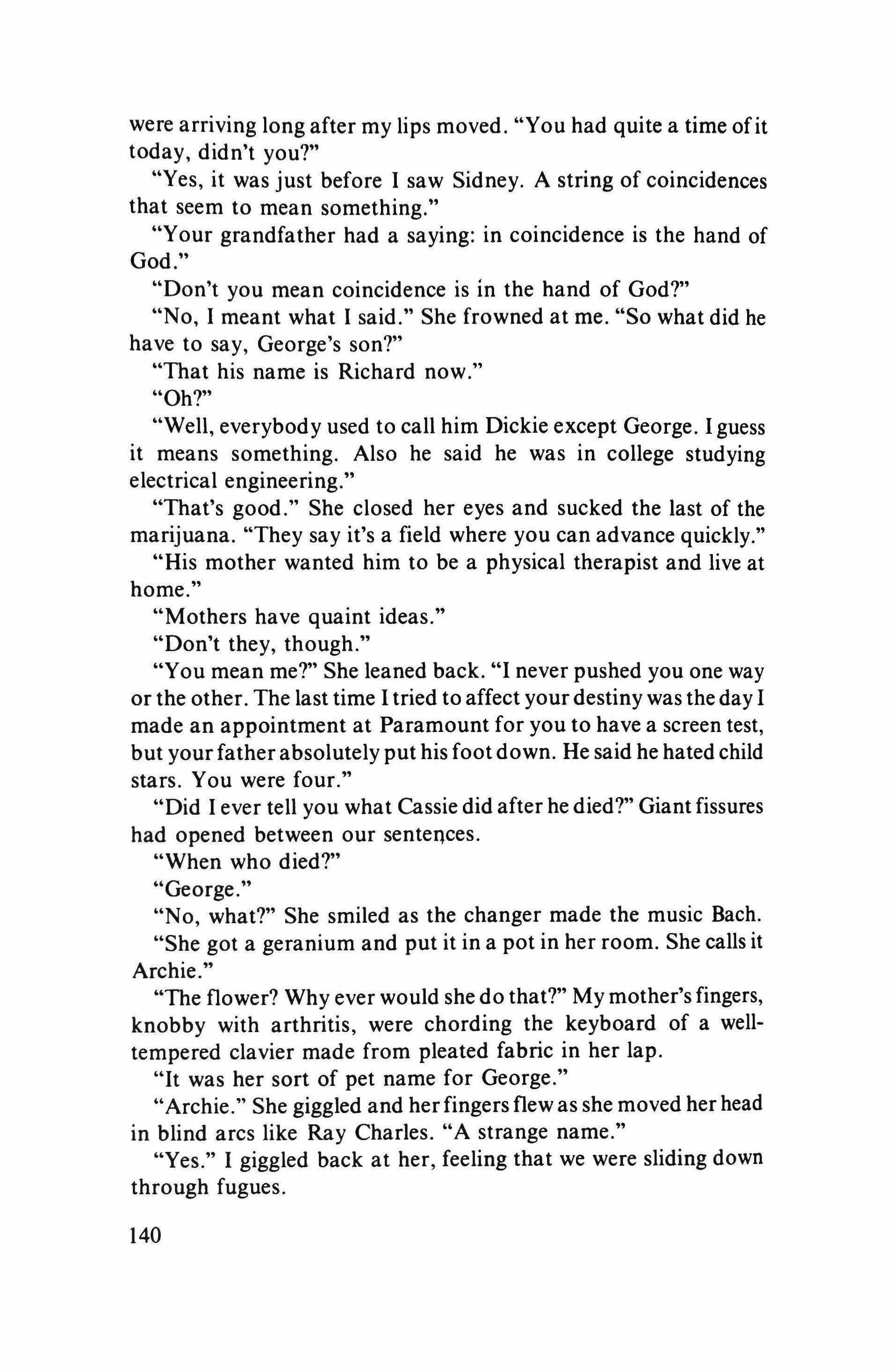
were arriving long after my lips moved. "You had quite a time ofit today, didn't you?"
"Yes, it was just before I saw Sidney. A string of coincidences that seem to mean something."
"Your grandfather had a saying: in coincidence is the hand of God."
"Don't you mean coincidence is in the hand of God?"
"No, 1 meant what 1 said." She frowned at me. "So what did he have to say, George's son?"
"That his name is Richard now."
"Oh?"
"Well, everybody used to call him Dickie except George. 1 guess it means something. Also he said he was in college studying electrical engineering."
"That's good." She closed her eyes and sucked the last of the marijuana. "They say it's a field where you can advance quickly."
"His mother wanted him to be a physical therapist and live at home."
"Mothers have quaint ideas."
"Don't they, though."
"You mean me?" She leaned back. "I never pushed you one way or the other. The last time 1 tried to affect your destiny was the day 1 made an appointment at Paramount for you to have a screen test, but your father absolutely put his foot down. He said he hated child stars. You were four."
"Did 1 ever tell you what Cassie did after he died?" Giant fissures had opened between our sentences.
"When who died?"
"George."
"No, what?" She smiled as the changer made the music Bach.
"She got a geranium and put it in a pot in her room. She calls it Archie."
"The flower? Why ever would she do that?" My mother's fingers, knobby with arthritis, were chording the keyboard of a welltempered clavier made from pleated fabric in her lap.
"It was her sort of pet name for George."
"Archie." She giggled and her fingers flew as she moved her head in blind arcs like Ray Charles. "A strange name."
"Yes." I giggled back at her, feeling that we were sliding down through fugues.

"Maybe she got the flower to help the transmigration of his soul," she said.
"Maybe. There have been times when I thought I heard her talking to it." We both laughed at that.
"Do you remember Captain Darwell?" In the silence between movements she finished her recital and popped her eyes open like a sat-up doll.
"No, who was he?"
"He was a friend of my mother's. Don't you remember him? God, he took you everywhere. He was your nannie and pal. It was during the war. Your father and I were both working at Lockheed. One of those day and night things. It wasn't easy. You were going through a bad time. You hated us and you hated yourself. I honestly believe you hated life. I remember your father decided once that he was going to send you away to military school as soon as the war was over. You were miserable. Anyway, this Captain Darwell took you over. He had been an ace in World War I, or so he said. He claimed to have been wounded someplace below the belt. He always said 'lower abdomen' when you tried to pin him down. Strange, that term 'lower abdomen' became a sort of code word for me and your father. Anyway, this man was a godsend for us all. He'd come over and get you almost every day. Took you to parachute factories, newsreels, even to a circus, 1 think. Did they have circuses during the war? Anyway, he knew somebody on the black market and used to manage to get you bubble gum. He bought you your first three-piece suit, and taught you to read. Did you know you could read perfectly well by the time you were five?"
"You've told me many times, Mom. I was a prodigy. So how come I never got my Ph.D.?" I tried to conjure up this man behind my eyes. Several people appeared as if applying for a job. Then I had him. A square man with Teddy Roosevelt glasses, gingercolored hair, and service decorations on his serge lapel. Bringing him closer into view, I could see myself with him at a Chinese restaurant, a small boy and an older man urging him to eat. He was saying that the Chinese ate their soup by whirling the liquid with their chopsticks like an egg beater and sucking it in as it reached the high point of its curve. When I finally believed him enough to try it, he laughed at me.
"Whatever happened to him, anyway?"
"Captain Darwell? He died in a VA hospital, I think. We lost
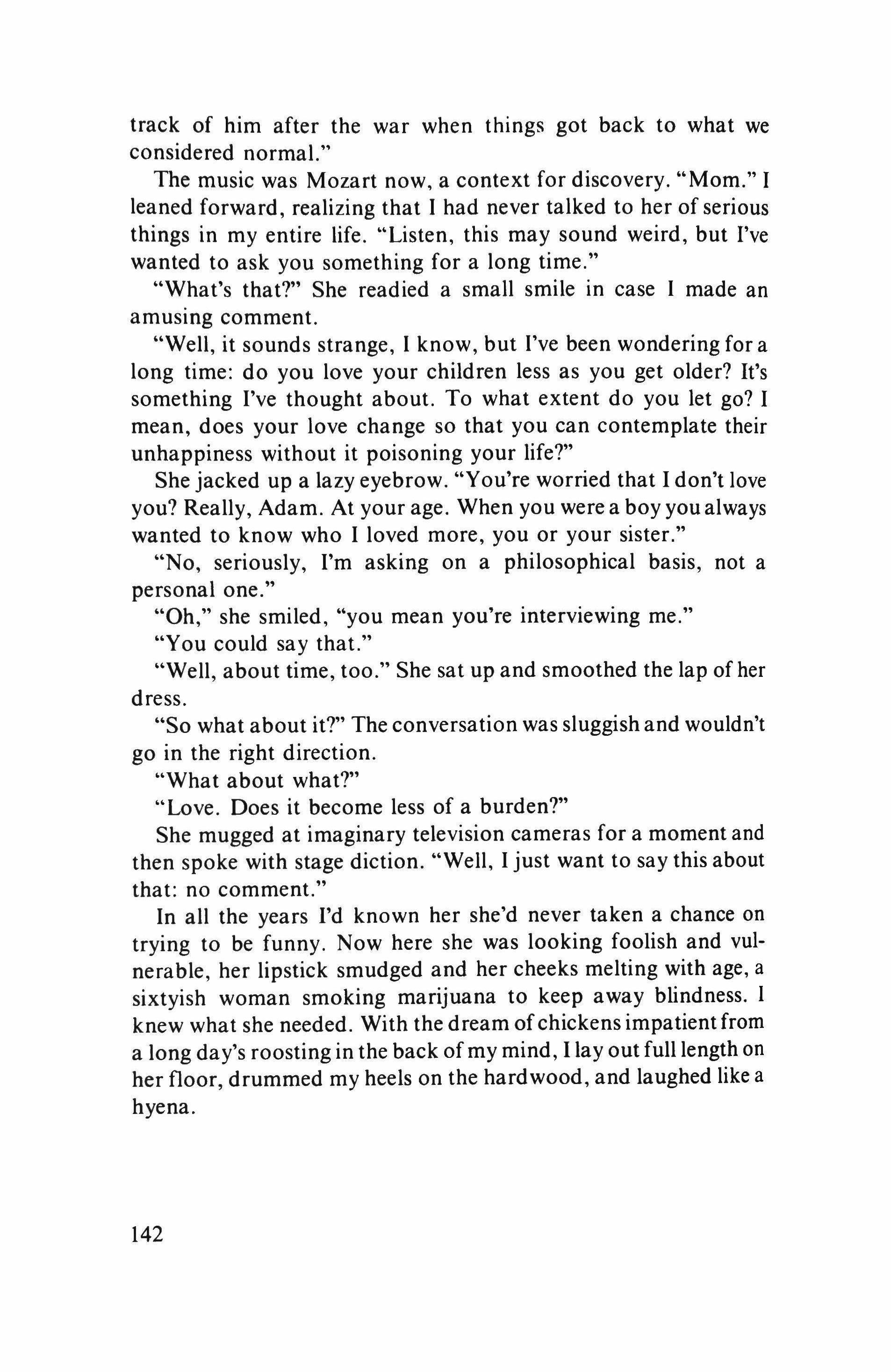
track of him after the war when things got back to what we considered normal."
The music was Mozart now, a context for discovery. "Mom." I leaned forward, realizing that I had never talked to her of serious things in my entire life. "Listen, this may sound weird, but I've wanted to ask you something for a long time."
"What's that?" She readied a small smile in case I made an amusing comment.
"Well, it sounds strange, I know, but I've been wondering for a long time: do you love your children less as you get older? It's something I've thought about. To what extent do you let go? I mean, does your love change so that you can contemplate their unhappiness without it poisoning your life?"
She jacked up a lazy eyebrow. "You're worried that I don't love you? Really, Adam. At your age. When you were a boy you always wanted to know who I loved more, you or your sister."
"No, seriously, I'm asking on a philosophical basis, not a personal one."
"Oh," she smiled, "you mean you're interviewing me."
"You could say that."
"Well, about time, too." She sat up and smoothed the lap of her dress.
"So what about it?" The conversation was sluggish and wouldn't go in the right direction.
"What about what?"
"Love. Does it become less of a burden?"
She mugged at imaginary television cameras for a moment and then spoke with stage diction. "Well, I just want to say this about that: no comment."
In all the years I'd known her she'd never taken a chance on trying to be funny. Now here she was looking foolish and vulnerable, her lipstick smudged and her cheeks melting with age, a sixtyish woman smoking marijuana to keep away blindness. I knew what she needed. With the dream ofchickens impatient from a long day's roosting in the back of my mind, I layout full length on her floor, drummed my heels on the hardwood, and laughed like a hyena.
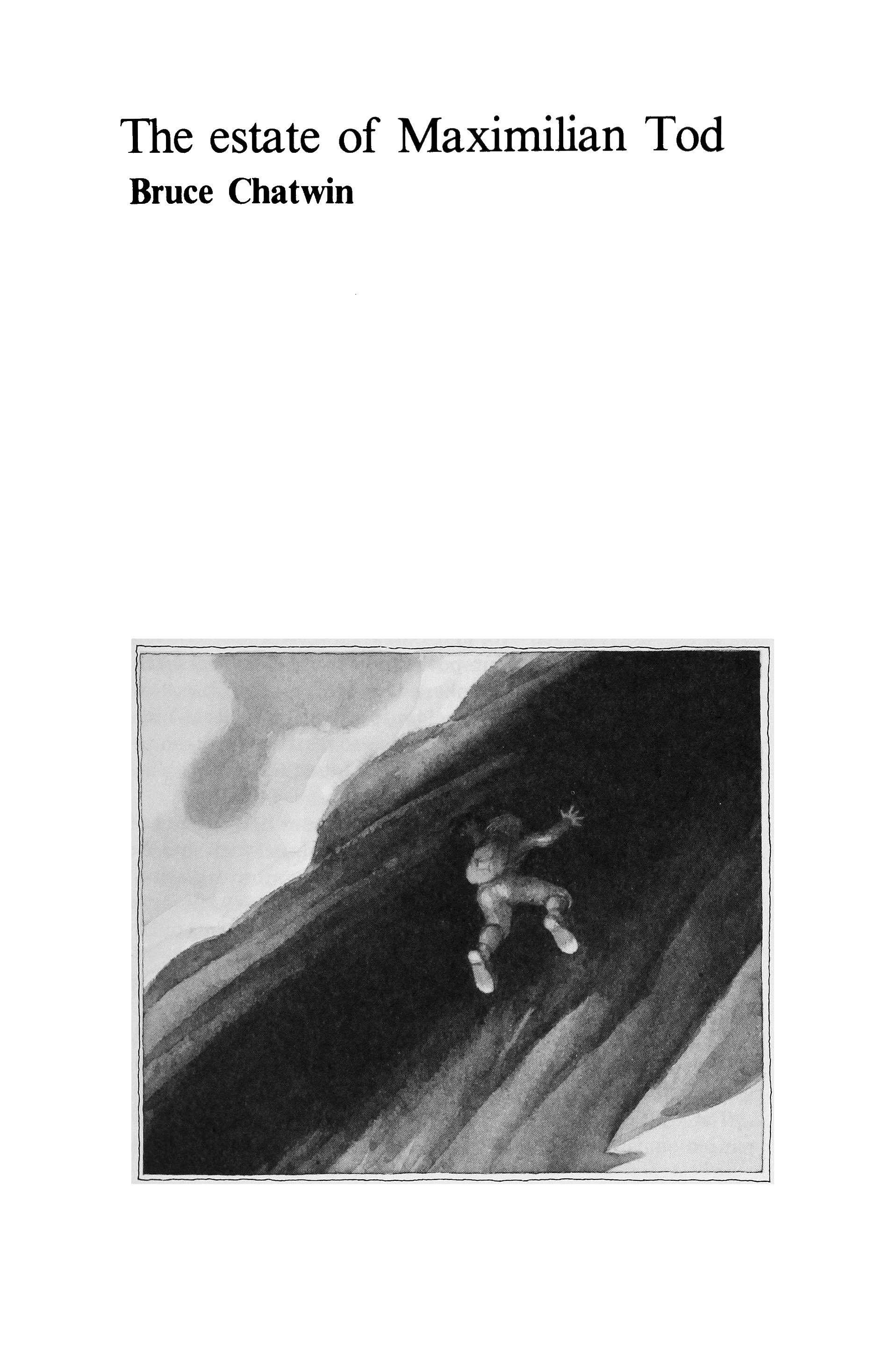

On the sixth of February 1975, Dr. Estelle Neumann fell down a crevasse of the Belgrano Glacier in Chilean Patagonia.
Her death robbed Harvard University ofthe finest glaciologist at work in the United States; I lost a close ally and a good friend. I cannot think of Estelle without recalling her humor, her capacity for statistics, and her blind, unreflecting courage that lacked the imagination to turn around.
Her work has continued, but in lesser hands-I could say treacherous hands. In March of last year, her research student, Dr. (now Professor) Helmut Leander, of the Institute of Glacial Studies at Kydd College, Minnesota, published a 103-page attack on her Glaciers a/the Southern Hemisphere. In September,at the symposium on world climatology in Tel Aviv, he described her findings as "irresponsible." That evening, in the bar of the Hilton Hotel, I overheard shreds of his conversation, explaining, in German and to an audience of West Germans, how the Neumann Theory was the product of its author's incurable optimism. "Or else," he added in a whisper, "she was bought."
I checked her figures. I double-checked them. The work took me six weeks: it left me red-eyed and exhausted. Estelle had scribbled her material over thirteen hip-pocket notebooks with black leatherette covers-equations, graphs, and diagrams which she alone could decipher, or someone as close to her as I had been. I was obliged to do it, as much for memory as to reassure the organizations that had invested in our research. I found no fault with her data, her method, or her conclusions.
Estelle's work was bound to upset the catastrophists. She had proved beyond question that the injection of fossil fuels into the atmosphere had no effect whatever on the temperature of glaciers. The prospect of triggering off another ice age, at least within the next ten thousand years, was nil. And the pronouncements of Dr. Leander and his colleagues merely reflected that bias for selfdestruction now ingrained in American academic circles. "Those dodos!" she would sigh. "Those dodos!"
Estelle published her thesis in 1965 and from that year her work attracted the attention of the chemical, petrochemical, and aerospace industries.
The Cliffhart Foundation (a subsidiary of Heartland Oil) financed our first project to the tune of$150,OOO. For five months we

studied the structure of Tyndall Flowers, six-petaled cavities which appear in parallel layers on the surface of melting ice and resemble the superimposed calligraphies of some Japanese Zen master.
The other expert in the field, Dr. Nonmura Hideyoshi, had retired to a monastery near Nara.
Before we had finished, nineteen other foundations pressed us to accept whatever money we needed. No expense seemed unreasonable to their trustees; they only wished the work to continue.
On October 9, 1974-a luminous fall day whirling with scarlet leaves-Estelle and I lunched at the Harvard Faculty Club to discuss our expedition to the Belgrano ice cap. Our eggs Benedict were all but uneatable, our conversation drowned by the braying accents of five Oxford historians at the next table.
Estelle was forty-three, a handsome, rather masculine woman with black hair cropped short and worn in a fringe above her considerable eyebrows. Years of exposure to sun, wind, and snow had burnished her skin the texture of shoe leather. When she was not beaming with self-satisfaction, her crow's-feet showed up white.
Her dress was simple and unaffected-a sweater and tweed skirt for the laboratory, hardly anything more elaborate for the cheese fondue parties she gave in her Cambridge apartment. But she was addicted to "primitive" jewelry of the worst kind: Navajo turquoise, African bangles, amber beads. That morning a golden eagle of the Veraguas culture was flapping between her breasts: I did not have the heart to tell her it was a fake.
Over lunch Estelle gave me a critical resume of the literature on Patagonian glaciers. She could remember if a pamphlet was printed in Valdivia or Valparaiso in 1897 or 1899. She drew my attention to some new work by Dr. Andrei Shirokogoff, of the Antarctic Institute in Novosibersk, who explored the north face of Gordon Tannhauser during the Allende years. But her conversation kept harking back to certain topographical details of the Belgrano.
She eyed me in a peculiar way. She asked a number of questions about our research fund-which was most unlike her. She even asked questions about our Swiss account. I can safely say that my face was a total blank until she gave up and reverted to her superior manner. She then spoke of Vaino Mustanoja's Patagonian Researches, published in English, in Helsinki, in 1939.

"You'll love old Mustanoja," she said. "His prose style is simply entrancing."
Now Estelle knew nothing about prose style, and her choice of the word "entrancing" lay far outside her usual range of adjectives. "I've got to have it photostated," she went on. "I promised old Shirokogoff a copy. Know something? Peabody's got the only copy in existence. Think! The Finns don't even have one."
Excusing myself, I hurried to the library of the Peabody Museum and withdrew the quarto volume whose existence I had overlooked. The pink paper cover was charmingly illustrated with Mustanoja's own copperplate engraving of the Belgrano. Rustic letters, of nothofagus twigs, formed the titles. Around the borders were vignettes of the ethnographical specimens he collected from the Tehuelche Indians on his 1934 expedition and presented to the Rovaniemi Museum. It touched me to think of these southerly artifacts in that northernmost city.
I turned to pages 142-43. The stroke of a razor, two neat folds, and the sheet was in my pocket. Mustanoja's prose style, it so happens, is outstanding for a Finn:
From Lago Angostura the track led across a plain denudedby winderosion and sparsely covered with xerophytic plants. Stunted bushes of calafate (Berberis darwinii) managed to exist. but the region was wild and poor. deserted by guanacos, unsuitable for sheep. After marching twenty-three miles with dustfrom the saltpans streaming into my eyes. the wooded valley of the Rio Tannhauser came into view. Beyond I could see the pink and green strata of the Meseta Colorado; beyond that the ice caps ofthe Andean cordillera.
A descent of two hours brought me into the logging camp of Puesto Ibanez. where I had hoped to purchase a mealfrom the inhabitants. For a week my diet had been reduced to grilled military starlings (frupialis miiitaris) which were by no means easy to shoot. having exceptionally hard crania for birds of their size.
The settlement. however, was in ruins. thanks to the activities ofa Chilean bandit. A woman squatted before the charred remains of her cottage. holding a dead baby andpointing with an expression ofabject misery at the half-dug grave of her husband.
The dismal scene was offset. somewhat. b v a magnificent Embothrium coccineum ablaze with scarlet flowers. Along the riverbank were groves of fuchsia (F. magellanica). bamboos (Chusquea cunnigii), and of Saxigothea conspicua An alstromeria was in bloom. as were yellow violets. calceolarias. the snowdrop orchis. and an orange mimulus. which proved to be a new species and which my friend Dr. Bjorn Topelius of Upsala has named M. mustanojensis in my honor.
Three miles upstream I came on a burned timber shack,fresh evidence of the bandit's work.from which I removed an interesting human calvarium. I
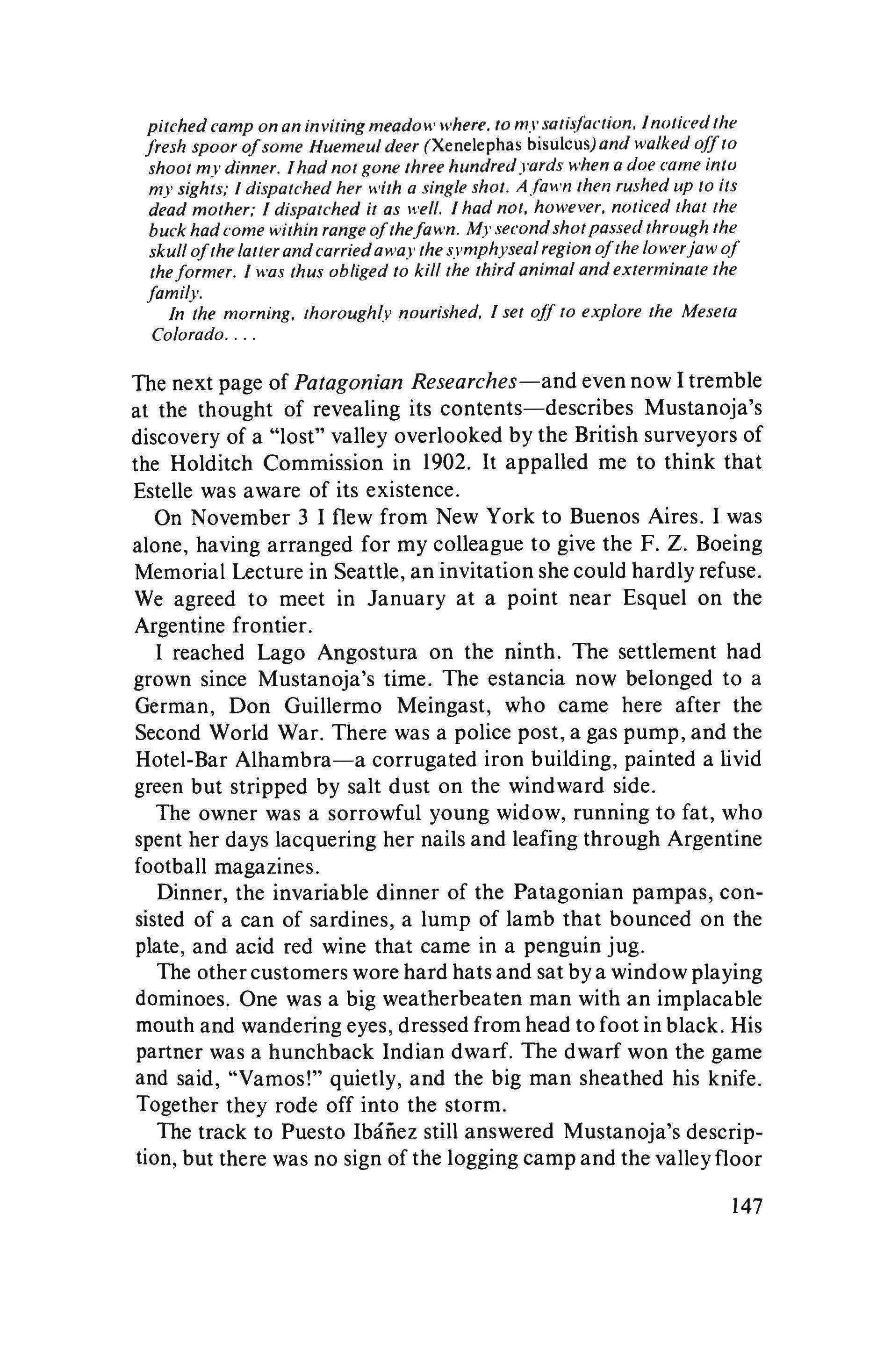
pitched camp on an inviting meadow where. to my satisfaction, Inoticed the fresh spoor ofsome Huemeul deer (XeneJephas bisulcus) and walked offto shoot my dinner. Ihad not gone three hundredyards when a doe came into my sights; I dispatched her with a single shot. A/awn then rushed up to its dead mother; I dispatched it as well. I had not. however. noticed that the buck had come within range ofthefawn. My secondshotpassed through the skull ofthe latterand carried away the symphysealregion ofthe lowerjaw of theformer. I was thus obliged to kill the third animal and exterminate the family.
In the morning. thoroughly nourished. I set off to explore the Meseta Colorado
The next page of Patagonian Researches-and even now I tremble at the thought of revealing its contents-describes Mustanoja's discovery of a "lost" valley overlooked by the British surveyors of the Holditch Commission in 1902. It appalled me to think that Estelle was aware of its existence.
On November 3 I flew from New York to Buenos Aires. I was alone, having arranged for my colleague to give the F. Z. Boeing Memorial Lecture in Seattle, an invitation she could hardly refuse. We agreed to meet in January at a point near Esquel on the Argentine frontier.
I reached Lago Angostura on the ninth. The settlement had grown since Mustanoja's time. The estancia now belonged to a German, Don Guillermo Meingast, who came here after the Second World War. There was a police post, a gas pump, and the Hotel-Bar Alhambra-a corrugated iron building, painted a livid green but stripped by salt dust on the windward side.
The owner was a sorrowful young widow, running to fat, who spent her days lacquering her nails and leafing through Argentine football magazines.
Dinner, the invariable dinner of the Patagonian pampas, consisted of a can of sardines, a lump of lamb that bounced on the plate, and acid red wine that came in a penguin jug.
The other customers wore hard hats and sat by a window playing dominoes. One was a big weatherbeaten man with an implacable mouth and wandering eyes, dressed from head to foot in black. His partner was a hunchback Indian dwarf. The dwarf won the game and said, "Vamos!" quietly, and the big man sheathed his knife. Together they rode off into the storm.
The track to Puesto Ibanez still answered Mustanoja's description, but there was no sign of the logging camp and the valley floor

was choked with bamboos. No traveler without a copy of Patagonian Researches could have found his way up the cliffs of the Meseta.
At 5,050 feet-if my aneroid reading is correct-I stood on Chilean territory and looked down on the ridge where Mustanoja first sighted the valley. I let my eyes wander over the scenes he described so vividly: the barrage of purple clouds; the ring of ice caps; the "hole" of clear blue sky; the rainbows; the chutes of light rain; the Belgrano itself, "streaming like the folds of a wedding garment"; the glittering screes of schist; the black forests; and, far below, the river snaking through bright green fields. More than ever I realized what he meant by "the ideal microclimate."
I followed the track downward, zigzagging through a "flowering mead" of columbines, tulips, narcissi, widow iris, crocuses, and fritillaries-all Asiatic species. In fact, the number of rarities from the Caucasus and Hindu Kush made it clear that the plantsman was a botanist of no ordinary competence.
I stopped beside a gnarled cypress to rest in a hut of bark and tree roots (modeled on Rousseau's hermitage in the park at Ermenonville). And the track itself was no less a work of art-spread with white gravel and so graded as to ensure perfect footfalls, with all debris and jarring stones removed.
Brushing through curtains ofjade green lichen I plunged into the dark wood of Nothofagus antarctica, silent but for the toe-toe of Magella woodpeckers. Another descent of a thousand feet brought me into the dappled sunlight of young specimen trees-poplars, tulipifers, paulowaias, wing-nuts, cercidiphyllums, Siberian birches, and the blue-needled Kurile larch.
The valley floor was an expanse of undulating turf that proved not to be of grass, but a carpet ofthe prostrate Andean strawberry, studded with fruit that gave off a delicious smell when crushed.
A cobalt ribbon of Iris kaempferi bordered a lake whose waters were the palest silvery celadon and so transparent that the trout floating close to the surface appeared to be airborne. These irises were the only blue flowers in the valley. Otherwise, the vegetation consisted of white willows, white-margined aralias, silver whitebeams, and the tansy-leaved thorn. Among the flowers were a white eremurus, white moutan peonies, the Mount Omei rose, and the waxy pagodas of the Himalayan lily.

Or else the plants were black; black trilliums, black-stemmed bamboos, and the black knight fritillary from Kanchatka. The spathes of the Cretan dragon arum peopled a grove of willows with funeral shades.
Mr. Tod's house-for Maximilian Tod was the name of the proprietor-was an airy pavilion built on a knoll about a hundred yards from the water. It was thirty-five feet square, aligned to the cardinal points, and had five sash windows on each face except the north. The walls were of battened vertical planks painted the color of pewter. The glazing bars were a warm ivory.
No structure could be simpler. It owed its severity and perfect proportions to the utopian projects of Ledoux and the houses of Shaker communities in New York State. The only attempt at decoration lay in two strips of beading around the windowframes, one painted a dark lapis, the other a dry red.
Yet the architect had avoided the absolute regularity of the Western tradition. The roof was slightly hipped in the Chinese manner; none of the walls wereprecisely the same length. All were fractionally inclined inward; and these marginal asymmetries gave the building an air of movement in repose.
The doorstep was a slab of gray schist, chamfered at the corners and embedded with ballast rubies. A bed of rue had been planted to conceal the foundations, and their glaucous foliage seemed to lift the house above the ground.
At the foot of the knoll was a wooden pillar ten feet high and lacquered cinnabar red. Hitched to it with a green rein was a light bay Turkoman stallion. The saddle was of the Mongolian type, of yellow leather, with base silver stirrups.
A boy came out of the house with a peregrine falcon on his gauntlet. He wore a' collarless shirt of gray silk, snuff-brown bombachas and red leather boots crinkled like a concertina. His gray eyes looked only into the eyes of the bird. He mounted and cantered off westward toward a cleft in the mountain wall.
A second path led over a cloud-blue bridge that arched over the stream into a pasture. A range of buildings showed up indistinctly from behind a smoke screen of white poplars. Nearby was the black neoclassical pigeon house where Mr. Tod was in the habit of training his favorite birds to imitate the flight of Sufi dervishes in trance.
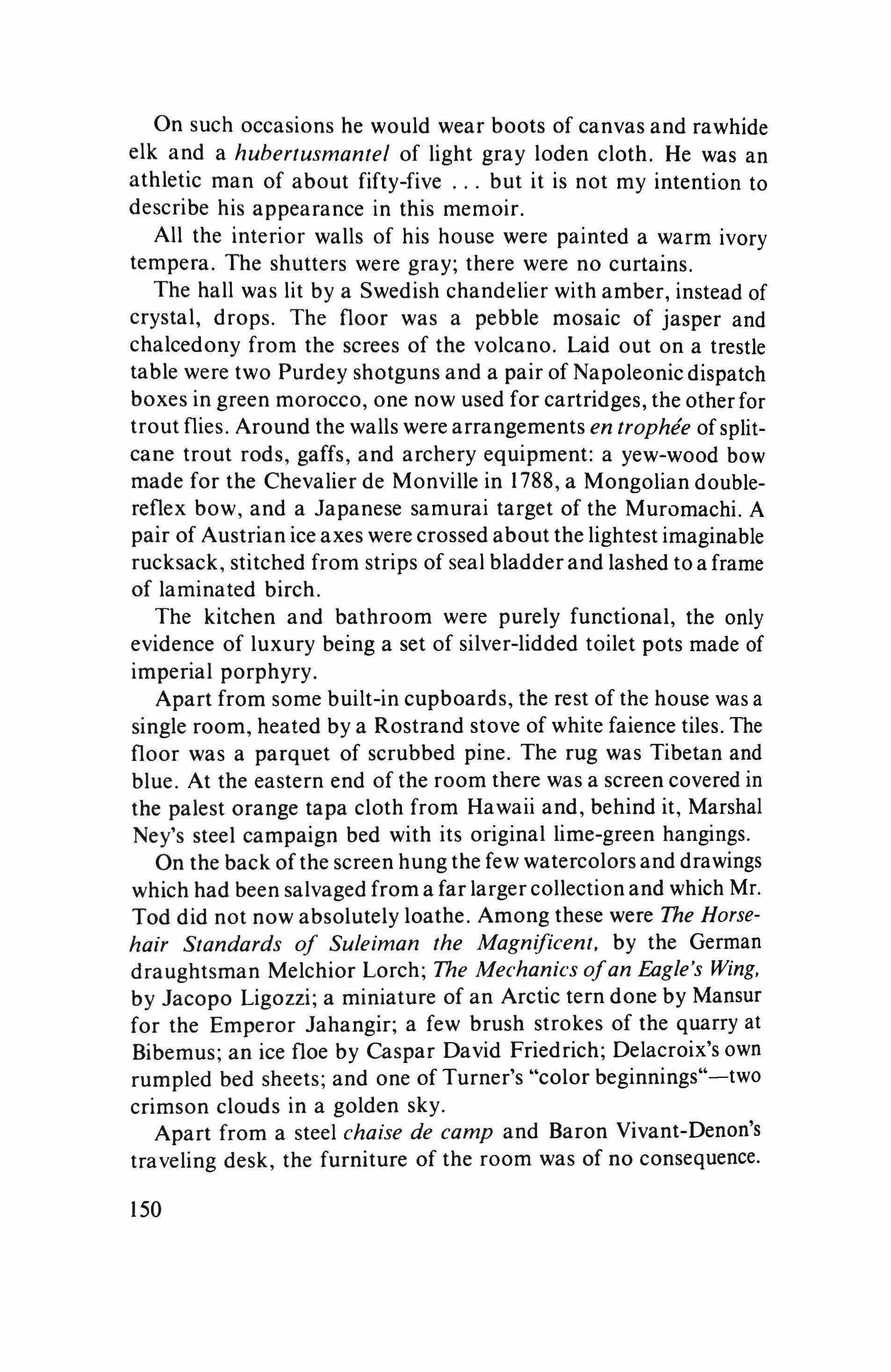
On such occasions he would wear boots of canvas and rawhide elk and a hubertusmantel of light gray loden cloth. He was an athletic man of about fifty-five but it is not my intention to describe his appearance in this memoir.
All the interior walls of his house were painted a warm ivory tempera. The shutters were gray; there were no curtains.
The hall was lit by a Swedish chandelier with amber, instead of crystal, drops. The floor was a pebble mosaic of jasper and chalcedony from the screes of the volcano. Laid out on a trestle table were two Purdey shotguns and a pair of Napoleonic dispatch boxes in green morocco, one now used for cartridges, the other for trout flies. Around the walls were arrangements en trophee ofsplitcane trout rods, gaffs, and archery equipment: a yew-wood bow made for the Chevalier de Monville in 1788, a Mongolian doublereflex bow, and a Japanese samurai target of the Muromachi. A pair of Austrian ice axes were crossed about the lightest imaginable rucksack, stitched from strips of seal bladder and lashed to a frame of laminated birch.
The kitchen and bathroom were purely functional, the only evidence of luxury being a set of silver-lidded toilet pots made of imperial porphyry.
Apart from some built-in cupboards, the rest of the house was a single room, heated by a Rostrand stove of white faience tiles. The floor was a parquet of scrubbed pine. The rug was Tibetan and blue. At the eastern end of the room there was a screen covered in the palest orange tapa cloth from Hawaii and, behind it, Marshal Ney's steel campaign bed with its original lime-green hangings.
On the back of the screen hung the few watercolors and drawings which had been salvaged from a far larger collection and which Mr. Tod did not now absolutely loathe. Among these were The Horsehair Standards of Suleiman the Magnificent, by the German draughtsman Melchior Lorch; The Mechanics ofan Eagle's Wing, by Jacopo Ligozzi; a miniature of an Arctic tern done by Mansur for the Emperor Jahangir; a few brush strokes of the quarry at Bibemus; an ice floe by Caspar David Friedrich; Delacroix's own rumpled bed sheets; and one of Turner's "color beginnings"-two crimson clouds in a golden sky.
Apart from a steel chaise de camp and Baron Vivant-Denon's traveling desk, the furniture of the room was of no consequence.
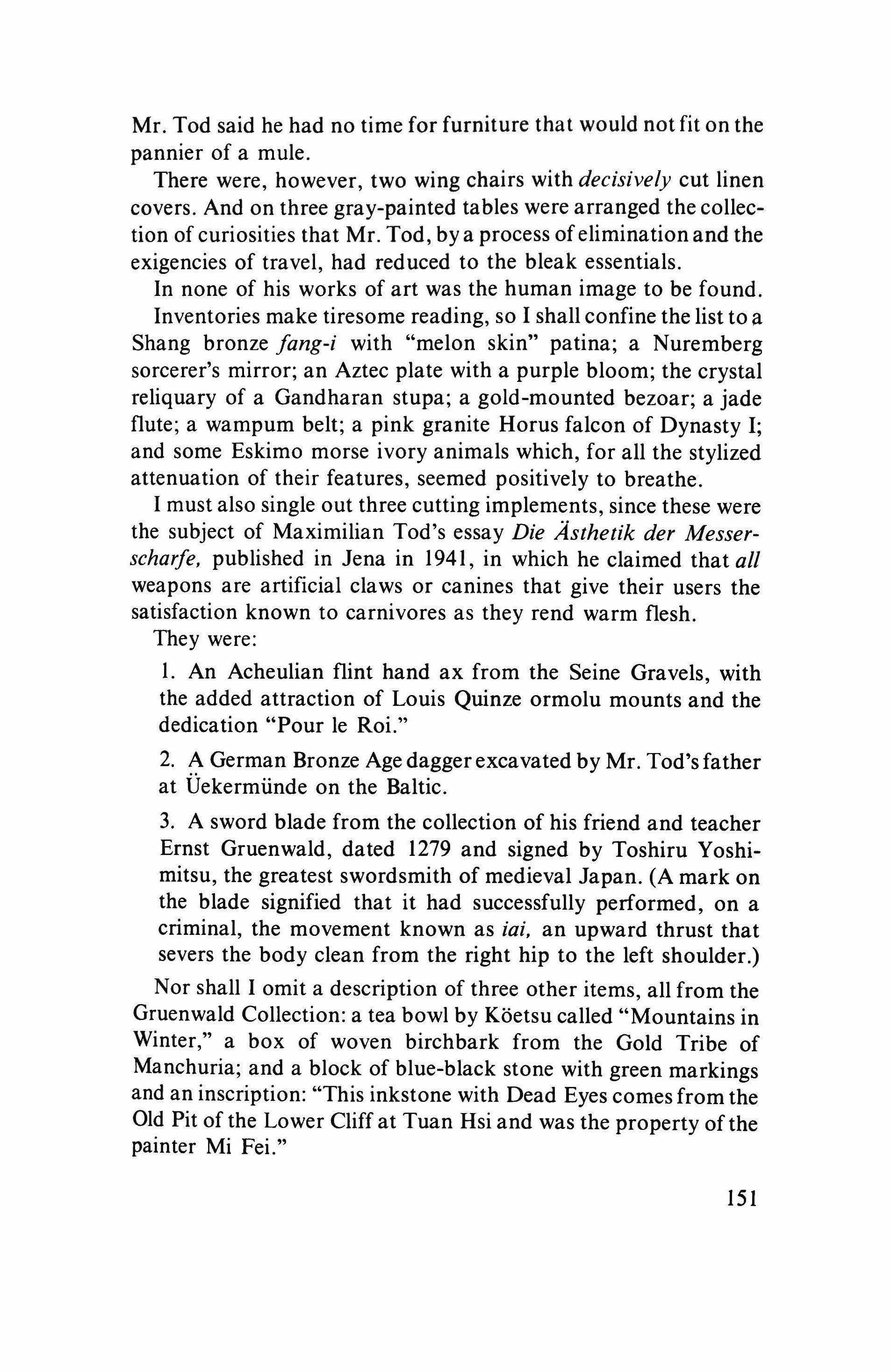
Mr. Tod said he had no time for furniture that would not fit on the pannier of a mule.
There were, however, two wing chairs with decisively cut linen covers. And on three gray-painted tables were arranged the collection of curiosities that Mr. Tod, by a process ofelimination and the exigencies of travel, had reduced to the bleak essentials.
In none of his works of art was the human image to be found.
Inventories make tiresome reading, so I shall confine the list to a Shang bronze fang-i with "melon skin" patina; a Nuremberg sorcerer's mirror; an Aztec plate with a purple bloom; the crystal reliquary of a Gandharan stupa; a gold-mounted bezoar; a jade flute; a wampum belt; a pink granite Horus falcon of Dynasty I; and some Eskimo morse ivory animals which, for all the stylized attenuation of their features, seemed positively to breathe.
I must also single out three cutting implements, since these were the subject of Maximilian Tod's essay Die Asthetik der Messerscharfe, published in Jena in 1941, in which he claimed that all weapons are artificial claws or canines that give their users the satisfaction known to carnivores as they rend warm flesh.
They were:
1. An Acheulian flint hand ax from the Seine Gravels, with the added attraction of Louis Quinze ormolu mounts and the dedication "Pour le Roi."
2. A German Bronze Age dagger excavated by Mr. Tod'sfather at Uekermiinde on the Baltic.
3. A sword blade from the collection of his friend and teacher Ernst Gruenwald, dated 1279 and signed by Toshiru Yoshimitsu, the greatest swordsmith of medieval Japan. (A mark on the blade signified that it had successfully performed, on a criminal, the movement known as iai, an upward thrust that severs the body clean from the right hip to the left shoulder.)
Nor shall I omit a description of three other items, all from the Gruenwald Collection: a tea bowl by Koetsu called "Mountains in Winter," a box of woven birchbark from the Gold Tribe of Manchuria; and a block of blue-black stone with green markings and an inscription: "This inkstone with Dead Eyes comes from the Old Pit of the Lower Cliff at Tuan Hsi and was the property of the painter Mi Fei."
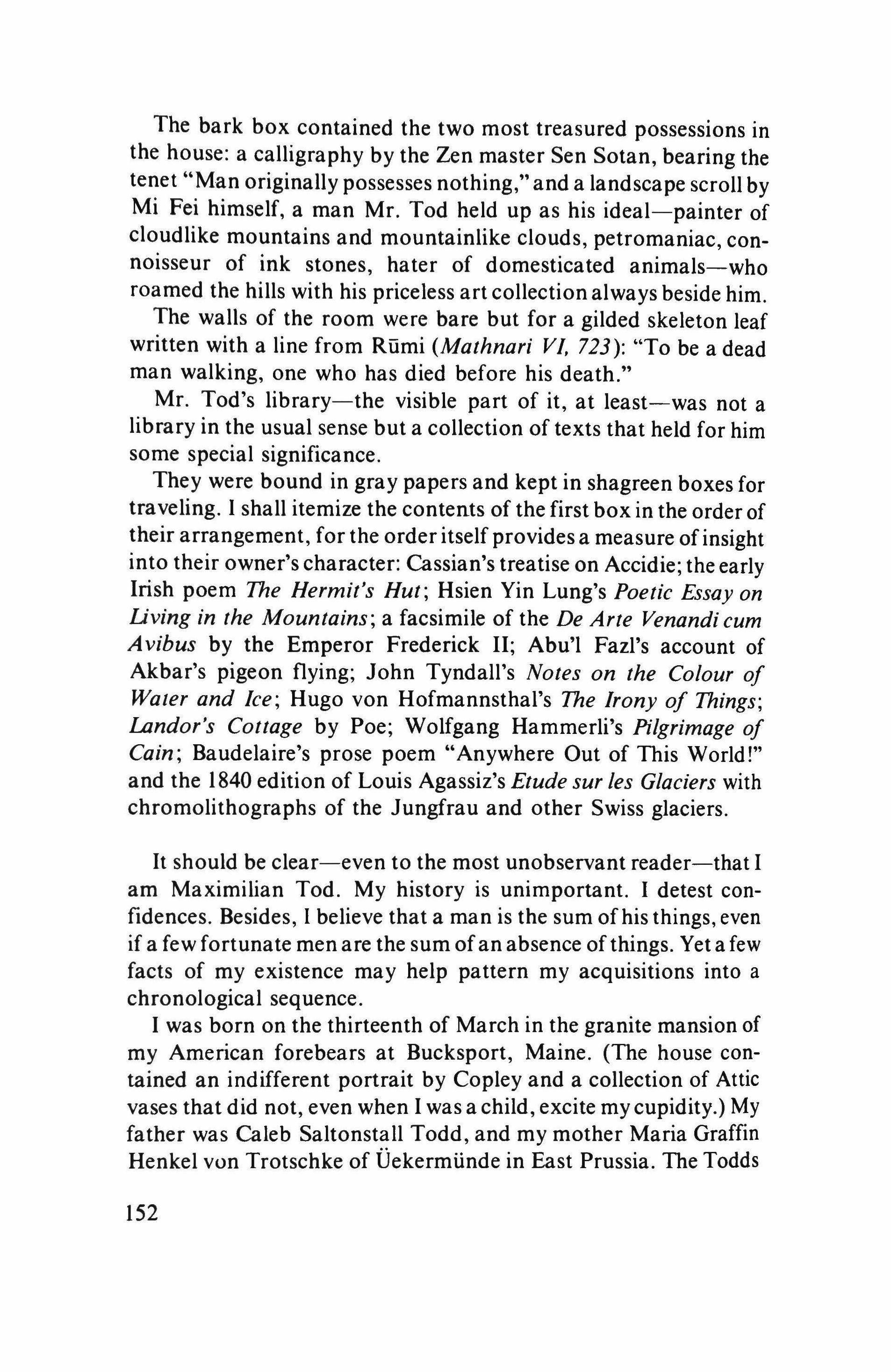
The bark box contained the two most treasured possessions in the house: a calligraphy by the Zen master Sen Sotan, bearing the tenet "Man originally possesses nothing," and a landscape scroll by Mi Fei himself, a man Mr. Tod held up as his ideal-painter of cloudlike mountains and mountainlike clouds, petromaniac, connoisseur of ink stones, hater of domesticated animals-who roamed the hills with his priceless art collection always beside him.
The walls of the room were bare but for a gilded skeleton leaf written with a line from Rumi (Mathnari VI, 723): "To be a dead man walking, one who has died before his death."
Mr. Tod's library-the visible part of it, at least-was not a library in the usual sense but a collection of texts that held for him some special significance.
They were bound in gray papers and kept in shagreen boxes for traveling. 1 shall itemize the contents of the first box in the order of their arrangement, for the order itself provides a measure ofinsight into their owner's character: Cassian's treatise on Accidie; the early Irish poem The Hermit's Hut; Hsien Yin Lung's Poetic Essay on living in the Mountains; a facsimile of the De Arte Venandi cum Avibus by the Emperor Frederick II; Abu'l Fazl's account of Akbar's pigeon flying; John Tyndall's Notes on the Colour of Waler and Ice; Hugo von Hofmannsthal's The Irony of Things; Landor's Cottage by Poe; Wolfgang Hammerli's Pilgrimage of Cain; Baudelaire's prose poem "Anywhere Out of This World!" and the 1840 edition of Louis Agassiz's Etude sur les Glaciers with chromolithographs of the Jungfrau and other Swiss glaciers.
It should be clear-even to the most unobservant reader-that I am Maximilian Tod. My history is unimportant. 1 detest confidences. Besides, I believe that a man is the sum ofhis things, even if a few fortunate men are the sum of an absence ofthings. Yetafew facts of my existence may help pattern my acquisitions into a chronological sequence.
1 was born on the thirteenth of March in the granite mansion of my American forebears at Bucksport, Maine. (The house contained an indifferent portrait by Copley and a collection of Attic vases that did not, even when I was a child, excite my cupidity.) My father was Caleb Saltonstall Todd, and my mother Maria Graffin Henkel von Trotschke of Uekermiinde in East Prussia. The Todds
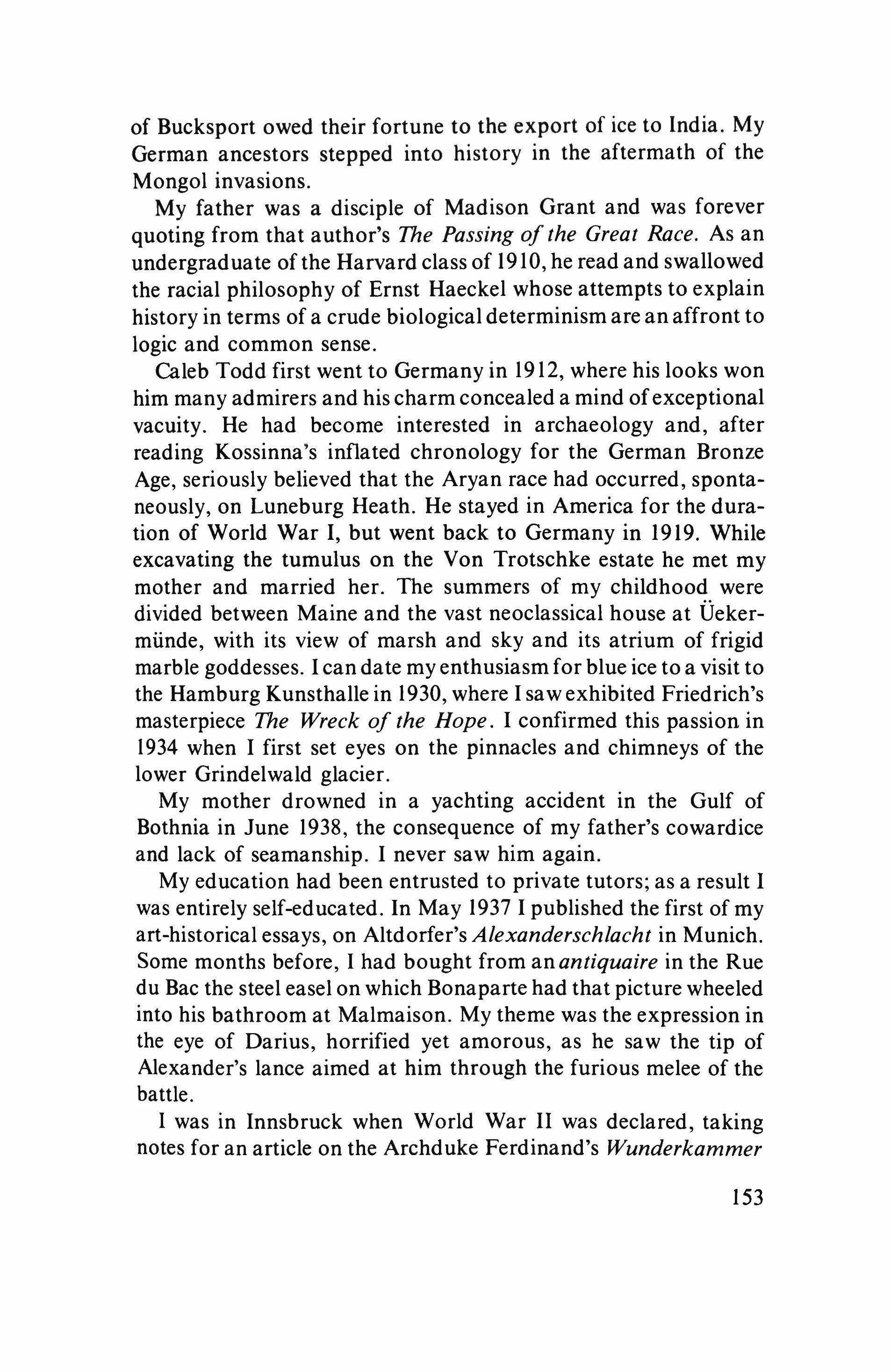
of Bucksport owed their fortune to the export of ice to India. My German ancestors stepped into history in the aftermath of the Mongol invasions.
My father was a disciple of Madison Grant and was forever quoting from that author's The Passing of the Great Race. As an undergraduate of the Harvard class of 1910, he read and swallowed the racial philosophy of Ernst Haeckel whose attempts to explain history in terms of a crude biological determinism are an affront to logic and common sense.
Caleb Todd first went to Germany in 1912, where his looks won him many admirers and his charm concealed a mind ofexceptional vacuity. He had become interested in archaeology and, after reading Kossinna's inflated chronology for the German Bronze Age, seriously believed that the Aryan race had occurred, spontaneously, on Luneburg Heath. He stayed in America for the duration of World War I, but went back to Germany in 1919. While excavating the tumulus on the Von Trotschke estate he met my mother and married her. The summers of my childhood were divided between Maine and the vast neoclassical house at Uekermiinde, with its view of marsh and sky and its atrium of frigid marble goddesses. I can date my enthusiasm for blue ice to a visit to the Hamburg Kunsthalle in 1930, where I saw exhibited Friedrich's masterpiece The Wreck of the Hope. I confirmed this passion in 1934 when I first set eyes on the pinnacles and chimneys of the lower Grindelwald glacier.
My mother drowned in a yachting accident in the Gulf of Bothnia in June 1938, the consequence of my father's cowardice and lack of seamanship. I never saw him again.
My education had been entrusted to private tutors; as a result I was entirely self-educated. In May 1937 I published the first of my art-historical essays, on Altdorfer's Alexanderschlacht in Munich. Some months before, I had bought from an antiquaire in the Rue du Bac the steel easel on which Bonaparte had that picture wheeled into his bathroom at Malmaison. My theme was the expression in the eye of Darius, horrified yet amorous, as he saw the tip of Alexander's lance aimed at him through the furious melee of the battle.
I was in Innsbruck when World War II was declared, taking notes for an article on the Archduke Ferdinand's Wunderkammer
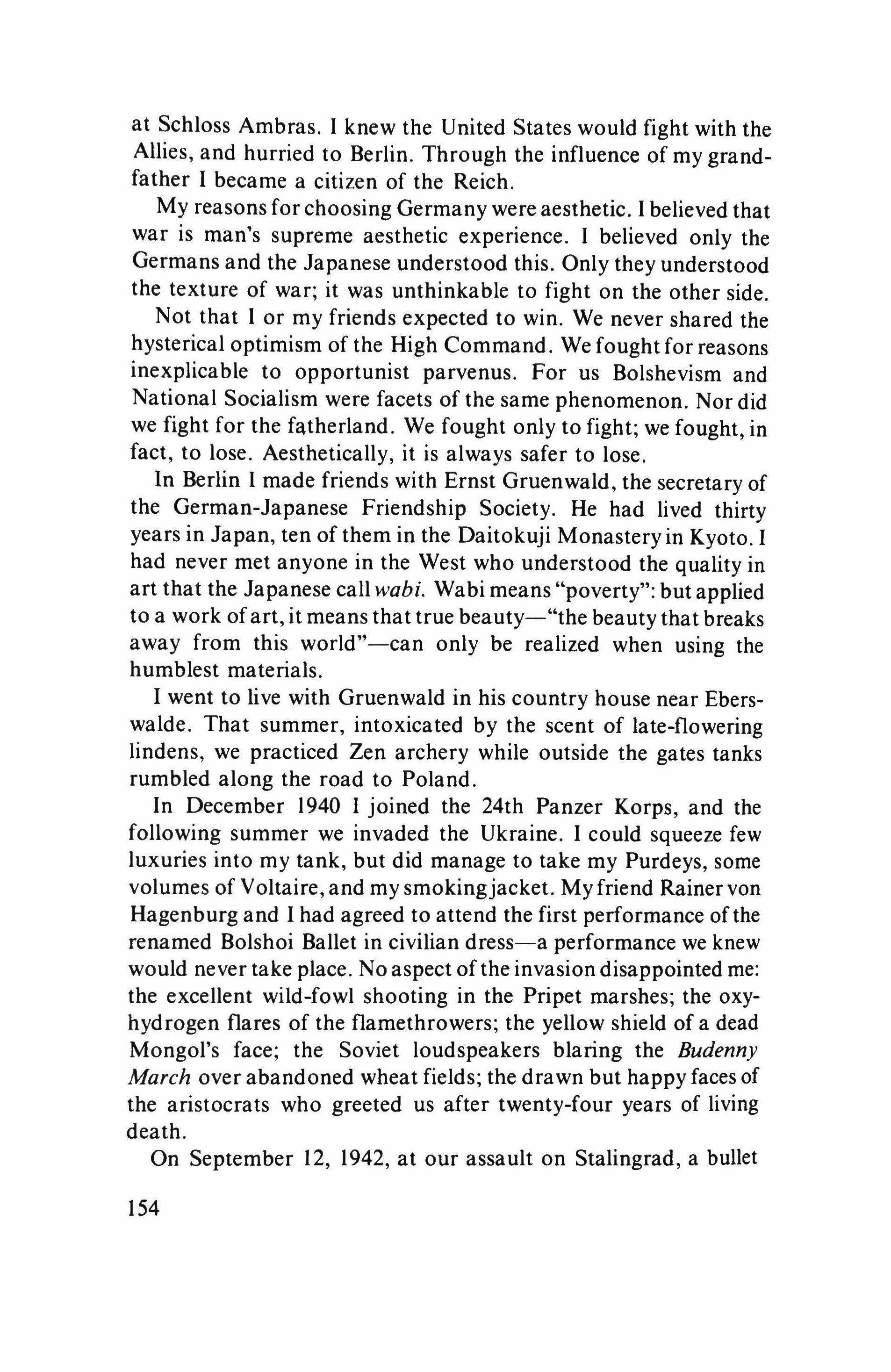
at Schloss Ambras. I knew the United States would fight with the Allies, and hurried to Berlin. Through the influence of my grandfather I became a citizen of the Reich.
My reasons for choosing Germany were aesthetic. I believed that war is man's supreme aesthetic experience. I believed only the Germans and the Japanese understood this. Only they understood the texture of war; it was unthinkable to fight on the other side.
Not that I or my friends expected to win. We never shared the hysterical optimism of the High Command. We fought for reasons inexplicable to opportunist parvenus. For us Bolshevism and National Socialism were facets of the same phenomenon. Nor did we fight for the fatherland. We fought only to fight; we fought, in fact, to lose. Aesthetically, it is always safer to lose.
In Berlin I made friends with Ernst Gruenwald, the secretary of the German-Japanese Friendship Society. He had lived thirty years in Japan, ten of them in the Daitokuji Monastery in Kyoto. I had never met anyone in the West who understood the quality in art that the Japanese call wabi. Wabi means "poverty": but applied to a work ofart, it means that true beauty-"the beauty that breaks away from this world"-can only be realized when using the humblest materials.
I went to live with Gruenwald in his country house near Eberswalde. That summer, intoxicated by the scent of late-flowering lindens, we practiced Zen archery while outside the gates tanks rumbled along the road to Poland.
In December 1940 I joined the 24th Panzer Korps, and the following summer we invaded the Ukraine. I could squeeze few luxuries into my tank, but did manage to take my Purdeys, some volumes of Voltaire, and my smokingjacket. My friend Rainer von Hagenburg and I had agreed to attend the first performance ofthe renamed Bolshoi Ballet in civilian dress-a performance we knew would never take place. No aspect of the invasion disappointed me: the excellent wild-fowl shooting in the Pripet marshes; the oxyhydrogen flares of the flamethrowers; the yellow shield of a dead Mongol's face; the Soviet loudspeakers blaring the Budenny March over abandoned wheat fields; the drawn but happy faces of the aristocrats who greeted us after twenty-four years of living death.
On September 12, 1942, at our assault on Stalingrad, a bullet
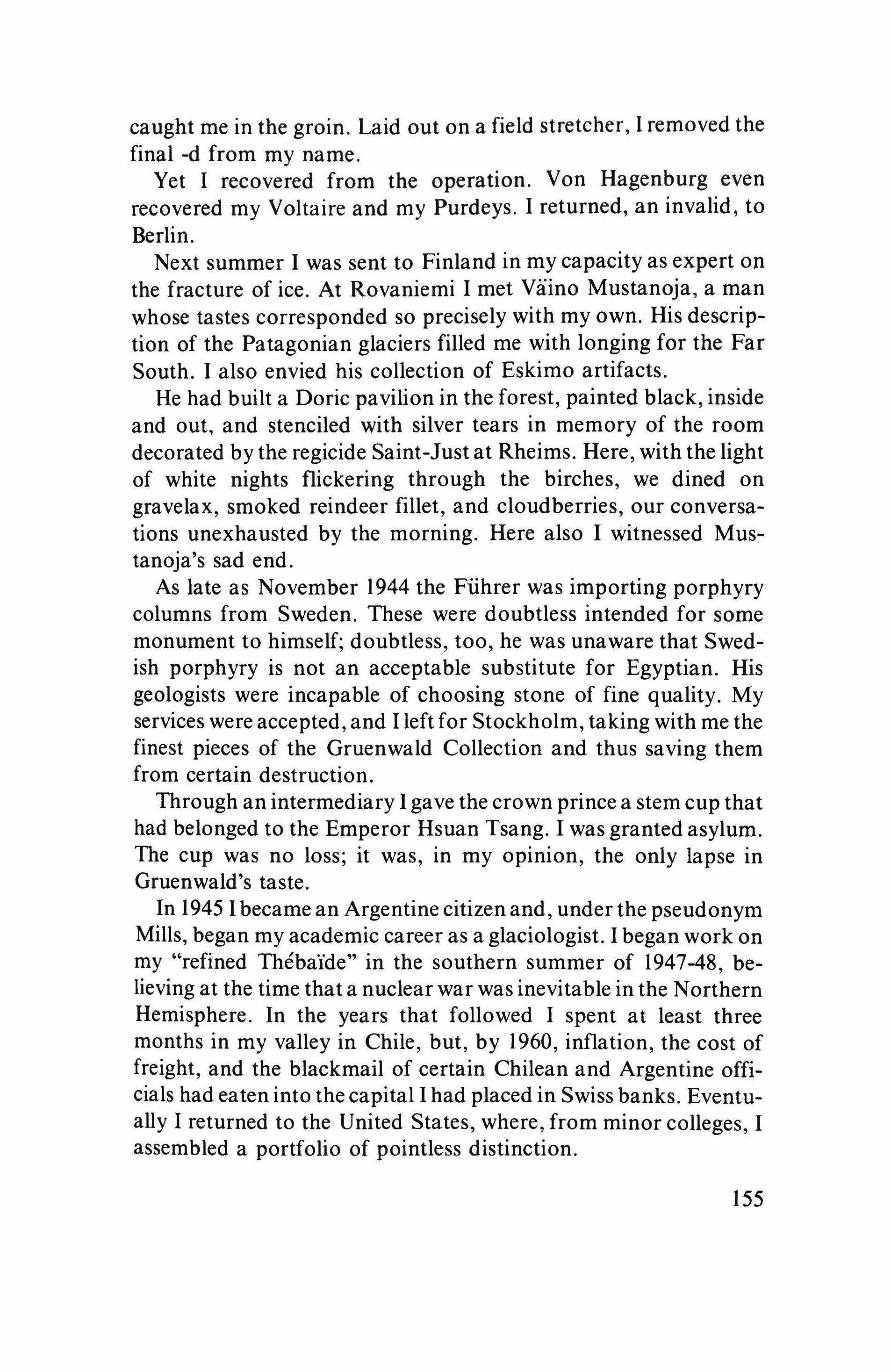
caught me in the groin. Laid out on a field stretcher, I removed the final -d from my name.
Yet I recovered from the operation. Von Hagenburg even recovered my Voltaire and my Purdeys. I returned, an invalid, to Berlin.
Next summer I was sent to Finland in my capacity as expert on the fracture of ice. At Rovaniemi I met Vaino Mustanoja, a man whose tastes corresponded so precisely with my own. His description of the Patagonian glaciers filled me with longing for the Far South. I also envied his collection of Eskimo artifacts.
He had built a Doric pavilion in the forest, painted black, inside and out, and stenciled with silver tears in memory of the room decorated by the regicide Saint-Just at Rheims. Here, with the light of white nights flickering through the birches, we dined on gravelax, smoked reindeer fillet, and cloudberries, our conversations unexhausted by the morning. Here also I witnessed Mustanoja's sad end.
As late as November 1944 the Fuhrer was importing porphyry columns from Sweden. These were doubtless intended for some monument to himself; doubtless, too, he was unaware that Swedish porphyry is not an acceptable substitute for Egyptian. His geologists were incapable of choosing stone of fine quality. My services were accepted, and I left for Stockholm, taking with me the finest pieces of the Gruenwald Collection and thus saving them from certain destruction.
Through an intermediary I gave the crown prince a stem cup that had belonged to the Emperor Hsuan Tsang. I was granted asylum. The cup was no loss; it was, in my opinion, the only lapse in Gruenwald's taste.
In 1945 I became an Argentine citizen and, under the pseudonym Mills, began my academic career as a glaciologist. I began work on my "refined Thebaide" in the southern summer of 1947-48, believing at the time that a nuclear war was inevitable in the Northern Hemisphere. In the years that followed I spent at least three months in my valley in Chile, but, by 1960, inflation, the cost of freight, and the blackmail of certain Chilean and Argentine officials had eaten into the capital I had placed in Swiss banks. Eventually I returned to the United States, where, from minor colleges, I assembled a portfolio of pointless distinction.
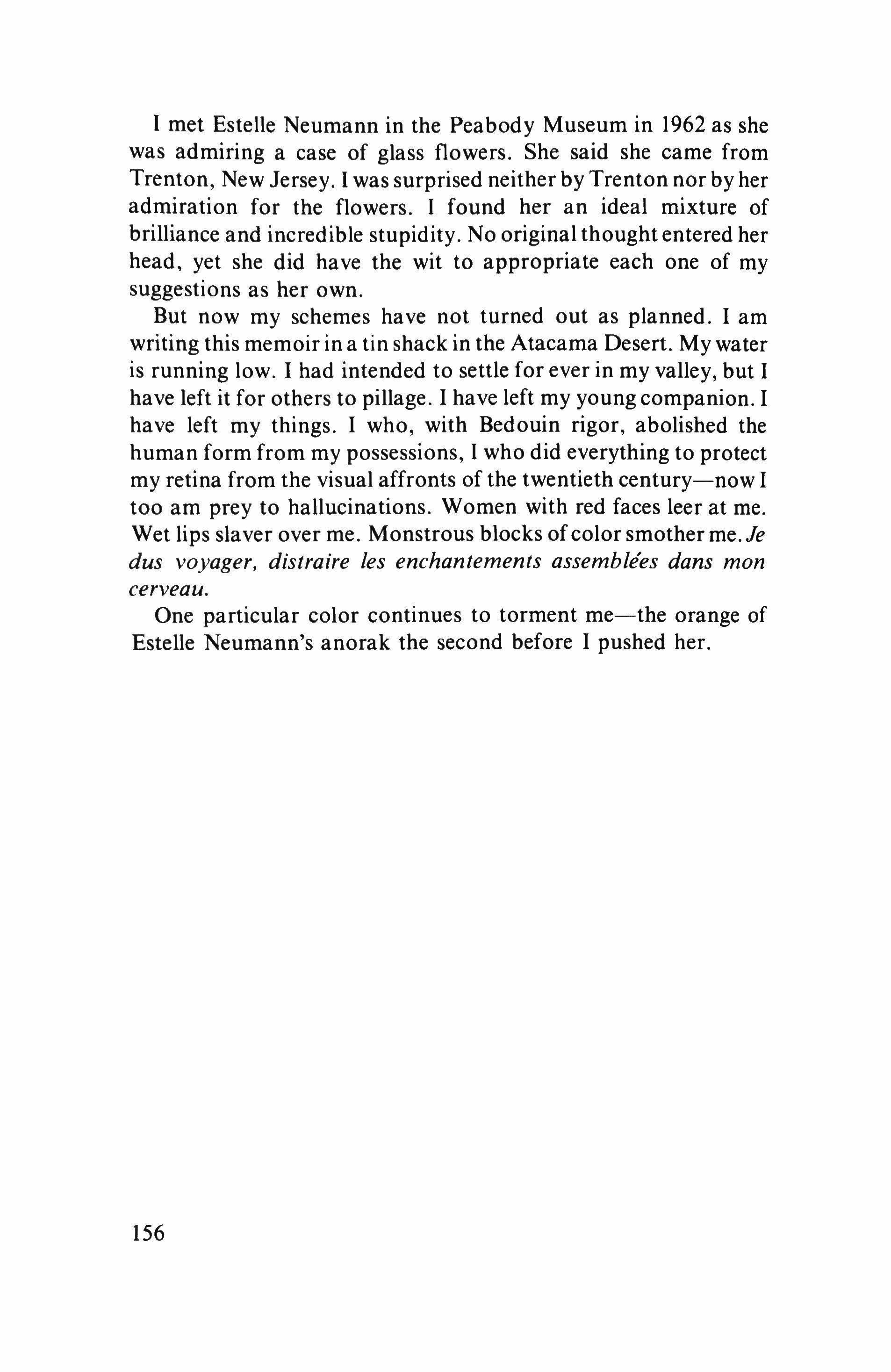
I met Estelle Neumann in the Peabody Museum in 1962 as she was admiring a case of glass flowers. She said she came from Trenton, New Jersey. I was surprised neither by Trenton nor by her admiration for the flowers. I found her an ideal mixture of brilliance and incredible stupidity. No original thought entered her head, yet she did have the wit to appropriate each one of my suggestions as her own.
But now my schemes have not turned out as planned. I am writing this memoir in a tin shack in the Atacama Desert. My water is running low. I had intended to settle for ever in my valley, but I have left it for others to pillage. I have left my young companion. I have left my things. I who, with Bedouin rigor, abolished the human form from my possessions, I who did everything to protect my retina from the visual affronts of the twentieth century-now I too am prey to hallucinations. Women with red faces leer at me. Wet lips slaver over me. Monstrous blocks ofcolor smother me. Je dus voyager, distraire les enchantements assemblees dans mon cerveau.
One particular color continues to torment me-the orange of Estelle Neumann's anorak the second before I pushed her.
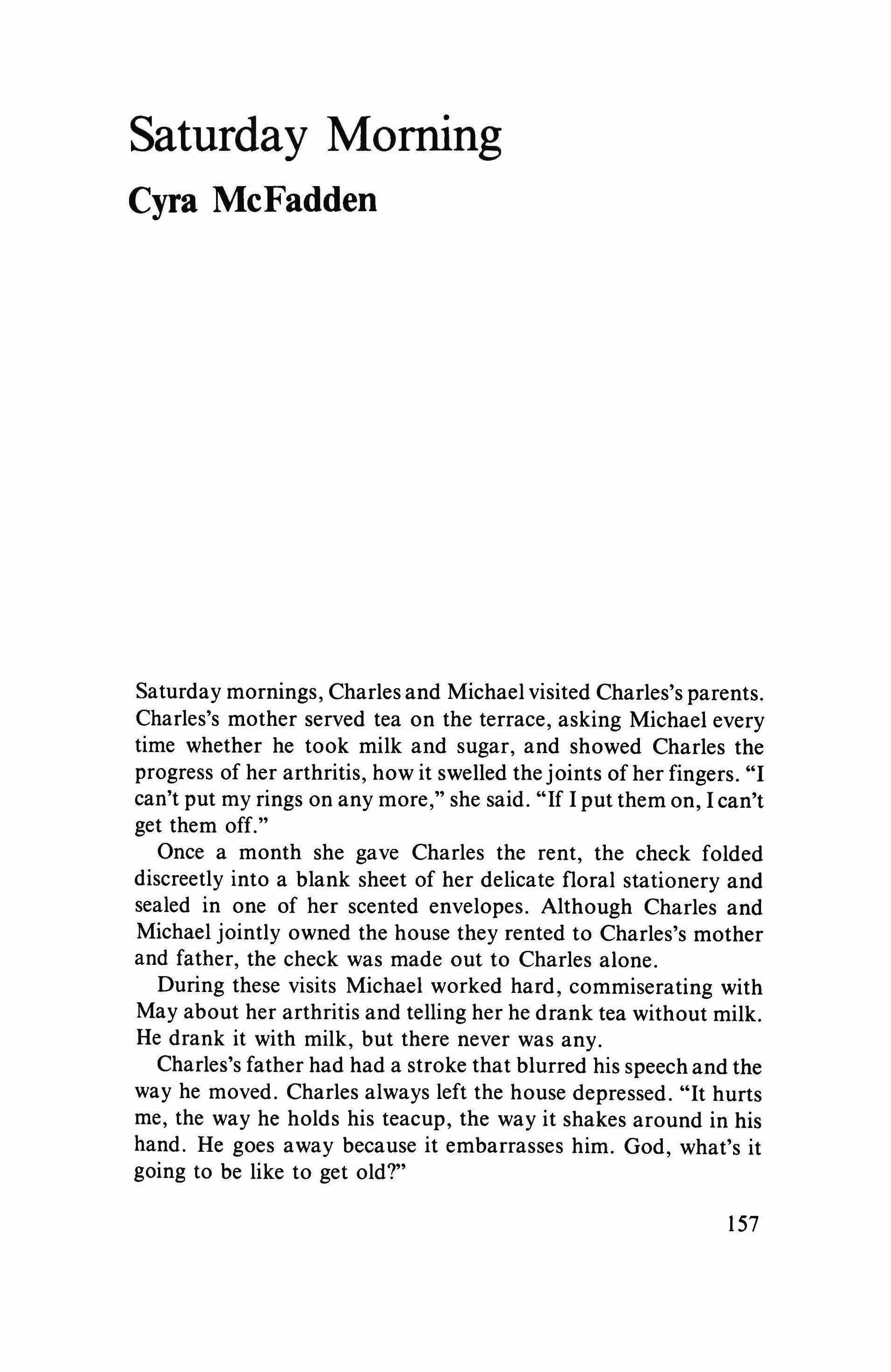
Saturday mornings, Charles and Michael visited Charles's parents. Charles's mother served tea on the terrace, asking Michael every time whether he took milk and sugar, and showed Charles the progress of her arthritis, how it swelled the joints of her fingers. "I can't put my rings on any more," she said. "If I put them on, I can't get them off."
Once a month she gave Charles the rent, the check folded discreetly into a blank sheet of her delicate floral stationery and sealed in one of her scented envelopes. Although Charles and Michael jointly owned the house they rented to Charles's mother and father, the check was made out to Charles alone.
During these visits Michael worked hard, commiserating with May about her arthritis and telling her he drank tea without milk. He drank it with milk, but there never was any.
Charles's father had had a stroke that blurred his speech and the way he moved. Charles always left the house depressed. "It hurts me, the way he holds his teacup, the way it shakes around in his hand. He goes away because it embarrasses him. God, what's it going to be like to get old?"

"Look at your mother," Michael told him. "She looks marvelous. May hasn't changed in twenty years."
This was very nearly true. May still looked much as she had when Michael met her, still well groomed, with her neat blonde hair, and unobtrusively well dressed. "The way I see it," she once told Charles, for she rarely addressed herself to Michael, "I'd rather have a few good things. A few good things I can wear for years. I've never been one for blowing with the wind."
Even though Michael suffered from May's consistency, her resolute unwillingness to bend, if not blow, with the wind, he gave her considerable credit. Charles had inherited her steadiness, her loyalty to a few good things, and these things were part of their shared lives and had been for a very long time.
This morning Charles's father was worse. The tea made small tidal waves in his cup and kept spilling down the front of his shirt, while May looked on in quiet distress. Boyd kept trying to tell Charles something but brought out only inarticulate noises, and when he'd clumsily pushed back the wrought-iron patio chair and gone off to the garden, Michael noticed in surprise that May had tears in her eyes behind her glasses. Michael had always thought of Mayas invulnerable.
"He got up in the middle of the night and sat on the bed and put on his clothes," May said, her head angled away from Michael. "He said you were lost, Charles, and he was going to find you. The physical therapy seems to have helped, but he's still so mixed up in his mind. One day he's just as clear as a bell, and the next I can't get through to him at all. Last night I took his shoes away, and he fought back physically. It frightened me to death."
"Poor old bastard," Charles said to himself, and May sat up very straight in her chair.
"Michael," she said stiffly, "more tea?"
Charles didn't talk all the way down the hill. Michael knew he was seeing Boyd sitting on the edge of his bed, fumbling at the buttons on his shirt. Helplessly, he touched Charles's knee, and Charles, without taking his eyes off the road, said it was okay, never mind, he was just so damned afraid of dying.
"You won't die for a long time," Michael said.
Charles smiled wryly. "Not good enough."
In the supermarket Charles pushed the cart while Michael

checked off groceries on the list. He and Charles led orderly lives, doing the same errands every Saturday, though one of them sometimes rebelled, launching a calculated argument over something trivial, who took the garbage out or whom they should entertain at home. Michael thought that these brief storms took the place of larger quarrels, harmlessly releasing the strain both of them absorbed from Charles's parents, other people, the air. Between them there was no strain at all, except sometimes on Saturday mornings.
Why was Charles afraid of dying? Michael looked at Charles's profile, closed off in some private terror, and felt the same shock of surprise he'd experienced over May's tears. Charles, at fifty, was healthy and strong; he looked younger because he worked at staying fit. Already he'd been out jogging this morning, coming back to the house elated because he'd beaten his best time.
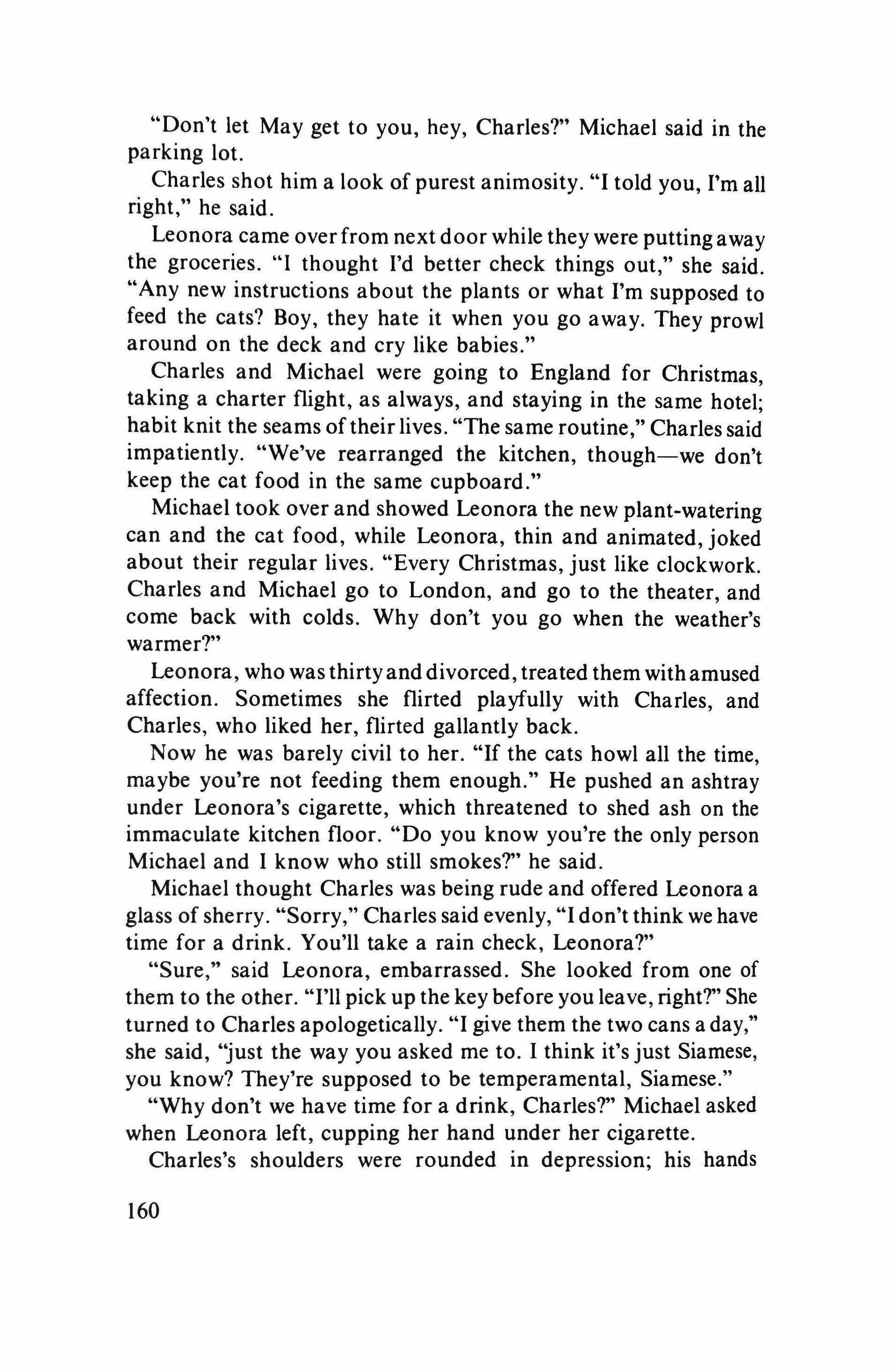
"Don't let May get to you, hey, Charles?" Michael said in the parking lot.
Charles shot him a look of purest animosity. "I told you, I'm all right," he said.
Leonora came over from next door while they were putting away the groceries. "I thought I'd better check things out," she said. "Any new instructions about the plants or what I'm supposed to feed the cats? Boy, they hate it when you go away. They prowl around on the deck and cry like babies."
Charles and Michael were going to England for Christmas, taking a charter flight, as always, and staying in the same hotel; habit knit the seams oftheir lives. "The same routine," Charles said impatiently. "We've rearranged the kitchen, though-we don't keep the cat food in the same cupboard."
Michael took over and showed Leonora the new plant-watering can and the cat food, while Leonora, thin and animated, joked about their regular lives. "Every Christmas, just like clockwork. Charles and Michael go to London, and go to the theater, and come back with colds. Why don't you go when the weather's warmer?"
Leonora, who was thirty and divorced, treated them with amused affection. Sometimes she flirted playfully with Charles, and Charles, who liked her, flirted gallantly back.
Now he was barely civil to her. "If the cats howl all the time, maybe you're not feeding them enough." He pushed an ashtray under Leonora's cigarette, which threatened to shed ash on the immaculate kitchen floor. "Do you know you're the only person Michael and 1 know who still smokes?" he said.
Michael thought Charles was being rude and offered Leonora a glass of sherry. "Sorry," Charles said evenly, "I don't think we have time for a drink. You'll take a rain check, Leonora?"
"Sure," said Leonora, embarrassed. She looked from one of them to the other. "I'll pick up the key before you leave, right?" She turned to Charles apologetically. "I give them the two cans a day," she said, "just the way you asked me to. 1 think it's just Siamese, you know? They're supposed to be temperamental, Siamese."
"Why don't we have time for a drink, Charles?" Michael asked when Leonora left, cupping her hand under her cigarette.
Charles's shoulders were rounded in depression; his hands

moved aimlessly along the kitchen counter. "I don't think we ought to go. I'm worried about Boyd. May shouldn't be alone."
"May's a strong woman. A tank. A bulldozer. Anyway, Boyd's not that bad. She works on you, Charles, she wants you to feel guilty."
"She has arthritis," Charles said heatedly "You saw her hands. She can't get her rings on."
"God," Michael said, "every Saturday morning." As ifthrough a lens, he saw the two of them,just as Charles must have seen Boyd sitting on his bed in the middle of the night. Two middle-aged men in a neat kitchen, surrounded by order and gleaming surfaces, getting older, waiting to die. "I'll go alone, then," he told Charles. "You move in with Boyd and May, measure out your life in teaspoons. Isn't that what May has in mind?"
Charles crumpled and put his face in his hands. "Michael," he said, his voice full of anguish, "he was looking for me. He thought I was lost. He was trying to go look for me."
Michael remembered Boyd before the stroke, Boyd's strong presence, his contempt. A big man with a big voice and big hands who'd never given up on Charles and once offered Michael money to go away. He went across the kitchen to Charles and gently pulled his hands away from his face. In the strong light Charles looked old.
"Charles," he said, "he isn't going to find you." "No," Charles said. "I'm sorry, Michael. Let's go out for lunch somewhere.
Charles went off to comb his hair while Michael waited in the kitchen, shaking as if from a sudden chill. He had caught Charles's fear as he caught Charles's colds, and he wondered: which ofthem, some middle of the night, would have to take the other's shoes away?

Bronsky tilted the soup plate to capture the last of his borscht. Though it was a dark afternoon on Broadway and the air in Steinberg's was cool and gray, the crown of his head was gleaming, as if lit by the energy within. Telling his story, he seemed to become small, vulnerable, old.
"So What do you say to such a person? I stop feeding the pigeons, I try to calm her down. But she goes on screaming at me, calling me 'Mr. Big Shot.' And swinging her shopping bag. I'm telling you, I was afraid to move an inch."
"She attacked you just for feeding the pigeons?"
He gave me one of his various shrugs, this one expressing bemusement. "Who knows? Clearly a maniac, but I'm no psychiatrist-and not even they understand them. Perhaps only the devil understands them."
"What did she look like?"
"Huge. A hulk. Legs like tree trunks. And wearing all these clothes: at least two coats, one on top of the other. And holding these shopping bags that bulged and rattled. Maybe she carried her
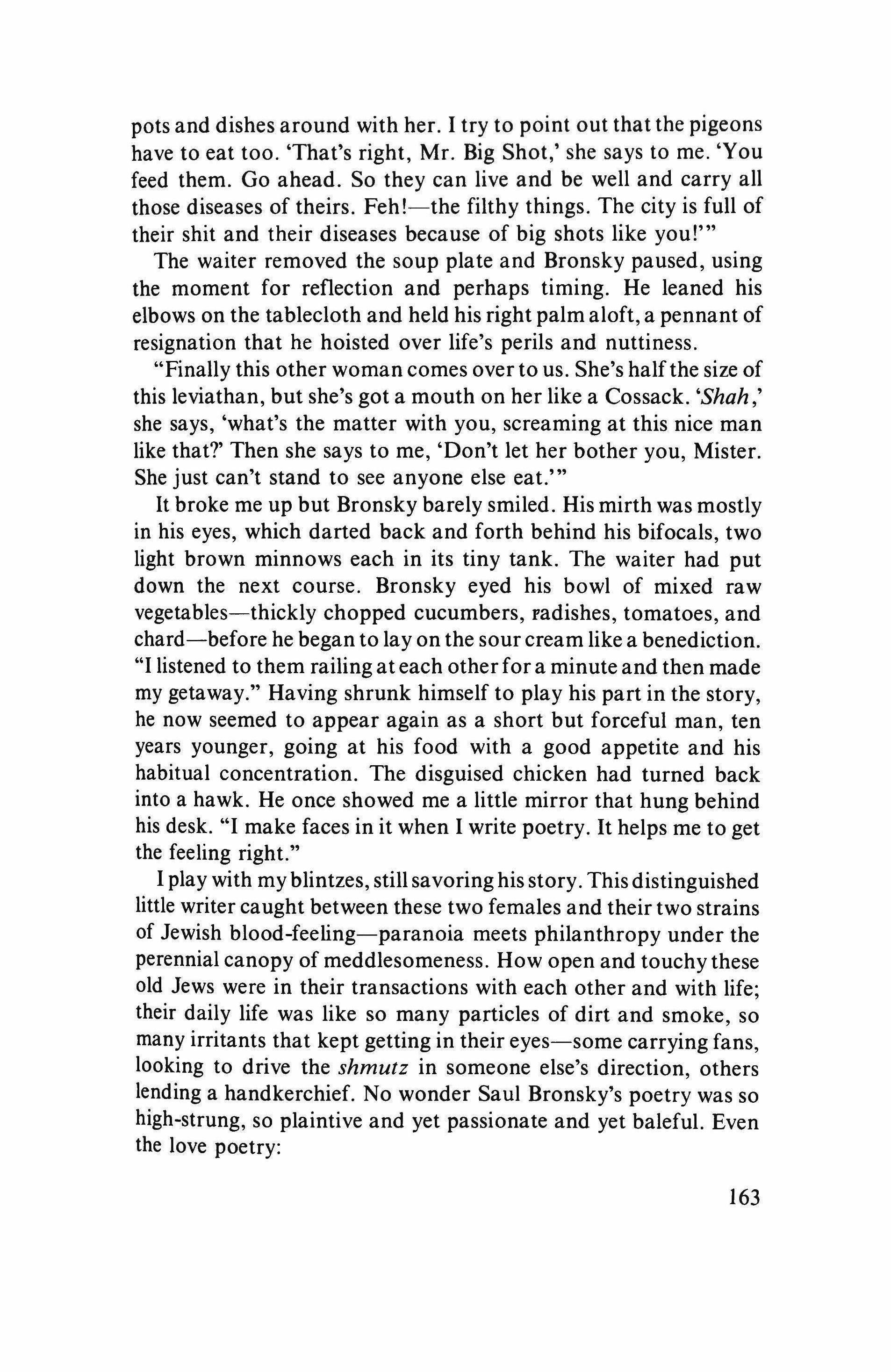
pots and dishes around with her. I try to point out that the pigeons have to eat too. 'That's right, Mr. Big Shot,' she says to me. 'You feed them. Go ahead. So they can live and be well and carryall those diseases of theirs. Feh!-the filthy things. The city is full of their shit and their diseases because of big shots like you!'"
The waiter removed the soup plate and Bronsky paused, using the moment for reflection and perhaps timing. He leaned his elbows on the tablecloth and held his right palm aloft, a pennant of resignation that he hoisted over life's perils and nuttiness.
"Finally this other woman comes over to us. She's halfthe size of this leviathan, but she's got a mouth on her like a Cossack. 'Shah,' she says, 'what's the matter with you, screaming at this nice man like that?' Then she says to me, 'Don't let her bother you, Mister. She just can't stand to see anyone else eat.'"
It broke me up but Bronsky barely smiled. His mirth was mostly in his eyes, which darted back and forth behind his bifocals, two light brown minnows each in its tiny tank. The waiter had put down the next course. Bronsky eyed his bowl of mixed raw vegetables-thickly chopped cucumbers, radishes, tomatoes, and chard-before he began to lay on the sour cream like a benediction. "I listened to them railing at each other for a minute and then made my getaway." Having shrunk himself to play his part in the story, he now seemed to appear again as a short but forceful man, ten years younger, going at his food with a good appetite and his habitual concentration. The disguised chicken had turned back into a hawk. He once showed me a little mirror that hung behind his desk. "I make faces in it when I write poetry. It helps me to get the feeling right."
I play with my blintzes, still savoring his story. This distinguished little writer caught between these two females and their two strains of Jewish blood-feeling-paranoia meets philanthropy under the perennial canopy of meddlesomeness. How open and touchy these old Jews were in their transactions with each other and with life; their daily life was like so many particles of dirt and smoke, so many irritants that kept getting in their eyes-some carrying fans, looking to drive the shmutz in someone else's direction, others lending a handkerchief. No wonder Saul Bronsky's poetry was so high-strung, so plaintive and yet passionate and yet baleful. Even the love poetry:

Give me your arms for shelter. Gentle me through the night. Your long hair is like a refuge From all the bitter ghosts. Your breasts are warm as mothers' hands That relieve the ague of dreams. Between your legs Ifind The only balm that soothes
The abrasions of our days
Theforlornness of our ways.
It's much better in its original Yiddish, of course-a language orchestrated for sardonic lament and perplexed yearning: so many generations camped on the rim of existence, polishing the expressions and intonations of exile, persecution, hunger, crowdedness, messianic vertigo. Permanently chosen by God, permanently ostracized by almost everyone else, they cultivated two languages-one for waiting and the other for coping. No wonder the latter was so rich in irony and despair as well as heartfulness. Bronsky'sspecialty was the dark side of Yiddishkeit, a disciple of Moshe Leib Halpern. Yet, bent now over his vegetables, heartily picking, sniffing, munching his way, a man who seemed to eat with four of his five senses, he hardly seemed burdened by this consciousness. Like his nights, his days had their sources of consolation. You could see that in his clothes-an expensive, even natty ensemble of Harris tweed set off by a lemon shirt and tan mohair tie. His wardrobe came from the spiffier stores-Saks, Bloomingdale's, Rogers Peet -by way of Orchard Street. His love of good clothes and his love of dramatic bargains went hand in hand. "I dress like a publisher on the income of a poet," he liked to say. Actually, he had lived mostly on his wife's income, like many other Yiddish writers or, for that matter, like many of the assimilated West Side and Village intellectuals who managed to hold on to that male prerogative of the East European tradition. Bronsky's wife, Bella, had risen from a seamstress to a designer of housedresses, and they lived comfortablyand more or less amicably. Saul had his freedom and Bella had well, as someone once put it, "a sense of history." But his young years as a presser and his later ones as a penny journalist were still on tap in his psyche, creating a curious mixture of extravagance and parsimony. He was always offering to take me with him on his Sunday morning expeditions to the Lower East
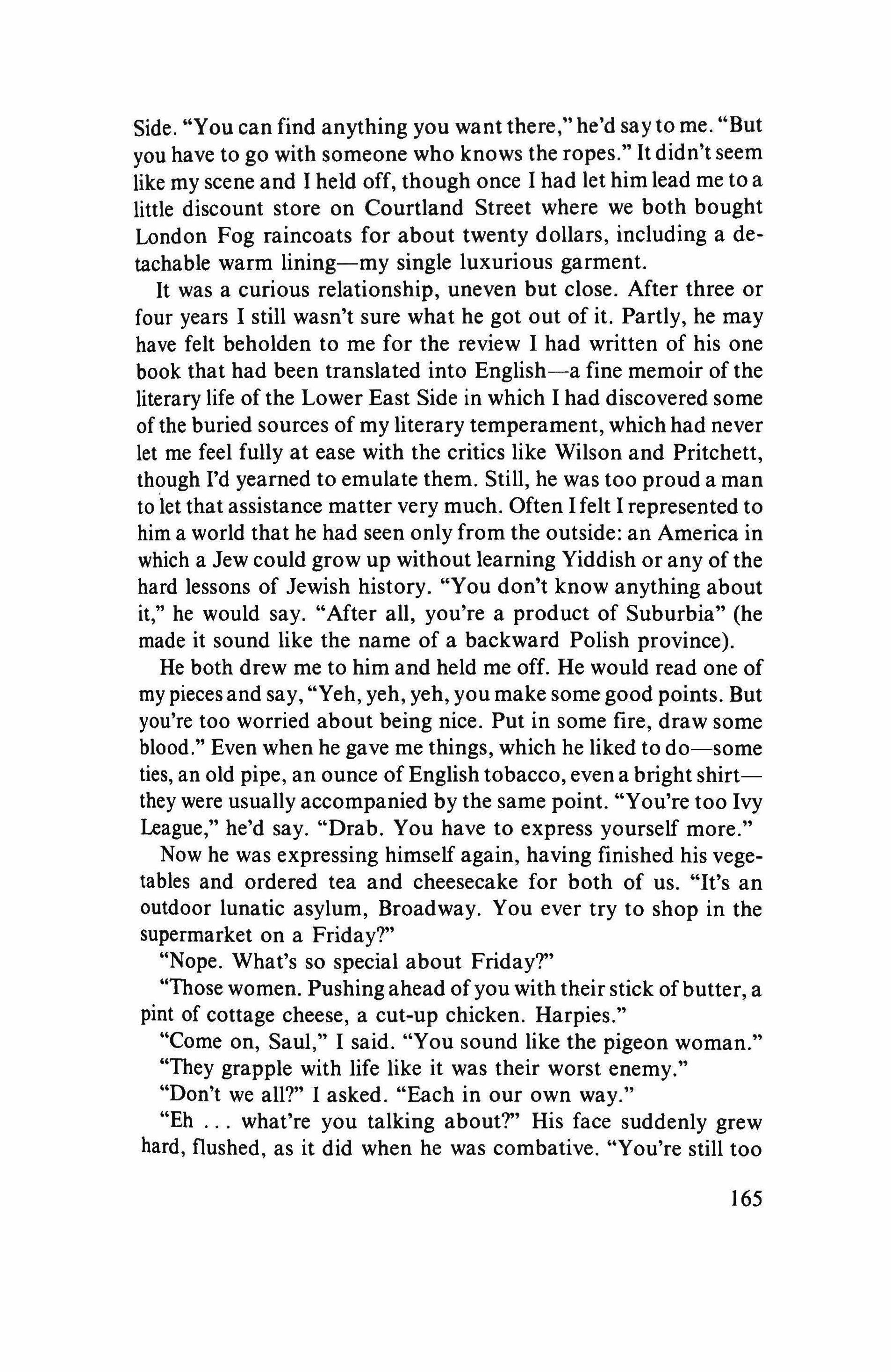
Side. "You can find anything you want there," he'd say to me. "But you have to go with someone who knows the ropes." It didn't seem like my scene and I held off, though once I had let him lead me to a little discount store on Courtland Street where we both bought London Fog raincoats for about twenty dollars, including a detachable warm lining-my single luxurious garment.
It was a curious relationship, uneven but close. After three or four years I still wasn't sure what he got out of it. Partly, he may have felt beholden to me for the review I had written of his one book that had been translated into English-a fine memoir of the literary life of the Lower East Side in which I had discovered some of the buried sources of my literary temperament, which had never let me feel fully at ease with the critics like Wilson and Pritchett, though I'd yearned to emulate them. Still, he was too proud a man to let that assistance matter very much. Often I felt I represented to him a world that he had seen only from the outside: an America in which a Jew could grow up without learning Yiddish or any of the hard lessons of Jewish history. "You don't know anything about it," he would say. "After all, you're a product of Suburbia" (he made it sound like the name of a backward Polish province).
He both drew me to him and held me off. He would read one of my pieces and say, "Yeh, yeh, yeh, you make some good points. But you're too worried about being nice. Put in some fire, draw some blood." Even when he gave me things, which he liked to do-some ties, an old pipe, an ounce of English tobacco, even a bright shirtthey were usually accompanied by the same point. "You're too Ivy League," he'd say. "Drab. You have to express yourself more."
Now he was expressing himself again, having finished his vegetables and ordered tea and cheesecake for both of us. "It's an outdoor lunatic asylum, Broadway. You ever try to shop in the supermarket on a Friday?"
"Nope. What's so special about Friday?"
"Those women. Pushing ahead of you with their stick ofbutter, a pint of cottage cheese, a cut-up chicken. Harpies."
"Come on, Saul," I said. "You sound like the pigeon woman."
"They grapple with life like it was their worst enemy."
"Don't we all?" I asked. "Each in our own way."
"Eh what're you talking about?" His face suddenly grew hard, flushed, as it did when he was combative. "You're still too

young for such pessimism. Where do you get it from? Trilling? Saul Bellow? To my crowd, life was a woman-desirable ifdifficult. So I don't grapple. I touch, I embrace, I savor. I also watch my step." He sat back, the blood of his convictions still in his face.
What could one say? As it happened, an alluring young woman had sat down a few minutes before at a table near us. I looked again at the fine oval of her face formed by the smooth curve ofher black hair, her almond eyes. Just my type. Was she like life? It was painful to think so, for I would never know her. Though only thirty-three, I had been married a Jong time, and such women always passed across the horizon of my experience and then were gone.
"Yeh, yeh, yeh," Bronsky was saying, having followed my eyes. "She's a knockout. You have good taste, but where's your appetite? You don't even know how to look."
"Come on. What do you have to know to look? I'm lookingright now."
"Wrong," he announced. "You're not really looking at her. To really see a beautiful woman like her, you have to make her know you're looking at her. You have to hold her eyes, make a connection, establish the rapport. Then you're looking. Not at her. Into her."
As always in the matter of women, he had a point, the amorist's point. He was crazy about women and it had made him wise. He hadn't an ounce of guilt, I'd figured out, and so he saw women directly and behaved the same way. Experience and desire made up a formidable combination in him: he was both assured and, though he was sixty, positively boyish-looking when he was flirting. And of course women picked up the energy, the warmth of his voice, the liveliness in his eyes, the confident suggestiveness, already an intimacy, and would open to him, relax, present their femininity. I had seen it happen several times. He could get closer to a woman in a few exchanges than I could have in an hour of dancing.
"Any new conquests?" I asked, not only out of curiosity.
He shrugged, palms up, with the little smile of the millionaire speculator being asked if he had made any money recently. "I've been giving a few lectures. You know what can happen on the road."
With Bronsky I could imagine. On the podium he was a charmer,

as I had found to my chagrin. We had once shared one at the 92nd Street YMHA on "The Problem of Identity in Jewish Writing in America." He had asked to go first because, as he whispered to the chairman, what he had to say "could put the whole question in the right perspective." He had then given his standard speech about the days and ways of the modern Yiddish writers, leavened with Yiddishisms, stuffed with touching anecdotes, and spiced with some of the feuds and scandals. Delicious fare right from the Cafe Royale that the audience gobbled up. At the end, he triumphantly announced, taking up for the first time the subject at hand, that if the acculturated writers of today would only learn Yiddish and write like Jews, there would be no problems of identity. The applause went on and on. He walked past me and said, "Your turn."
"Last week," he was saying now, "I was at Michigan University. In Ann Arbor. A very nice crowd." The gruffness in his voice was already melting a bit. "You know, when I give a lecture, I first find the prettiest woman in the audience and talk to her. That way I rescue myself from my own banality."
"I was wondering how you do it," I said.
"Sure. How many times can you give the same lecture? You need a gimmick."
He called the waiter over to clear the dessert dishes, put his elbows on the table, and prepared for business. His gaze became both detached and impish; a story-telling mood was coming over him. "So there is this woman with a luscious throat in the fourth or fifth row. I look at her. She looks back. Her eyes are bright with interest, with the occasion; she looks like a nice street after it has rained and the sun has just come out. Her hair is a little gray, but so what? A mature woman-the way I like them. So I mostly speak the whole thing to her. My muse of the moment. Then today I get a letter." From out of his Hickey Freeman jacket he drew an envelope and sniffed it, and then unfolded a square of light green notepaper, as intimate as a scarf. He began to read:
Dear Saul Bronsky:
[hope you won't mindif[use yourfirst name. I'm taking a liberty even by writing to you like this. But [feel close to you and have ever since your lecture on March 27 at Hillel in Ann Arbor. Your lecture, "A Place at the Table: Reminiscences of a Yiddish Writer." was music to my ears. Yiddish
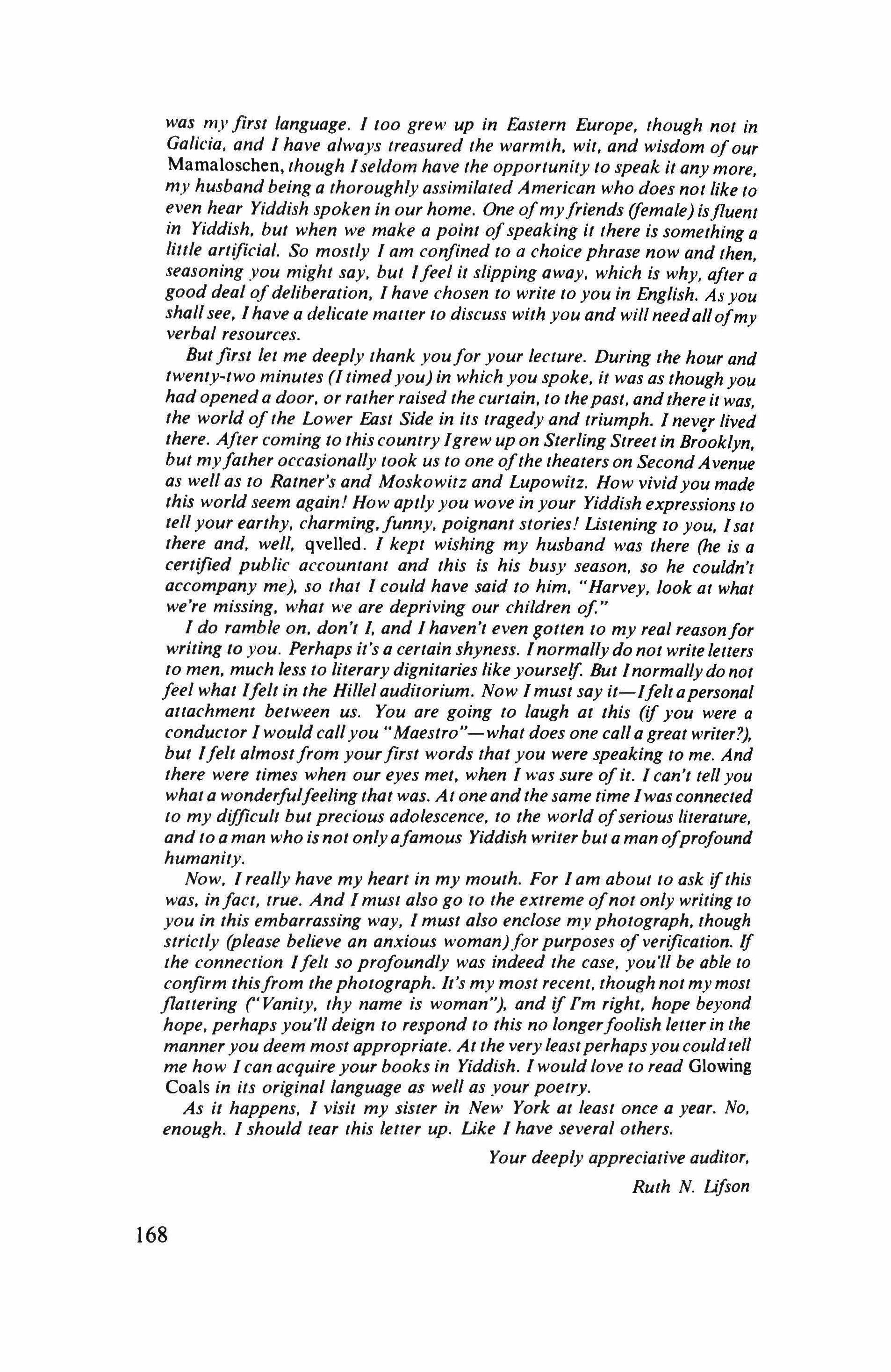
was my first language. I too grew up in Eastern Europe, though not in Galicia, and I have always treasured the warmth, wit, and wisdom of our Mamaloschen, though Iseldom have the opportunity to speak it any more, my husband being a thoroughly assimilated American who does not like to even hear Yiddish spoken in our home. One ofmyfriends (female) isfluent in Yiddish, but when we make a point ofspeaking it there is something a little artificial. So mostly I am confined to a choice phrase now and then, seasoning you might say, but Ifeel it slipping away, which is why, after a good deal ofdeliberation, I have chosen to write to you in English. As you shall see, I have a delicate matter to discuss with you and will needallofmy verbal resources.
But first let me deeply thank youfor your lecture. During the hour and twenty-two minutes (I timedyou) in which you spoke, it was as though you had opened a door, or rather raised the curtain, to thepast, and there it was, the world of the Lower East Side in its tragedy and triumph. I never lived there. After coming to this country Igrew up on Sterling Street in Br�oklyn, but myfather occasionally took us to one ofthe theaters on Second Avenue as well as to Ratner's and Moskowitz and Lupowitz. How vividyou made this world seem again! How aptly you wove in your Yiddish expressions to tell your earthy, charming,funny, poignant stories! Listening 10 you, I sat there and, well, qvelled. I kept wishing my husband was there (he is a certified public accountant and this is his busy season, so he couldn't accompany me), so that I could have said to him, "Harvey, look at what we're missing, what we are depriving our children of"
I do ramble on, don't I, and I haven't even gotten to my real reasonfor writing 10 you. Perhaps it's a certain shyness. Inormally do not write leiters to men, much less to literary dignitaries like yourself. But Inormally do not feel what Ifelt in the Hillel auditorium. Now I must say it=Lfelt apersonal attachment between us. You are going to laugh at this (if you were a conductor I would callyou"Maestro"-what does one call a great writer?), but Ifelt almostfrom yourfirst words that you were speaking to me. And there were times when our eyes met, when I was sure of it. I can't tell you what a wonderfulfeeling that was. At one and the same time I was connected to my difficult but precious adolescence, to the world ofserious literature, and to a man who is not onlyafamous Yiddish writer bur a man ofprofound humanity.
Now, I really have my heart in my mouth. For I am about to ask ifthis was, in fact, true. And I must also go to the extreme ofnot only writing to you in this embarrassing way, I must also enclose my photograph, though strictly (please believe an anxious woman)for purposes ofverification. If the connection Ifelt so profoundly was indeed the case, you'll be able to confirm thisfrom the photograph. It's my most recent, though not my most flattering (" Vanity, thy name is woman"), and if I'm right, hope beyond hope, perhaps you'll deign to respond to this no longerfoolish letter in the manner you deem most appropriate. At the very leastperhaps you couldtell me how I can acquire your books in Yiddish. I would love to read Glowing Coals in its original language as well as your poetry.
As it happens, I visit my sister in New York at least once a year. No, enough. I should tear this letter up. Like I have several others.
Your deeply appreciative auditor, Ruth N. Lifson

"Is that all?" I asked.
"There's a P. S. but she crossed it out." The letter sat between us, as present as another person. Then he folded it up again and returned it to the envelope, from which I could see a corner of a photograph protruding.
"You devil," I said. "That's what you get with your looking into the eyes of the prettiest woman. What's that poor woman to do now?"
He ignored my question, still distant, bemused, his face a study of some complex of feeling-pride, tenderness, irony, who knows? He looked old and young at the same time. Then it broke, the two minnows twinkled in their tanks, he opened his palms in the eternal way, and said, "You know what? She wasn't the woman."
"Then how come ?"
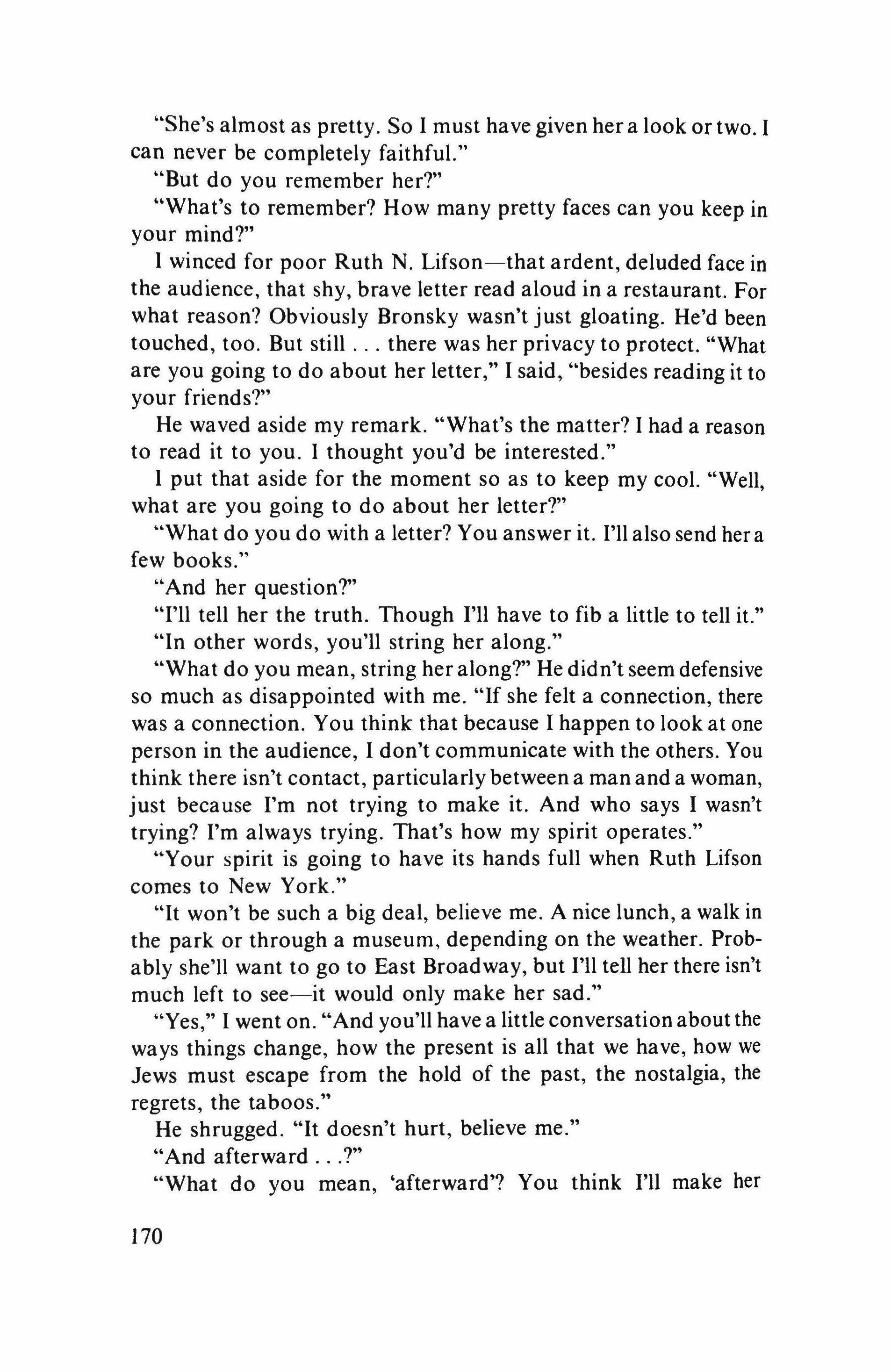
"She's almost as pretty. So I must have given her a look or two. I can never be completely faithful."
"But do you remember her?"
"What's to remember? How many pretty faces can you keep in your mind?"
I winced for poor Ruth N. Lifson-that ardent, deluded face in the audience, that shy, brave letter read aloud in a restaurant. For what reason? Obviously Bronsky wasn't just gloating. He'd been touched, too. But still there was her privacy to protect. "What are you going to do about her letter," I said, "besides reading it to your friends?"
He waved aside my remark. "What's the matter? I had a reason to read it to you. I thought you'd be interested."
I put that aside for the moment so as to keep my cool. "Well, what are you going to do about her letter?"
"What do you do with a letter? You answer it. I'll also send her a few books."
"And her question?"
"I'll tell her the truth. Though I'll have to fib a little to tell it."
"In other words, you'll string her along."
"What do you mean, string her along?" He didn't seem defensive so much as disappointed with me. "If she felt a connection, there was a connection. You think that because I happen to look at one person in the audience, I don't communicate with the others. You think there isn't contact, particularly between a man and a woman, just because I'm not trying to make it. And who says I wasn't trying? I'm always trying. That's how my spirit operates."
"Your spirit is going to have its hands full when Ruth Lifson comes to New York."
"It won't be such a big deal, believe me. A nice lunch, a walk in the park or through a museum, depending on the weather. Probably she'll want to go to East Broadway, but I'll tell her there isn't much left to see-it would only make her sad."
"Yes," I went on. "And you'll have a little conversation about the ways things change, how the present is all that we have, how we Jews must escape from the hold of the past, the nostalgia, the regrets, the taboos."
He shrugged. "It doesn't hurt, believe me."
"And afterward ?"
"What do you mean, 'afterward'? You think I'll make her

unhappy. She's unhappy now. She'll have a few hours of pleasure. Or a few days. What's the matter with you? Don't be so gallant. Women want pleasure; we all do. Gallantry is what you do so that she can come with you. Don't mix it up with the real thing. Besides, I'm not giving her a drug. She's a free agent."
"Come on, Saul." Each time he spoke, I seemed to have less and less ground to stand on. "Aren't you putting her under a spell-the spell of your reputation, your charm, your goddamn Yiddish? The truth is, you're seducing her. Let's face it."
"So she isn't seducing me, too. You think her letter was written by an innocent woman?"
"A very naive woman."
His face was hard and flushed again, his eyes cold. "You know who's naive? You're naive. God He looked around the restaurant and then held up his hand for the waiter. Perhaps it was that gesture, that assertion of his control. It wasn't just age, or even roles. The truth was that I had the morality and he had the energy, though between the schtetl and Suburbia, it was supposed to be the other way around. Be that as it may, we were no match. I felt the last ground on which I had stood level with him, man to man, begin to shake. Perhaps he was right, my morality was naive, it hadn't been lived. And then I saw them coming together, the shy but fervent housewife reaching out, if only this once, and the small, aging, but still potent amorist gathering her in. The power of their flesh, the biblical simplicity and glory of their sin, the horniness of Jacob and Samson, of David and Solomon, of those rabbinical students and their brides in the Yiddish stories, of the writers, actors, and actresses at the Royale-all that sensuality flowing through the history of this people, but somehow hidden to me.
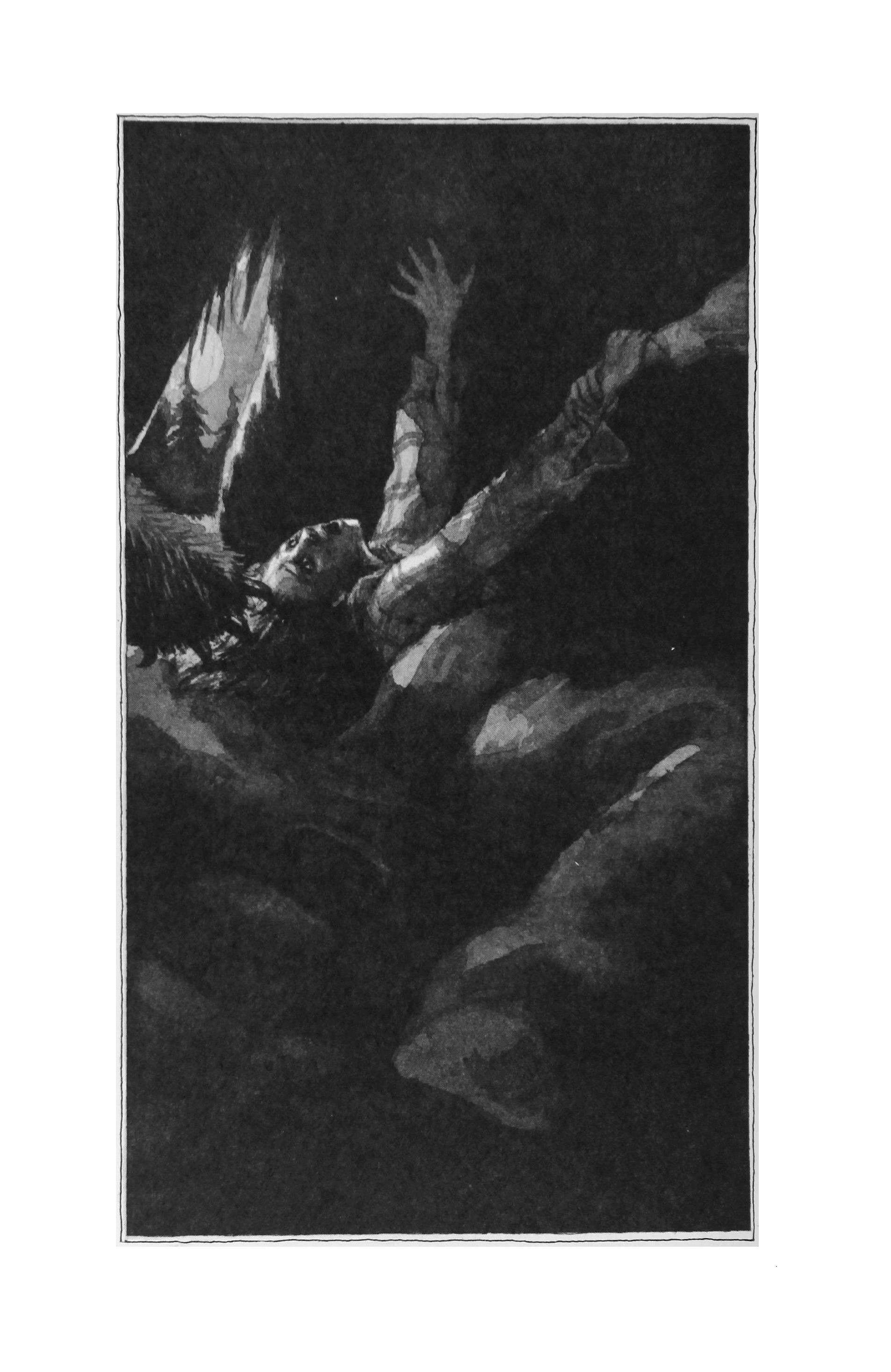

This time it was a girl Halverson knew, halfway eaten and her hair chewed off. She had been awake in the night; she had been afraid and whimpering as the great bear nudged at the side of the nylon tent like a rooting hog. She held to the other girl's hand, and only screamed when the long claws ripped her out of her sleeping bag, as she was being dragged away and the feathery down from the sleeping bag floated above the glowing coals of what had been a pine knot fire. This time it was someone he knew, and he was lying still in the darkness and the warmth of his home and understanding the long hesitation of knowing you were killed before you were dead.
Thinking was beyond the point. The last time Halverson lay awake like this, the first weekend the hard wind-drifted snow was plowed off the Going-to-the-Sun Highway over Logan Pass, it had been a fetus, not a fetus really, a child, stillborn, a baby girl dropped in a roadside trash container at the east end of Two Medicine Lake, to be found by workmen. A dead baby wrapped in a pink motel towel and thrown away. It could not have been anything like indifference which brought someone to such a burial. More like the need to get rid of what can happen. Walk into the wind and your eyes will water.

But in the beginning there was Darby, and the way Halverson saw her avoiding mirrors. Halverson had never lived with another full-time woman but his mother, and his mother had been gone to San Diego all these years. There was no explaining it to Darby, but early in May, when the aspen leaves along the middle fork of the Flathead were lime green and just emerging, Halverson began to think he saw what Darby was seeing when she quickly looked away from the long mirror she had hung in his bedroom. Halverson would glance up on evenings when she was home, and see Darby with her stockinged feet up on the hearth before the fire, intent on one of her magazines-the old issues of the National Geographic she collected and brought with her when she came to live with him -and he would see her as she would look when she was old. Her eyeglasses would be thicker and distorting her eyes until they were strange as the eyes of owls; eventually she would be fumbling and blind. Her hands would touch at things she could not see, tentative and exploring. If he stayed with her long enough there would be the time when she fell, the cracking of bone, a sound he could hear as he watched her turn the magazine pages, and some indeterminate time after that, he would be alone and old, his hands touching and exploring each thing in this familiar room as he talked to some memory of his father about sharpening a knife or the color of hatchery trout. The long hesitation would then be the rest of his life.
Halverson only told Darby that he would never have children if he had anything to say about it. As her eyes went gray he told her that he could not go on living with her, and that he would not ever try living with another woman. He told her they were all better off alone.
"I'm sorry," he said, expecting her to argue. But she only looked back to her magazine.
"No," she said. "It's not that."
The next night, when he came home from hauling cedar logs, his cabin was filled with chairs and tables made of twisted and shellacked bamboo. Bright patterns of lavender and orange tropical flowers were splashed across the cushions. His old furniture was piled out in the pole barn where he sheltered the truck in winter. "Don't you think about worrying," Darby said. "This is all in my name. I'm making the payments. Fifty-seven dollars a month." There was a new canvas drop cloth over the chair on his side of the fireplace, so the fabric would stay clean.
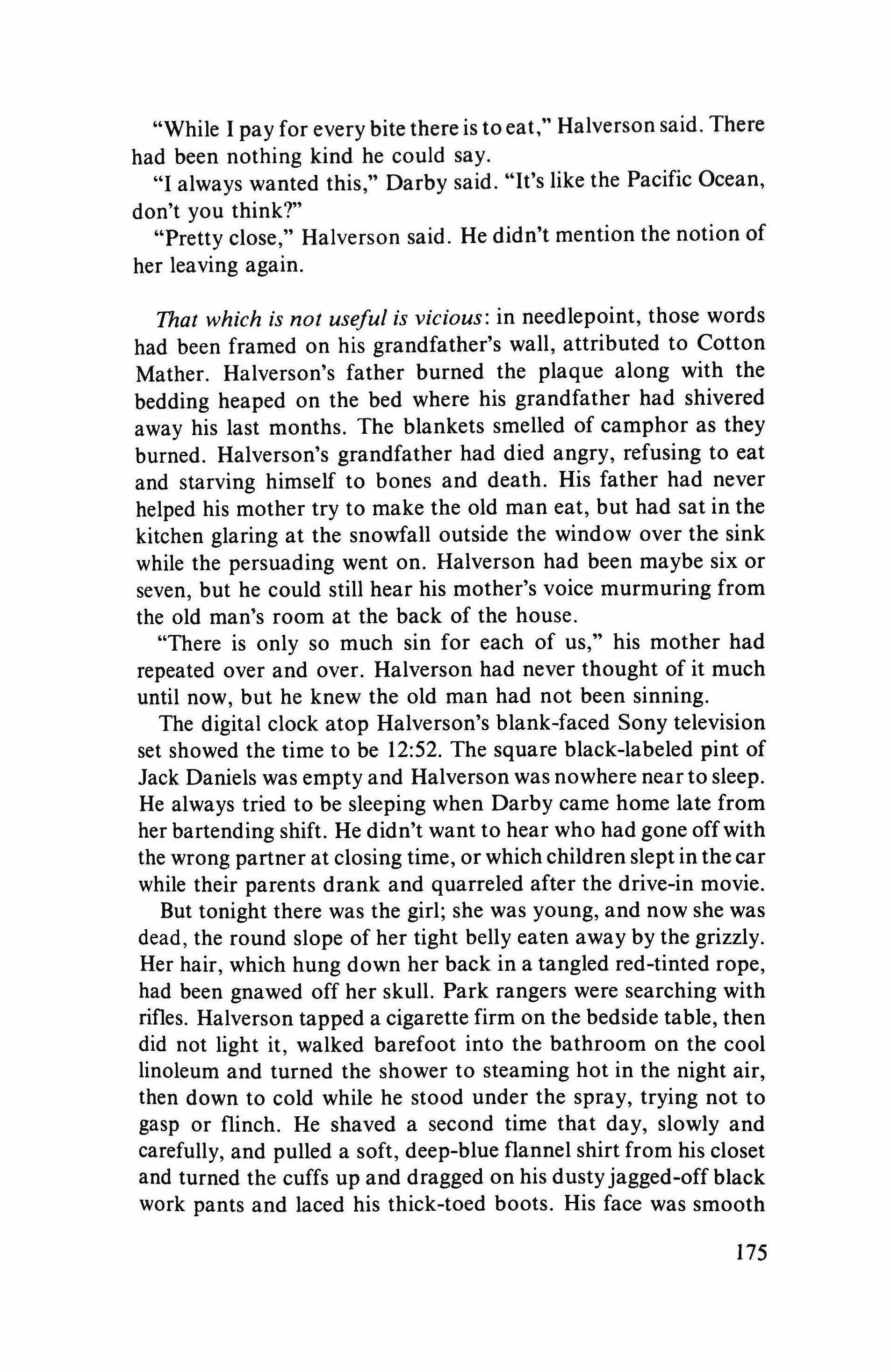
"While I pay for every bite there is to eat," Halverson said. There had been nothing kind he could say.
"I always wanted this," Darby said. "It's like the Pacific Ocean, don't you think?"
"Pretty close," Halverson said. He didn't mention the notion of her leaving again.
That which is not useful is vicious: in needlepoint, those words had been framed on his grandfather's wall, attributed to Cotton Mather. Halverson's father burned the plaque along with the bedding heaped on the bed where his grandfather had shivered away his last months. The blankets smelled of camphor as they burned. Halverson's grandfather had died angry, refusing to eat and starving himself to bones and death. His father had never helped his mother try to make the old man eat, but had sat in the kitchen glaring at the snowfall outside the window over the sink while the persuading went on. Halverson had been maybe six or seven, but he could still hear his mother's voice murmuring from the old man's room at the back of the house.
"There is only so much sin for each of us," his mother had repeated over and over. Halverson had never thought of it much until now, but he knew the old man had not been sinning.
The digital clock atop Halverson's blank-faced Sony television set showed the time to be 12:52. The square black-labeled pint of Jack Daniels was empty and Halverson was nowhere near to sleep. He always tried to be sleeping when Darby came home late from her bartending shift. He didn't want to hear who had gone offwith the wrong partner at closing time, or which children slept in the car while their parents drank and quarreled after the drive-in movie.
But tonight there was the girl; she was young, and now she was dead, the round slope of her tight belly eaten away by the grizzly. Her hair, which hung down her back in a tangled red-tinted rope, had been gnawed off her skull. Park rangers were searching with rifles. Halverson tapped a cigarette firm on the bedside table, then did not light it, walked barefoot into the bathroom on the cool linoleum and turned the shower to steaming hot in the night air, then down to cold while he stood under the spray, trying not to gasp or flinch. He shaved a second time that day, slowly and carefully, and pulled a soft, deep-blue flannel shirt from his closet and turned the cuffs up and dragged on his dustyjagged-off black work pants and laced his thick-toed boots. His face was smooth

and slick as he rubbed at his eyes, thinking: just this one time, just tonight, another drink.
The girl who died had worked in the bar where Darby worked. Halverson stopped in each evening for his pint ofJack Daniels and a glass or two ofbeer, and hadjoked with her only nights ago about how she was going to be stuck in this country if she stayed much longer. "Five years you can't help going native." It had been something to say while she rang up the pint. She was a dark and not exceptionally pretty girl who had come west from a rich suburb of Columbus, Ohio. She had quit the Wildlife Biology School down in Missoula and come to Columbia Falls with a boy who sold cocaine to the skiers in Whitefish and spent his summers climbing mountains. Halverson wondered what happened to you with cocaine. When the boy was caught and sentenced to five years in the state prison at Deer Lodge, maybe three years to probation, she took the barmaid job and said she was waiting. According to Darby, she had been; there hadn't been any fooling around. That was how much anybody knew. Tonight they were no doubt talking about her, chipping in dollars to the collection for flowers and signing the card for her parents, at least thinking about her and maybe about what his father had once called the natural way of dying. Halverson and his father had been camping in the high country of the park, over the ridge from where the tourists were sleeping in the Sperry Chalet. His father flipped the fish bones from his plate into the fire. "You figure it out," he said, "and it's more natural than anything." He grinned at Halverson. "Maybe them cannibals were onto something."
Now, Halverson drove down the canyon from his cabin toward the neon thickness of light over Columbia Falls. Outside the tavern he parked and listened to the soft racketing of the tappets in his Land Rover. Nobody said anything when he had stopped in earlier, buying the pint. He learned of the girl's death while reading the Hungry Horse newspaper and eating a chicken-fried steak. They had all known and not said anything, which might have been obeying one of his grandfather's rules for these times: do not bay at the moon.
The old man had watched his wife of nearly fifty years, Halverson's grandmother, withering of diabetes, her left legamputated at the calf and again at mid-thigh and the old woman dying of gangrene anyway, and after she was dead he claimed he had

learned that crying will get you nowhere but sadder. But in another year he was refusing to eat. No point in it. Just as there was nothing for Halverson to do in that barroom but have four or five drinks while Darby finished her shift, and then drive the truck hung over and spooky the next day.
So Halverson sat watching the beer signs flicker on and off and then drove home. Below the cabin, he parked the Land Rover beside the shadowy chrome gilt bulk of his 350 Kenworth diesel log-hauling truck. Halverson spent his working days drifting the truck down the narrow asphalt alongside the Flathead River, hauling cedar logs to the shake mill below Hungry Horse. The amber-hearted cedar smelled like medicine ought to smell. The work was like a privilege, mostly asphalt under the tires and those logs. And now he was quitting.
Halverson climbed up and sat in the Kenworth, snapped on the headlights so they shone into the scrub brush at the edge of the timber. He was not going out the next morning. The truck was ready, log bunks chained down for the trip into the mountains before sunrise, but he was waiting for the red transfixed eyes of some rodent or porcupine in his headlights, and he was not going to work come morning.
He was imagining the bear. The dished face of the great animal would rear up simple and inquisitive from vines where serviceberries hung thick as wine grapes. The dark nose would be a target under the cross hairs. The sound of the shot would reverberate between the mineral-striped walls of the cirque, where the glaciers had spent their centuries eating away rock. Far away a stone would be dislodged and come rattling down over the slide. The squareheaded peaks would dampen the sound to silence.
Halverson could hear the stone clattering on other stones after the echo of the shot diminished to nothing, but he could not see the animal falling, or if the head would explode. Then he could no longer even imagine the sound ofthe shot, but he knew what he was going to do next. Halverson shut off the headlights on the Kenworth and went into the cabin and punched off the alarm, and was satisfied to sleep.
The girl had died two nights ago in the far backcountry of Glacier Park. With another girl, she camped at the distant eastern end of Quartz Lake in the Livingston Range where no trails were cut through the deadfall lodgepole along the shore, the section of

the park kept closest to true wilderness, miles from other campers. It was territory Halverson knew, from those late summer encampments his father had called vacations. All his working life Halverson's father had drawn wages from the park: trail crew supervisor in the summer and snow clearance in the winter, feeding baled hay to the elk and deer during the really bad winters. Each September after the Labor Day tourists had gone home, his father took time to camp in the backcountry, to hide out, as he said, and let his whiskers grow and learn to smell himself again. You go and forget who you are, his father said, when you never get wind of yourself. The time that don't count, his father liked to say, meaning a thing John Muir said about wandering the mountains: the time that will not be subtractedfrom the sum of your life. But something had been subtracted. His father died of a heart seizure, defibrillation the doctors called it, when he was thirty-nine years old. There was a winter morning when Halverson's mother stood in the lighted bedroom doorway, saying to Halverson, "Don't you come in here." Then there was the door closing, and her shrieking. You don't come in here! After a while she was quiet, and then came out and closed the door and washed her face, and turned and said, he is dead.
Halverson was forty-two now, three years older than his father had been when he died. He had not been in the park, except to shortcut through, since the funeral. What year could that have been?
The girl who survived told of awakening to hear the bear grunting outside the tent, and the other girl whimpering. What I thought, the girl said, is thank God it is over there. That was all I could think, like I knew there was a bear outside and couldn't think of its name. The girl who survived told how they held hands, and tried to stay quiet. Then the nylon tent ripping away and a sight of the quarter moon and the vast dark animal dragging the girl who was killed from her sleeping bag, their hands touching the last time, and the beginning of the screaming, really just long breathless shrieking as the bear killed her. That was the way she said it, the girl who survived, he just dragged her away and killed her. After a while, the girl said, I climbed a tree. The insides of her thighs were torn by the bark. But it didn't make any difference, the girl said, he didn't come, he didn't want me.
The girl spent most of the next day making her way out along the

six-mile rocky shoreline of Quartz Lake, back toward the trails and other hikers. Before nightfall the hunt began. Rangers with rifles dropped at the shore of the lake from helicopters and discovered the half-eaten, mostly buried body. Halverson burned the newspaper in his fireplace, and looked around at Darby's flowered furniture, thinking of her notion of making a getaway to some Pacific island. "Marlon Brando did it," Darby said, "and he has all the money there is." As if you needed to get away when you had all the money there was. But she was right, the point was hiding out. Make a strike, and slide away.
"Three or four days," Halverson told Darby. He grinned at her. "You do some bowling or something." He didn't tell her he was heading out of Montana, over to Spokane where nobody would know him, to buy a rifle.
"Which one is it?"
"Nobody," he said. "I wouldn't be chasing a woman."
Halverson spent two days talking to gun men in the surplus houses and sporting goods stores, and ended up spending $440 for a falling block Ruger # 1, fitted out with a Redfield 3x9 variable wide-angle scope, and firing a .458 Winchester magnum bullet. One reasonably placed shot would kill anything native to North America, really anything anywhere, the salesman said, except for maybe a whale. Except for maybe a blue whale, and there were not many of them left. The salesman laughed, but then shook his head like there was nothing funny about dead whales·.
The walnut stock swung hard and secure against his shoulder, and the mechanism worked with heavy, poised delicacy. The series of simple firing motions could be performed in two or three seconds, which was important, because the grizzly is fast as a thoroughbred horse: three hundred yards in twenty seconds on level ground. But the rifle was extravagantly accurate at distance. Breathe, hold, and fire with the soft draw of the fingertip, and the animal would be dead. There should be no need for speed.
Late the second afternoon Halverson drove to a gun club north of Spokane, beyond the industrial park around the Kaiser aluminum plant, and fired nine rounds at range targets, three more for pleasure. The pattern of the last three rounds, at two hundred yards, was smaller than the spread of his fingers: all into the back of the throat, inside past the carnivorous fangs and into the soft and
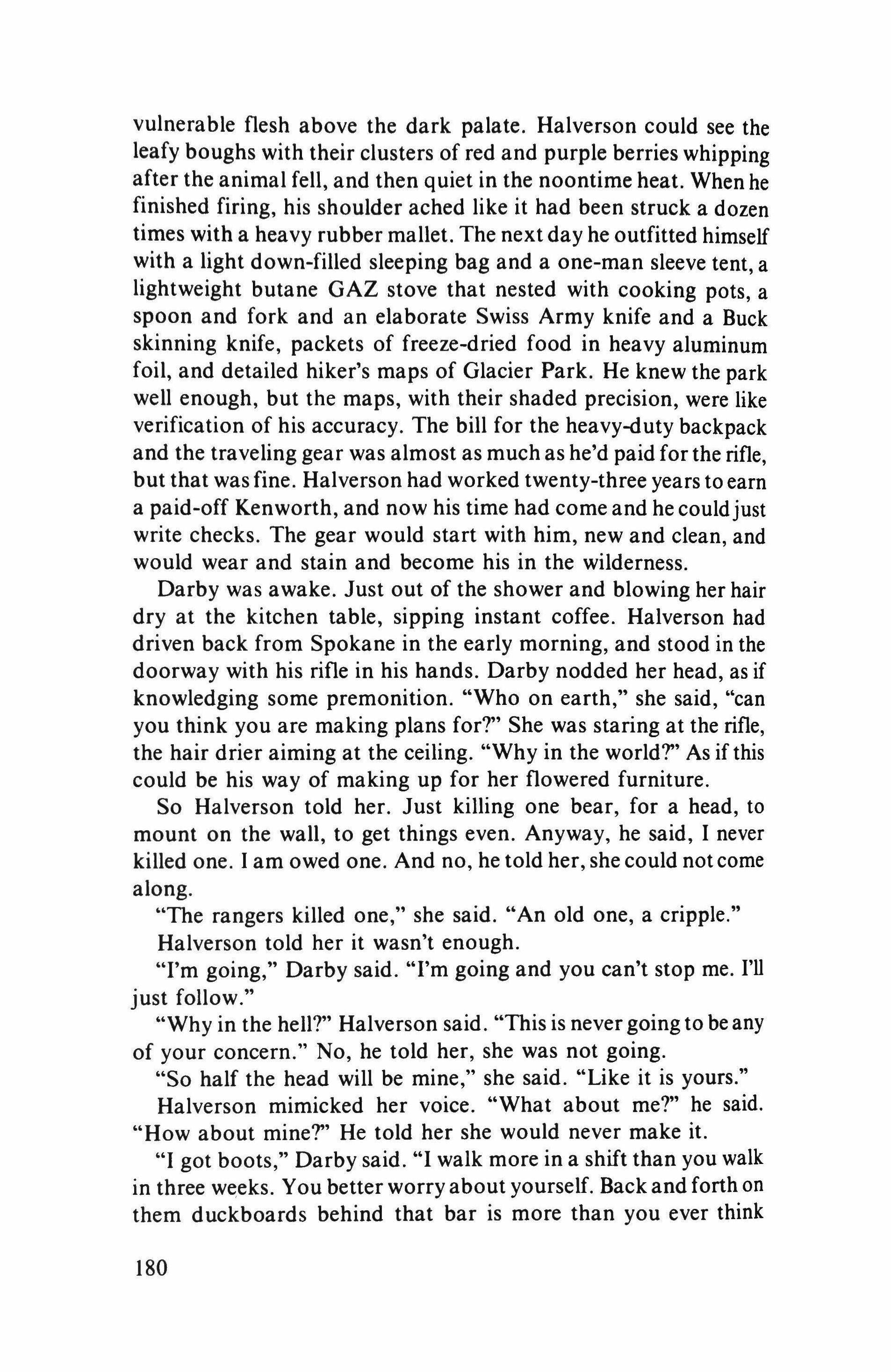
vulnerable flesh above the dark palate. Halverson could see the leafy boughs with their clusters of red and purple berries whipping after the animal fell, and then quiet in the noontime heat. When he finished firing, his shoulder ached like it had been struck a dozen times with a heavy rubber mallet. The next day he outfitted himself with a light down-filled sleeping bag and a one-man sleeve tent, a lightweight butane GAZ stove that nested with cooking pots, a spoon and fork and an elaborate Swiss Army knife and a Buck skinning knife, packets of freeze-dried food in heavy aluminum foil, and detailed hiker's maps of Glacier Park. He knew the park well enough, but the maps, with their shaded precision, were like verification of his accuracy. The bill for the heavy-duty backpack and the traveling gear was almost as much as he'd paid for the rifle, but that was fine. Halverson had worked twenty-three years to earn a paid-off Kenworth, and now his time had come and he couldjust write checks. The gear would start with him, new and clean, and would wear and stain and become his in the wilderness.
Darby was awake. Just out of the shower and blowing her hair dry at the kitchen table, sipping instant coffee. Halverson had driven back from Spokane in the early morning, and stood in the doorway with his rifle in his hands. Darby nodded her head, as if knowledging some premonition. "Who on earth," she said, "can you think you are making plans for?" She was staring at the rifle, the hair drier aiming at the ceiling. "Why in the world?" As if this could be his way of making up for her flowered furniture.
So Halverson told her. Just killing one bear, for a head, to mount on the wall, to get things even. Anyway, he said, 1 never killed one. 1 am owed one. And no, he told her, she could not come along.
"The rangers killed one," she said. "An old one, a cripple."
Halverson told her it wasn't enough.
"I'm going," Darby said. "I'm going and you can't stop me. I'll just follow."
"Why in the hell?" Halverson said. "This is never going to be any of your concern." No, he told her, she was not going.
"So half the head will be mine," she said. "Like it is yours."
Halverson mimicked her voice. "What about me?" he said. "How about mine?" He told her she would never make it.
"I got boots," Darby said. "I walk more in a shift than you walk in three weeks. You better worry about yourself. Back and forth on them duckboards behind that bar is more than you ever think

about walking. What you should do is get in some running. Before the moon comes back, you should get in better shape than you are. I can carry food, extra than you can, think of that, and you should quit shaving." The blue plastic hair drier looked like a thickbarreled weapon as she shook it while she talked, and the silence after she shut off its whirring called Halverson to see how loud and positive they had been talkingagainst one another. There had been the years of climbing through the brush, setting three-quarter inch cable choker behind the D-8 skid Cats when he was breaking in, and then more years bucking a chain saw up those mountains and falling timber, all those years until he had the money for the down payment on the Kenworth, and he was hard as he would ever need to be. Halverson thought of telling her about how many years he had worked to be in shape for just this, but after she shut off the hair drier, he didn't say a thing. He thought oftelling her to piss up a rope, but kept quiet.
"You come out here." Halverson crossed the kitchen and stood in the open back door, fishing in his coat pocket for a cartridge, and then slipping the round into the firing chamber. "You shoot this thing and see. You just see." Darby followed him barefoot out into the weedy lot, and he showed her how to set up with the rifle, her hands small and white against the stained walnut stock. She almost couldn't reach the trigger.
Halverson was surprised by how quick she fired, the roar as she cast a shot toward the timbered hillside. She stepped backward from the recoil, but only for a moment, crouched and regaining her balance, did she look bewildered.
"You should know something. You are not the first one to try that trick. I been mixed with you wise-assed boys before." She grinned like a child in the morning sunlight.
"Have it the way you like."
For three weeks, while they waited on the full moon, Halverson kept on driving his truck and ran in the evenings while Darby went on pulling her bartending shift. He gave up on the Jack Daniels and slept anyway. He lost weight and quit smoking, and felt he was becoming less than himself.
They crossed at Polebridge over the North Fork of the Flathead River almost at midnight under a full moon as they had planned, carrying food for weeks, the freeze-dried stuff in aluminum pack-
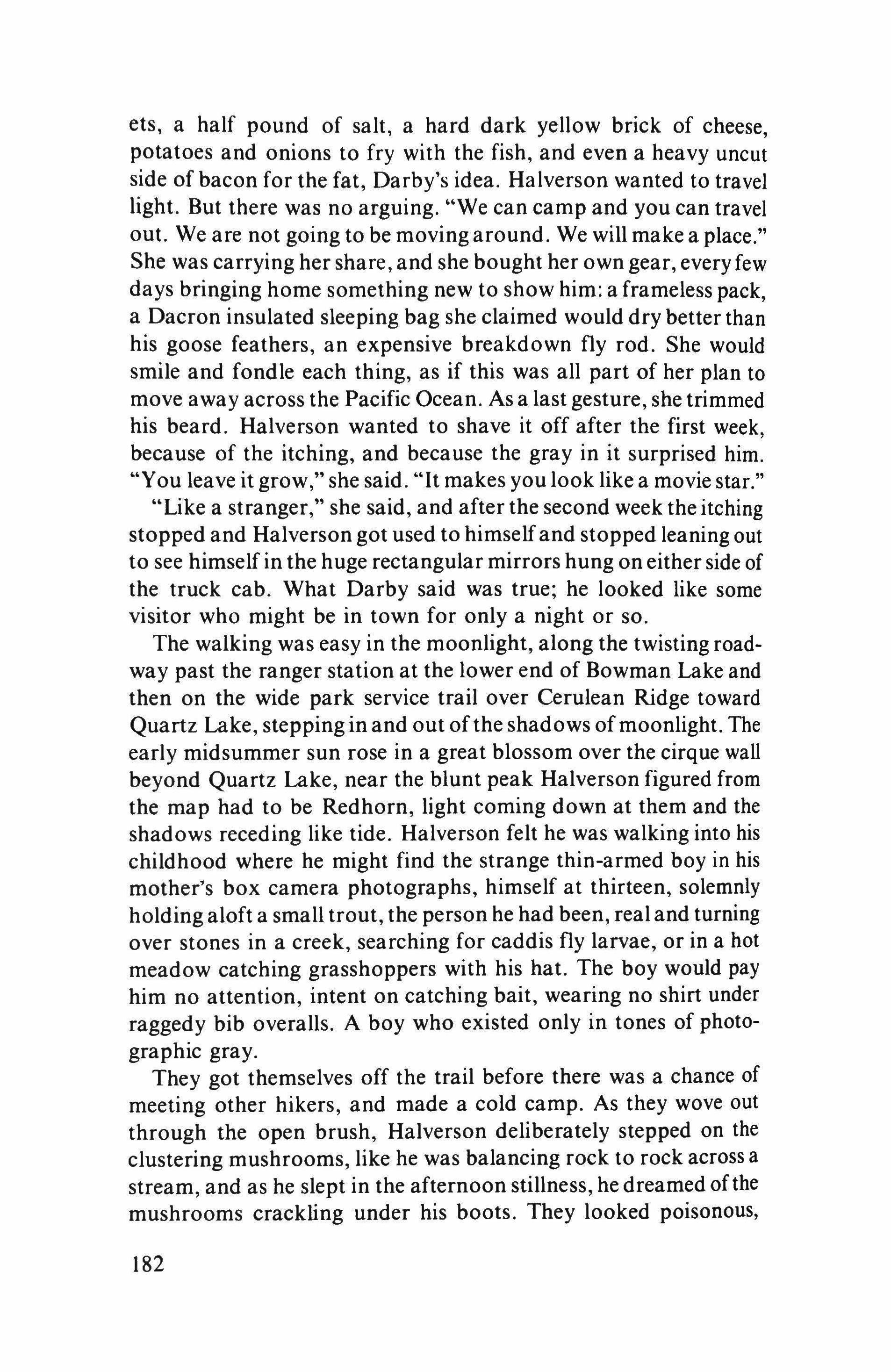
ets, a half pound of salt, a hard dark yellow brick of cheese, potatoes and onions to fry with the fish, and even a heavy uncut side of bacon for the fat, Darby's idea. Halverson wanted to travel light. But there was no arguing. "We can camp and you can travel out. We are not going to be moving around. We will make a place." She was carrying her share, and she bought her own gear, every few days bringing home something new to show him: a frameless pack, a Dacron insulated sleeping bag she claimed would dry better than his goose feathers, an expensive breakdown fly rod. She would smile and fondle each thing, as if this was all part of her plan to move away across the Pacific Ocean. As a last gesture, she trimmed his beard. Halverson wanted to shave it off after the first week, because of the itching, and because the gray in it surprised him. "You leave it grow," she said. "It makes you look like a movie star."
"Like a stranger," she said, and after the second week the itching stopped and Halverson got used to himselfand stopped leaning out to see himself in the huge rectangular mirrors hung on either side of the truck cab. What Darby said was true; he looked like some visitor who might be in town for only a night or so.
The walking was easy in the moonlight, along the twisting roadway past the ranger station at the lower end of Bowman Lake and then on the wide park service trail over Cerulean Ridge toward Quartz Lake, stepping in and out ofthe shadows ofmoonlight. The early midsummer sun rose in a great blossom over the cirque wall beyond Quartz Lake, near the blunt peak Halverson figured from the map had to be Redhorn, light coming down at them and the shadows receding like tide. Halverson felt he was walking into his childhood where he might find the strange thin-armed boy in his mother's box camera photographs, himself at thirteen, solemnly holding aloft a small trout, the person he had been, real and turning over stones in a creek, searching for caddis fly larvae, or in a hot meadow catching grasshoppers with his hat. The boy would pay him no attention, intent on catching bait, wearing no shirt under raggedy bib overalls. A boy who existed only in tones of photographic gray.
They got themselves off the trail before there was a chance of meeting other hikers, and made a cold camp. As they wove out through the open brush, Halverson deliberately stepped on the clustering mushrooms, like he was balancing rock to rock across a stream, and as he slept in the afternoon stillness, he dreamed ofthe mushrooms crackling under his boots. They looked poisonous,

wide caps sprinkled with virulent red. Over twenty years since he had been inside this park, and now, bad dreams.
The next night they worked past the camps at the lower end of Quartz Lake, tents and the sparking remains of a fire, the end of any sort of trail. They made maybe five or six hundred yards up the north side of the lake, even with moonlight coming bright over the water, stepping along in the shallows, inand out of shadows cast by the timber, afraid their splashing would be heard by the campers down the shore where the fire still glowed. In a grassy opening between deadfalls they laid their packs against a log, and Darby unbuttoned her shirt and dropped it and stood naked to the waist. "You better get on some dry socks," Halverson said.
"I never did this before," Darby said. "I never stood like this in the moon before."
Halverson looked away. "Now is not the time for these things. Youjust worry about changing your socks." While he laylistening to her breathe in her sleep and watched the stars make their slow way around the moon, Halverson reflected on how long it had been since he and Darby had been after one another. The first night when he went into the tavern and she was there, tending the bar, Halverson drank late, rolling dice in a long game of ship, captain, and crew, and toward closing time she looked at him and said, fine, alright she would, after she counted out the till, when he asked her if she had ever gone riding in a logging truck. Even though she invited herself into his bed after she found out he owned the truck and cabin, what they got from each other was not founded on any financial considerations; she kept herjob and nobody was bought or sold. But now they were stopped, these months since spring, and maybe the way they slept without touching was causing the changes in her, thin white hands lifting her breasts in the moonlight, if she was changing and hadn'talways been ready for anything, secretly. Darby was from a town named Wasco, in the great central valley of California, and her breasts were flawed faintly by stretch marks. There had been other men, maybe children. He wondered how much she told him, and why they could live together and not tell each other what was true.
After sunrise, picking their way along where that lone surviving girl had fought her way back toward the world, Halverson followed Darby and wished there could be some sign ofthat girl, a rip of cloth he could lift off a snag and tuck into his breast pocket as a
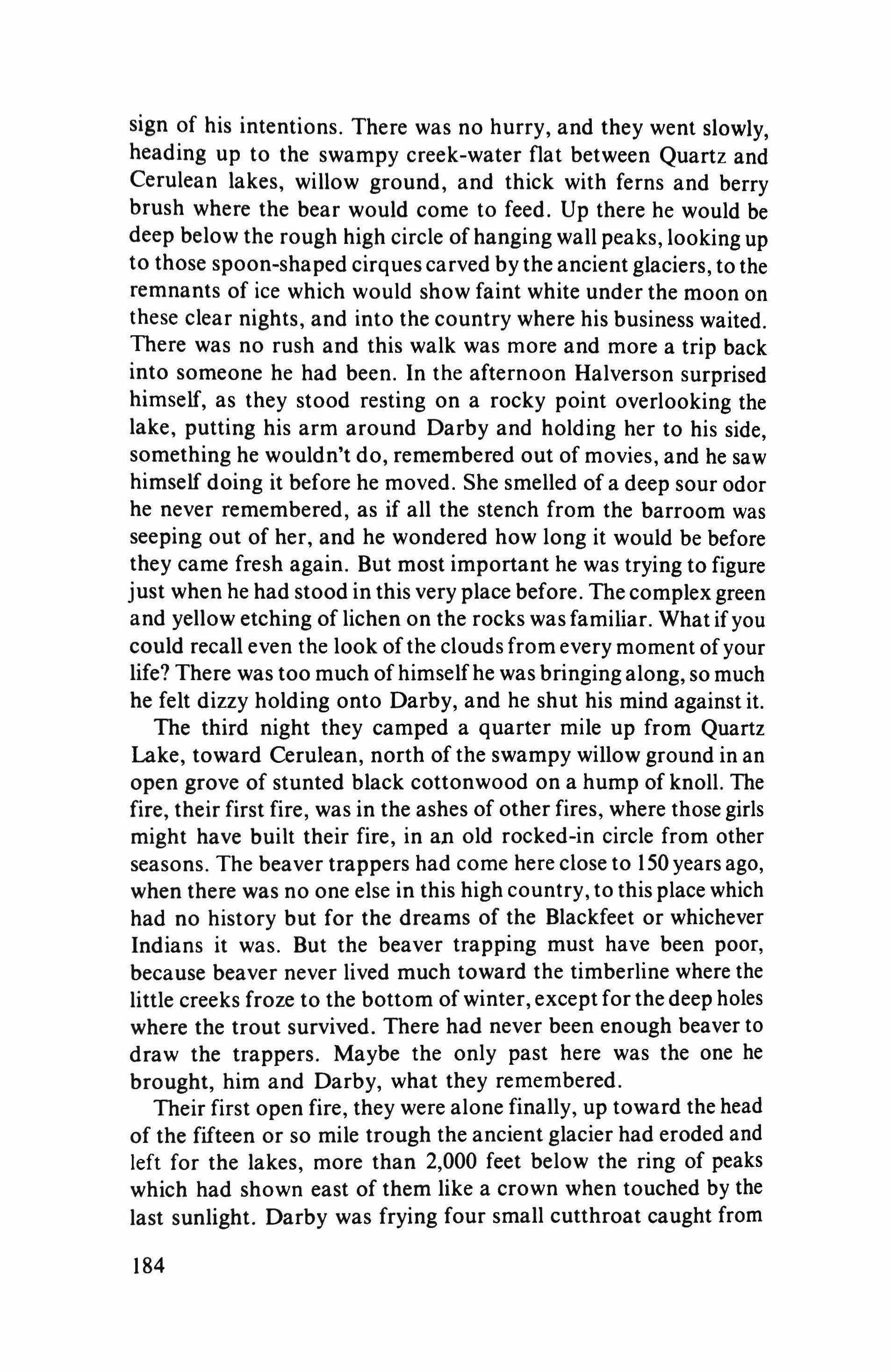
sign of his intentions. There was no hurry, and they went slowly, heading up to the swampy creek-water flat between Quartz and Cerulean lakes, willow ground, and thick with ferns and berry brush where the bear would come to feed. Up there he would be deep below the rough high circle of hanging wall peaks, looking up to those spoon-shaped cirques carved by the ancient glaciers, to the remnants of ice which would show faint white under the moon on these clear nights, and into the country where his business waited. There was no rush and this walk was more and more a trip back into someone he had been. In the afternoon Halverson surprised himself, as they stood resting on a rocky point overlooking the lake, putting his arm around Darby and holding her to his side, something he wouldn't do, remembered out of movies, and he saw himself doing it before he moved. She smelled of a deep sour odor he never remembered, as if all the stench from the barroom was seeping out of her, and he wondered how long it would be before they came fresh again. But most important he was trying to figure just when he had stood in this very place before. The complex green and yellow etching of lichen on the rocks was familiar. What if you could recall even the look of the clouds from every moment of your life? There was too much ofhimself he was bringingalong, so much he felt dizzy holding onto Darby, and he shut his mind against it.
The third night they camped a quarter mile up from Quartz Lake, toward Cerulean, north of the swampy willow ground in an open grove of stunted black cottonwood on a hump of knoll. The fire, their first fire, was in the ashes of other fires, where those girls might have built their fire, in an old rocked-in circle from other seasons. The beaver trappers had come here close to 150 years ago, when there was no one else in this high country, to this place which had no history but for the dreams of the Blackfeet or whichever Indians it was. But the beaver trapping must have been poor, because beaver never lived much toward the timberline where the little creeks froze to the bottom of winter, except for the deep holes where the trout survived. There had never been enough beaver to draw the trappers. Maybe the only past here was the one he brought, him and Darby, what they remembered.
Their first open fire, they were alone finally, up toward the head of the fifteen or so mile trough the ancient glacier had eroded and left for the lakes, more than 2,000 feet below the ring of peaks which had shown east of them like a crown when touched by the last sunlight. Darby was frying four small cutthroat caught from
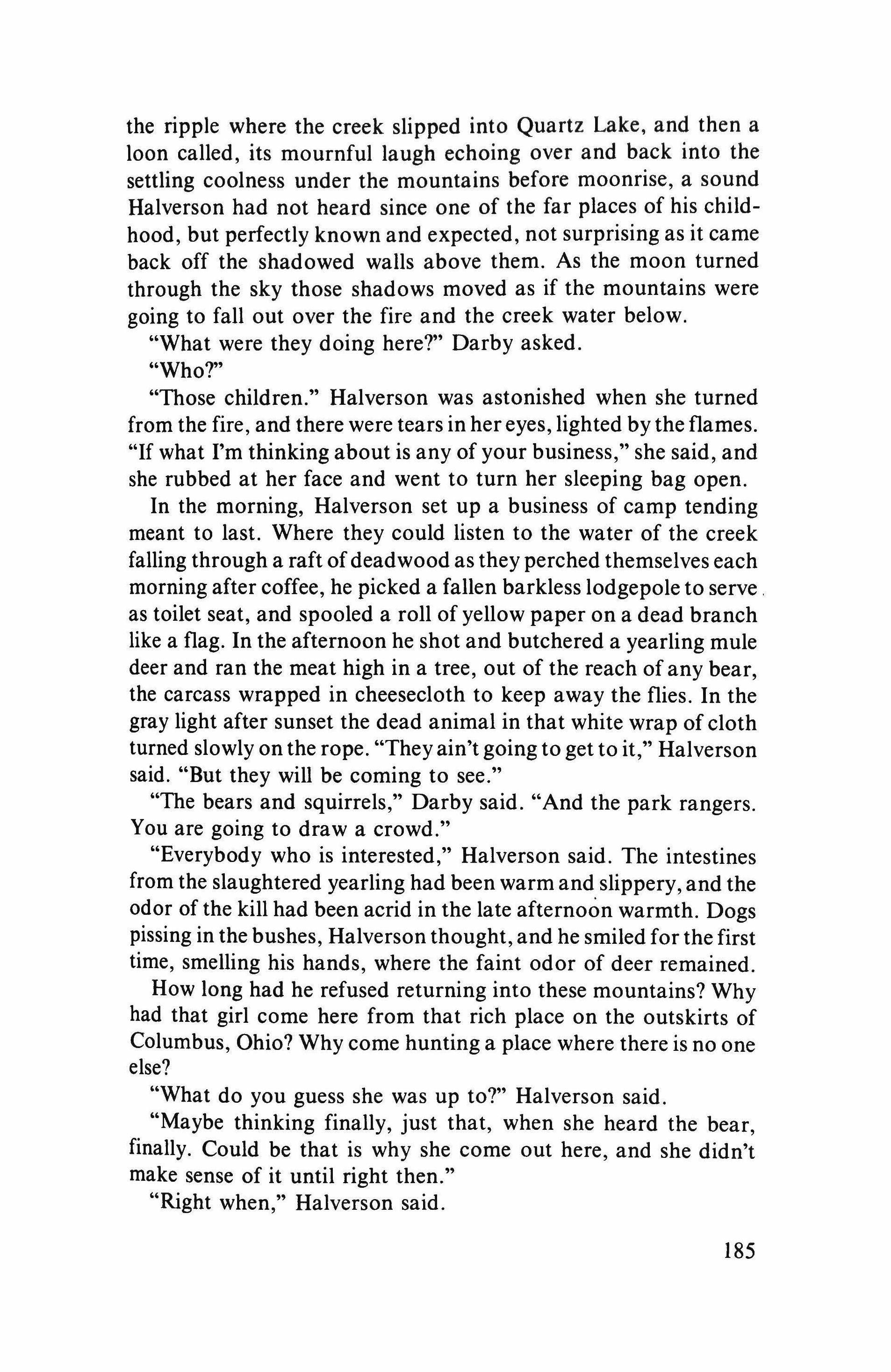
the ripple where the creek slipped into Quartz Lake, and then a loon called, its mournful laugh echoing over and back into the settling coolness under the mountains before moonrise, a sound Halverson had not heard since one of the far places of his childhood, but perfectly known and expected, not surprising as it came back off the shadowed walls above them. As the moon turned through the sky those shadows moved as if the mountains were going to fall out over the fire and the creek water below.
"What were they doing here?" Darby asked.
"Who?"
"Those children." Halverson was astonished when she turned from the fire, and there were tears in her eyes, lighted by the flames. "If what I'm thinking about is any of your business," she said, and she rubbed at her face and went to turn her sleeping bag open.
In the morning, Halverson set up a business of camp tending meant to last. Where they could listen to the water of the creek falling through a raft of deadwood as they perched themselves each morning after coffee, he picked a fallen barkless lodgepole to serve. as toilet seat, and spooled a roll of yellow paper on a dead branch like a flag. In the afternoon he shot and butchered a yearling mule deer and ran the meat high in a tree, out of the reach of any bear, the carcass wrapped in cheesecloth to keep away the flies. In the gray light after sunset the dead animal in that white wrap of cloth turned slowly on the rope. "They ain't going to get to it," Halverson said. "But they will be coming to see."
"The bears and squirrels," Darby said. "And the park rangers. You are going to draw a crowd."
"Everybody who is interested," Halverson said. The intestines from the slaughtered yearling had been warm and slippery, and the odor of the kill had been acrid in the late afternoon warmth. Dogs pissing in the bushes, Halverson thought, and he smiled for the first time, smelling his hands, where the faint odor of deer remained. How long had he refused returning into these mountains? Why had that girl come here from that rich place on the outskirts of Columbus, Ohio? Why come hunting a place where there is no one else?
"What do you guess she was up to?" Halverson said.
"Maybe thinking finally, just that, when she heard the bear, finally. Could be that is why she come out here, and she didn't make sense of it until right then."
"Right when," Halverson said.
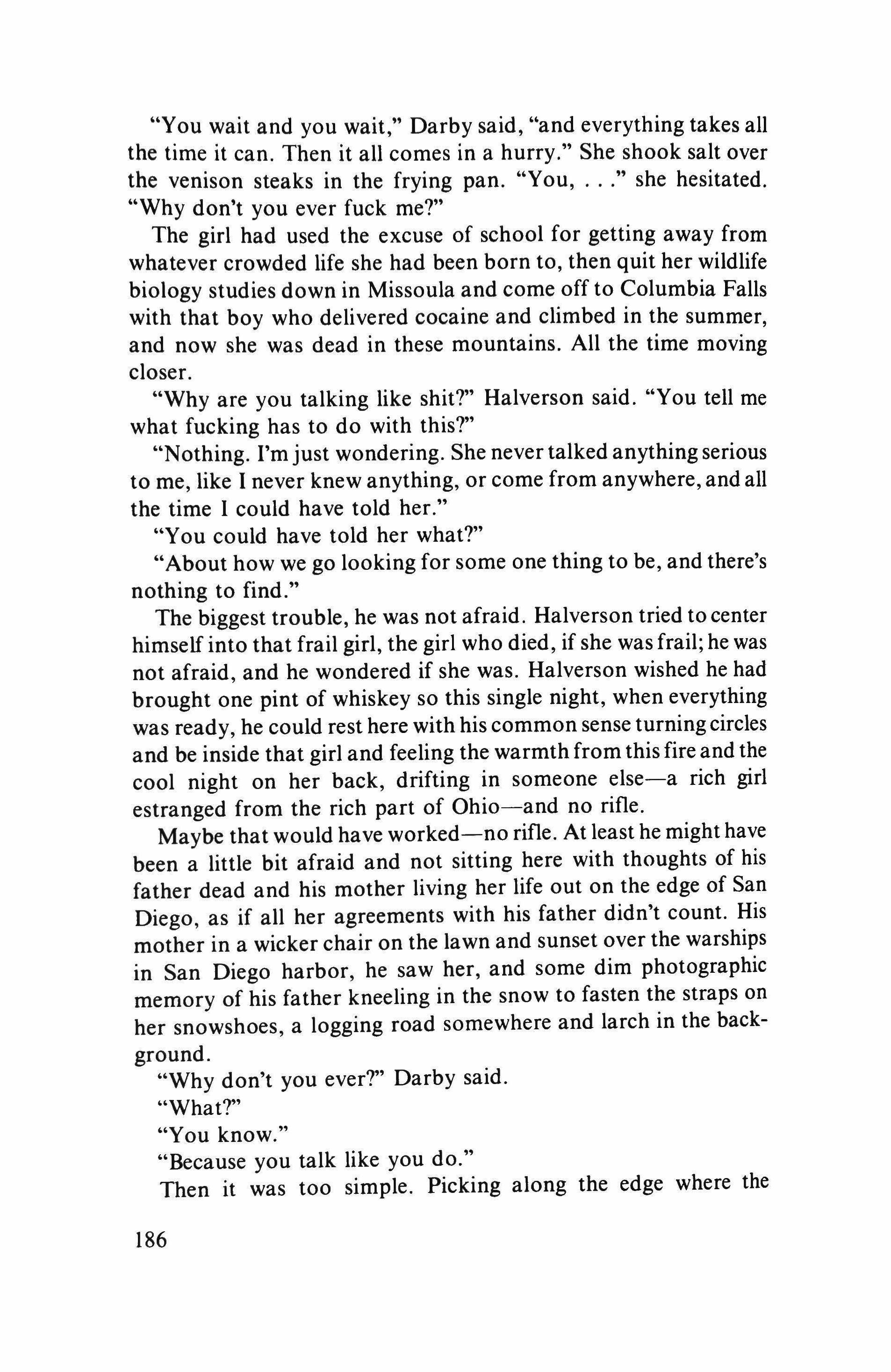
"You wait and you wait," Darby said, "and everything takes all the time it can. Then it all comes in a hurry." She shook salt over the venison steaks in the frying pan. "You, she hesitated. "Why don't you ever fuck me?"
The girl had used the excuse of school for getting away from whatever crowded life she had been born to, then quit her wildlife biology studies down in Missoula and come off to Columbia Falls with that boy who delivered cocaine and climbed in the summer, and now she was dead in these mountains. All the time moving closer.
"Why are you talking like shit?" Halverson said. "You tell me what fucking has to do with this?"
"Nothing. I'm just wondering. She never talked anything serious to me, like I never knew anything, or come from anywhere, and all the time I could have told her."
"You could have told her what?"
"About how we go looking for some one thing to be, and there's nothing to find."
The biggest trouble, he was not afraid. Halverson tried to center himself into that frail girl, the girl who died, if she was frail; he was not afraid, and he wondered if she was. Halverson wished he had brought one pint of whiskey so this single night, when everything was ready, he could rest here with his common sense turning circles and be inside that girl and feeling the warmth from this fire and the cool night on her back, drifting in someone else-a rich girl estranged from the rich part of Ohio-and no rifle.
Maybe that would have worked-no rifle. At least he might have been a little bit afraid and not sitting here with thoughts of his father dead and his mother living her life out on the edge of San Diego, as if all her agreements with his father didn't count. His mother in a wicker chair on the lawn and sunset over the warships in San Diego harbor, he saw her, and some dim photographic memory of his father kneeling in the snow to fasten the straps on her snowshoes, a logging road somewhere and larch in the background.
"Why don't you ever?" Darby said.
"What?"
"You know."
"Because you talk like you do."
Then it was too simple. Picking along the edge where the

lodgepole timber leveled into the swamp, scouting this new territory, Halverson was walking alone when the old she-bear reared herself out of thick brush only a hundred or so yards before him. Listening but no doubt unable to make him out with her weak eyes, she was maybe ready to come at him and find out what he was, but more likely to drop and lope away. Halverson heard her snuffling, and as he had planned, before he was able to understand this was not what he wanted, not this easiness, he centered the cross hairs just beneath her dark uplifted nose and fired. As he slipped his finger across the trigger, he was astonished by the noise, which hadn't mattered when he killed the doe, the hard jolt of the rifle stock against his shoulder and the breaking of silence that went echoing, and the massive head jerking away, gone from the scope. Halverson thought he had missed, levered in another shell, thinking nowhere, then lifted his eye from the scope to see the bear floundering backward and sideways into the leafy brush, and falling as he had imagined. With such thoughtless luck he was done with it now, and had killed his grizzly, too quickly for recall, except for the diminishing echo of the rifle shot, and he was already sorry, knowing this one was wasted. There had to be another, stalked and properly confronted and slowly killed. There had to be time for thinking, and time for the bear, for hoping the animal might dimly sense, and slowly, the thing happening.
Halverson waited, listening, expecting Darby, who did not come, hearing nothing but the buzz of insects and the birds begin moving and calling in the trees again, and then he approached. The odor was rancid, and he was surprised by the smallness of the dead animal, the raggedness of her coat, because already he could see it was a she-bear, an old one who looked to be shedding in midsummer, the gray-tipped pelt ragged and almost slick to the hide around the rear haunches. An old woman. The wrong person. The .458 magnum slug had entered her mouth and blown away the back of her skull. Halverson cupped his fingers into the wound and there was nothing to be felt but mushy pulpy flesh and sharp bone fragments and warm blood, like thick soup.
He tasted the salty blood.
Kneeling beside the carcass, Halverson tried again to think ofthe dead girl in these mountains. The stench of the animal beside him was like warmth, part of the air. Off in the willows a frog was croaking, and then he heard the first sounds of the helicopter, rotor

blades cutting at the stillness as the aircraft came up along the length of Quartz Lake, the thunking louder until the helicopter hung between walls of the stippled rock face above him.
Downstream that roll of yellow toilet paper was spooled onto the dead branch like a flag. The helicopter turned and lifted maybe a half mile away. Halverson raised the rifle and through the eye of the scope watched the two men up there searching for him with binoculars. Don't find me, Halverson thought. This is none of your business, and it is not finished. We are not in this together.
It had to have been the echoing of the shot that drew them in searching for him. The afternoon ofthe day before he had killed the yearling mule deer, and now, another shot, echoing down the length of the lake, and they were after him. Only when the helicopter lifted and turned in three wide fluttering circles, and then bore off down the lake, going away, did Halverson pay attention to what came next. He would have to build a silencer.
Darby would not leave. "You got me here," she said, "so you are going to have trouble getting me out, even if they come looking." She was talking about the park service rangers. "There won't be the rifle, so there is nothing against the law with me being here." The carcass of the gutted doe was hanging a quarter mile away, wrapped in cheesecloth. Halverson thought of that, but didn't say anything. Let her learn, if this is what she wants. Halverson went out of the park the next morning, carrying only the rifle, and drove back to his cabin in the canyon above Columbia Falls. Even without the pack it was a hard daylong march. Darby would be all right, or she wouldn't. She had insisted on coming along, and she was into it.
The silencer turned out to be a reasonably simple piece of business. Halverson slipped an eight-inch section of heavy plastic hot water tubing over thick rubber washers on the end of the rifle barrel, and when it was securely in place, he cut pipe threads on the outside of the tubing. This was a mount for the silencer. The thing itself consisted of two cylinders, a small perforated core of metal tubing inside a larger section of steel pipe, the space between them packed with sound-absorbing steel wool. Halverson brazed it together in the pole-walled shed back of his cabin, where he kept the Kenworth in winter, then screwed the silencer onto the threaded plastic pipe fixed to the end of the rifle barrel. It was like a small metal can hanging out there. He fired the rifle into the hillside back
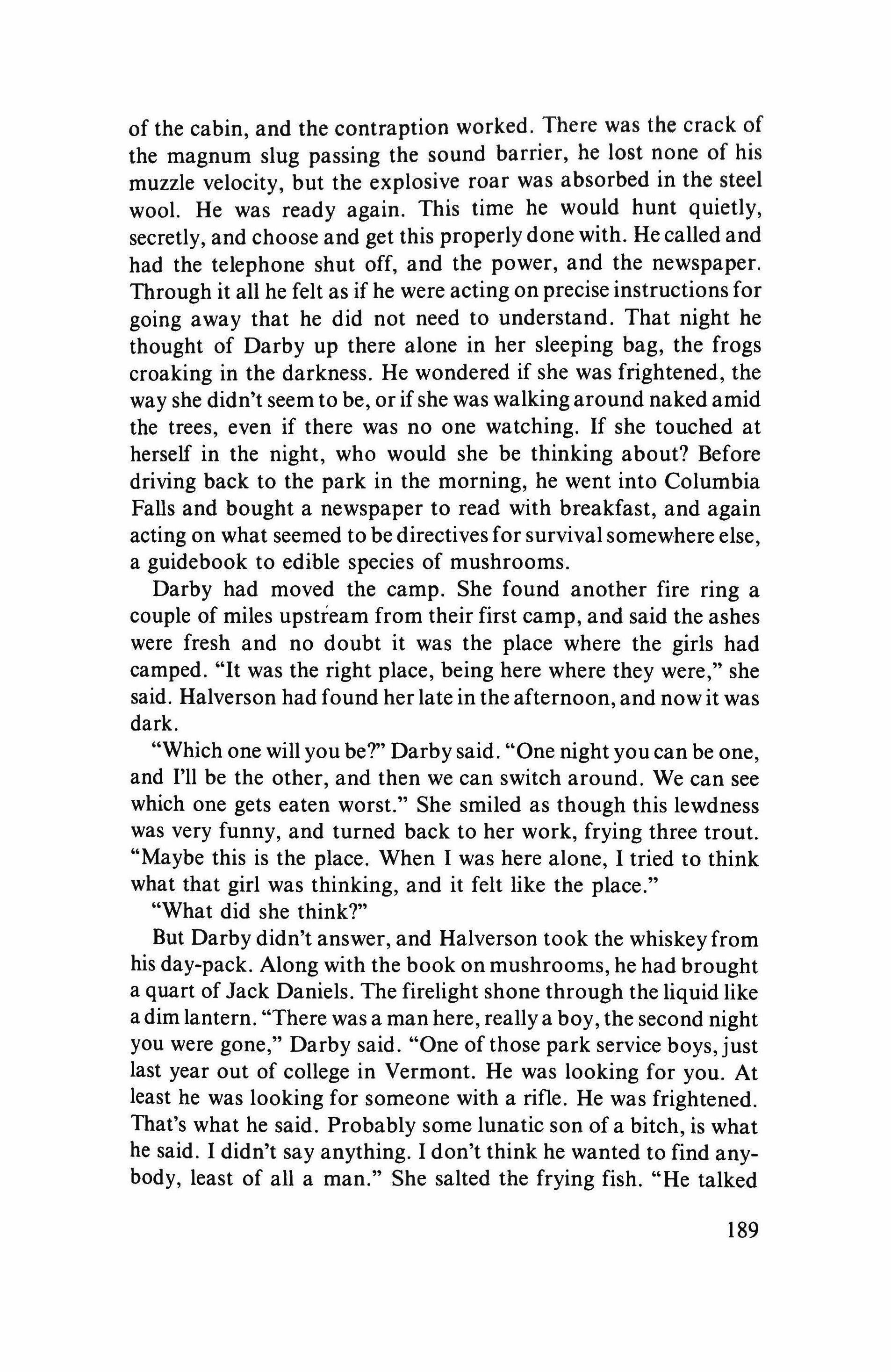
of the cabin, and the contraption worked. There was the crack of the magnum slug passing the sound barrier, he lost none of his muzzle velocity, but the explosive roar was absorbed in the steel wool. He was ready again. This time he would hunt quietly, secretly, and choose and get this properly done with. He called and had the telephone shut off, and the power, and the newspaper. Through it all he felt as if he were acting on precise instructions for going away that he did not need to understand. That night he thought of Darby up there alone in her sleeping bag, the frogs croaking in the darkness. He wondered if she was frightened, the way she didn't seem to be, or if she was walking around naked amid the trees, even if there was no one watching. If she touched at herself in the night, who would she be thinking about? Before driving back to the park in the morning, he went into Columbia Falls and bought a newspaper to read with breakfast, and again acting on what seemed to be directives for survival somewhere else, a guidebook to edible species of mushrooms.
Darby had moved the camp. She found another fire ring a couple of miles upstream from their first camp, and said the ashes were fresh and no doubt it was the place where the girls had camped. "It was the right place, being here where they were," she said. Halverson had found her late in the afternoon, and now it was dark.
"Which one will you be?" Darby said. "One night you can be one, and I'll be the other, and then we can switch around. We can see which one gets eaten worst." She smiled as though this lewdness was very funny, and turned back to her work, frying three trout. "Maybe this is the place. When I was here alone, I tried to think what that girl was thinking, and it felt like the place."
"What did she think?"
But Darby didn't answer, and Halverson took the whiskey from his day-pack. Along with the book on mushrooms, he had brought a quart of Jack Daniels. The firelight shone through the liquid like a dim lantern. "There was a man here, really a boy, the second night you were gone," Darby said. "One of those park service boys,just last year out of college in Vermont. He was looking for you. At least he was looking for someone with a rifle. He was frightened. That's what he said. Probably some lunatic son of a bitch, is what he said. I didn't say anything. I don't think he wanted to find anybody, least of all a man." She salted the frying fish. "He talked

about how this park is open ground for crazies. What he said is lunatics. He said there was no control, and lunatics clustered in places where there was no control."
"Maybe he got it right. We might stay here forever. All the goddamned helicopters do no good. We might stay right here," Halverson said. "You know what I did? You guess I got back and there was a week's newspapers all over the porch." He was going to lie, there had been the newspapers, but the rest ofthis was going to be a lie. "I didn't call them and have the newspaper shut off, or the power company shut off the lights, or the telephone. Those things are going on back there, without us, to remind them. I could have shut it off, but I didn't." Halverson waited for her to look away from the fire and back toward him.
"Who are they reminding?" Darby said. "About what?"
When Halverson didn't answer, she went on. "What I did is, I slept with that boy. In his sleeping bag and mine zipped together. He was frightened and I felt like his mother, holding to him all night." Darby finally turned and looked at Halverson. "It was the right thing to do," she said.
"Did you fuck him?"
"Once, in the morning." She did not seem disturbed. "It was the right thing to do. 1 wanted to be together with something, and it made him feel better."
Halverson was not frightened, and he was not angry. Maybe she did do the right thing, for her. It was not anything he could get himself to think about. He did not want to be part of anyone. "I guess we could have a drink together," Halverson said. Maybe each thing they were doing was the right thing to do. He poured them each a shot in the steel Sierra Club cups, and didn't say anything about how he was going to sit drunk in the night and see what it could have been like to be that girl as the bear began nudging at the tent walls. He would be drunk and think he was alone and begin Whimpering, and when the hangover was gone, he would begin hunting.
Late in the night, sipping at his whiskey and sharpening his skinning knife by firelight until he could shave the hair off his forearm, Halverson surprised himself. Darby was curled in her sleeping bag, maybe sleeping and maybe not, when Halverson for the first time in all this surprised himself absolutely by drawing the

knife along the tender flesh inside his left forearm, careful to avoid the veins as they stood out, just softly tracing and watching the painless slide of the blade and the immediate welling streak of blood, holding himself so he did not force the blade deeper, pulling away just as he reached the wrist. After a moment of watching the blood gather and begin to drip, he held the knife low over the coals until the cutting edge began to glow red, and then breathing through his teeth, he seared the wound. The next morning, when Darby asked, he told her it had only been a test.
"Just practicing, I thought about cutting off a finger," he said, which was a lie, "but then I thought, there is nothing to grieve over, so I didn't cut off no finger."
"That's fine," Darby said.
"The first blood," Halverson said, "was always mine."
"Never in this world," Darby said. "That story I told, about fucking with that boy, was a lie. I've had plenty of that."
What Halverson did not tell her was that the whiskey worked: he finally dreamed of the girl who died. At least it was a dream he had never witnessed before, and it must have come from someone nearby. It must have been waiting. Below in some street there was the snow melting as it fell on wet black asphalt that flared under the headlights of a yellow Buick convertible which was easing away backward from a long driveway. In the street, the convertible did not move. The motor stopped and the headlights dimmed, and Halverson, in his sleep, thought: which window is this I am watching from?
Then he was awake and the fire was burned down to embers, and he listened to the snapping of pitch knots and Darby breathing, and heard the rasping of brush against brush and stillness, and knew it was the girl's dream because for the first time he was afraid. The rifle was there, he could touch it by reaching out, and he was trembling.
Another sound, and he lay there, not calling out to Darby because this was not her business, feeling his forearms tremble as a pine limb flared, and waiting for the rooting hoglike sound which never came. There was a whisper of air high in the yellow pine. The moon was gone. Off east the high wall of the cirque hung in delicate outline against the fainter blue of what had to be the sky turning toward morning. Nothing had happened, and as the dream began to fade there was nothing to do but rebuild the fire.
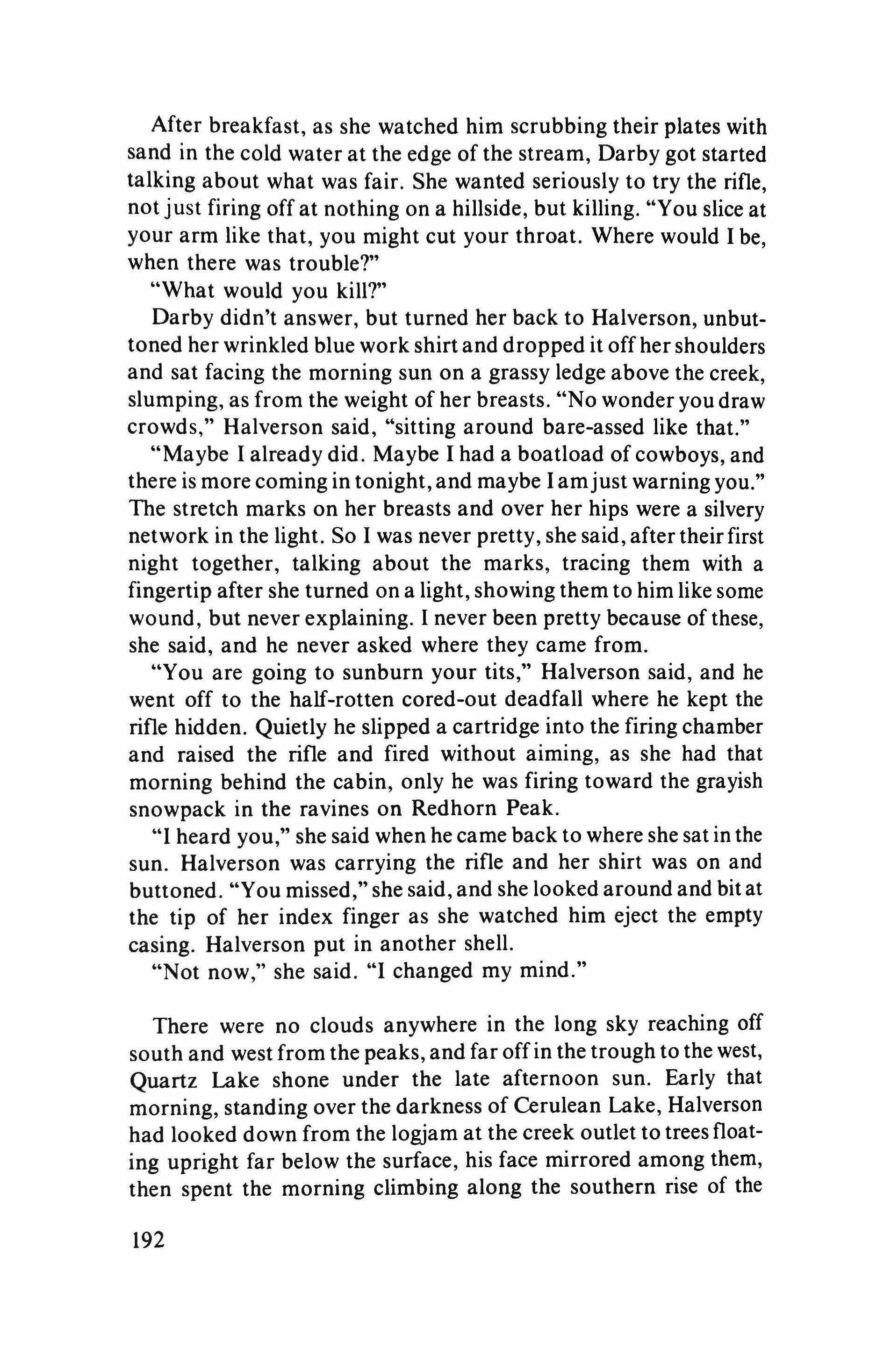
After breakfast, as she watched him scrubbing their plates with sand in the cold water at the edge of the stream, Darby got started talking about what was fair. She wanted seriously to try the rifle, not just firing off at nothing on a hillside, but killing. "You slice at your arm like that, you might cut your throat. Where would I be, when there was trouble?"
"What would you kill?"
Darby didn't answer, but turned her back to Halverson, unbuttoned her wrinkled blue work shirt and dropped it offher shoulders and sat facing the morning sun on a grassy ledge above the creek, slumping, as from the weight of her breasts. "No wonder you draw crowds," Halverson said, "sitting around bare-assed like that."
"Maybe I already did. Maybe I had a boatload of cowboys, and there is more coming in tonight, and maybe I amjust warning you." The stretch marks on her breasts and over her hips were a silvery network in the light. So I was never pretty, she said, after their first night together, talking about the marks, tracing them with a fingertip after she turned on a light, showing them to him like some wound, but never explaining. 1 never been pretty because of these, she said, and he never asked where they came from.
"You are going to sunburn your tits," Halverson said, and he went off to the half-rotten cored-out deadfall where he kept the rifle hidden. Quietly he slipped a cartridge into the firing chamber and raised the rifle and fired without aiming, as she had that morning behind the cabin, only he was firing toward the grayish snowpack in the ravines on Redhorn Peak.
"I heard you," she said when he came back to where she sat in the sun. Halverson was carrying the rifle and her shirt was on and buttoned. "You missed," she said, and she looked around and bit at the tip of her index finger as she watched him eject the empty casing. Halverson put in another shell.
"Not now," she said. "I changed my mind."
There were no clouds anywhere in the long sky reaching off south and west from the peaks, and far offin the trough to the west, Quartz Lake shone under the late afternoon sun. Early that morning, standing over the darkness of Cerulean Lake, Halverson had looked down from the logjam at the creek outlet to trees floating upright far below the surface, his face mirrored among them, then spent the morning climbing along the southern rise of the
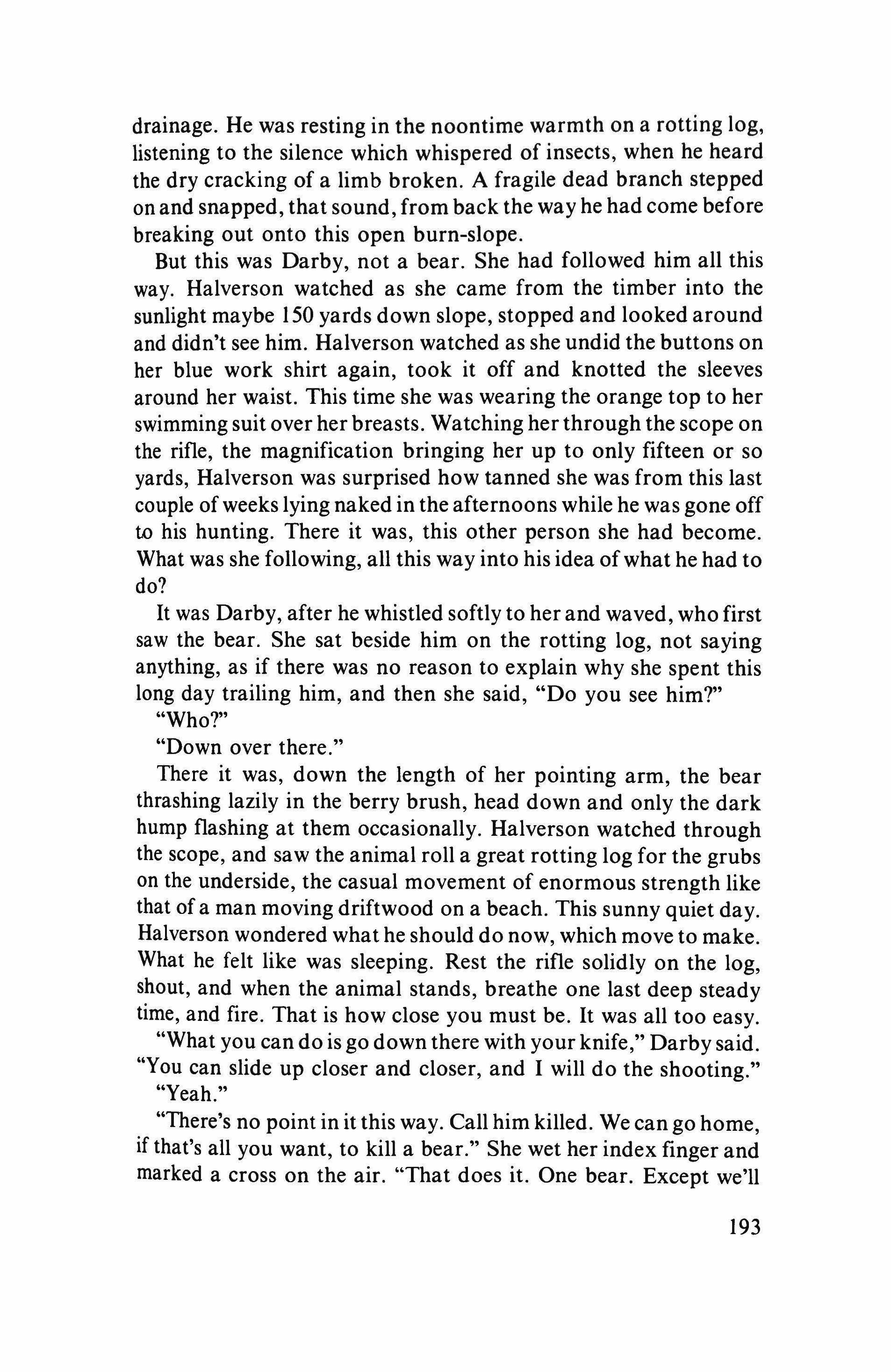
drainage. He was resting in the noontime warmth on a rotting log, listening to the silence which whispered of insects, when he heard the dry cracking of a limb broken. A fragile dead branch stepped onand snapped, that sound, from back the way he had come before breaking out onto this open burn-slope.
But this was Darby, not a bear. She had followed him all this way. Halverson watched as she came from the timber into the sunlight maybe 150 yards down slope, stopped and looked around and didn't see him. Halverson watched as she undid the buttons on her blue work shirt again, took it off and knotted the sleeves around her waist. This time she was wearing the orange top to her swimming suit over her breasts. Watching her through the scope on the rifle, the magnification bringing her up to only fifteen or so yards, Halverson was surprised how tanned she was from this last couple of weeks lying naked in the afternoons while he was gone off to his hunting. There it was, this other person she had become. What was she following, all this way into his idea of what he had to do?
It was Darby, after he whistled softly to her and waved, who first saw the bear. She sat beside him on the rotting log, not saying anything, as if there was no reason to explain why she spent this long day trailing him, and then she said, "Do you see him?"
"Who?"
"Down over there."
There it was, down the length of her pointing arm, the bear thrashing lazily in the berry brush, head down and only the dark hump flashing at them occasionally. Halverson watched through the scope, and saw the animal roll a great rotting log for the grubs on the underside, the casual movement of enormous strength like that of a man moving driftwood on a beach. This sunny quiet day. Halverson wondered what he should do now, which move to make. What he felt like was sleeping. Rest the rifle solidly on the log, shout, and when the animal stands, breathe one last deep steady time, and fire. That is how close you must be. It was all too easy.
"What you can do is go down there with your knife," Darby said. "You can slide up closer and closer, and I will do the shooting."
"Yeah."
"There's no point in it this way. Call him killed. We can go home, if that's all you want, to kill a bear." She wet her index finger and marked a cross on the air. "That does it. One bear. Except we'll

never have his head on the wall. But we never will anyway." She wanted something here more than he did. Maybe for once to be the one who does the killing, to be the one in pursuit. She had lied about the boy she claimed had come to her when Halverson was gone. There had been no boy, he was sure of that.
Halverson understood what he was going to do. Darby was right, this was not any kind ofgetting even, and makingthings even was not what he was about. He didn't want me. Those were the words of the girl who survived. As if the bear possessed some gift, and had withheld it from her.
"See if you can do it," Halverson said, and he slid a cartridge into the firing chamber, and handed the rifle to Darby. She took it like she had been waiting. Halverson gave her three cartridges. "See if you can do it," he said again.
Only when he was fifty or so yards downhill, with his skinning knife in his right hand, did Halverson wonder at all about what he was doing. He could feel the eye of the scope on his back, and as he moved carefully through the brush, Halverson thought, now who is the hunter?
Not even yet was he afraid. He had been afraid in the night, after dreaming, when he lay in his sleeping bag and trembled and nothing happened but the eventual sunrise. But that was gone, and nothing was left of the terrible anger he felt the first night in his cabin, if it was anger, when the girl was dead. Halverson felt small and weak, but not afraid. Brilliant deep pinkish-lavender stalks of fireweed grew waist-high from long-rotted roots of an overturned alpine fir. Puffball mushrooms, gone ripe by this season, clustered under them. Halverson bent and punctured the gray-white skin of a mushroom with a forefinger. It had looked like a little balloon on the ground. The skin broke; the spore rose like gunpowder smoke. The odor of the spore was that of clean earth, slightly acid, as was the taste when he licked his forefinger. Halverson felt himself touching one thing at a time, great slowness. The rasp of a wasp in the air before him and then gone was abrasive against his eyelids as he hesitated. One thing and then another. He moved carefully and soft-footed on the spongy lichen-covered and mossy ground between clumps of deep saw-edged grass, crouched and pushing through slowly, reaching for one of the red-purple berries that hung in clusters around him, tasting it, pulling a handful that were sticky in his palm as he crouched there and ate them one at a time.
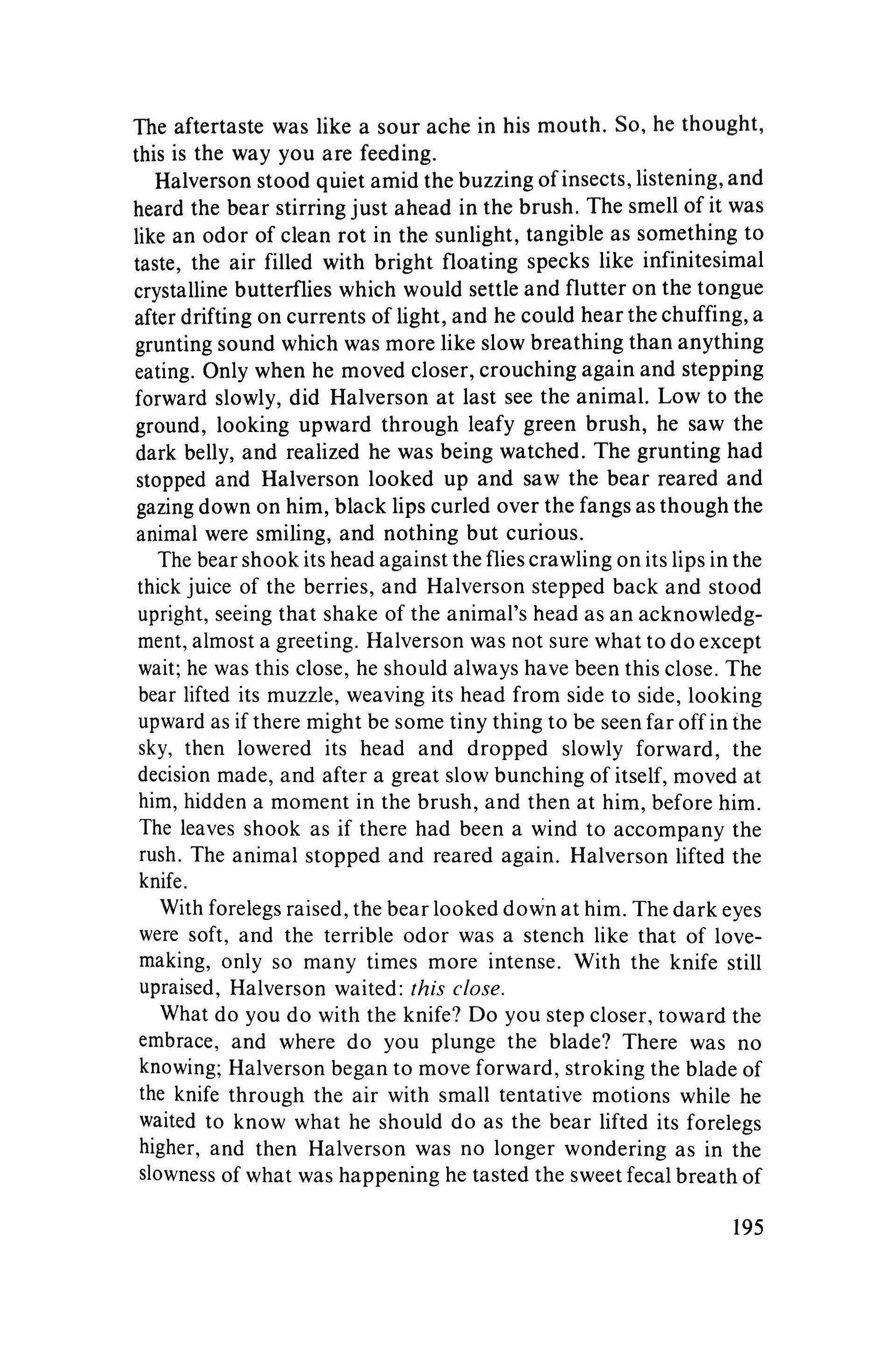
The aftertaste was like a sour ache in his mouth. So, he thought, this is the way you are feeding.
Halverson stood quiet amid the buzzing ofinsects, listening, and heard the bear stirring just ahead in the brush. The smell of it was like an odor of clean rot in the sunlight, tangible as something to taste, the air filled with bright floating specks like infinitesimal crystalline butterflies which would settle and flutter on the tongue after drifting on currents of light, and he could hear the chuffing, a grunting sound which was more like slow breathing than anything eating. Only when he moved closer, crouching again and stepping forward slowly, did Halverson at last see the animal. Low to the ground, looking upward through leafy green brush, he saw the dark belly, and realized he was being watched. The grunting had stopped and Halverson looked up and saw the bear reared and gazing down on him, black lips curled over the fangs as though the animal were smiling, and nothing but curious.
The bear shook its head against the flies crawling on its lips in the thick juice of the berries, and Halverson stepped back and stood upright, seeing that shake of the animal's head as an acknowledgment, almost a greeting. Halverson was not sure what to do except wait; he was this close, he should always have been this close. The bear lifted its muzzle, weaving its head from side to side, looking upward as if there might be some tiny thing to be seen far off in the sky, then lowered its head and dropped slowly forward, the decision made, and after a great slow bunching of itself, moved at him, hidden a moment in the brush, and then at him, before him. The leaves shook as if there had been a wind to accompany the rush. The animal stopped and reared again. Halverson lifted the knife.
With forelegs raised, the bear looked down at him. The dark eyes were soft, and the terrible odor was a stench like that of lovemaking, only so many times more intense. With the knife still upraised, Halverson waited: this close.
What do you do with the knife? Do you step closer, toward the embrace, and where do you plunge the blade? There was no knowing; Halverson began to move forward, stroking the blade of the knife through the air with small tentative motions while he waited to know what he should do as the bear lifted its forelegs higher, and then Halverson was no longer wondering as in the slowness of what was happening he tasted the sweet fecal breath of

the animal, Halverson touching his tongue to his teeth. One thing and then another. The clean long pelt over the breast of the animal was ruffled by what had to have been a breeze in the afternoon stillness, softly, like the hair of a woman as Halverson tried to imagine it later, except that it was like nothing but that yellowish silver flutter before him and then gone from his memory with the swiftness of a dream he would try to recall those later mornings, leaving nothing but what he could imagine. And then there was a shot, the crack as the lead slug from the rifle broke over his head, the flat splattering sound, and Halverson saw what he had been unable to imagine, the head jerking backward, the terrible involuntary slackness as the jaws gaped open, the spasm in the eyes, the flowering of blood, a few drops reaching near to him before they fell, and the bear gone down in the brush, just fallen and dead with a great final rush of breath.
Halverson lowered his knife. There was nothing to defend against, there hadn't been, not unless he courted it, and the anger he felt, the trembling in his forearms, was not so much at anything as it was at loss, and he did not know what was lost. He stood over the bear, now a mere dead animal, however large, and looked at his knife. There is the least you can manage, he thought, and he dropped to his knees, enveloped in the hot stench, and began hacking, dismembering, cutting off the head. It was a longjob, and he broke the knife blade prying between the vertebrae, but finally the head rolled free, a couple of turns down the slope, coming to rest beneath the clusters of red-purple berries.
When Halverson stood, his back ached and his arms and chest were sloppy from his wallowing at hisjob, in the blood. All the time feeling the scope on his back, Halverson rested and smoked a cigarette, and then with his arms wrapped awkwardly around it, smelling it, Halverson began transporting the head back up the slope to Darby. He wondered if she would let him reach her, until at last she lowered the rifle.
"I waited long enough, didn't I?" she asked. He stood before her, legs braced against the fleshy weight of the head, and she stood on the grayish rotting log where she had rested the rifle, which she had let fall into the matted grass. Halverson set the head at her feet, so it grinned up at them, great carnivorous teeth closed and the black lips slack, and dropped the broken knife, watching it fall through the tangled grass to the mossy ground. "That will do," he said. The

head of the bear could rest there on that log, the insects could have it until it was a skull, looking west.
Halverson brushed away a fly that was crawling on the fingers of his left hand. Seven cartridges were heavy in the loops of his belt. One by one he took them out and fired them away toward tne peaks, the crack, the rush of the slug, then nothing. All this was one act of trust after another. The far white sky to the west was reflected from the lake below in its trough. They were inside a place where each thing irrevocably followed another, and the only hesitations were those that could be imagined.
Back at their camp Halverson fired the rest of his cartridges, then gave Darby the rifle and asked her to take it out and leave it in some place he would never discover.
"You know that old one, that cripple the rangers killed," she said. "Well, they killed the right one. The belly was full of hair."
Halverson told her that didn't make any difference. He built a fire and sat with his back to it, watching the line of shadow rise on the peaks as the sun descended, until he heard her coming back. This was close enough.

Jo is someone who crossed my life one winter right when the fifties were drawing to an end. I had come out of the Army to finish my last year at school, but I ran into a woman named Sonnie who smashed me. I quit school instead and took a room on one of the side streets off Central Park West, where the analysts lived. I couldn't sleep and mostly I walked the streets all night. I sat in cafeterias a lot and wrote manuscripts in my head. When I did sit down to type, all I could think about was women, and that only made me restless so I would go back out and prowl the streets. Most of the time, though, Ijust thought about Sonnie. Sonnie with her long blonde hair and deep, deep wondrous blue eyes.
These words, the ring of them as they strike against the keys, sound hopelessly of another age. I am well aware of how they resonate. They are the sounds of what may be the last Beat story, so painful and self-conscious and consuming, so riddled with time that I almost despair hearing them. Time. Like the memory itself, the cracked and layered surface of a wall covered with blots of spray paint.

Jo's full name was Jo White. She had tobacco-colored skin and a small, sweet face with cleanly chiseled features. It was a face that the entire Northern Renaissance had been yearning for. She looked like a madonna. At times the skin tone seemed to soften and become olive, but then at other times it would deepenagain. It was an odd effect of the pigmentation. As if the light that flooded the madonna had also cast the shadow of the beholder upon her; as if you could not avoid projecting your own shadows onto her. Or did it work the other way; were the darker tones the effect on you of her own mood? I was never quite sure.
I met Jo on New Year's Eve. As usual, I had nothing to do for New Year's. I was already imagining the riotous times my friends were having at all the terrific parties nobody had invited me to. With nothing else in view I walked into Bickford's, which was one of those all-night cafeterias, to have a cup of coffee. I used to sit there with my coffee and toasted English and stare at the reflections in the wall mirrors, mistaking other people's faces for my own, watching them float away on the wrong bodies. In a place like Bickford's you can lose track altogether of the numbers on either side of the glass. But mirrors have always been dangerous for me. I have always had to screw up my face in a particular way, pursing my lips and puffing my cheeks, in order to endure the image I see there. I have been told that schizophrenics love mirrors while paranoids cannot abide them. It may well be. In any event, it was about eight o'clock then. I sat down with my steaming mug and this beautiful girl walked over. She had the kind of buoyancy that infects you, and a face that could take your breath away.
"Hello," she said, sitting down next to me. "You live around here?"
I said I did. Since it was New Year's Eve, I had in mind going into a poverty riff, hoping to inveigle a discount trick. It was clear, after the first rush of the vision she was, that she was tricking. 1 should add that the only money I had came from GI unemployment. Before I could get into it, though, she asked the favor.
"How about letting me use your room?" she said. "I have this john, see," and she pointed to a short Mediterranean type who was sitting at another table. "I suppose you think this is strangebut 1 lost the key to the room I always use."
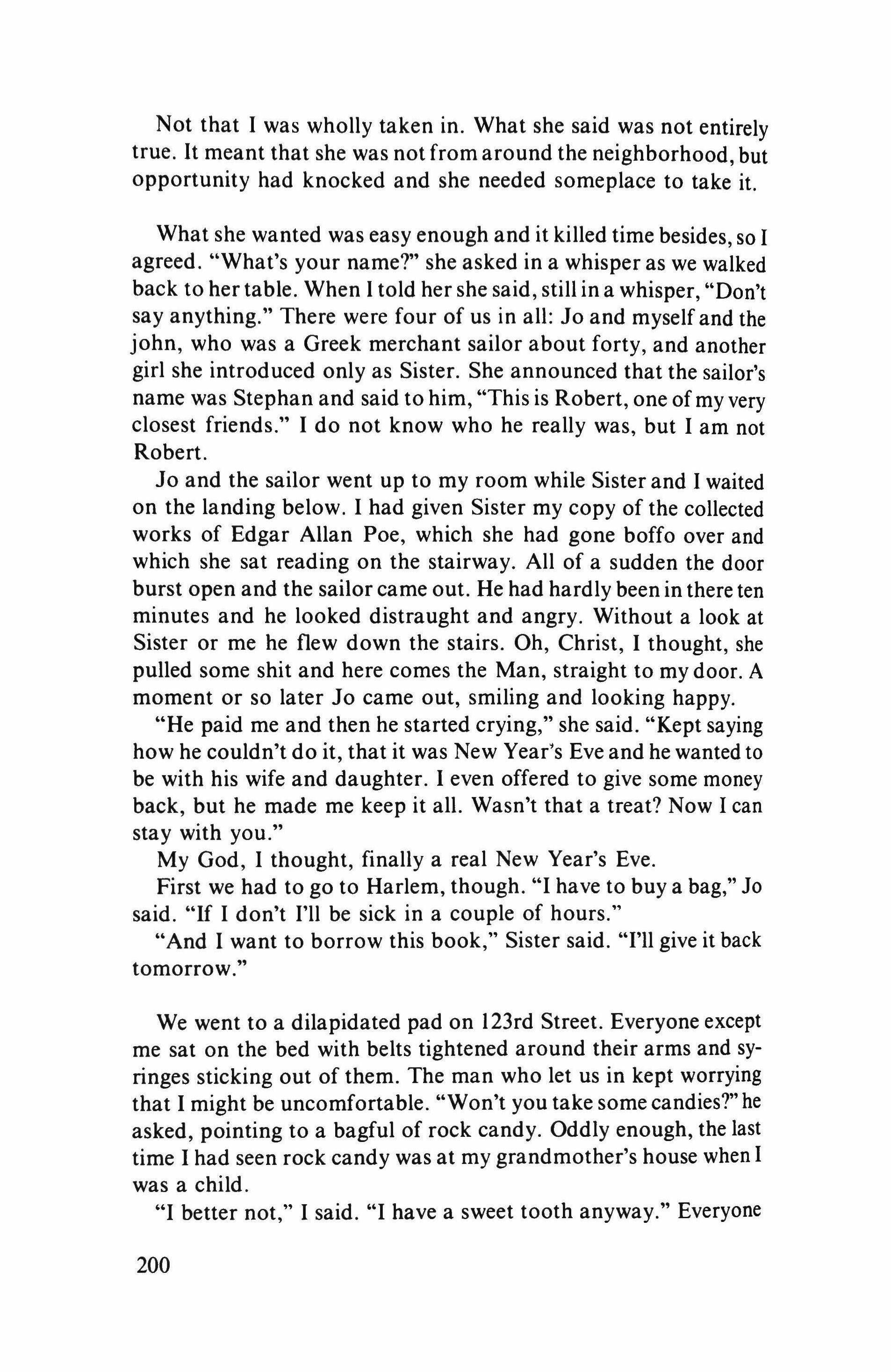
Not that 1 was wholly taken in. What she said was not entirely true. It meant that she was not from around the neighborhood, but opportunity had knocked and she needed someplace to take it.
What she wanted was easy enough and it killed time besides, so I agreed. "What's your name?" she asked in a whisper as we walked back to her table. When I told her she said, still in a Whisper, "Don't say anything." There were four of us in all: Jo and myself and the john, who was a Greek merchant sailor about forty, and another girl she introduced only as Sister. She announced that the sailor's name was Stephan and said to him, "This is Robert, one of my very closest friends." 1 do not know who he really was, but 1 am not Robert.
Jo and the sailor went up to my room while Sister and 1 waited on the landing below. 1 had given Sister my copy of the collected works of Edgar Allan Poe, which she had gone boffo over and which she sat reading on the stairway. All of a sudden the door burst open and the sailor came out. He had hardly been in there ten minutes and he looked distraught and angry. Without a look at Sister or me he flew down the stairs. Oh, Christ, 1 thought, she pulled some shit and here comes the Man, straight to my door. A moment or so later Jo came out, smiling and looking happy.
"He paid me and then he started crying," she said. "Kept saying how he couldn't do it, that it was New Year's Eve and he wanted to be with his wife and daughter. 1 even offered to give some money back, but he made me keep it all. Wasn't that a treat? Now I can stay with you."
My God, 1 thought, finally a real New Year's Eve.
First we had to go to Harlem, though. "I have to buy a bag," Jo said. "If 1 don't I'll be sick in a couple of hours."
"And 1 want to borrow this book," Sister said. "I'll give it back tomorrow."
We went to a dilapidated pad on 123rd Street. Everyone except me sat on the bed with belts tightened around their arms and syringes sticking out of them. The man who let us in kept worrying that 1 might be uncomfortable. "Won't you take some candies?" he asked, pointing to a bagful of rock candy. Oddly enough, the last time 1 had seen rock candy was at my grandmother's house when 1 was a child.
"I better not," I said. "I have a sweet tooth anyway." Everyone
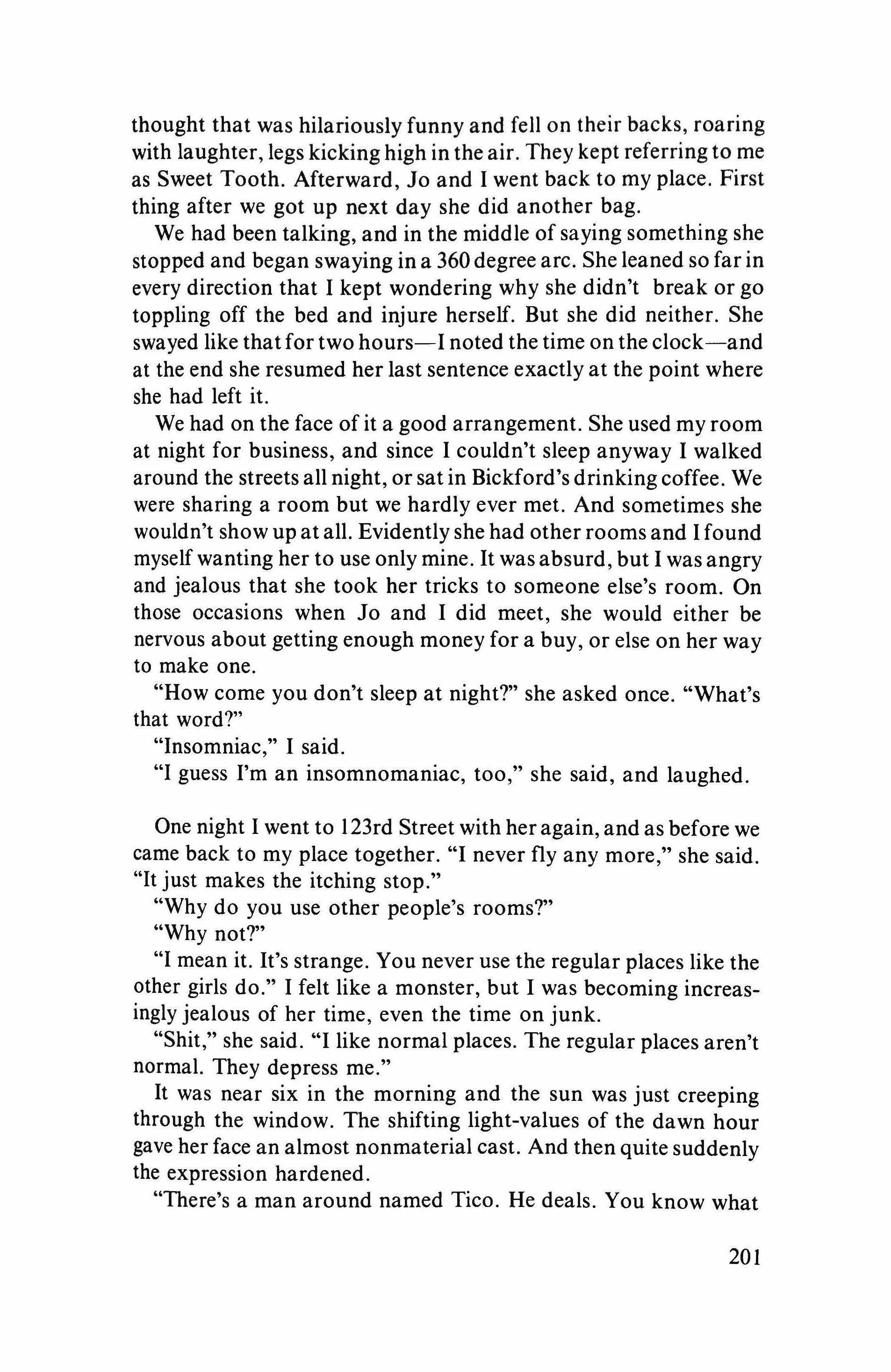
thought that was hilariously funny and fell on their backs, roaring with laughter, legs kickinghigh in the air. They kept referring to me as Sweet Tooth. Afterward, 10 and I went back to my place. First thing after we got up next day she did another bag.
We had been talking, and in the middle of saying something she stopped and began swaying in a 360 degree arc. She leaned so far in every direction that I kept wondering why she didn't break or go toppling off the bed and injure herself. But she did neither. She swayed like that for two hours-I noted the time on the clock-and at the end she resumed her last sentence exactly at the point where she had left it.
We had on the face of it a good arrangement. She used my room at night for business, and since I couldn't sleep anyway I walked around the streets all night, or sat in Bickford's drinking coffee. We were sharing a room but we hardly ever met. And sometimes she wouldn't show up at all. Evidently she had other rooms and I found myselfwanting her to use only mine. It was absurd, but I was angry and jealous that she took her tricks to someone else's room. On those occasions when 10 and I did meet, she would either be nervous about getting enough money for a buy, or else on her way to make one.
"How come you don't sleep at night?" she asked once. "What's that word?"
"Insomniac," I said.
"I guess I'm an insomnomaniac, too," she said, and laughed.
One night I went to 123rd Street with her again, and as before we came back to my place together. "I never fly any more," she said. "It just makes the itching stop."
"Why do you use other people's rooms?"
"Why not?"
"I mean it. It's strange. You never use the regular places like the other girls do." I felt like a monster, but I was becoming increasingly jealous of her time, even the time on junk.
"Shit," she said. "I like normal places. The regular places aren't normal. They depress me."
It was near six in the morning and the sun was just creeping through the window. The shifting light-values of the dawn hour gave her face an almost nonmaterial cast. And then quite suddenly the expression hardened.
"There's a man around named Tieo. He deals. You know what
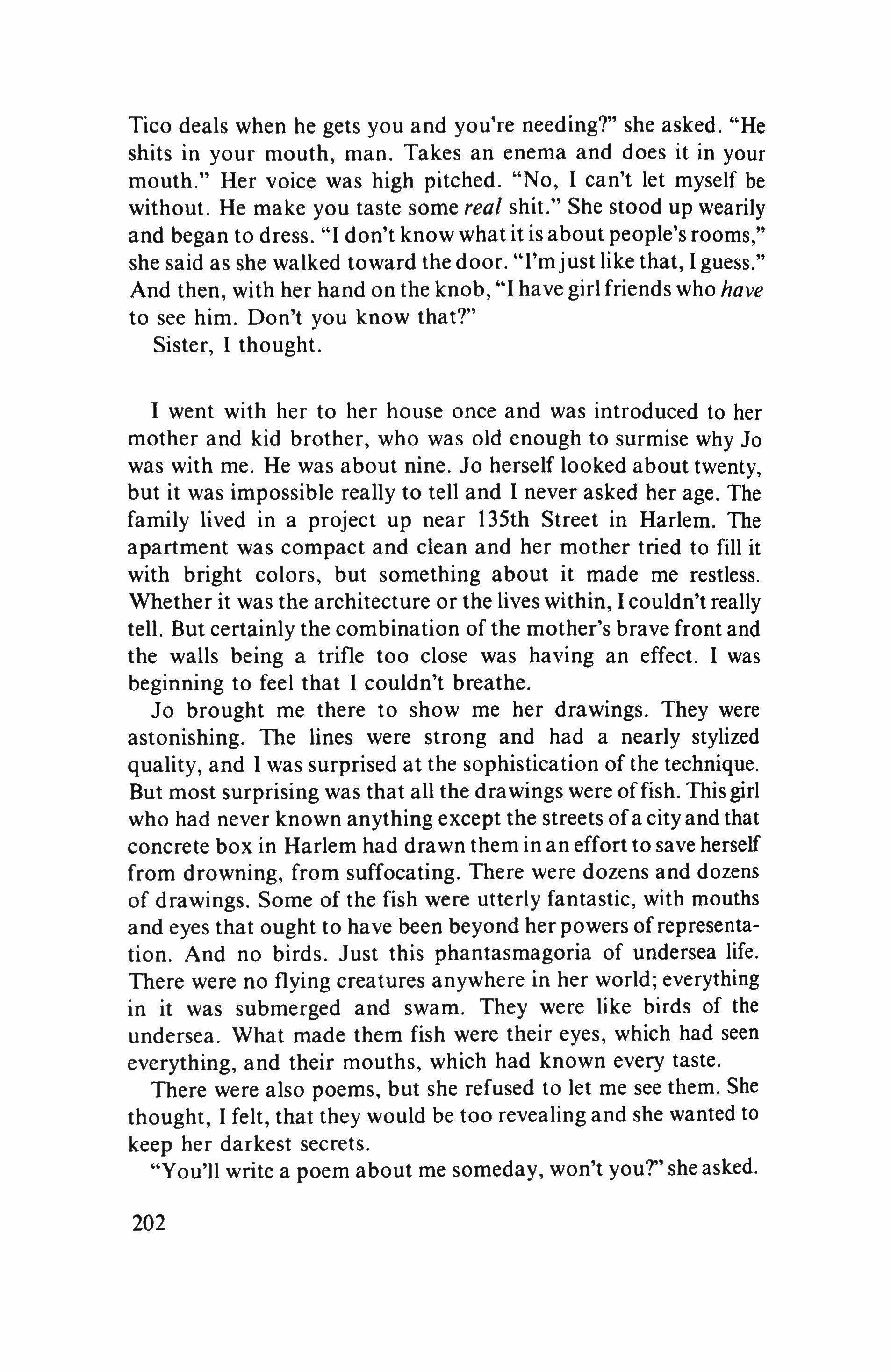
Tico deals when he gets you and you're needing?" she asked. "He shits in your mouth, man. Takes an enema and does it in your mouth." Her voice was high pitched. "No, 1 can't let myself be without. He make you taste some real shit." She stood up wearily and began to dress. "I don't know what it is about people's rooms," she said as she walked toward the door. "I'mjust like that, 1 guess." And then, with her hand on the knob, "I have girl friends who have to see him. Don't you know that?"
Sister, I thought.
I went with her to her house once and was introduced to her mother and kid brother, who was old enough to surmise why Jo was with me. He was about nine. Jo herself looked about twenty, but it was impossible really to tell and 1 never asked her age. The family lived in a project up near 135th Street in Harlem. The apartment was compact and clean and her mother tried to fill it with bright colors, but something about it made me restless. Whether it was the architecture or the lives within, I couldn't really tell. But certainly the combination of the mother's brave front and the walls being a trifle too close was having an effect. 1 was beginning to feel that I couldn't breathe.
Jo brought me there to show me her drawings. They were astonishing. The lines were strong and had a nearly stylized quality, and I was surprised at the sophistication of the technique. But most surprising was that all the drawings were offish. This girl who had never known anything except the streets of a city and that concrete box in Harlem had drawn them in an effort to save herself from drowning, from suffocating. There were dozens and dozens of drawings. Some of the fish were utterly fantastic, with mouths and eyes that ought to have been beyond her powers ofrepresentation. And no birds. Just this phantasmagoria of undersea life. There were no flying creatures anywhere in her world; everything in it was submerged and swam. They were like birds of the undersea. What made them fish were their eyes, which had seen everything, and their mouths, which had known every taste.
There were also poems, but she refused to let me see them. She thought, 1 felt, that they would be too revealing and she wanted to keep her darkest secrets.
"You'll write a poem about me someday, won't you?" she asked.
"1 don't write poems," I said. "I don't trust them. They exaggerate."
And then we left the house. "I'm clean," she said as we were leaving, "and I'm staying that way from now on." The police had picked her up and she had not had any heroin for a month. When we hit the street, though, a friend from the old days came up. "Hello, Snow," the friend said. There was a moment of awkwardness during which she introduced her friend as Robert, meanwhile giving him my right name. "You can make it back by yourself," she said, and they went into a bar together.
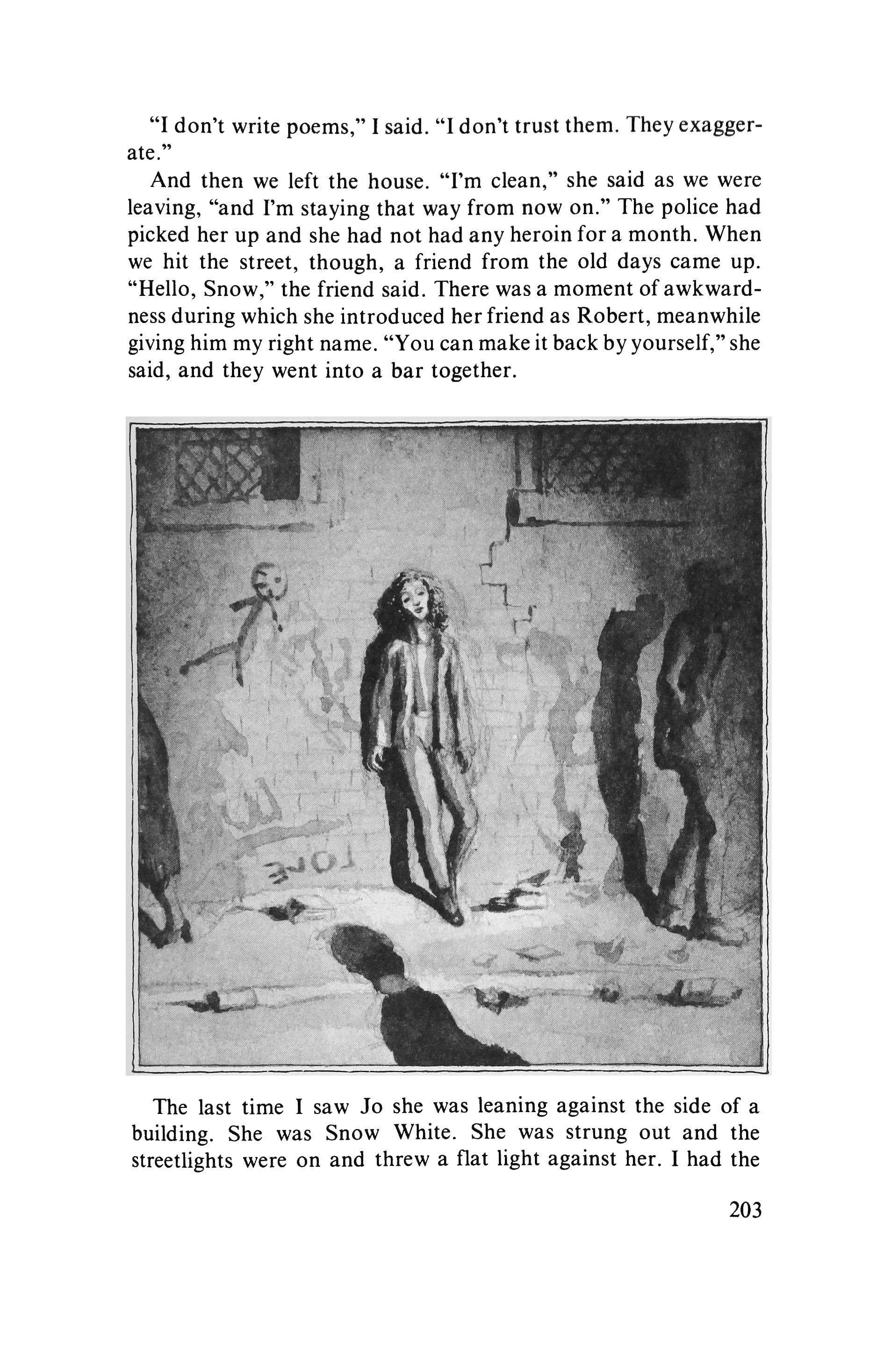
The last time 1 saw 10 she was leaning against the side of a building. She was Snow White. She was strung out and the streetlights were on and threw a flat light against her. 1 had the 203

sudden feeling that this was the last time I would be seeing hersomething about the way the light hit.
There is a white alabaster statue of Christ on the roof of a church exactly at the edge of the Bowery. The figure is illuminated by floodlights at the base, and he stands there with arms upraised in the characteristic Christ pose. He is slightly bent over. And what is quite as striking as the stark whiteness of the figure is the fact that his back is to the Bowery. He looks exhausted, woebegone seen from the Bowery, as if some tasks are beyond even his strength. It was that same exhaustion of the spirit that I sensed in Jo when I saw her standing under the streetlight.
"How you doing?" I said.
"Waiting for my ship to come in."
I had nothing more to say. Nor did she ask to use my room, though I still half-wished she would. But the relationship between us had lost all substance, all tangibility. It was dead. A couple of months later I heard she was, too. That was when I wrote the poem I said I wouldn't. First, I cast the I Ching:
48 Ching. A well. Abysmal water above gentle wind wood below. The building of a city is a man's activity. A well cannot be moved where nature has not decreed.
A middle-class black woman I knew prodded the story out of me once and asked, "Didn't she ever cook for you?"
"The only thing she cooked was in a spoon," I said. The answer pleased me. But far from the look of admiration I expected, there was a questioning look instead. As if to say: then what was in it for you? And I had no answer. But there must have been something for both of us. We must each have seen something in the look of the other.
What I see when I think of Jo now is the almost nonmateriality of her face, that madonna's face. After all this time what I am haunted by is the look ofdeath in her face. Was that what made her seem like a madonna? I can hardly say any more what it was that I saw when I looked at her. And did she see in the pigment of my face the look of her own death? Was the appeal her own negation? I distrust tidy and elaborate explanations. I am much more persuaded by simple gestures-the truly pleased smile on her face after the Greek sailor rushed down the stairs. I think she knew what he
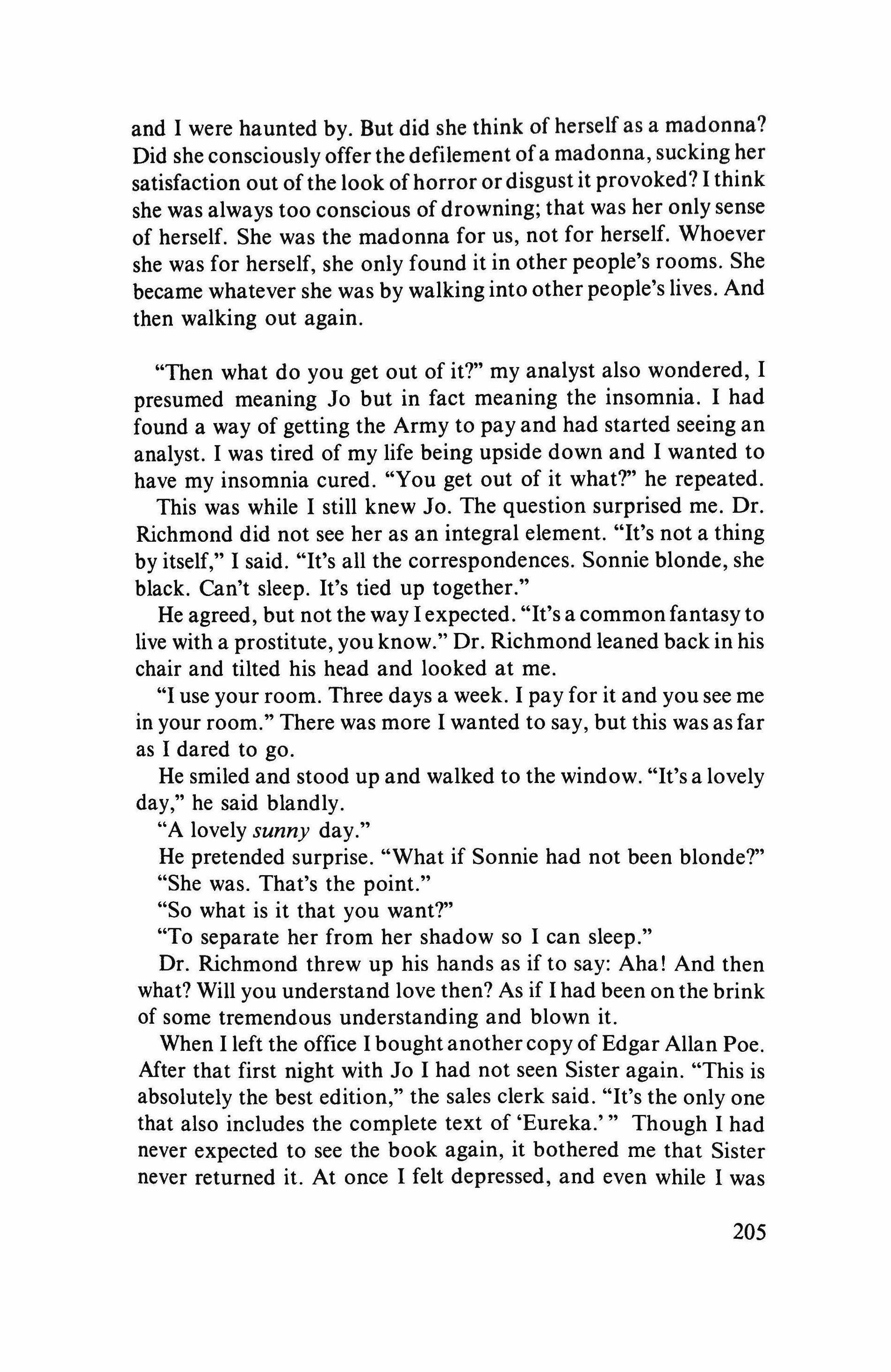
and I were haunted by. But did she think of herself as a madonna? Did she consciously offer the defilement of a madonna, sucking her satisfaction out of the look of horror or disgust it provoked? I think she was always too conscious ofdrowning; that was her only sense of herself. She was the madonna for us, not for herself. Whoever she was for herself, she only found it in other people's rooms. She became whatever she was by walking into other people's lives. And then walking out again.
"Then what do you get out of it?" my analyst also wondered, I presumed meaning Jo but in fact meaning the insomnia. I had found a way of getting the Army to pay and had started seeing an analyst. I was tired of my life being upside down and I wanted to have my insomnia cured. "You get out of it what?" he repeated.
This was while I still knew Jo. The question surprised me. Dr. Richmond did not see her as an integral element. "It's not a thing by itself," I said. "It's all the correspondences. Sonnie blonde, she black. Can't sleep. It's tied up together."
He agreed, but not the way I expected. "It's a common fantasy to live with a prostitute, you know." Dr. Richmond leaned back in his chair and tilted his head and looked at me.
"I use your room. Three days a week. I pay for it and you see me in your room." There was more I wanted to say, but this was as far as 1 dared to go.
He smiled and stood up and walked to the window. "It's a lovely day," he said blandly.
"A lovely sunny day."
He pretended surprise. "What if Sonnie had not been blonde?"
"She was. That's the point."
"So what is it that you want?"
"To separate her from her shadow so I can sleep."
Dr. Richmond threw up his hands as if to say: Aha! And then what? Will you understand love then? As if I had been on the brink of some tremendous understanding and blown it.
When I left the office I bought another copy of Edgar Allan Poe. After that first night with Jo I had not seen Sister again. "This is absolutely the best edition," the sales clerk said. "It's the only one that also includes the complete text of 'Eureka.''' Though 1 had never expected to see the book again, it bothered me that Sister never returned it. At once I felt depressed, and even while 1 was
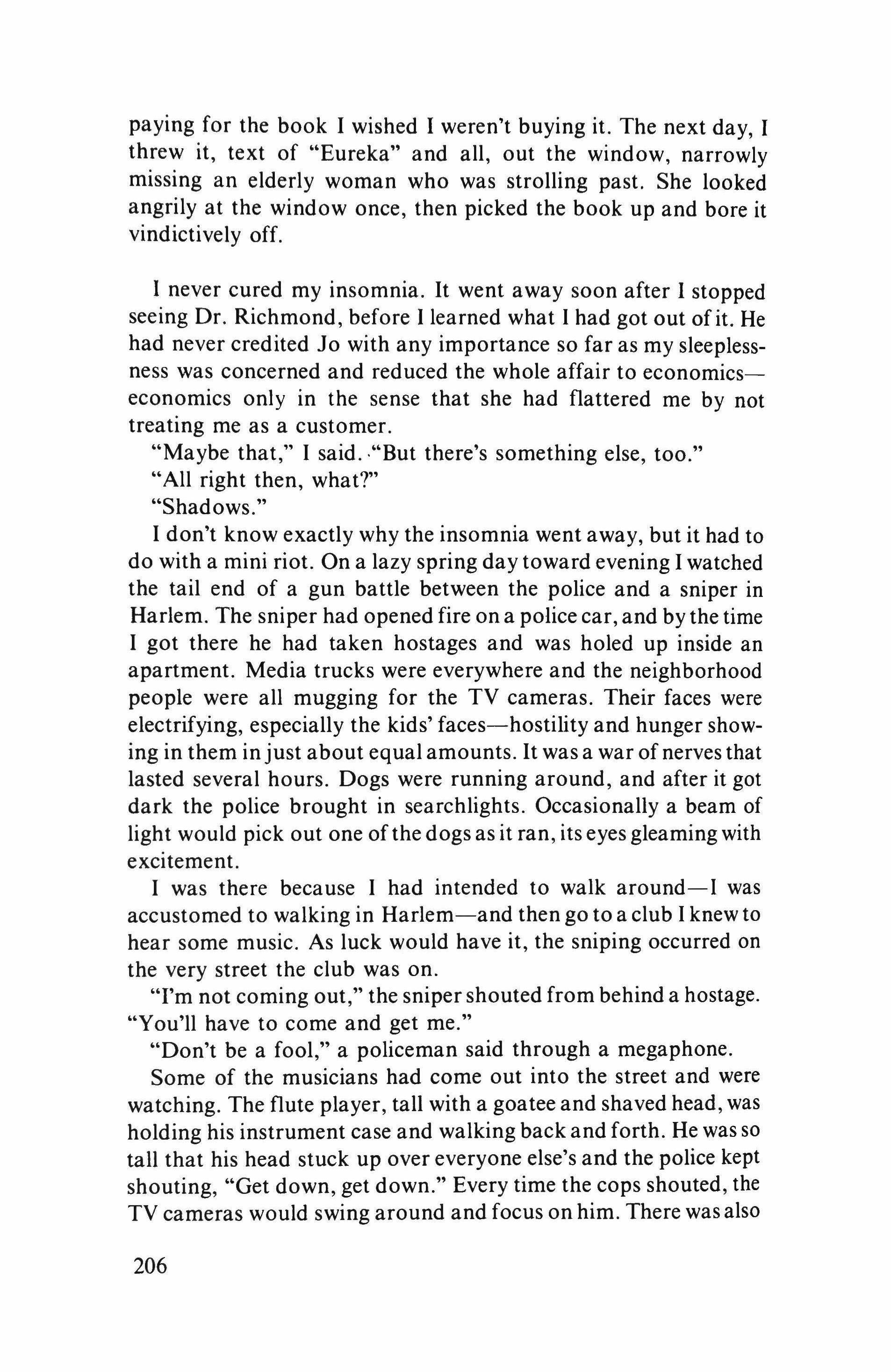
paying for the book I wished I weren't buying it. The next day, I threw it, text of "Eureka" and all, out the window, narrowly missing an elderly woman who was strolling past. She looked angrily at the window once, then picked the book up and bore it vindictively off.
I never cured my insomnia. It went away soon after I stopped seeing Dr. Richmond, before I learned what I had got out ofit. He had never credited Jo with any importance so far as my sleeplessness was concerned and reduced the whole affair to economicseconomics only in the sense that she had flattered me by not treating me as a customer.
"Maybe that," I said. ·"But there's something else, too."
"All right then, what?"
"Shadows."
I don't know exactly why the insomnia went away, but it had to do with a mini riot. On a lazy spring day toward evening I watched the tail end of a gun battle between the police and a sniper in Harlem. The sniper had opened fire on a police car, and by the time I got there he had taken hostages and was holed up inside an apartment. Media trucks were everywhere and the neighborhood people were all mugging for the TV cameras. Their faces were electrifying, especially the kids' faces-hostility and hunger showing in them injust about equal amounts. It was a war of nerves that lasted several hours. Dogs were running around, and after it got dark the police brought in searchlights. Occasionally a beam of light would pick out one of the dogs as it ran, its eyes gleaming with excitement.
I was there because I had intended to walk around-l was accustomed to walking in Harlem-and then go to a club I knew to hear some music. As luck would have it, the sniping occurred on the very street the club was on.
"I'm not coming out," the sniper shouted from behind a hostage. "You'll have to come and get me."
"Don't be a fool," a policeman said through a megaphone.
Some of the musicians had come out into the street and were watching. The flute player, tall with a goatee and shaved head, was holding his instrument case and walking back and forth. He was so tall that his head stuck up over everyone else's and the police kept shouting, "Get down, get down." Every time the cops shouted, the TV cameras would swing around and focus on him. There was also
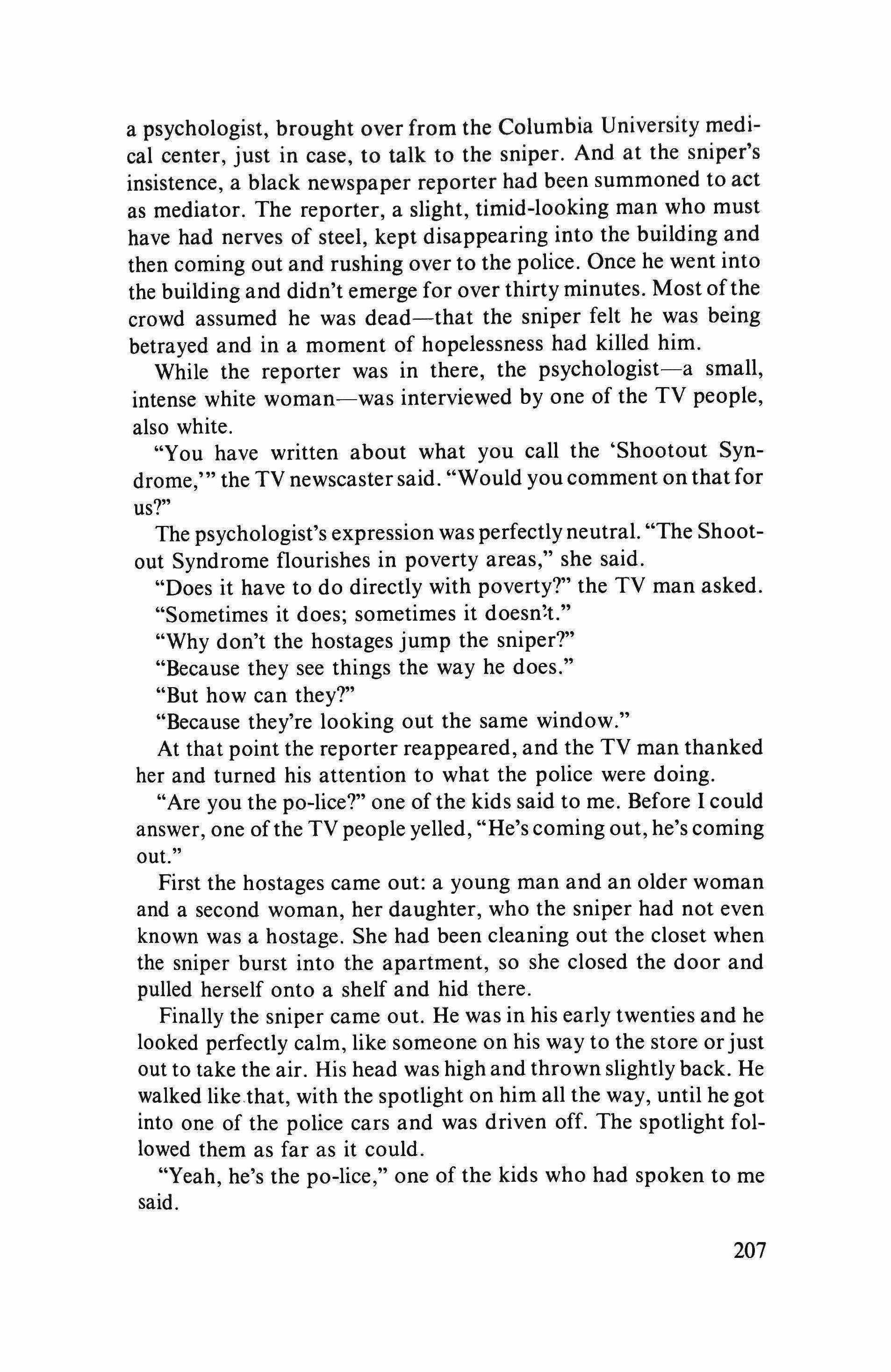
a psychologist, brought over from the Columbia University medical center, just in case, to talk to the sniper. And at the sniper's insistence, a black newspaper reporter had been summoned to act as mediator. The reporter, a slight, timid-looking man who must have had nerves of steel, kept disappearing into the building and then coming out and rushing over to the police. Once he went into the building and didn't emerge for over thirty minutes. Most ofthe crowd assumed he was dead-that the sniper felt he was being betrayed and in a moment of hopelessness had killed him.
While the reporter was in there, the psychologist-a small, intense white woman-was interviewed by one of the TV people, also white.
"You have written about what you call the 'Shootout Syndrome," the TV newscaster said. "Would you comment on that for us?"
The psychologist's expression was perfectly neutral. "The Shootout Syndrome flourishes in poverty areas," she said.
"Does it have to do directly with poverty?" the TV man asked.
"Sometimes it does; sometimes it doesn't."
"Why don't the hostages jump the sniper?"
"Because they see things the way he does."
"But how can they?"
"Because they're looking out the same window."
At that point the reporter reappeared, and the TV man thanked her and turned his attention to what the police were doing.
"Are you the po-lice?" one of the kids said to me. Before I could answer, one of the TV people yelled, "He's coming out, he's coming out."
First the hostages came out: a young man and an older woman and a second woman, her daughter, who the sniper had not even known was a hostage. She had been cleaning out the closet when the sniper burst into the apartment, so she closed the door and pulled herself onto a shelf and hid there.
Finally the sniper came out. He was in his early twenties and he looked perfectly calm, like someone on his way to the store or just out to take the air. His head was high and thrown slightly back. He walked like that, with the spotlight on him all the way, until he got into one of the police cars and was driven off. The spotlight followed them as far as it could.
"Yeah, he's the po-lice," one of the kids who had spoken to me said.

And that was when the thing happened that permanently changed how I see, launching me into the present forever. Standing there was Jo's little brother, like some biblical David, holding a piece of cinder in his hand. I had just enough time to recognize him before a searing pain dropped me to my knees and everything went blank. The rock struck my right eye, blinding it for all my days to come.
For three months I wore a black patch over my eye while the doctors tried vainly to preserve the sight in it. And like the opening of a flower, the closed eye miraculously produced a new way of seeing. You know that when you see only through one eye, the world is flatter; you lose your perception of depth. That piece of cinder walled me off from everything I had known before. It changed time for me.
When I was precipitated out of the self that I was, I became an exile in a world in which there were only surfaces, a series of flat moments, one laid down on top of the other. When I discovered how to see in that world, I realized that that was what had always been there. It was always new. And the sadness this produced was incomparable to anything I had known before-because I could feel the tirne-ladenness of the world.
You may wonder why I am not bitter, why I do not want Jo's brother blinded or worse. But my exile in the present has freed me from the nightmare of history, and from merely personal guilt. Jo is the memory I am memorizing now. She is who I make up anewso I have gotten something from it after all.

I think I am going crazy. I think I am going to have a nervous breakdown. When doors open, tigers leap. I call on myselffor help but there is nobody home when I call. I am a big zero inside, like a big balloon expanding and going to explode into still more of a nothingness. I am pulling cables when I am with people, to keep myself rooted to the spot. I was at the Presbyterian Day Center for two months because I could feel it coming on strong then. I strung beads there, did the yoga exercises, did the finger painting, made the pot holders and the ashtrays, to keep it away. There was group therapy there, where we talked about linear and lump thinking, about the implosion on the mind, about getting on the merry-goround wherever you are, about Marshall McLuhan, and about gettingjobs. But it was still coming on. One night I fell down on the floor at home in a faint when it really came close. It was awful getting a glimpse of the chaos behind it all. I did not want anyone else to see it because they would be frightened crazy too. I did something with whatever it is in my ceramics class at the Day Center. I made a head out of it, a head with two faces-the shrink of fear on one side and the cosmicjoker on the other. Finally I got a

job downtown at Macy's tallying all the bedspreads that were to go from downtown to the branches in the suburbs. There was a special sign-in, sign-out chart where I wrote down the time I went to the washroom and the time I came back. I wondered, what do they figure is the right length of time to spend in the washroom? I wanted it to be a break for me to light up a cigarette, and they wanted me to keep the numbers moving. I moved the carbon numbers from squares in vertical columns on pink paper to squares in horizontal rows on white paper. When I finished a stack of numbers I sent it down the line to be stapled and stacked into bundles. Eventually someone came and took the bundles away. There were so many stacks of numbers and so many people at desks facing the wall who would not talk because they had to keep the numbers moving too. I stopped going there after two weeks.
Now I work as a volunteer at Huckleberry House in the HaightAshbury. I talk and paint with the runaways there. They want to run somewhere from something and I listen to them and we put something down in paint. Last Wednesday a priest came in wearing blue jeans. He did not want anyone to know he was a priest. He wanted to be with two boys who came in because they had taken something, I think it was speed, and they were afraid of freaking out. The priest said he wanted to put himself down in paint too. But he kept looking over at the boys. He had a dark Van Gogh-like thing going, I thought, and he said he felt sad and I wanted to see him make a Matisse out of it. I was concerned about the dark picture he was making; there was a deep dark purple around everything and a small white dot in the middle of the page. Well, I am afraid of the darkness getting hold of me. I make sure there is some yellow or red in all my paintings.
It did get hold of me once. That was when I had my real nervous breakdown, when I ended up at County Hospital. That year was the septenary of Dante's birthday. I was thirty-five then and Dante was thirty-five when he set out in the Inferno. Dante unified it all into a system. I think I got it all unified too at County Hospital, but my mind had to keep running like a computer run wild to keep it that way. I was always ending up outside it all. I was immortal too, I felt that, but I decided I did not want that. I did not want to be outside it all and going on forever and ever. If you figured it all out in your head, that is where you would be-outside it all.
Part of that immortal bit was because a woman in the hospital

gave me a paper cup and asked me to get a drink for her. The water fountain was broken and the only place where there was something to drink was in the washroom, and why would she ask me anyway? So I figured out what she really wanted and I brought it to her in a paper cup. She said, "It looks like orangejuice." She said, "It tastes like orange juice." I said, it must be so if she says so. I said, to myself, "They must have done something to my blood. It must have been that doctor on Sutter Street who gave me my last physical. The blood cells were fixed then with his probing so that when it comes out it will taste like orangejuice; the cells split like amoebas, and that way they never die-they could go on forever." I got to County Hospital ona Friday afternoon. A nurse gave me a pair of baggy blue pajamas and pointed out the bed I could sit on. At six o'clock the nurse came again to say the doctor wanted to examine me. I lay down on the table in the examining room. The doctor flicked a light in my eye. I asked, "Am I going blind?" He said, "No, you are not going blind." He put the stethoscope to my heart. I asked, "Am I going to die?" He said nothing. He scraped the soles of my feet. They were pretty dirty, I had been barefoot all afternoon. He said, "Get up and sit in the chair, another doctor will be in to see you in a minute." The other doctor came in. He was the psychiatrist. "Tell me what brought you here." I told him about talking to Herbert that morning about my going to leave him and I was going to see my teacher, and then I saw Herbert's awful face. I saw Christ and Hitler crucified and crucifying in one person. Then everything went black in the room for me and I knew something terrible was wrong. I lay down on the floor so I would not fall because I could not see. I could not hear with the ringing in my ears. "Take me to the hospital!" I said to Herbert. "Take me to the hospital!" Then the darkness and the ringing went away, but I knew I had to go to the hospital. There was no time to put on stockings or comb my hair or worry about the fact that I was not wearing a brassiere. A coat was all I needed. I knew it was an emergency. Herbert was not sure of the way to the hospital and I was in a hurry to see the doctor. I said, "Kaiser Hospital. That is where we have our group insurance." They gave me a student form to sign. I signed my name Heather Williams. I said to myself, "That is me. The real person I am. The name I had in the orphanage." Then Herbert had to sign his name, Herbert Jenkins, because he was the husband. I don't know what Herbert and the nurse said,
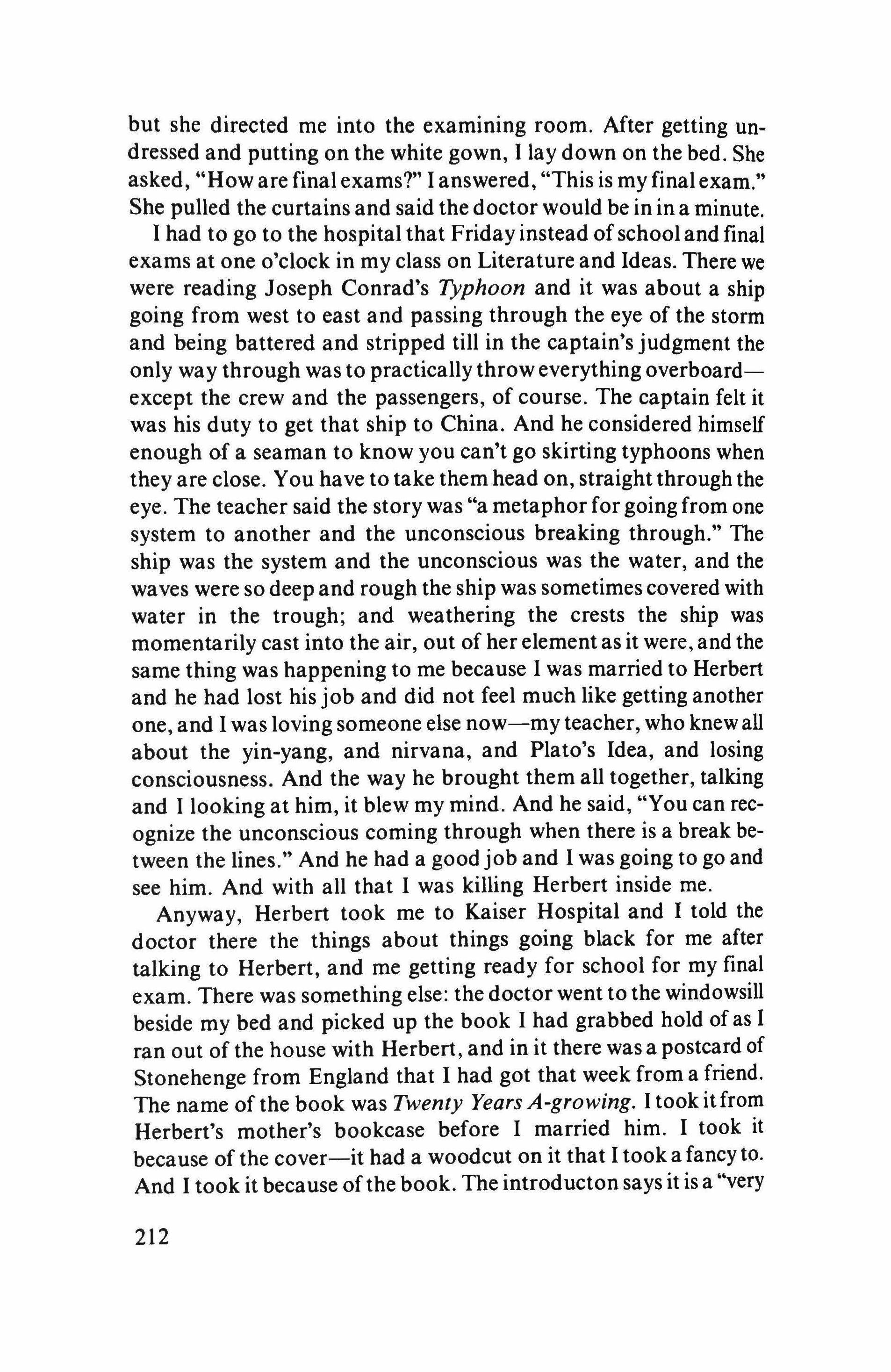
but she directed me into the examining room. After getting undressed and putting on the white gown, I lay down on the bed. She asked, "How are final exams?" I answered, "This is my final exam." She pulled the curtains and said the doctor would be in in a minute. I had to go to the hospital that Friday instead ofschool and final exams at one o'clock in my class on Literature and Ideas. There we were reading Joseph Conrad's Typhoon and it was about a ship going from west to east and passing through the eye of the storm and being battered and stripped till in the captain's judgment the only way through was to practically throw everything overboardexcept the crew and the passengers, of course. The captain felt it was his duty to get that ship to China. And he considered himself enough of a seaman to know you can't go skirting typhoons when they are close. You have to take them head on, straight through the eye. The teacher said the story was "a metaphor for going from one system to another and the unconscious breaking through." The ship was the system and the unconscious was the water, and the waves were so deep and rough the ship was sometimes covered with water in the trough; and weathering the crests the ship was momentarily cast into the air, out of her element as it were, and the same thing was happening to me because I was married to Herbert and he had lost his job and did not feel much like getting another one, and I was loving someone else now-my teacher, who knew all about the yin-yang, and nirvana, and Plato's Idea, and losing consciousness. And the way he brought them all together, talking and I looking at him, it blew my mind. And he said, "You can recognize the unconscious coming through when there is a break between the lines." And he had a good job and I was going to go and see him. And with all that I was killing Herbert inside me.
Anyway, Herbert took me to Kaiser Hospital and I told the doctor there the things about things going black for me after talking to Herbert, and me getting ready for school for my final exam. There was something else: the doctor went to the windowsill beside my bed and picked up the book I had grabbed hold of as I ran out of the house with Herbert, and in it there was a postcard of Stonehenge from England that I had got that week from a friend. The name of the book was Twenty Years A-growing. I took itfrom Herbert's mother's bookcase before I married him. I took it because of the cover-it had a woodcut on it that I took a fancy to. And I took it because of the book. The introducton says it is a "very

odd document," "an account of neolithic civilization from the inside." The book is an autobiography of a twenty-year-old man who grew up in Great Blasket, a tiny island off the coast of a tiny island where I was born. The young man puts down in wit and astonishment his experience of progress and civilization on visits to the Mainland, where I grew up. The introducton said, we are the "superiors in astonishment."
That introduction was written by a man named E. M. Forster. I know nothing of that man, but the name rings a bell. Wasn't it a man with a name like that who wrote Passage to India? Anyway this E. M. Forster liked the young man's book. "Nor is a wiseacre speaking" for that "neolithic civilization." "We are entertained by a lively young man, who likes dancing and the movies, and was smart at his lessons. But he is able to keep our world in its place, and to view it only from his own place, and his spirit never abandons the stronghold to which, in the final chapter, his feet will return." "When I returned home," the young man concludes, "the lamps were being lit in the houses. I went in. My father and grandfather were sitting on either side of the fire, my grandfather smoking his old pipe." I keep that book on my shelf at home beside my father's book entitled Forged Anonymous and Suspect Documents. Herbert found that book for me in a bookstore. He was not working then, and he had time to browse.
At Kaiser Hospital the doctor, having opened and closed the book I had laid on the windowsill, asked me, "How do you feel now?" I told him I could hear it and feel it. "There is a ringing in my ears like the sound of the sea, I feel as though the sea is running in my veins, and I hear it like when you hold a seashell to your ear." He said nothing. He was a quiet, gentle man. He went out of the room, came back, and gave me an injection. I knew then that that was euthanasia, because that was what was best for me. The doctor went out of the room and drew the curtains and seconds later I heard a bell ring. It could have been the telephone, but I was sure it was the bell they ring for the last rites when the priest is coming. I lay there for a while waiting for the priest to come, but the doctor came and said that I could get dressed and that I would have to go to County Hospital. He said the ambulance would take me or I could go with Herbert in his car. I wanted the ambulance to take me.
Anyway the psychiatrist at County Hospital said, "Tell me what


brought you here." I told him about things going black for me at home and me wanting to leave Herbert and go and see my teacher at school but that instead I had to go to Kaiser Hospital and they sent me here. That is what I told him. I said, there are a whole lot of other things on my mind-about Spengler and the decline of civilization, about Stonehenge and computers, and Dante unified it all once, and he started out with the Inferno, and maybe I would have to go through that too. I told him I felt the history of the race was forged in my unconscious-like they say, "Ontogeny recapitulates phylogeny," and the history of the race is repeated in the history of the individual. I told him that they say that about epic heroes too. Like the heroes in Homer's tales. I have the feeling I am an epic hero. The doctor shook his head and went out of the room in a hurry. He came back with some pieces of paper and a pencil and asked me how I was on proverbs. I knew that that was some kind of test. But he being a psychiatrist, I was not sure whether it was an IQ test or a sanity test. I told him that a lot of proverbs say the same thing, like "The grass is greener on the other side" and "Distance lends enchantment to the view." But then I said they say "You should look before you leap," yet "he who hesitates is lost." He filled in something on a form and told me I could go back to my bed in the ward. It was getting dark and then I had missed supper, being with the doctor. I watched the other women wandering around like zombies in their baggy pajamas. It was like being back in the orphanage in Ireland again with the long rows and rows of beds. Everything was all right till they turned out the lights and the darkness got hold of me. This time the darkness was outside me. I called out loud for the doctor, but the doctor did not come. I called again but nobody came. I began to scream. I could not feel the bed beneath me. I was falling off the bed. I was falling off the planet. What was coming next? Infinite acceleration. A nurse came with a thick leather strap and strapped my ankle to the bed. She said, "That is so you won't fall out of bed." She went away again and it was still dark. I wondered about the strap. I did not trust them. Maybe it was some kind of challenge, something for me to struggle out of, but I could see that it was too thick for that, I would have to resign myself to it. I said, "I will have to go to sleep, then I will wake up and it will be morning." But I wondered, "How am I going to be able to sleep with a thing like that on my leg? I cannot move." The next morning I wanted to get up and go to the bathroom,
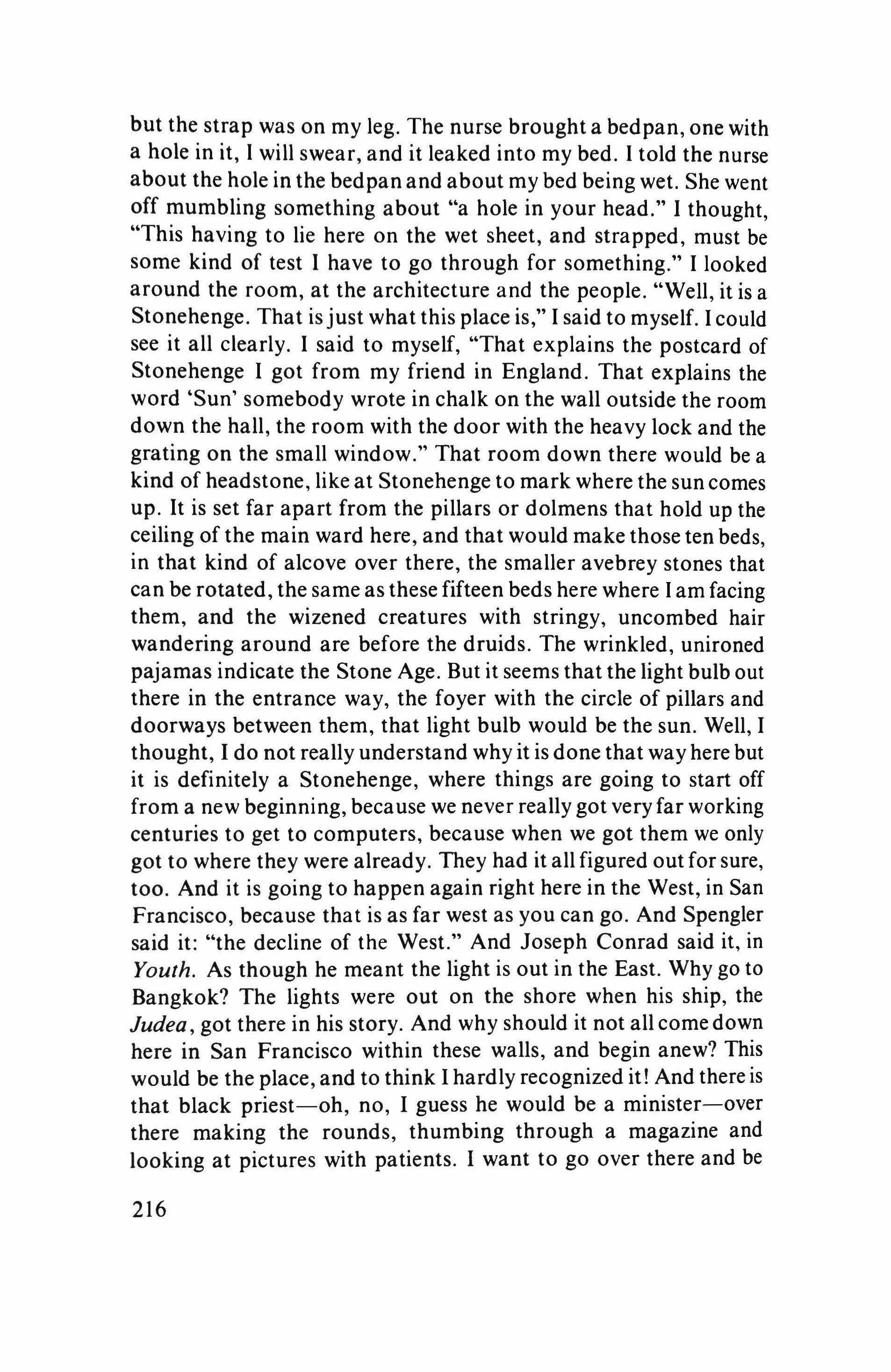
but the strap was on my leg. The nurse brought a bedpan, one with a hole in it, I will swear, and it leaked into my bed. I told the nurse about the hole in the bedpan and about my bed being wet. She went off mumbling something about "a hole in your head." I thought, "This having to lie here on the wet sheet, and strapped, must be some kind of test I have to go through for something." I looked around the room, at the architecture and the people. "Well, it is a Stonehenge. That is just what this place is," I said to myself. I could see it all clearly. I said to myself, "That explains the postcard of Stonehenge I got from my friend in England. That explains the word 'Sun' somebody wrote in chalk on the wall outside the room down the hall, the room with the door with the heavy lock and the grating on the small window." That room down there would be a kind of headstone, like at Stonehenge to mark where the sun comes up. It is set far apart from the pillars or dolmens that hold up the ceiling of the main ward here, and that would make those ten beds, in that kind of alcove over there, the smaller avebrey stones that can be rotated, the same as these fifteen beds here where I am facing them, and the wizened creatures with stringy, uncombed hair wandering around are before the druids. The wrinkled, unironed pajamas indicate the Stone Age. But it seems that the light bulb out there in the entrance way, the foyer with the circle of pillars and doorways between them, that light bulb would be the sun. Well, I thought, I do not really understand why it is done that way here but it is definitely a Stonehenge, where things are going to start off from a new beginning, because we never really got very far working centuries to get to computers, because when we got them we only got to where they were already. They had it all figured out for sure, too. And it is going to happen again right here in the West, in San Francisco, because that is as far west as you can go. And Spengler said it: "the decline of the West." And Joseph Conrad said it, in Youth. As though he meant the light is out in the East. Why go to Bangkok? The lights were out on the shore when his ship, the Judea, got there in his story. And why should it not all come down here in San Francisco within these walls, and begin anew? This would be the place, and to think I hardly recognized it! And there is that black priest-oh, no, I guess he would be a minister-over there making the rounds, thumbing through a magazine and looking at pictures with patients. I want to go over there and be
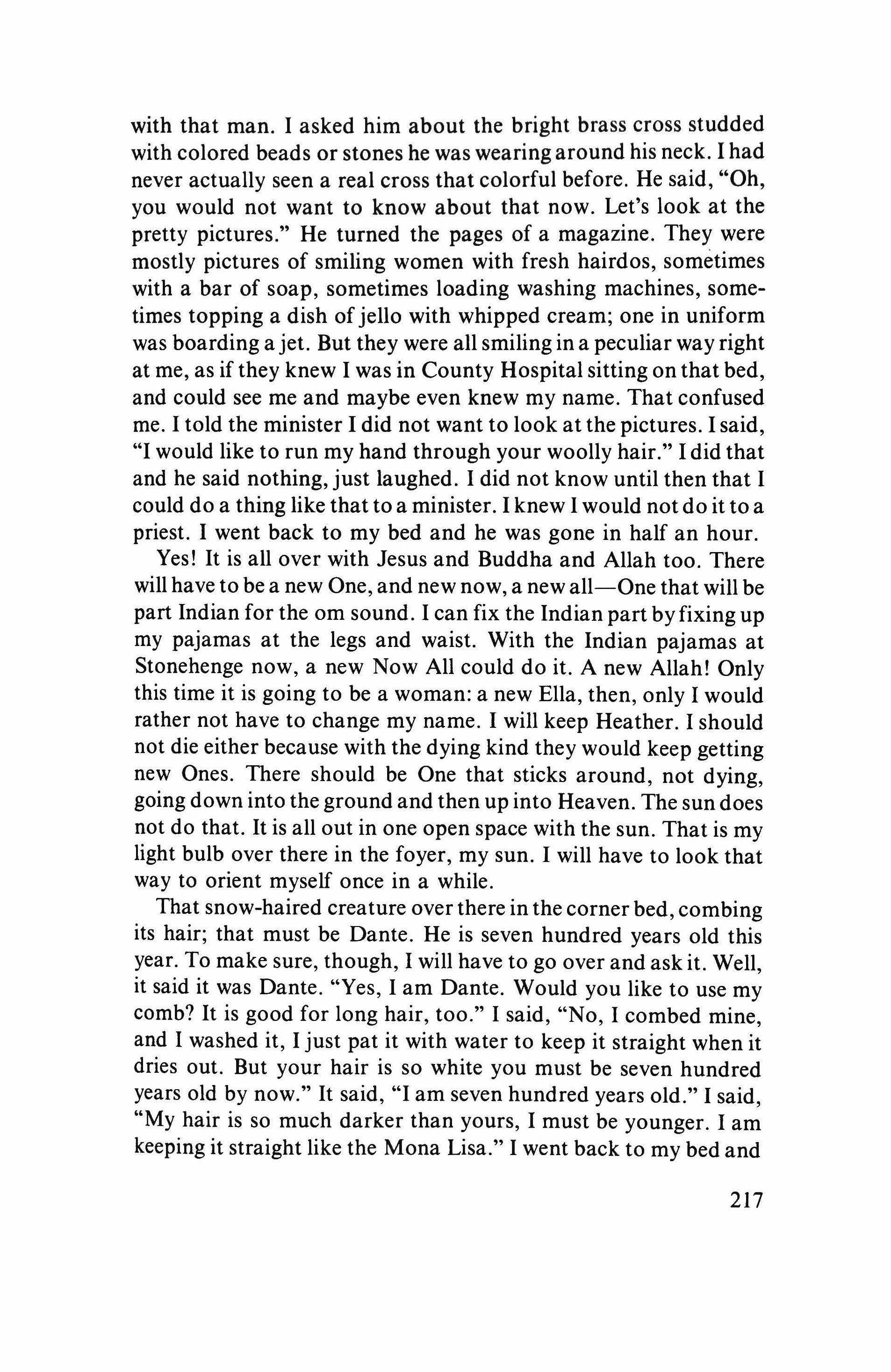
with that man. I asked him about the bright brass cross studded with colored beads or stones he was wearing around his neck. I had never actually seen a real cross that colorful before. He said, "Oh, you would not want to know about that now. Let's look at the pretty pictures." He turned the pages of a magazine. They were mostly pictures of smiling women with fresh hairdos, sometimes with a bar of soap, sometimes loading washing machines, sometimes topping a dish ofjello with whipped cream; one in uniform was boarding a jet. But they were all smiling in a peculiar way right at me, as if they knew I was in County Hospital sitting on that bed, and could see me and maybe even knew my name. That confused me. I told the minister I did not want to look at the pictures. I said, "I would like to run my hand through your woolly hair." I did that and he said nothing,just laughed. I did not know until then that I could do a thing like that to a minister. I knew I would not do it to a priest. I went back to my bed and he was gone in half an hour. Yes! It is all over with Jesus and Buddha and Allah too. There will have to be a new One, and new now, a newall-One that will be part Indian for the om sound. I can fix the Indian part byfixing up my pajamas at the legs and waist. With the Indian pajamas at Stonehenge now, a new Now All could do it. A new Allah! Only this time it is going to be a woman: a new Ella, then, only I would rather not have to change my name. I will keep Heather. I should not die either because with the dying kind they would keep getting new Ones. There should be One that sticks around, not dying, going down into the ground and then up into Heaven. The sun does not do that. It is all out in one open space with the sun. That is my light bulb over there in the foyer, my sun. I will have to look that way to orient myself once in a while.
That snow-haired creature over there in the corner bed, combing its hair; that must be Dante. He is seven hundred years old this year. To make sure, though, I will have to go over and ask it. Well, it said it was Dante. "Yes, I am Dante. Would you like to use my comb? It is good for long hair, too." 1 said, "No, 1 combed mine, and 1 washed it, 1 just pat it with water to keep it straight when it dries out. But your hair is so white you must be seven hundred years old by now." It said, "I am seven hundred years old." 1 said, "My hair is so much darker than yours, 1 must be younger. 1 am keeping it straight like the Mona Lisa." 1 went back to my bed and 217

dampened my hair with my hands with water from the washroom. I thought, Dante figured it all out, but only for his time. It is bigger than that now and has to be figured out all over again. And there should be somebody around to see it all through.
Well, here they bring supper-bread and margarine and watery cocoa on the enamel trolley. I wonder how they knew about that, what to bring, because that is what it was in the orphanage. This must be some sort of revival of that place which they have thrown in, like at celebrations. After supper they will all watch television in the big ward. It will probably be that friendly porpoise show again with the big fish going up and down in the water and a fake grin on its face. They say it is smiling. Then the lights will go out.
There is a whole lot about the insane ward: Dante, Stonehenge, and Spengler, and Hegel's bagel-he ate doughnuts without any jelly-and computers. Then there was the nightmare part like waiting for death in a death chamber solitary room. I would have walked, but the nurse dragged me along the floor-she was in such a hurry or something when I took off my pajamas in the ward. I wondered why they did not come to let me out to the washroom. It all started with everybody sitting on their beds waiting; then, with heads drooped, not waiting. And I said to myself, I have danced around that light bulb out there three times with my pajamas knotted up Indian style. I said, whatever it is they are waiting for or I want to do, this time I am going to take my clothes off.
Well all of that cleared up and they sent me to Langley Porter, where I discovered I was hearing voices and the doctor discovered I was deaf. He got me a swell operation and I could hear very well after that. It took me about six weeks in that hospital to get better. I wiped my teacher out of my mind. Herbert got a job and he smiled when he came to the hospital to take me home.
I went back to school to finish my master's degree. But something of the thing started up three months ago when I quit teaching at City College. I had read all the books, but that did not help me teach. Those students wanted to write about being drafted, about being in the army, in Japan, about escaping from Hungary, about getting jobs, and people. And I was instructed to give mainly Cs and Ds for it, and flunk them for grammar or spelling. Two misspellings on a page, I was instructed, and they were done for. And then it was just me there teaching. I could not spell much better than that myself. I could not go on with it. The day the master teacher came to observe me I knew I was supposed to go up
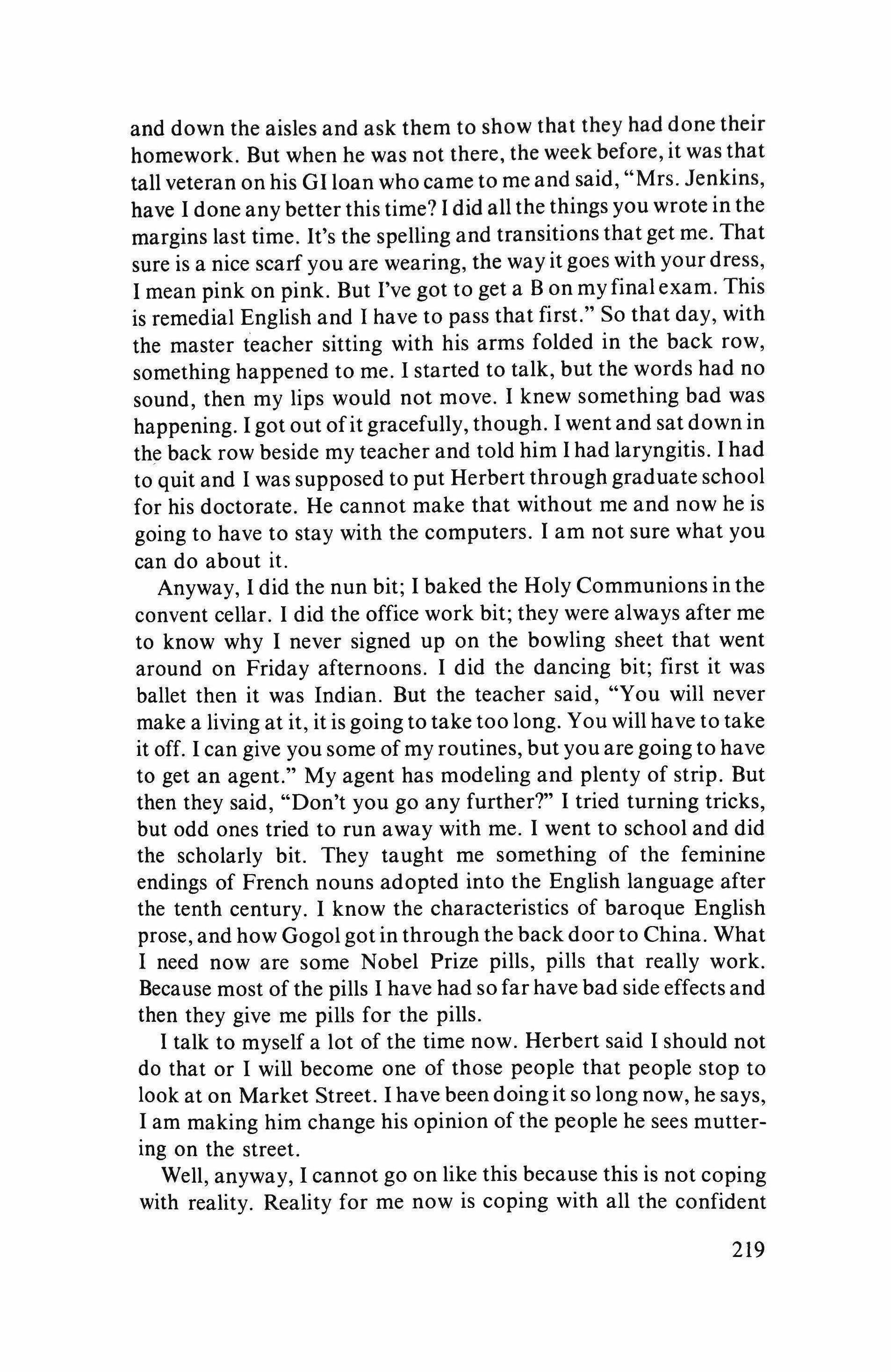
and down the aisles and ask them to show that they had done their homework. But when he was not there, the week before, it was that tall veteran on his GI loan who came to me and said, "Mrs. Jenkins, have I done any better this time? I did all the things you wrote in the margins last time. It's the spelling and transitions that get me. That sure is a nice scarf you are wearing, the way it goes with your dress, I mean pink on pink. But I've got to get a B on my final exam. This is remedial English and I have to pass that first." So that day, with the master teacher sitting with his arms folded in the back row, something happened to me. I started to talk, but the words had no sound, then my lips would not move. I knew something bad was happening. I got out ofit gracefully, though. I went and sat down in the back row beside my teacher and told him I had laryngitis. I had to quit and I was supposed to put Herbert through graduate school for his doctorate. He cannot make that without me and now he is going to have to stay with the computers. I am not sure what you can do about it.
Anyway, I did the nun bit; I baked the Holy Communions in the convent cellar. I did the office work bit; they were always after me to know why I never signed up on the bowling sheet that went around on Friday afternoons. I did the dancing bit; first it was ballet then it was Indian. But the teacher said, "You will never make a living at it, it is going to take too long. You will have to take it off. I can give you some of my routines, but you are going to have to get an agent." My agent has modeling and plenty of strip. But then they said, "Don't you go any further?" I tried turning tricks, but odd ones tried to run away with me. I went to school and did the scholarly bit. They taught me something of the feminine endings of French nouns adopted into the English language after the tenth century. I know the characteristics of baroque English prose, and how Gogol got in through the back door to China. What I need now are some Nobel Prize pills, pills that really work. Because most of the pills I have had so far have bad side effects and then they give me pills for the pills.
I talk to myself a lot of the time now. Herbert said I should not do that or I will become one of those people that people stop to look at on Market Street. I have been doing it so long now, he says, I am making him change his opinion of the people he sees muttering on the street.
Well, anyway, I cannot go on like this because this is not coping with reality. Reality for me now is coping with all the confident
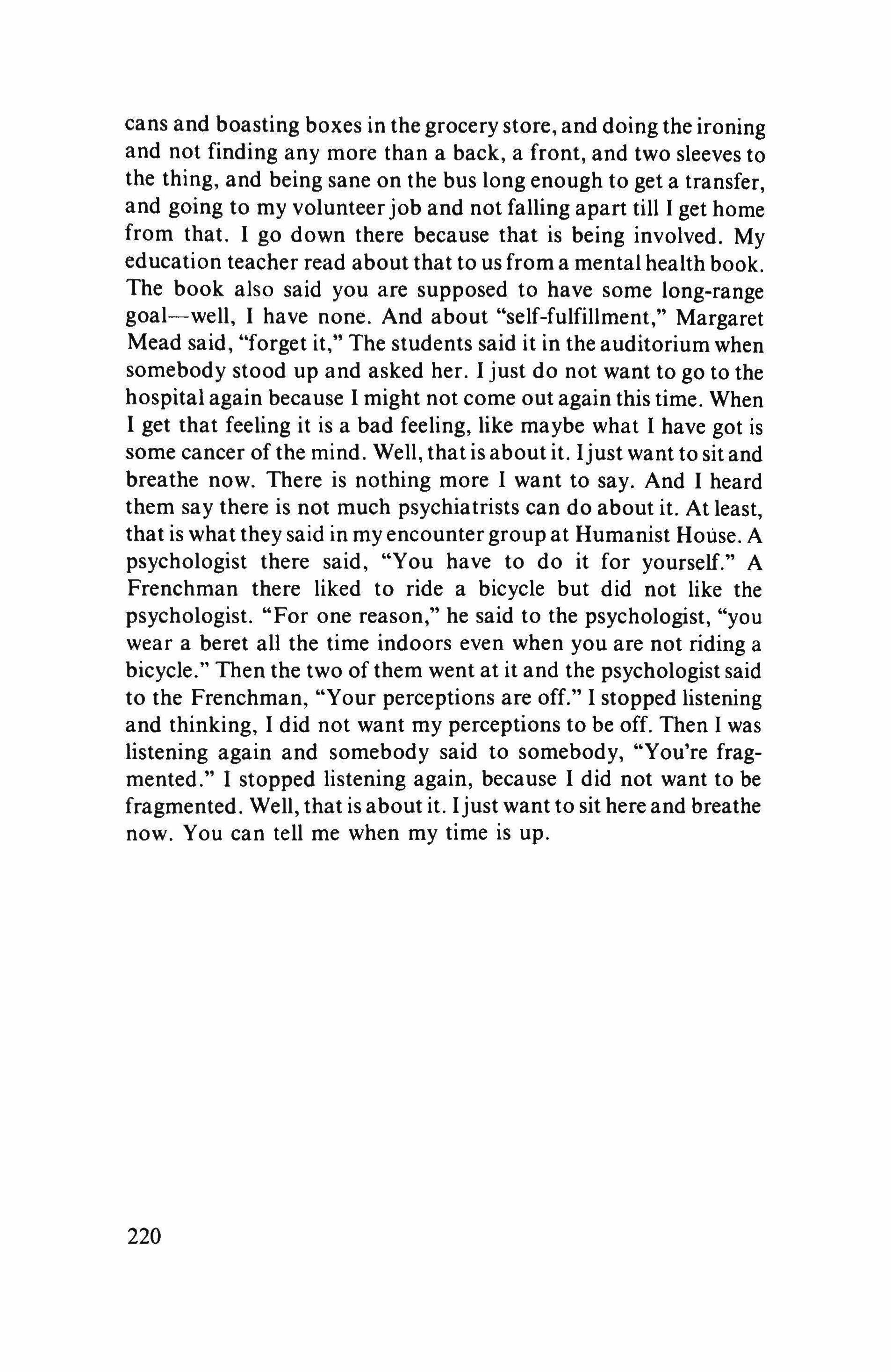
cans and boasting boxes in the grocery store, and doing the ironing and not finding any more than a back, a front, and two sleeves to the thing, and being sane on the bus long enough to get a transfer, and going to my volunteer job and not falling apart till I get home from that. I go down there because that is being involved. My education teacher read about that to us from a mental health book. The book also said you are supposed to have some long-range goal-well, I have none. And about "self-fulfillment," Margaret Mead said, "forget it," The students said it in the auditorium when somebody stood up and asked her. I just do not want to go to the hospital again because I might not come out again this time. When I get that feeling it is a bad feeling, like maybe what I have got is some cancer of the mind. Well, that is about it. Ijust want to sit and breathe now. There is nothing more I want to say. And I heard them say there is not much psychiatrists can do about it. At least, that is what they said in my encounter group at Humanist House. A psychologist there said, "You have to do it for yourself." A Frenchman there liked to ride a bicycle but did not like the psychologist. "For one reason," he said to the psychologist, "you wear a beret all the time indoors even when you are not riding a bicycle." Then the two of them went at it and the psychologist said to the Frenchman, "Your perceptions are off." I stopped listening and thinking, I did not want my perceptions to be off. Then I was listening again and somebody said to somebody, "You're fragmented." I stopped listening again, because I did not want to be fragmented. Well, that is about it. ljust want to sit here and breathe now. You can tell me when my time is up.
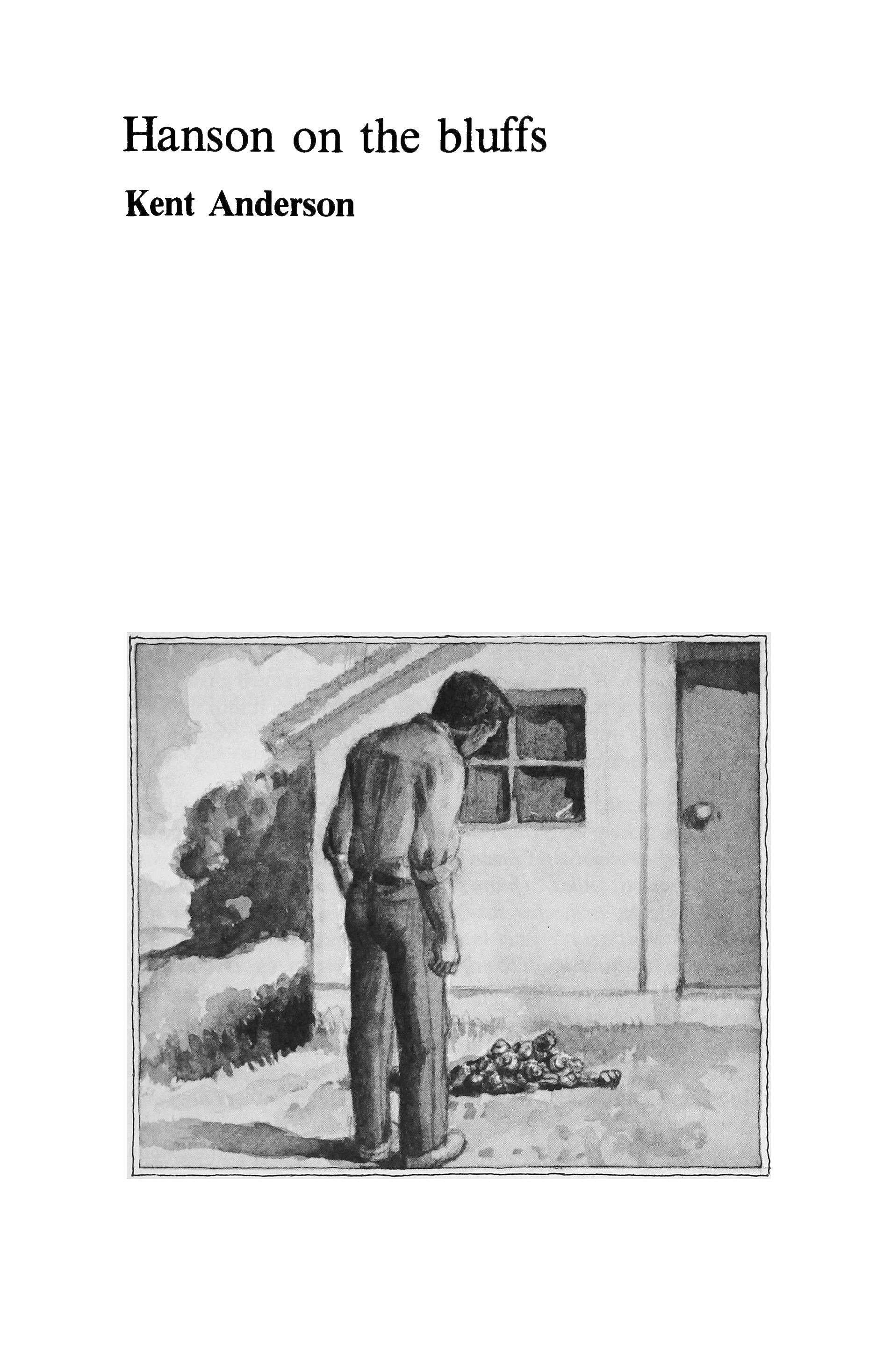
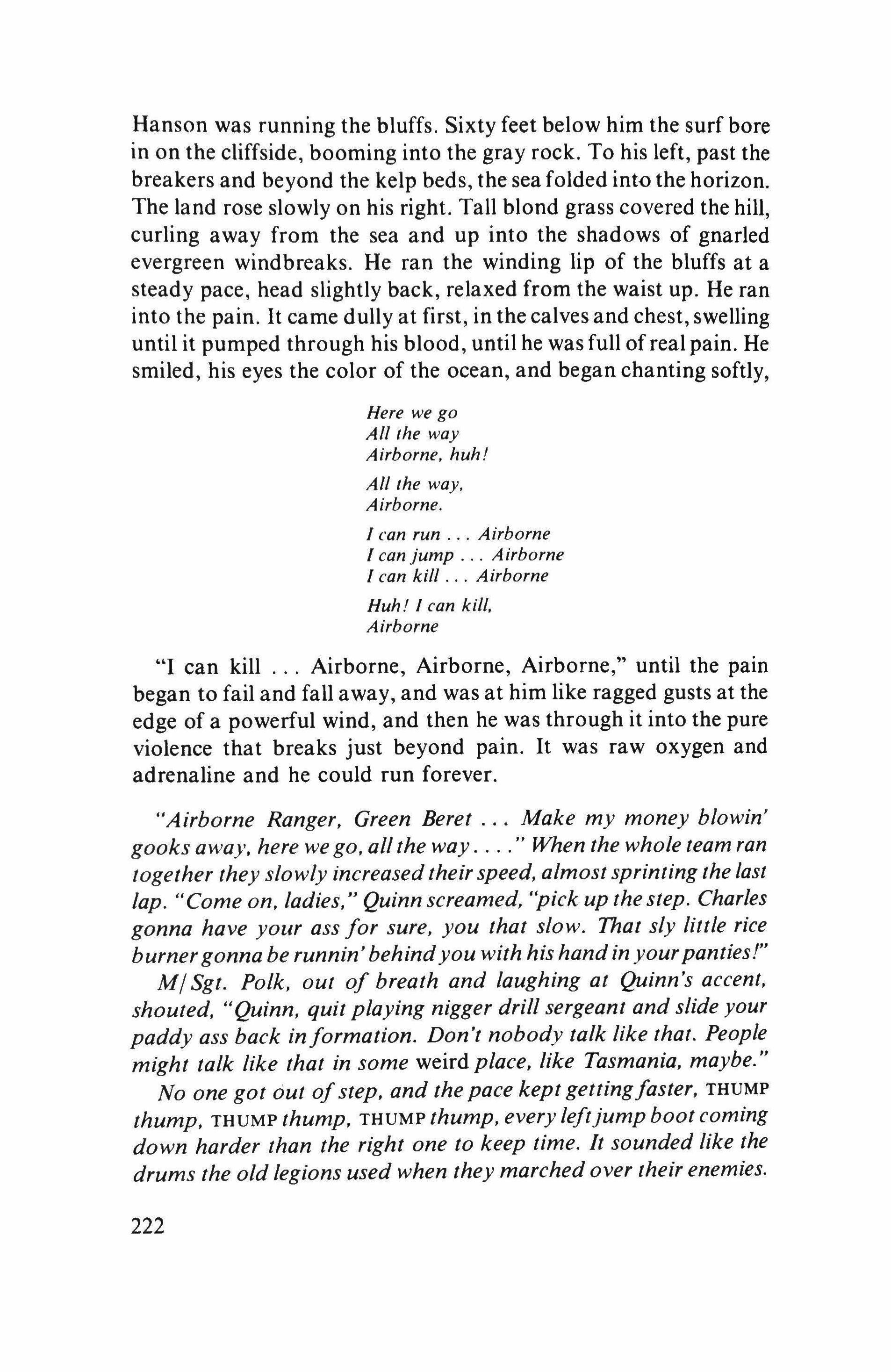
Hanson was running the bluffs. Sixty feet below him the surf bore in on the cliffside, booming into the gray rock. To his left, past the breakers and beyond the kelp beds, the sea folded into the horizon. The land rose slowly on his right. Tall blond grass covered the hill, curling away from the sea and up into the shadows of gnarled evergreen windbreaks. He ran the winding lip of the bluffs at a steady pace, head slightly back, relaxed from the waist up. He ran into the pain. It came dully at first, in the calves and chest, swelling until it pumped through his blood, until he was full of real pain. He smiled, his eyes the color of the ocean, and began chanting softly,
Here we go
All the way Airborne. huh!
All the way. Airborne.
I can run Airborne
I can jump Airborne
I can kill Airborne
Huh! I can kill. Airborne
"I can kill Airborne, Airborne, Airborne," until the pain began to fail and fall away, and was at him like ragged gusts at the edge of a powerful wind, and then he was through it into the pure violence that breaks just beyond pain. It was raw oxygen and adrenaline and he could run forever.
"Airborne Ranger. Green Beret Make my money blowin' gooks away. here we go, all the way When the whole team ran together they slowly increased their speed, almost sprinting the last lap. "Come on, ladies," Quinn screamed, "pick up the step. Charles gonna have your ass for sure, you that slow. That sly little rice burnergonna be runnin' behindyou with his hand in yourpanties!"
M/Sgt. Polk, out of breath and laughing at QUinn's accent, shouted, "Quinn, quit playing nigger drill sergeant and slide your paddy ass back information. Don't nobody talk like that. People might talk like that in some weird place, like Tasmania, maybe."
No one got out ofstep, and the pace kept gettingfaster, THUMP thump, THUMP thump, THUMP thump, every leftjump boot coming down harder than the right one to keep time. It sounded like the drums the old legions used when they marched over their enemies.
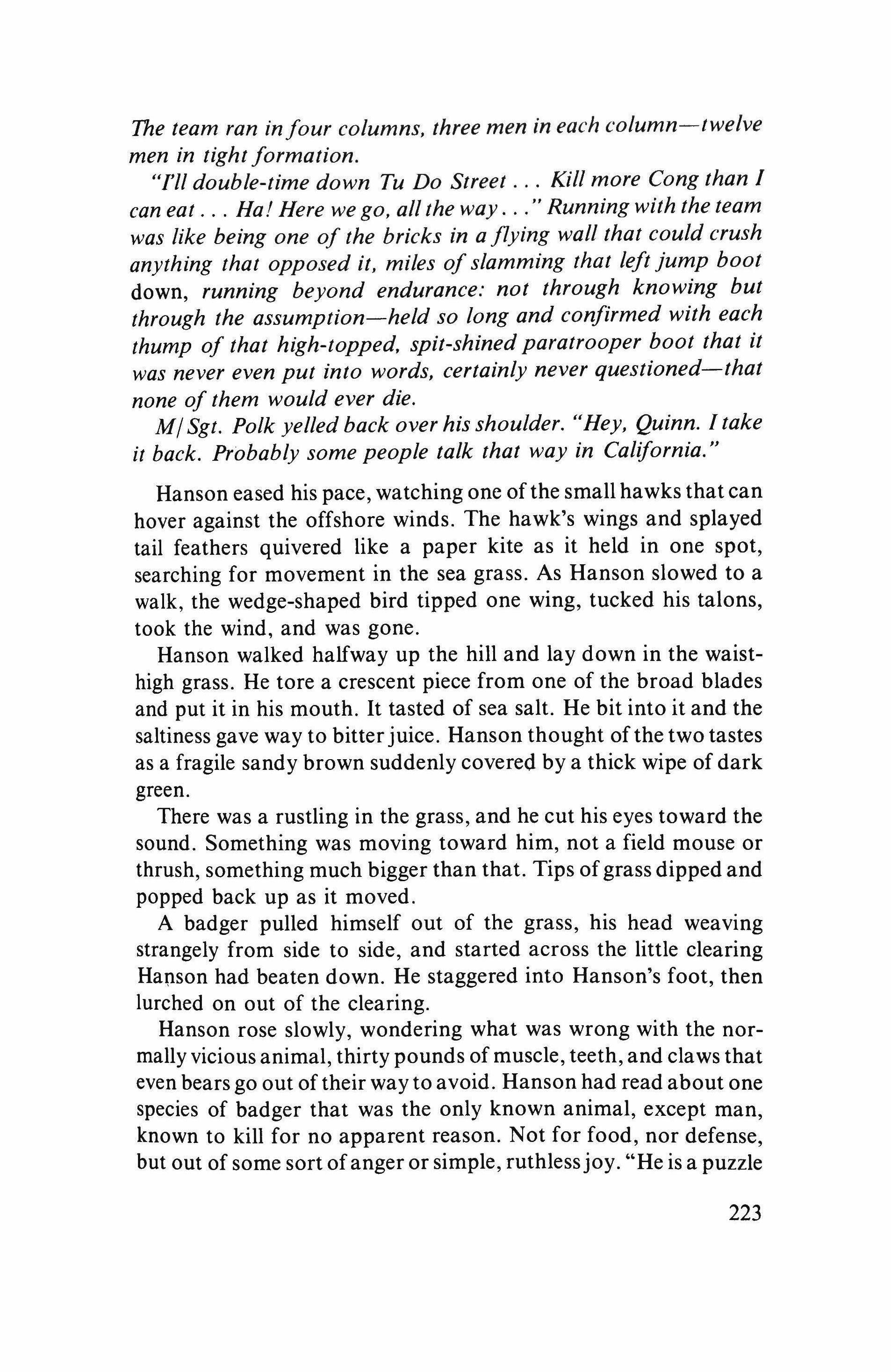
The team ran infour columns, three men in each column-twelve men in tightformation.
'Til double-time down Tu Do Street Kill more Cong than I can eat Ha! Here we go, all the way Running with the team was like being one of the bricks in a flying wall that could crush anything that opposed it, miles ofslamming that left jump boot down, running beyond endurance: not through knowing but through the assumption-held so long and confirmed with each thump of that high-topped, spit-shined paratrooper boot that it was never even put into words, certainly never questioned-that none of them would ever die.
M/Sgt. Polk yelled back over his shoulder. "Hey, Quinn. I take it back. Probably some people talk that way in California."
Hanson eased his pace, watching one of the small hawks that can hover against the offshore winds. The hawk's wings and splayed tail feathers quivered like a paper kite as it held in one spot, searching for movement in the sea grass. As Hanson slowed to a walk, the wedge-shaped bird tipped one wing, tucked his talons, took the wind, and was gone.
Hanson walked halfway up the hill and lay down in the waisthigh grass. He tore a crescent piece from one of the broad blades and put it in his mouth. It tasted of sea salt. He bit into it and the saltiness gave way to bitterjuice. Hanson thought of the two tastes as a fragile sandy brown suddenly covered by a thick wipe of dark green.
There was a rustling in the grass, and he cut his eyes toward the sound. Something was moving toward him, not a field mouse or thrush, something much bigger than that. Tips of grass dipped and popped back up as it moved.
A badger pulled himself out of the grass, his head weaving strangely from side to side, and started across the little clearing Hanson had beaten down. He staggered into Hanson's foot, then lurched on out of the clearing.
Hanson rose slowly, wondering what was wrong with the normally vicious animal, thirty pounds of muscle, teeth, and claws that even bears go out of their way to avoid. Hanson had read about one species of badger that was the only known animal, except man, known to kill for no apparent reason. Not for food, nor defense, but out of some sort ofanger or simple, ruthlessjoy. "He is a puzzle

to scientists," the article had said. Hanson smiled as he recalled the phrase, and followed behind the badger as it floundered through the grass. Clusters of swollen ticks hung like dusty grapes from the badger's neck and throat.
Hanson ran to the cottage for a pair of heavy leather gloves, and found the badgeragain. Weak from loss ofblood and the toxin that ticks produce to keep blood flowing, the badger looked up at Hanson and hissed. All his teeth were fangs. An animal with teeth like that has no fear, no mercy, and no regret, thought Hanson.
Hanson held him down with his left hand and began pulling the ticks off, carefully working them loose so as not to leave the head in the badger. One by one he pulled them out of the brown fur, their tiny black heads and pincers flailing blindly, and squeezed them between his thumb and forefinger, slowly, till they popped. When he'd removed them all, the glove was sticky with black blood, pale shards of burst bodies, and scattered everywhere like seeds from crushed berries, the black flesh-boring heads of ticks, still alive, were groping for purchase on the heavy leather gloves.
The cottage was chilly and damp. She was in the bedroom reading. Though it was getting dark, she still wore the gray-tinted wire-rim glasses. She had a handsome though somewhat sharpfeatured face. She was wearing a long dress and hand-knit shawl. Everything about her-the tasteful, expensive-looking clothes, her calm brown eyes shaded by the gray glasses, her slow, calm voice and easy logic, reflected a life in which there had always been plenty of money, and time, and room to move away from anything unpleasant. She had spent the summer at an artists' colony in Taos, where a woman aura-balancer read her tarot. "You will always have many young lovers," the woman told her.
Her husband, a college English teacher in Pittsburgh, sent her a check every two weeks. She wrote poetry, short competent poems that went nowhere, composed of soft vowels and casual speculation. Hanson had gone home with her one night two months before, when he'd been drunk, and had been living with her ever since.
The money he'd saved in 'Nam was gone. He'd drunk it up, given it away, spent it on airplane tickets and hotel rooms. The cottage had been good at first. He'd been glad to be away from the cities where there was too much noise, too many people who talked too
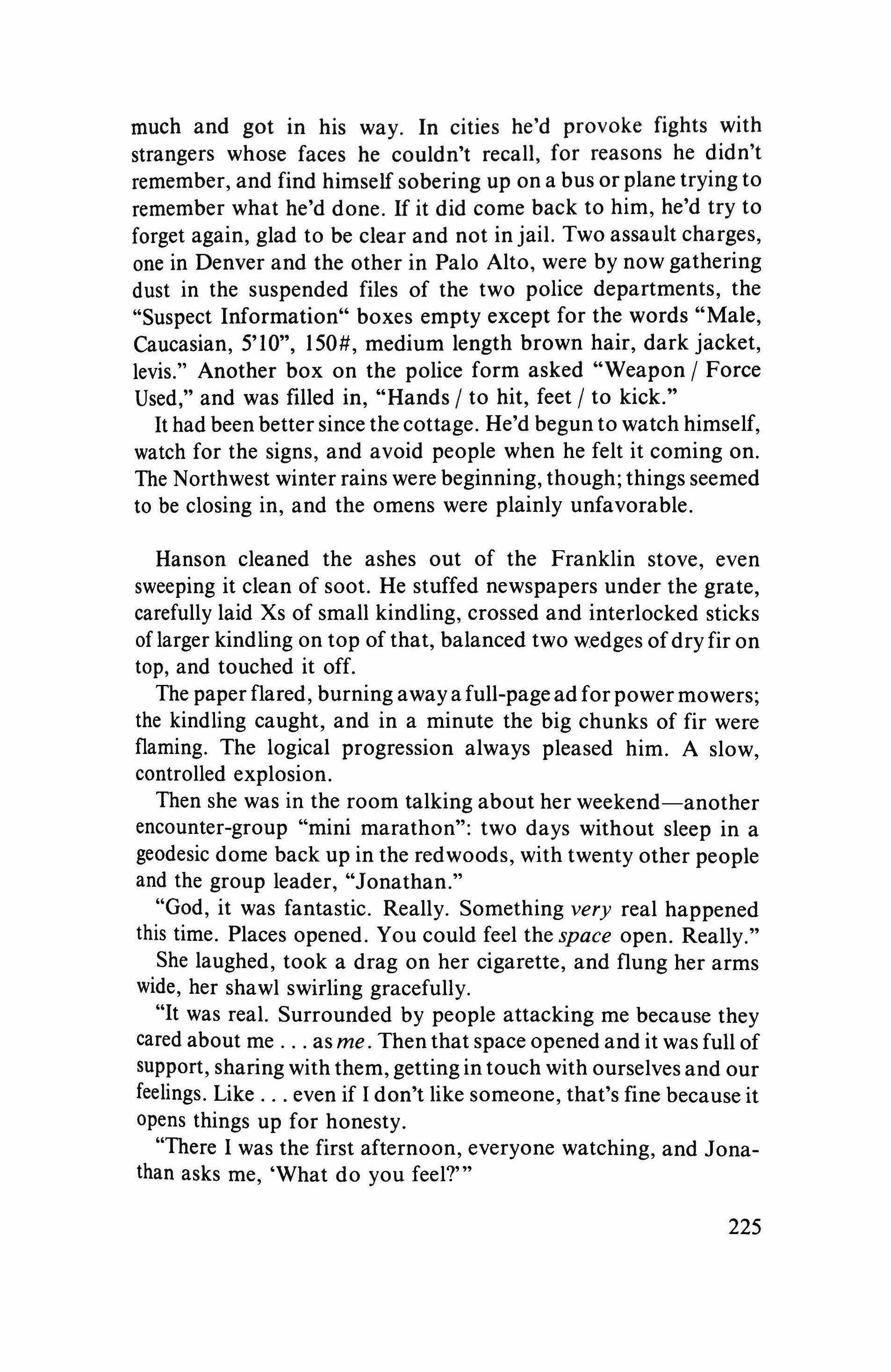
much and got in his way. In cities he'd provoke fights with strangers whose faces he couldn't recall, for reasons he didn't remember, and find himself sobering up on a bus or plane trying to remember what he'd done. If it did come back to him, he'd try to forget again, glad to be clear and not in jail. Two assault charges, one in Denver and the other in Palo Alto, were by now gathering dust in the suspended files of the two police departments, the "Suspect Information" boxes empty except for the words "Male, Caucasian, 5'10", 150#, medium length brown hair, dark jacket, levis." Another box on the police form asked "Weapon / Force Used," and was filled in, "Hands / to hit, feet / to kick."
It had been better since the cottage. He'd begun to watch himself, watch for the signs, and avoid people when he felt it coming on. The Northwest winter rains were beginning, though; things seemed to be closing in, and the omens were plainly unfavorable.
Hanson cleaned the ashes out of the Franklin stove, even sweeping it clean of soot. He stuffed newspapers under the grate, carefully laid Xs of small kindling, crossed and interlocked sticks of larger kindling on top of that, balanced two wedges ofdry fir on top, and touched it off.
The paper flared, burning away a full-page ad for power mowers; the kindling caught, and in a minute the big chunks of fir were flaming. The logical progression always pleased him. A slow, controlled explosion.
Then she was in the room talking about her weekend-another encounter-group "mini marathon": two days without sleep in a geodesic dome back up in the redwoods, with twenty other people and the group leader, "Jonathan."
"God, it was fantastic. Really. Something very real happened this time. Places opened. You could feel the space open. Really."
She laughed, took a drag on her cigarette, and flung her arms wide, her shawl swirling gracefully.
"It was real. Surrounded by people attacking me because they cared about me as me. Then that space opened and it was full of support, sharing with them, getting in touch with ourselves and our feelings. Like even if I don't like someone, that's fine because it opens things up for honesty.
"There I was the first afternoon, everyone watching, and Jonathan asks me, 'What do you feel?"
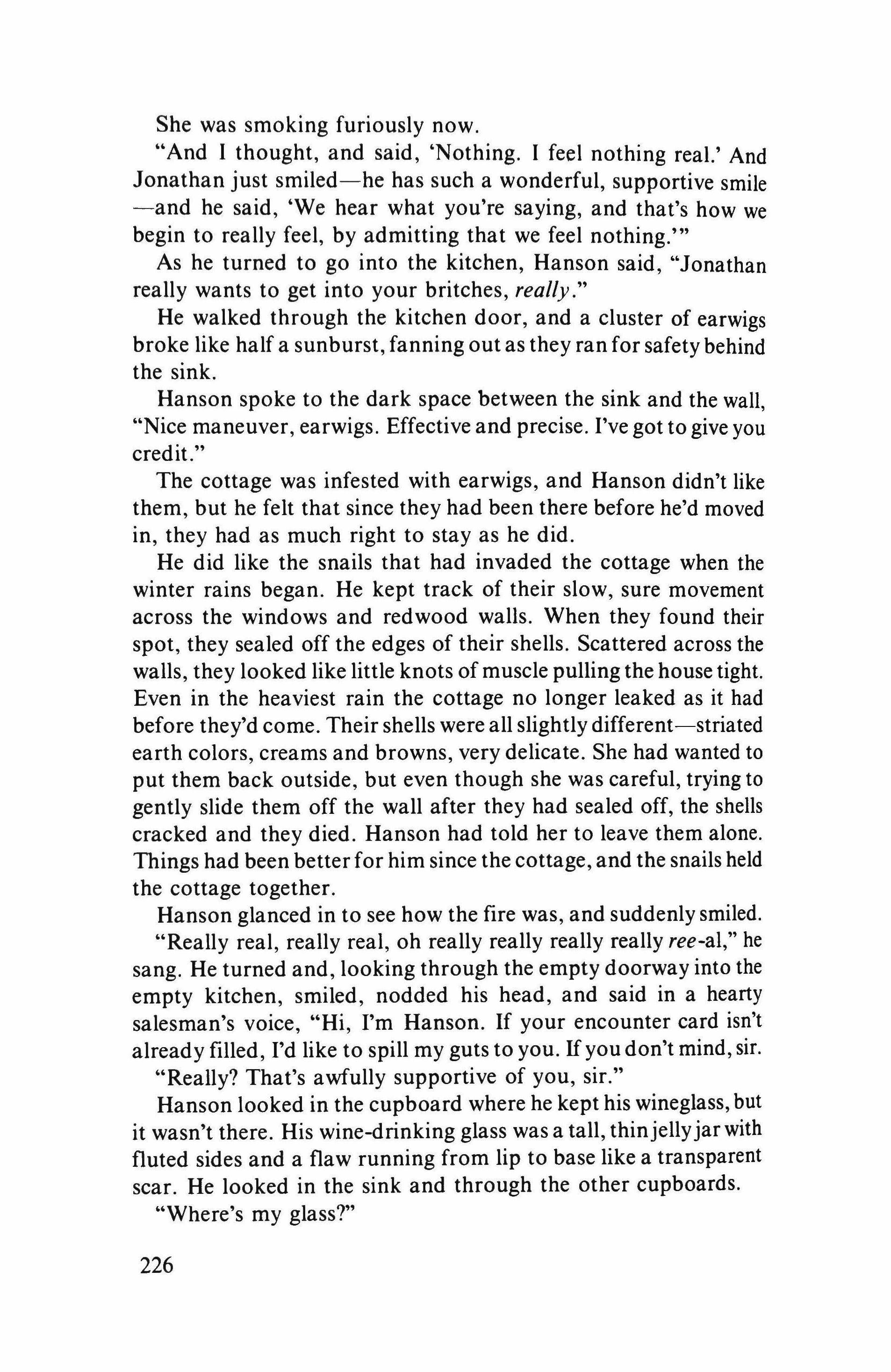
She was smoking furiously now.
"And I thought, and said, 'Nothing. I feel nothing real.' And Jonathan just smiled-he has such a wonderful, supportive smile -and he said, 'We hear what you're saying, and that's how we begin to really feel, by admitting that we feel nothing."
As he turned to go into the kitchen, Hanson said, "Jonathan really wants to get into your britches, really."
He walked through the kitchen door, and a cluster of earwigs broke like half a sunburst, fanning out as they ran for safety behind the sink.
Hanson spoke to the dark space between the sink and the wall, "Nice maneuver, earwigs. Effective and precise. I've got to give you credit."
The cottage was infested with earwigs, and Hanson didn't like them, but he felt that since they had been there before he'd moved in, they had as much right to stay as he did.
He did like the snails that had invaded the cottage when the winter rains began. He kept track of their slow, sure movement across the windows and redwood walls. When they found their spot, they sealed off the edges of their shells. Scattered across the walls, they looked like little knots of muscle pulling the house tight. Even in the heaviest rain the cottage no longer leaked as it had before they'd come. Their shells were all slightly different-striated earth colors, creams and browns, very delicate. She had wanted to put them back outside, but even though she was careful, trying to gently slide them off the wall after they had sealed off, the shells cracked and they died. Hanson had told her to leave them alone. Things had been better for him since the cottage, and the snails held the cottage together.
Hanson glanced in to see how the fire was, and suddenly smiled.
"Really real, really real, oh really really really really ree-al," he sang. He turned and, looking through the empty doorway into the empty kitchen, smiled, nodded his head, and said in a hearty salesman's voice, "Hi, I'm Hanson. If your encounter card isn't already filled, I'd like to spill my guts to you. If you don't mind, sir.
"Really? That's awfully supportive of you, sir."
Hanson looked in the cupboard where he kept his wineglass, but it wasn't there. His wine-drinking glass was a tall, thinjellyjar with fluted sides and a flaw running from lip to base like a transparent scar. He looked in the sink and through the other cupboards.
"Where's my glass?"
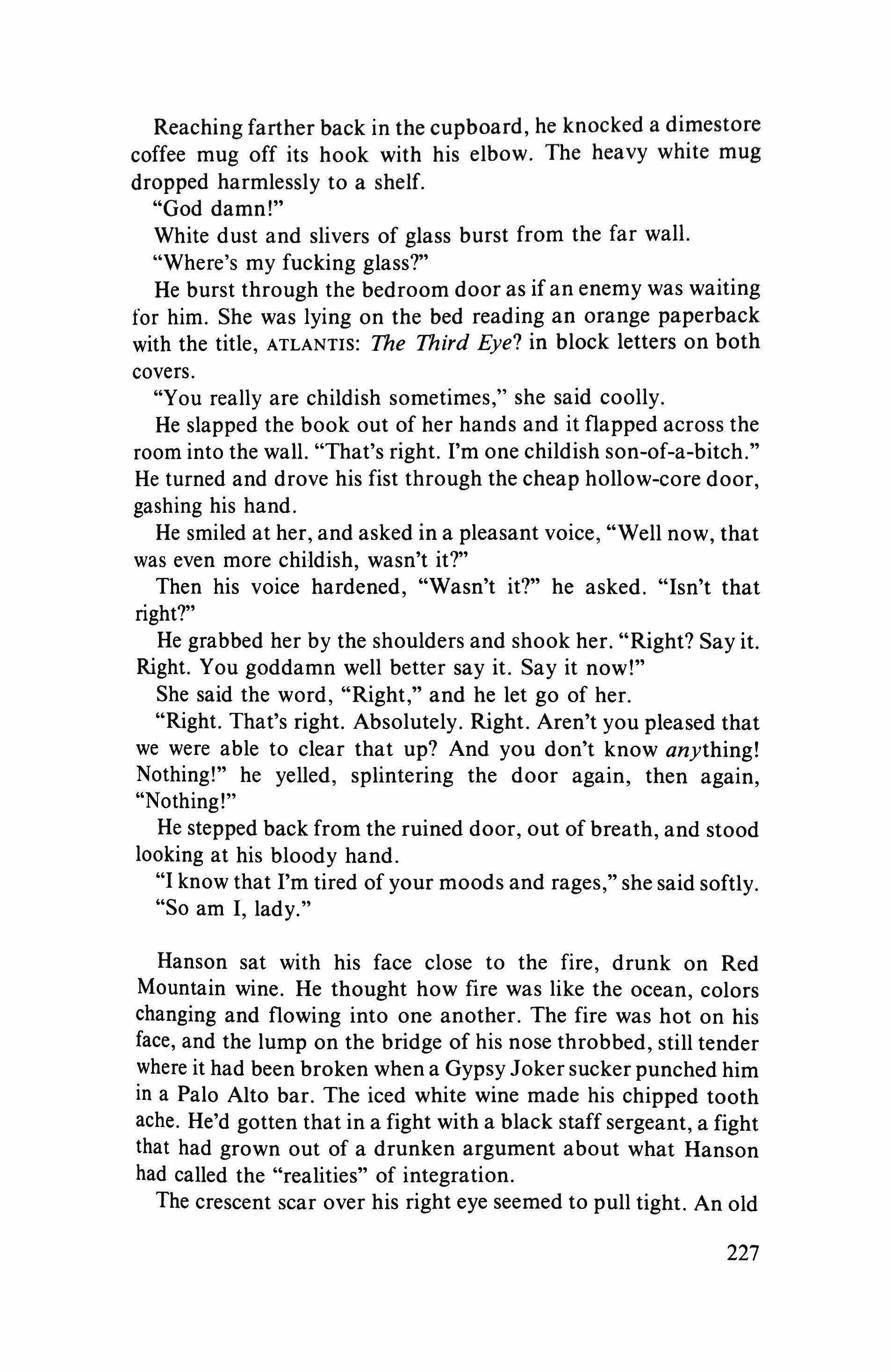
Reaching farther back in the cupboard, he knocked a dimestore coffee mug off its hook with his elbow. The heavy white mug dropped harmlessly to a shelf.
"God damn!"
White dust and slivers of glass burst from the far wall.
"Where's my fucking glass?"
He burst through the bedroom door as if an enemy was waiting for him. She was lying on the bed reading an orange paperback with the title, ATLANTIS: The Third Eye? in block letters on both covers.
"You really are childish sometimes," she said coolly. He slapped the book out of her hands and it flapped across the room into the wall. "That's right. I'm one childish son-of-a-bitch." He turned and drove his fist through the cheap hollow-core door, gashing his hand.
He smiled at her, and asked in a pleasant voice, "Well now, that was even more childish, wasn't it?"
Then his voice hardened, "Wasn't it?" he asked. "Isn't that right?"
He grabbed her by the shoulders and shook her. "Right? Say it. Right. You goddamn well better say it. Say it now!"
She said the word, "Right," and he let go of her.
"Right. That's right. Absolutely. Right. Aren't you pleased that we were able to clear that up? And you don't know anything! Nothing!" he yelled, splintering the door again, then again, "Nothing!"
He stepped back from the ruined door, out of breath, and stood looking at his bloody hand.
"I know that I'm tired of your moods and rages," she said softly. "So am I, lady."
Hanson sat with his face close to the fire, drunk on Red Mountain wine. He thought how fire was like the ocean, colors changing and flowing into one another. The fire was hot on his face, and the lump on the bridge of his nose throbbed, still tender where it had been broken when a Gypsy Joker sucker punched him in a Palo Alto bar. The iced white wine made his chipped tooth ache. He'd gotten that in a fight with a black staff sergeant, a fight that had grown out of a drunken argument about what Hanson had called the "realities" of integration.
The crescent scar over his right eye seemed to pull tight. An old

friend had thrown a full Budweiser across the kitchen at him, the lip of the can splitting the skin. It had been a party for a visiting poet, a man in his forties who still wrote about "the revolution," in lines like, "Be warned amerika, your friends! enemies wait to bring you down."
The cut had bled a lot, blood running down over his eye, dripping from his chin. Hanson had cupped his hands and caught the blood, lapping it up like tap water, laughingcrazily. He spotted a pretty graduate student, her face smooth and perfect. She had on jeans, hiking boots, and a patched work shirt. She was looking at him in horror, and Hanson realized how gory he looked, the whole side of his face washed in blood from the small cut. "Hey, momma. Hey, my little alternative life-style dumpling," he'd said as he walked toward her, fixing her with a stare from his bloody eye. He snatched her by the hair, bent her head back and gave her a bloody wet kiss full on the mouth, forcing his tongue between her lips. She broke loose and vomited, running for the door.
Now, sitting in front of the fire, Hanson thought, "A person's scars are a dossier of his dealings with the world." He smiled, pleased with the phrase.
He passed out in front of the fire, sweat on his face, dreaming that he was on a hillside in Vietnam, taking a break in the midday heat. Beads of sweat like green flies slipping down his neck, fire rustling like elephant grass. He could feel the web-gear harness across his left shoulder and the compact machine-gun under his right knee. If anything happened he could be up and running with all his gear, sprinting the first few yards in his sleep.
It was winter. The tourists were gone, and the tidal pools were healing after being trampled and picked over by the summer people who clogged the roads with their campers and "rec-vees."
Hanson stepped carefully from rock to rock, crouching, squatting occasionally to study one of the clear basins: starfish, green and purple spiked anemone, small striped fish flashing in the shadows. Pieces of abalone shell shifted and turned in the currents, one side like an old scab, the other side a smooth, pearly blue.
Someone watching from the bluffs might have thought he was studying a road map, shifting from one leg to the other, inclining his head, studying the highways for the best route, the fastest, the most scenic, one that would take him through a particular town
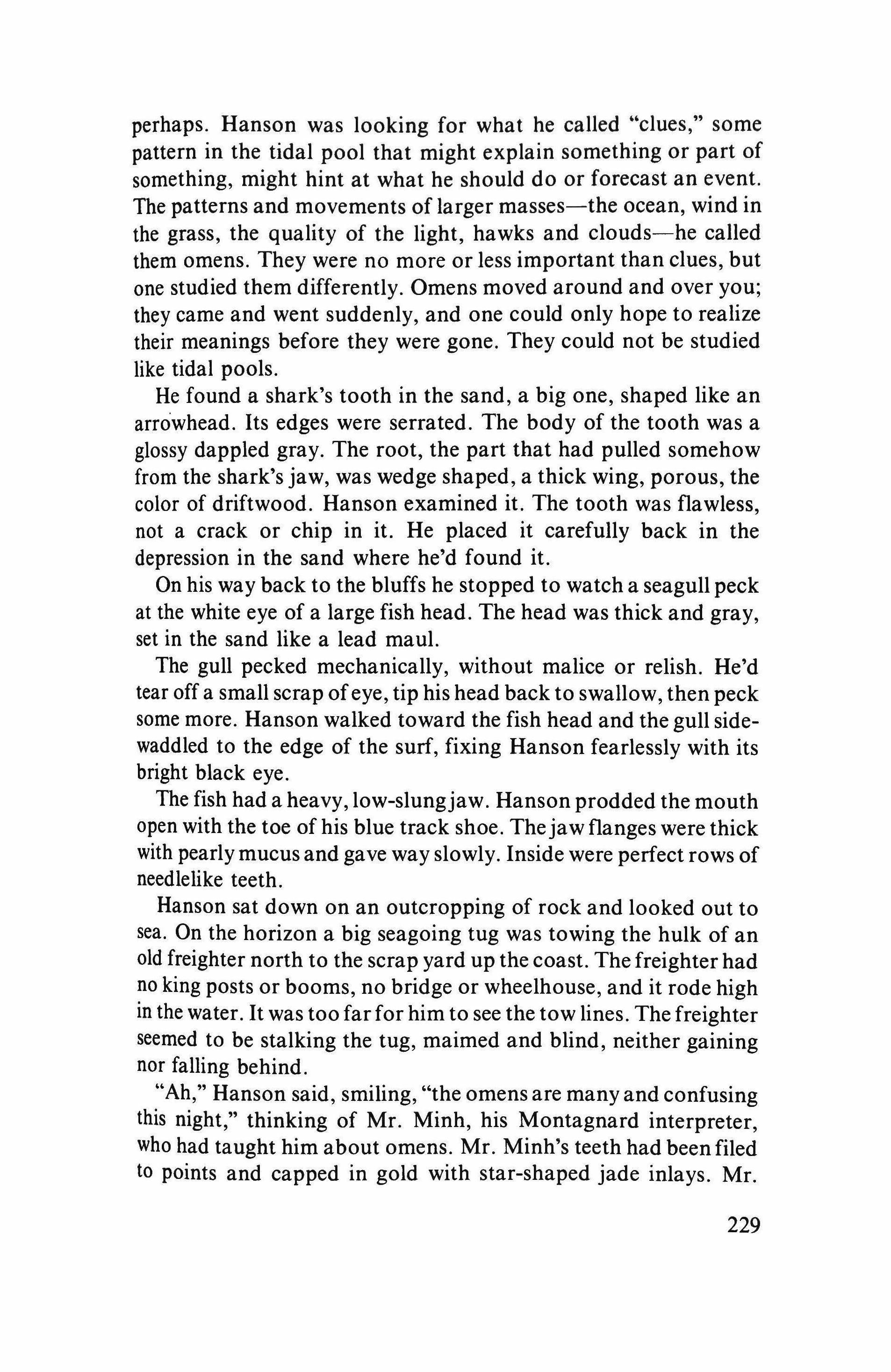
perhaps. Hanson was looking for what he called "clues," some pattern in the tidal pool that might explain something or part of something, might hint at what he should do or forecast an event. The patterns and movements of larger masses-the ocean, wind in the grass, the quality of the light, hawks and clouds-he called them omens. They were no more or less important than clues, but one studied them differently. Omens moved around and over you; they came and went suddenly, and one could only hope to realize their meanings before they were gone. They could not be studied like tidal pools.
He found a shark's tooth in the sand, a big one, shaped like an arrowhead. Its edges were serrated. The body of the tooth was a glossy dappled gray. The root, the part that had pulled somehow from the shark's jaw, was wedge shaped, a thick wing, porous, the color of driftwood. Hanson examined it. The tooth was flawless, not a crack or chip in it. He placed it carefully back in the depression in the sand where he'd found it.
On his way back to the bluffs he stopped to watch a seagull peck at the white eye of a large fish head. The head was thick and gray, set in the sand like a lead maul.
The gull pecked mechanically, without malice or relish. He'd tear off a small scrap ofeye, tip his head back to swallow, then peck some more. Hanson walked toward the fish head and the gull sidewaddled to the edge of the surf, fixing Hanson fearlessly with its bright black eye.
The fish had a heavy, low-slungjaw. Hanson prodded the mouth open with the toe of his blue track shoe. Thejawflanges were thick with pearly mucus and gave way slowly. Inside were perfect rows of needlelike teeth.
Hanson sat down on an outcropping of rock and looked out to sea. On the horizon a big seagoing tug was towing the hulk of an old freighter north to the scrap yard up the coast. The freighter had no king posts or booms, no bridge or wheelhouse, and it rode high in the water. It was too far for him to see the tow lines. The freighter seemed to be stalking the tug, maimed and blind, neither gaining nor falling behind.
"Ah," Hanson said, smiling, "the omens are many and confusing this night," thinking of Mr. Minh, his Montagnard interpreter, who had taught him about omens. Mr. Minh's teeth had been filed to points and capped in gold with star-shaped jade inlays. Mr.

Minh wore a small amulet around his neck that could keep any bullet from piercing his body.
It was getting on toward dusk when Hanson started back toward the cabin. The gull was still pecking tirelessly at the fish head. The lighthouse out on the point winked.
The pile of snails was just outside the back door. They were dying, but still trying to move. Their shells were split and torn like thumbnails, and theygrated softlyagainst one another, whispering to Hanson. In the dim light, the pile of snails looked like a single dying creature, its pulse weakening as the snails moved more slowly, and then not at all. Hanson had heard what it whispered to him.
She was sitting at a folding table, writing. As she took a drag off one of the long, thin cigarettes, he kicked the table over, catapulting paper, books, and half a cup of tea against the wall. He slapped the cigarette out of her mouth, and then, very deliberately, put one hand on her chest, pushing her and the chair over backward.
"Don't move," he said.
She was in an awkward position, her legs straddling the back of the chair, braced on one arm, about to scramble back and away from him.
"Don't. Fucking. Move."
He kicked the chair away and stood over her. "Don't you ever fuck with the snails again. They know what they're doing, damn it. They pull their shell along till they find the place they're supposed to be. They know where it is when they find it, and they stop there and seal off. You start fucking around with shit like that-they been around for a million years, they survived 'cause they know when to stop and seal off and when to move-you fuck around with patterns, with constants, don't you see." He put his foot on her chest. "Don't yousee?" She nodded her head. "And that is when the bad shit begins."
The tavern, The Uncommon Good, was crowded and noisy; all the regular winter people were there. Commune hippies in bib overalls were nursing their beers. There were people who ran the boutiques and craft shops, students and teachers at the small but well-financed art center. Always there were a few women, in their
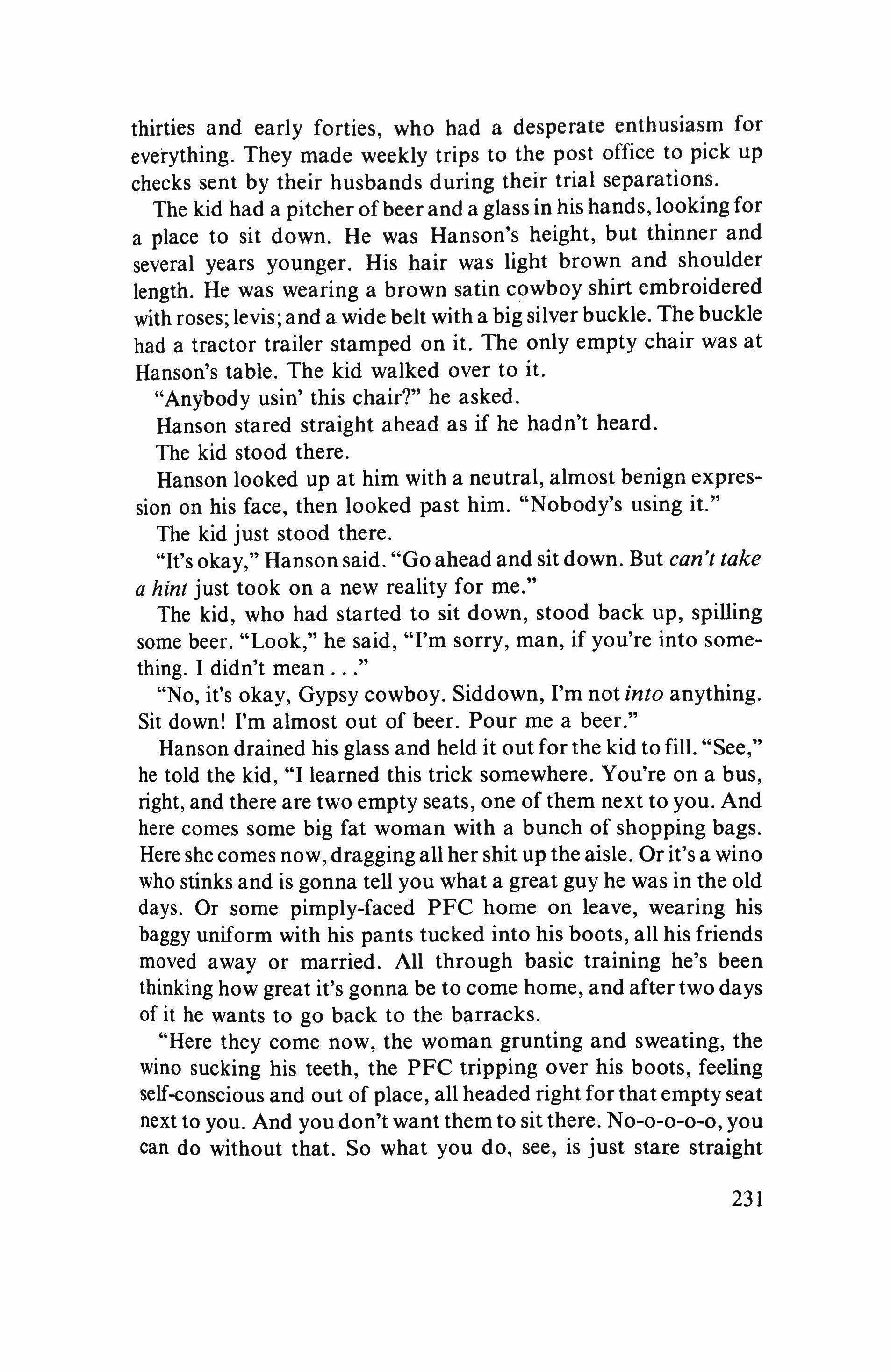
thirties and early forties, who had a desperate enthusiasm for everything. They made weekly trips to the post office to pick up checks sent by their husbands during their trial separations.
The kid had a pitcher ofbeer and a glass in his hands, looking for a place to sit down. He was Hanson's height, but thinner and several years younger. His hair was light brown and shoulder length. He was wearing a brown satin cowboy shirt embroidered with roses; levis; and a wide belt with a big silver buckle. The buckle had a tractor trailer stamped on it. The only empty chair was at Hanson's table. The kid walked over to it.
"Anybody usin' this chair?" he asked.
Hanson stared straight ahead as if he hadn't heard.
The kid stood there.
Hanson looked up at him with a neutral, almost benign expression on his face, then looked past him. "Nobody's using it."
The kid just stood there.
"It's okay," Hanson said. "Go ahead and sit down. But can't take a hint just took on a new reality for me."
The kid, who had started to sit down, stood back up, spilling some beer. "Look," he said, "I'm sorry, man, if you're into something. I didn't mean
"No, it's okay, Gypsy cowboy. Siddown, I'm not into anything. Sit down! I'm almost out of beer. Pour me a beer."
Hanson drained his glass and held it out for the kid to fill. "See," he told the kid, "I learned this trick somewhere. You're on a bus, right, and there are two empty seats, one of them next to you. And here comes some big fat woman with a bunch of shopping bags. Here she comes now, dragging all her shit up the aisle. Or it's a wino who stinks and is gonna tell you what a great guy he was in the old days. Or some pimply-faced PFC home on leave, wearing his baggy uniform with his pants tucked into his boots, all his friends moved away or married. All through basic training he's been thinking how great it's gonna be to come home, and after two days of it he wants to go back to the barracks.
"Here they come now, the woman grunting and sweating, the wino sucking his teeth, the PFC tripping over his boots, feeling self-conscious and out of place, all headed right for that empty seat next to you. And you don't want them to sit there. No-o-o-o-o, you can do without that. So what you do, see, is just stare straight
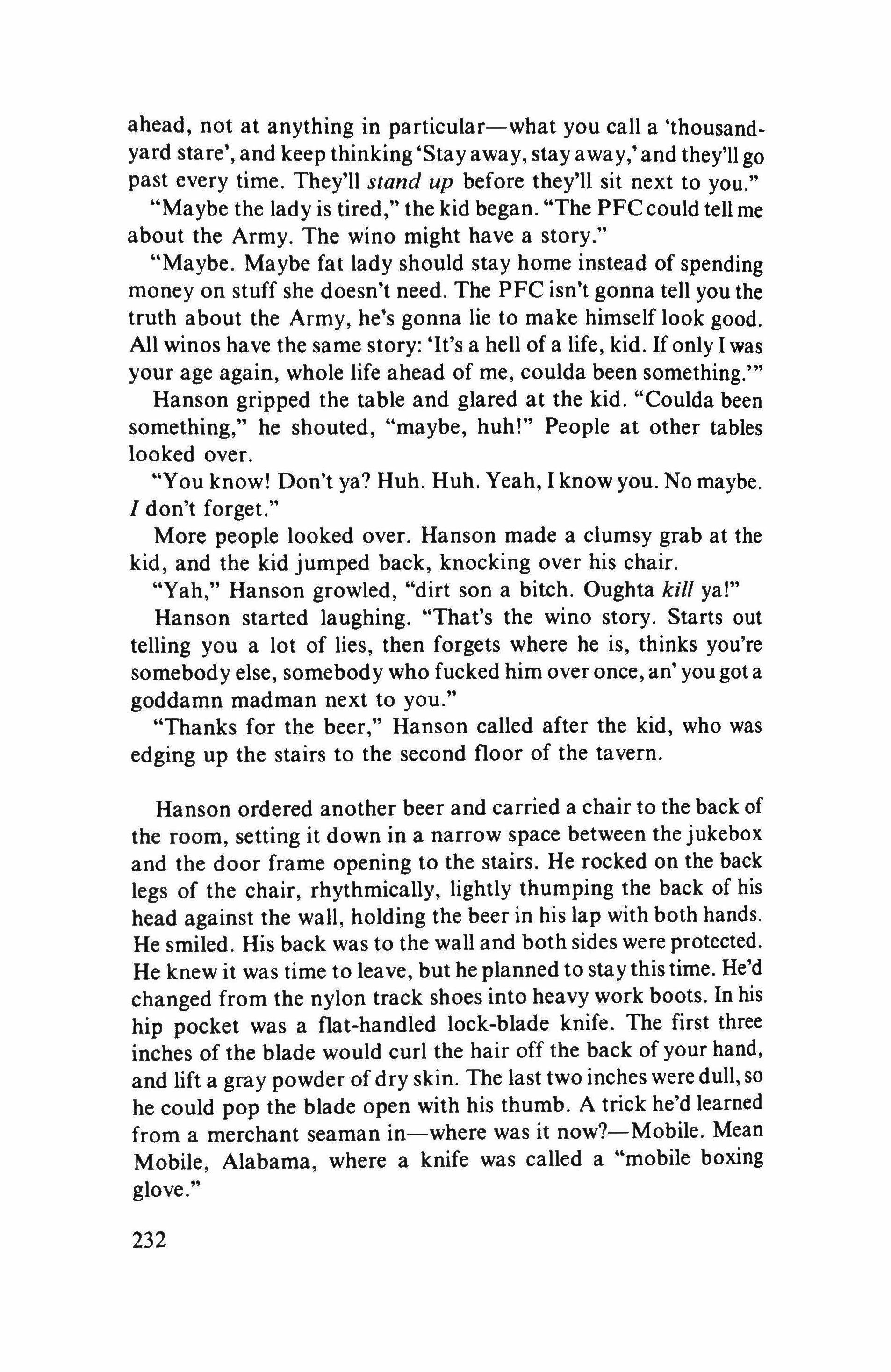
ahead, not at anything in particular-what you call a 'thousandyard stare', and keep thinking 'Stay away, stay away,' and they'll go past every time. They'll stand up before they'll sit next to you."
"Maybe the lady is tired," the kid began. "The PFC could tell me about the Army. The wino might have a story."
"Maybe. Maybe fat lady should stay home instead of spending money on stuff she doesn't need. The PFC isn't gonna tell you the truth about the Army, he's gonna lie to make himself look good. All winos have the same story: 'It's a hell of a life, kid. If only I was your age again, whole life ahead of me, coulda been something.'"
Hanson gripped the table and glared at the kid. "Coulda been something," he shouted, "maybe, huh!" People at other tables looked over.
"You know! Don't ya? Huh. Huh. Yeah, I know you. No maybe. I don't forget."
More people looked over. Hanson made a clumsy grab at the kid, and the kid jumped back, knocking over his chair.
"Yah," Hanson growled, "dirt son a bitch. Oughta kill ya!"
Hanson started laughing. "That's the wino story. Starts out telling you a lot of lies, then forgets where he is, thinks you're somebody else, somebody who fucked him over once, an' you got a goddamn madman next to you."
"Thanks for the beer," Hanson called after the kid, who was edging up the stairs to the second floor of the tavern.
Hanson ordered another beer and carried a chair to the back of the room, setting it down in a narrow space between the jukebox and the door frame opening to the stairs. He rocked on the back legs of the chair, rhythmically, lightly thumping the back of his head against the wall, holding the beer in his lap with both hands. He smiled. His back was to the wall and both sides were protected. He knew it was time to leave, but he planned to stay this time. He'd changed from the nylon track shoes into heavy work boots. In his hip pocket was a flat-handled lock-blade knife. The first three inches of the blade would curl the hair off the back of your hand, and lift a gray powder of dry skin. The last two inches were dull, so he could pop the blade open with his thumb. A trick he'd learned from a merchant seaman in-where was it now?-Mobile. Mean Mobile, Alabama, where a knife was called a "mobile boxing glove."

"The secret to being a good knife fighter is never let the other guy know you've got a knife until he's cut.
"If you do find yourselfin a knife fight, you might as well plan on getting cut, but you decide where. Offer the other guy your left forearm, and while he goes for it, you can move inside and pick your spot.
"Even if he knows you've got a knife, keep it out of sight just behind your leg. That way he won't be able to kick it out of your hand and when you move he won't be able to anticipate the angle of your lunge. Besides, it psychs a man, knowing you've got a knife in your hand but not being able to see it. Just that much more working for you."
Hanson couldn't recall where he'd learned those things-the merchant marine, Sgt. Crews, Mr. Minh, Bubba? He'd never known Bubba's last name-the black mason's-helper he'd worked with the summer before he went to college. Bubba always carried a case cutter, enough to leave a scar but not enough to kill anybody and bring the police into it. Just another "social cutting" in Niggertown. Where had he seen that nigger get his cheek laid open with a razor? Gorier than a white man. Smooth black skin peeling open, white underneath and red muscle beneath that, the blood bright and startling against the black skin.
Hanson's eyes had begun to work independently. He closed one and watched people in the bar talking. He couldn't hear what they said, though; the jukebox drowned them out, singing about Colorado. Colorado, where the mountains were being cut down into freeways and oil shale; Aspen and Vail, where college kids wore climbing boots and day-packs into bars where beer was a dollar a bottle.
The jukebox paused, whirred, began another song:
You got yer army an' yer C.I.A I got my rainbow an' a sunny day, You gotta boogie-woogie, You gotta boogie-woogie
Hanson bought another beer and went upstairs to a room with two pool tables and a pinball machine. The kid was playing with three other guys in their twenties. The leader seemed to be the one wearing a T-shirt. It was too cold forjust a T-shirt, but his big arms and chest showed through the thin cotton.

"Vanity before comfort," Hanson thought. "He goes first."
One of them was wearing a plaid shirt, jeans, and logger boots, sixty-dollar logger's boots. He didn't look like a logger.
The third one had shoulder-length blond hair and was wearing a gold ring in his left ear. He had on a denim vest with silver studs across the back, and a wide leather watchband with three buckles.
A twelve-year-old boy was playing the pinball machine that rang and chattered as Hanson pulled a chair over to a corner where he could watch the whole room.
The boy was good. He knew just how much he could shove and knee the machine before it would shut off on "TILT." The machine was called Round Up, one of the old kind that fire silver ballbearings with a spring-loaded plunger. Pink plastic flippers, like little stubs of amputated limbs, twitched as if stung and batted at the ball as it rolled past. When the ball dropped into one of the holes, the machine would shudder, big-breasted cowgirls etched in the glass would flicker with light, and the box score would add up with mechanical grunts.
The boy had already gotten two free plays when the one in the Tshirt yelled at him. "Hey, that's enough of that noise. You're fucking up my game. Take off."
The boy looked up from the machine.
"Yeah, you got it. Take off. Now."
The boy left, his two games unplayed. Hanson sipped his beer and tapped his foot to the jukebox below. The Gypsy Cowboy kid smiled and said to the one in the Tshirt, "Frank, you're shootin' so bad tonight nothin' could hurt it."
"Hey, punk, when I want your opinion I'll stomp it out of you, okay?"
The other two laughed.
"You got that," Frank said.
"Yeah. Okay. I didn't mean anything."
"Then don't say anything."
Hanson was drunk. The pool table looked like a smooth green parallelogram, and this made the rebound of the balls, the physics of the game all the more interesting. While he watched the players he idly rolled a cue ball along the top of his leg. He tapped his foot to the music and sang softly to himself, I got my rainbow and a sunny day." He smiled broadly, like a person who is about to buy something that he has waited and saved a long time for.
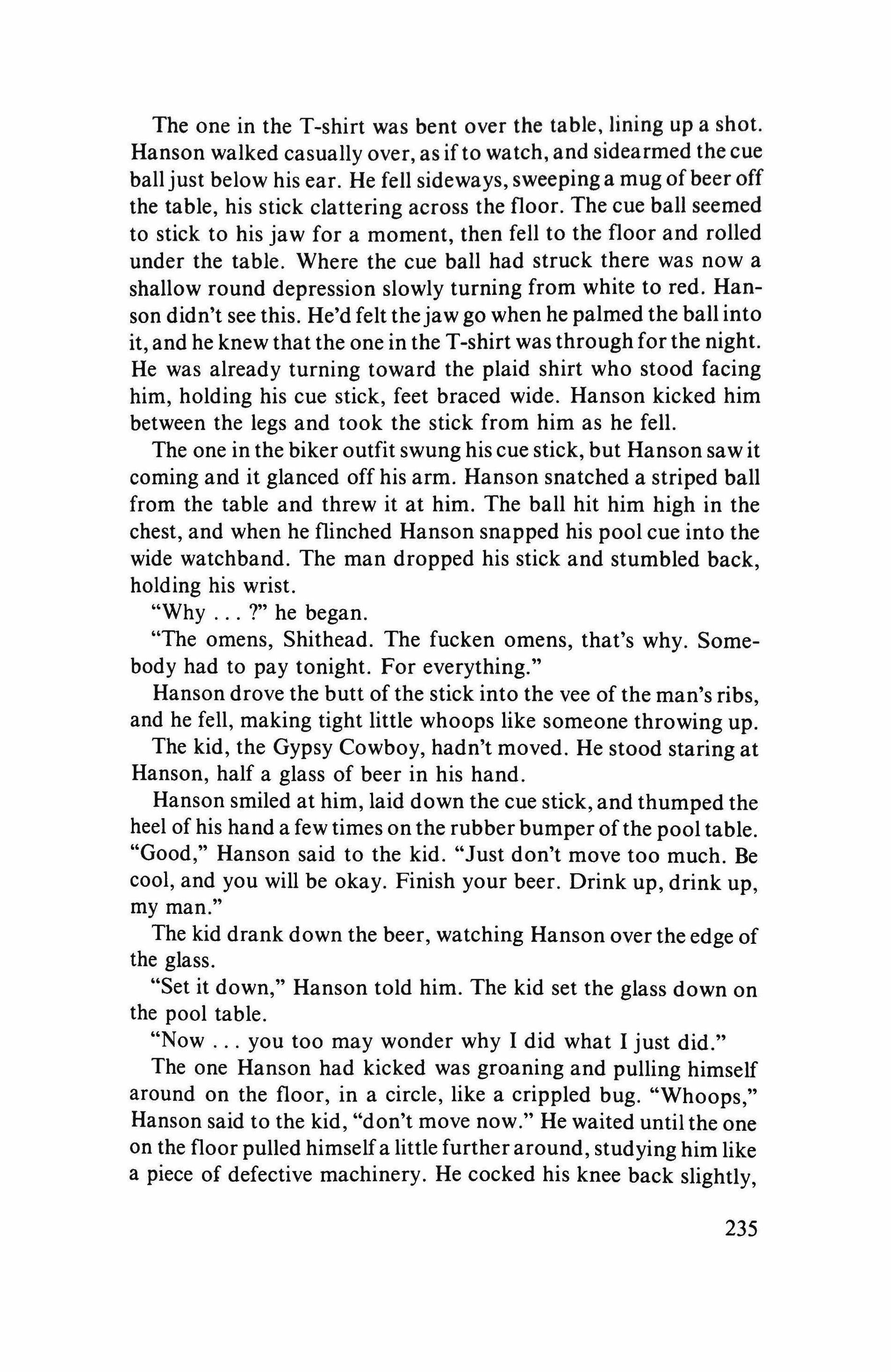
The one in the T-shirt was bent over the table, lining up a shot. Hanson walked casually over, as if to watch, and sidearmed the cue ball just below his ear. He fell sideways, sweeping a mug ofbeer off the table, his stick clattering across the floor. The cue ball seemed to stick to his jaw for a moment, then fell to the floor and rolled under the table. Where the cue ball had struck there was now a shallow round depression slowly turning from white to red. Hanson didn't see this. He'd felt thejaw go when he palmed the ball into it, and he knew that the one in the T-shirt was through for the night. He was already turning toward the plaid shirt who stood facing him, holding his cue stick, feet braced wide. Hanson kicked him between the legs and took the stick from him as he fell.
The one in the biker outfit swung his cue stick, but Hanson saw it coming and it glanced off his arm. Hanson snatched a striped ball from the table and threw it at him. The ball hit him high in the chest, and when he flinched Hanson snapped his pool cue into the wide watchband. The man dropped his stick and stumbled back, holding his wrist.
"Why ?" he began.
"The omens, Shithead. The fucken omens, that's why. Somebody had to pay tonight. For everything."
Hanson drove the butt of the stick into the vee of the man's ribs, and he fell, making tight little whoops like someone throwing up.
The kid, the Gypsy Cowboy, hadn't moved. He stood staring at Hanson, half a glass of beer in his hand.
Hanson smiled at him, laid down the cue stick, and thumped the heel of his hand a few times on the rubber bumper of the pool table. "Good," Hanson said to the kid. "Just don't move too much. Be cool, and you will be okay. Finish your beer. Drink up, drink up, my man."
The kid drank down the beer, watching Hanson over the edge of the glass.
"Set it down," Hanson told him. The kid set the glass down on the pool table.
"Now you too may wonder why I did what I just did."
The one Hanson had kicked was groaning and pulling himself around on the floor, in a circle, like a crippled bug. "Whoops," Hanson said to the kid, "don't move now." He waited until the one on the floor pulled himself a little further around, studying him like a piece of defective machinery. He cocked his knee back slightly,
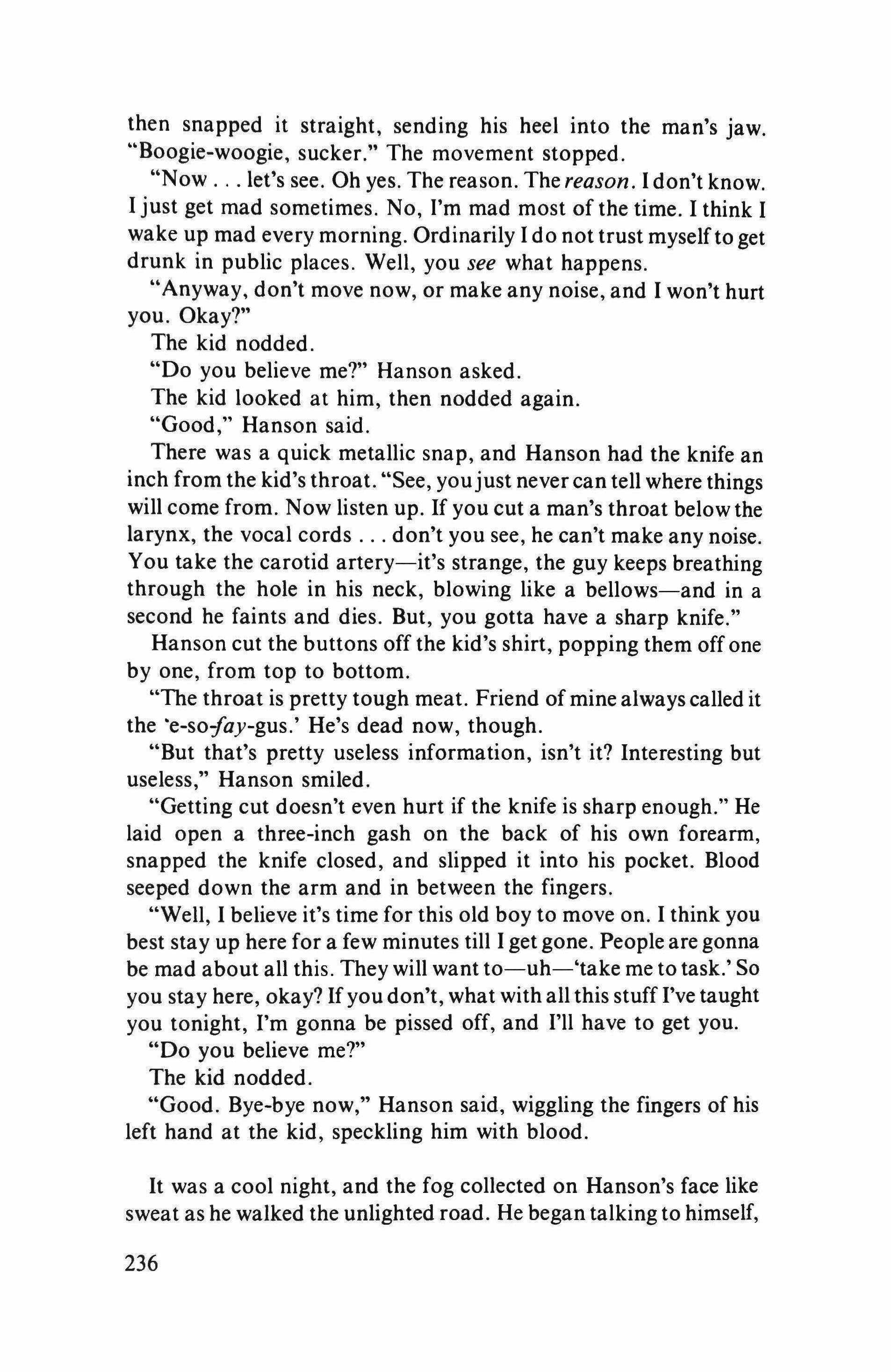
then snapped it straight, sending his heel into the man's jaw. "Boogie-woogie, sucker." The movement stopped.
"Now let's see. Oh yes. The reason. The reason. I don't know. I just get mad sometimes. No, I'm mad most of the time. I think I wake up mad every morning. Ordinarily I do not trust myself to get drunk in public places. Well, you see what happens.
"Anyway, don't move now, or make any noise, and I won't hurt you. Okay?"
The kid nodded.
"Do you believe me?" Hanson asked.
The kid looked at him, then nodded again.
"Good," Hanson said.
There was a quick metallic snap, and Hanson had the knife an inch from the kid's throat. "See, youjust never can tell where things will come from. Now listen up. If you cut a man's throat below the larynx, the vocal cords don't you see, he can't make any noise. You take the carotid artery-it's strange, the guy keeps breathing through the hole in his neck, blowing like a bellows-and in a second he faints and dies. But, you gotta have a sharp knife."
Hanson cut the buttons off the kid's shirt, popping them off one by one, from top to bottom.
"The throat is pretty tough meat. Friend of mine always called it the ·e-so:{ay-gus.' He's dead now, though.
"But that's pretty useless information, isn't it? Interesting but useless," Hanson smiled.
"Getting cut doesn't even hurt if the knife is sharp enough." He laid open a three-inch gash on the back of his own forearm, snapped the knife closed, and slipped it into his pocket. Blood seeped down the arm and in between the fingers.
"Well, I believe it's time for this old boy to move on. I think you best stay up here for a few minutes till I get gone. People are gonna be mad about all this. They will want to-uh-'take me to task.' So you stay here, okay? If you don't, what with all this stuff I've taught you tonight, I'm gonna be pissed off, and I'll have to get you.
"Do you believe me?"
The kid nodded.
"Good. Bye-bye now," Hanson said, wiggling the fingers of his left hand at the kid, speckling him with blood.
It was a cool night, and the fog collected on Hanson's face like sweat as he walked the unlighted road. He began talking to himself,

imitating the introductory monologue on one of the dozens of blues records he'd left back home, a black blues singer who, when he'd died, had been living off money he made pumping gas in a Shell station outside Jackson, Mississippi; "Mah name is Fred Mac-dowell. They calls me Mis-sippi Fred Mac-dowell, but mah home in Roys-ville, Tensee. But it don't make any diffance. It soun' good to me, an' I seem like I'm at home there when I'm in Mis-sippi. An' I do not play no rock an' roll, y'all. I just play the straight 'n' natchul blues."
The lighthouse on the point didn't blink. Through the fog he could see the edge of the light, anticipate it as it began to swing around. It would glow brightly for a moment, dispersed and indistinct as if it were behind frosted glass, then fade out and swing away.
Hanson stopped and watched the light. Out beyond the surf a blowhole boomed and sighed with each wave, like a man who has stopped running for a moment to catch his breath and decide which direction to go.
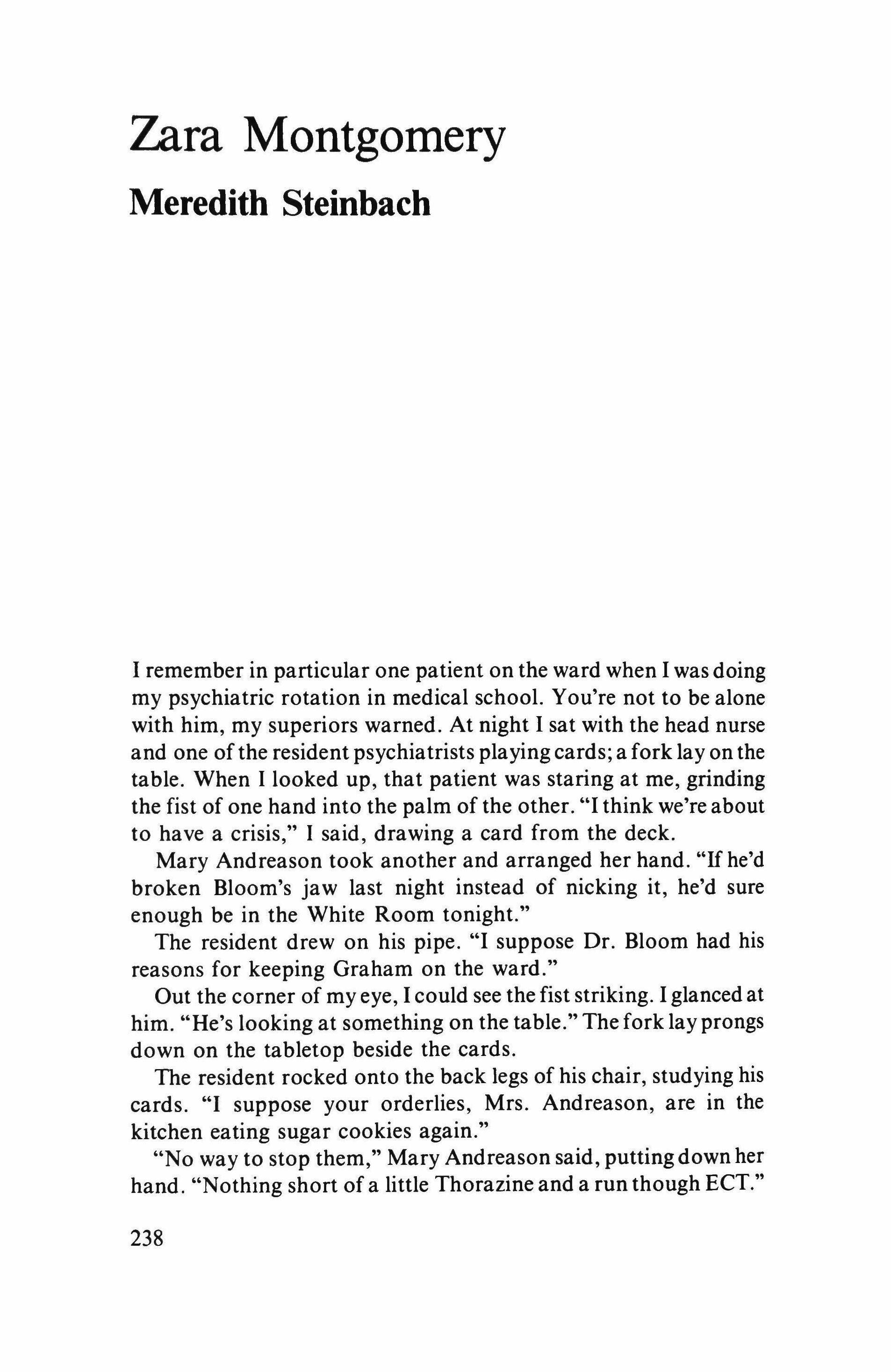
1 remember in particular one patient on the ward when 1 was doing my psychiatric rotation in medical school. You're not to be alone with him, my superiors warned. At night 1 sat with the head nurse and one ofthe resident psychiatrists playingcards; a fork lay on the table. When 1 looked up, that patient was staring at me, grinding the fist of one hand into the palm of the other. "I think we're about to have a crisis," I said, drawing a card from the deck.
Mary Andreason took another and arranged her hand. "If he'd broken Bloom's jaw last night instead of nicking it, he'd sure enough be in the White Room tonight."
The resident drew on his pipe. "I suppose Dr. Bloom had his reasons for keeping Graham on the ward."
Out the corner of my eye, I could see the fist striking. 1 glanced at him. "He's looking at something on the table." The fork lay prongs down on the tabletop beside the cards.
The resident rocked onto the back legs of his chair, studying his cards. "I suppose your orderlies, Mrs. Andreason, are in the kitchen eating sugar cookies again."
"No way to stop them," Mary Andreason said, putting down her hand. "Nothing short of a little Thorazine and a run though ECT."

"Well, I think you mightjust take a look in on them. Make sure they're on their feet."
Mary stood up slowly, pretending a weariness of games. She stretched her arms above her head. "While you're out there," the resident said, ignoring the guttural sounds coming from the corner, "why don't you whip up a little Thorazine in a very thin glass? Twenty-five milligrams should feel about right."
Mary Andreason sighed, edging her chair back. "Two tablespoons and the spike."
The patient was on his feet. "Evening, Harold. Would you like me to bring you a glass of milk?"
"Do you think it's the fork?" I asked, seeing Graham's eyes fixed on the table, somewhere near my hands. Slowly I took hold of the stem. I could see now, looking obliquely at him, his eyebrows going up. "It's the fork," I said. "I'll bet anything it is." Slowly I turned it over; the resident drew on his pipe. Mary Andreason was partway to the door when the patient sank back into his chair, completely relaxed.
"There you have it," the resident said, almost in affectation, lifting up his pipe. "Now you understand how intricate insanity is and how little control we have over it."
Now in the hall, I could see through the metal latticework ofthe window as I pressed the button above the light switch. The head psychiatric nurse was carrying a tray of paper cups and yellow capsules around the ward. With a heavy rubberized step, Mary Andreason passed a dark crest at the back of a chair. "Dr. O'Dea," Mary was sure to be saying gently as she fingered her coal-black hair under an outdated cap, "you haven't showered or spruced up one bit, and your wife will be arriving soon." Again I pressed the buzzer; I watched the nurse turn. Mary searched her pocket for the key chain.
"Sorry to keep you out here so long, Dr. Montgomery."
"Someday I'll give up wincing, Mary, when you call me that name."
"I'm not an amnesiac yet, Zara Montgomery," Mary Andreason scowled. "And I don't plan to be one soon." The door swung shut, and the middle-aged nurse secured the bolt in the lock with her key. Her hand was on my arm.
"We've got news for you today." Mary motioned toward a corner of the room.
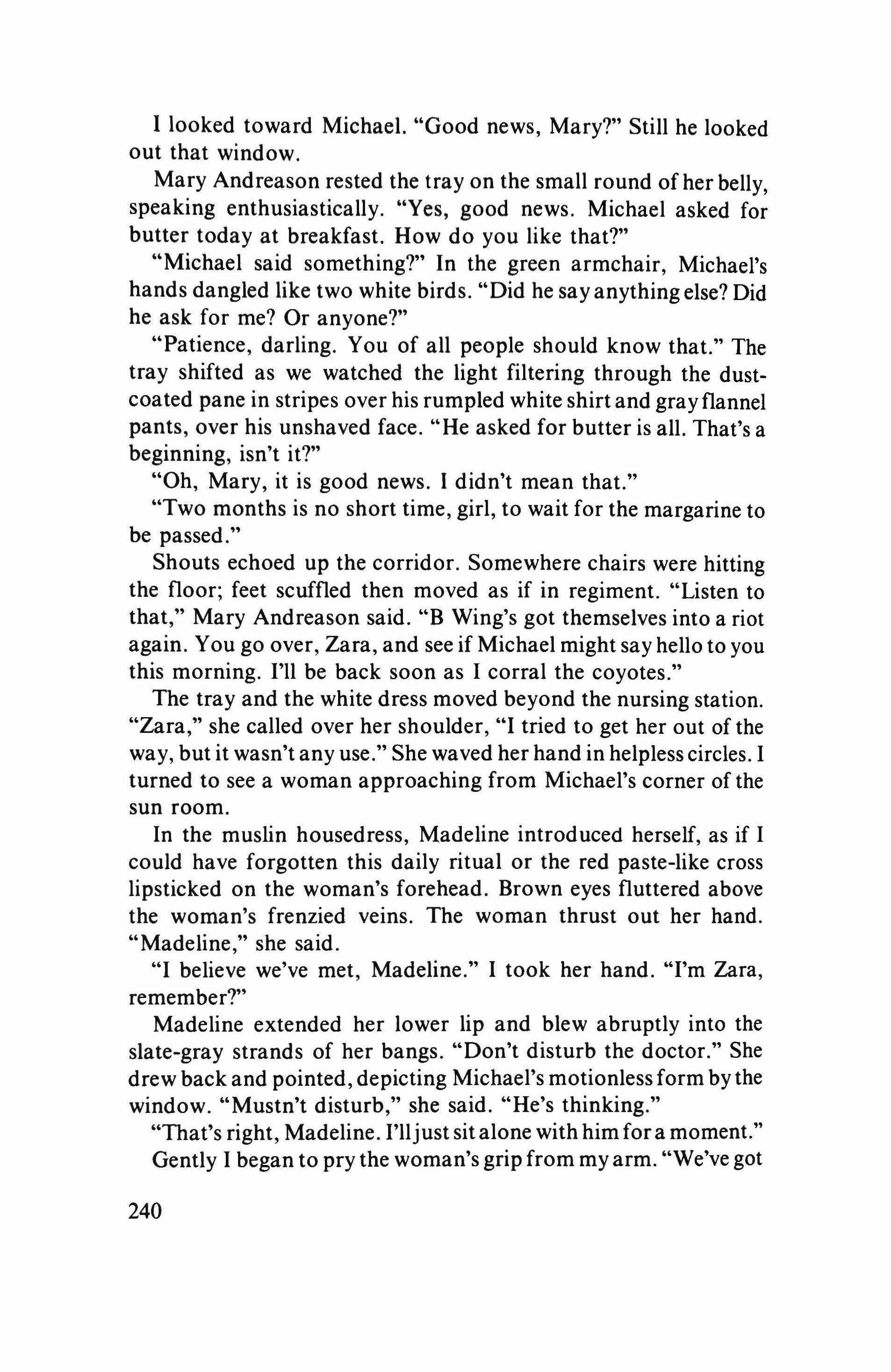
I looked toward Michael. "Good news, Mary?" Still he looked out that window.
Mary Andreason rested the tray on the small round of her belly, speaking enthusiastically. "Yes, good news. Michael asked for butter today at breakfast. How do you like that?"
"Michael said something?" In the green armchair, Michael's hands dangled like two white birds. "Did he say anything else? Did he ask for me? Or anyone?"
"Patience, darling. You of all people should know that." The tray shifted as we watched the light filtering through the dustcoated pane in stripes over his rumpled white shirt and grayflannel pants, over his unshaved face. "He asked for butter is all. That's a beginning, isn't it?"
"Oh, Mary, it is good news. I didn't mean that."
"Two months is no short time, girl, to wait for the margarine to be passed."
Shouts echoed up the corridor. Somewhere chairs were hitting the floor; feet scuffled then moved as if in regiment. "Listen to that," Mary Andreason said. "B Wing's got themselves into a riot again. You go over, Zara, and see if Michael might say hello to you this morning. I'll be back soon as I corral the coyotes."
The tray and the white dress moved beyond the nursing station. "Zara," she called over her shoulder, "I tried to get her out ofthe way, but it wasn't any use." She waved her hand in helpless circles. I turned to see a woman approaching from Michael's corner of the sun room.
In the muslin housedress, Madeline introduced herself, as if I could have forgotten this daily ritual or the red paste-like cross lipsticked on the woman's forehead. Brown eyes fluttered above the woman's frenzied veins. The woman thrust out her hand. "Madeline," she said.
"I believe we've met, Madeline." I took her hand. "I'm Zara, remember?"
Madeline extended her lower lip and blew abruptly into the slate-gray strands of her bangs. "Don't disturb the doctor." She drew back and pointed, depicting Michael's motionless form by the window. "Mustn't disturb," she said. "He's thinking."
"That's right, Madeline. I'lljust sit alone with him for a moment."
Gently I began to pry the woman's grip from my arm. "We've got
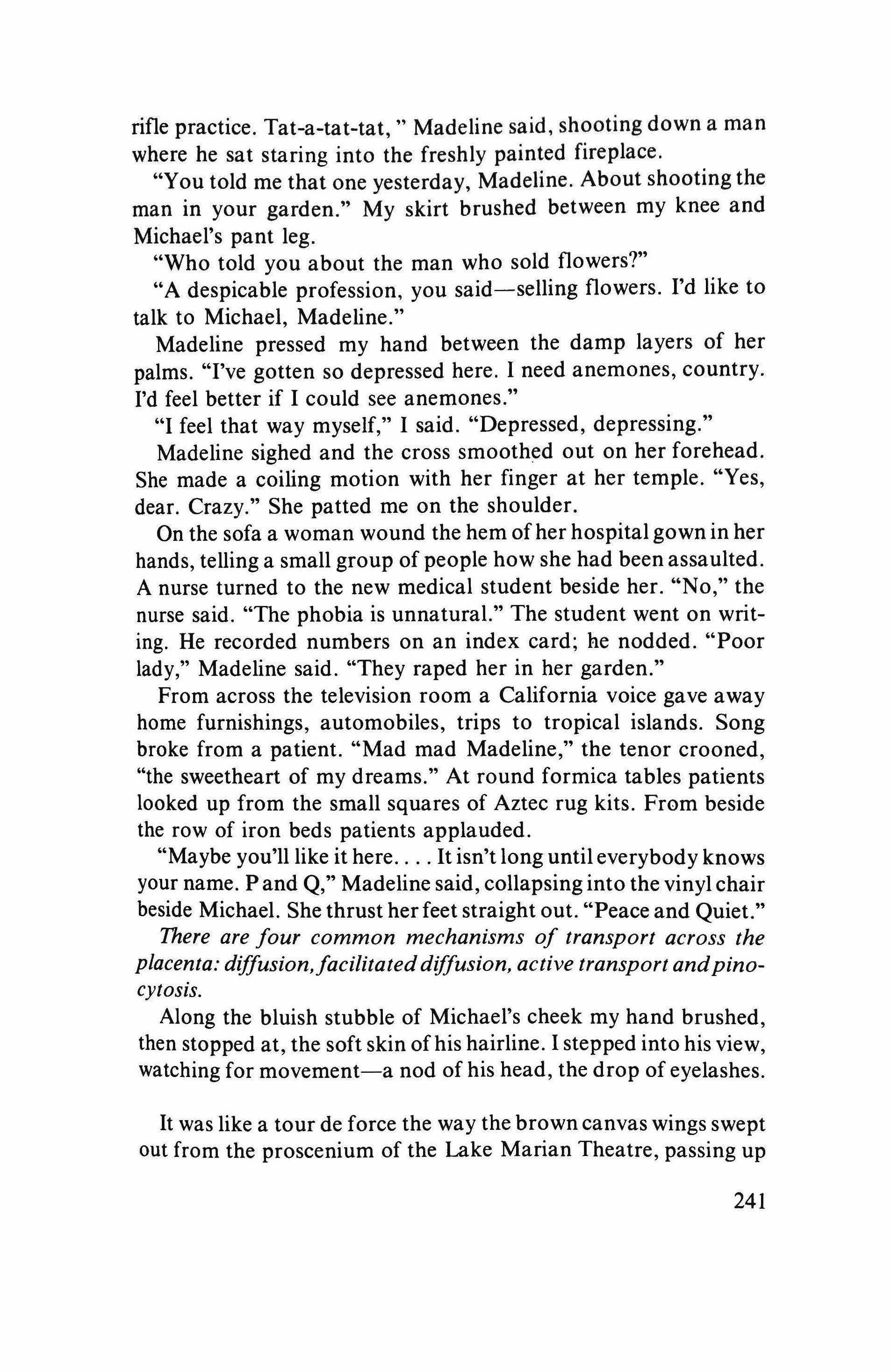
rifle practice. Tat-a-tat-tat, Madeline said, shooting down a man where he sat staring into the freshly painted fireplace.
"You told me that one yesterday, Madeline. About shooting the man in your garden." My skirt brushed between my knee and Michael's pant leg.
"Who told you about the man who sold flowers?"
"A despicable profession, you said-selling flowers. I'd like to talk to Michael, Madeline."
Madeline pressed my hand between the damp layers of her palms. "I've gotten so depressed here. I need anemones, country. I'd feel better if I could see anemones."
"I feel that way myself," I said. "Depressed, depressing."
Madeline sighed and the cross smoothed out on her forehead. She made a coiling motion with her finger at her temple. "Yes, dear. Crazy." She patted me on the shoulder.
On the sofa a woman wound the hem of her hospital gown in her hands, telling a small group of people how she had been assaulted. A nurse turned to the new medical student beside her. "No," the nurse said. "The phobia is unnatural." The student went on writing. He recorded numbers on an index card; he nodded. "Poor lady," Madeline said. "They raped her in her garden."
From across the television room a California voice gave away home furnishings, automobiles, trips to tropical islands. Song broke from a patient. "Mad mad Madeline," the tenor crooned, "the sweetheart of my dreams." At round formica tables patients looked up from the small squares of Aztec rug kits. From beside the row of iron beds patients applauded.
"Maybe you'll like it here It isn't long until everybody knows your name. P and Q," Madeline said, collapsing into the vinyl chair beside Michael. She thrust her feet straight out. "Peace and Quiet."
There are four common mechanisms of transport across the placenta: difJusion,facilitateddiffusion, active transport andpinocytosis.
Along the bluish stubble of Michael's cheek my hand brushed, then stopped at, the soft skin of his hairline. I stepped into his view, watching for movement-a nod of his head, the drop of eyelashes.
It was like a tour de force the way the brown canvas wings swept out from the proscenium of the Lake Marian Theatre, passing up 241
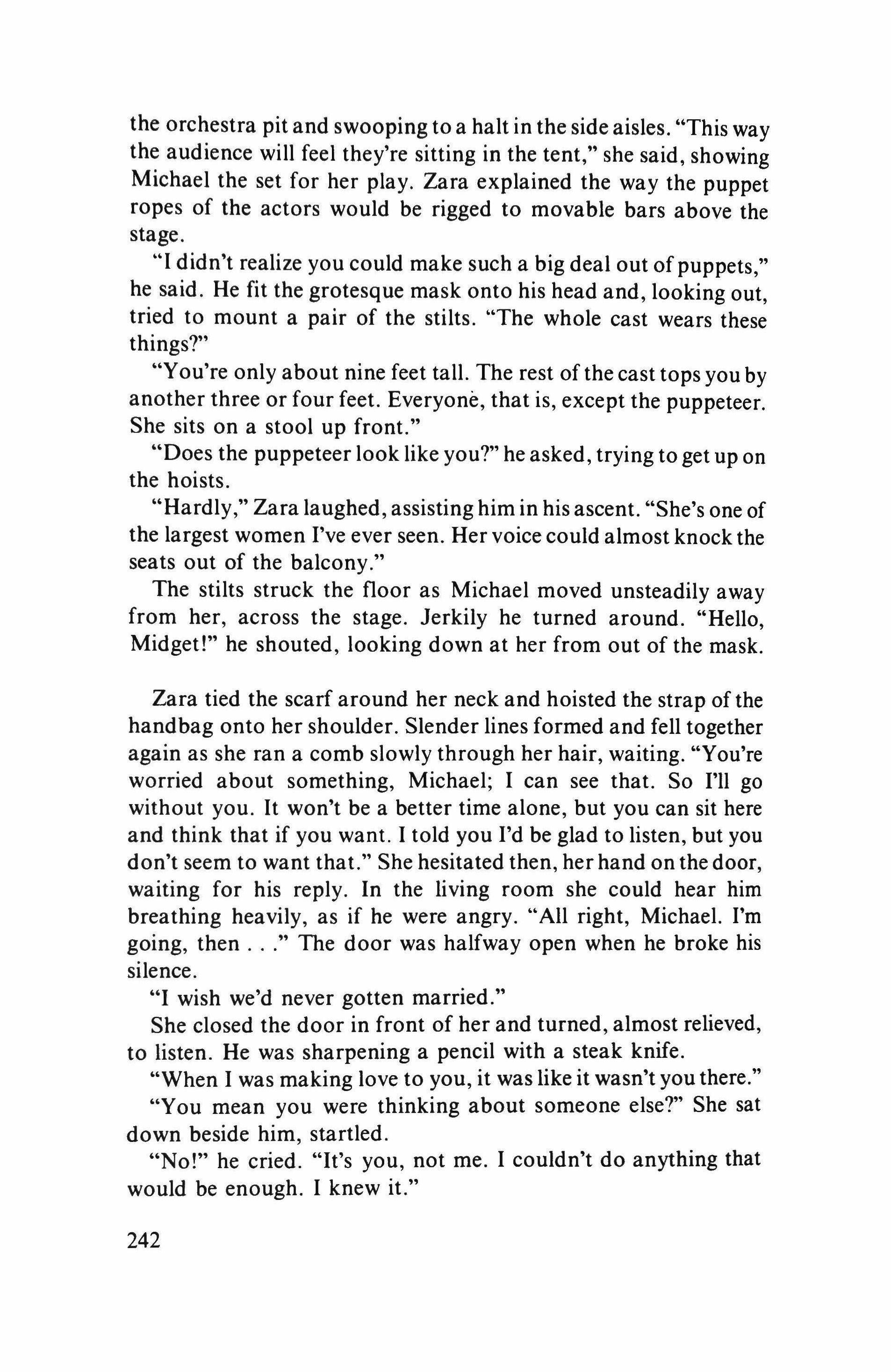
the orchestra pit and swooping to a halt in the side aisles. "This way the audience will feel they're sitting in the tent," she said, showing Michael the set for her play. Zara explained the way the puppet ropes of the actors would be rigged to movable bars above the stage.
"I didn't realize you could make such a big deal out of puppets," he said. He fit the grotesque mask onto his head and, looking out, tried to mount a pair of the stilts. "The whole cast wears these things?"
"You're only about nine feet tall. The rest of the cast tops you by another three or four feet. Everyone, that is, except the puppeteer. She sits on a stool up front."
"Does the puppeteer look like you?" he asked, trying to get up on the hoists.
"Hardly," Zara laughed, assisting him in his ascent. "She's one of the largest women I've ever seen. Her voice could almost knock the seats out of the balcony."
The stilts struck the floor as Michael moved unsteadily away from her, across the stage. Jerkily he turned around. "Hello, Midget!" he shouted, looking down at her from out of the mask.
Zara tied the scarf around her neck and hoisted the strap of the handbag onto her shoulder. Slender lines formed and fell together again as she ran a comb slowly through her hair, waiting. "You're worried about something, Michael; I can see that. So I'll go without you. It won't be a better time alone, but you can sit here and think that if you want. I told you I'd be glad to listen, but you don't seem to want that." She hesitated then, her hand on the door, waiting for his reply. In the living room she could hear him breathing heavily, as if he were angry. "All right, Michael. I'm going, then The door was halfway open when he broke his silence.
"I wish we'd never gotten married."
She closed the door in front of her and turned, almost relieved, to listen. He was sharpening a pencil with a steak knife.
"When I was making love to you, it was like it wasn't you there."
"You mean you were thinking about someone else?" She sat down beside him, startled.
"No!" he cried. "It's you, not me. I couldn't do anything that would be enough. I knew it."

"I was always more than satisfied with you, Michael." She touched his arm, but he pulled it abruptly toward himself. "It was good, Michael."
Shavings were falling into his lap like confetti. "How can 1 do enough for you," he demanded, "if you're thinking of something else?"
"I guess mostly 1 wasn't thinking at all when we made love," she said, trying to see his point. She remembered his arms around her; he kissed down the inside of her arm. The light from the street fell across his shoulder.
"And when you do, what is it?" The blade went up and down, knicking the painted yellow surface. He hovered over it.
"Besides you, you mean?"
"Yes, Zara, besides me, 1 mean."
"Sometimes 1 notice the way the light looks in the room, but 1 don't really think about it. You must do the same thing, Michael."
"What else do you think?"
"Sometimes 1 think about what the future will be like with you. Or the past."
"How do you like that?" Michael O'Dea said, addressing no one at all. The lead was nearly stripped of wood now as he held it up to inspect it. He snapped it offwith vehemence. "She thinks about her past when 1 make love to her. And she calls that a satisfactory relationship."
"This is absolutely absurd, Michael. You are part of my past. I'm talking about us. Can't you understand the difference between a fleeting thought and preoccupation, Michael?"
"Certainly," he said, whittling neatly at the eraser. "Whenever we go out, your eyes nearly fall out of your head looking at everyone."
"Perhaps," she said sarcastically, standing up and pulling on her jacket. "Perhaps 1 should wear a habit!"
Michael picked a piece of pencil off his lap and skewered it. "Something happened on intensive care," he said quietly. "It was terrible. "
"For Christ's sake, Michael," Zara said, sitting down again beside him. She put her hand on his knee and looked at him: his head drooping over the flakes of yellow paint and wood, over his unhappy self. "Why don't youjust say you've had a terrible day at the hospital, and we can talk about it? Don't you think that would
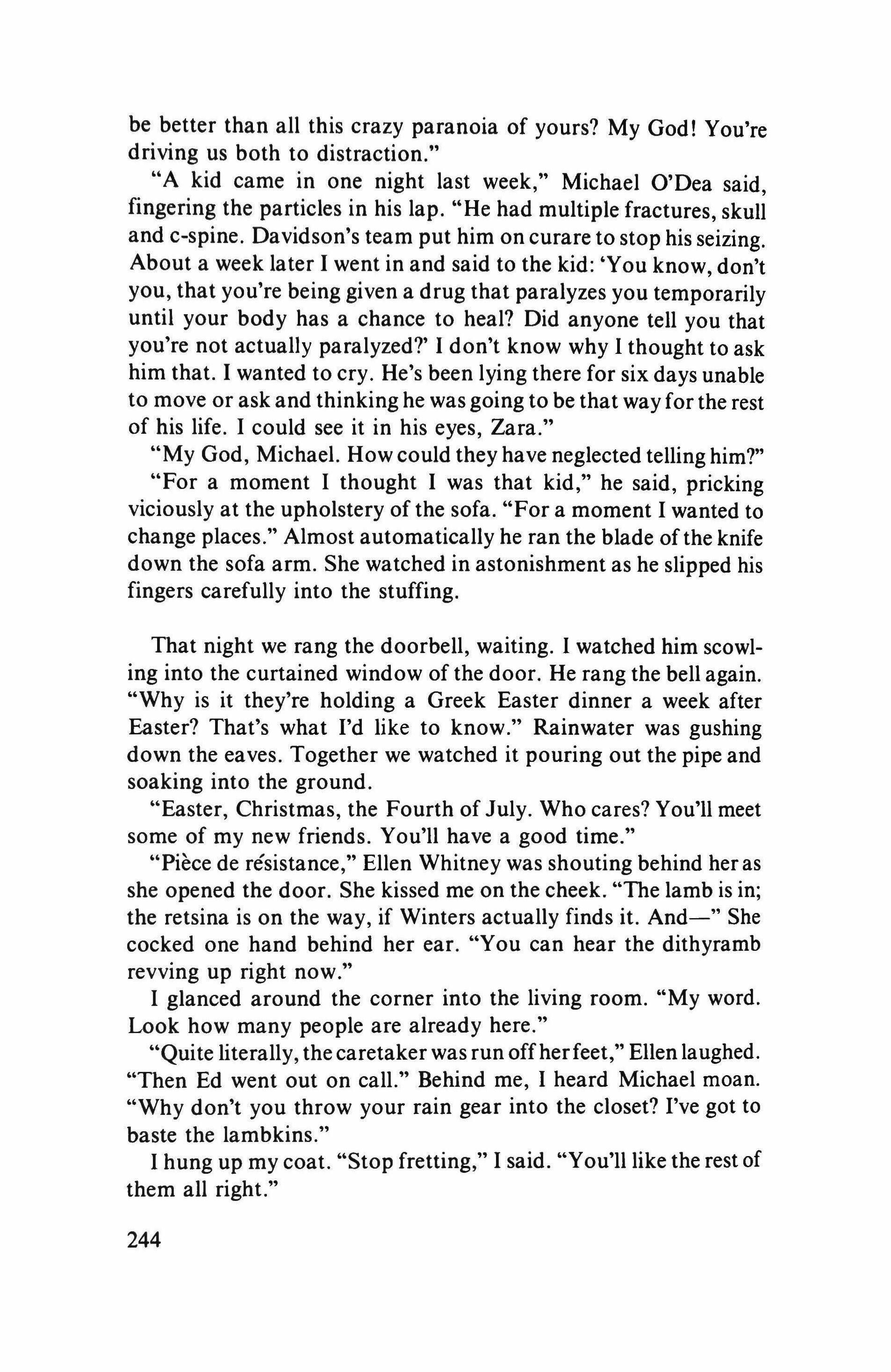
be better than all this crazy paranoia of yours? My God! You're driving us both to distraction."
"A kid came in one night last week," Michael O'Dea said, fingering the particles in his lap. "He had multiple fractures, skull and c-spine. Davidson's team put him on curare to stop his seizing. About a week later I went in and said to the kid: 'You know, don't you, that you're being given a drug that paralyzes you temporarily until your body has a chance to heal? Did anyone tell you that you're not actually paralyzed?' I don't know why I thought to ask him that. I wanted to cry. He's been lying there for six days unable to move or ask and thinking he was going to be that way for the rest of his life. I could see it in his eyes, Zara."
"My God, Michael. How could they have neglected telling him?"
"For a moment I thought I was that kid," he said, pricking viciously at the upholstery of the sofa. "For a moment I wanted to change places." Almost automatically he ran the blade ofthe knife down the sofa arm. She watched in astonishment as he slipped his fingers carefully into the stuffing.
That night we rang the doorbell, waiting. I watched him scowling into the curtained window of the door. He rang the bell again. "Why is it they're holding a Greek Easter dinner a week after Easter? That's what I'd like to know." Rainwater was gushing down the eaves. Together we watched it pouring out the pipe and soaking into the ground.
"Easter, Christmas, the Fourth of July. Who cares? You'll meet some of my new friends. You'll have a good time."
"Piece de resistance," Ellen Whitney was shouting behind her as she opened the door. She kissed me on the cheek. "The lamb is in; the retsina is on the way, if Winters actually finds it. And-" She cocked one hand behind her ear. "You can hear the dithyramb revving up right now."
I glanced around the corner into the living room. "My word. Look how many people are already here."
"Quite literally, the caretaker was run offherfeet," Ellen laughed. "Then Ed went out on call." Behind me, I heard Michael moan. "Why don't you throw your rain gear into the closet? I've got to baste the lambkins."
I hung up my coat. "Stop fretting," I said. "You'll like the rest of them all right."
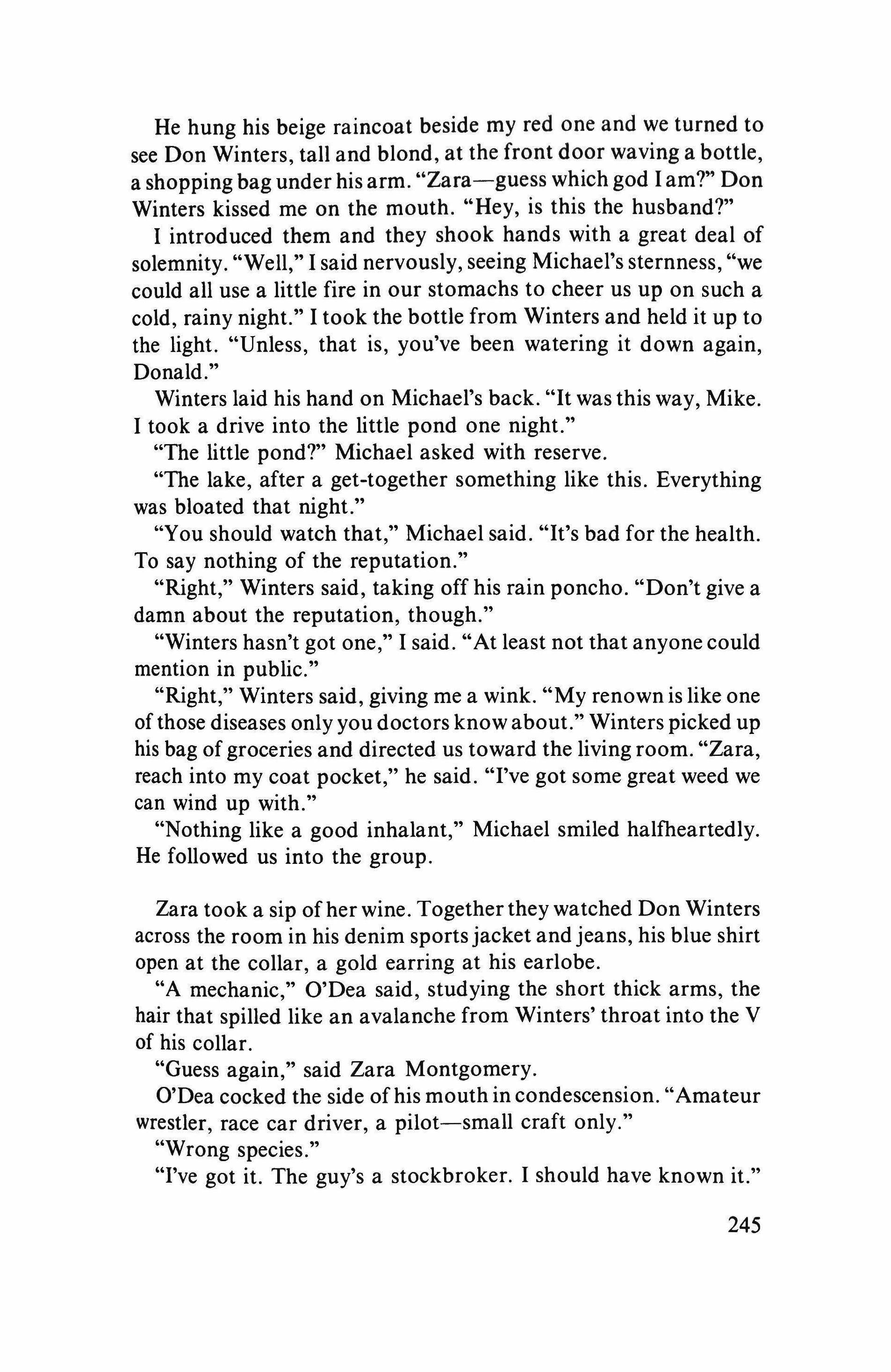
He hung his beige raincoat beside my red one and we turned to see Don Winters, tall and blond, at the front door waving a bottle, a shopping bag under his arm. "Zara-guess which god I am?" Don Winters kissed me on the mouth. "Hey, is this the husband?"
I introduced them and they shook hands with a great deal of solemnity. "Well," I said nervously, seeing Michael's sternness, "we could all use a little fire in our stomachs to cheer us up on such a cold, rainy night." I took the bottle from Winters and held it up to the light. "Unless, that is, you've been watering it down again, Donald."
Winters laid his hand on Michael's back. "It was this way, Mike. I took a drive into the little pond one night."
"The little pond?" Michael asked with reserve.
"The lake, after a get-together something like this. Everything was bloated that night."
"You should watch that," Michael said. "It's bad for the health. To say nothing of the reputation."
"Right," Winters said, taking off his rain poncho. "Don't give a damn about the reputation, though."
"Winters hasn't got one," I said. "At least not that anyone could mention in public."
"Right," Winters said, giving me a wink. "My renown is like one of those diseases only you doctors know about." Winters picked up his bag of groceries and directed us toward the living room. "Zara, reach into my coat pocket," he said. "I've got some great weed we can wind up with."
"Nothing like a good inhalant," Michael smiled halfheartedly. He followed us into the group.
Zara took a sip of her wine. Togetherthey watched Don Winters across the room in his denim sports jacket and jeans, his blue shirt open at the collar, a gold earring at his earlobe.
"A mechanic," O'Dea said, studying the short thick arms, the hair that spilled like an avalanche from Winters' throat into the V of his collar.
"Guess again," said Zara Montgomery.
O'Dea cocked the side of his mouth in condescension. "Amateur wrestler, race car driver, a pilot-small craft only."
"Wrong species."
"I've got it. The guy's a stockbroker. I should have known it."
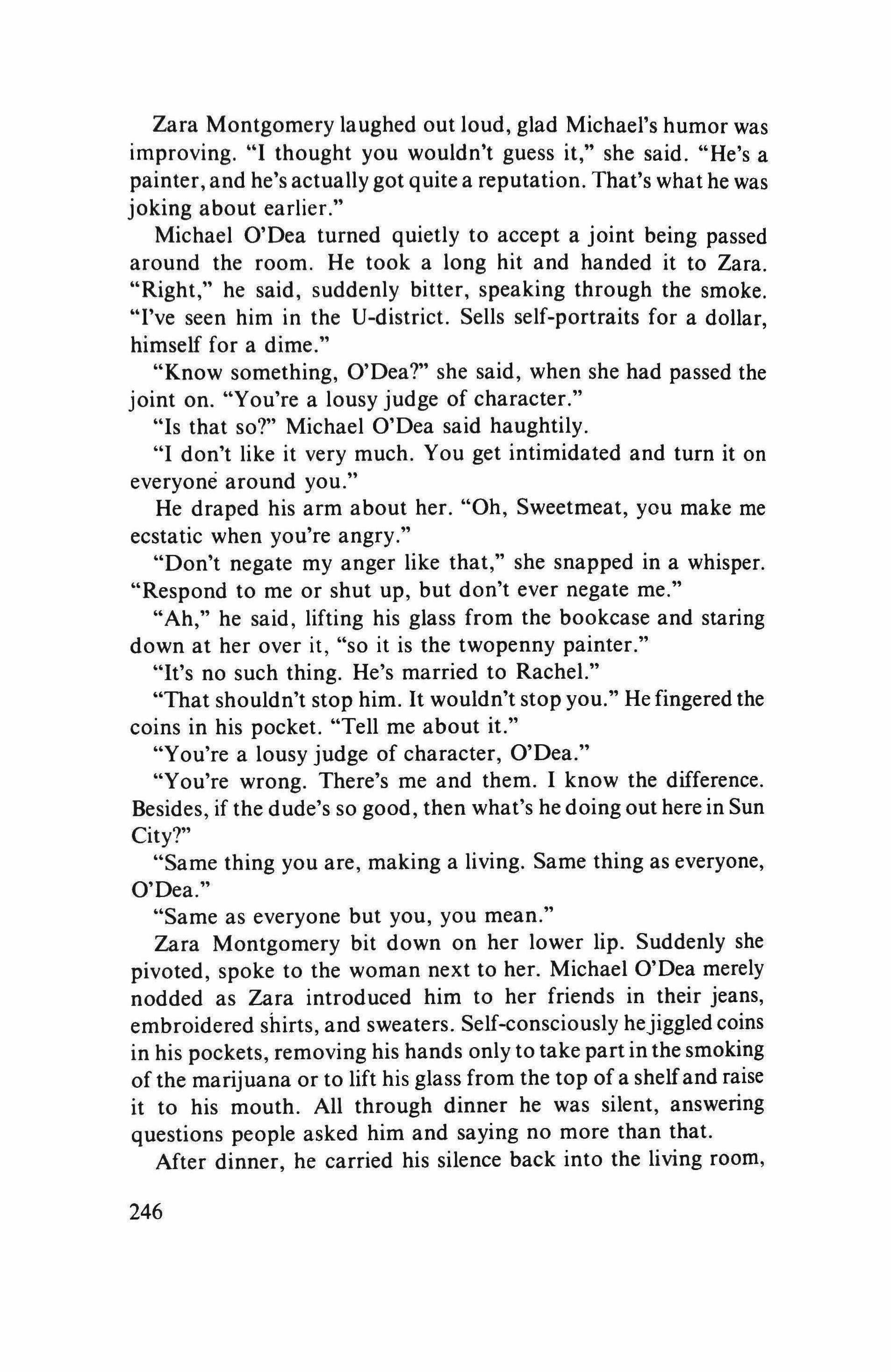
Zara Montgomery laughed out loud, glad Michael's humor was improving. "I thought you wouldn't guess it," she said. "He's a painter, and he's actually got quite a reputation. That's what he was joking about earlier."
Michael O'Dea turned quietly to accept a joint being passed around the room. He took a long hit and handed it to Zara. "Right," he said, suddenly bitter, speaking through the smoke. "I've seen him in the U-district. Sells self-portraits for a dollar, himself for a dime."
"Know something, O'Dea?" she said, when she had passed the joint on. "You're a lousy judge of character."
"Is that so?" Michael O'Dea said haughtily.
"I don't like it very much. You get intimidated and turn it on everyone around you."
He draped his arm about her. "Oh, Sweetmeat, you make me ecstatic when you're angry."
"Don't negate my anger like that," she snapped in a whisper. "Respond to me or shut up, but don't ever negate me."
"Ah," he said, lifting his glass from the bookcase and staring down at her over it, "so it is the twopenny painter."
"It's no such thing. He's married to Rachel."
"That shouldn't stop him. It wouldn't stop you." He fingered the coins in his pocket. "Tell me about it."
"You're a lousy judge of character, O'Dea."
"You're wrong. There's me and them. I know the difference. Besides, if the dude's so good, then what's he doing out here in Sun City?"
"Same thing you are, making a living. Same thing as everyone, O'Dea."
"Same as everyone but you, you mean."
Zara Montgomery bit down on her lower lip. Suddenly she pivoted, spoke to the woman next to her. Michael O'Dea merely nodded as Zara introduced him to her friends in their jeans, embroidered shirts, and sweaters. Self-consciously hejiggled coins in his pockets, removing his hands only to take part in the smoking of the marijuana or to lift his glass from the top of a shelfand raise it to his mouth. All through dinner he was silent, answering questions people asked him and saying no more than that.
After dinner, he carried his silence back into the living room, 246
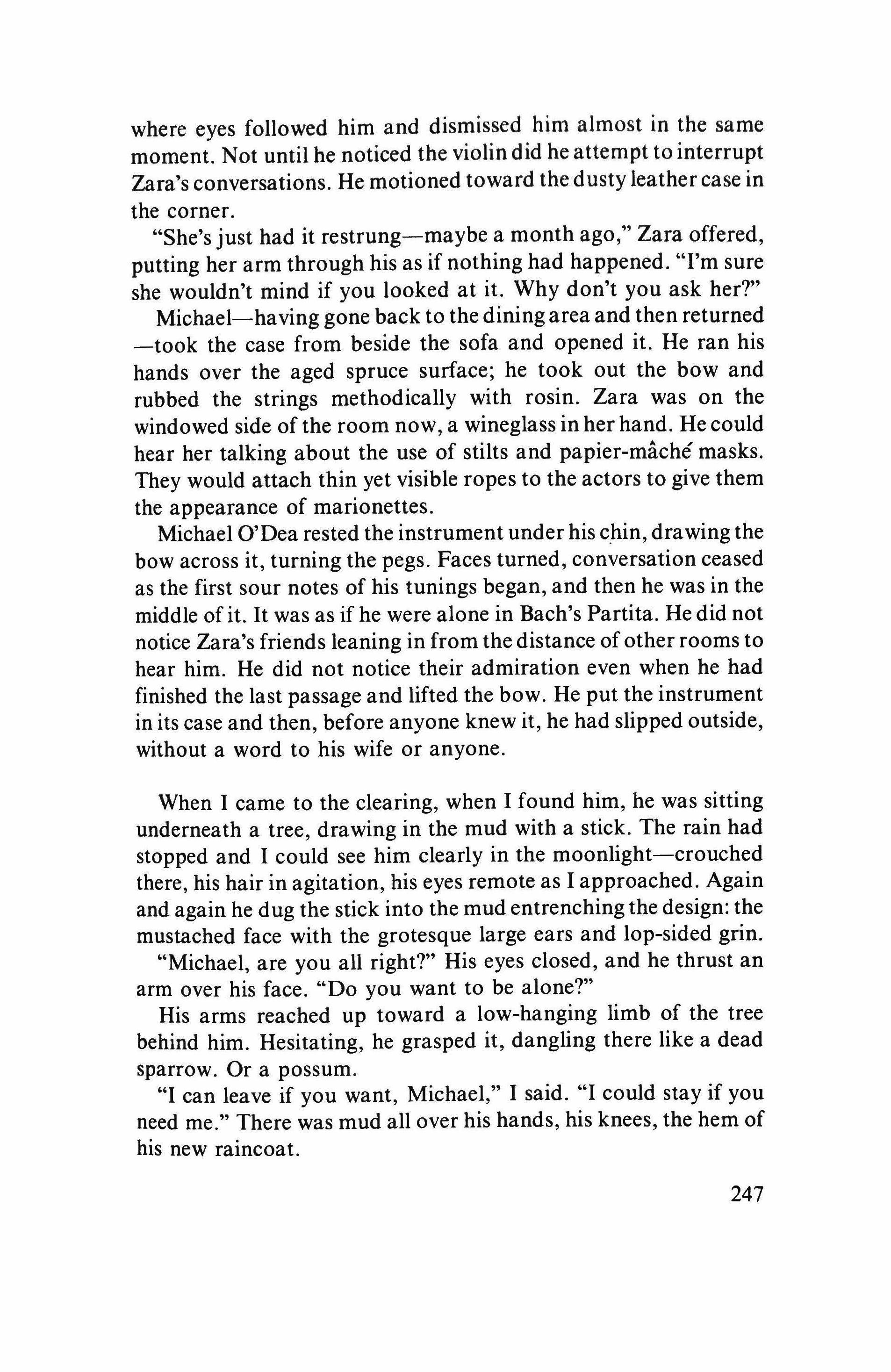
where eyes followed him and dismissed him almost in the same moment. Not until he noticed the violin did he attempt to interrupt Zara's conversations. He motioned toward the dusty leather case in the corner.
"She's just had it restrung-maybe a month ago," Zara offered, putting her arm through his as if nothing had happened. "I'm sure she wouldn't mind if you looked at it. Why don't you ask her?"
Michael-having gone back to the dining area and then returned -took the case from beside the sofa and opened it. He ran his hands over the aged spruce surface; he took out the bow and rubbed the strings methodically with rosin. Zara was on the windowed side of the room now, a wineglass in her hand. He could hear her talking about the use of stilts and papier-mache masks. They would attach thin yet visible ropes to the actors to give them the appearance of marionettes.
Michael O'Dea rested the instrument under his chin, drawing the bow across it, turning the pegs. Faces turned, conversation ceased as the first sour notes of his tunings began, and then he was in the middle of it. It was as if he were alone in Bach's Partita. He did not notice Zara's friends leaning in from the distance of other rooms to hear him. He did not notice their admiration even when he had finished the last passage and lifted the bow. He put the instrument in its case and then, before anyone knew it, he had slipped outside, without a word to his wife or anyone.
When 1 came to the clearing, when 1 found him, he was sitting underneath a tree, drawing in the mud with a stick. The rain had stopped and 1 could see him clearly in the moonlight-crouched there, his hair in agitation, his eyes remote as 1 approached. Again and again he dug the stick into the mud entrenching the design: the mustached face with the grotesque large ears and lop-sided grin.
"Michael, are you all right?" His eyes closed, and he thrust an arm over his face. "Do you want to be alone?"
His arms reached up toward a low-hanging limb of the tree behind him. Hesitating, he grasped it, dangling there like a dead sparrow. Or a possum.
"I can leave if you want, Michael," 1 said. "I could stay if you need me." There was mud all over his hands, his knees, the hem of his new raincoat.
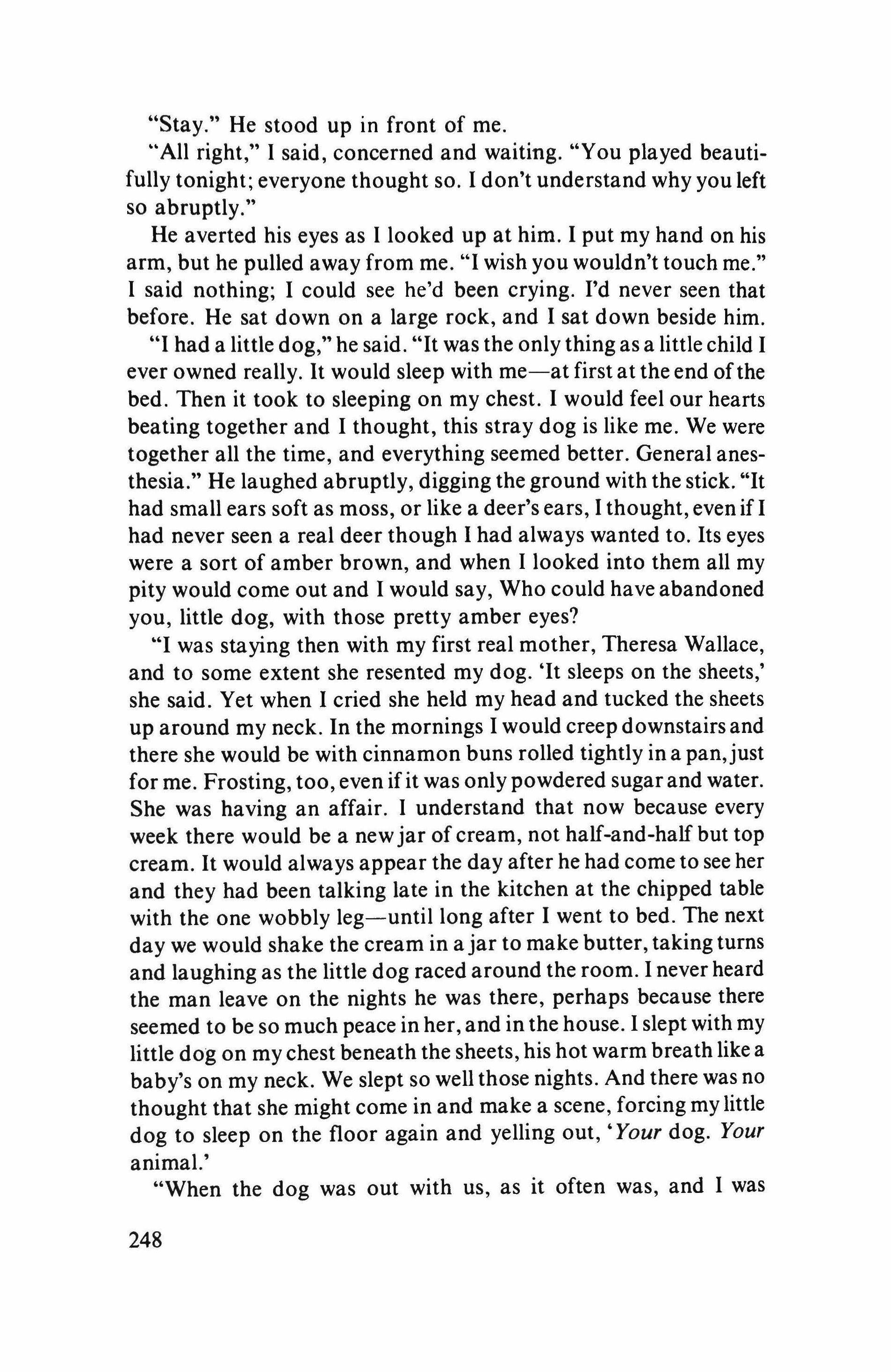
"Stay." He stood up in front of me.
"All right," I said, concerned and waiting. "You played beautifully tonight; everyone thought so. I don't understand why you left so abruptly."
He averted his eyes as I looked up at him. I put my hand on his arm, but he pulled away from me. "I wish you wouldn't touch me." I said nothing; I could see he'd been crying. I'd never seen that before. He sat down on a large rock, and I sat down beside him.
"I had a little dog," he said. "It was the only thing as a little child I ever owned really. It would sleep with me-at first at the end ofthe bed. Then it took to sleeping on my chest. I would feel our hearts beating together and I thought, this stray dog is like me. We were together all the time, and everything seemed better. General anesthesia." He laughed abruptly, digging the ground with the stick. "It had small ears soft as moss, or like a deer's ears, I thought, even if I had never seen a real deer though I had always wanted to. Its eyes were a sort of amber brown, and when I looked into them all my pity would come out and I would say, Who could have abandoned you, little dog, with those pretty amber eyes?
"I was staying then with my first real mother, Theresa Wallace, and to some extent she resented my dog. 'It sleeps on the sheets,' she said. Yet when I cried she held my head and tucked the sheets up around my neck. In the mornings I would creep downstairs and there she would be with cinnamon buns rolled tightly in a pan,just for me. Frosting, too, even ifit was onlypowdered sugar and water. She was having an affair. I understand that now because every week there would be a new jar of cream, not half-and-half but top cream. It would always appear the day after he had come to see her and they had been talking late in the kitchen at the chipped table with the one wobbly leg-until long after I went to bed. The next day we would shake the cream in a jar to make butter, taking turns and laughing as the little dog raced around the room. I never heard the man leave on the nights he was there, perhaps because there seemed to be so much peace in her, and in the house. I slept with my little dog on my chest beneath the sheets, his hot warm breath like a baby's on my neck. We slept so well those nights. And there was no thought that she might come in and make a scene, forcing my little dog to sleep on the floor again and yelling out, 'Your dog. Your animal.'
"When the dog was out with us, as it often was, and I was

walking it on its leash, she was proud to call it her own. 'The orphan dog,' she would say, 'walks very smartly doesn't it, little Michelangelo?' She had an old violin in the house, and she insisted I squeak away on it every day to ease her mind while she was cleaning up or when the man didn't appear the night he was expected. This sometimes happened, and it might be a day or two until he did appear. Then I would hear them whispering about 'obligationschildren.' I took that then to mean me, though now, of course, I understand, or I think I do, that he meant his own responsibilities.
"She insisted that we go to confession and I spent most of every Thursday night in terror, contriving sins to tell the priest and praying to God that the priest would think them good enough so I might be believed and forgiven. Often the man came to visit, and nearly always on the night before confession. The next day, I felt God had rewarded me for my ingenuity-with butter.
"Eventually, however, a change began in the house on those nights when the man arrived. Her eyes were hard and accusing as she stared at him. The two of them did not look at me when I came in the room, but stared red-faced at one another. He didn't pick me up and set me on his lap, laughing, 'How goes it, lucky little orphan boy?'
"At this time, my dog and I had taken a great interest in birds. The little dog would run after young robins on the ground, barking furiously as he sailed along, his white rear and tail up, his yellow head scootingalong the ground. I thought then, My dog is teaching birds to fly. There was a nest of newly hatched birds in, a nearby tree, and often I would climb up that tree and watch them sprouting downy feathers. It was a box elder tree, and it was filled with box-elder bugs-bright orange like little flames. I would toss them down to him where he sat begging on his hind feet, and he would snap them up.
"One week the man didn't appear at all, and my 'mother' failed to make the cinnamon rolls. I would creep downstairs, my dog behind me, slinking into the kitchen to the smell of dry toast. 'What will you do about this dog?' she cried. 'Your orphan dog has dug up my garden. All my zinnias and petunias, too.' Her eyes were red and her face puffed out as if she had grown fatter, but the rest of her had not. My dog and I went outside as fast as we could get away from her. After several weeks of being irritated with us, one day she impulsively gathered up a little change and went out, she said, 'to
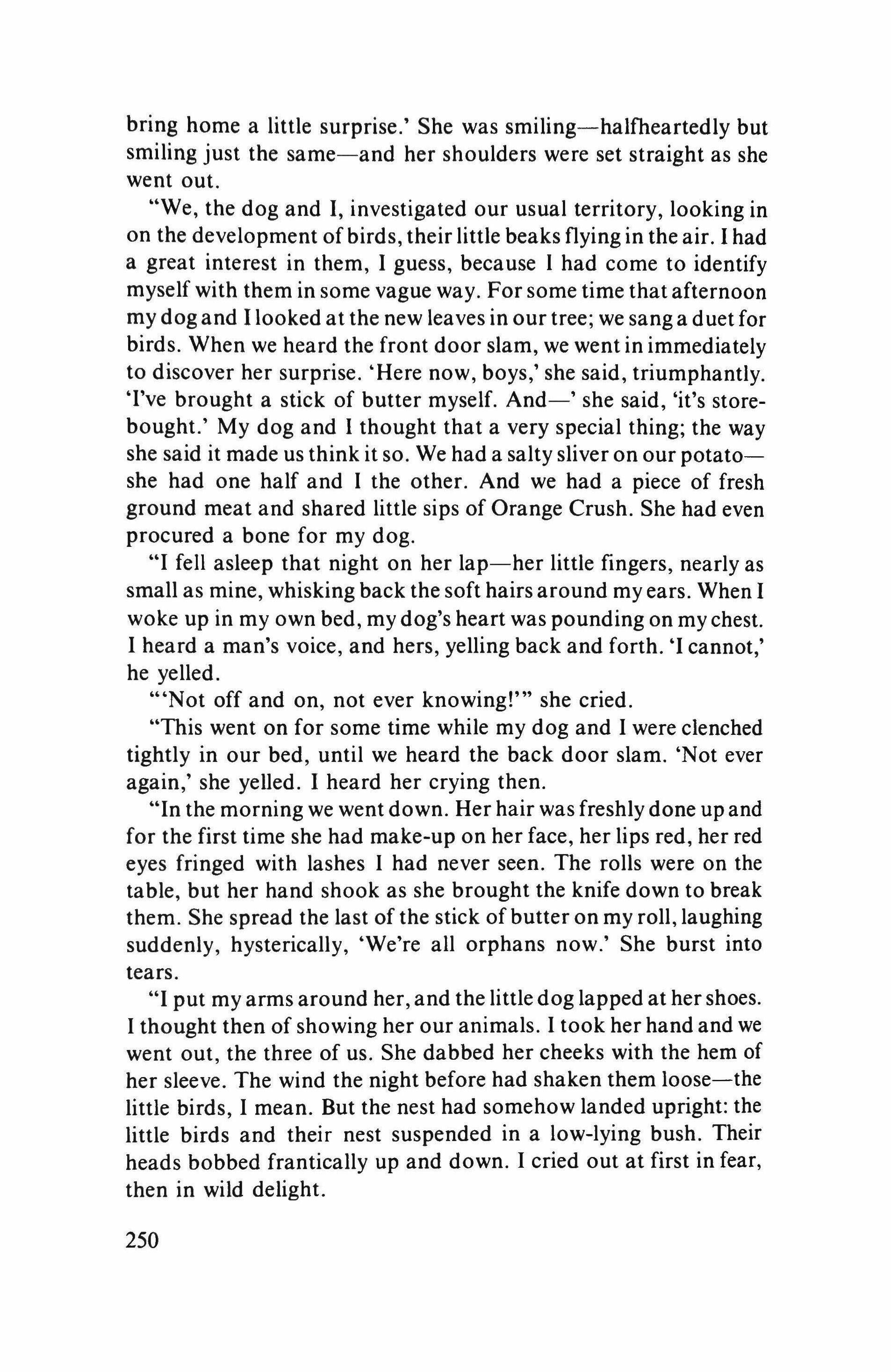
bring home a little surprise.' She was smiling-halfheartedly but smiling just the same-and her shoulders were set straight as she went out.
"We, the dog and I, investigated our usual territory, looking in on the development of birds, their little beaks flying in the air. I had a great interest in them, I guess, because I had come to identify myself with them in some vague way. For some time that afternoon my dog and I looked at the new leaves in our tree; we sang ad uet for birds. When we heard the front door slam, we went in immediately to discover her surprise. 'Here now, boys,' she said, triumphantly. 'I've brought a stick of butter myself. And-' she said, 'it's storebought.' My dog and I thought that a very special thing; the way she said it made us think it so. We had a salty sliver on our potatoshe had one half and I the other. And we had a piece of fresh ground meat and shared little sips of Orange Crush. She had even procured a bone for my dog.
"I fell asleep that night on her lap-her little fingers, nearly as small as mine, whisking back the soft hairs around my ears. When I woke up in my own bed, my dog's heart was pounding on my chest. I heard a man's voice, and hers, yelling back and forth. 'I cannot,' he yelled.
'''Not off and on, not ever knowing!" she cried.
"This went on for some time while my dog and I were clenched tightly in our bed, until we heard the back door slam. 'Not ever again,' she yelled. I heard her crying then.
"In the morning we went down. Her hair was freshly done up and for the first time she had make-up on her face, her lips red, her red eyes fringed with lashes I had never seen. The rolls were on the table, but her hand shook as she brought the knife down to break them. She spread the last of the stick of butter on my roll, laughing suddenly, hysterically, 'We're all orphans now.' She burst into tears.
"I put my arms around her, and the little dog lapped at her shoes. I thought then of showing her our animals. I took her hand and we went out, the three of us. She dabbed her cheeks with the hem of her sleeve. The wind the night before had shaken them loose-the little birds, I mean. But the nest had somehow landed upright: the little birds and their nest suspended in a low-lying bush. Their heads bobbed frantically up and down. I cried out at first in fear, then in wild delight.
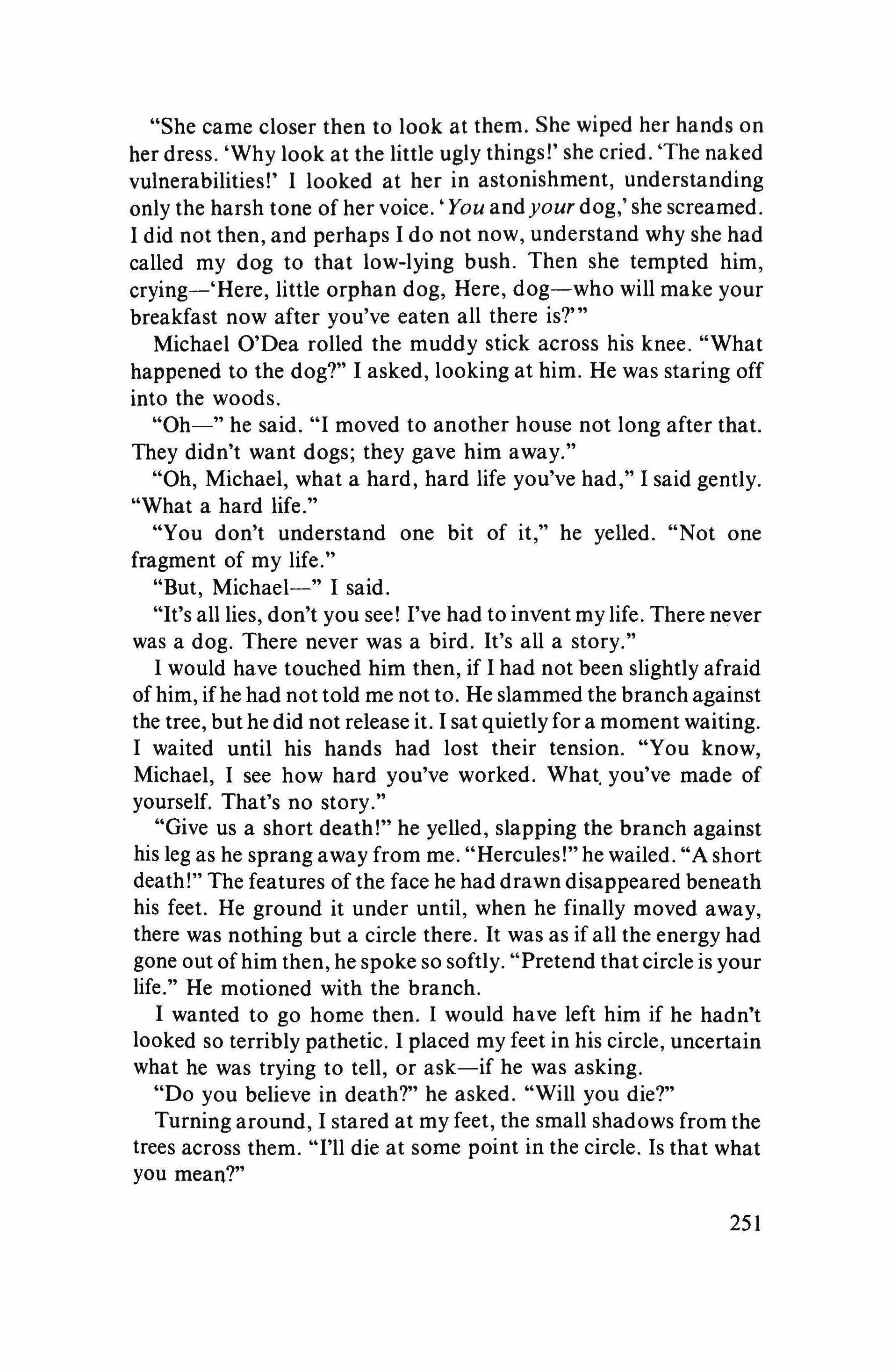
"She came closer then to look at them. She wiped her hands on her dress. 'Why look at the little ugly things!' she cried. 'The naked vulnerabilities!' I looked at her in astonishment, understanding only the harsh tone of her voice. 'You and your dog,' she screamed. I did not then, and perhaps I do not now, understand why she had called my dog to that low-lying bush. Then she tempted him, crying-'Here, little orphan dog, Here, dog-who will make your breakfast now after you've eaten all there is?"
Michael O'Dea rolled the muddy stick across his knee. "What happened to the dog?" I asked, looking at him. He was staring off into the woods.
"Oh-" he said. "I moved to another house not long after that. They didn't want dogs; they gave him away."
"Oh, Michael, what a hard, hard life you've had," I said gently. "What a hard life."
"You don't understand one bit of it," he yelled. "Not one fragment of my life."
"But, Michael-" 1 said.
"It's all lies, don't you see! I've had to invent my life. There never was a dog. There never was a bird. It's all a story."
1 would have touched him then, if I had not been slightly afraid of him, if he had not told me not to. He slammed the branch against the tree, but he did not release it. I sat quietly for a moment waiting. I waited until his hands had lost their tension. "You know, Michael, I see how hard you've worked. What. you've made of yourself. That's no story."
"Give us a short death!" he yelled, slapping the branch against his leg as he sprang away from me. "Hercules!" he wailed. "A short death!" The features of the face he had drawn disappeared beneath his feet. He ground it under until, when he finally moved away, there was nothing but a circle there. It was as if all the energy had gone out of him then, he spoke so softly. "Pretend that circle is your life." He motioned with the branch.
I wanted to go home then. I would have left him if he hadn't looked so terribly pathetic. I placed my feet in his circle, uncertain what he was trying to tell, or ask-if he was asking.
"Do you believe in death?" he asked. "Will you die?"
Turning around, 1 stared at my feet, the small shadows from the trees across them. "I'll die at some point in the circle. Is that what you mean?"
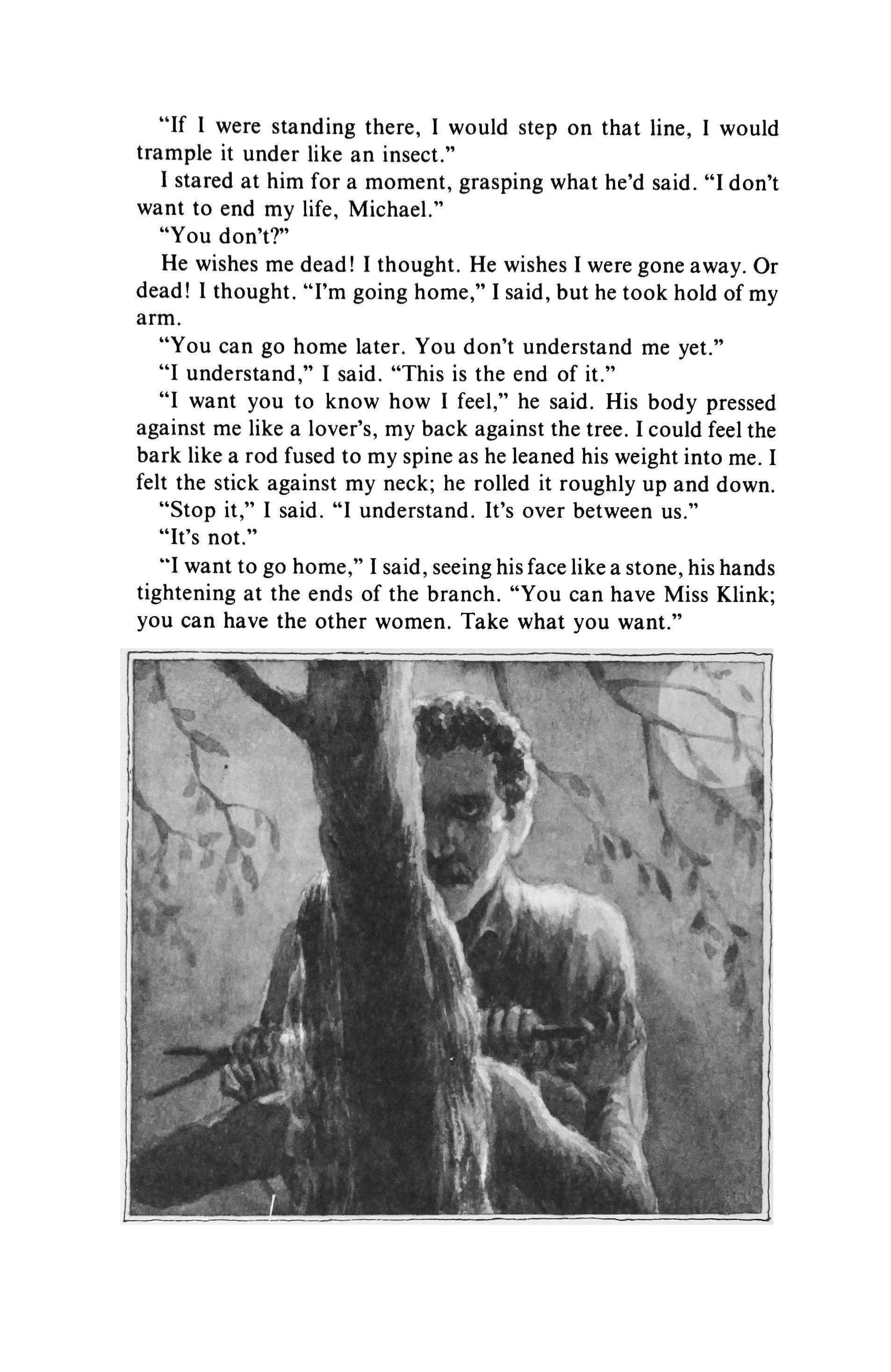
"If 1 were standing there, I would step on that line, I would trample it under like an insect."
1 stared at him for a moment, grasping what he'd said. "I don't want to end my life, Michael."
"you don't?"
He wishes me dead! I thought. He wishes I were gone away. Or dead! I thought. "I'm going home," I said, but he took hold of my arm.
"You can go home later. You don't understand me yet."
"I understand," I said. "This is the end of it."
"I want you to know how 1 feel," he said. His body pressed against me like a lover's, my back against the tree. I could feel the bark like a rod fused to my spine as he leaned his weight into me. I felt the stick against my neck; he rolled it roughly up and down.
"Stop it," 1 said. "I understand. It's over between us."
"It's not."
"I want to go home," I said, seeing his face like a stone, his hands tightening at the ends of the branch. "You can have Miss Klink; you can have the other women. Take what you want."
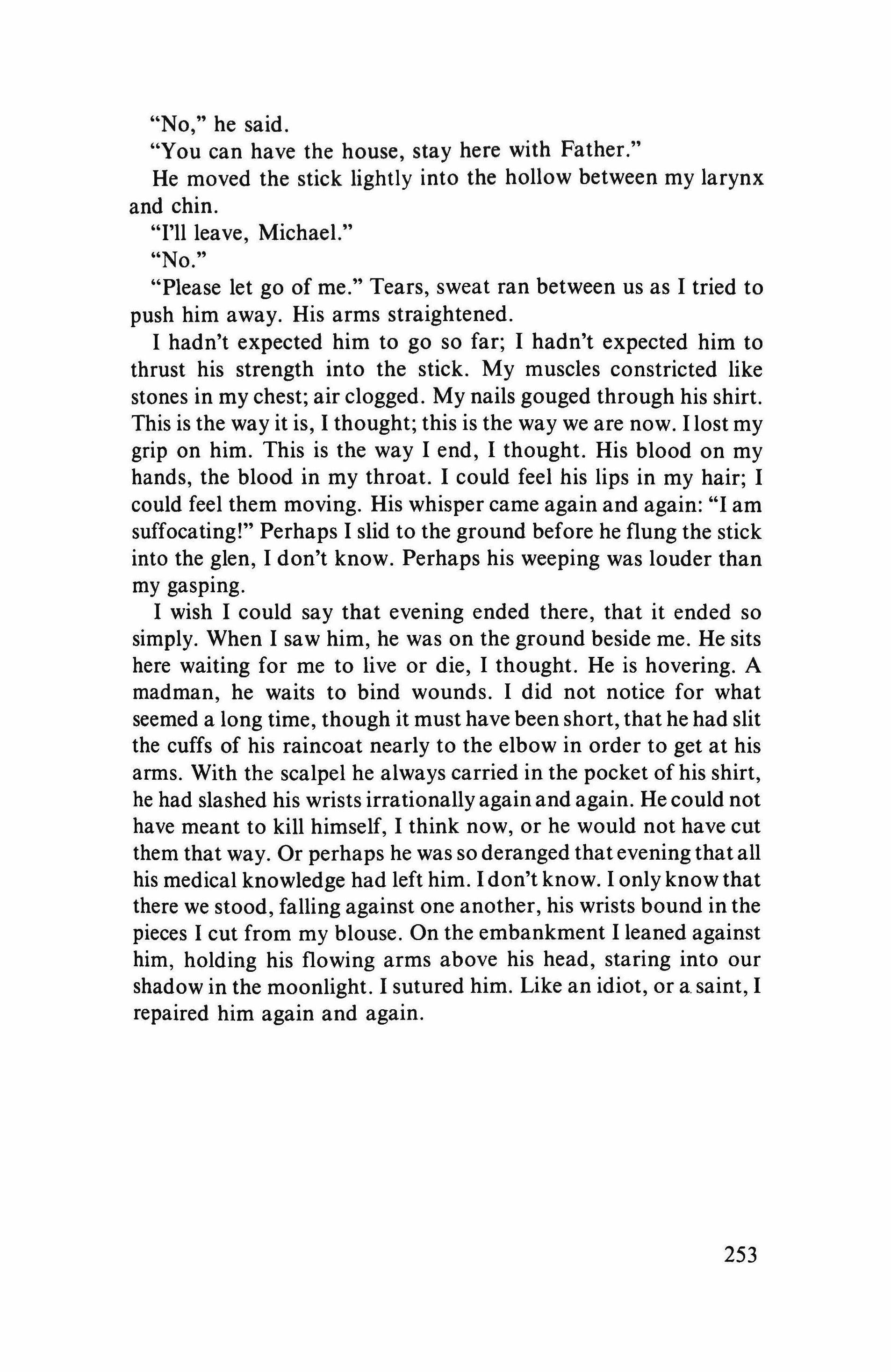
"No," he said.
"You can have the house, stay here with Father."
He moved the stick lightly into the hollow between my larynx and chin.
"I'll leave, Michael."
"No."
"Please let go of me." Tears, sweat ran between us as I tried to push him away. His arms straightened.
I hadn't expected him to go so far; I hadn't expected him to thrust his strength into the stick. My muscles constricted like stones in my chest; air clogged. My nails gouged through his shirt. This is the way it is, 1 thought; this is the way we are now. I lost my grip on him. This is the way I end, 1 thought. His blood on my hands, the blood in my throat. I could feel his lips in my hair; I could feel them moving. His whisper came again and again: "I am suffocating!" Perhaps 1 slid to the ground before he flung the stick into the glen, I don't know. Perhaps his weeping was louder than my gasping.
1 wish I could say that evening ended there, that it ended so simply. When 1 saw him, he was on the ground beside me. He sits here waiting for me to live or die, 1 thought. He is hovering. A madman, he waits to bind wounds. I did not notice for what seemed a long time, though it must have been short, that he had slit the cuffs of his raincoat nearly to the elbow in order to get at his arms. With the scalpel he always carried in the pocket of his shirt, he had slashed his wrists irrationally again and again. He could not have meant to kill himself, I think now, or he would not have cut them that way. Or perhaps he was so deranged thatevening that all his medical knowledge had left him. 1 don't know. I only know that there we stood, falling against one another, his wrists bound in the pieces I cut from my blouse. On the embankment 1 leaned against him, holding his flowing arms above his head, staring into our shadow in the moonlight. I sutured him. Like an idiot, or a. saint, I repaired him again and again.

"The hem's too deep. Now I can't decide whether to lengthen it or lower the rod. 1 want to get everything ready before winter sets in," Zara said, feathering her paintbrush into a gash in the puppet house.
Bridie removed a doughnut from her straw shopping bag. "You should have some little ones of your own, Zara," she said, thinking of her own two children, grown before Zara was born. Her thought paused, waiting for the tiny bite ofdoughnut to pass by. "There was a maxim my mother recited now and then when she would get to worrying about my sister, Dominica. A 'maximal maxim' was her phrase about women without young ones. I'm guessing it still applies."
"Bridie, let's not get onto that topic again."
"Zara, a good aphorism is something you can sit on all you like or you can draw it out from under you and prop yourself up on it when the way doesn't seem so straight. My own Mum used to say, 'A woman without children is like an oily rag."
"I didn't know you had a sister, Bridie." Zara took the screens from the side of the puppet house and stacked them in the shack.
"There are two things an oily rag can be expected to do, Zara. Ask your Michael O'Dea if an oiled rag can do more than wipe dust off a chiffonier."
"Bridie-" Zara interrupted, turning around to find Bridie McGehry right behind her. "I'm really not interested in this now."
"If you ask Michael, he'll tell you: they can cause freak fires. Spontaneous combustion, Zara, is no good way to hold a man. Good for rubbing on men's things-"
"Bridie!"
"And spontaneity."
Zara sat down on the top step in front of the little building and looked Bridie McGehry in the face. "You should be home dusting now yourself, but instead you're telling me how to live."
"Your head should be concerned about this, Zara. Michael skipped out at the clinic yesterday. Your father won't tell it to you, but 1 will. The word is, Michael didn't so much as call. Your father didn't have to establish Michael O'Dea as his partner."
"I know that very well, Bridie."
"You'll be wondering where he was, I know. Well, I certainly located him. Sitting at the beach he was, paring his toenails with a

carving knife. He scourges his toes while Forster doses all of them, his own patients and Michael's, too. There's no divining where your husband will be today, Zara."
"Michael has some problems now. I can't be responsible for someone else's actions." Zara began to paint again, hoping Mrs. McGehry would leave.
"I'm no relation to that man, Zara, but I was speaking to himjust the same. I waded out to that rock where he was perched. 'Michael O'Dea,' I said, 'the doctor is tending all your patients.'
'''So what?' he said. 'Forster will learn what medicine is all about."
Zara ran paint down the wall in frustration; Bridie McGehry kept on talking.
"'What's happened to you, Michael O'Dea?' I asked him. 'Are you a doctor, a part of this family? Or are you going to be some creeping worm now?'
"He said: 'Worms don't creep. As for me, I don't belong to any family, although I know some worms who'd be glad to have me.'
'''Michael O'Dea!' I said. 'How can you say such things with Zara for a wife and Forster as much a father to you as anyone could be?' Michael didn't say a word; he didn't even look at me, Zara."
Zara could picture Michael as Bridie said these words to him, as she gave him her advice.
"It isn't your fault, Zara, but you don't have to be putting up with Michael this way. You could make it right for him."
"Bridie, please," she said. "Children are not answers. Understand that."
She watched the old woman's retreat, the small spring of her buttocks beneath her autumn dress. Mrs. McGehry had barely gone half a block when Mabel Willoughby rushed by to catch her friend. "She could do something," Zara heard Mabel say. In the little theater, Zara put her head down on the stage and cried. Children were not an answer.
Madeline is waving her sneakers like fans. "I have hyacinth and marigolds in the spring. Before the snow is gone, the crocuses stick their little heads up."
Today I have brought his violin. It rests on his lap. Down the hall someone pounds the piano in the sun room.

Madeline shifts one eye. "The doctor doesn't want to talk to you."
"I need the doctor's advice on a very personal matter. Can't you understand that? Personal. Very serious, Madeline."
"Well, excuse me," she says, snapping her gray head against the cushion. The cross springs crimson into a shaft of broken light from the window. "You're one of Dr. O'Dea's patients. Why didn't you say so?"
"That's right, Madeline."
"Well," she says in a huff. "You could at least go into the proper exam room." Madeline extends her arms like a child pretending to sleepwalk and proceeds across the lounge. 1 hear the woman introducing herself.
And for those who sit And wait.
What can they do?
Sneaking in this way to A void, trying to play both parts. Life is reciprocal. Without the ear, What good the voice? Words spring Unchecked. Turn.
Implode our hearts.
I center your chair before the window and pull another up beside you. "Did you have breakfast, Michael?" 1 ask you softly. I hold your cold, motionless fingers. In your eyes-gone pale with what are your emotions? how could I know them?-I see the day they took you. Cornered in our room, swinging a statue like a censer, crying out for a tiny nun who taught you piano, crying out one word: "Mama!" And again. Your word without a face, with all faces, as you smashed terror through the windows, as the attendants -men in white, in blue with badges-pursued. You flew around the room like a bird trapped behind a pane. "Mama!" I cry it, too. We all cry it. You smashed out all the windows; you would have fallen with your plaster statue, too, if we had let you.
"We've got him now. Don't worry, Dr. Montgomery; we've got him." Father threw his bulk around the room, standing in the doorway. You did not see him, your eyes gone remote even then, while I stood weeping, watching your long limbs pinned to the floor. Sweetheart. Spider.
Now I sit. I hold your hands, your memories-what I know of
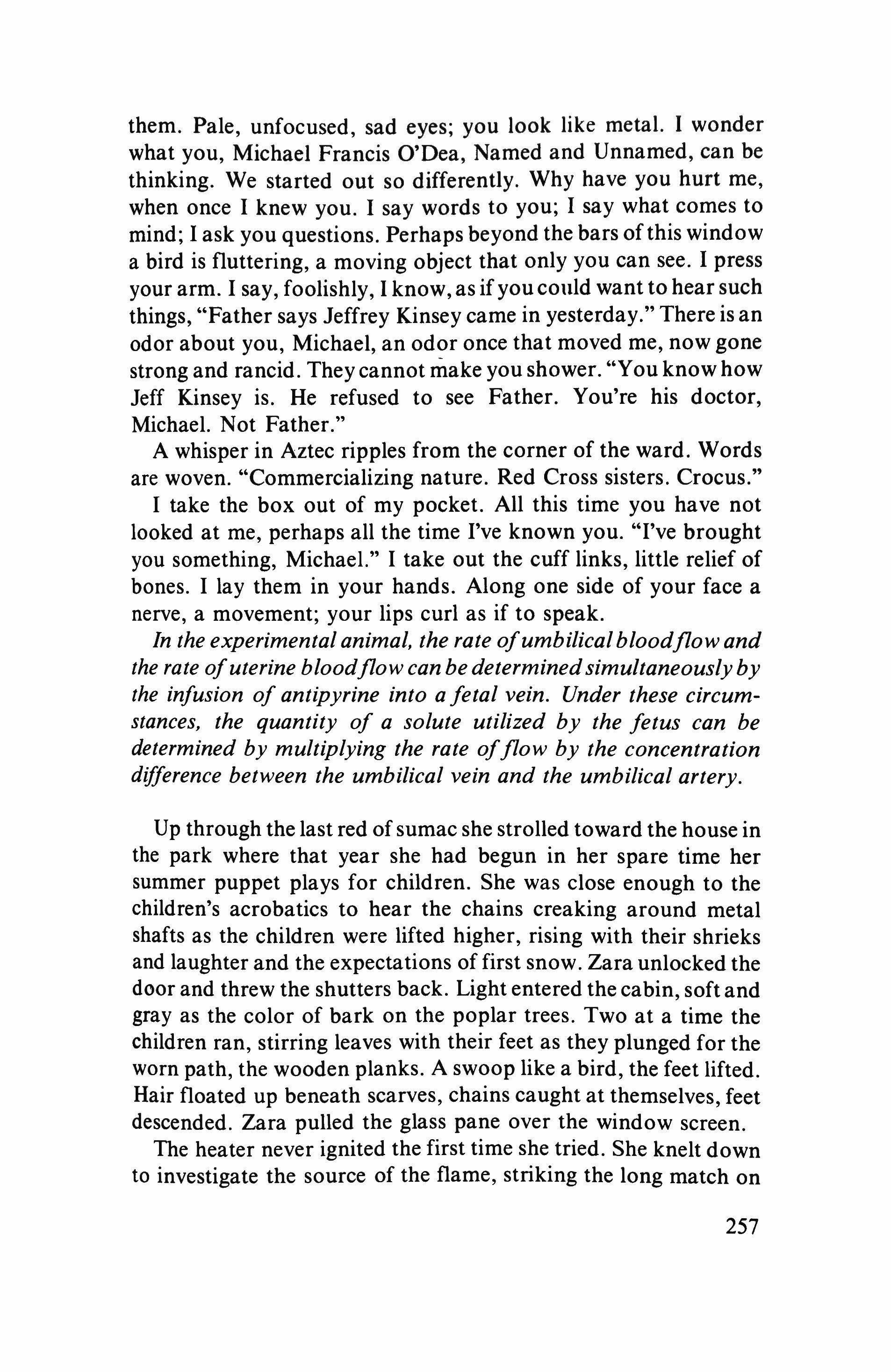
them. Pale, unfocused, sad eyes; you look like metal. I wonder what you, Michael Francis O'Dea, Named and Unnamed, can be thinking. We started out so differently. Why have you hurt me, when once I knew you. I say words to you; I say what comes to mind; I ask you questions. Perhaps beyond the bars ofthis window a bird is fluttering, a moving object that only you can see. I press your arm. I say, foolishly, I know,as ifyou could want to hear such things, "Father says Jeffrey Kinsey came in yesterday." There is an odor about you, Michael, an odor once that moved me, now gone strong and rancid. They cannot make you shower. "You know how Jeff Kinsey is. He refused to see Father. You're his doctor, Michael. Not Father."
A whisper in Aztec ripples from the corner of the ward. Words are woven. "Commercializing nature. Red Cross sisters. Crocus."
I take the box out of my pocket. All this time you have not looked at me, perhaps all the time I've known you. "I've brought you something, Michael." I take out the cuff links, little relief of bones. I lay them in your hands. Along one side of your face a nerve, a movement; your lips curl as if to speak.
In the experimentalanimal, the rate ofumbilicalbloodflow and the rate ofuterine bloodflow can be determinedsimultaneouslyby the infusion of antipyrine into a fetal vein. Under these circumstances, the quantity of a solute utilized by the fetus can be determined by multiplying the rate offlow by the concentration difference between the umbilical vein and the umbilical artery.
Up through the last red of sumac she strolled toward the house in the park where that year she had begun in her spare time her summer puppet plays for children. She was close enough to the children's acrobatics to hear the chains creaking around metal shafts as the children were lifted higher, rising with their shrieks and laughter and the expectations of first snow. Zara unlocked the door and threw the shutters back. Light entered the cabin, soft and gray as the color of bark on the poplar trees. Two at a time the children ran, stirring leaves with their feet as they plunged for the worn path, the wooden planks. A swoop like a bird, the feet lifted. Hair floated up beneath scarves, chains caught at themselves, feet descended. Zara pulled the glass pane over the window screen. The heater never ignited the first time she tried. She knelt down to investigate the source of the flame, striking the long match on

the brick floor, holding it inside the metal tunnel as she turned the fuel on. There was something of comfort in the whoosh a stove made before the heat could possibly have helped, in the smell of dust burning away.
She hung her coat on the nail by the door and filled the percolator, plugged it in, listening to it ping as the wedges of her chair rocked over stone and the leather of her boots bent at the ankles. They, too, creaked as she rocked toward the footstool, her head back against the oak, sifting the air for the smell ofcoffee and autumn and the scent of rusted metal in small, sweaty palms. She went out to them.
"Miss Zara, Miss Zara," they called as they ran to grab on around her thighs and knees. In a circle, whirling together, they turned her as they ran, as if she, Zara Montgomery, were the center of their collective lives. She put her hands on their knitted red caps, the brown ones with synthetic fur flaps for the ears, her fingers brushing against cold cheeks. "Miss Zara." Her skirt wound around her. They turned, twisting into the wind.
"What did you say?" she laughed.
"Could we see the puppets, please?" Under one palm a child's crown, the size of a melon in thick purple worsted, balanced her as they moved. "See the puppets?" she laughed. "I can't see a thing."
"Promise," they whined now, growing ecstatic with each revolution. Branches, the joists of the swing whirled into gray sky, the grass gone gray with leaves.
"Of course you can." They stopped, waiting for the world to stabilize. On each side they supported her, asking now a kiss for this child, another for that. "A minute, a minute," she pleaded. She bent toward them. Lips moved over her face like leaves.
"The puppets, the puppets," they called, their voices rising like the chatter of birds as they called out for their favorite performers.
"Shhh," she said. "Quiet now, or you won't have anything." Ina bunch they led the way, pulling her along, the wind catching at coats and scarves, at her dress and hair. They crowded against the door. "Move aside now. How will we all get in?" She put her hand on the knob and turned to them. "No talking and carrying on," she said.
Twelve Saturday playmates sprawled on the floor in front ofthe heater-arms and legs bent at angles, feet protruding onto the rug. Coats and mittens, piled in a heap, were propped behind the others
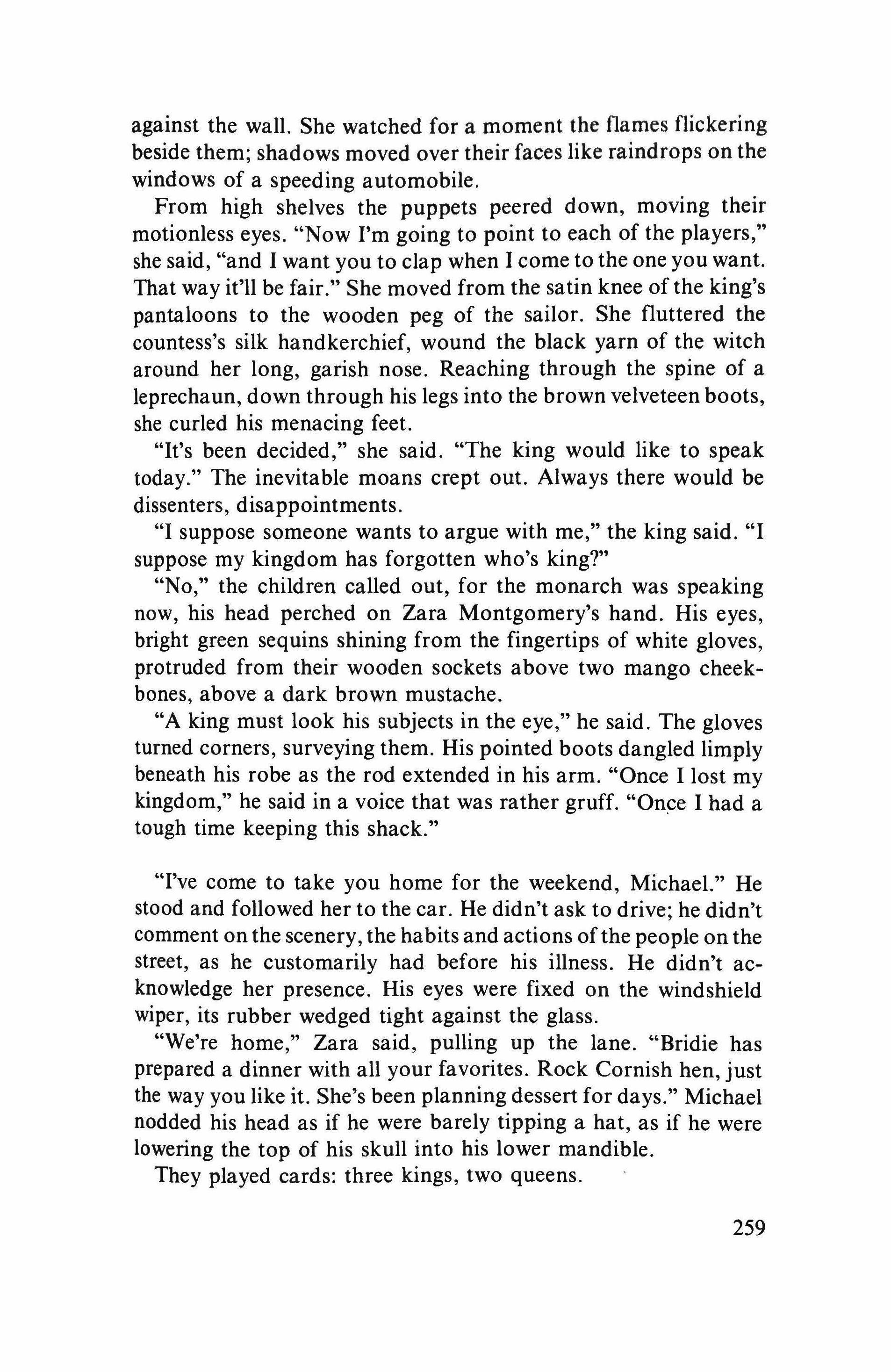
against the wall. She watched for a moment the flames flickering beside them; shadows moved over their faces like raindrops on the windows of a speeding automobile.
From high shelves the puppets peered down, moving their motionless eyes. "Now I'm going to point to each of the players," she said, "and 1 want you to clap when 1 come to the one you want. That way it'll be fair." She moved from the satin knee of the king's pantaloons to the wooden peg of the sailor. She fluttered the countess's silk handkerchief, wound the black yarn of the witch around her long, garish nose. Reaching through the spine of a leprechaun, down through his legs into the brown velveteen boots, she curled his menacing feet.
"It's been decided," she said. "The king would like to speak today." The inevitable moans crept out. Always there would be dissenters, disappointments.
"1 suppose someone wants to argue with me," the king said. "1 suppose my kingdom has forgotten who's king?"
"No," the children called out, for the monarch was speaking now, his head perched on Zara Montgomery's hand. His eyes, bright green sequins shining from the fingertips of white gloves, protruded from their wooden sockets above two mango cheekbones, above a dark brown mustache.
"A king must look his subjects in the eye," he said. The gloves turned corners, surveying them. His pointed boots dangled limply beneath his robe as the rod extended in his arm. "Once 1 lost my kingdom," he said in a voice that was rather gruff. "Once 1 had a tough time keeping this shack."
"I've come to take you home for the weekend, Michael." He stood and followed her to the car. He didn't ask to drive; he didn't comment on the scenery, the habits and actions ofthe people on the street, as he customarily had before his illness. He didn't acknowledge her presence. His eyes were fixed on the windshield wiper, its rubber wedged tight against the glass.
"We're home," Zara said, pulling up the lane. "Bridie has prepared a dinner with all your favorites. Rock Cornish hen, just the way you like it. She's been planning dessert for days." Michael nodded his head as if he were barely tipping a hat, as if he were lowering the top of his skull into his lower mandible. They played cards: three kings, two queens.
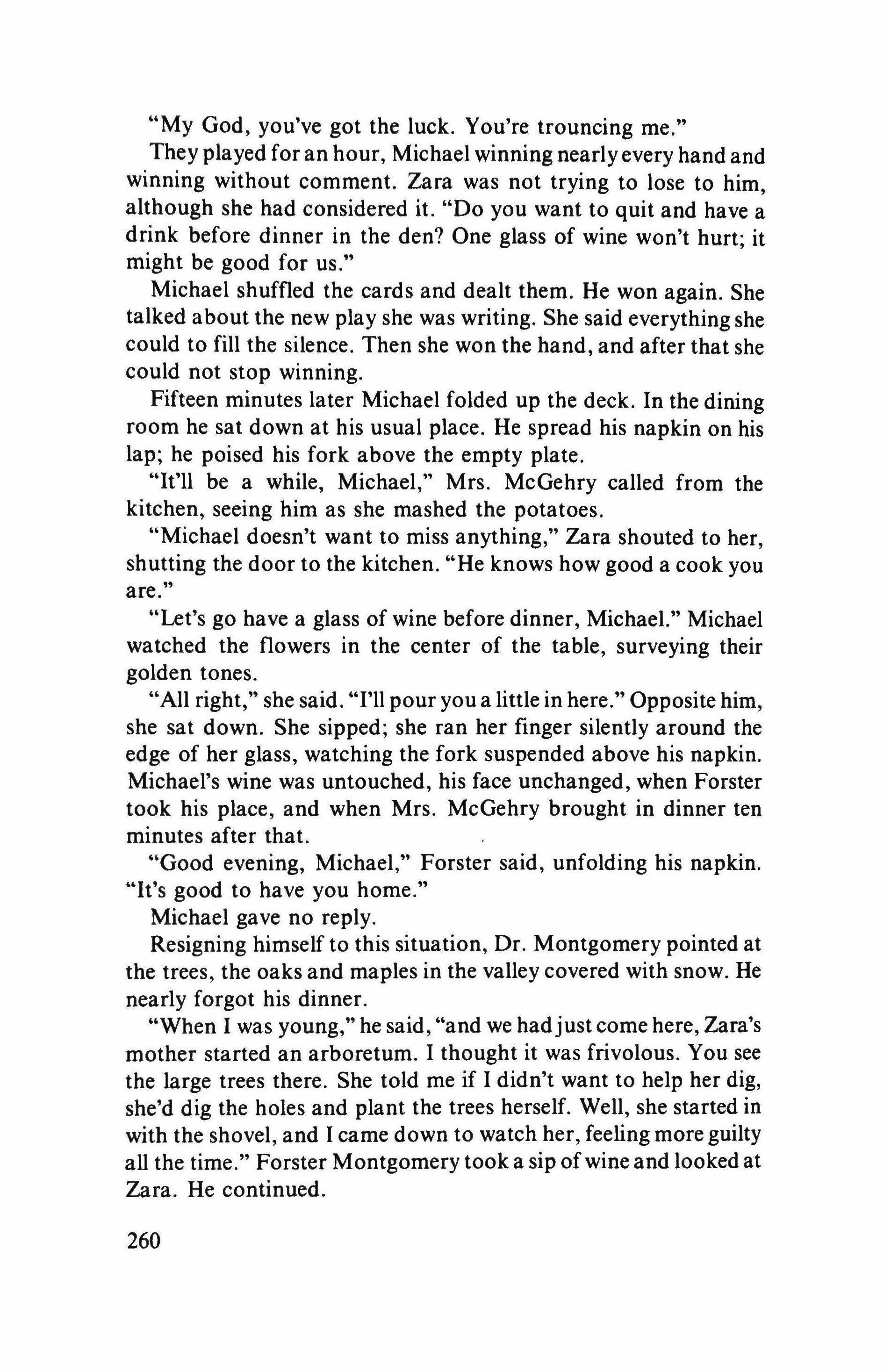
"My God, you've got the luck. You're trouncing me."
They played for an hour, Michael winning nearly every hand and winning without comment. Zara was not trying to lose to him, although she had considered it. "Do you want to quit and have a drink before dinner in the den? One glass of wine won't hurt; it might be good for us."
Michael shuffled the cards and dealt them. He won again. She talked about the new play she was writing. She said everything she could to fill the silence. Then she won the hand, and after that she could not stop winning.
Fifteen minutes later Michael folded up the deck. In the dining room he sat down at his usual place. He spread his napkin on his lap; he poised his fork above the empty plate.
"It'll be a while, Michael," Mrs. McGehry called from the kitchen, seeing him as she mashed the potatoes.
"Michael doesn't want to miss anything," Zara shouted to her, shutting the door to the kitchen. "He knows how good a cook you are."
"Let's go have a glass of wine before dinner, Michael." Michael watched the flowers in the center of the table, surveying their golden tones.
"All right," she said. "I'll pour you a little in here." Opposite him, she sat down. She sipped; she ran her finger silently around the edge of her glass, watching the fork suspended above his napkin. Michael's wine was untouched, his face unchanged, when Forster took his place, and when Mrs. McGehry brought in dinner ten minutes after that.
"Good evening, Michael," Forster said, unfolding his napkin. "It's good to have you home."
Michael gave no reply.
Resigning himself to this situation, Dr. Montgomery pointed at the trees, the oaks and maples in the valley covered with snow. He nearly forgot his dinner.
"When I was young," he said, "and we had just come here, Zara's mother started an arboretum. I thought it was frivolous. You see the large trees there. She told me if I didn't want to help her dig, she'd dig the holes and plant the trees herself. Well, she started in with the shovel, and I came down to watch her, feeling more guilty all the time." Forster Montgomery took a sip ofwine and looked at Zara. He continued.

"1 told her I'd rather have tennis courts. I remember exactly what she said then. 'That is bloomin' folly, Forster.' That was how she said it.
"'Maybe it is,' I said, 'and maybe it isn't. All the same, I want one.'
"'Forget it,' she said, 'and get a shovel.' So 1 did. And there they are, beautiful trees, I bought a new hammock for the summer, Michael. You'll have to try it."
Michael sighed through his nostrils, lips sealed. "Those beeches, too?" Zara quickly interjected.
"Yes, of course, that whole area. She had the entire living room filled with them when we started. I had to help herjust to get some walking space in the house. And when we finished she said I'd done it all for myself and I should be glad ofit. 'Of course not,' 1 told her. 'I did it all for you, Katie. I'd do anything for you.'
'''Sure thing, Forster,' she said. 'Now let's have dinner.' Three weeks later was my birthday. 'Let's go for a walk in the arboretum,' she said. And so we walked through all those sticks she called trees."
As Zara looked toward the window where her father was pointing, she caught sight of a cold, hard face staring at her. "Michael, would you like the salt and pepper? 1 didn't mean to horde them." She held the shakers out to him, but he lowered his attention, pushing his fork around his plate. "Go on now, Daddy. You were walking in Mummie's woods."
Briefly Forster glanced at Michael. "Is everything all right, Michael?" Michael would not look up from his potatoes. "So anyway," Forster said, slicing quietly through the butter, "there were hardly any leaves at all; I thought it was quite unimpressive. Then she was proposing pine trees. 'Jesus, Katie,' I said. 'We already have pines; we have every conceivable kind of tree. What do you want to plant pines for?" Forster Montgomery's eyes shifted toward his son-in-law. "I'll never forget her sitting on that rock. She was already in her fourth month and she had on some sort of yellow frock."
"Fourth month?" Zara asked. "Was she big?"
"No! But that's the point. The bigger she got with you, the more plants she had to start. She was obsessed. Seeds and sproutlings." Forster pulled some tender dark meat from the hen and chewed awhile, smiling out onto the terraces that swept down the wooded

land toward the lake. He took a few bites, recalled himself then, and continued. '''Now don't just walk over there without thinking about pines,' she said to me. 'You have to imagine pines all the way over to the far lot and back. Think you can do that?'
"'I guess I probably can.' 1 said. 'I guess I won't like it much, though.'
"'You'll like it all right,' she said. 'Just think pines. Listen for the needles crunching under your feet; they'll feel like cushions.'
"An impossible woman, I thought. All these crazy projects. But when 1 reached the top of the hill over there and looked down onto the meadow, I saw it. She had our tennis court laid. Clay,justlike 1 wanted. She was- coming over the hill behind me carrying the net and the rackets. And I'll be damned if she didn't insist on playing. She beat me worse than I've ever been beaten in my life."
Michael had eaten everything but his mashed potatoes. He put down his fork at the conclusion of Dr. Montgomery's recollections, brushing the wineglass with his sleeve. Togetherthey watched it spill. They watched the pool grow wider, creeping like a flood of embarrassment, running under his plate. Michael pressed his thumb into the center of it, the wine circling like a meniscus at the top of a test tube. He licked the droplet from his finger, smiling, obviously pleased.
"I'll get a cloth," Zara said. She came back to wipe the area around him. His forearm rested against the table edge. "Michael, could you please move your arm?"
Forster watched his son-in-law sitting there. He waited. "Michael, it would be nice if you would move your arm for Zara." Zara picked up his arm, wiping under it; she sponged his shirt and set his arm onto its place. When she sat down again, Forster Montgomery was glaring at his son by marriage, Michael staring back.
"There's applecake, Father," she said.
"Yes," he said. "I suppose there is."
Michael sank his fork into the potatoes on his plate. Swiftly then he raised them with his utensil, flicking them like an insect across the room, hitting his wife on the cheek.
That evening Zara found him sitting on the edge of the bed, holding his hardened self in his hands, tears running down his face. She sang to him.

Gute Nacht, gute Nacht, bis alles wacht, Gute Nacht, gute Nacht, bis alles wacht. Schlaf aus dein Freude, schlaf aus dein Leid Der Vo/lmond steigt, der Nebel weicht, Der Vollmond steigt, der Nebel weicht, Und der Himmel da oben, wie ist erso weit. Und der Himmel da oben. wie ist erso weit.
"You'll be better soon, Michael," she said, wrapping her legs around him in sympathy. "You'll see, darling. You'll see."
Alice, her father's nurse, rushed by with a large syringe. "Alfred Winter broke his wrist. Hear him scream?" Alice cocked her ear toward the door as she went in. The child, yelping his apprehension when he saw the needle-, forgot his pain.
Zara felt she didn't need to take the test to know, but she took the bottle and the blue plastic testing plate from the laboratory shelf. In the women's room she added her urine to the solutions. Two times Michael had come home from the hospital on passes. Two times Zara had felt his warmth, the signs of his improvement. Slowly she moved the plate back and forth. Always there had been the joke of the baby born juggling an IUD in its hands and a great deal of laughter in its throat. She hadn't planned this.
The control remained the same as she swirled the plate. The other turned white, coagulated to confirm her suspicions, to confirm the opposite irrepressible hope.
Just after she had replaced the bottle, Alice popped out again. "Hey, Zara," she said, "will you help us with this kid? I can't ask his father; he's already passed out once." Alice gestured toward the waiting room. "Sedated."
Forster Montgomery checked the X rays on the viewer again and told Alfred to be quiet. The boy wasn't feeling anything-he had made sure of that. Zara and Alice took the elbow while Forster pulled at the wrist. "Quite a break you've got there, Alfred. Tell Zara how you fell off your new electric motor scooter." Alice rolled her eyes; the child was only eight.
Alfred was pouting while they tried to align his bones. His arm was red from their manipulations, rubbery from the anesthetic. Dark hair fringed his sullen face. To Zara, his eyes resembled Michael's.
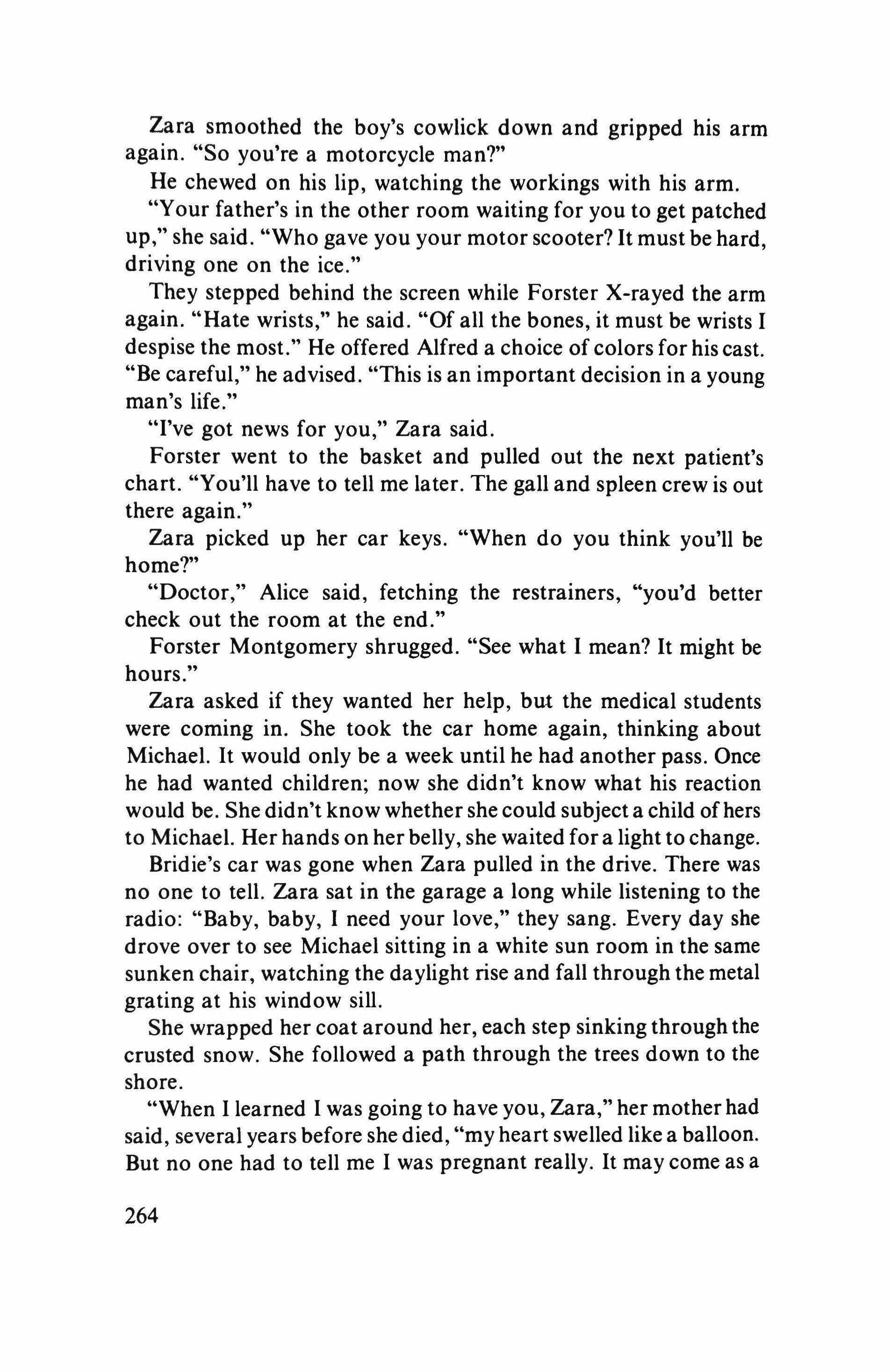
Zara smoothed the boy's cowlick down and gripped his arm again. "So you're a motorcycle man?"
He chewed on his lip, watching the workings with his arm.
"Your father's in the other room waiting for you to get patched up," she said. "Who gave you your motor scooter? It must be hard, driving one on the ice."
They stepped behind the screen while Forster X-rayed the arm again. "Hate wrists," he said. "Of all the bones, it must be wrists I despise the most." He offered Alfred a choice of colors for his cast. "Be careful," he advised. "This is an important decision in a young man's life."
"I've got news for you," Zara said.
Forster went to the basket and pulled out the next patient's chart. "You'll have to tell me later. The gall and spleen crew is out there again."
Zara picked up her car keys. "When do you think you'll be home?"
"Doctor," Alice said, fetching the restrainers, "you'd better check out the room at the end."
Forster Montgomery shrugged. "See what I mean? It might be hours."
Zara asked if they wanted her help, but the medical students were coming in. She took the car home again, thinking about Michael. It would only be a week until he had another pass. Once he had wanted children; now she didn't know what his reaction would be. She didn't know whether she could subject a child ofhers to Michael. Her hands on her belly, she waited for a light to change.
Bridie's car was gone when Zara pulled in the drive. There was no one to tell. Zara sat in the garage a long while listening to the radio: "Baby, baby, I need your love," they sang. Every day she drove over to see Michael sitting in a white sun room in the same sunken chair, watching the daylight rise and fall through the metal grating at his window sill.
She wrapped her coat around her, each step sinking through the crusted snow. She followed a path through the trees down to the shore.
"When I learned I was going to have you, Zara," her mother had said, several years before she died, "my heart swelled like a balloon. But no one had to tell me I was pregnant really. It may come as a
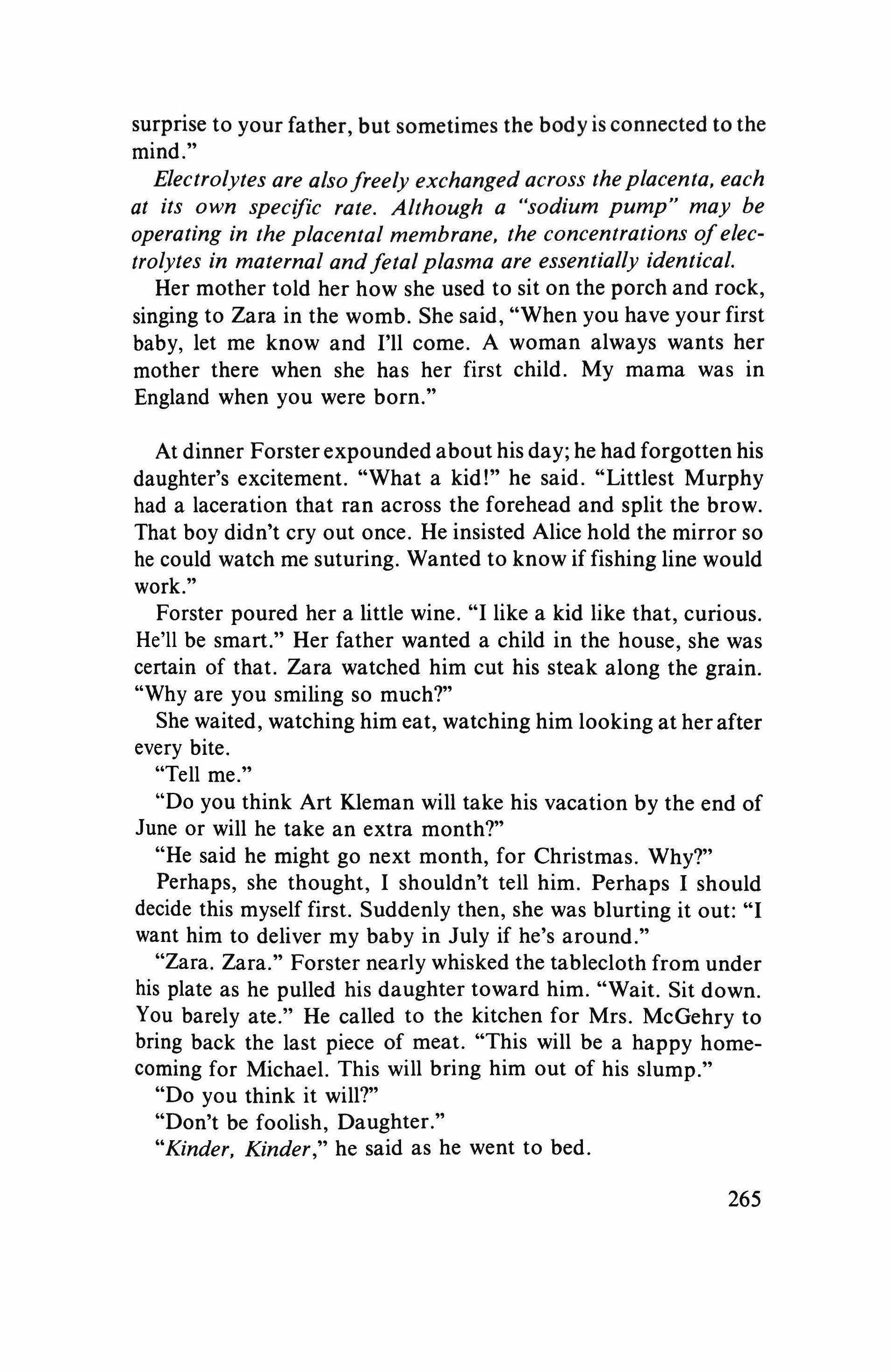
surprise to your father, but sometimes the body is connected to the mind."
Electrolytes are alsofreely exchanged across theplacenta, each at its own specific rate. Although a "sodium pump" may be operating in the placental membrane, the concentrations ofelectrolytes in maternal andfetalplasma are essentially identical.
Her mother told her how she used to sit on the porch and rock, singing to Zara in the womb. She said, "When you have your first baby, let me know and I'll come. A woman always wants her mother there when she has her first child. My mama was in England when you were born."
At dinner Forster expounded about his day; he had forgotten his daughter's excitement. "What a kid!" he said. "Littlest Murphy had a laceration that ran across the forehead and split the brow. That boy didn't cry out once. He insisted Alice hold the mirror so he could watch me suturing. Wanted to know if fishing line would work."
Forster poured her a little wine. "I like a kid like that, curious. He'll be smart." Her father wanted a child in the house, she was certain of that. Zara watched him cut his steak along the grain. "Why are you smiling so much?"
She waited, watching him eat, watching him looking at her after every bite.
"Tell me."
"Do you think Art Kleman will take his vacation by the end of June or will he take an extra month?"
"He said he might go next month, for Christmas. Why?"
Perhaps, she thought, 1 shouldn't tell him. Perhaps 1 should decide this myself first. Suddenly then, she was blurting it out: "I want him to deliver my baby in July if he's around."
"Zara. Zara." Forster nearly whisked the tablecloth from under his plate as he pulled his daughter toward him. "Wait. Sit down. You barely ate." He called to the kitchen for Mrs. McGehry to bring back the last piece of meat. "This will be a happy homecoming for Michael. This will bring him out of his slump."
"Do you think it will?"
"Don't be foolish, Daughter."
"Kinder, Kinder," he said as he went to bed.
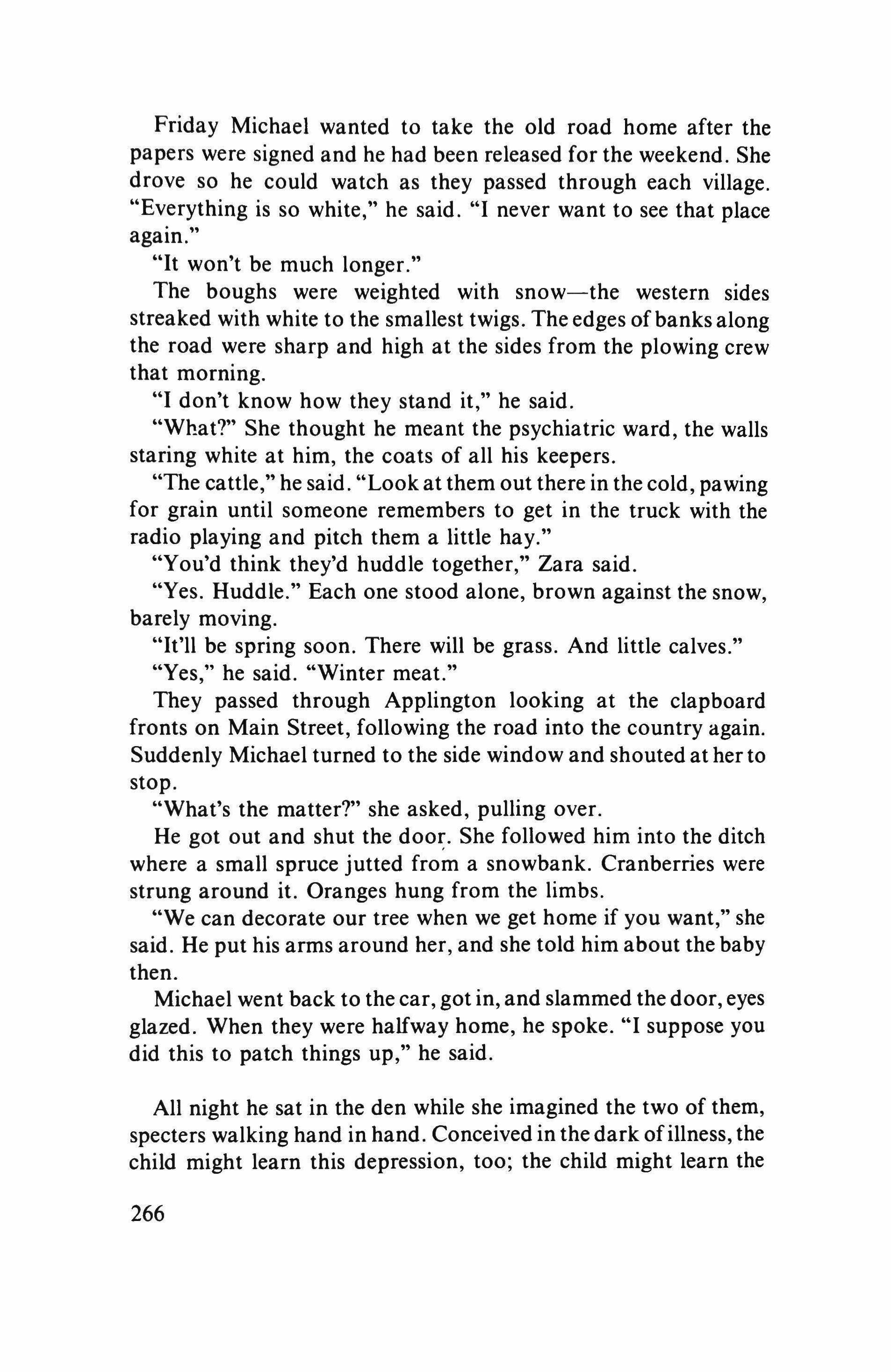
Friday Michael wanted to take the old road home after the papers were signed and he had been released for the weekend. She drove so he could watch as they passed through each village. "Everything is so white," he said. "I never want to see that place again."
"It won't be much longer."
The boughs were weighted with snow-the western sides streaked with white to the smallest twigs. The edges of banks along the road were sharp and high at the sides from the plowing crew that morning.
"I don't know how they stand it," he said.
"What?" She thought he meant the psychiatric ward, the walls staring white at him, the coats of all his keepers.
"The cattle," he said. "Look at them out there in the cold, pawing for grain until someone remembers to get in the truck with the radio playing and pitch them a little hay."
"You'd think they'd huddle together," Zara said.
"Yes. Huddle." Each one stood alone, brown against the snow, barely moving.
"It'll be spring soon. There will be grass. And little calves."
"Yes," he said. "Winter meat."
They passed through Applington looking at the clapboard fronts on Main Street, following the road into the country again. Suddenly Michael turned to the side window and shouted at her to stop.
"What's the matter?" she asked, pulling over.
He got out and shut the door. She followed him into the ditch where a small spruce jutted from a snowbank. Cranberries were strung around it. Oranges hung from the limbs.
"We can decorate our tree when we get home if you want," she said. He put his arms around her, and she told him about the baby then.
Michael went back to the car, got in, and slammed the door, eyes glazed. When they were halfway home, he spoke. "I suppose you did this to patch things up," he said.
All night he sat in the den while she imagined the two of them, specters walking hand in hand. Conceived in the dark ofillness, the child might learn this depression, too; the child might learn the

small perversions, the erratic wrath of father to child, of a father to a mother. She asked herself, is it fair to the child to do this? She dozed and woke and dozed again. A shutter that did not bang haunted her in the night. A rush of wind, a claw oftangled brush at the windowpane. She reached across the bed. Old man, old man, the shutters are loose again. They bang; they pound against the house, old man. The sheet was cold under her hand. All were gone. Michael, Mother, all the rest, gone to death or indifference or insanity.
Her father came peeking to see why that night Michael sat alone in the den, why Zara was in bed, why Michael and Zara were not with him at his midnight ritual of nog and crackers. "Zee," he said. "Would you like to talk?"
"No." The answer was clipped in her throat; she rephrased and softened it in her mind.
Forster pulled the quilt up an inch to cover her shoulders; he tucked the blanket at the mattress edge. "If you change your mind, you roust me out. No-" he said, "lean on the buzzer. You know me. This old character revs much better by remote control." Awkwardly he chuckled and shifted his weight under his nightshirt, looking at wires that had crept across the floor since his wife was ill.
Zara reassured him; she forced a smile. She told him half of it: "Michael can't sleep and he won't talk to me."
"Have you told him about the baby?"
Zara lied to him again.
"Well, you tell him about the baby. That will make him happy. He'll sleep fine."
"I want to wait."
"Don't wait too long. If you need to talk, just wake me up."
When he was gone, she reconsidered, called his name. In the room two doors down, he snored-a whispered current, followed by a puff of wind.
Two years before, Zara was waiting for Michael at the clinic when Victoria Williams came in hemorrhaging. Tori was six months pregnant. Together they packed her vagina with gauze and sent for the ambulance. Her wailing echoed from room to room; it stopped up the silence after each sudden gasp for air. "Victoria," 267
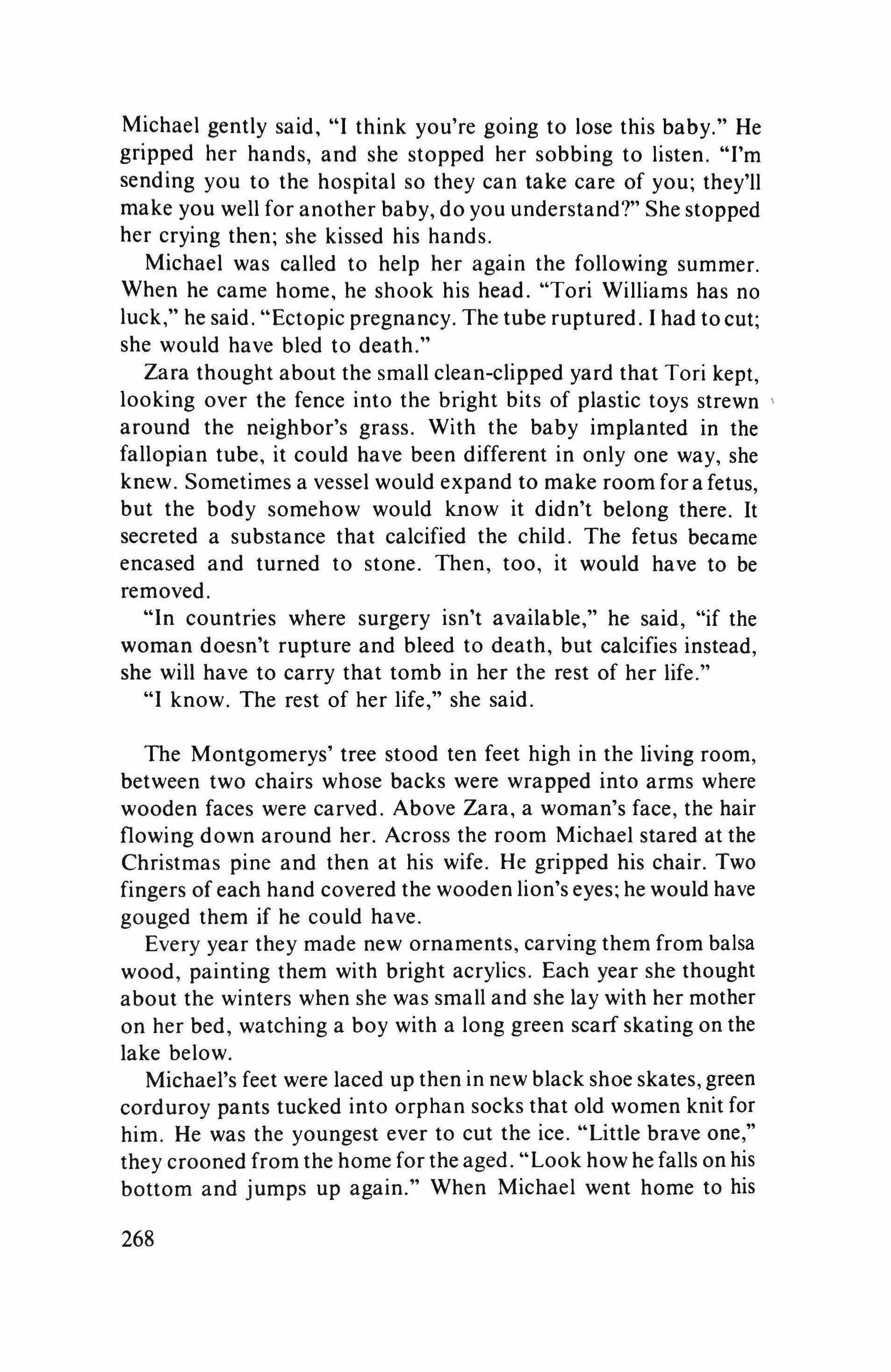
Michael gently said, "I think you're going to lose this baby." He gripped her hands, and she stopped her sobbing to listen. "I'm sending you to the hospital so they can take care of you; they'll make you well for another baby, do you understand?" She stopped her crying then; she kissed his hands.
Michael was called to help her again the following summer. When he came home, he shook his head. "Tori Williams has no luck," he said. "Ectopic pregnancy. The tube ruptured. I had to cut; she would have bled to death."
Zara thought about the small clean-clipped yard that Tori kept, looking over the fence into the bright bits of plastic toys strewn \ around the neighbor's grass. With the baby implanted in the fallopian tube, it could have been different in only one way, she knew. Sometimes a vessel would expand to make room for a fetus, but the body somehow would know it didn't belong there. It secreted a substance that calcified the child. The fetus became encased and turned to stone. Then, too, it would have to be removed.
"In countries where surgery isn't available," he said, "if the woman doesn't rupture and bleed to death, but calcifies instead, she will have to carry that tomb in her the rest of her life."
··1 know. The rest of her life," she said.
The Montgomerys' tree stood ten feet high in the living room, between two chairs whose backs were wrapped into arms where wooden faces were carved. Above Zara, a woman's face, the hair flowing down around her. Across the room Michael stared at the Christmas pine and then at his wife. He gripped his chair. Two fingers of each hand covered the wooden lion's eyes; he would have gouged them if he could have.
Every year they made new ornaments, carving them from balsa wood, painting them with bright acrylics. Each year she thought about the winters when she was small and she lay with her mother on her bed, watching a boy with a long green scarf skating on the lake below.
Michael's feet were laced up then in new black shoe skates, green corduroy pants tucked into orphan socks that old women knit for him. He was the youngest ever to cut the ice. "Little brave one," they crooned from the home for the aged. "Look how he falls on his bottom and jumps up again." When Michael went home to his

latest foster home, they sat down to knit for him. In the morning, when his ice etching flamed in the early sun, the women stood and read his message:
"Michael," the women said, "is a priceless child."
During one holiday season, Zara got a fleck of paint on the carpet; there was still a streak of blue at the carpet edge. "Don't hang that ornament," Michael said before it happened. "It's still wet."
"I'll be careful," she said, and then the bough bent and the bell dropped of its own accord.
"Let's start on the tree," she was saying to him now.
"Go ahead," he said. "While you're at it, hang up the little fetus."
She takes a wooden figure from the bench. Each arm and leg dangles in two parts,joined together at knees and elbows with bits of wire. On the puppet's chest she carves two fully rounded breasts. "You look just like your mother," Mrs. McGehry often said. It wasn't so. English Mother. Lost and romantic Mother. Dead Kathryn. The mother's old Victrola plays: the bright sheen of the mirror-like waters Swanlike is floating the wavering boat. Gently along on those glittering waters, Glideth our spirit away like a boat.
There were differences. The mirror tells her how to elevate the cheekbones with the blade. It tells her to paint the eyes a lighter blue. Between the legs she spreads a bit of mucilage; holding the scissors in one hand, she examines her own hair for a softer, darker strand. She cuts a curl and glues it between the doll's smooth thighs.
At the corner of her bench sits a box of curios, a Christmas gift from her father. In this box lies a darning egg. Herjigsaw has cut it top to bottom, straight through. And on the oval back of this egg she has nailed a metal hook. Someday she could place a peg in the belly of the puppet Zara and attach this rounded piece. Someday she could take a cloth and polish the design she has painted on its crest: the reds and blues of the large fetal head and curling spine, the yellow painted cord.
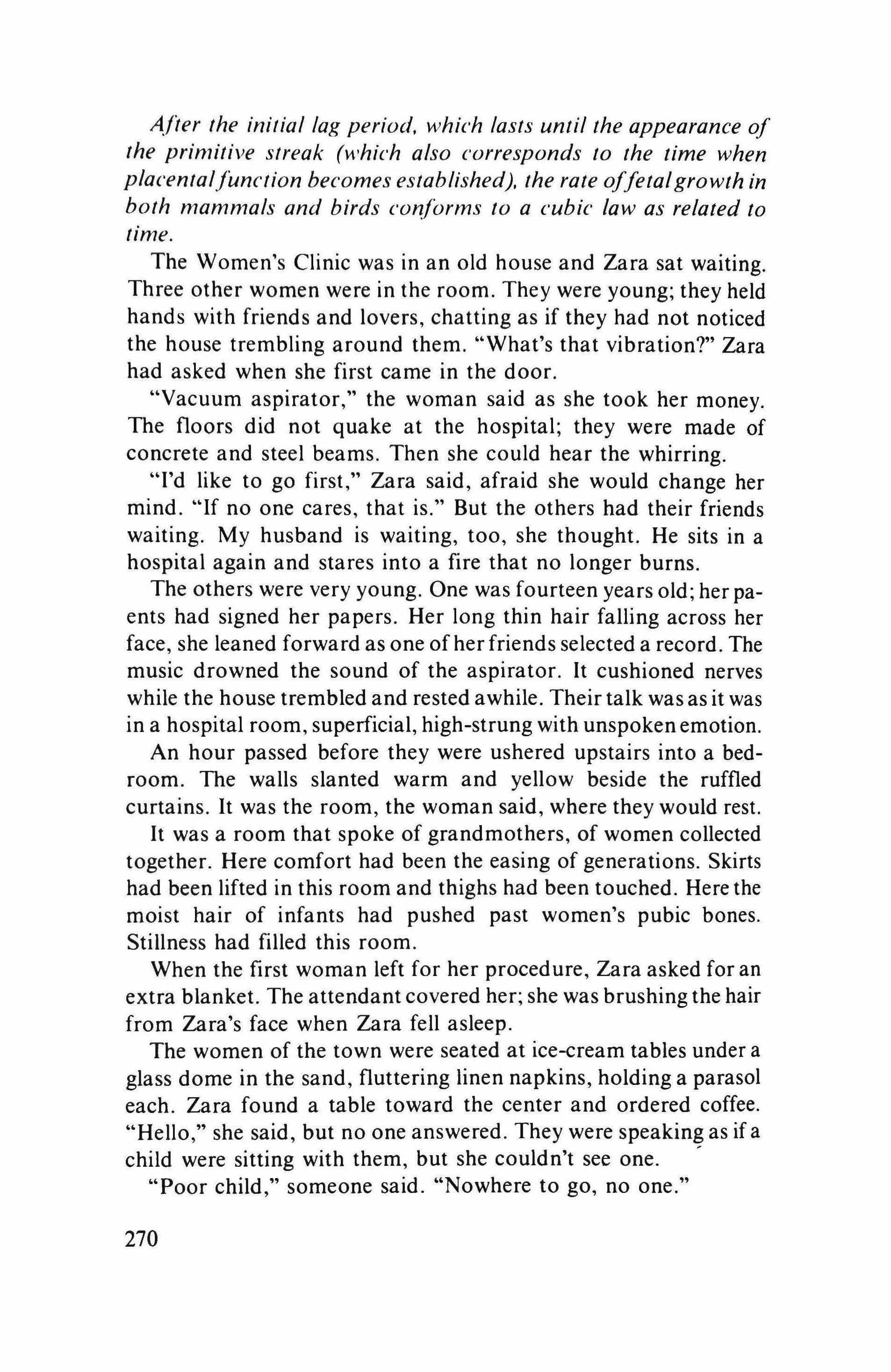
After the initial lag period, which lasts until the appearance of the primitive streak (which also corresponds to the time when placentalfunction becomes established), the rate offetalgrowth in both mammals and birds conforms to a cubic law as related to time.
The Women's Clinic was in an old house and Zara sat waiting. Three other women were in the room. They were young; they held hands with friends and lovers, chatting as if they had not noticed the house trembling around them. "What's that vibration?" Zara had asked when she first came in the door.
"Vacuum aspirator," the woman said as she took her money. The floors did not quake at the hospital; they were made of concrete and steel beams. Then she could hear the whirring.
"I'd like to go first," Zara said, afraid she would change her mind. "If no one cares, that is." But the others had their friends waiting. My husband is waiting, too, she thought. He sits in a hospital again and stares into a fire that no longer burns.
The others were very young. One was fourteen years old; her paents had signed her papers. Her long thin hair falling across her face, she leaned forward as one of her friends selected a record. The music drowned the sound of the aspirator. It cushioned nerves while the house trembled and rested awhile. Their talk was as it was in a hospital room, superficial, high-strung with unspoken emotion.
An hour passed before they were ushered upstairs into a bedroom. The walls slanted warm and yellow beside the ruffled curtains. It was the room, the woman said, where they would rest.
It was a room that spoke of grandmothers, of women collected together. Here comfort had been the easing of generations. Skirts had been lifted in this room and thighs had been touched. Here the moist hair of infants had pushed past women's pubic bones. Stillness had filled this room.
When the first woman left for her procedure, Zara asked for an extra blanket. The attendant covered her; she was brushing the hair from Zara's face when Zara fell asleep.
The women of the town were seated at ice-cream tables under a glass dome in the sand, fluttering linen napkins, holding a parasol each. Zara found a table toward the center and ordered coffee. "Hello," she said, but no one answered. They were speaking as if a child were sitting with them, but she couldn't see one.
"Poor child," someone said. "Nowhere to go, no one."
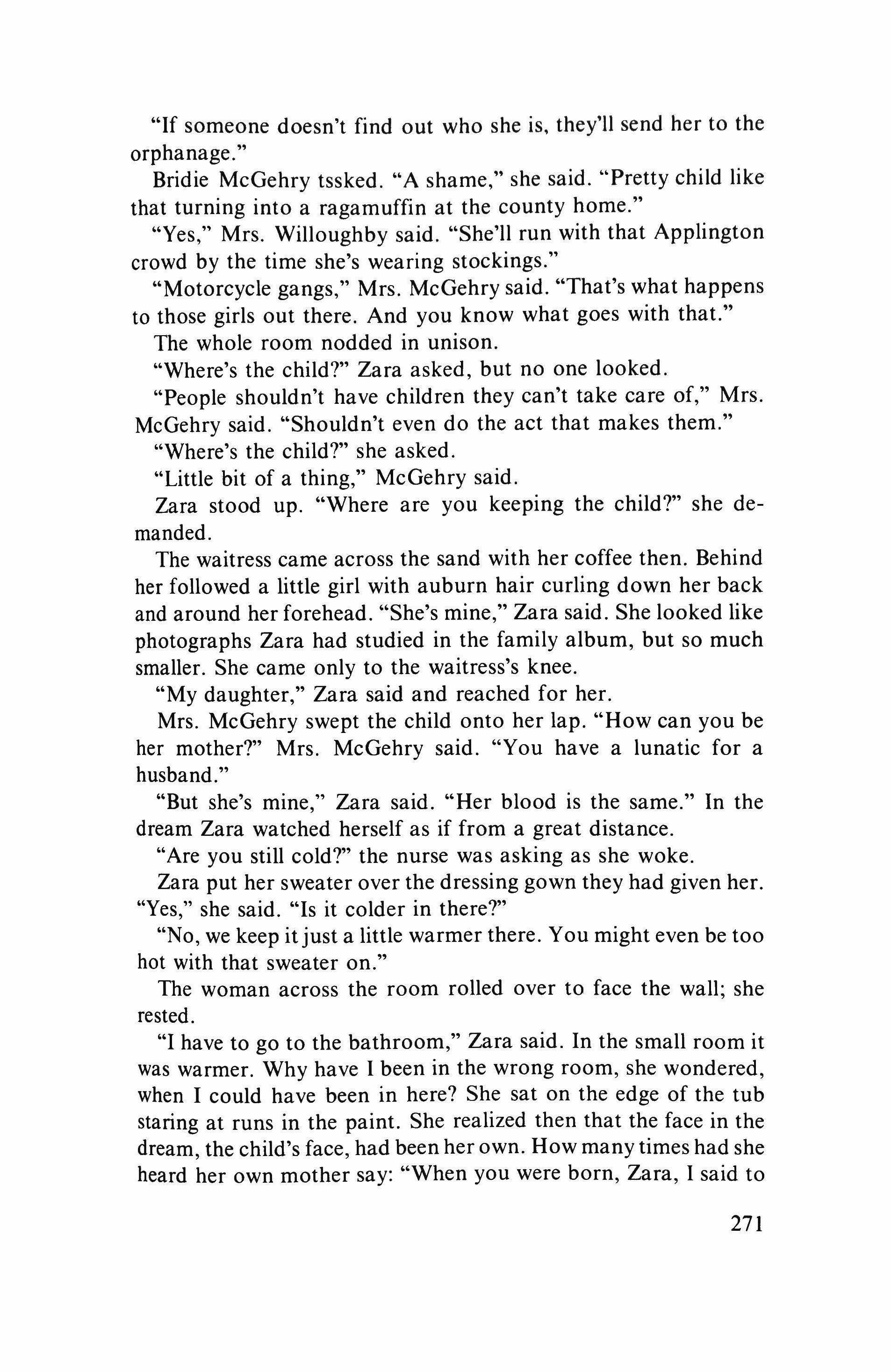
"If someone doesn't find out who she is, they'll send her to the orphanage."
Bridie McGehry tssked. "A shame," she said. "Pretty child like that turning into a ragamuffin at the county home."
"Yes," Mrs. Willoughby said. "She'll run with that Applington crowd by the time she's wearing stockings."
"Motorcycle gangs," Mrs. McGehry said. "That's what happens to those girls out there. And you know what goes with that."
The whole room nodded in unison.
"Where's the child?" Zara asked, but no one looked.
"People shouldn't have children they can't take care of," Mrs. McGehry said. "Shouldn't even do the act that makes them."
"Where's the child?" she asked.
"Little bit of a thing," McGehry said.
Zara stood up. "Where are you keeping the child?" she demanded.
The waitress came across the sand with her coffee then. Behind her followed a little girl with auburn hair curling down her back and around her forehead. "She's mine," Zara said. She looked like photographs Zara had studied in the family album, but so much smaller. She came only to the waitress's knee.
"My daughter," Zara said and reached for her.
Mrs. McGehry swept the child onto her lap. "How can you be her mother?" Mrs. McGehry said. "You have a lunatic for a husband."
"But she's mine," Zara said. "Her blood is the same." In the dream Zara watched herself as if from a great distance.
"Are you still cold?" the nurse was asking as she woke.
Zara put her sweater over the dressing gown they had given her. "Yes," she said. "Is it colder in there?"
"No, we keep it just a little warmer there. You might even be too hot with that sweater on."
The woman across the room rolled over to face the wall; she rested.
"I have to go to the bathroom," Zara said. In the small room it was warmer. Why have I been in the wrong room, she wondered, when I could have been in here? She sat on the edge of the tub staring at runs in the paint. She realized then that the face in the dream, the child's face, had been her own. How many times had she heard her own mother say: "When you were born, Zara, I said to

myself, Here is my own child, born to me as a second chance. Can you imagine my glee, Zara! A second chance in this wretched world."
As she lay on the table, she thought of Michael's story. She draped her knees over the metal leg rests as she thought of villages in the jungle, leaves that brush a belly extended for life, a body encasing a tomb.
The attendant stood beside her.
"I'm going to touch you now," the doctor said. He entered her body with his instruments.
There are four common mechanisms of transport across the placenta.
She would carry this baby all her life, rather than cut her away like a growth.
"There will be a little stick now as I give you these injections," the doctor said. With the stabbing in her abdomen, perspiration beaded on her forehead and the nausea began.
"You were right about the sweater," Zara said. The woman wiped her forehead with a cloth; she held her hands.
"Now this is the dilation," he said. "You'll feel pain. Some cramping now."
The pain came in a solid thrust. It did not stop.
"And now the curette."
"Don't move, dear," he said. "You mustn't raise up like that. A few minutes more and it'll be over."
The woman gripped her hands. "I'm sorry," she said, wiping Zara's tears. As the woman squeezed her fingers, Zara thought, This woman would kiss me if he were not here; she would place her lips on my forehead.
Zara could hear a machine; she could not feel its vibrations. Somewhere a woman walked with a child in her belly. She heard the villagers gathering around her. Flesh mother, they whispered. Immortal one, they wept. Stone child.
I look down the long narrow corridor where once I completed my psychiatric rotation as a student. I will not be coming back to this ward. Mary Andreason's hand tightens on my shoulder. "You can be thankful, Zara, that Michael's not like her." The nurse nods toward Madeline in the television lounge. "Not good."
We can hear the soap opera going on, a show about a medical

clinic. "Hey, Doc," a patient is asking Michael. "is that the way it 1S.?"
"The doctor doesn't want to talk to lunatics," Madeline sneers. "Can't you see that?"
The man hangs his head. A farmer, his chin on the bib of his overalls.
"That's not true," I say to him. "Michael is busy thinking." "Yes," Madeline says. "That's right-thinking." Mary Andreason shrugs as the lipsticked cross passes abruptly by her. A white pillowcase is fastened to Madeline's hair. I can see the flowered housecoat in front of the fireplace as she leans toward a chair. She lifts the cushion, retrieving a plastic object.
We watch her return. She stands between Michael and the television screen. "For you," Madeline says. "Take it."
Michael stands, slowly wrapping his fingers around the dish. He looks down at the top of her head, at her face tilted and grinning. Gently she removes the cover for him, as the other patients gather. They look to see her gift: two egg yolks floating in a white plastic bowl.
"That's very nice of you, Madeline," I tell her. Michael is staring at them.
"Shhhh," Madeline says. "Listen. Do you know what these are?" Michael rocks them slowly back and forth, yellow circles floating in a mucus of egg white. Madeline takes hold of his arm. "These are the balls of a monk."
The room is silent, an echo chamber with nothing to echo. Michael lifts his eyes to me, to Madeline. He points toward the center of the bowl. A sound comes from his throat: "For me?" His fingers tap his chest. "Monk," he laughs. "Monk." Before I, or anyone can answer, he is in his chair, sunken, as if he had never spoken, as if he has never known meaning or words.
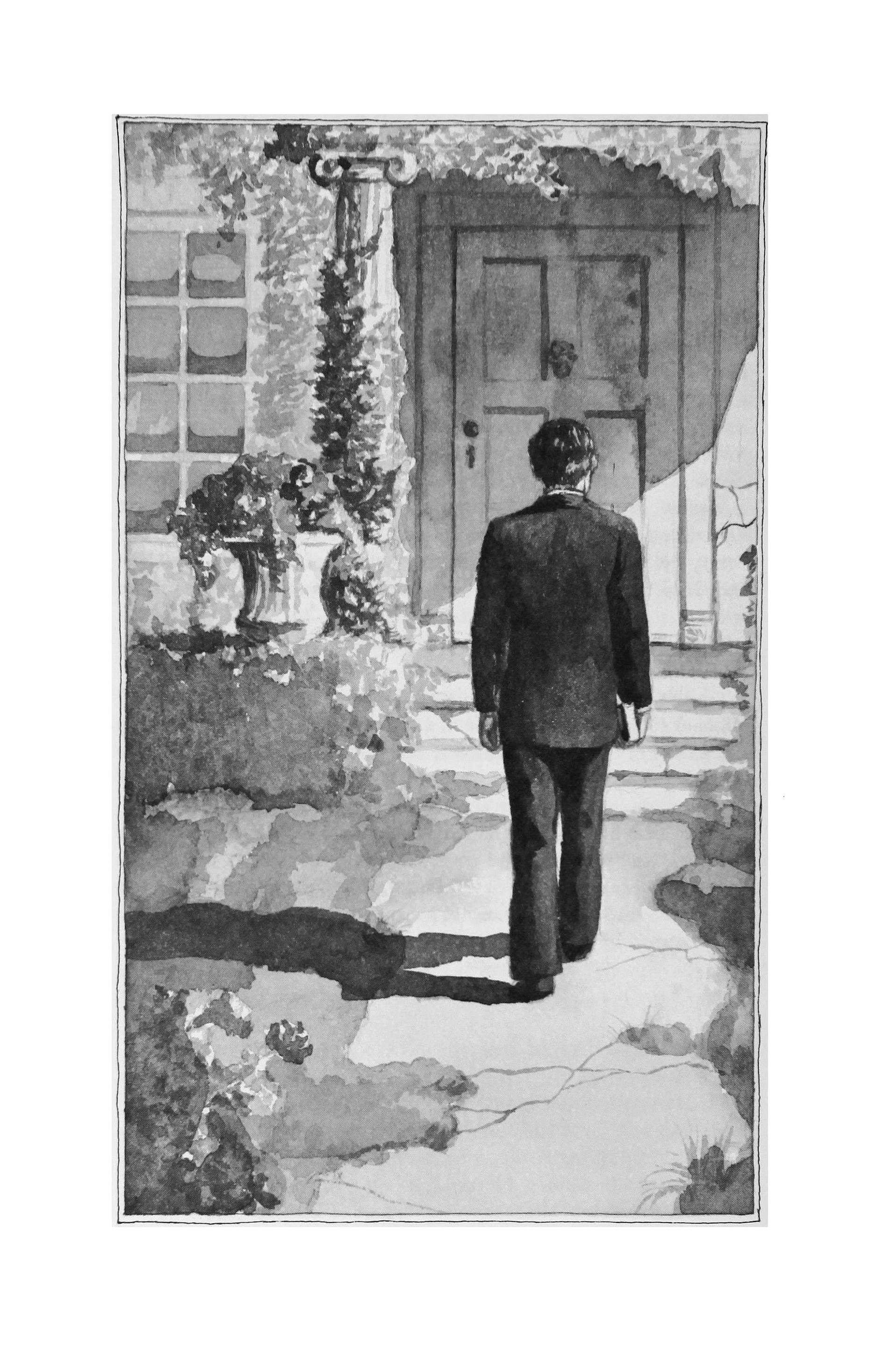
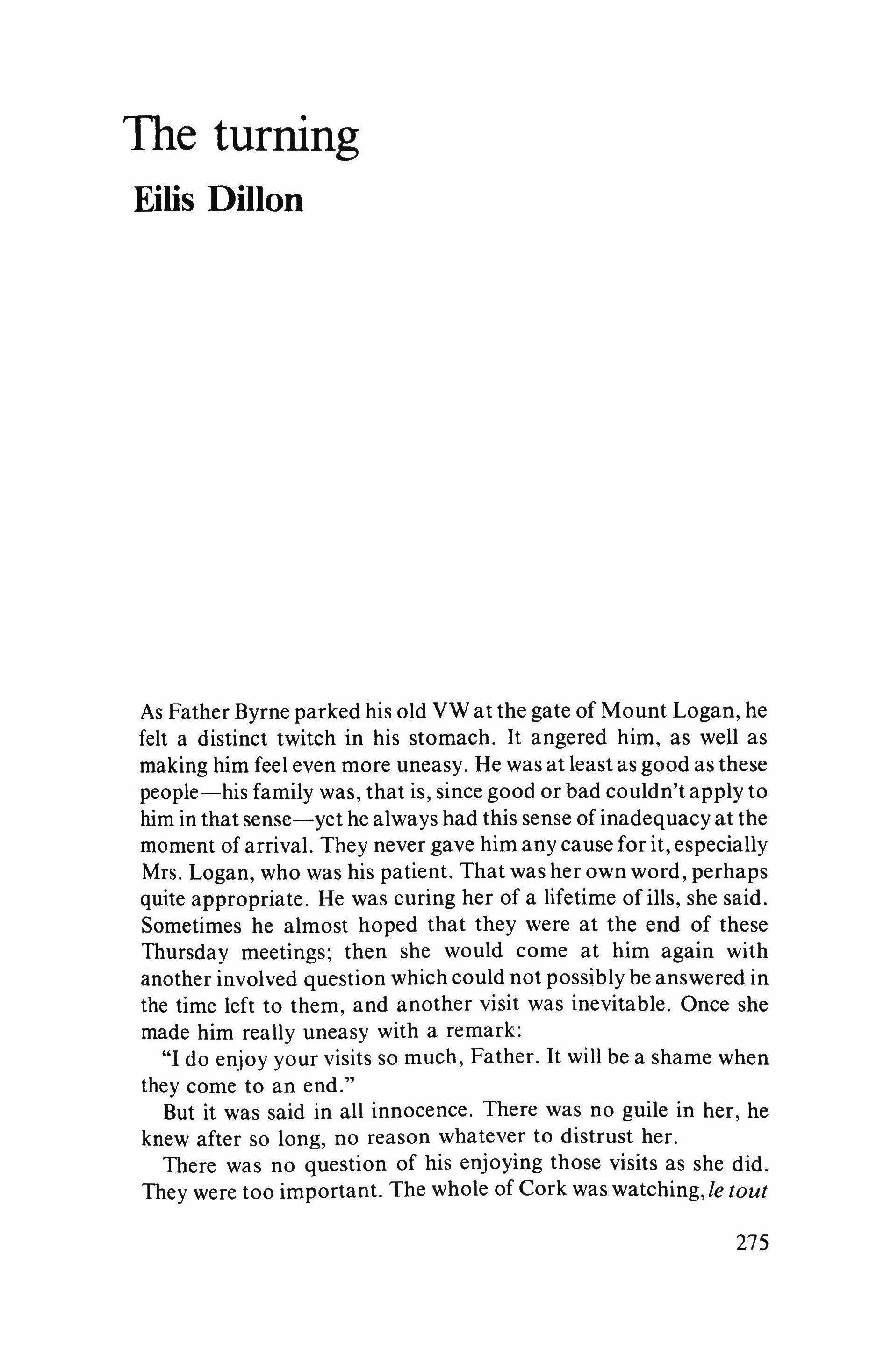
As Father Byrne parked his old VW at the gate of Mount Logan, he felt a distinct twitch in his stomach. It angered him, as well as making him feel even more uneasy. He was at least as good as these people-his family was, that is, since good or bad couldn't apply to him in that sense-yet he always had this sense of inadequacy at the moment of arrival. They never gave him any cause for it, especially Mrs. Logan, who was his patient. That was her own word, perhaps quite appropriate. He was curing her of a lifetime of ills, she said. Sometimes he almost hoped that they were at the end of these Thursday meetings; then she would come at him again with another involved question which could not possibly be answered in the time left to them, and another visit was inevitable. Once she made him really uneasy with a remark:
"I do enjoy your visits so much, Father. It will be a shame when they come to an end."
But it was said in all innocence. There was no guile in her, he knew after so long, no reason whatever to distrust her.
There was no question of his enjoying those visits as she did. They were too important. The whole of Cork was watching, Ie tout

Cork, as he said to himself sourly. Mrs. Logan of Mount Logan was a catch for the Church, and for him. Her husband was old Catholic gentry, but she was a Wickham, dyed in the wool the other way since Cromwell's time. It would shake the county to its foundations if he made it. He knew they were alreadyguessing that he never would. Not that he cared whom it shook; such ideas only made his lot harder to bear. All he wanted was to get the unfortunate woman out of her distress and help her find peace of mind, wherever in this world or in heaven she would find it.
She tormented herself. That was her trouble. Perhaps subconsciously she was prolonging his visits, but he could not believe it of her. She had enough on her mind, poor woman, with her paralyzed limbs and her poverty and the wretched discomfort of her way of living. The Logans had never known how to live without servants. When the breed disappeared, theyjust tried to go on the same way without them-an impossibility, as time proved. There was Mrs. Cotter down the road, handpicked, the only charwoman who needed ajob because no one would employ her; and, sure enough, she was installed at Mount Logan, apparently forever. Father Byrne couldn't grudge her her luck-his too, since she no longer needed the handouts he had been accustomed to give her-but he found it hard not to warn Mrs. Logan against her new servant's habits. Captain Logan took no notice of affairs within the house, but she said with what could only be called a dashing air:
"You know my new daily, Father. We've moved with the times. She's a parishioner of yours, she tells me."
Thereby blaming him? Surely the look she gave him was not slyly suggesting that it would be a bad sign of the Catholic church if Mrs. Cotter went off with the spoons.
He climbed out ofthe car, locking the door. He was faced toward home, following an old and wise habit of his. He was parked lengthwise against the gate, an old wooden one with some ironwork toward the top, painted a dead gray. It had not been opened for years and was embedded at the base in grass and weeds. The country road was narrow, and the little inward curve at the gate was necessary if he were to park here at all. This was the farthest limit of his parish, with luck the boundary might have been drawn fifty yards farther back, leaving Mount Logan a foreign country. He opened the wicket gate with difficulty, pressing his bodyagainst the warped wood, staining his neat gray suit, and entered the mossy
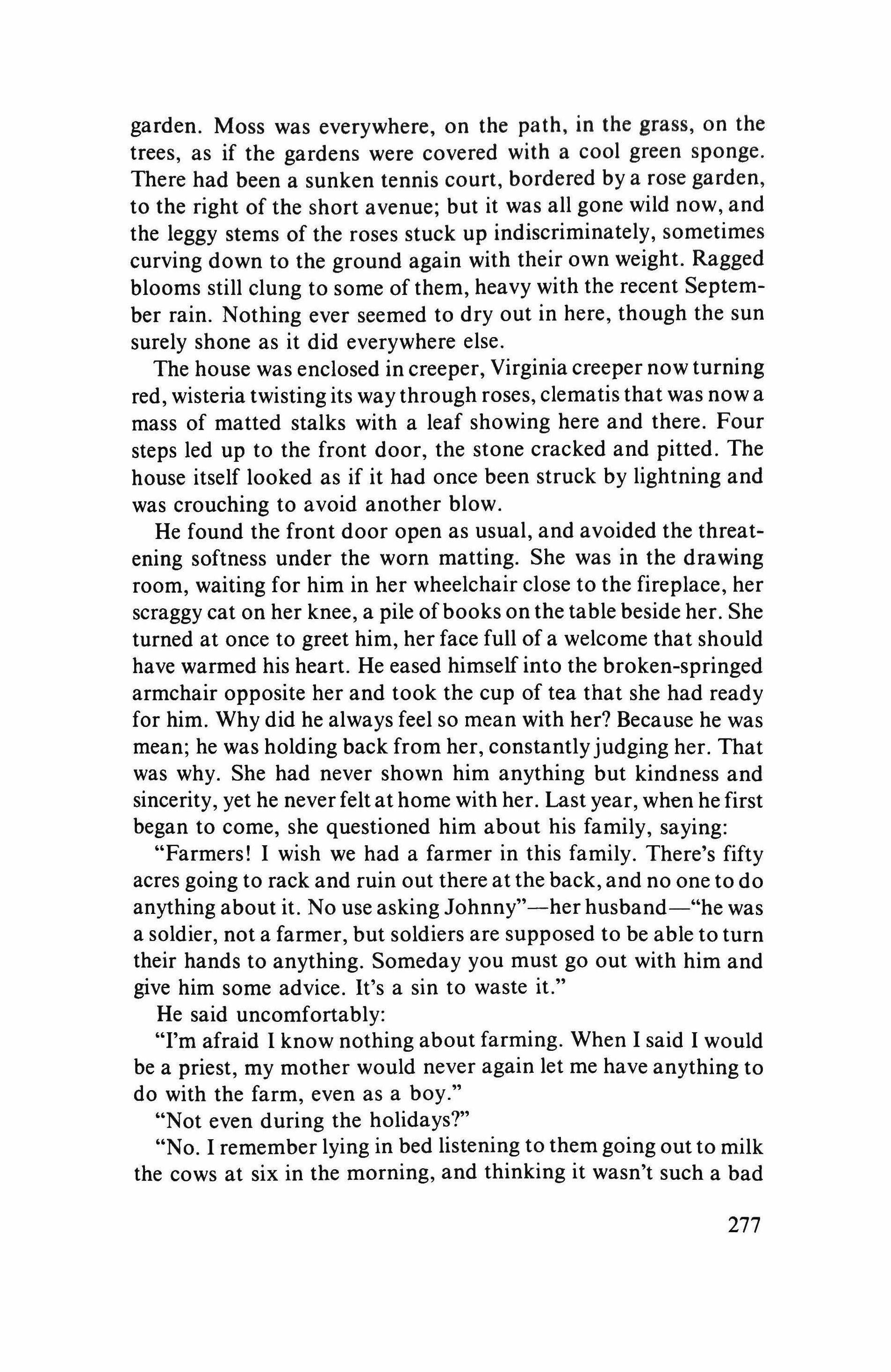
garden. Moss was everywhere, on the path, in the grass, on the trees, as if the gardens were covered with a cool green sponge. There had been a sunken tennis court, bordered by a rose garden, to the right of the short avenue; but it was all gone wild now, and the leggy stems of the roses stuck up indiscriminately, sometimes curving down to the ground again with their own weight. Ragged blooms still clung to some of them, heavy with the recent September rain. Nothing ever seemed to dry out in here, though the sun surely shone as it did everywhere else.
The house was enclosed in creeper, Virginia creeper now turning red, wisteria twisting its way through roses, clematis that was now a mass of matted stalks with a leaf showing here and there. Four steps led up to the front door, the stone cracked and pitted. The house itself looked as if it had once been struck by lightning and was crouching to avoid another blow.
He found the front door open as usual, and avoided the threatening softness under the worn matting. She was in the drawing room, waiting for him in her wheelchair close to the fireplace, her scraggy cat on her knee, a pile of books on the table beside her. She turned at once to greet him, her face full of a welcome that should have warmed his heart. He eased himself into the broken-springed armchair opposite her and took the cup of tea that she had ready for him. Why did he always feel so mean with her? Because he was mean; he was holding back from her, constantlyjudging her. That was why. She had never shown him anything but kindness and sincerity, yet he never felt at home with her. Last year, when he first began to come, she questioned him about his family, saying:
"Farmers! I wish we had a farmer in this family. There's fifty acres going to rack and ruin out there at the back, and no one to do anything about it. No use asking Johnny"-her husband-"he was a soldier, not a farmer, but soldiers are supposed to be able to turn their hands to anything. Someday you must go out with him and give him some advice. It's a sin to waste it."
He said uncomfortably:
"I'm afraid I know nothing about farming. When I said I would be a priest, my mother would never again let me have anything to do with the farm, even as a boy."
"Not even during the holidays?"
"No. I remember lying in bed listening to them going out to milk the cows at six in the morning, and thinking it wasn't such a bad

thing to go for the clerical life. It was wrong, of course." He had seen that she was surprised. "But I was young, and that was the custom." Why had he given her that detail? Big mouth, as usual. Be more careful in the future. She only said, "A pity. You missed something." She put it behind her then and went on to tell him why she had asked him to come.
"I've promised my husband that I'll have a good try at the Catholic church, but I must find out all about it. I need a learned priest to help me. That's the only way for me. I couldn't possibly take it on trust, as people seem to do. Happy Irish people! They never question anything. If the priest says it, then it must be true."
He didn't answer that one. He couldn't have, not in one afternoon, and he wanted to get her started. When had she become interested?
"A long time ago, after 1 married Johnny. My family were always staunch Church of Ireland. You'll have to begin at the beginning. I've read things, of course, but mostly I've just watched Johnny. He doesn't talk much but he gets such value from the church, especially when things go wrong with us."
In Cork, Johnny was known as the Silent Traveler; he seemed to exist without speaking at all. Her remark was the understatement of the century. Johnny walked or bicycled to Sunday Mass and home again, but Father Byrne had spoken to him only twice in his life, once to welcome him when he came back to live in Mount Logan and the second time when Johnny had stood at the presbytery gate to say hoarsely, "My wife wants you to call, any afternoon.
With the same air of excited foreboding he probably asked the doctor to visit her when the births of their two daughters were imminent.
"Something 1 can do for her?"
"Yes, turn her." He actually laughed, so quietly that it was almost an obscene sound. "That's what she wants. She's always wanted it, but she'll be a hard nut to crack all the same. Sooner you than me."
"Have you tried?"
The tone was a trifle sharp and Captain Logan noticed it, sending him a hostile look as he made his last contribution to the whole affair: "Yes. Over to you now."
He hardly ever appeared on their Thursdays, but it was he who

left the tea ready, as he had done today, before going off to lurk somewhere.
That twitch again. Father Byrne had noticed Newman's Apologia on top of the pile beside her, the faded blue cover seeming to embody some spirit of the controversies it contained. Red, even purple, would have been a more cheerful color. Noone designed books properly with an eye to their spiritual impact. She picked it up, saying, "Newman has so much I need."
She settled herself more comfortably. The book fell open, a bad sign, at the place she wanted. Now she looked at him directly, not accusingly but with an almost apologetic understanding: "You're right-I'm wearing the book out. I hope I'm not wearing you out too, Father."
"Of course not. No, no. We have plenty of time. I've finished all my rounds. I want to be sure you always feel there is plenty oftime, always."
Talking too much again. His father always said that would be the ruin of him. There was not plenty of time. She was shilly-shallying. Who could tell when the Lord would call her, and leave this job unfinished? But hurry her? He would never. He also composed himself more comfortably against the lumpy back of the armchair and put on a waiting, listening expression. By now she knew all he had to say. Once he had even addressed her as Madam and pointed out that it would be disingenuous to try to keep a foot in both camps, having the advantages of one belief and the consolations of the other. She had been very good for a while afterward, but then she got back to her doubts again. She had the book close to her weak eyes now.
"It's the nub of the whole business. Newman was right. I think I've got it at last."
"Thank God!"
Was that too fervent? She didn't seem to think so. Her face was slightly flushed and she was saying:
"It's all in the Act of Parliament of October 5, 1841. That's where it shows that all the opposition to Newman was not on theological grounds at all. He was rocking the boat. He was proving that the Anglican church was not one, holy, Catholic and Apostolic at all but an adjunct of the British Empire. Listen to this: 'When our thoughts turn to the East, instead of recollecting that there are Christian Churches there, we leave it to the Russians to take care of
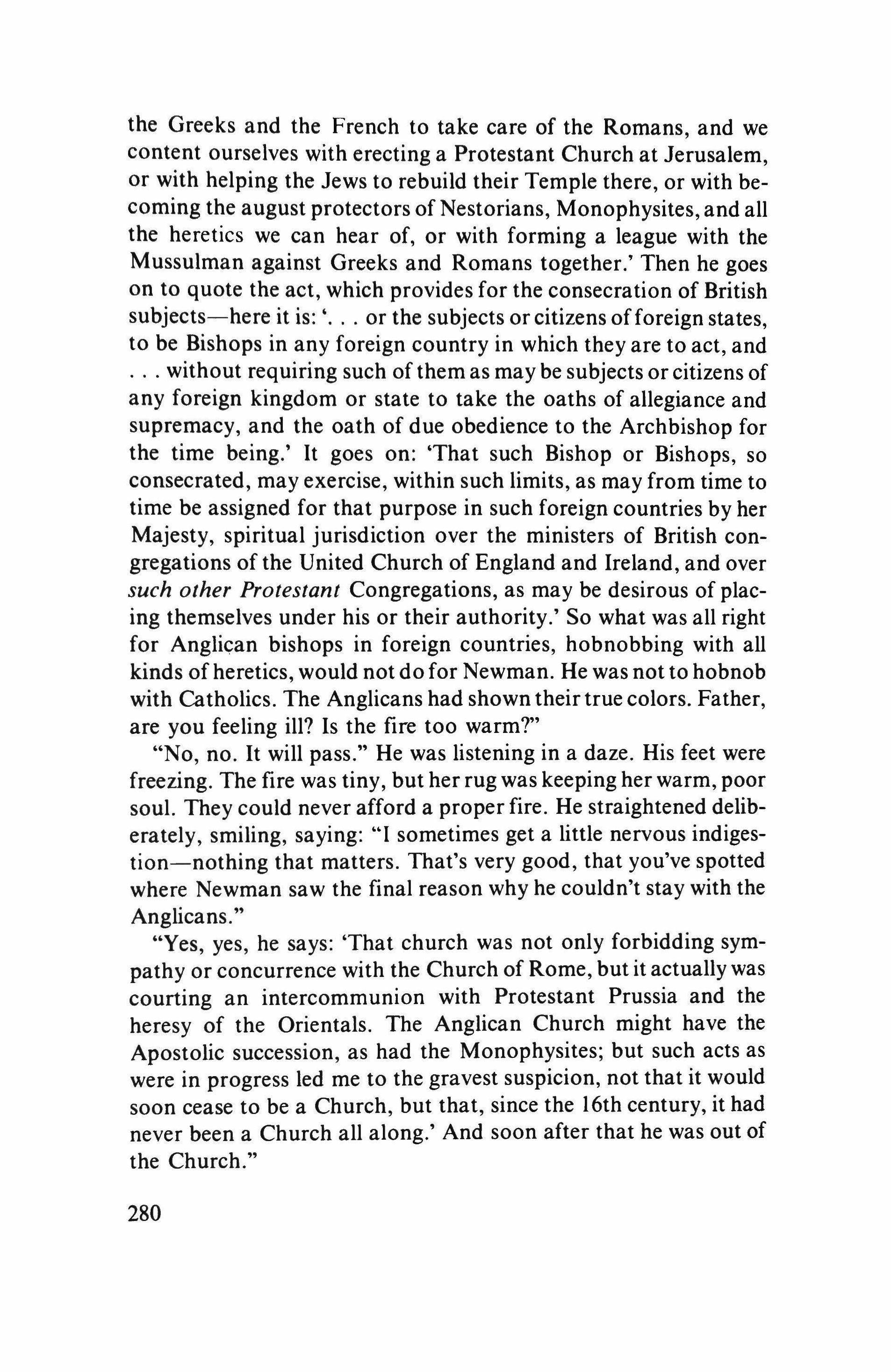
the Greeks and the French to take care of the Romans, and we content ourselves with erecting a Protestant Church at Jerusalem, or with helping the Jews to rebuild their Temple there, or with becoming the august protectors of Nestorians, Monophysites, and all the heretics we can hear of, or with forming a league with the Mussulman against Greeks and Romans together.' Then he goes on to quote the act, which provides for the consecration of British subjects-here it is: or the subjects or citizens offoreign states, to be Bishops in any foreign country in which they are to act, and without requiring such of them as may be subjects or citizens of any foreign kingdom or state to take the oaths of allegiance and supremacy, and the oath of due obedience to the Archbishop for the time being.' It goes on: 'That such Bishop or Bishops, so consecrated, may exercise, within such limits, as may from time to time be assigned for that purpose in such foreign countries by her Majesty, spiritual jurisdiction over the ministers of British congregations of the United Church of England and Ireland, and over such other Protestant Congregations, as may be desirous of placing themselves under his or their authority.' So what was all right for Anglican bishops in foreign countries, hobnobbing with all kinds of heretics, would not do for Newman. He was not to hobnob with Catholics. The Anglicans had shown their true colors. Father, are you feeling ill? Is the fire too warm?"
"No, no. It will pass." He was listening in a daze. His feet were freezing. The fire was tiny, but her rug was keeping her warm, poor soul. They could never afford a proper fire. He straightened deliberately, smiling, saying: "I sometimes get a little nervous indigestion-nothing that matters. That's very good, that you've spotted where Newman saw the final reason why he couldn't stay with the Anglicans."
"Yes, yes, he says: 'That church was not only forbidding sympathy or concurrence with the Church of Rome, but it actually was courting an intercommunion with Protestant Prussia and the heresy of the Orientals. The Anglican Church might have the Apostolic succession, as had the Monophysites; but such acts as were in progress led me to the gravest suspicion, not that it would soon cease to be a Church, but that, since the 16th century, it had never been a Church all along.' And soon after that he was out of the Church."

"Being out of one church doesn't bring you into another."
"He says that, too. This is all old news to you, but it's new to me, at least this view of it is. He pressed me on. He speaks of his ingrained fears of Rome. We have the same difficulty. Prejudice clouds the vision. It stupefies. He wanted everything that Rome offers, but he wanted to have it on his own terms, inside the Protestant church. He saw-here it is: 'She alone (the Roman church), amid all the errors and evils of her practical system, has given free scope to the feelings of awe, mystery, tenderness, reverence, devotedness, and other feelings which may be especially called Catholic.' With my upbringing, Father, all those things are as far from me, or were until now, as the capacity to wag my tail, having none. He goes on with his thoughts on the Communion of Saints-that might embrace devotion to the Virgin-and prayers for the dead. Father, you are ill."
"Not at all. I'm excited at your discovery of this. You see, you've been reading with expert attention. That's what we were always told to do. Read as if you were playing a musical instrument, every note getting its full attention. Now the end is in sight." He hadn't meant to say that, and he had a shot at retrieving himself. "Now you'll be able to build on this new insight. Have you finished the book?"
"Yes, but only once. I need to read it many more times. And I want to find out about the Nestorians. They seem very important. How very learned he was, your Newman."
"Your Newman."
"Yes, you're right. We can claim him." God help him, he had put his foot in it again. That note of complacency! And the acceptance of that awful word "your." She was back three steps for everyone forward. Funny that she had this fixed idea that there was plenty of time. For an invalid, surely this was abnormal. Of course her aisease was not progressive. She would have done better with one that was. Mother of God, pray for me. It's time to go, before I do real harm. If only she were not so clever, if only she had less education, hadn't been around the world. There was a story going about that Logan had rescued her from a frightful marriage with a British Army major in India, who swept her off her feet when she was eighteen and didn't know him from Adam, and who turned out to be a good deal of a pig. Nothing standing in her way now,
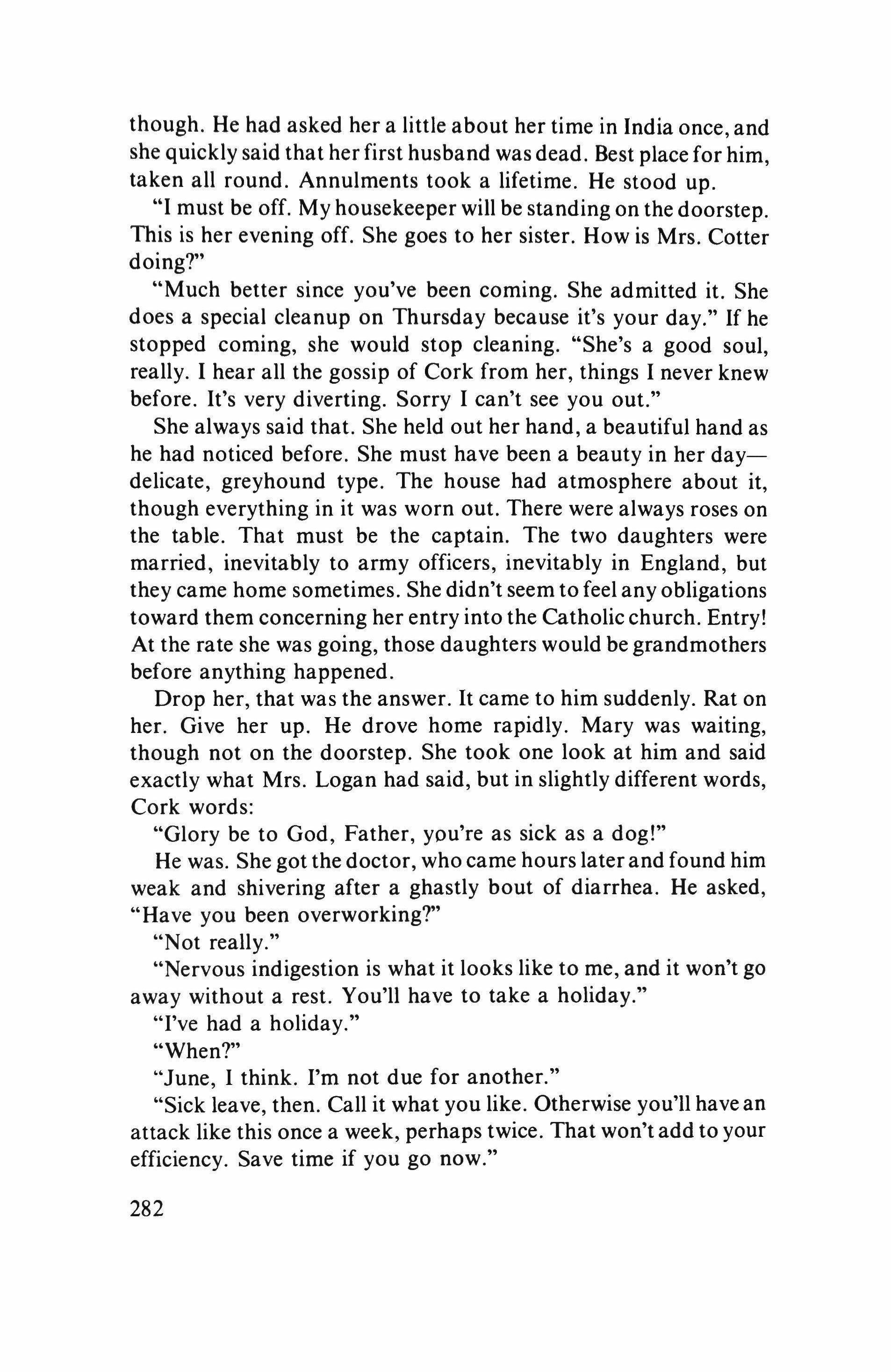
though. He had asked her a little about her time in India once, and she quickly said that her first husband was dead. Best place for him, taken all round. Annulments took a lifetime. He stood up.
"I must be off. My housekeeper will be standing on the doorstep. This is her evening off. She goes to her sister. How is Mrs. Cotter doing?"
"Much better since you've been coming. She admitted it. She does a special cleanup on Thursday because it's your day." If he stopped coming, she would stop cleaning. "She's a good soul, really. I hear all the gossip of Cork from her, things I never knew before. It's very diverting. Sorry I can't see you out."
She always said that. She held out her hand, a beautiful hand as he had noticed before. She must have been a beauty in her daydelicate, greyhound type. The house had atmosphere about it, though everything in it was worn out. There were always roses on the table. That must be the captain. The two daughters were married, inevitably to army officers, inevitably in England, but they came home sometimes. She didn't seem to feel any obligations toward them concerning her entry into the Catholic church. Entry! At the rate she was going, those daughters would be grandmothers before anything happened.
Drop her, that was the answer. It came to him suddenly. Rat on her. Give her up. He drove home rapidly. Mary was waiting, though not on the doorstep. She took one look at him and said exactly what Mrs. Logan had said, but in slightly different words, Cork words:
"Glory be to God, Father, you're as sick as a dog!"
He was. She got the doctor, who came hours later and found him weak and shivering after a ghastly bout of diarrhea. He asked, "Have you been overworking?"
"Not really."
"Nervous indigestion is what it looks like to me, and it won't go away without a rest. You'll have to take a holiday."
"I've had a holiday."
"When?"
"June, I think. I'm not due for another."
"Sick leave, then. Call it what you like. Otherwise you'll have an attack like this once a week, perhaps twice. That won't add to your efficiency. Save time if you go now."
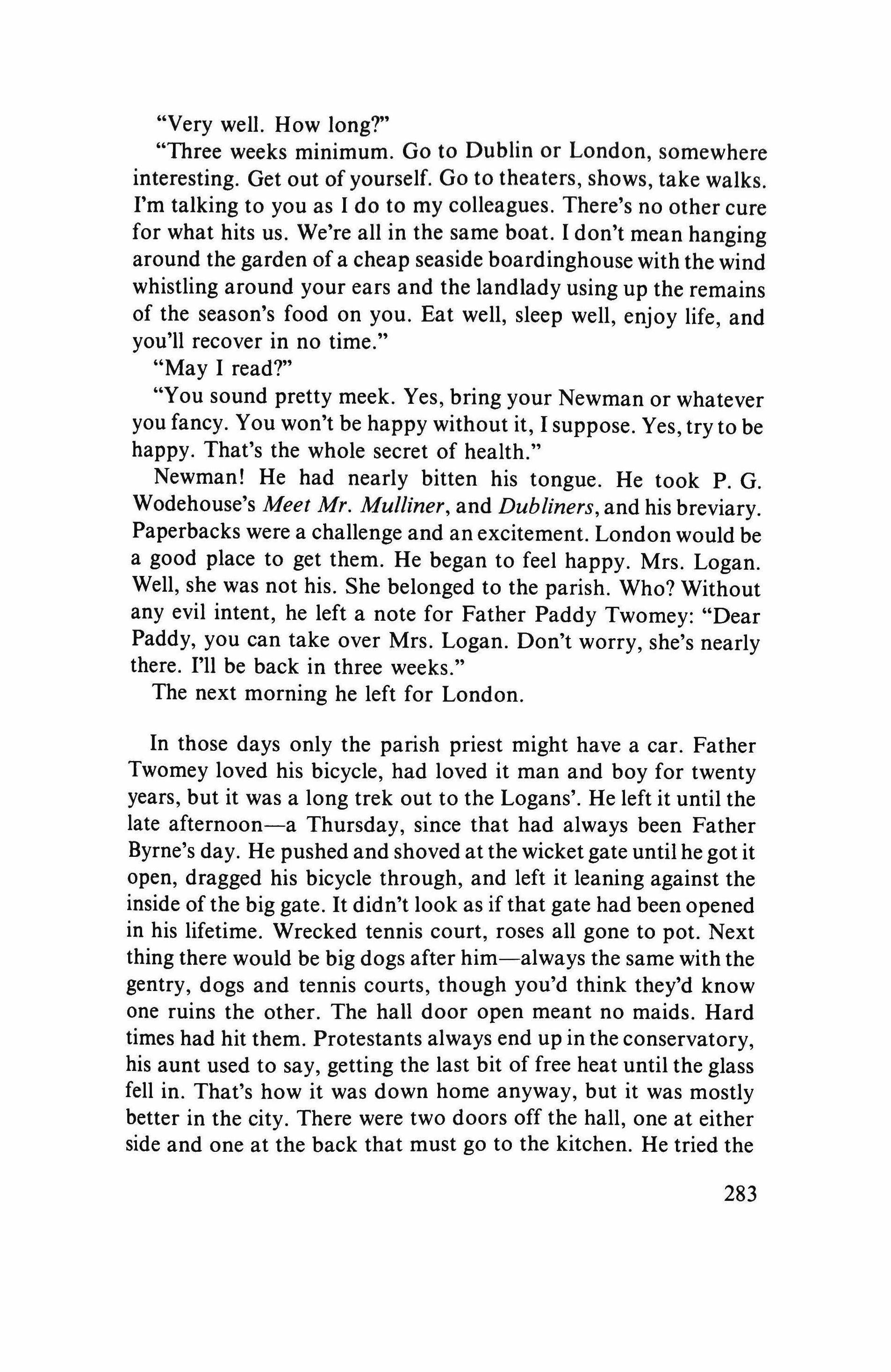
"Very well. How long?"
"Three weeks minimum. Go to Dublin or London, somewhere interesting. Get out of yourself. Go to theaters, shows, take walks. I'm talking to you as I do to my colleagues. There's no other cure for what hits us. We're all in the same boat. I don't mean hanging around the garden of a cheap seaside boardinghouse with the wind whistling around your ears and the landlady using up the remains of the season's food on you. Eat well, sleep well, enjoy life, and you'll recover in no time."
"May I read?"
"You sound pretty meek. Yes, bring your Newman or whatever you fancy. You won't be happy without it, I suppose. Yes, try to be happy. That's the whole secret of health."
Newman! He had nearly bitten his tongue. He took P. G. Wodehouse's Meet Mr. Mulliner, and Dubliners and his breviary. Paperbacks were a challenge and an excitement. London would be a good place to get them. He began to feel happy. Mrs. Logan. Well, she was not his. She belonged to the parish. Who? Without any evil intent, he left a note for Father Paddy Twomey: "Dear Paddy, you can take over Mrs. Logan. Don't worry, she's nearly there. I'll be back in three weeks."
The next morning he left for London.
In those days only the parish priest might have a car. Father Twomey loved his bicycle, had loved it man and boy for twenty years, but it was a long trek out to the Logans'. He left it until the late afternoon-a Thursday, since that had always been Father Byrne's day. He pushed and shoved at the wicket gate until he got it open, dragged his bicycle through, and left it leaning against the inside of the big gate. It didn't look as if that gate had been opened in his lifetime. Wrecked tennis court, roses all gone to pot. Next thing there would be big dogs after him-always the same with the gentry, dogs and tennis courts, though you'd think they'd know one ruins the other. The hall door open meant no maids. Hard times had hit them. Protestants always end up in the conservatory, his aunt used to say, getting the last bit of free heat until the glass fell in. That's how it was down home anyway, but it was mostly better in the city. There were two doors off the hall, one at either side and one at the back that must go to the kitchen. He tried the 283
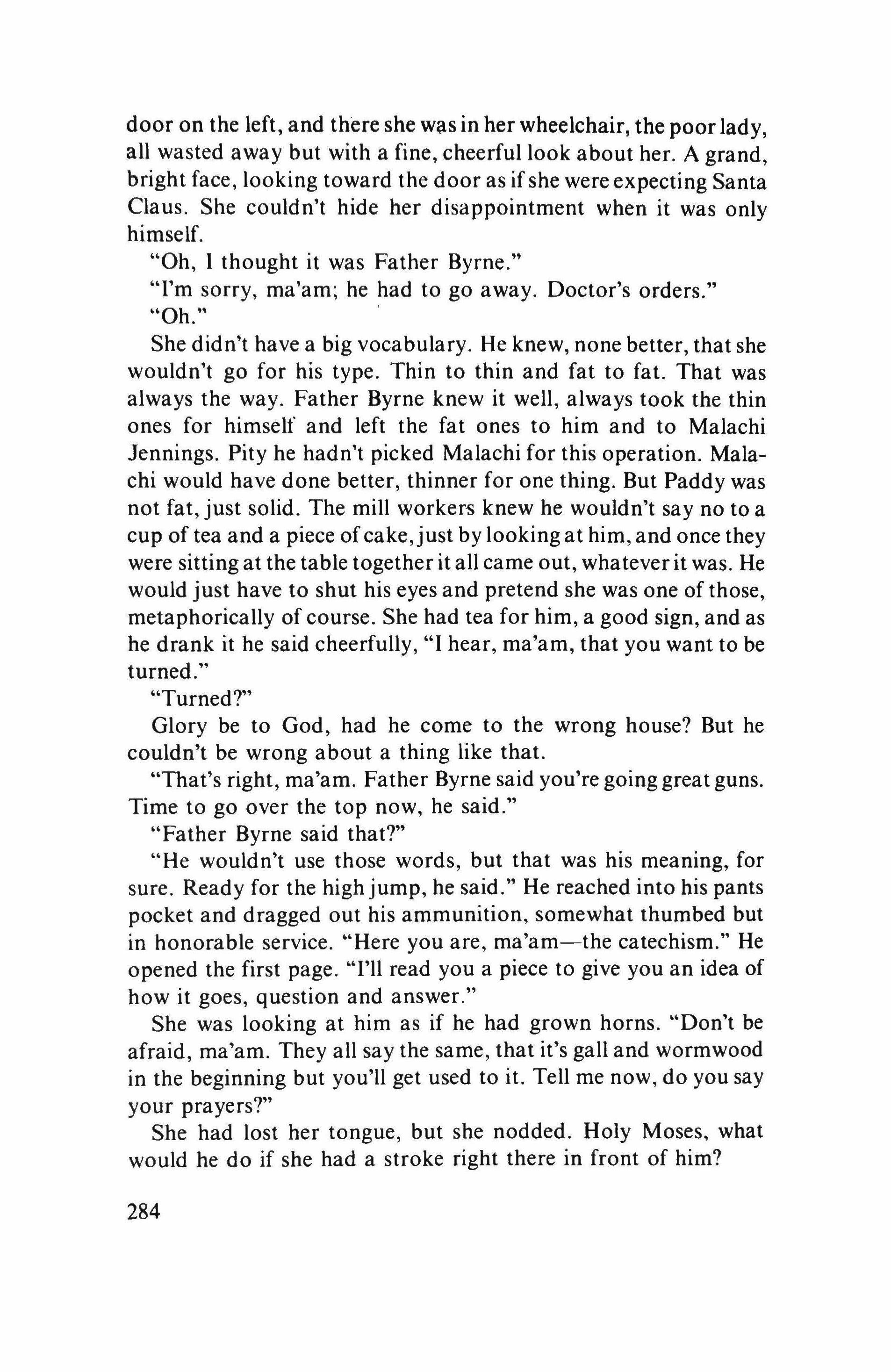
door on the left, and there she was in her wheelchair, the poor lady, all wasted away but with a fine, cheerful look about her. A grand, bright face, looking toward the door as if she were expecting Santa Claus. She couldn't hide her disappointment when it was only himself.
"Oh, I thought it was Father Byrne."
"I'm sorry, ma'am; he had to go away. Doctor's orders." "Oh."
She didn't have a big vocabulary. He knew, none better, that she wouldn't go for his type. Thin to thin and fat to fat. That was always the way. Father Byrne knew it well, always took the thin ones for himself and left the fat ones to him and to Malachi Jennings. Pity he hadn't picked Malachi for this operation. Malachi would have done better, thinner for one thing. But Paddy was not fat, just solid. The mill workers knew he wouldn't say no to a cup of tea and a piece ofcake,just by looking at him, and once they were sitting at the table together it all came out, whatever it was. He would just have to shut his eyes and pretend she was one of those, metaphorically of course. She had tea for him, a good sign, and as he drank it he said cheerfully, "I hear, ma'am, that you want to be turned."
"Turned?"
Glory be to God, had he come to the wrong house? But he couldn't be wrong about a thing like that.
"That's right, ma'am. Father Byrne said you're going great guns. Time to go over the top now, he said."
"Father Byrne said that?"
"He wouldn't use those words, but that was his meaning, for sure. Ready for the high jump, he said." He reached into his pants pocket and dragged out his ammunition, somewhat thumbed but in honorable service. "Here you are, ma'am-the catechism." He opened the first page. "I'll read you a piece to give you an idea of how it goes, question and answer."
She was looking at him as if he had grown horns. "Don't be afraid, ma'am. They all say the same, that it's gall and wormwood in the beginning but you'll get used to it. Tell me now, do you say your prayers?"
She had lost her tongue, but she nodded. Holy Moses, what would he do if she had a stroke right there in front of him?
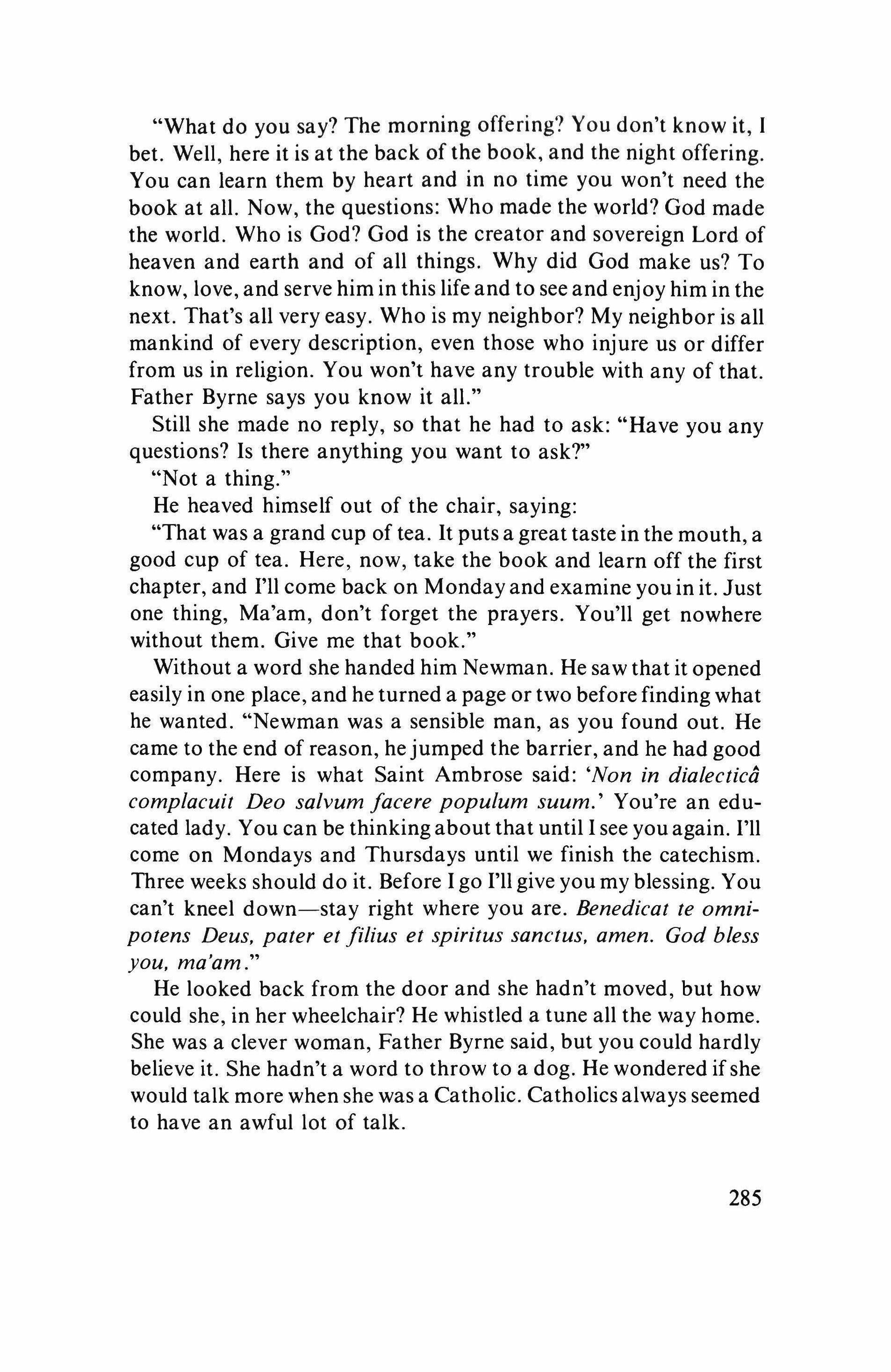
"What do you say? The morning offering? You don't know it, I bet. Well, here it is at the back of the book, and the night offering. You can learn them by heart and in no time you won't need the book at all. Now, the questions: Who made the world? God made the world. Who is God? God is the creator and sovereign Lord of heaven and earth and of all things. Why did God make us? To know, love, and serve him in this life and to see and enj oy him in the next. That's all very easy. Who is my neighbor? My neighbor is all mankind of every description, even those who injure us or differ from us in religion. You won't have any trouble with any of that.
Father Byrne says you know it all."
Still she made no reply, so that he had to ask: "Have you any questions? Is there anything you want to ask?"
"Not a thing."
He heaved himself out of the chair, saying:
"That was a grand cup of tea. It puts a great taste in the mouth, a good cup of tea. Here, now, take the book and learn off the first chapter, and I'll come back on Monday and examine you in it. Just one thing, Ma'am, don't forget the prayers. You'll get nowhere without them. Give me that book."
Without a word she handed him Newman. He saw that it opened easily in one place, and he turned a page or two before finding what he wanted. "Newman was a sensible man, as you found out. He came to the end of reason, he jumped the barrier, and he had good company. Here is what Saint Ambrose said: 'Non in dialecticii complacuit Deo salvum facere populum suum.' You're an educated lady. You can be thinking about that until I see you again. I'll come on Mondays and Thursdays until we finish the catechism. Three weeks should do it. Before I go I'll give you my blessing. You can't kneel down-stay right where you are. Benedicat te omnipotens Deus, pater et filius et spiritus sanctus, amen. God bless you, ma'am."
He looked back from the door and she hadn't moved, but how could she, in her wheelchair? He whistled a tune all the way home. She was a clever woman, Father Byrne said, but you could hardly believe it. She hadn't a word to throw to a dog. He wondered if she would talk more when she was a Catholic. Catholics always seemed to have an awful lot of talk.
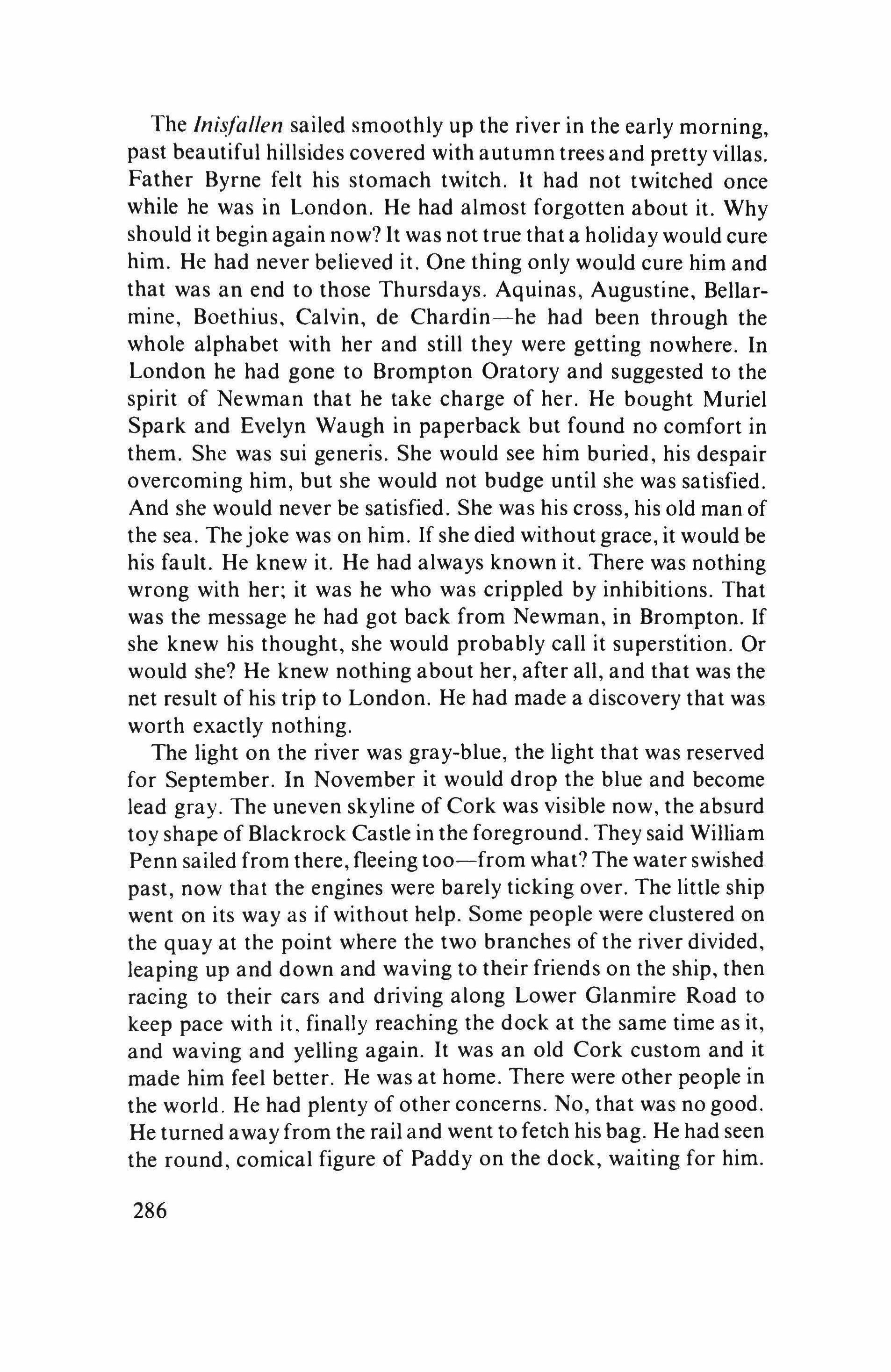
The Inisfallen sailed smoothly up the river in the early morning, past beautiful hillsides covered with autumn trees and pretty villas. Father Byrne felt his stomach twitch. It had not twitched once while he was in London. He had almost forgotten about it. Why should it begin again now? It was not true that a holiday would cure him. He had never believed it. One thing only would cure him and that was an end to those Thursdays. Aquinas, Augustine, Bellarmine, Boethius, Calvin, de Chardin-he had been through the whole alphabet with her and still they were getting nowhere. In London he had gone to Brompton Oratory and suggested to the spirit of Newman that he take charge of her. He bought Muriel Spark and Evelyn Waugh in paperback but found no comfort in them. She was sui generis. She would see him buried, his despair overcoming him, but she would not budge until she was satisfied. And she would never be satisfied. She was his cross, his old man of the sea. The joke was on him. If she died without grace, it would be his fault. He knew it. He had always known it. There was nothing wrong with her; it was he who was crippled by inhibitions. That was the message he had got back from Newman, in Brompton. If she knew his thought, she would probably call it superstition. Or would she? He knew nothing about her, after all, and that was the net result of his trip to London. He had made a discovery that was worth exactly nothing.
The light on the river was gray-blue, the light that was reserved for September. In November it would drop the blue and become lead gray. The uneven skyline of Cork was visible now, the absurd toy shape of Blackrock Castle in the foreground. They said William Penn sailed from there, fleeing too-from what? The water swished past, now that the engines were barely ticking over. The little ship went on its way as if without help. Some people were clustered on the quay at the point where the two branches of the river divided, leaping up and down and waving to their friends on the ship, then racing to their cars and driving along Lower Glanmire Road to keep pace with it, finally reaching the dock at the same time as it, and waving and yelling again. It was an old Cork custom and it made him feel better. He was at home. There were other people in the world. He had plenty of other concerns. No, that was no good. He turned away from the rail and went to fetch his bag. He had seen the round, comical figure of Paddy on the dock, waiting for him.

He had come early, to get a parking place nearby. He was eating an apple and he chucked the core into the river as he said:
"Give me the bag. That was my breakfast. How are you? You look a bit better. I did that job for you."
"Job?"
"Mrs. Logan. I turned her. Yesterday." "You did?"
"Yes. Didn't you want me to? She made no objections. I didn't ask her if she wanted to wait for you to come back." He heaved the bag into the car. "To tell you the truth, I was thinking you must have had enough of her. She's a very nice lady, and a very good one, but she's too quiet. She'd put years on you. On me, at least. Was it all right to do it?"
"Yes, it was all right."
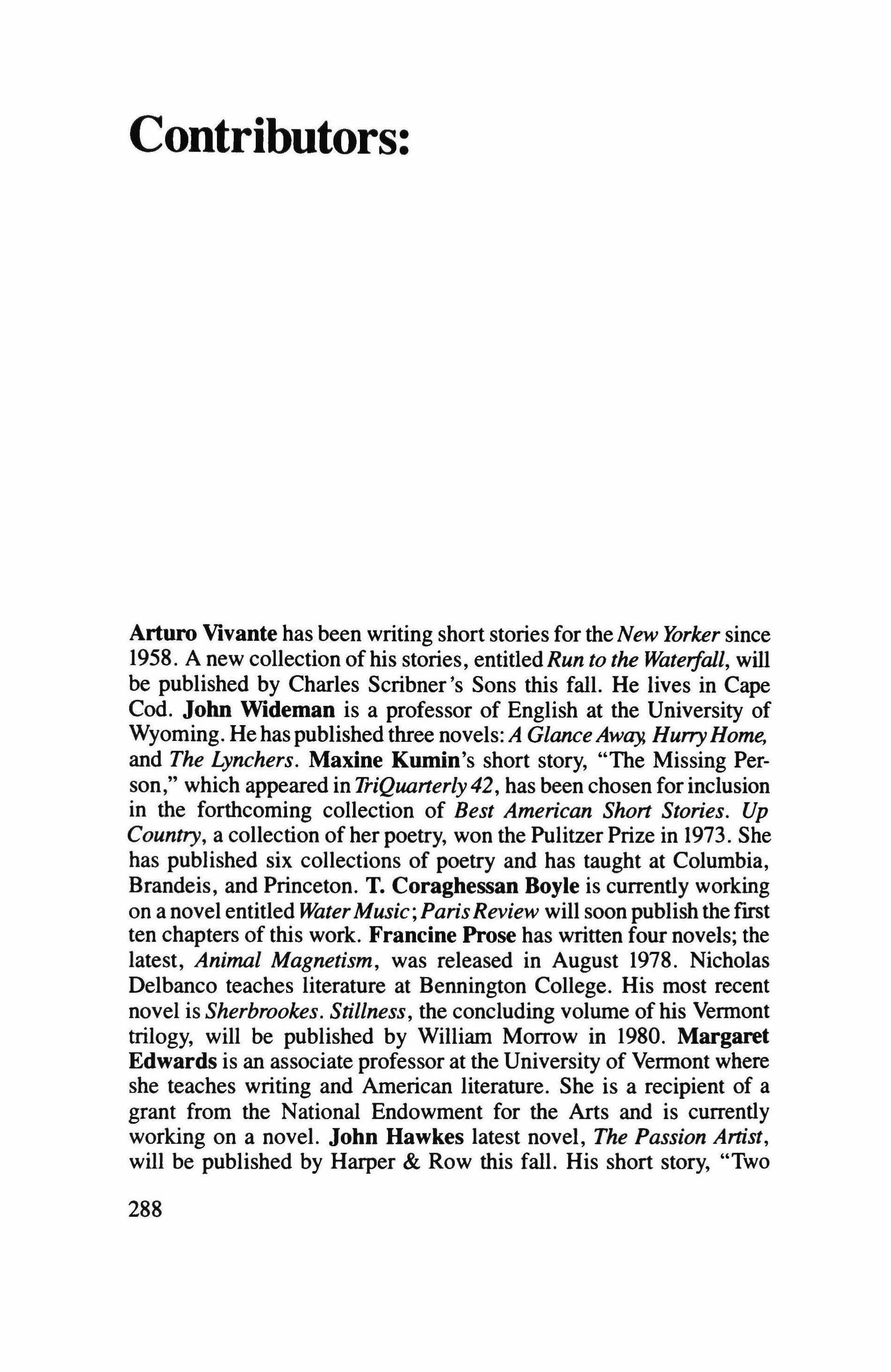
Arturo Vivante has been writing short stories for the New Yorker since 1958. A new collection of his stories, entitledRun to the Waterfall, will be published by Charles Scribner's Sons this fall. He lives in Cape Cod. John Wideman is a professor of English at the University of Wyoming. Hehaspublished three novels: A GlanceAWll); HurryHome, and The Lynchers. Maxine Kumin's short story, "The Missing Person ," which appeared in TriQuarterly42, has been chosen for inclusion in the forthcoming collection of Best American Short Stories. Up Country, a collection of her poetry, won the Pulitzer Prize in 1973. She has published six collections of poetry and has taught at Columbia, Brandeis, and Princeton. T. Coraghessan Boyle is currently working on a novel entitled WaterMusic; ParisReview will soon publish the first ten chapters of this work. Francine Prose has written four novels; the latest, Animal Magnetism, was released in August 1978. Nicholas Delbanco teaches literature at Bennington College. His most recent novel is Sherbrookes. Stillness, the concluding volume of his Vermont trilogy, will be published by William Morrow in 1980. Margaret Edwards is an associate professor at the University of Vermont where she teaches writing and American literature. She is a recipient of a grant from the National Endowment for the Arts and is currently working on a novel. John Hawkes latest novel, The Passion Artist, will be published by Harper & Row this fall. His short story, "Two
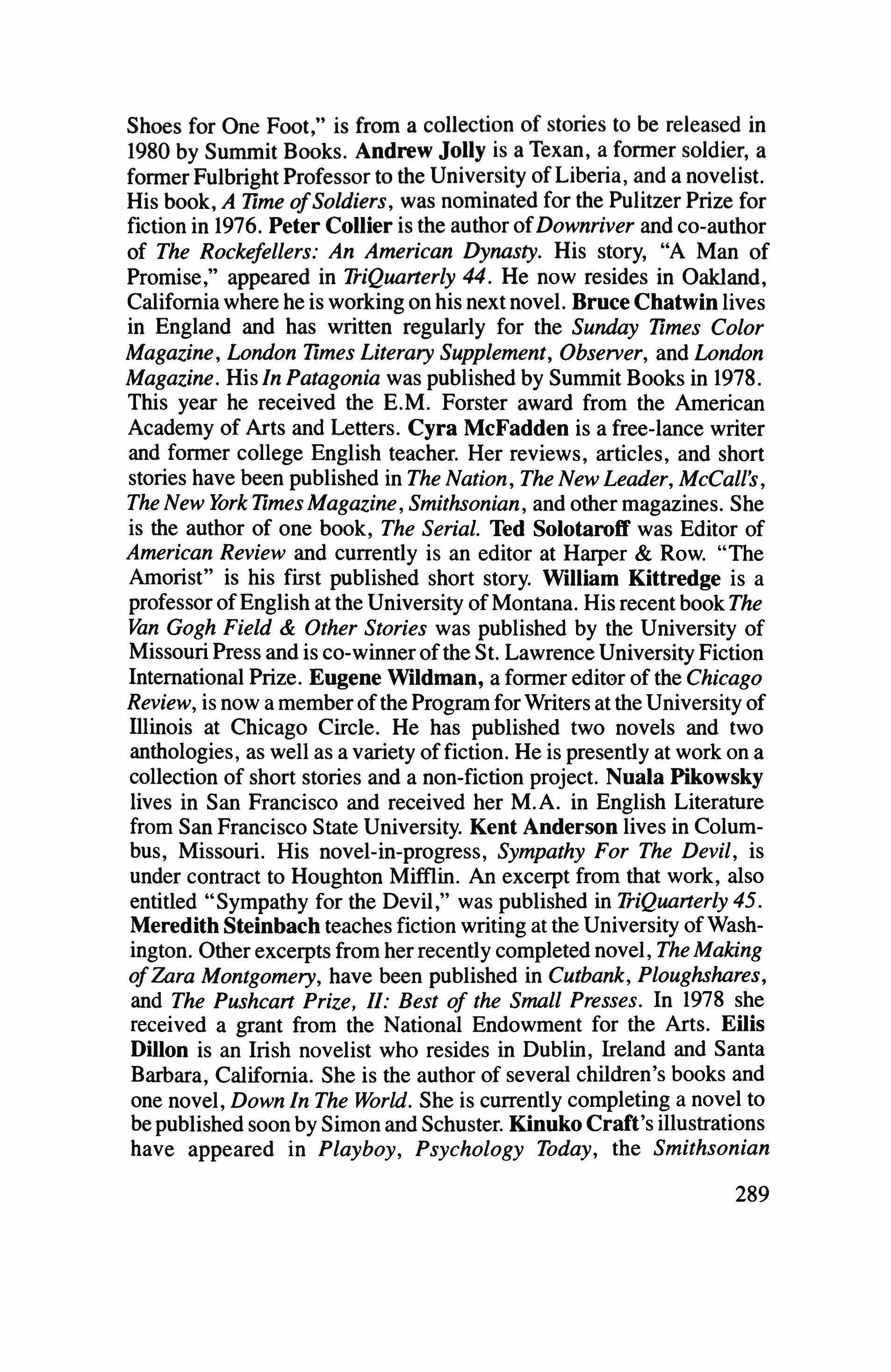
Shoes for One Foot," is from a collection of stories to be released in 1980 by Summit Books. Andrew Jolly is a Texan, a former soldier, a former Fulbright Professor to the University ofLiberia, and a novelist. His book, A TIme ofSoldiers, was nominated for the Pulitzer Prize for fiction in 1976. Peter Collier is the author ofDownriver and co-author of The Rockefellers: An American Dynasty. His story, "A Man of Promise," appeared in TriQuarterly 44. He now resides in Oakland, California where he is working on his next novel. Bruce Chatwin lives in England and has written regularly for the Sunday TImes Color Magazine, London TImes Literary Supplement, Observer, and London Magazine. His In Patagonia was published by Summit Books in 1978. This year he received the E.M. Forster award from the American Academy of Arts and Letters. Cyra McFadden is a free-lance writer and former college English teacher. Her reviews, articles, and short stories have been published in The Nation, The New Leader, McCall's, The New York TImes Magazine, Smithsonian, and other magazines. She is the author of one book, The Serial. Ted Solotaroff was Editor of American Review and currently is an editor at Harper & Row. "The Amorist" is his first published short story. William Kittredge is a professor ofEnglish at the University ofMontana. His recent book The Van Gogh Field & Other Stories was published by the University of Missouri Press and is co-winnerofthe St. Lawrence University Fiction International Prize. Eugene Wildman, a former editor of the Chicago Review, is now a member ofthe Program for Writers at the University of lliinois at Chicago Circle. He has published two novels and two anthologies, as well as a variety offiction. He is presently at work on a collection of short stories and a non-fiction project. Nuala Pikowsky lives in San Francisco and received her M.A. in English Literature from San Francisco State University. Kent Anderson lives in Columbus, Missouri. His novel-in-progress, Sympathy For The Devil, is under contract to Houghton Mifflin. An excerpt from that work, also entitled "Sympathy for the Devil," was published in TriQuarterly 45. Meredith Steinbach teaches fiction writing at the University ofWashington. Other excerpts from herrecently completed novel, The Making ofZara Montgomery, have been published in Cutbank, Ploughshares, and The Pushcart Prize, II: Best of the Small Presses. In 1978 she received a grant from the National Endowment for the Arts. Eilis Dillon is an Irish novelist who resides in Dublin, Ireland and Santa Barbara, California. She is the author of several children's books and one novel, Down In The World. She is currently completing a novel to be published soon by Simon and Schuster. Kinuko Craft's illustrations have appeared in Playboy, Psychology Today, the Smithsonian 289
Magazine,Skeptic, InternationalReviewforFoodand »ine, andNautical Quarterly. She has created book jacket illustrations for many of the major publishers, including McGraw-Hill, Harcourt Brace Javanovich, Houghton Mifflin, and Atheneum. Her work has received awards from the Society of Publication Designers, the Art Directors Club of New York, and the American Institute of Graphic Arts, among many others. She lives in Chicago.
Correction: Asa Baber's "Ambush," which appeared in 1riQuarterly 45, War Stories, was originally published in slightly different form in the Falcon and received mention in the Foley Prize collections.
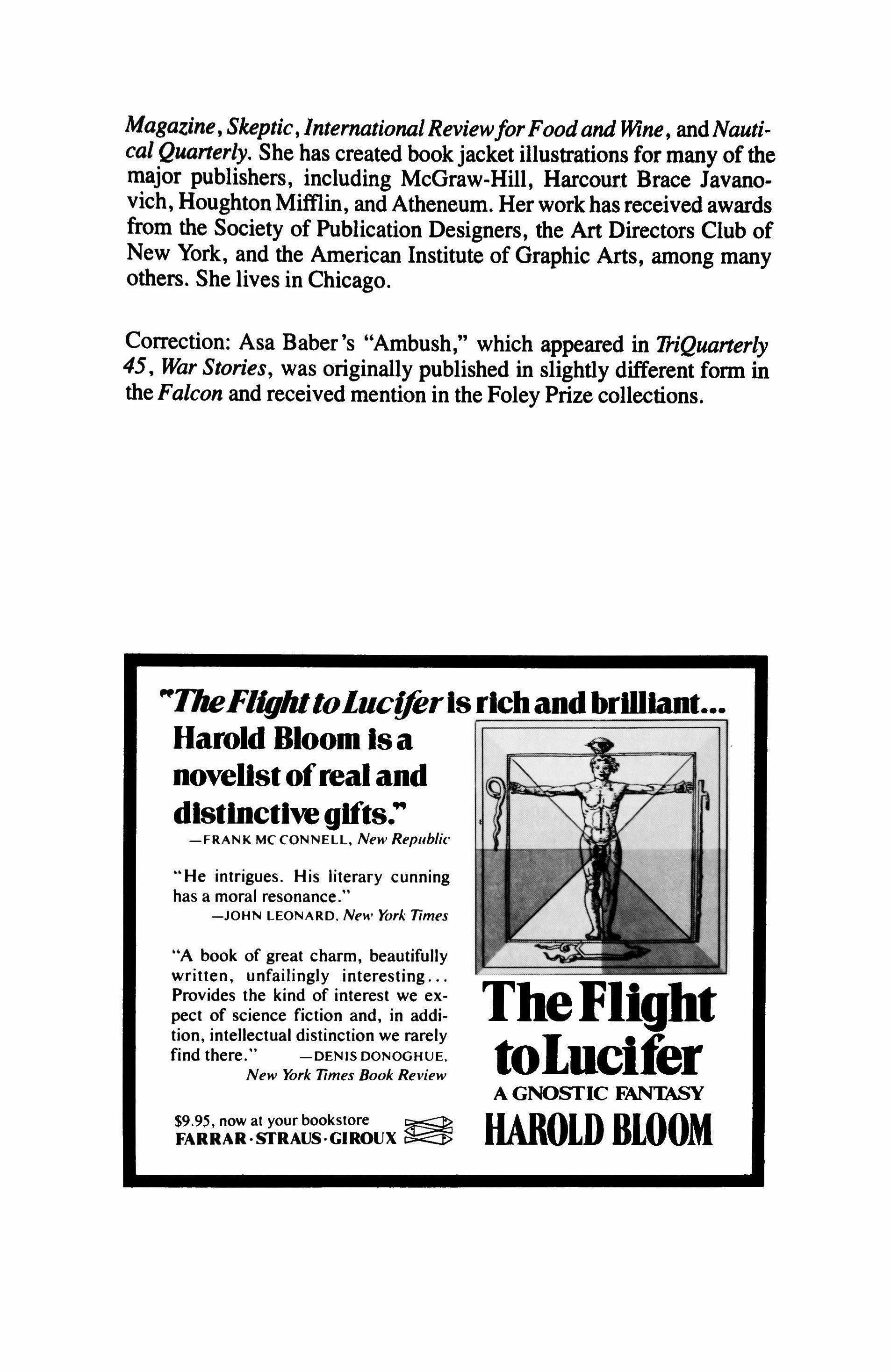
-FRANK MC CONNELL, New Republic
"He intrigues. His literary cunning has a moral resonance."
-JOHN LEONARD. New York Times
"A book of great charm, beautifully written, unfailingly interesting Provides the kind of interest we expect of science fiction and, in addition, intellectual distinction we rarely find there."
-DENIS DONOGHUE, New York Times Book Review
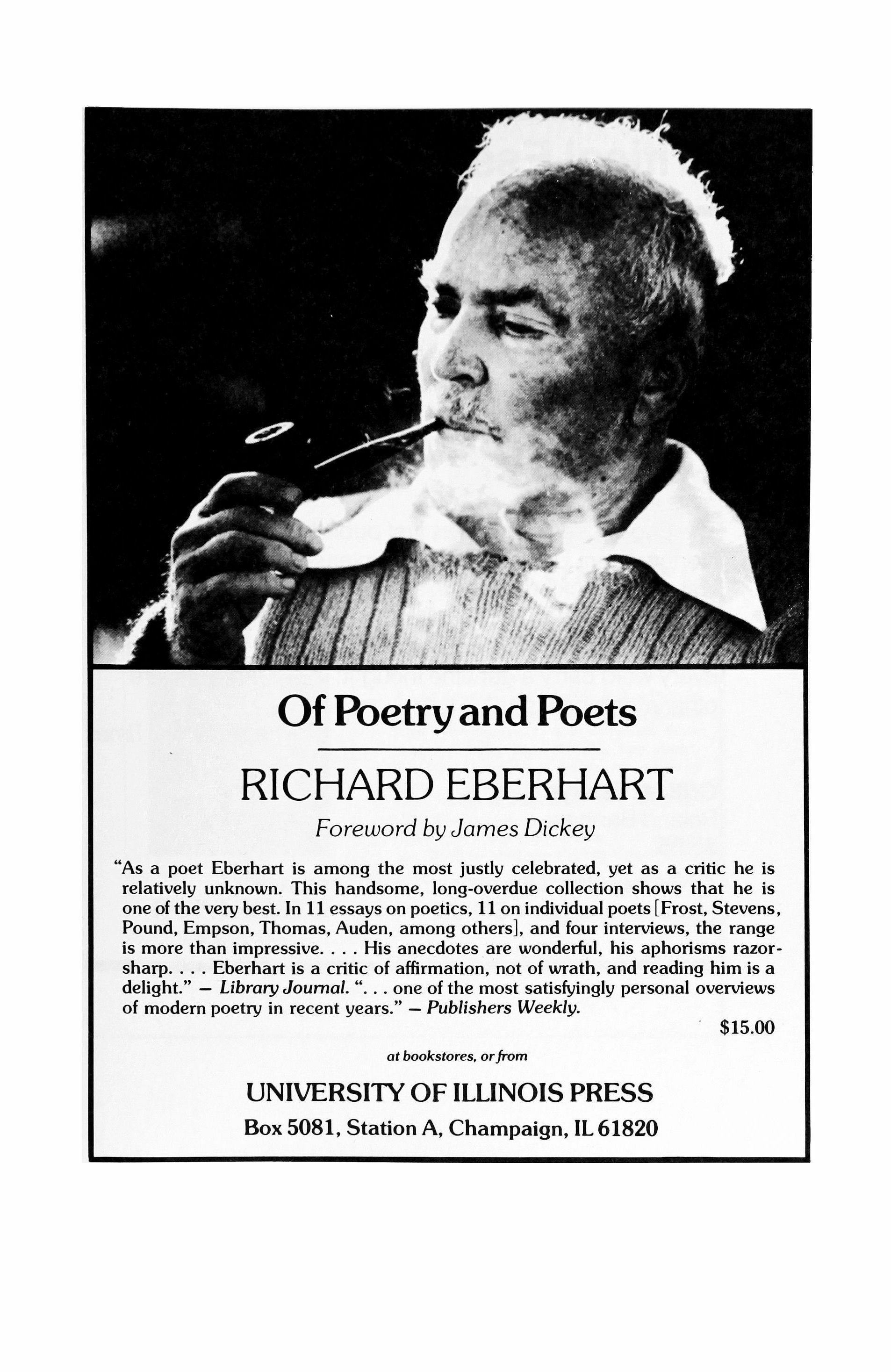
by
"As a poet Eberhart is among the most justly celebrated, yet as a critic he is relatively unknown. This handsome, long-overdue collection shows that he is one ofthe very best. In 11 essays on poetics, 11 on individual poets [Frost, Stevens, Pound, Empson, Thomas, Auden, among others), and four interviews, the range is more than impressive His anecdotes are wonderful, his aphorisms razorsharp Eberhart is a critic of affirmation, not of wrath, and reading him is a delight." - Library Journal. one of the most satisfyingly personal overviews of modern poetry in recent years." - Publishers Weekly.
$15.00 at bookstores. orfrom
UNIVERSIlY OF ILLINOIS PRESS Box 5081, Station A, Champaign, IL 61820
(translated by
Richard Howard)This collection of essays by the most prominent French literary and social commentator documents a transitional and highly important period in Barthes's career. Critical Essays affords invaluable insights into Barthes's critical and scholarly perspectives.
The English translation was first published in 1972. Northwestern University Press is pleased to announce the first paperback edition of this influential work.
"Throughout this most impressive collection, Barthes makes every word carry a genuine thought: his paragraphs are other men's books
-The New York Times

Critical Essays
Roland Barthes
$5.95
A Northwestern University Press paperback (Hardcover edition: $11.00)
A new edition of her remarkable book in which the tangled. tragic history of Ireland through three centuries is interwoven with the chronicle of her own family.
"What she has accomplished is a sympathetic picture of a class often denigrated beyond its entire desserts. and the results. in human character. of their really tragic isolation."
-Louise Bogan. The Nation
"She seems to have been born with a genius command of English prose style."
$6.95 PAPER
-Howard Moss. The New Yorker
Caresse Crosby
A mad. amusing. and revealing look at Paris in the twenties and at the people Caresse Crosby knew-Hemingway. F. SCOll Fitzgerald. Edith Wharton. James Joyce. Picasso. Ezra Pound. T.S. Eliot. Lawrence of Arabia. and d host of others. In a single day. a visitor to the Crosby home outside of Paris might have found Salvador Dali at work in one room. Douglas Fairbanks Senior playfully swinging from the rafters. and D.H. Lawrence sunning himself by the pool.
"A valuable footnote to the literary history of our time."
-The New York Times
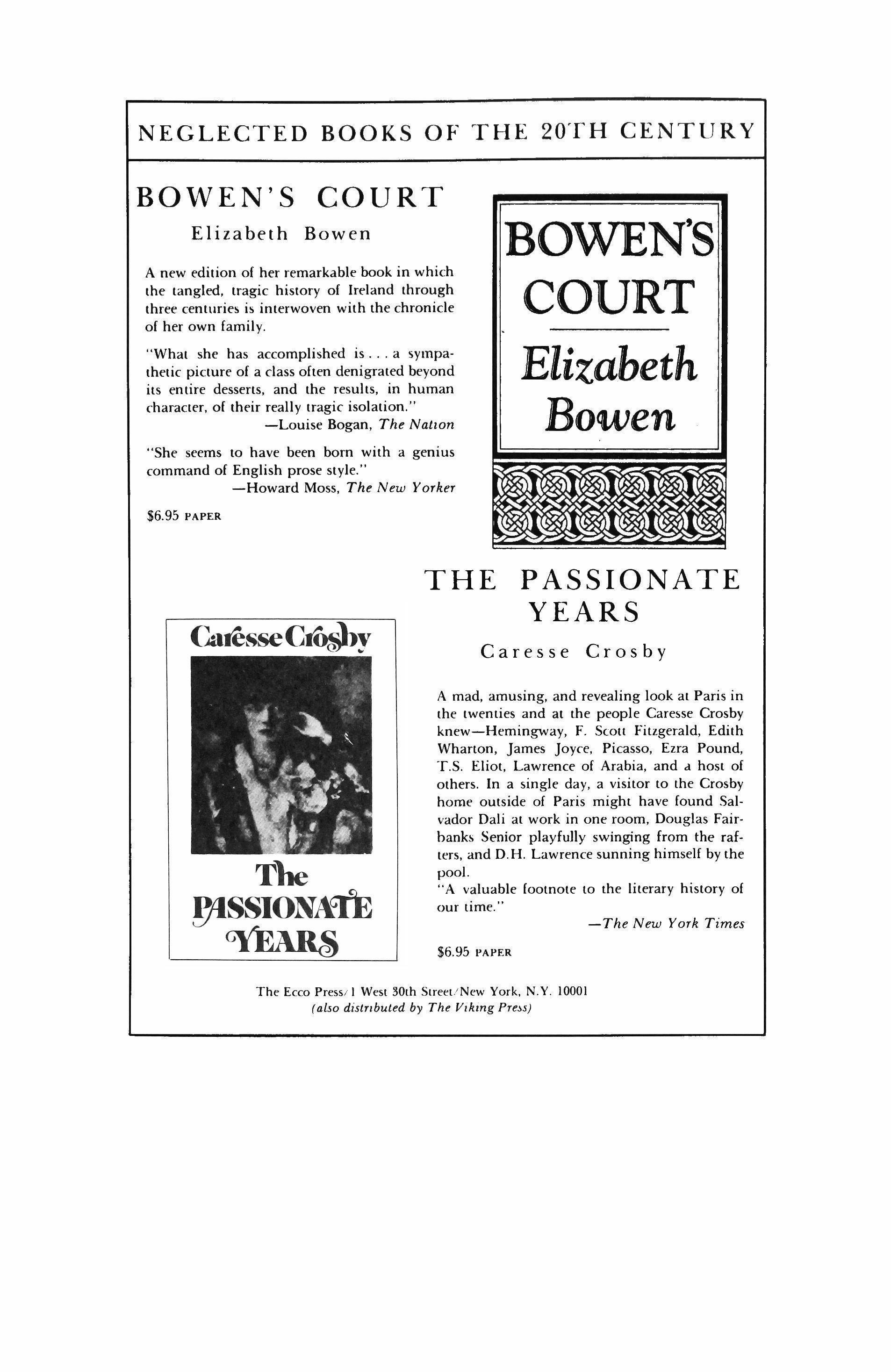
$6.95 PAPER
The Ecco Press/ I West 30th Street/New York. N. Y. 10001 (also distributed by The V.kmg Press)


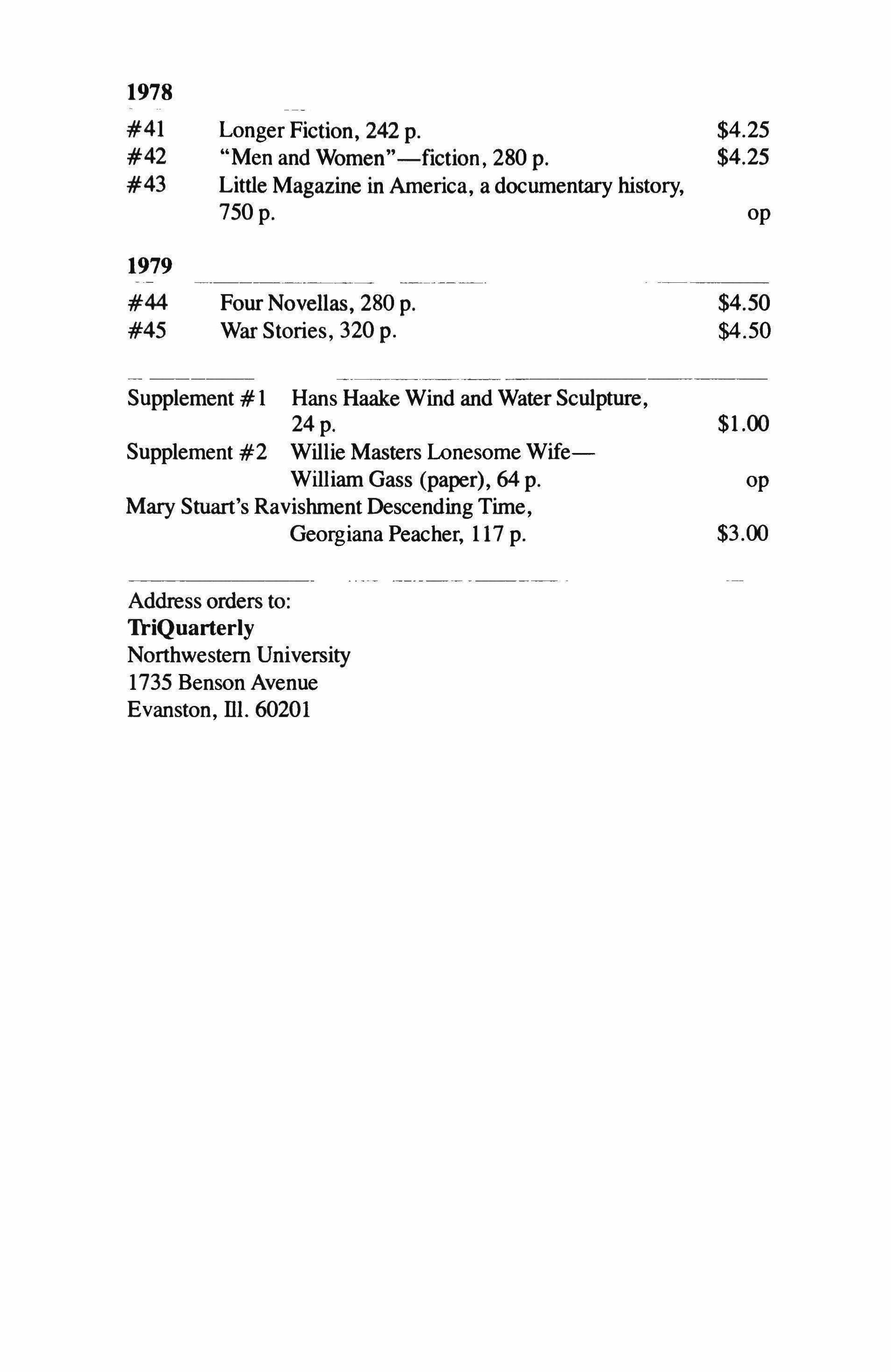
#41 #42 #43 Longer Fiction, 242 p. "Men and Women"-fiction, 280 p. Little Magazine in America, a documentary history, 750p. $4.25 $4.25 op 1979 #44 #45 Four Novellas, 280 p. War Stories, 320 p. $4.50 $4.50
Supplement # 1 Hans Haake Wind and Water Sculpture, 24p. $1.00
Supplement #2 Willie Masters Lonesome WifeWilliam Gass (paper), 64 p. op Mary Stuart's Ravishment Descending Time, Georgiana Peacher, 117 p. $3.00
Address orders to: TriQuarterly Northwestern University 1735 Benson Avenue Evanston, TIL 60201

